






Editors:
Elliott Anderson, Jonathan Brent
Art Director:
Cynthia Anderson
Managing Editor: Michael McDonnell
Associate Editor:
Anne-Marie Zwierzyna
Editorial Assistants:
Susan Hahn, Lisa Johnson, Judy Marrs, Fred Shafer, Mary Elinore Smith
Advisory Editors: Lawrence Levy, Charles Newman
Advertising Consultant: Sandy Moltz
Fulfillment: Denise Smith
Contributing
Editors:
Robert Alter, Michael Anania, Gerald Graff, John Hawkes, David Hayman, Bill Henderson, Ian MacMillan, Joseph McElroy, Peter Michelson, Robert Onopa, Robert Ray, Tony Tanner, Nathaniel Tarn
TriQuarterly is an international journal of art and writing published in the fall, winter, and spring at Northwestern University, Evanston, Illinois 60201.
Subscription rates: One year $14.00; two years $25.00; three years $35.00. Foreign subscriptions $1.00 per year additional. Single copies usually $5.95. Back issue prices on request. Contributions, correspondence, and subscriptions should be addressed to TriQuarterly, 1735 Benson Avenue, Northwestern University, Evanston, Illinois 60201. The editors invite submissions, but queries are strongly suggested. No manuscripts will be returned unless accompanied by a stamped, self-addressed envelope. All manuscripts accepted for publication become the property of TriQuarterly, unless otherwise indicated. Copyright © 1981 by TriQuarteriy. All rights reserved. The views expressed in this magazine are to be attributed to the writers, not the editors or sponsors. Printed in the United States of America. Claims for missing numbers will be honored only within the four-month period after month of issue.
NATIONAL DISTRIBUTOR TO RETAIL TRADE' B DEBOER. 113 E. CENTRE STREET-REAR, NUTLEY, NEW JERSEY 07110. DISTRIBUTOR FOR WEST COAST TRADE: BOOK PEOPLE, � 7TH STREET. BERKELEY, CALIFORNIA 94710. MIDWEST' BooKSLlNGER, P.O. BOX 1651,2163 FORD PKWY, ST. PAUL, MINNESOTA 55116.
REPRINTS OF BACK ISSUES OF TrlQuarterly ARE NOW AVAILABLE IN FULL FORMAT FROM KRAUS REPRINT COMPANY. ROUTE 100, MILLWOOD. NEW YORK 10546, AND IN MICROFILM FROM UMI, A XEROX COMPANY, ANN ARBOR. MICHIGAN 48106
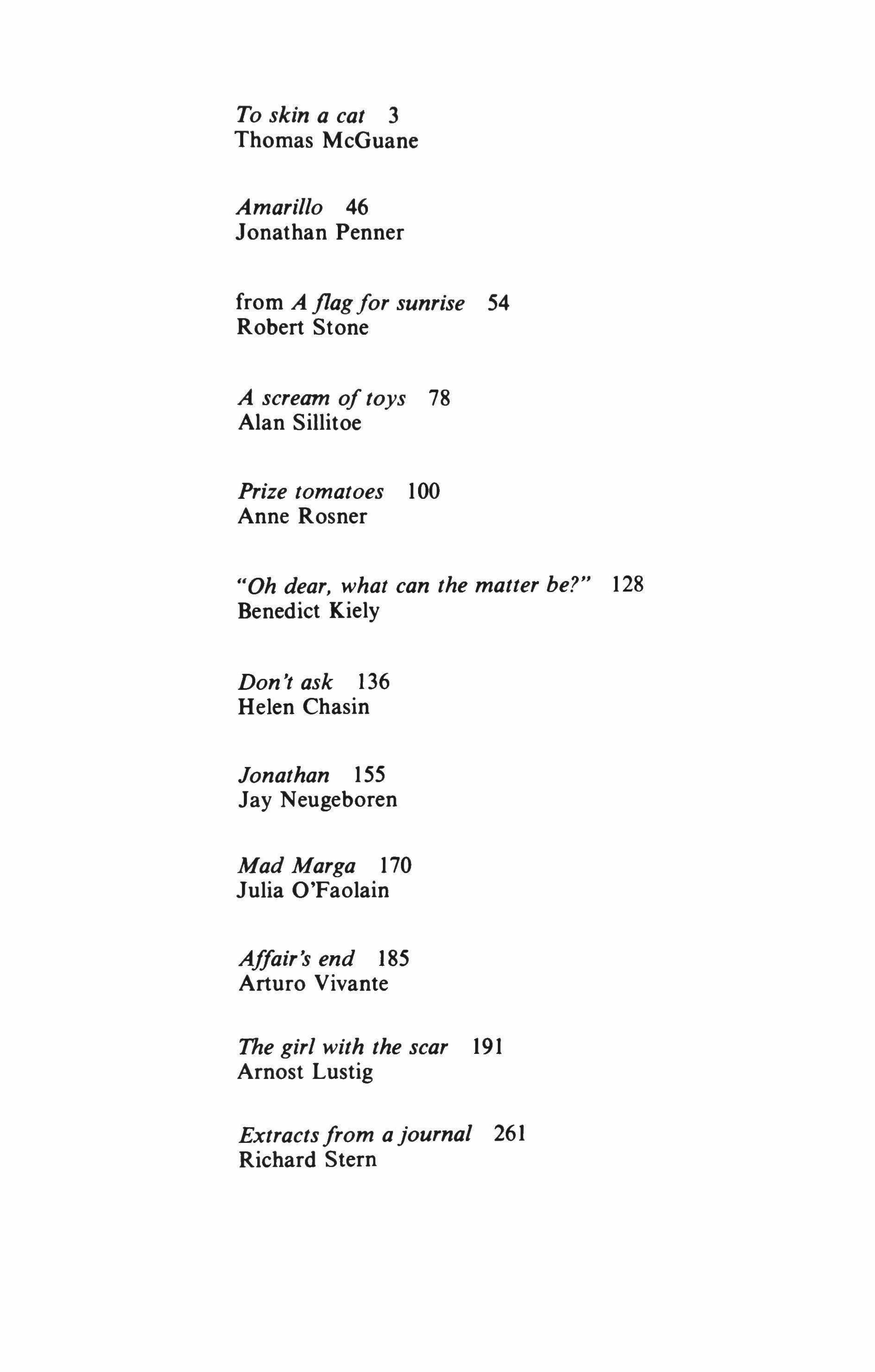
To skin a cat 3
Thomas McGuane
Amarillo 46
Jonathan Penner
from A flagfor sunrise 54
Robert Stone
A scream of toys 78
Alan Sillitoe
Prize tomatoes 100
Anne Rosner
"Oh dear, what can the matter be?" 128
Benedict Kiely
Don't ask 136
Helen Chasin
Jonathan 155 Jay Neugeboren
Mad Marga 170
Julia O'Faolain
Affair� end 185
Arturo Vivante
The girl with the scar 191
Arnost Lustig
Extractsfrom a journal 261
Richard Stern
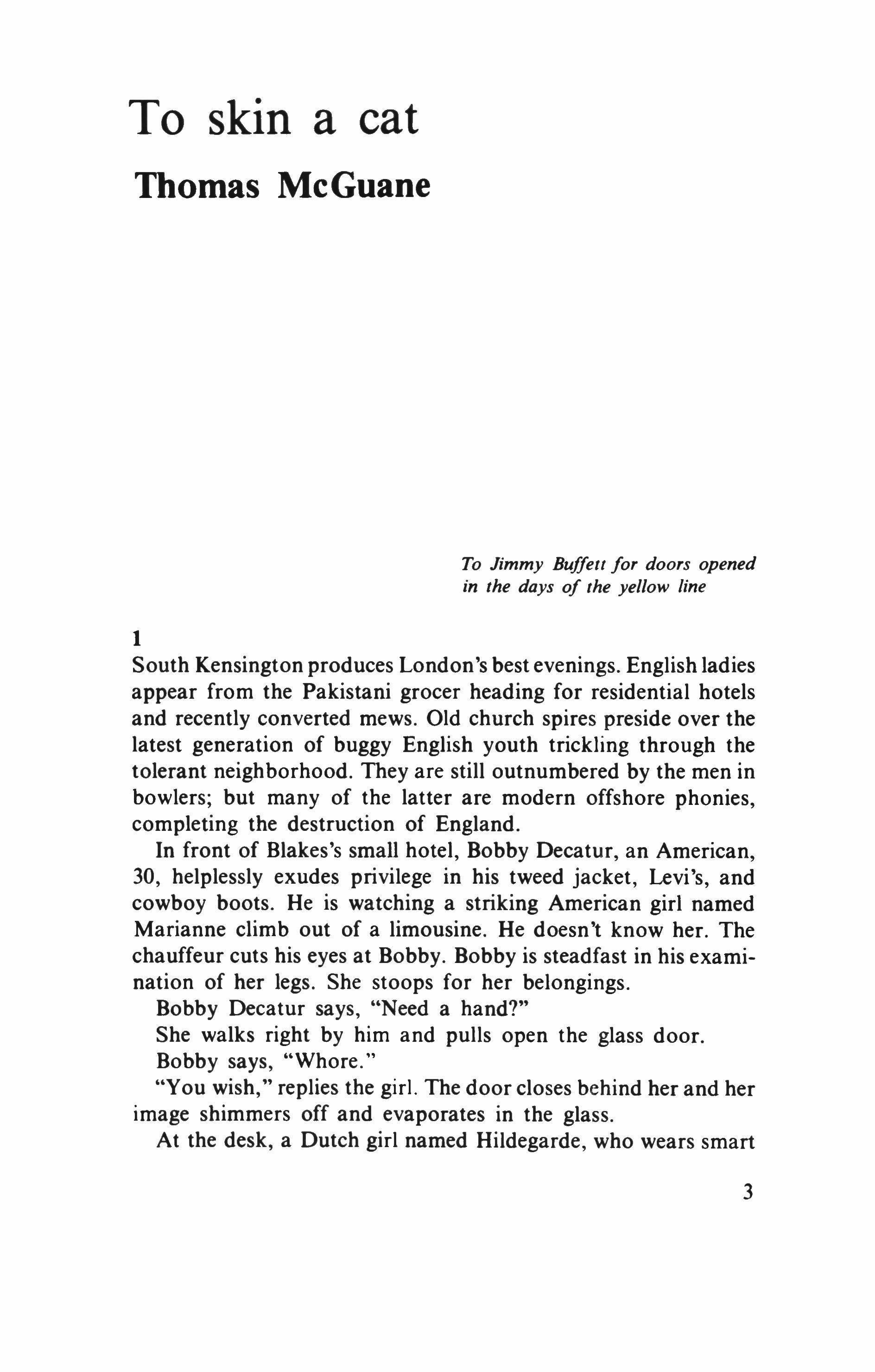
To Jimmy Buffett for doors opened in the days of the yellow line
1
South Kensington produces London's best evenings. English ladies appear from the Pakistani grocer heading for residential hotels and recently converted mews. Old church spires preside over the latest generation of buggy English youth trickling through the tolerant neighborhood. They are still outnumbered by the men in bowlers; but many of the latter are modern offshore phonies, completing the destruction of England.
In front of Blakes's small hotel, Bobby Decatur, an American, 30, helplessly exudes privilege in his tweed jacket, Levi's, and cowboy boots. He is watching a striking American girl named Marianne climb out of a limousine. He doesn't know her. The chauffeur cuts his eyes at Bobby. Bobby is steadfast in his examination of her legs. She stoops for her belongings.
Bobby Decatur says, "Need a hand?"
She walks right by him and pulls open the glass door.
Bobby says, "Whore."
"You wish," replies the girl. The door closes behind her and her image shimmers off and evaporates in the glass.
At the desk, a Dutch girl named Hildegarde, who wears smart
designer clothes every day and who directs the sallow Cockney bellhop, gives Marianne the key and says, "That's your new room. Away from that noisy landing. A little nicer, that. Room 210."
Bobby listens from inside the door. When Marianne disappears up the stairs, Bobby approaches Hildegarde who says "This one is not for you" in the voice of a procurer. The American does a burlesque who-me. And Hildegarde adds, "She is visiting her fiance. A nice Englishman."
So Bobby Decatur goes across the foyer and down the stairs into the stainless-steel decor of the lounge. Jack the bartender has a crinkled face and a Prince Valiant haircut. He reminds Bobby that he is cut off. Bobby states that he has a letter from his doctor attesting that an unfortunate side effect of his medication goes a long way toward explaining his erratic behavior. Jack says that we've all got one of those doctors.
"Anyway," says Bobby, "it's not for me. I'm sending a drink to a friend. My mother actually." Bobby sends a boilermaker to room 210 with a note explaining that English fiances are undesirable. He invites Marianne to Jackson Hole, Wyoming, and signs his name.
"Thanks a million, Jack. Love your haircut. Put that on my room."
2
Marianne and her fiance are sitting in Scott's Restaurant, off Park Lane. The best of the John Bull atmosphere with professional men of seafood shucking oysters behind a zinc bar. Marianne is just luscious while her friend seems to have been hand-carved from slabs of cold salt pork.
He says, "You are heroic to have come. A little fish will help the lag. The wine will make you sleep. 1 have a meeting with a distinguished glitter band. After which I'm yours. You do look sleepy.
"As of yet, Allen, the trip hasn't gotten to me."
"I think you are spectacular."
Through the reversed lettering of the glass front window, Bobby Decatur is holding a sign which reads, "That man is a cur." Marianne sees it.
"Darling, are you dizzy?" "No," she says, "but I must go to the ladies'! Back in a jiff."

4
Outside, Marianne says to Bobby, "Leave me alone, you little shit. And I put that drink you sent in the toilet."
"The 100."
"What?"
"It's called the 100 in England."
"I'm going in."
At the table, the fiance asks, "Better?" The record industry has given him the remote gape of a rock star.
"Much."
"You look distressed."
"I'm being pestered."
"And by whom?"
"An evidently crazy young man."
"I'm going to stop him."
"Actually, he's not here. He's back in New York. I'm afraid it's still on my mind."
"Shaking his thing in doorways, I suppose."
"But he's half-charming. Anyway, darling, he's thousands of miles away. Not to bother."
"Half-charming?"
3
Bobby is in his clean, plain room at Blakes's. There are many very old, well-bound books. There are many fine engravings of hunting hawks. On its perch, weathering in front of an open window, is a hooded falcon. Bobby presses his fist forward and the hawk steps up onto his wrist. He draws the hooded bird close to his face and whispers: "Hello in there. I've met a girl."
4
Bobby buys a chicken at the Kensington grocer, a whole chicken. He descends to the underground and rides in silence, carrying the chicken in his lap. He heads for a tattoo parlor near Knightsbridge.
At the end of the day, Hildegarde, at the front desk in Blakes's, hands Marianne a beautifully wrapped box. Marianne takes it to her room and removes her coat. She sits on the bed and opens the box. The chicken lies nestled in excelsior, its breasts tattooed, "Born to Raise Hell."
Marianne smiles.
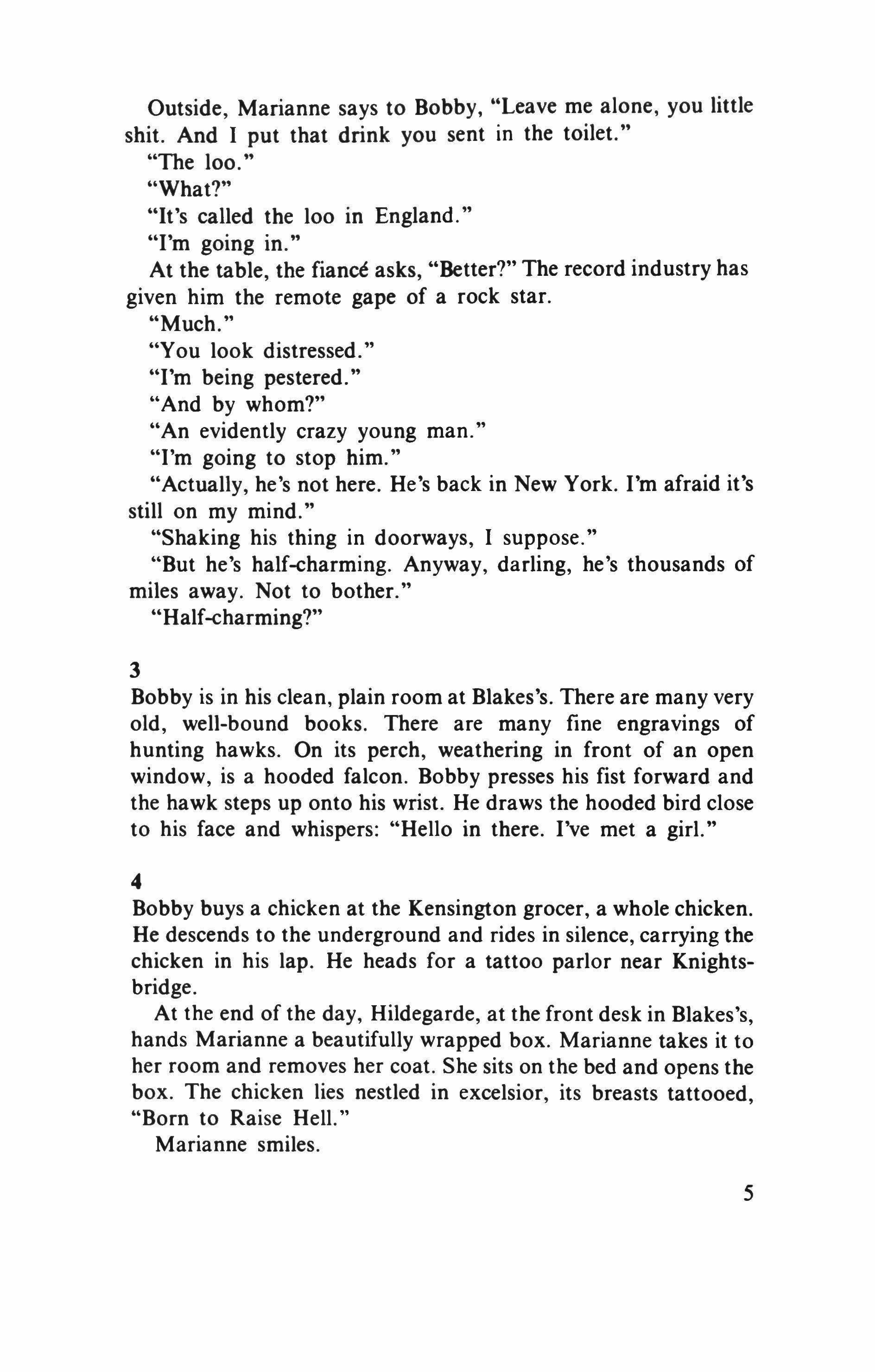
5
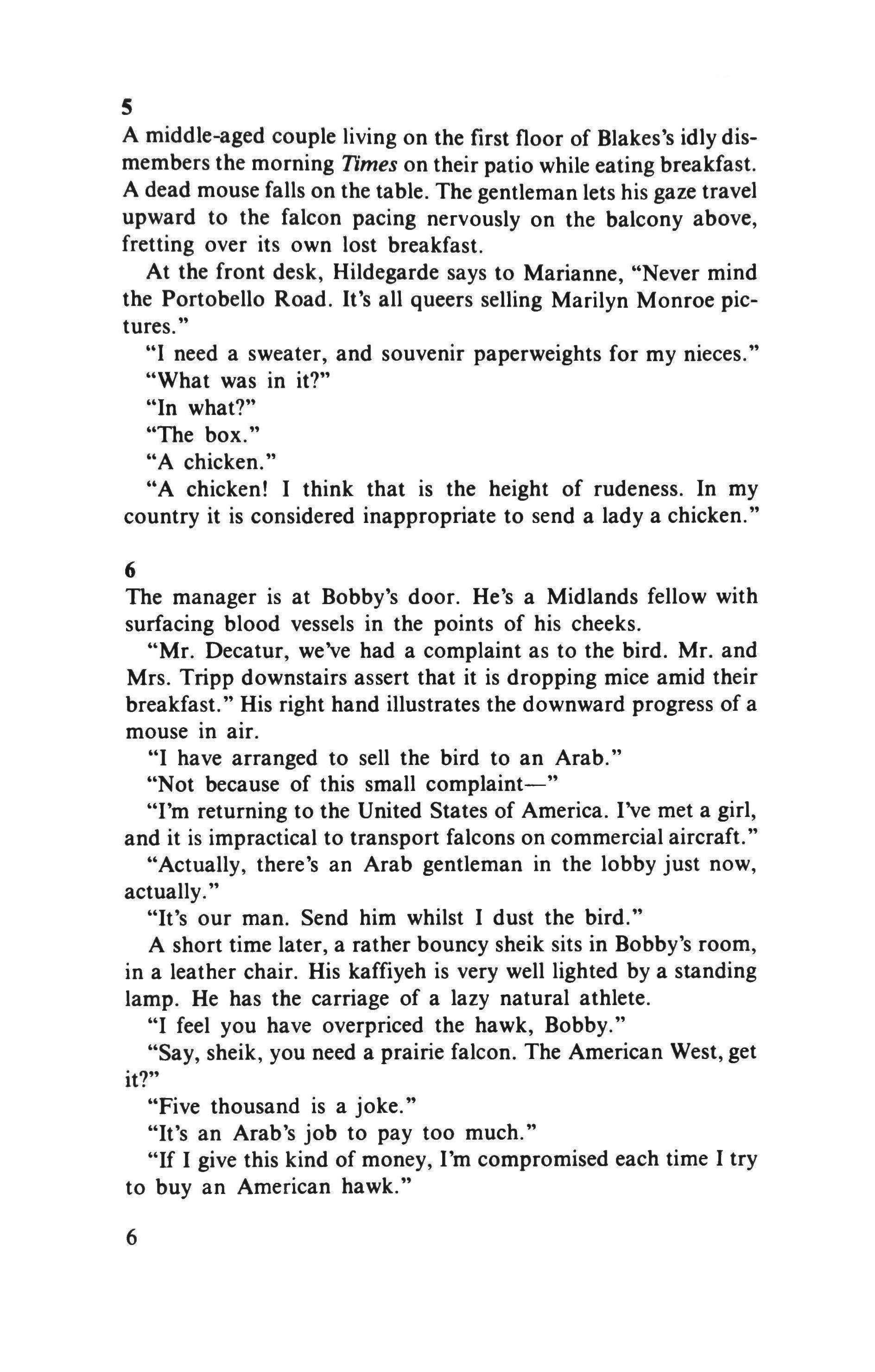
A middle-aged couple living on the first floor of Blakes's idly dismembers the morning Times on their patio while eating breakfast. A dead mouse falls on the table. The gentleman lets his gaze travel upward to the falcon pacing nervously on the balcony above, fretting over its own lost breakfast.
At the front desk, Hildegarde says to Marianne, "Never mind the Portobello Road. It's all queers selling Marilyn Monroe pictures.
"I need a sweater, and souvenir paperweights for my nieces."
"What was in it?"
"In what?"
"The box."
"A chicken."
"A chicken! I think that is the height of rudeness. In my country it is considered inappropriate to send a lady a chicken."
6
The manager is at Bobby's door. He's a Midlands fellow with surfacing blood vessels in the points of his cheeks.
"Mr. Decatur, we've had a complaint as to the bird. Mr. and Mrs. Tripp downstairs assert that it is dropping mice amid their breakfast." His right hand illustrates the downward progress of a mouse in air.
"I have arranged to sell the bird to an Arab."
"Not because of this small complaint-"
"I'm returning to the United States of America. I've met a girl, and it is impractical to transport falcons on commercial aircraft."
"Actually, there's an Arab gentleman in the lobby just now, actually.
"It's our man. Send him whilst I dust the bird."
A short time later, a rather bouncy sheik sits in Bobby's room, in a leather chair. His kaffiyeh is very well lighted by a standing lamp. He has the carriage of a lazy natural athlete.
"I feel you have overpriced the hawk, Bobby."
"Say, sheik, you need a prairie falcon. The American West, get it?"
"Five thousand is a joke."
"It's an Arab's job to pay too much."
"If I give this kind of money, I'm compromised each time I try to buy an American hawk."
6
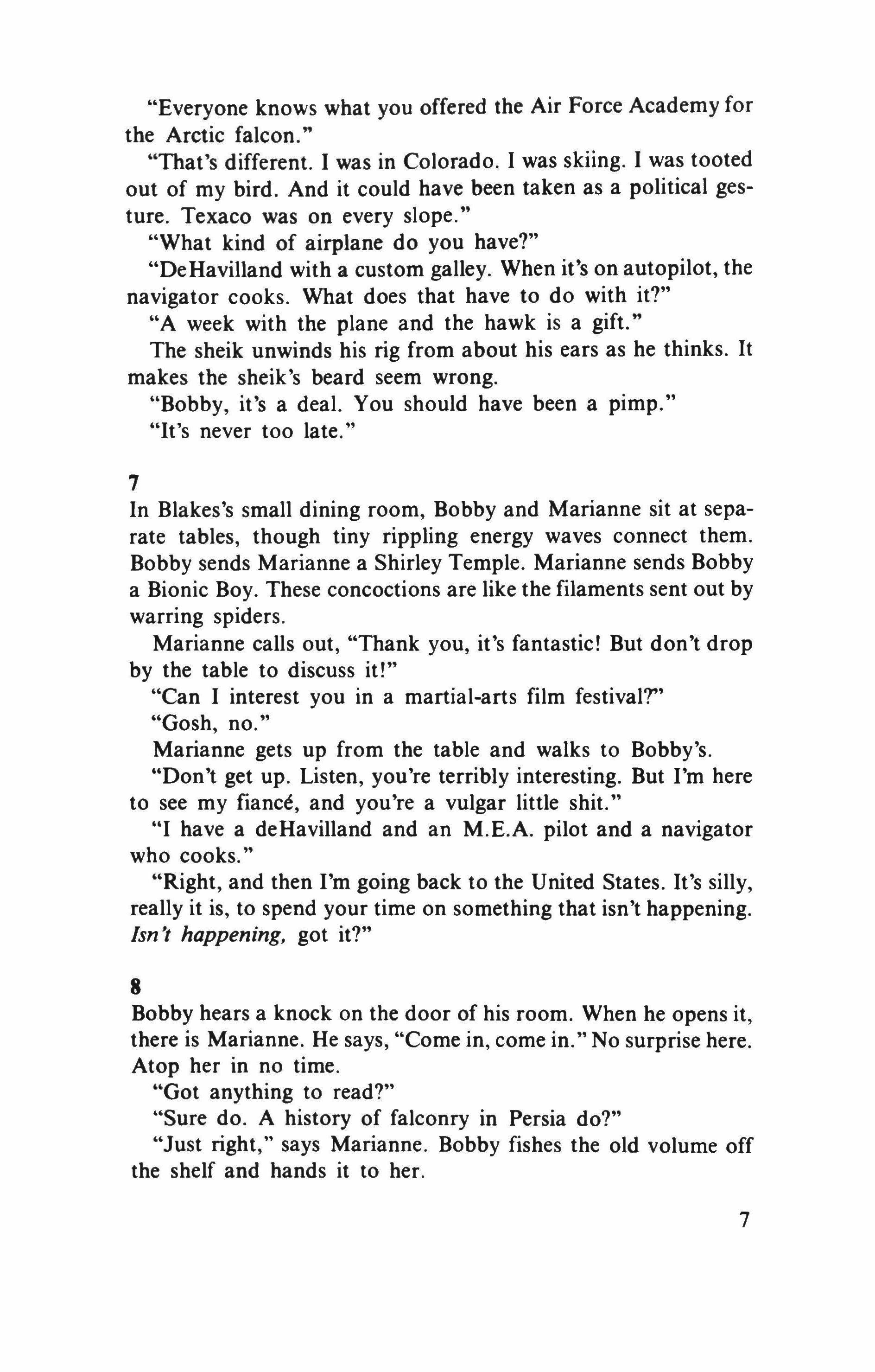
"Everyone knows what you offered the Air Force Academy for the Arctic falcon."
"That's different. I was in Colorado. I was skiing. I was tooted out of my bird. And it could have been taken as a political gesture. Texaco was on every slope."
"What kind of airplane do you have?"
"DeHavilland with a custom galley. When it's on autopilot, the navigator cooks. What does that have to do with it?"
"A week with the plane and the hawk is a gift."
The sheik unwinds his rig from about his ears as he thinks. It makes the sheik's beard seem wrong.
"Bobby, it's a deal. You should have been a pimp."
"It's never too late."
7
In Blakes's small dining room, Bobby and Marianne sit at separate tables, though tiny rippling energy waves connect them. Bobby sends Marianne a Shirley Temple. Marianne sends Bobby a Bionic Boy. These concoctions are like the filaments sent out by warring spiders.
Marianne calls out, "Thank you, it's fantastic! But don't drop by the table to discuss it!"
"Can I interest you in a martial-arts film festival?"
"Gosh, no."
Marianne gets up from the table and walks to Bobby's.
"Don't get up. Listen, you're terribly interesting. But I'm here to see my fiance, and you're a vulgar little shit."
"I have a deHavilland and an M.E.A. pilot and a navigator who cooks."
"Right, and then I'm going back to the United States. It's silly, really it is, to spend your time on something that isn't happening. Isn't happening, got it?"
8
Bobby hears a knock on the door of his room. When he opens it, there is Marianne. He says, "Come in, come in." No surprise here. Atop her in no time.
"Got anything to read?"
"Sure do. A history of falconry in Persia do?"
"Just right," says Marianne. Bobby fishes the old volume off the shelf and hands it to her.
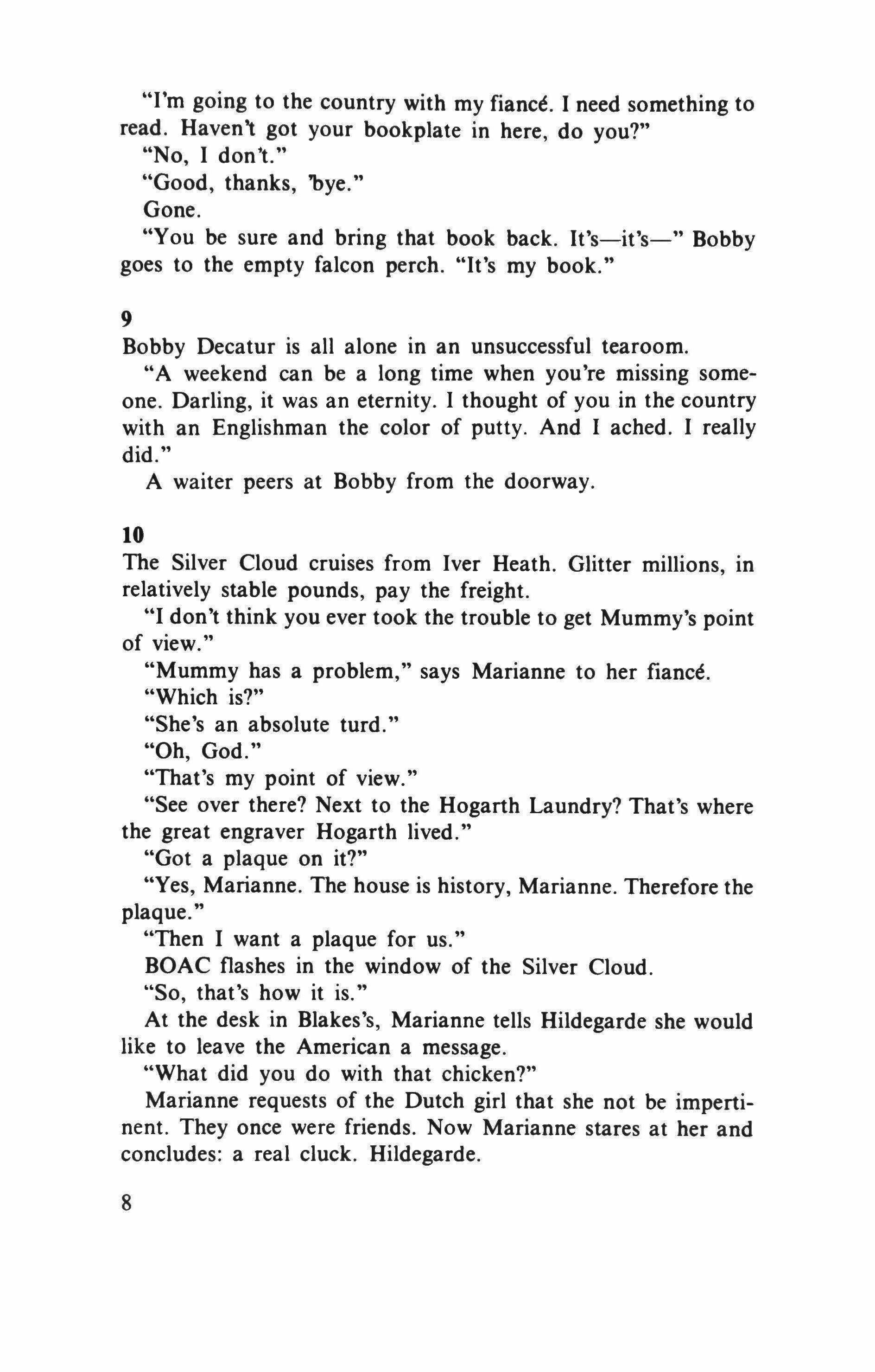
"I'm going to the country with my fiance. 1 need something to read. Haven't got your bookplate in here, do you?"
"No, 1 don't."
"Good, thanks, 'bye."
Gone.
"You be sure and bring that book back. It's-it's-" Bobby goes to the empty falcon perch. "It's my book."
9
Bobby Decatur is all alone in an unsuccessful tearoom.
"A weekend can be a long time when you're missing someone. Darling, it was an eternity. 1 thought of you in the country with an Englishman the color of putty. And 1 ached. 1 really did."
A waiter peers at Bobby from the doorway.
10
The Silver Cloud cruises from Iver Heath. Glitter millions, in relatively stable pounds, pay the freight.
"I don't think you ever took the trouble to get Mummy's point of view."
"Mummy has a problem," says Marianne to her fiance. "Which is?"
"She's an absolute turd."
"Oh, God."
"That's my point of view."
"See over there? Next to the Hogarth Laundry? That's where the great engraver Hogarth lived."
"Got a plaque on it?"
"Yes, Marianne. The house is history, Marianne. Therefore the plaque."
"Then I want a plaque for us."
BOAC flashes in the window of the Silver Cloud.
"So, that's how it is."
At the desk in Blakes's, Marianne tells Hildegarde she would like to leave the American a message.
"What did you do with that chicken?"
Marianne requests of the Dutch girl that she not be impertinent. They once were friends. Now Marianne stares at her and concludes: a real cluck. Hildegarde.
8
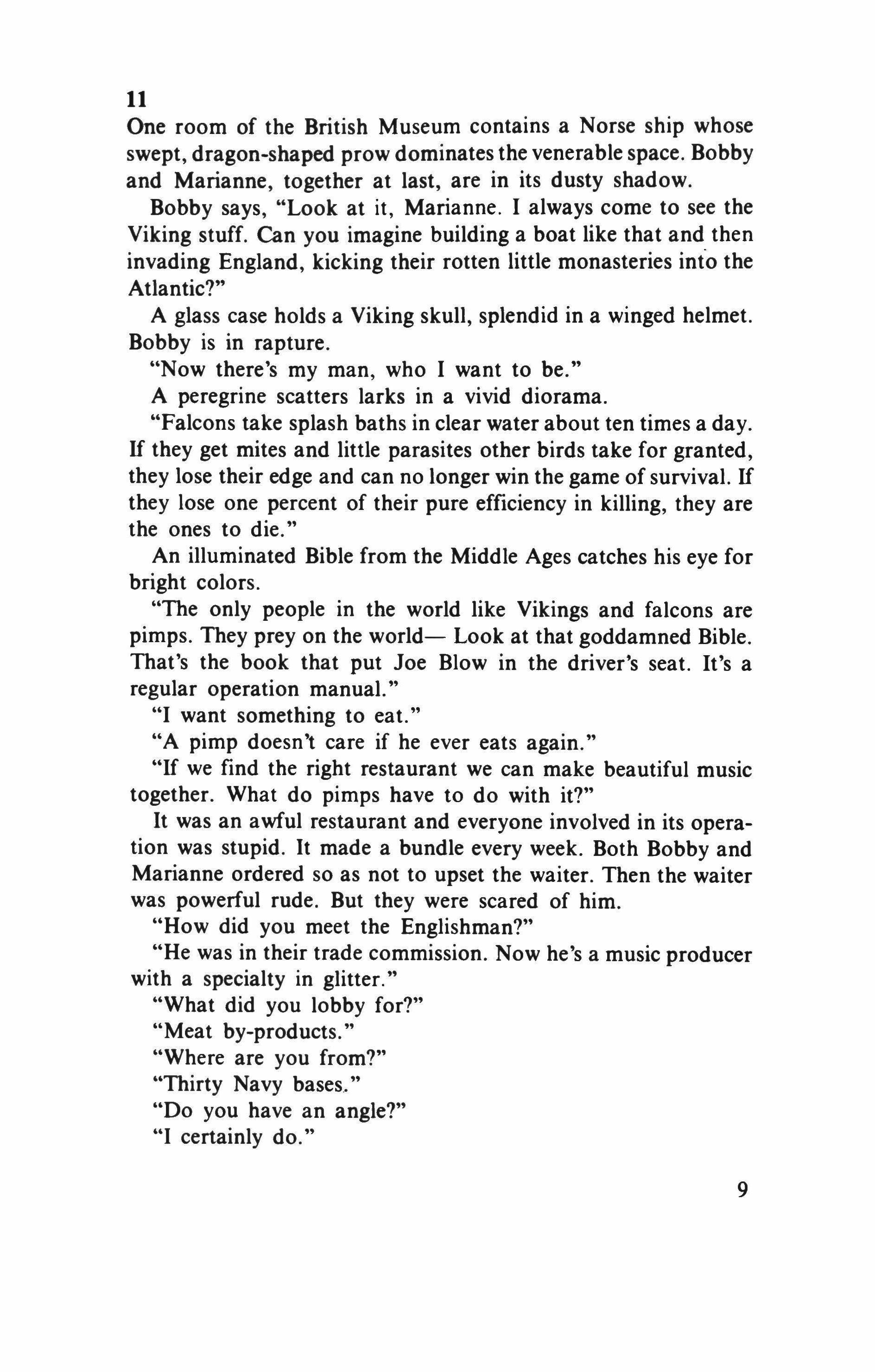
One room of the British Museum contains a Norse ship whose swept, dragon-shaped prow dominates the venerable space. Bobby and Marianne, together at last, are in its dusty shadow.
Bobby says, "Look at it, Marianne. I always come to see the Viking stuff. Can you imagine building a boat like that and then invading England, kicking their rotten little monasteries into the Atlantic?"
A glass case holds a Viking skull, splendid in a winged helmet. Bobby is in rapture.
"Now there's my man, who I want to be."
A peregrine scatters larks in a vivid diorama.
"Falcons take splash baths in clear water about ten times a day. If they get mites and little parasites other birds take for granted, they lose their edge and can no longer win the game of survival. If they lose one percent of their pure efficiency in killing, they are the ones to die."
An illuminated Bible from the Middle Ages catches his eye for bright colors.
"The only people in the world like Vikings and falcons are pimps. They prey on the world- Look at that goddamned Bible. That's the book that put Joe Blow in the driver's seat. It's a regular operation manual."
"I want something to eat."
"A pimp doesn't care if he ever eats again."
"If we find the right restaurant we can make beautiful music together. What do pimps have to do with it?"
It was an awful restaurant and everyone involved in its operation was stupid. It made a bundle every week. Both Bobby and Marianne ordered so as not to upset the waiter. Then the waiter was powerful rude. But they were scared of him.
"How did you meet the Englishman?"
"He was in their trade commission. Now he's a music producer with a specialty in glitter."
"What did you lobby for?"
"Meat by-products."
"Where are you from?"
"Thirty Navy bases."
"Do you have an angle?"
"I certainly do."
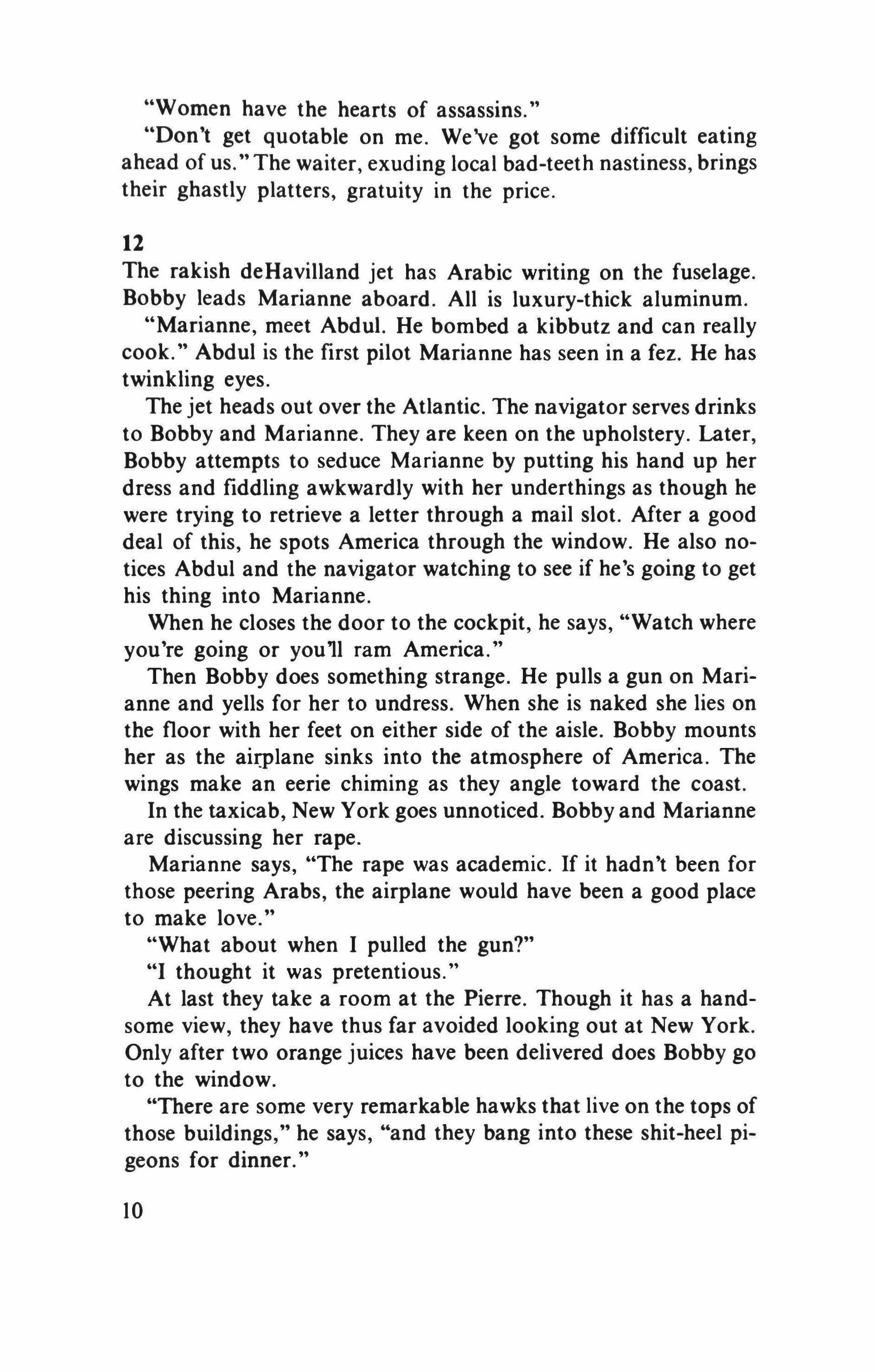
"Women have the hearts of assassins."
"Don't get quotable on me. We've got some difficult eating ahead of us." The waiter, exuding local bad-teeth nastiness, brings their ghastly platters, gratuity in the price.
12
The rakish deHavilland jet has Arabic writing on the fuselage. Bobby leads Marianne aboard. All is luxury-thick aluminum.
"Marianne, meet Abdul. He bombed a kibbutz and can really cook." Abdul is the first pilot Marianne has seen in a fez. He has twinkling eyes.
The jet heads out over the Atlantic. The navigator serves drinks to Bobby and Marianne. They are keen on the upholstery. Later, Bobby attempts to seduce Marianne by putting his hand up her dress and fiddling awkwardly with her underthings as though he were trying to retrieve a letter through a mail slot. After a good deal of this, he spots America through the window. He also notices Abdul and the navigator watching to see if he's going to get his thing into Marianne.
When he closes the door to the cockpit, he says, "Watch where you're going or you'll ram America."
Then Bobby does something strange. He pulls a gun on Marianne and yells for her to undress. When she is naked she lies on the floor with her feet on either side of the aisle. Bobby mounts her as the airplane sinks into the atmosphere of America. The wings make an eerie chiming as they angle toward the coast.
In the taxicab, New York goes unnoticed. Bobby and Marianne are discussing her rape.
Marianne says, "The rape was academic. If it hadn't been for those peering Arabs, the airplane would have been a good place to make love."
"What about when I pulled the gun?"
"I thought it was pretentious."
At last they take a room at the Pierre. Though it has a handsome view, they have thus far avoided looking out at New York. Only after two orange juices have been delivered does Bobby go to the window.
"There are some very remarkable hawks that live on the tops of those buildings," he says, "and they bang into these shit-heel pigeons for dinner."
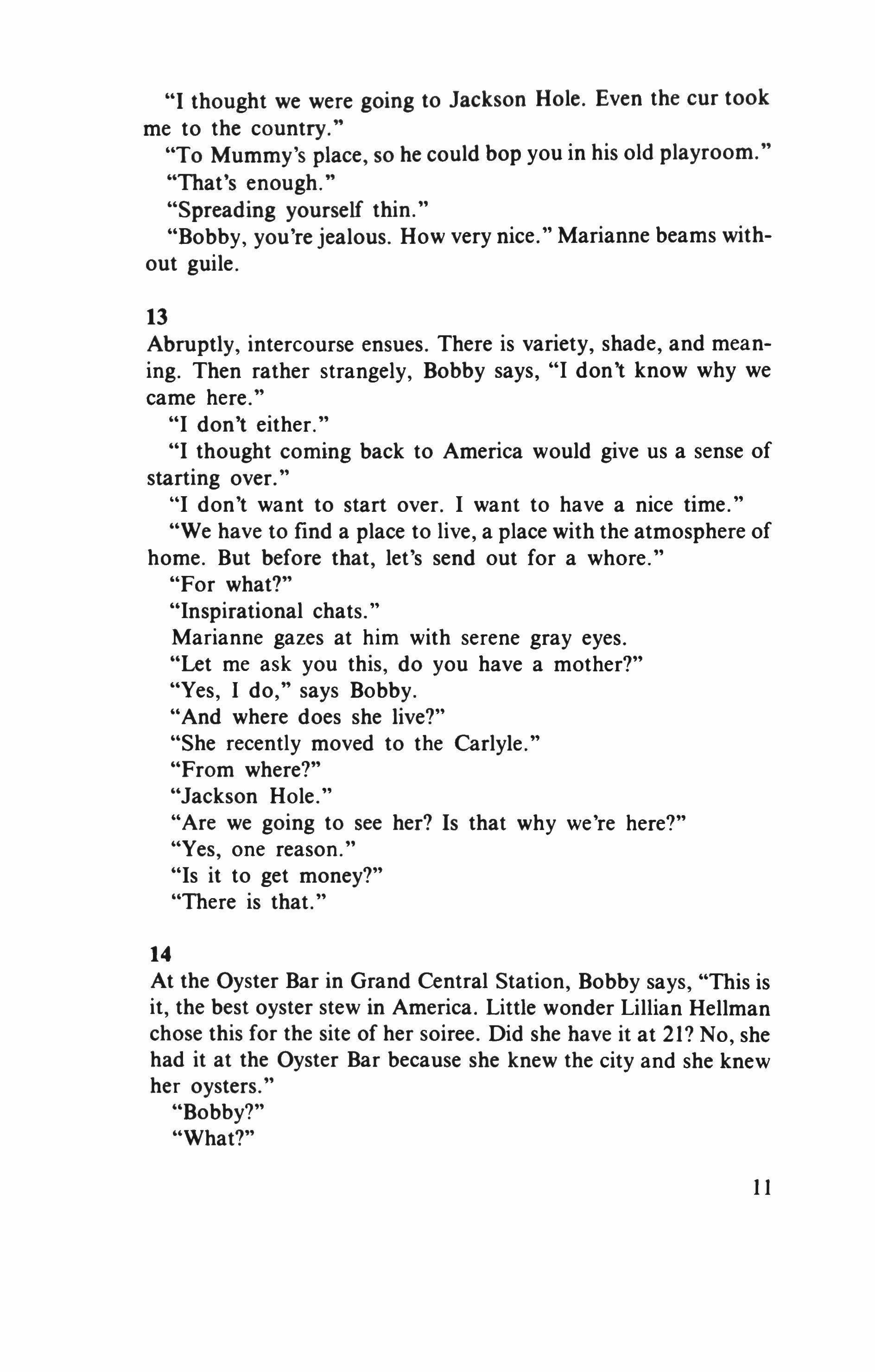
"I thought we were going to Jackson Hole. Even the cur took me to the country."
"To Mummy's place, so he could bop you in his old playroom."
"That's enough."
"Spreading yourself thin."
"Bobby, you're jealous. How very nice." Marianne beams without guile.
13
Abruptly, intercourse ensues. There is variety, shade, and meaning. Then rather strangely, Bobby says, "I don't know why we came here."
"I don't either."
"I thought coming back to America would give us a sense of starting over."
"I don't want to start over. I want to have a nice time."
"We have to find a place to live, a place with the atmosphere of home. But before that, let's send out for a whore."
"For what?"
"Inspirational chats."
Marianne gazes at him with serene gray eyes.
"Let me ask you this, do you have a mother?"
"Yes, I do," says Bobby.
"And where does she live?"
"She recently moved to the Carlyle."
"From where?"
"Jackson Hole."
"Are we going to see her? Is that why we're here?"
"Yes, one reason."
"Is it to get money?"
"There is that."
14
At the Oyster Bar in Grand Central Station, Bobby says, "This is it, the best oyster stew in America. Little wonder Lillian Hellman chose this for the site of her soiree. Did she have it at 21? No, she had it at the Oyster Bar because she knew the city and she knew her oysters."
"Bobby?"
"What?"
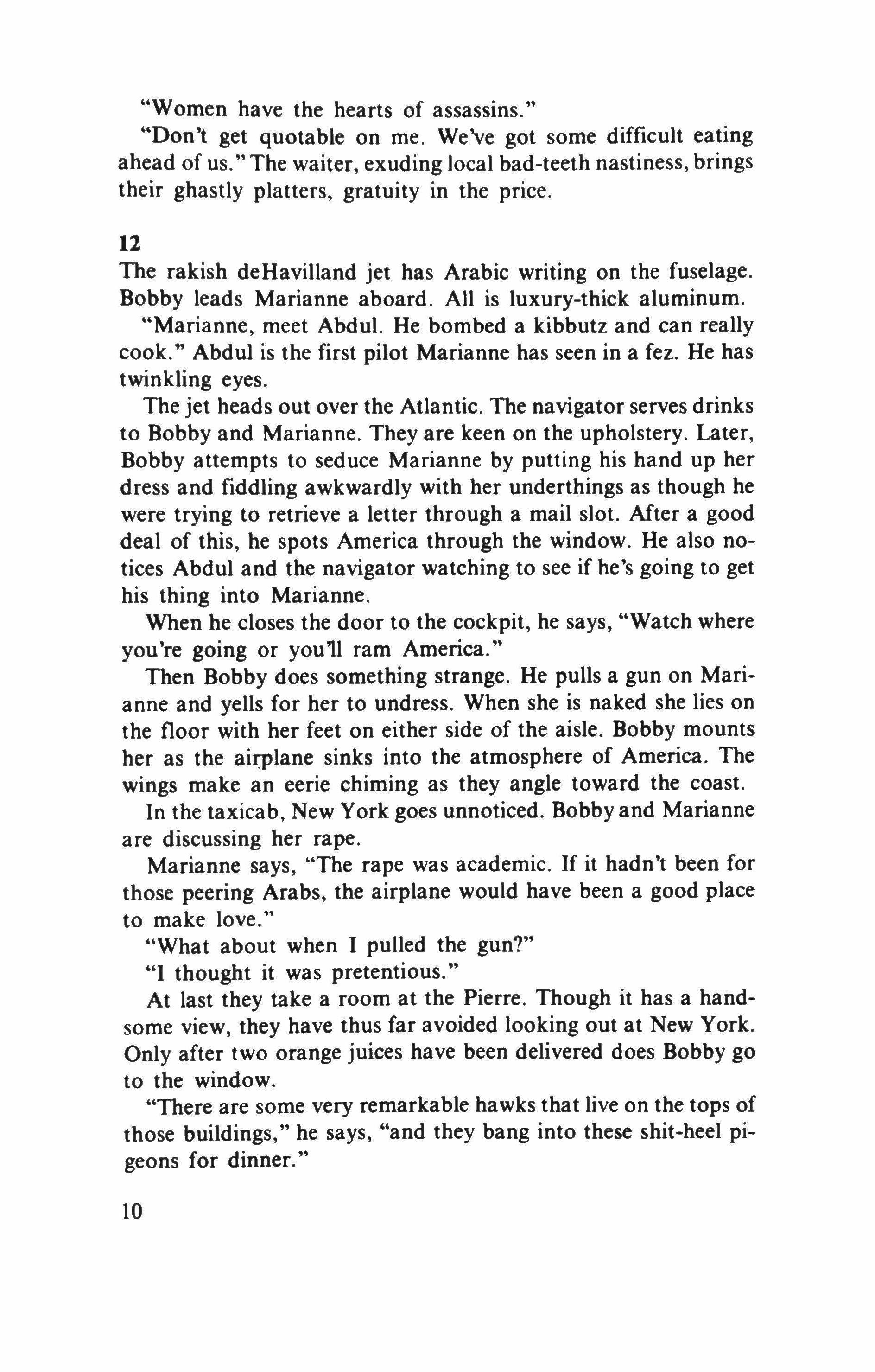
"Women have the hearts of assassins."
"Don't get quotable on me. We've got some difficult eating ahead of us." The waiter, exuding local bad-teeth nastiness, brings their ghastly platters, gratuity in the price.
12
The rakish deHavilland jet has Arabic writing on the fuselage. Bobby leads Marianne aboard. All is luxury-thick aluminum.
"Marianne, meet Abdul. He bombed a kibbutz and can really cook." Abdul is the first pilot Marianne has seen in a fez. He has twinkling eyes.
The jet heads out over the Atlantic. The navigator serves drinks to Bobby and Marianne. They are keen on the upholstery. Later, Bobby attempts to seduce Marianne by putting his hand up her dress and fiddling awkwardly with her underthings as though he were trying to retrieve a letter through a mail slot. After a good deal of this, he spots America through the window. He also notices Abdul and the navigator watching to see if he's going to get his thing into Marianne.
When he closes the door to the cockpit, he says, "Watch where you're going or you11 ram America."
Then Bobby does something strange. He pulls a gun on Marianne and yells for her to undress. When she is naked she lies on the floor with her feet on either side of the aisle. Bobby mounts her as the airplane sinks into the atmosphere of America. The wings make an eerie chiming as they angle toward the coast.
In the taxicab, New York goes unnoticed. Bobby and Marianne are discussing her rape.
Marianne says, "The rape was academic. If it hadn't been for those peering Arabs, the airplane would have been a good place to make love."
"What about when I pulled the gun?" thought it was pretentious."
At last they take a room at the Pierre. Though it has a handsome view, they have thus far avoided looking out at New York. Only after two orange juices have been delivered does Bobby go to the window.
"There are some very remarkable hawks that live on the tops of those buildings," he says, "and they bang into these shit-heel pigeons for dinner."
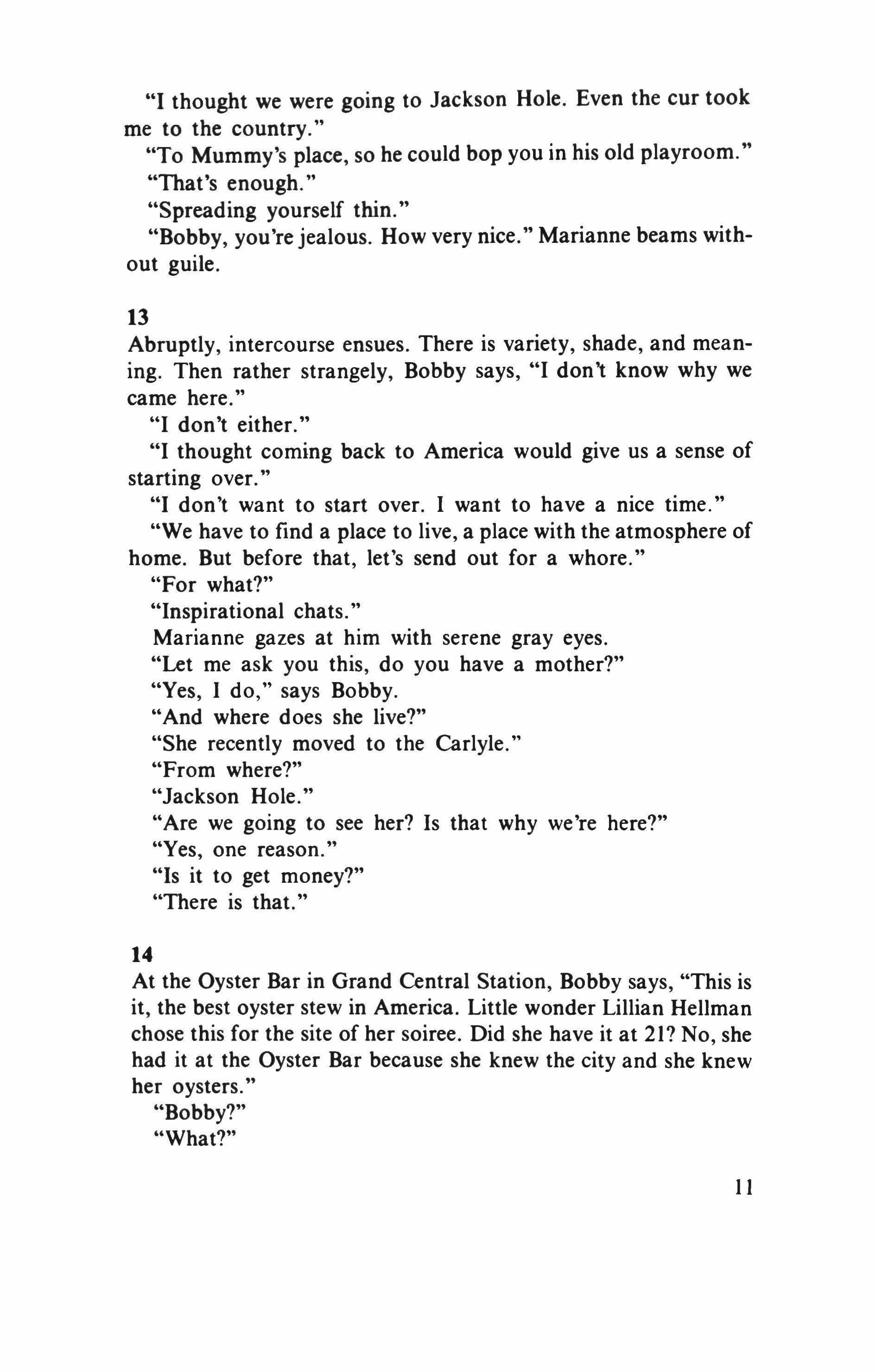
"I thought we were going to Jackson Hole. Even the cur took me to the country."
"To Mummy's place, so he could bop you in his old playroom."
"That's enough."
"Spreading yourself thin."
"Bobby, you're jealous. How very nice." Marianne beams without guile.
13
Abruptly, intercourse ensues. There is variety, shade, and meaning. Then rather strangely, Bobby says, "I don't know why we came here."
"I don't either."
"I thought coming back to America would give us a sense of starting over."
"I don't want to start over. I want to have a nice time."
"We have to find a place to live, a place with the atmosphere of home. But before that, let's send out for a whore."
"For what?"
"Inspirational chats."
Marianne gazes at him with serene gray eyes.
"Let me ask you this, do you have a mother?"
"Yes, I do," says Bobby.
"And where does she live?"
"She recently moved to the Carlyle."
"From where?"
"Jackson Hole."
"Are we going to see her? Is that why we're here?"
"Yes, one reason."
"Is it to get money?"
"There is that."
14
At the Oyster Bar in Grand Central Station, Bobby says, "This is it, the best oyster stew in America. Little wonder Lillian Hellman chose this for the site of her soiree. Did she have it at 2I? No, she had it at the Oyster Bar because she knew the city and she knew her oysters."
"Bobby?"
"What?"
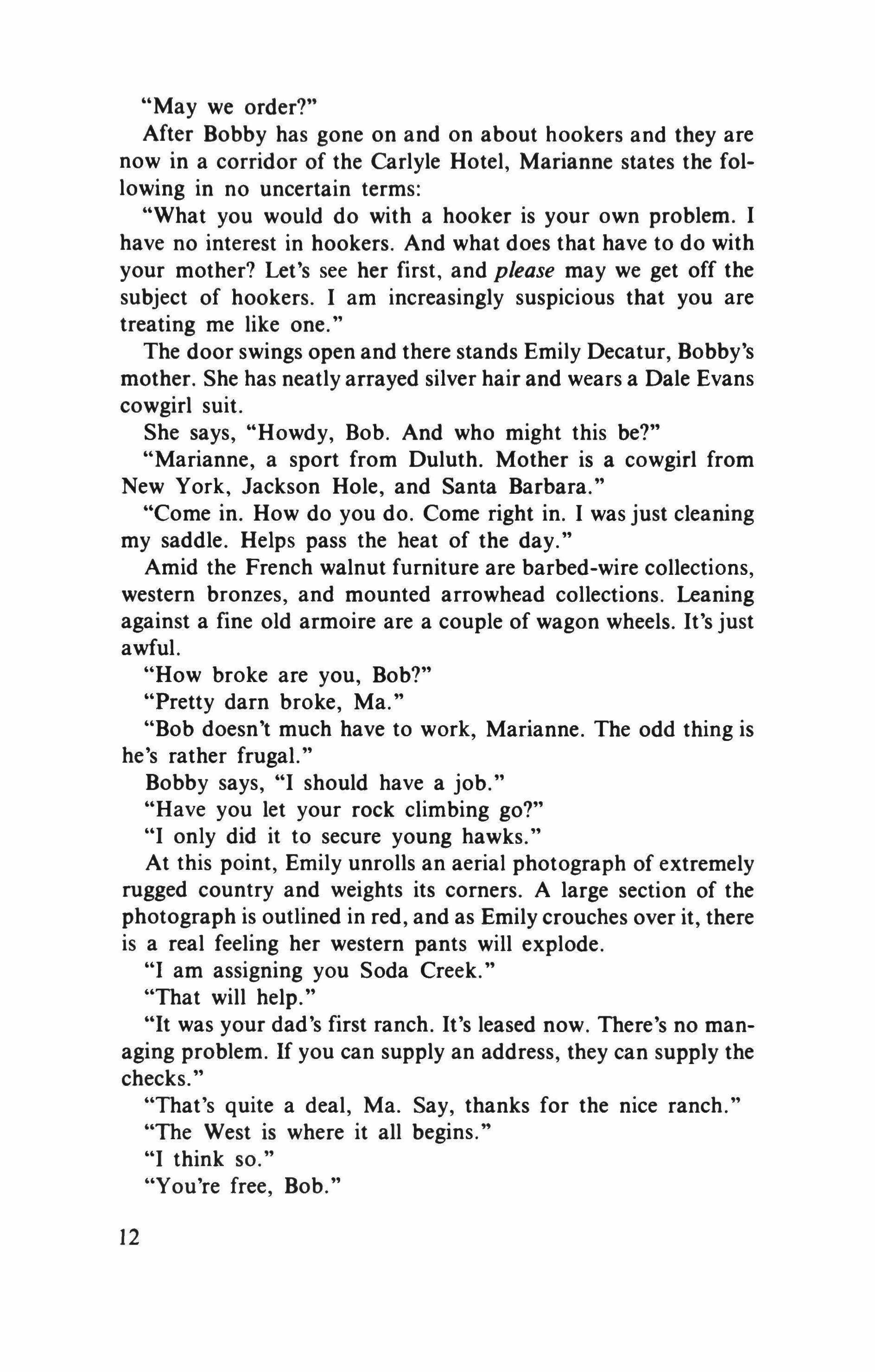
"May we order?"
After Bobby has gone on and on about hookers and they are now in a corridor of the Carlyle Hotel, Marianne states the following in no uncertain terms:
"What you would do with a hooker is your own problem. I have no interest in hookers. And what does that have to do with your mother? Let's see her first, and please may we get off the subject of hookers. I am increasingly suspicious that you are treating me like one."
The door swings open and there stands Emily Decatur, Bobby's mother. She has neatly arrayed silver hair and wears a Dale Evans cowgirl suit.
She says, "Howdy, Bob. And who might this be?"
"Marianne, a sport from Duluth. Mother is a cowgirl from New York, Jackson Hole, and Santa Barbara."
"Come in. How do you do. Come right in. I was just cleaning my saddle. Helps pass the heat of the day."
Amid the French walnut furniture are barbed-wire collections, western bronzes, and mounted arrowhead collections. Leaning against a fine old armoire are a couple of wagon wheels. It's just awful.
"How broke are you, Bob?"
"Pretty darn broke, Ma."
"Bob doesn't much have to work, Marianne. The odd thing is he's rather frugal."
Bobby says, "I should have a job."
"Have you let your rock climbing go?"
"I only did it to secure young hawks."
At this point, Emily unrolls an aerial photograph of extremely rugged country and weights its corners. A large section of the photograph is outlined in red, and as Emily crouches over it, there is a real feeling her western pants will explode.
"I am assigning you Soda Creek."
"That will help."
"It was your dad's first ranch. It's leased now. There's no managing problem. If you can supply an address, they can supply the checks."
"That's quite a deal, Ma. Say, thanks for the nice ranch."
"The West is where it all begins."
"I think so."
"You're free, Bob."
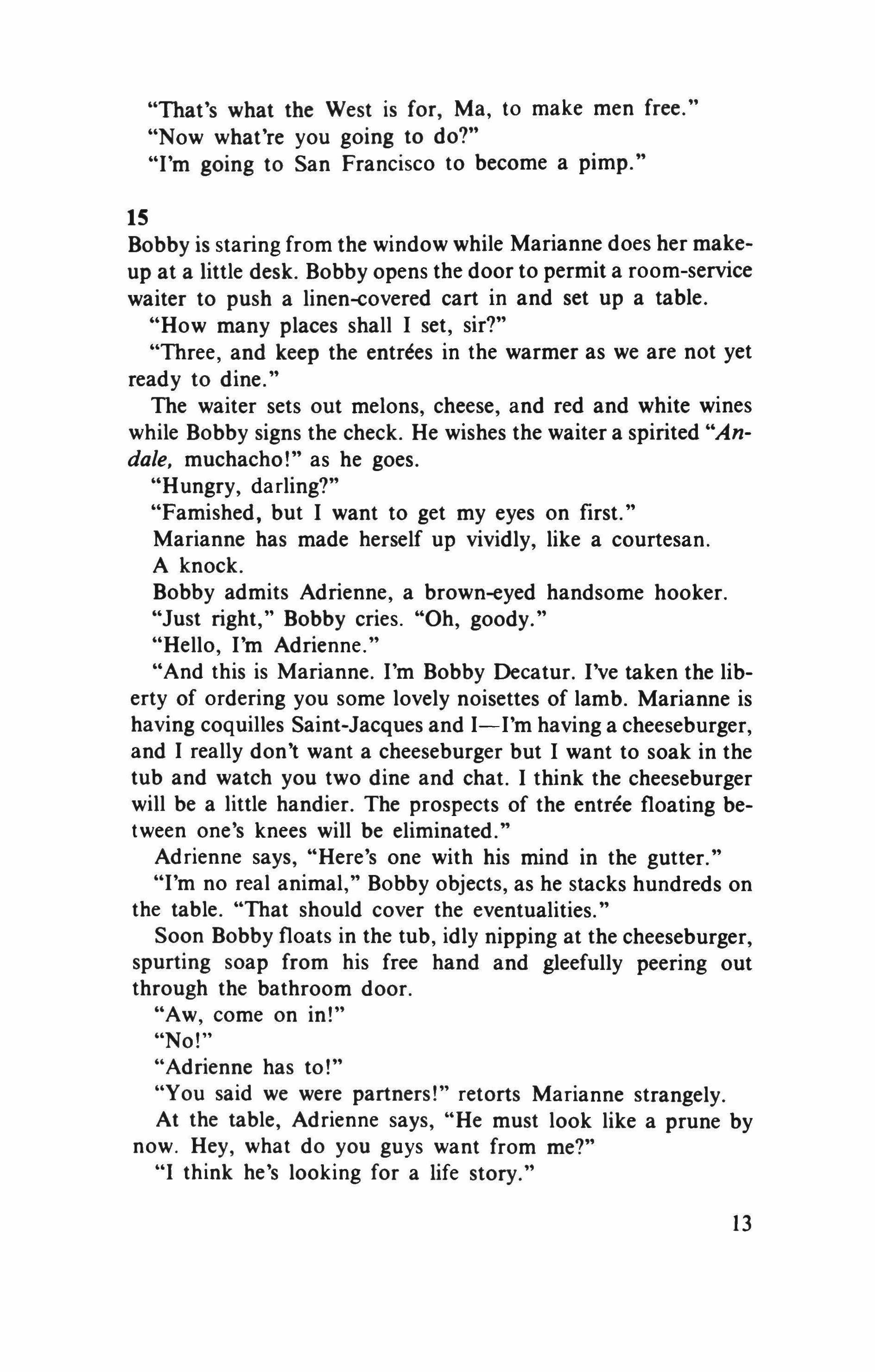
"That's what the West is for, Ma, to make men free."
"Now what're you going to do?"
"I'm going to San Francisco to become a pimp."
15
Bobby is staring from the window while Marianne does her makeup at a little desk. Bobby opens the door to permit a room-service waiter to push a linen-covered cart in and set up a table.
"How many places shall I set, sir?"
"Three, and keep the entrees in the warmer as we are not yet ready to dine."
The waiter sets out melons, cheese, and red and white wines while Bobby signs the check. He wishes the waiter a spirited "Andale. muchacho!" as he goes.
"Hungry, darling?"
"Famished, but I want to get my eyes on first." Marianne has made herself up vividly, like a courtesan. A knock.
Bobby admits Adrienne, a brown-eyed handsome hooker.
"Just right," Bobby cries. "Oh, goody."
"Hello, I'm Adrienne."
"And this is Marianne. I'm Bobby Decatur. I've taken the liberty of ordering you some lovely noisettes of lamb. Marianne is having coquilles Saint-Jacques and I-I'm having a cheeseburger, and I really don't want a cheeseburger but I want to soak in the tub and watch you two dine and chat. I think the cheeseburger will be a little handier. The prospects of the entree floating between one's knees will be eliminated."
Adrienne says, "Here's one with his mind in the gutter."
"I'm no real animal," Bobby objects, as he stacks hundreds on the table. "That should cover the eventualities."
Soon Bobby floats in the tub, idly nipping at the cheeseburger, spurting soap from his free hand and gleefully peering out through the bathroom door.
"Aw, come on in!"
"No!"
"Adrienne has to!"
"You said we were partners!" retorts Marianne strangely. At the table, Adrienne says, "He must look like a prune by now. Hey, what do you guys want from me?"
"I think he's looking for a life story."

"No chance."
Bobby asks Adrienne to undress and bring him some french fries. Even naked, Adrienne seems so different that the french fries acquire the status of clothes. At any rate, they soon make a tiny logjam in the tub. Bobby climbs out, scrutinizes Adrienne, touches a thing or two and wraps himself in a towel. When they come out of the bathroom, Marianne is unclothed.
"Want to see mine?" she asks. "Bobby, you and Adrienne should go to bed together."
"All it takes is money," says Adrienne. Bobby is mortified by this burst of actuality. He commands Marianne to dress.
"Adrienne, look! His face is red!"
"I thought this was his idea."
"He's full of ideas. It's quite lovable. He has a big inheritance, and all he wants is to be a pimp."
"Oh, for God's sake! I'm leaving," says Adrienne.
At the door, Bobby and Marianne call out good night to Adrienne. Then, mute, they stare at one another.
16
"It wasn't my idea."
"I didn't say it was a bad idea."
"At least it didn't cost anything."
Bobby says, "I felt that girl was on the cynical side."
"Nobody knew what you had in mind."
"No, no, no. That's not it. What I wasfeeling was that you two felt I knew but that I had lost my nerve."
"You had."
When Bobby bursts into the hallway, he says, "We'll see about this!"
Marianne follows him to the elevators. A bellhop is standing there, and Bobby says to him, "I want a whore!"
"This isn't that kind of hotel, sir."
"The hell it isn't. I just sent one off. Now I want another."
"No."
"What?"
"No."
In the lobby, Bobby pushes through clients of the hotel to the front desk. The desk clerk, in uniform, has seen all of this he wants to.
"I'm in 418 and I want a whore."
14
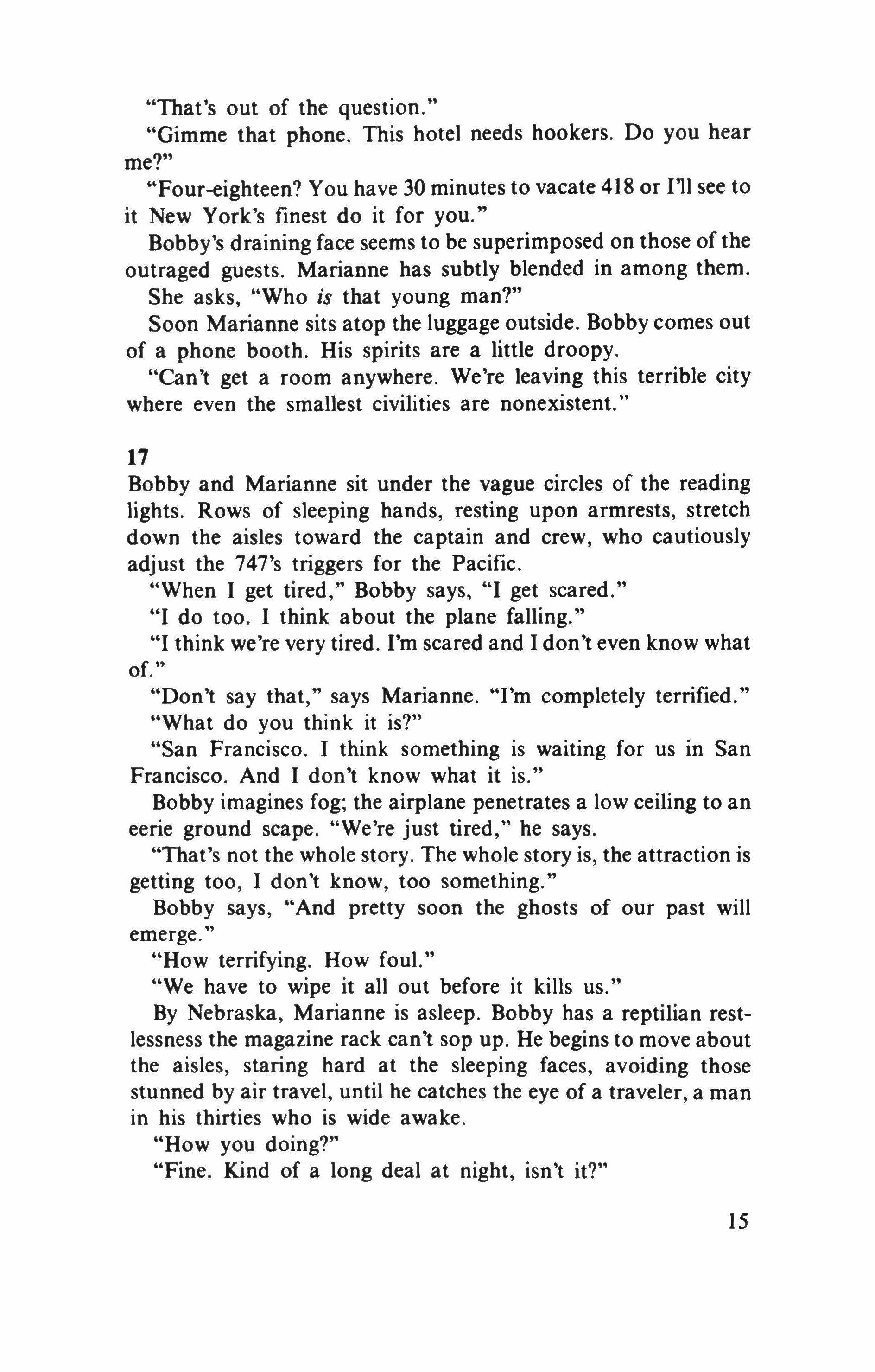
"That's out of the question."
"Gimme that phone. This hotel needs hookers. Do you hear me?"
"Four-eighteen? You have 30 minutes to vacate 418 or I'll see to it New York's finest do it for you."
Bobby's draining face seems to be superimposed on those of the outraged guests. Marianne has subtly blended in among them.
She asks, "Who is that young man?"
Soon Marianne sits atop the luggage outside. Bobby comes out of a phone booth. His spirits are a little droopy.
"Can't get a room anywhere. We're leaving this terrible city where even the smallest civilities are nonexistent."
17
Bobby and Marianne sit under the vague circles of the reading lights. Rows of sleeping hands, resting upon armrests, stretch down the aisles toward the captain and crew, who cautiously adjust the 747's triggers for the Pacific.
"When I get tired," Bobby says, "I get scared."
"I do too. I think about the plane falling."
"I think we're very tired. I'm scared and I don't even know what of."
"Don't say that," says Marianne. "I'm completely terrified."
"What do you think it is?"
"San Francisco. I think something is waiting for us in San Francisco. And I don't know what it is."
Bobby imagines fog; the airplane penetrates a low ceiling to an eerie ground scape. "We're just tired," he says.
"That's not the whole story. The whole story is, the attraction is getting too, I don't know, too something."
Bobby says, "And pretty soon the ghosts of our past will emerge.
"How terrifying. How foul."
"We have to wipe it all out before it kills us."
By Nebraska, Marianne is asleep. Bobby has a reptilian restlessness the magazine rack can't sop up. He begins to move about the aisles, staring hard at the sleeping faces, avoiding those stunned by air travel, until he catches the eye of a traveler, a man in his thirties who is wide awake.
"How you doing?"
"Fine. Kind of a long deal at night, isn't it?"

"Sure is. Can I sit down?"
"Do, go right ahead."
"How come you're going to San Francisco?"
"I'm a maritime lawyer there."
"Married?" Bobby asks. He doesn't seem impertinent.
"Not yet."
"I'm looking for a kind of nice hotel. Something right in the middle of things."
"Stay at the Saint Francis. It's on Union Square. Couldn't be handier. You on business?"
"I just got out of one."
"Which was?"
"Hawk sales," says Bobby. The traveler doesn't show his bafflement.
"Now what're you going to do?"
"Kind of an escort service," says Bobby.
"How do you mean?"
"Arranging for girls."
"I see."
"Does that offend the heck out of your sensibilities?"
The traveler goes ha-ha-ha and says, "No, I just wish you had one with you."
Pause.
"I do."
Pause.
"Oh, God."
"You want her?"
"I don't see how."
"Let her figure it out. Hey! That's what they're for."
"What's it cost?"
"You be the judge. Seat 12A. Wake her and tell her the deal is history. 111 keep your seat until you get back."
The traveler rests his head in deep thought and then says, "Okay."
The traveler gently awakens the beautiful, sleeping Marianne.
"I'm Jonathan."
"Hello."
"I've been speaking to your gentleman friend."
"And?"
"He said to tell you that we've come to an arrangement. May I sit down?"
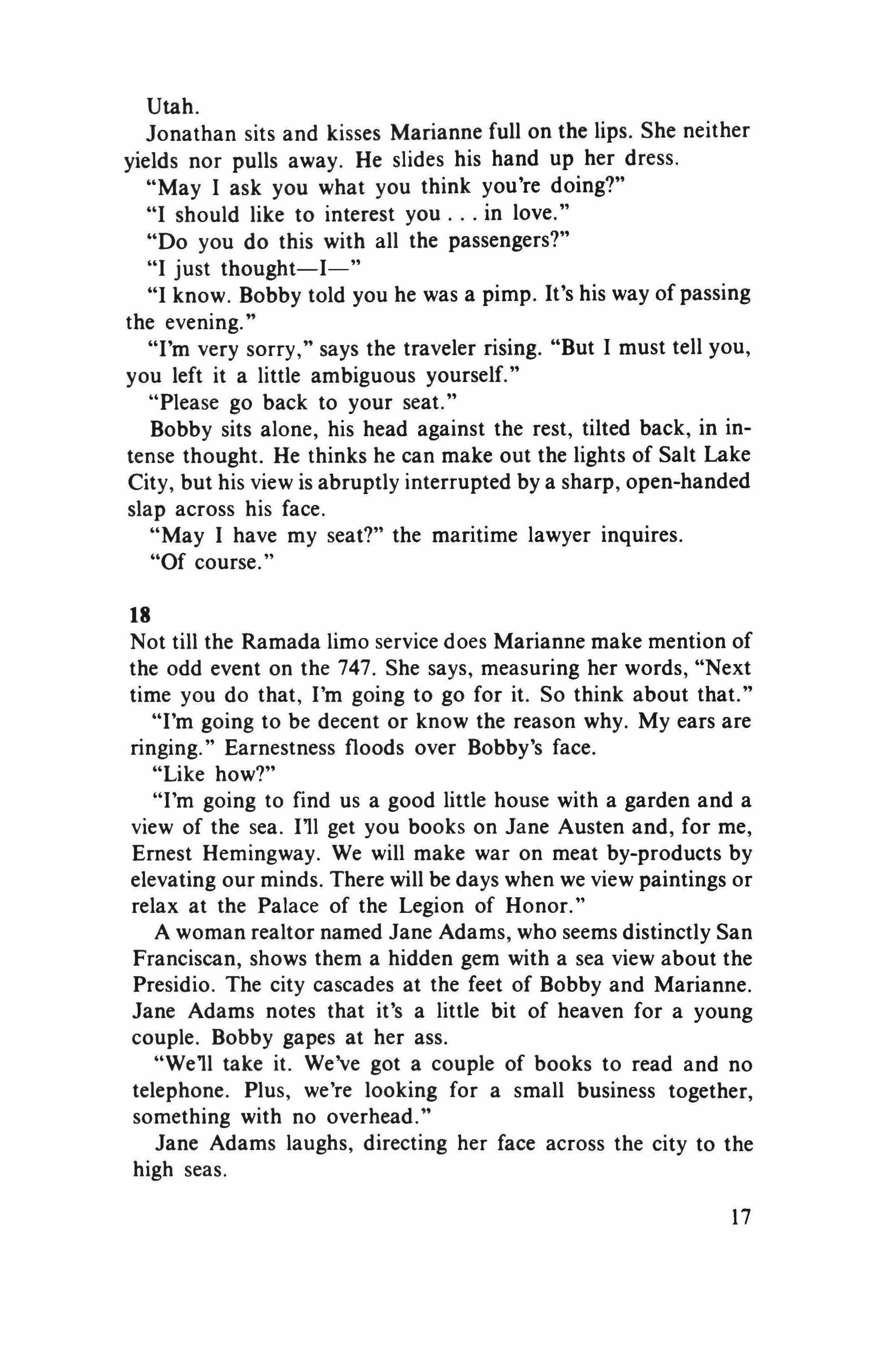
Utah.
Jonathan sits and kisses Marianne full on the lips. She neither yields nor pulls away. He slides his hand up her dress.
"May 1 ask you what you think you're doing?"
"I should like to interest you in love."
"Do you do this with all the passengers?"
"I just thought-I-"
"I know. Bobby told you he was a pimp. It's his way of passing the evening."
"I'm very sorry," says the traveler rising. "But 1 must tell you, you left it a little ambiguous yourself."
"Please go back to your seat."
Bobby sits alone, his head against the rest, tilted back, in intense thought. He thinks he can make out the lights of Salt Lake City, but his view is abruptly interrupted by a sharp, open-handed slap across his face.
"May 1 have my seat?" the maritime lawyer inquires.
"Of course."
18
Not till the Ramada limo service does Marianne make mention of the odd event on the 747. She says, measuring her words, "Next time you do that, I'm going to go for it. So think about that."
"I'm going to be decent or know the reason why. My ears are ringing." Earnestness floods over Bobby's face.
"Like how?"
"I'm going to find us a good little house with a garden and a view of the sea. I'll get you books on Jane Austen and, for me, Ernest Hemingway. We will make war on meat by-products by elevating our minds. There will be days when we view paintings or relax at the Palace of the Legion of Honor."
A woman realtor named Jane Adams, who seems distinctly San Franciscan, shows them a hidden gem with a sea view about the Presidio. The city cascades at the feet of Bobby and Marianne. Jane Adams notes that it's a little bit of heaven for a young couple. Bobby gapes at her ass.
"We'll take it. We've got a couple of books to read and no telephone. Plus, we're looking for a small business together, something with no overhead."
Jane Adams laughs, directing her face across the city to the high seas.
"What are you laughing at?"
"I just had a silly thought. I really can't repeat it."
19
At first, Bobby and Marianne love their little house, with its latticed understudy and the gleaming bladderworts of its small garden. There are absolutely no fleas in the carpet, and the front window is free of decals that would violate the view of the Pacific.
In the morning, pretty, foggy light reveals Marianne carrying coffee and croissants up the wooden stairs; then, side by side in bed, the two agree not to turn on the Today show.
"I can smell the ocean in the curtains," says Marianne.
"That Barbara Walters is a real tire biter," says Bobby. "Is she on that show?"
"Your bathrobe makes me laugh."
"This marmalade was a good year."
"I think so."
"I want a book on the tong wars. Those old tongs had this town in knots. Underground tunnels, opium, captive girls."
"Let's go to Golden Gate Park today."
Really, they should never have gone to Golden Gate Park. When they arrive at the casting pools, Bobby gazes at the welldressed anglers with a certain terror.
"I would like you to note," he says, "that there are no fish in those waters."
"Those men are having a good time."
"Oh, great."
"It's not symbolic, Bobby."
When they get to the buffalo paddock and view the great mementos grazing in the coastal fog, Bobby says: "There you have it. The American West. I feel weak all over."
Bobby seems serious. He demands they go to a drugstore. "I don't feel very well." They buy a thermometer and take his temperature out on the sidewalk: normal. He announces that his hematocrit is out of whack and that he must be losing blood. "I absolutely know that the ratio of red blood cells to plasma is way off. I felt it the minute I spotted those buffalo."
After the blood test, Bobby insists on the upper and lower GJ.
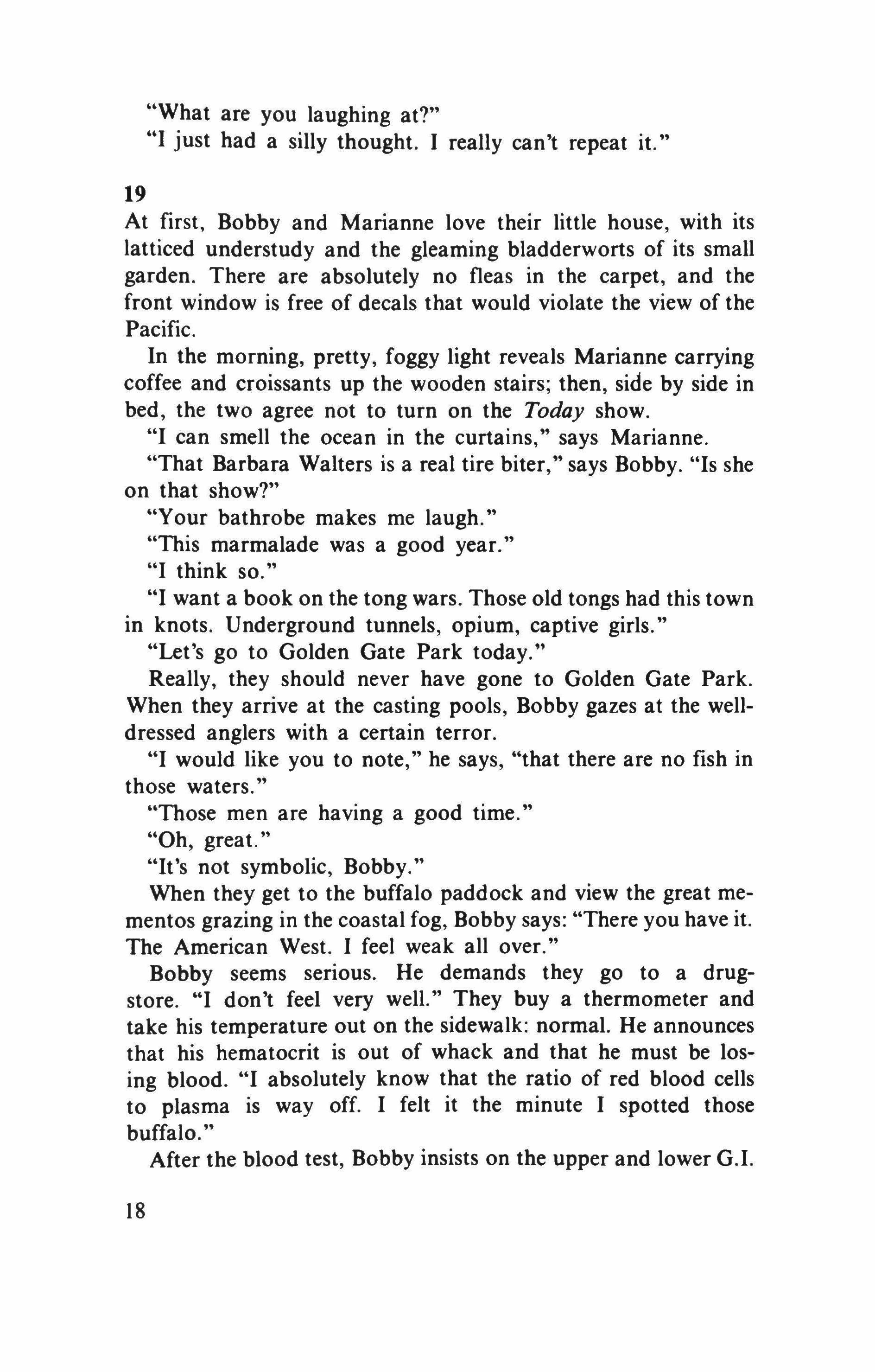
18
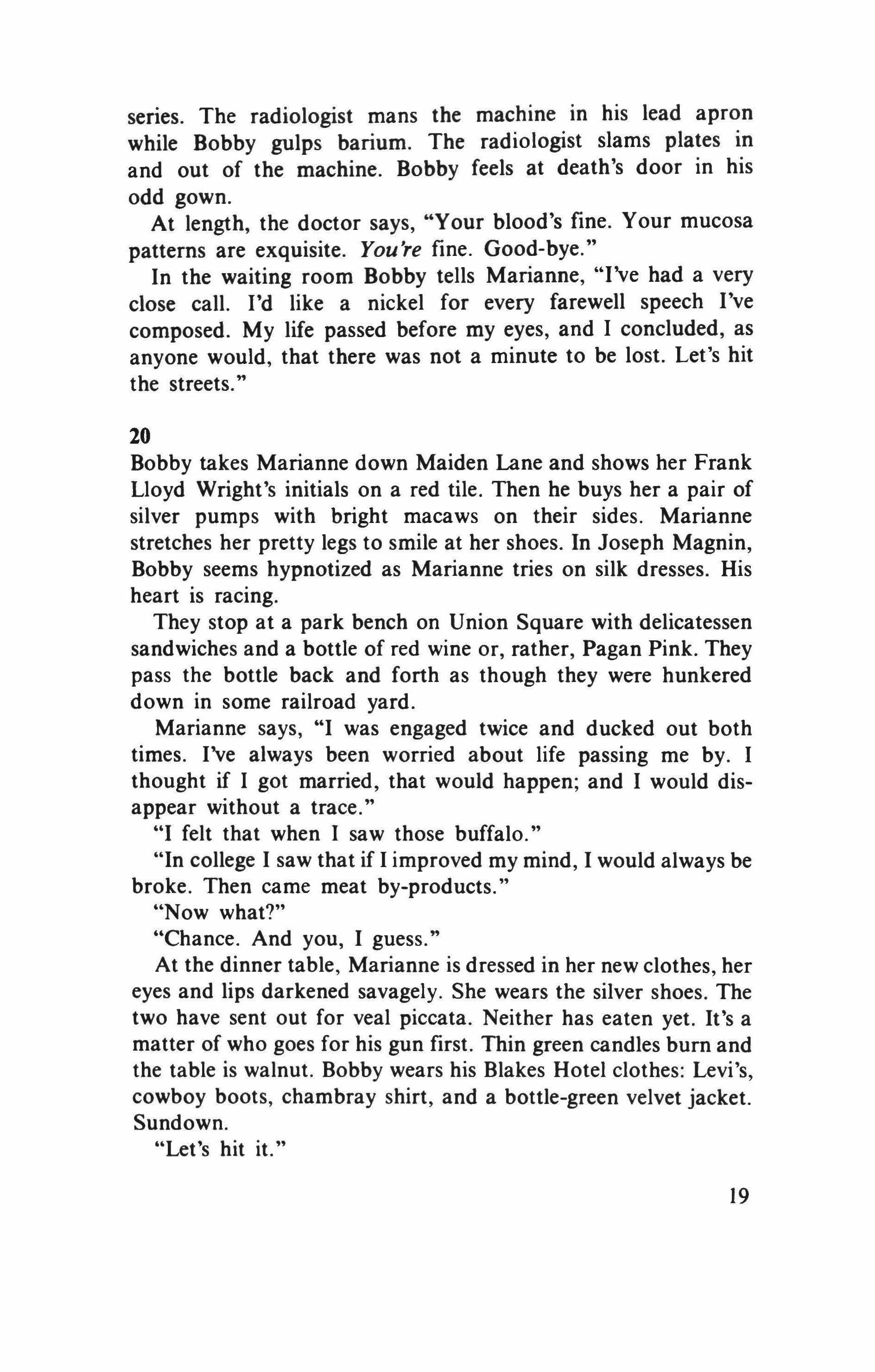
series. The radiologist mans the machine in his lead apron while Bobby gulps barium. The radiologist slams plates in and out of the machine. Bobby feels at death's door in his odd gown.
At length, the doctor says, "Your blood's fine. Your mucosa patterns are exquisite. You Fe fine. Good-bye."
In the waiting room Bobby tells Marianne, "I've had a very close call. I'd like a nickel for every farewell speech I've composed. My life passed before my eyes, and I concluded, as anyone would, that there was not a minute to be lost. Let's hit the streets."
20
Bobby takes Marianne down Maiden Lane and shows her Frank Lloyd Wright's initials on a red tile. Then he buys her a pair of silver pumps with bright macaws on their sides. Marianne stretches her pretty legs to smile at her shoes. In Joseph Magnin, Bobby seems hypnotized as Marianne tries on silk dresses. His heart is racing.
They stop at a park bench on Union Square with delicatessen sandwiches and a bottle of red wine or, rather, Pagan Pink. They pass the bottle back and forth as though they were hunkered down in some railroad yard.
Marianne says, "I was engaged twice and ducked out both times. I've always been worried about life passing me by. I thought if I got married, that would happen; and I would disappear without a trace."
"I felt that when I saw those buffalo."
"In college I saw that if I improved my mind, I would always be broke. Then came meat by-products."
"Now what?"
"Chance. And you, I guess."
At the dinner table, Marianne is dressed in her new clothes, her eyes and lips darkened savagely. She wears the silver shoes. The two have sent out for veal piccata. Neither has eaten yet. It's a matter of who goes for his gun first. Thin green candles burn and the table is walnut. Bobby wears his Blakes Hotel clothes: Levi's, cowboy boots, chambray shirt, and a bottle-green velvet jacket. Sundown.
"Let's hit it."
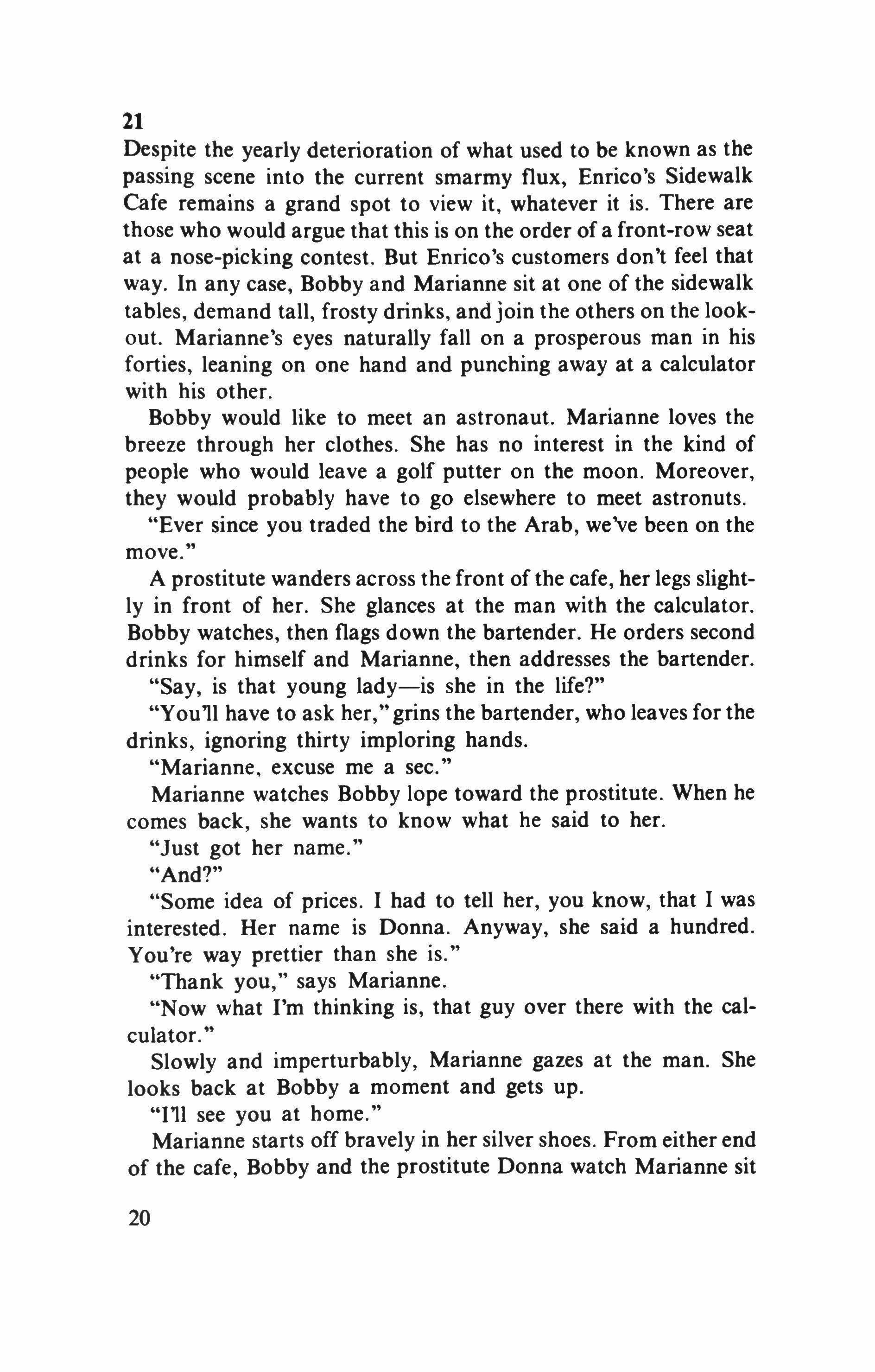
Despite the yearly deterioration of what used to be known as the passing scene into the current smarmy flux, Enrico's Sidewalk Cafe remains a grand spot to view it, whatever it is. There are those who would argue that this is on the order of a front-row seat at a nose-picking contest. But Enrico's customers don't feel that way. In any case, Bobby and Marianne sit at one of the sidewalk tables, demand tall, frosty drinks, and join the others on the lookout. Marianne's eyes naturally fall on a prosperous man in his forties, leaning on one hand and punching away at a calculator with his other.
Bobby would like to meet an astronaut. Marianne loves the breeze through her clothes. She has no interest in the kind of people who would leave a golf putter on the moon. Moreover, they would probably have to go elsewhere to meet astronuts.
"Ever since you traded the bird to the Arab, we've been on the move."
A prostitute wanders across the front of the cafe, her legs slightly in front of her. She glances at the man with the calculator. Bobby watches, then flags down the bartender. He orders second drinks for himself and Marianne, then addresses the bartender.
"Say, is that young lady-is she in the life?"
"You'll have to ask her,"grins the bartender, who leaves for the drinks, ignoring thirty imploring hands.
"Marianne, excuse me a sec."
Marianne watches Bobby lope toward the prostitute. When he comes back, she wants to know what he said to her.
"Just got her name." "And?"
"Some idea of prices. I had to tell her, you know, that I was interested. Her name is Donna. Anyway, she said a hundred. You're way prettier than she is."
"Thank you," says Marianne.
"Now what I'm thinking is, that guy over there with the calculator.
Slowly and imperturbably, Marianne gazes at the man. She looks back at Bobby a moment and gets up.
"I'll see you at home."
Marianne starts off bravely in her silver shoes. From either end of the cafe, Bobby and the prostitute Donna watch Marianne sit

down with the man who smiles and puts the calculator in his jacket pocket. Marianne sips his drink.
Suddenly, down Broadway, with Stetson hats and cameras, comes a mob of Japanese tourists. Bobby, whose heart is already pounding, panics as they flood the area between him and Marianne. He jumps up in complete fear and begins pushing through them. When he gets to the other side, Marianne and the man with the calculator are gone. He goes back to his table.
"Hey."
Dazed, Bobby looks up. It's Donna.
"What?"
"You get a price out of me then send your trick to the guy. I don't think that's too nice, 'n' that. Can I sit down?"
"Yuh. "
"How many ladies you got?"
"Just the one."
"What're you so depressed about?"
"Drinking these things in the sun."
"I mean, your hands are shaking."
"I've got Parkinson's disease."
"You want to stop by to my place? You look like you could use a pick-me-up."
"Yeah, all right."
They go up Broadway, past the Hotel Du Midi, the Basque restaurant, past the Chinese novelty shops, more or less in silence as Bobby continues to bear his stricken look; then up an alley to a stairway, a catwalk, and then a door.
They enter a small, neat flat with gridded outside light coming in from above, some books, and, sitting in a Mexican goatskin sling chair, a very bad-looking man named Chino, whose name, a nickname, comes from a correctional facility in southern California. His real name is Donald Arthur Jones. He waves with professional indolence, but still manages to look dangerous. He says:
"Hey, Donna. Look, am I in the way? Just say so. Who's our friend?"
"I don't know, baby. But you assured me Enrico's was your spot. And this guy and his whore run off a customer on me about five minutes ago, which embarrasses me on your behalf."
"Gimrne your name."
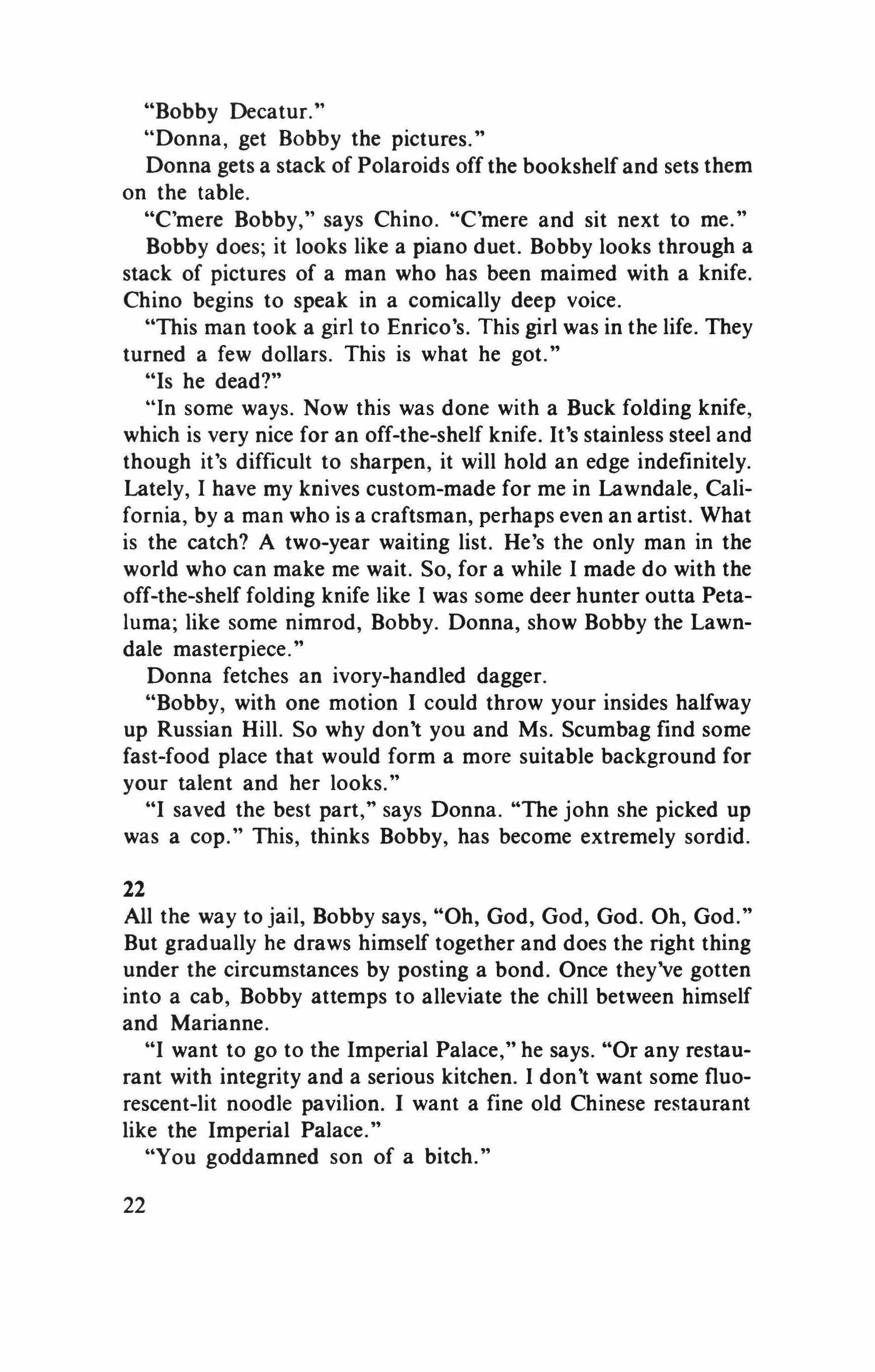
"Bobby Decatur."
"Donna, get Bobby the pictures."
Donna gets a stack of Polaroids off the bookshelf and sets them on the table.
"C'mere Bobby," says Chino. "C'mere and sit next to me."
Bobby does; it looks like a piano duet. Bobby looks through a stack of pictures of a man who has been maimed with a knife. Chino begins to speak in a comically deep voice.
"This man took a girl to Enrico's. This girl was in the life. They turned a few dollars. This is what he got."
"Is he dead?"
"In some ways. Now this was done with a Buck folding knife, which is very nice for an off-the-shelf knife. It's stainless steel and though it's difficult to sharpen, it will hold an edge indefinitely. Lately, I have my knives custom-made for me in Lawndale, California, by a man who is a craftsman, perhaps even an artist. What is the catch? A two-year waiting list. He's the only man in the world who can make me wait. So, for a while I made do with the off-the-shelf folding knife like I was some deer hunter outta Petaluma; like some nimrod, Bobby. Donna, show Bobby the Lawndale masterpiece."
Donna fetches an ivory-handled dagger.
"Bobby, with one motion I could throw your insides halfway up Russian Hill. So why don't you and Ms. Scumbag find some fast-food place that would form a more suitable background for your talent and her looks."
"I saved the best part," says Donna. "The john she picked up was a cop." This, thinks Bobby, has become extremely sordid.
22
All the way to jail, Bobby says, "Oh, God, God, God. Oh, God." But gradually he draws himself together and does the right thing under the circumstances by posting a bond. Once they've gotten into a cab, Bobby attemps to alleviate the chill between himself and Marianne.
"I want to go to the Imperial Palace," he says. "Or any restaurant with integrity and a serious kitchen. I don't want some fluorescent-lit noodle pavilion. I want a fine old Chinese restaurant like the Imperial Palace."
"You goddamned son of a bitch."
22
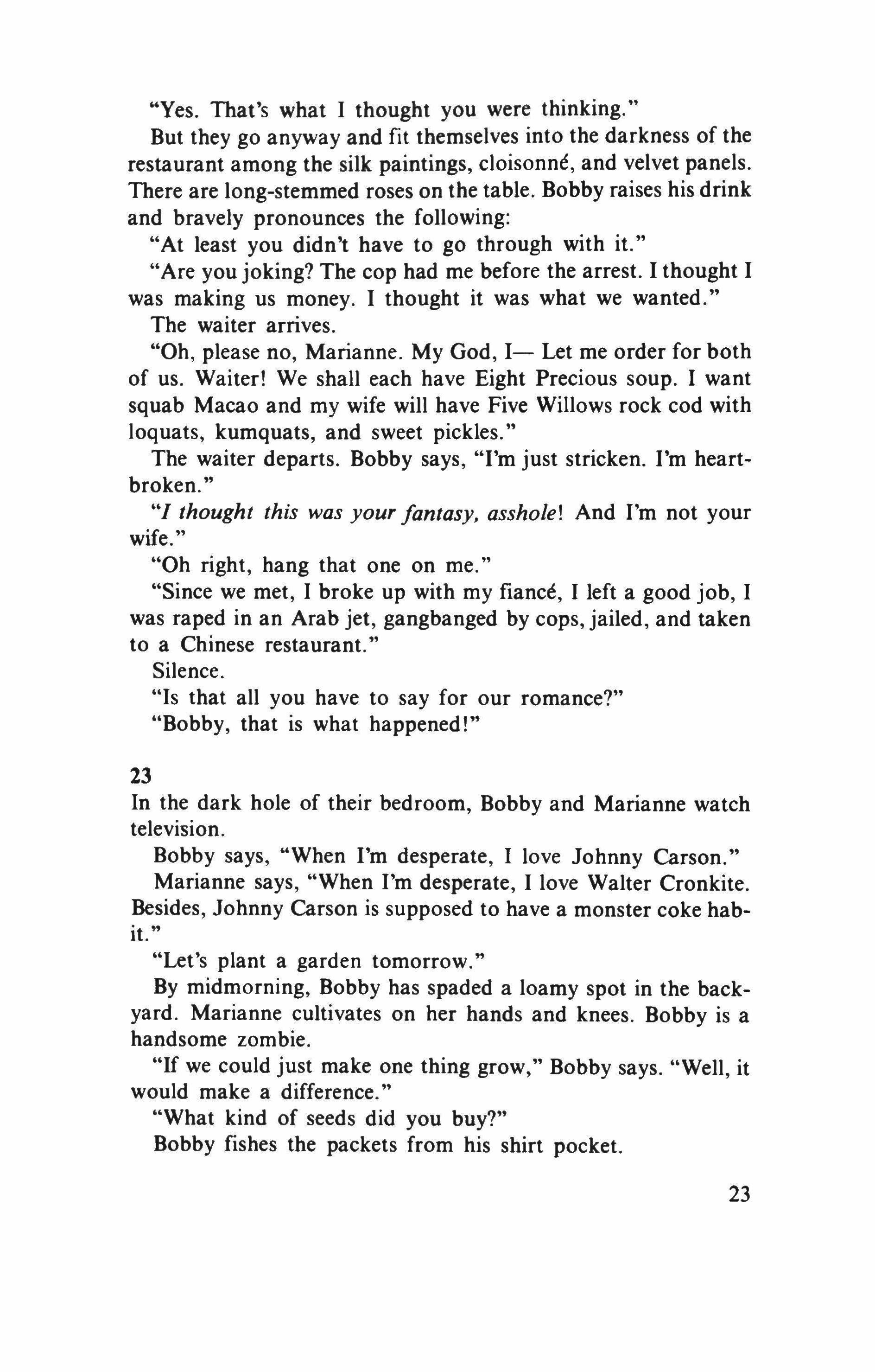
"Yes. That's what I thought you were thinking."
But they go anyway and fit themselves into the darkness of the restaurant among the silk paintings, cloisonne, and velvet panels. There are long-stemmed roses on the table. Bobby raises his drink and bravely pronounces the following:
"At least you didn't have to go through with it."
"Are you joking? The cop had me before the arrest. I thought I was making us money. I thought it was what we wanted."
The waiter arrives.
"Oh, please no, Marianne. My God, 1- Let me order for both of us. Waiter! We shall each have Eight Precious soup. I want squab Macao and my wife will have Five Willows rock cod with loquats, kumquats, and sweet pickles."
The waiter departs. Bobby says, "I'm just stricken. I'm heartbroken."
"I thought this was your fantasy, asshole! And I'm not your wife.
"Oh right, hang that one on me."
"Since we met, I broke up with my fiance, I left a good job, I was raped in an Arab jet, gangbanged by cops, jailed, and taken to a Chinese restaurant."
Silence.
"Is that all you have to say for our romance?"
"Bobby, that is what happened!"
23
In the dark hole of their bedroom, Bobby and Marianne watch television.
Bobby says, "When I'm desperate, I love Johnny Carson." Marianne says, "When I'm desperate, I love Walter Cronkite. Besides, Johnny Carson is supposed to have a monster coke habit.
"Let's plant a garden tomorrow."
By midmorning, Bobby has spaded a loamy spot in the backyard. Marianne cultivates on her hands and knees. Bobby is a handsome zombie.
"If we could just make one thing grow," Bobby says. "Well, it would make a difference."
"What kind of seeds did you buy?"
Bobby fishes the packets from his shirt pocket.

"Radishes, peonies, watermelon, and what's this? Some kind of banana or something."
"Well, you can count on the radishes. Give me those."
"You can't have a garden with just radishes."
"What's the matter with you, Bobby? That's nothing to get upset about. Let me see these. That's summer squash, Bobby. That's not a banana. Can't you see that?"
"I don't care."
"Don't you want to have a garden?"
"No.
24
Bobby and Marianne are lucky enough to join the happy browsers at Ghirardelli Square, a place well known for the character of its great chocolates and candies that make one's fillings ring like a carillon. Bobby's usual propensity not to be normal seems far away today and he holds Marianne's hand in blind Pepsi-generation euphoria, driving not a few walkers from the crowded sidewalk. It has come time for him to explain it all to Marianne.
"This is one of those places where people pretend that there is no unhappiness. There can be unhappiness at Fisherman's Wharf but not at Ghirardelli Square. At Fisherman's Wharf, though you may bump into Joe DiMaggio, that still does not prevent you from toppling into the sea. But here you will never meet anyone bad, or have anything bad happen to you."
"There is no unhappiness at Neiman-Marcus," Marianne replies. "Many cities have little areas of no unhappiness. Even the Russians are beginning to build them."
"Marianne, I'm lucky to have such a smart girl."
By the time they get home again, Marianne is filled with a cheerful interest in making something of Bobby's banana garden, while clouds have once more settled on Bobby's face. In fact, he's soon indoors unwrapping his Smith and Wesson from an oily rag on the walnut surface of the dining-room table. He loads every chamber with the copper and lead gleaming bullets, snaps the cylinder back, and puts the gun in his pocket.
"Babe, I'm going to the store. Back in an hour."
Bobby scrutinizes the customers at Enrico's until he finds the hooker Donna. He speaks affably to her, even though she greets him as "the new kid in town."
24
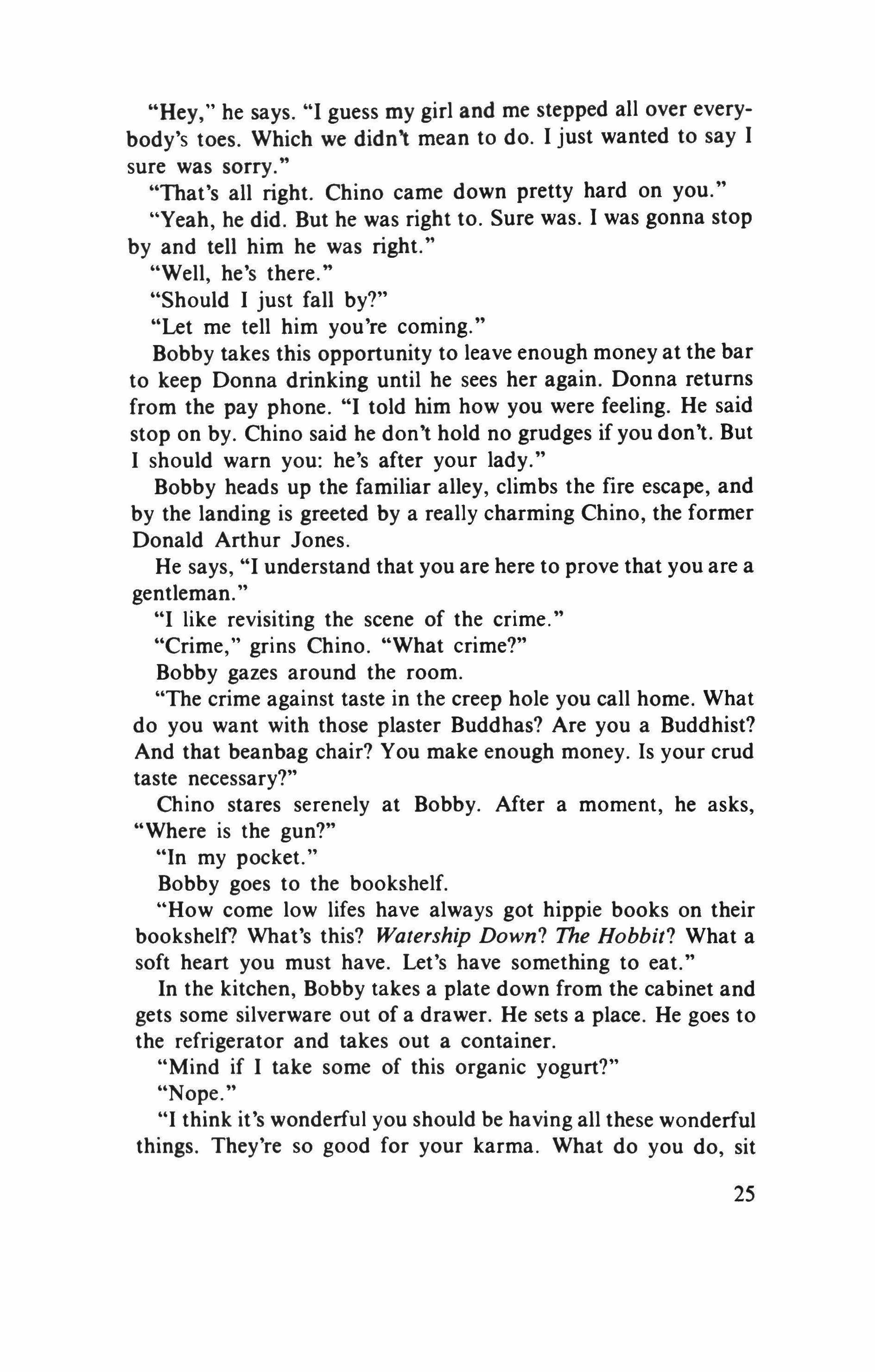
"Hey," he says. "I guess my girl and me stepped all over everybody's toes. Which we didn't mean to do. I just wanted to say I sure was sorry."
"That's all right. Chino came down pretty hard on you."
"Yeah, he did. But he was right to. Sure was. I was gonna stop by and tell him he was right."
"Well, he's there."
"Should I just fall by?"
"Let me tell him you're coming."
Bobby takes this opportunity to leave enough money at the bar to keep Donna drinking until he sees her again. Donna returns from the pay phone. "I told him how you were feeling. He said stop on by. Chino said he don't hold no grudges if you don't. But I should warn you: he's after your lady."
Bobby heads up the familiar alley, climbs the fire escape, and by the landing is greeted by a really charming Chino, the former Donald Arthur Jones.
He says, "I understand that you are here to prove that you are a gentleman.
"I like revisiting the scene of the crime."
"Crime," grins Chino. "What crime?"
Bobby gazes around the room.
"The crime against taste in the creep hole you call home. What do you want with those plaster Buddhas? Are you a Buddhist? And that beanbag chair? You make enough money. Is your crud taste necessary?"
Chino stares serenely at Bobby. After a moment, he asks, "Where is the gun?"
"In my pocket."
Bobby goes to the bookshelf.
"How come low lifes have always got hippie books on their bookshelf? What's this? Watership Down? The Hobbit? What a soft heart you must have. Let's have something to eat."
In the kitchen, Bobby takes a plate down from the cabinet and gets some silverware out of a drawer. He sets a place. He goes to the refrigerator and takes out a container.
"Mind if I take some of this organic yogurt?"
"Nope."
"I think it's wonderful you should be having all these wonderful things. They're so good for your karma. What do you do, sit 25
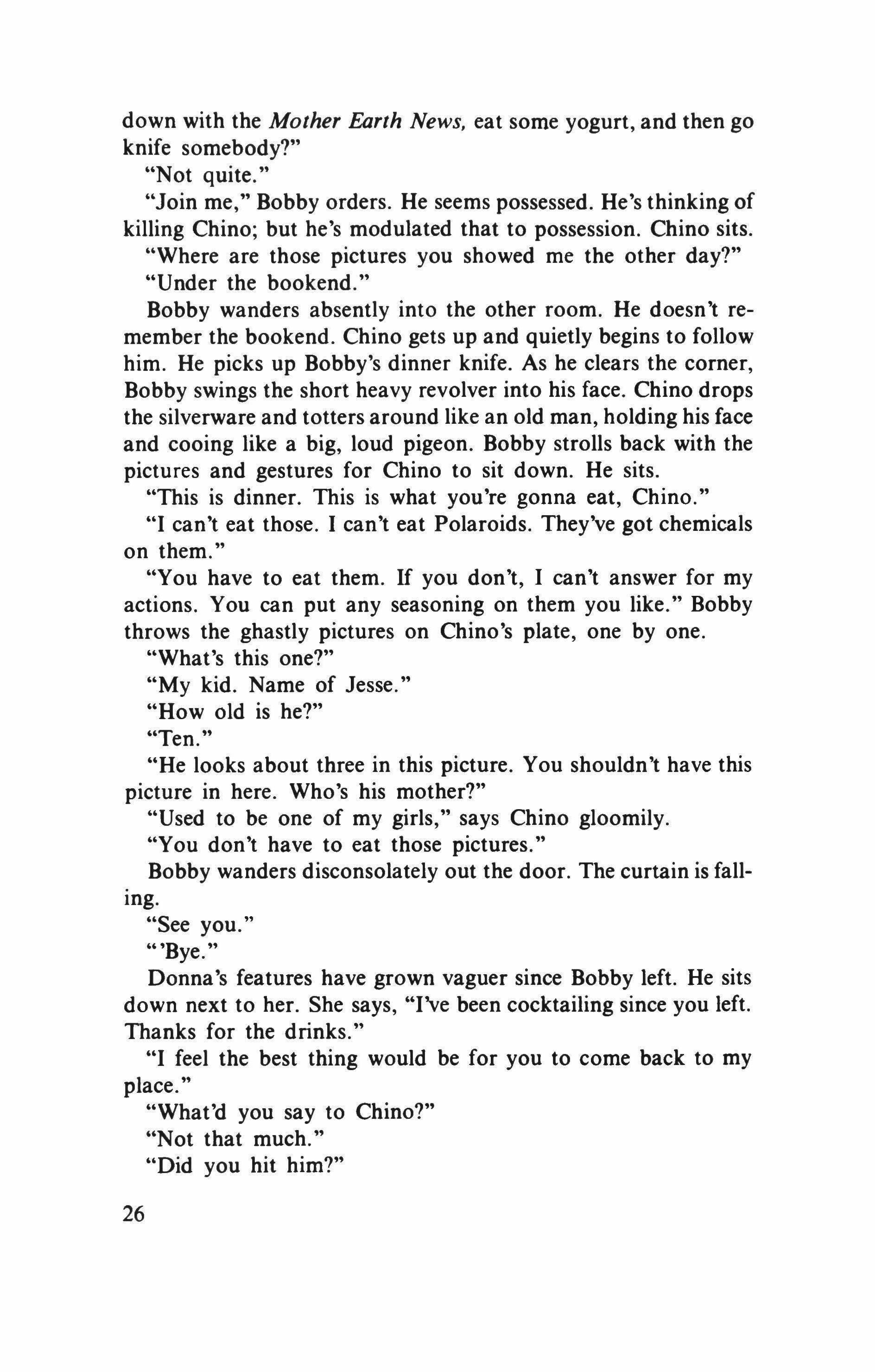
down with the Mother Earth News, eat some yogurt, and then go knife somebody?"
"Not quite."
"Join me," Bobby orders. He seems possessed. He's thinking of killing Chino; but he's modulated that to possession. Chino sits.
"Where are those pictures you showed me the other day?"
"Under the bookend."
Bobby wanders absently into the other room. He doesn't remember the bookend. Chino gets up and quietly begins to follow him. He picks up Bobby's dinner knife. As he clears the corner, Bobby swings the short heavy revolver into his face. Chino drops the silverware and totters around like an old man, holding his face and cooing like a big, loud pigeon. Bobby strolls back with the pictures and gestures for Chino to sit down. He sits.
"This is dinner. This is what you're gonna eat, Chino."
"I can't eat those. I can't eat Polaroids. They've got chemicals on them."
"You have to eat them. If you don't, I can't answer for my actions. You can put any seasoning on them you like." Bobby throws the ghastly pictures on Chino's plate, one by one.
"What's this one?"
"My kid. Name of Jesse."
"How old is he?"
"Ten."
"He looks about three in this picture. You shouldn't have this picture in here. Who's his mother?"
"Used to be one of my girls," says Chino gloomily.
"You don't have to eat those pictures."
Bobby wanders disconsolately out the door. The curtain is falling.
"See you."
·"Bye.
Donna's features have grown vaguer since Bobby left. He sits down next to her. She says, "I've been cocktailing since you left. Thanks for the drinks."
"I feel the best thing would be for you to come back to my place.
"What'd you say to Chino?"
"Not that much."
"Did you hit him?"
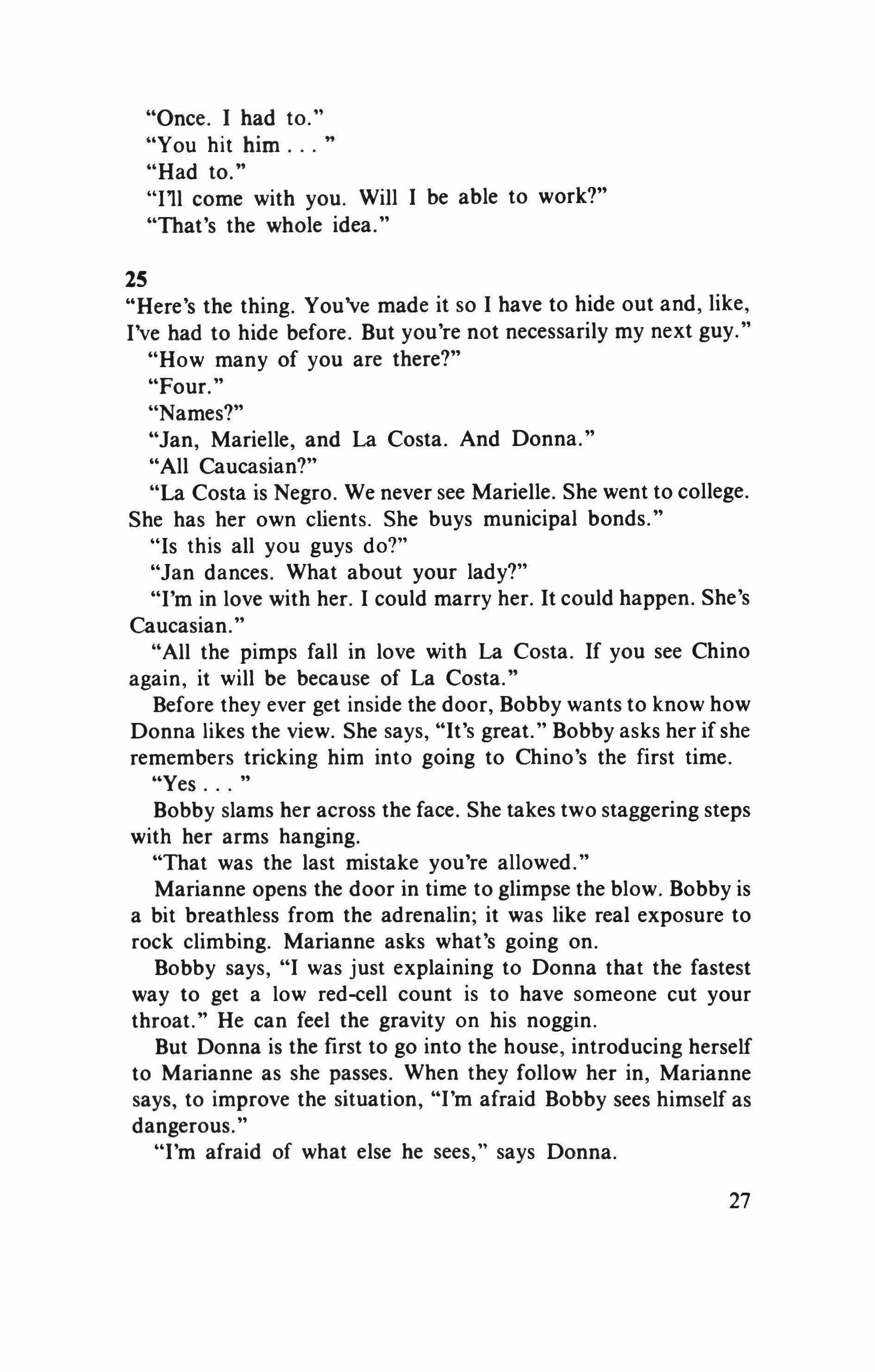
"Once. I had to."
"You hit him
"Had to."
"I'll come with you. Will I be able to work?"
"That's the whole idea."
25
"Here's the thing. You've made it so I have to hide out and, like, I've had to hide before. But you're not necessarily my next guy."
"How many of you are there?"
"Four. "
"Names?"
"Jan, Marielle, and La Costa. And Donna."
"All Caucasian?"
"La Costa is Negro. We never see Marielle. She went to college. She has her own clients. She buys municipal bonds."
"Is this all you guys do?"
"Jan dances. What about your lady?"
"I'm in love with her. I could marry her. It could happen. She's Caucasian. "
"All the pimps fall in love with La Costa. If you see Chino again, it will be because of La Costa."
Before they ever get inside the door, Bobby wants to know how Donna likes the view. She says, "It's great." Bobby asks her if she remembers tricking him into going to Chino's the first time.
"Yes
Bobby slams her across the face. She takes two staggering steps with her arms hanging.
"That was the last mistake you're allowed."
Marianne opens the door in time to glimpse the blow. Bobby is a bit breathless from the adrenalin; it was like real exposure to rock climbing. Marianne asks what's going on.
Bobby says, "I was just explaining to Donna that the fastest way to get a low red-cell count is to have someone cut your throat." He can feel the gravity on his noggin.
But Donna is the first to go into the house, introducing herself to Marianne as she passes. When they follow her in, Marianne says, to improve the situation, "I'm afraid Bobby sees himself as dangerous.
"I'm afraid of what else he sees," says Donna.
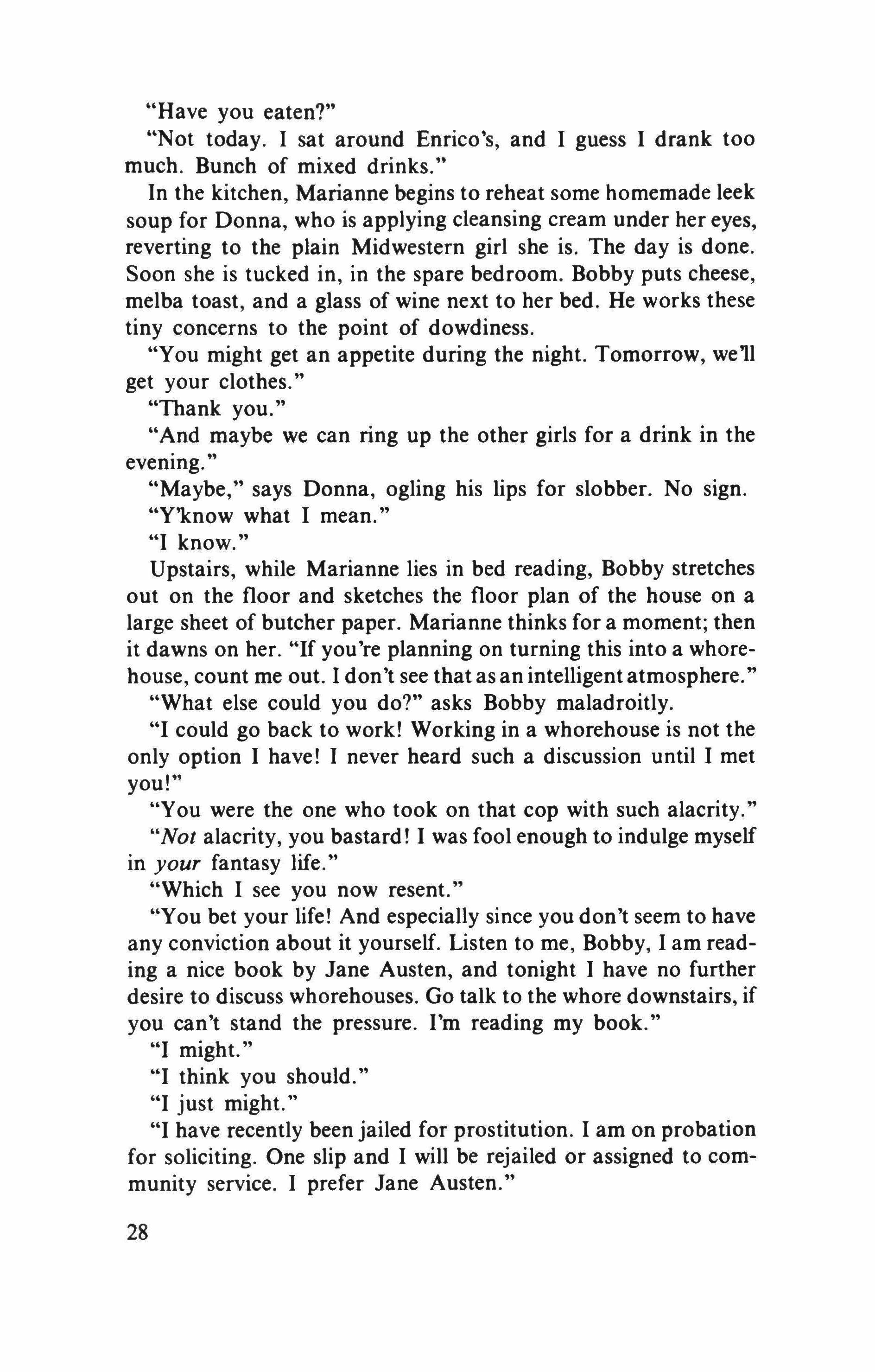
"Have you eaten?"
"Not today. I sat around Enrico's, and I guess I drank too much. Bunch of mixed drinks."
In the kitchen, Marianne begins to reheat some homemade leek soup for Donna, who is applying cleansing cream under her eyes, reverting to the plain Midwestern girl she is. The day is done. Soon she is tucked in, in the spare bedroom. Bobby puts cheese, melba toast, and a glass of wine next to her bed. He works these tiny concerns to the point of dowdiness.
"You might get an appetite during the night. Tomorrow, we'll get your clothes."
"Thank you."
"And maybe we can ring up the other girls for a drink in the evening."
"Maybe," says Donna, ogling his lips for slobber. No sign.
"Y'know what I mean."
"I know."
Upstairs, while Marianne lies in bed reading, Bobby stretches out on the floor and sketches the floor plan of the house on a large sheet of butcher paper. Marianne thinks for a moment; then it dawns on her. "If you're planning on turning this into a whorehouse, count me out. I don't see that as an intelligentatmosphere."
"What else could you do?" asks Bobby maladroitly.
"I could go back to work! Working in a whorehouse is not the only option I have! I never heard such a discussion until I met you!"
"You were the one who took on that cop with such alacrity."
"Not alacrity, you bastard! I was fool enough to indulge myself in your fantasy life."
"Which I see you now resent."
"You bet your life! And especially since you don't seem to have any conviction about it yourself. Listen to me, Bobby, I am reading a nice book by Jane Austen, and tonight I have no further desire to discuss whorehouses. Go talk to the whore downstairs, if you can't stand the pressure. I'm reading my book."
"I might."
"I think you should."
"I just might."
"I have recently been jailed for prostitution. I am on probation for soliciting. One slip and I will be rejailed or assigned to community service. I prefer Jane Austen."
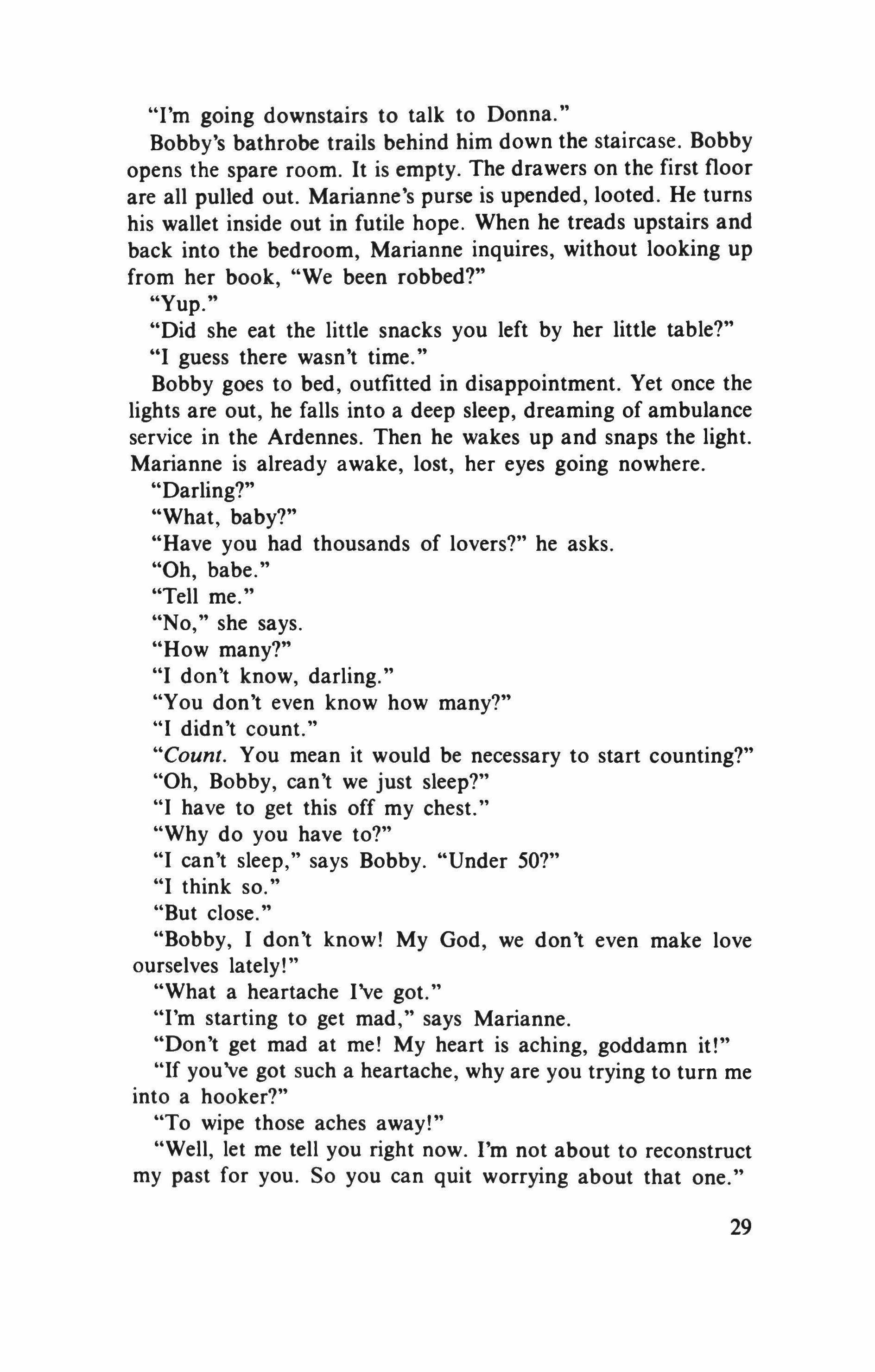
"I'm going downstairs to talk to Donna."
Bobby's bathrobe trails behind him down the staircase. Bobby opens the spare room. It is empty. The drawers on the first floor are all pulled out. Marianne's purse is upended, looted. He turns his wallet inside out in futile hope. When he treads upstairs and back into the bedroom, Marianne inquires, without looking up from her book, "We been robbed?"
"Yup."
"Did she eat the little snacks you left by her little table?"
"I guess there wasn't time."
Bobby goes to bed, outfitted in disappointment. Yet once the lights are out, he falls into a deep sleep, dreaming of ambulance service in the Ardennes. Then he wakes up and snaps the light. Marianne is already awake, lost, her eyes going nowhere.
"Darling?"
"What, baby?"
"Have you had thousands of lovers?" he asks.
"Oh, babe."
"Tell me."
"No," she says.
"How many?"
"I don't know, darling."
"You don't even know how many?"
"I didn't count."
"Count. You mean it would be necessary to start counting?"
"Oh, Bobby, can't we just sleep?"
"I have to get this off my chest."
"Why do you have to?"
"I can't sleep," says Bobby. "Under 50?"
"I think so."
"But close."
"Bobby, 1 don't know! My God, we don't even make love ourselves lately!"
"What a heartache I've got."
"I'm starting to get mad," says Marianne.
"Don't get mad at me! My heart is aching, goddamn it!"
"If you've got such a heartache, why are you trying to turn me into a hooker?"
"To wipe those aches away!"
"Well, let me tell you right now. I'm not about to reconstruct my past for you. So you can quit worrying about that one."
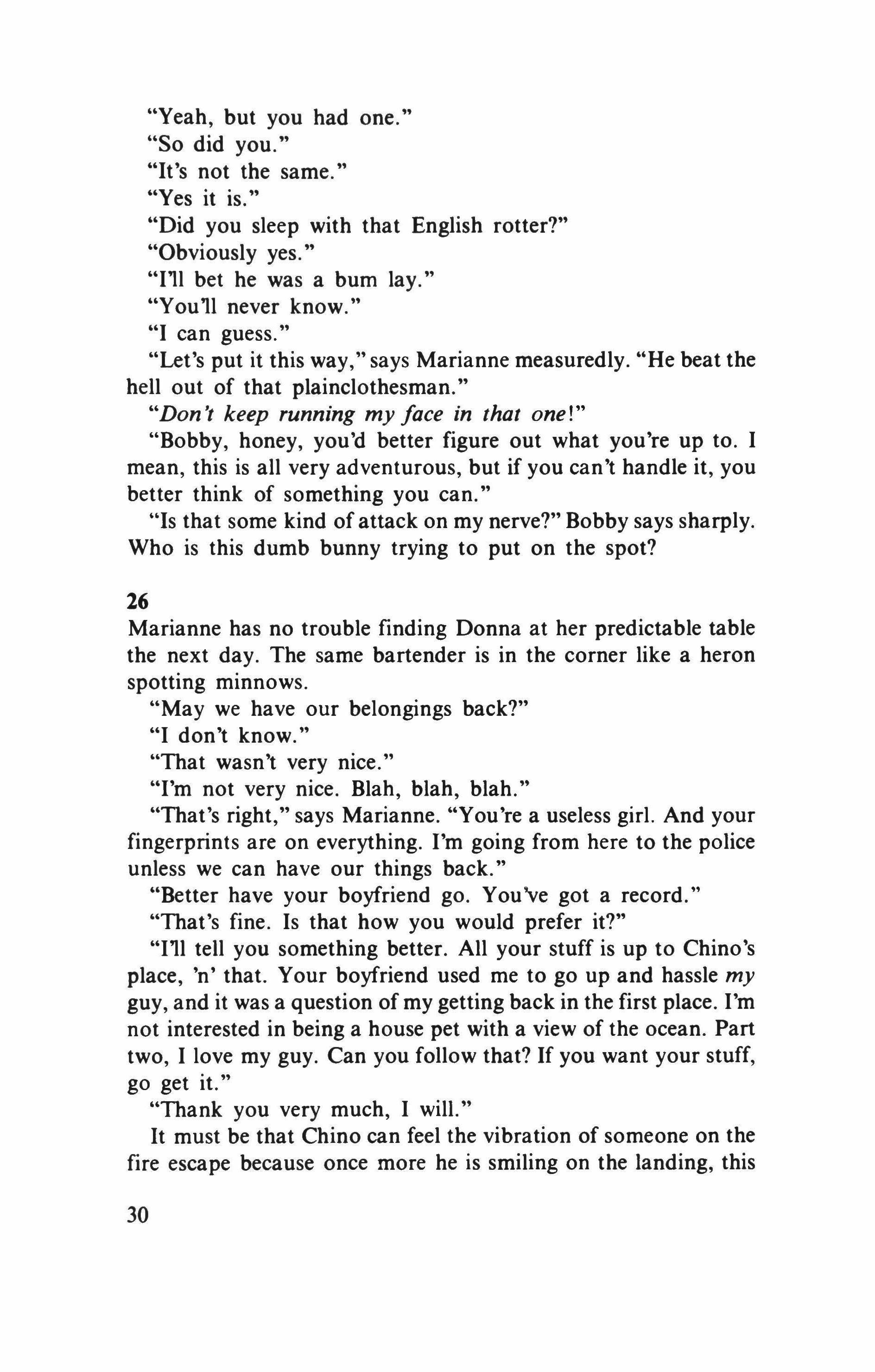
"Yeah, but you had one."
"So did you."
"It's not the same."
"Yes it is."
"Did you sleep with that English rotter?"
"Obviously yes."
"111 bet he was a bum lay."
"You'l never know."
"I can guess."
"Let's put it this way," says Marianne measuredly. "He beat the hell out of that plainclothesman."
"Don't keep running my face in that one!"
"Bobby, honey, you'd better figure out what you're up to. I mean, this is all very adventurous, but if you can't handle it, you better think of something you can."
"Is that some kind of attack on my nerve?" Bobby says sharply. Who is this dumb bunny trying to put on the spot?
26
Marianne has no trouble finding Donna at her predictable table the next day. The same bartender is in the corner like a heron spotting minnows.
"May we have our belongings back?"
"I don't know."
"That wasn't very nice."
"I'm not very nice. Blah, blah, blah."
"That's right," says Marianne. "You're a useless girl. And your fingerprints are on everything. I'm going from here to the police unless we can have our things back."
"Better have your boyfriend go. You've got a record."
"That's fine. Is that how you would prefer it?"
"111 tell you something better. All your stuff is up to Chino's place, 'n' that. Your boyfriend used me to go up and hassle my guy, and it was a question of my getting back in the first place. I'm not interested in being a house pet with a view of the ocean. Part two, I love my guy. Can you follow that? If you want your stuff, go get it."
"Thank you very much, I will."
It must be that Chino can feel the vibration of someone on the fire escape because once more he is smiling on the landing, this
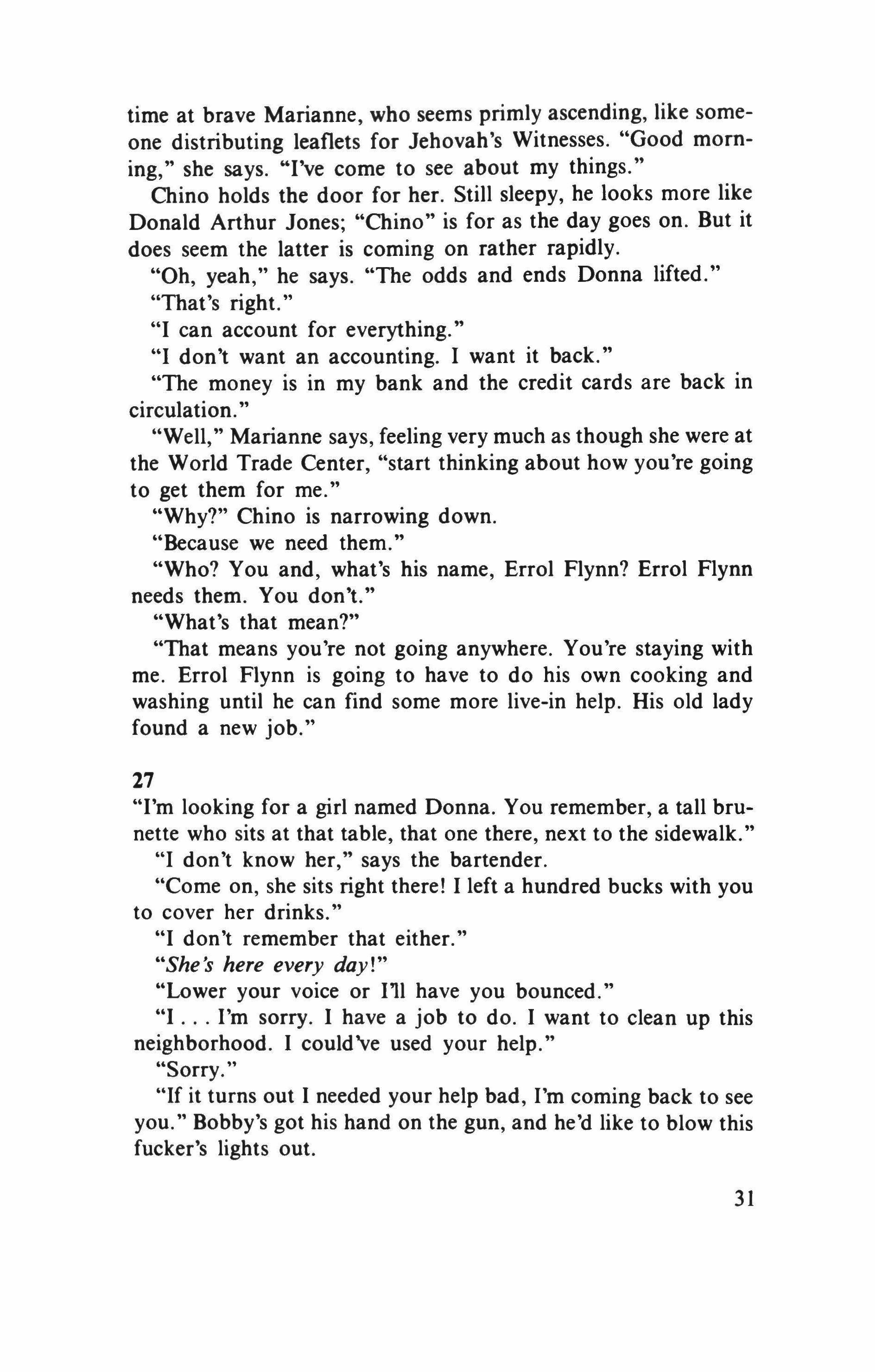
time at brave Marianne, who seems primly ascending, like someone distributing leaflets for Jehovah's Witnesses. "Good morning," she says. "I've come to see about my things."
Chino holds the door for her. Still sleepy, he looks more like Donald Arthur Jones; "Chino" is for as the day goes on. But it does seem the latter is coming on rather rapidly.
"Oh, yeah," he says. "The odds and ends Donna lifted."
"That's right."
"I can account for everything."
"I don't want an accounting. 1 want it back."
"The money is in my bank and the credit cards are back in circulation.
"Well," Marianne says, feeling very much as though she were at the World Trade Center, "start thinking about how you're going to get them for me."
"Why?" Chino is narrowing down.
"Because we need them."
"Who? You and, what's his name, Errol Flynn? Errol Flynn needs them. You don't."
"What's that mean?"
"That means you're not going anywhere. You're staying with me. Errol Flynn is going to have to do his own cooking and washing until he can find some more live-in help. His old lady found a new job."
27
"I'm looking for a girl named Donna. You remember, a tall brunette who sits at that table, that one there, next to the sidewalk."
"I don't know her," says the bartender.
"Come on, she sits right there! 1 left a hundred bucks with you to cover her drinks."
"I don't remember that either."
"She's here every day!"
"Lower your voice or I'll have you bounced."
"I I'm sorry. 1 have a job to do. 1 want to clean up this neighborhood. I could've used your help."
"Sorry.
"If it turns out I needed your help bad, I'm coming back to see you." Bobby's got his hand on the gun, and he'd like to blow this fucker's lights out.
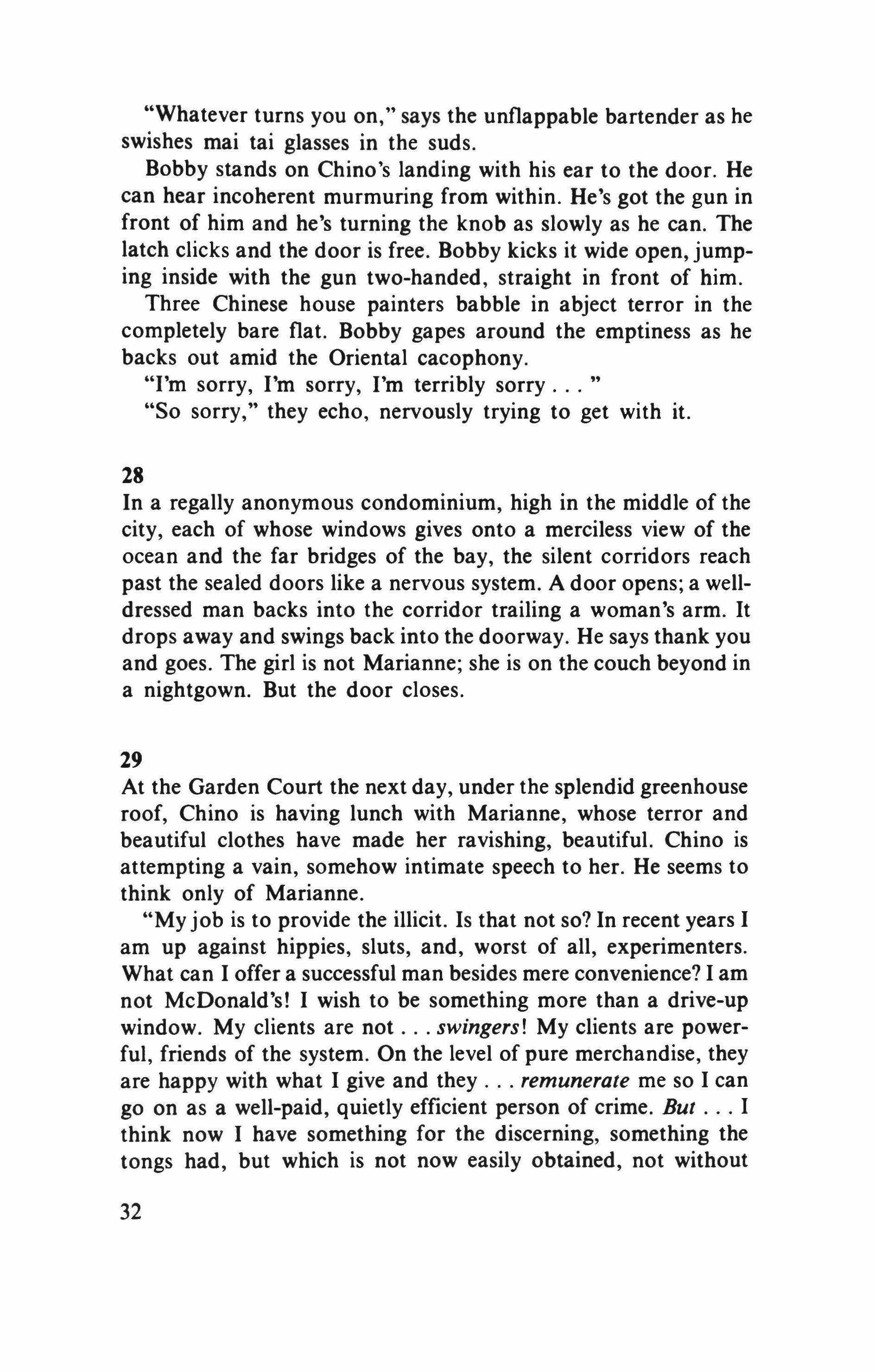
"Whatever turns you on," says the unflappable bartender as he swishes mai tai glasses in the suds.
Bobby stands on Chino's landing with his ear to the door. He can hear incoherent murmuring from within. He's got the gun in front of him and he's turning the knob as slowly as he can. The latch clicks and the door is free. Bobby kicks it wide open, jumping inside with the gun two-handed, straight in front of him.
Three Chinese house painters babble in abject terror in the completely bare flat. Bobby gapes around the emptiness as he backs out amid the Oriental cacophony.
"I'm sorry, I'm sorry, I'm terribly sorry
"So sorry," they echo, nervously trying to get with it.
28
In a regally anonymous condominium, high in the middle of the city, each of whose windows gives onto a merciless view of the ocean and the far bridges of the bay, the silent corridors reach past the sealed doors like a nervous system. A door opens; a welldressed man backs into the corridor trailing a woman's arm. It drops away and swings back into the doorway. He says thank you and goes. The girl is not Marianne; she is on the couch beyond in a nightgown. But the door closes.
29
At the Garden Court the next day, under the splendid greenhouse roof, Chino is having lunch with Marianne, whose terror and beautiful clothes have made her ravishing, beautiful. Chino is attempting a vain, somehow intimate speech to her. He seems to think only of Marianne.
"Myjob is to provide the illicit. Is that not so? In recent years I am up against hippies, sluts, and, worst of all, experimenters. What can I offer a successful man besides mere convenience? I am not McDonald's! I wish to be something more than a drive-up window. My clients are not swingers! My clients are powerful, friends of the system. On the level of pure merchandise, they are happy with what I give and they remunerate me so I can go on as a well-paid, quietly efficient person of crime. But I think now I have something for the discerning, something the tongs had, but which is not now easily obtained, not without
crazy and needless risk. My clients have families and concerns; they need to express themselves."
"What is it you can offer them?" Marianne asks in terror of this knife-wielding animal playing the gent at table.
"I can offer them an unwilling lady, an intelligent woman who hates everything that is happening to her."
"But what if I learn to like it?" Marianne asks him desperately. Learning to like it is the only card she holds.
"Then you are just another one of the girls. You become commonplace.
"To whom?" A disappearing pulse of courage.
"To me, to yourself. What's the difference?"
30
Jane Adams, the lady realtor, a woman of energy and brains, is on the porch of Bobby's Presidio Heights house running down a rumor. Jane hates this. She wanted to make a living and this is it. The porch is covered with glass from a broken bottle that has been thrown from inside. Jane gingerly steps through the glass, knocks on the door, then knocks again. The door opens, and an unshaven, dissolute Bobby appears in pants and no shirt. Jane says as she enters, "Why not say it? I've had complaints." The place is a mess with half-finished meals and disemboweled newspapers slung over the furniture.
"This certainly proves the value of a damage deposit," says Jane, hating the position she's in, this real-estate sham. Every time she has said "ranchette," "bungalow, "younger couple," "all conveniences" has been, she now feels, a black mark on her soul. But Bobby's hauteur helps her through the moment.
"I couldn't agree more," he says jauntily.
"I'm thinking in terms of eviction."
"You'll need a hot lawyer."
"I'll get one. I rather thought your friend would be tidier."
"She's been kidnapped."
"Seriously, I thought she looked like someone who cared."
"She does care, but she s been kidnapped."
It's very quiet.
"Have you reported this to the police?"
"Yes.
"And what happened?"
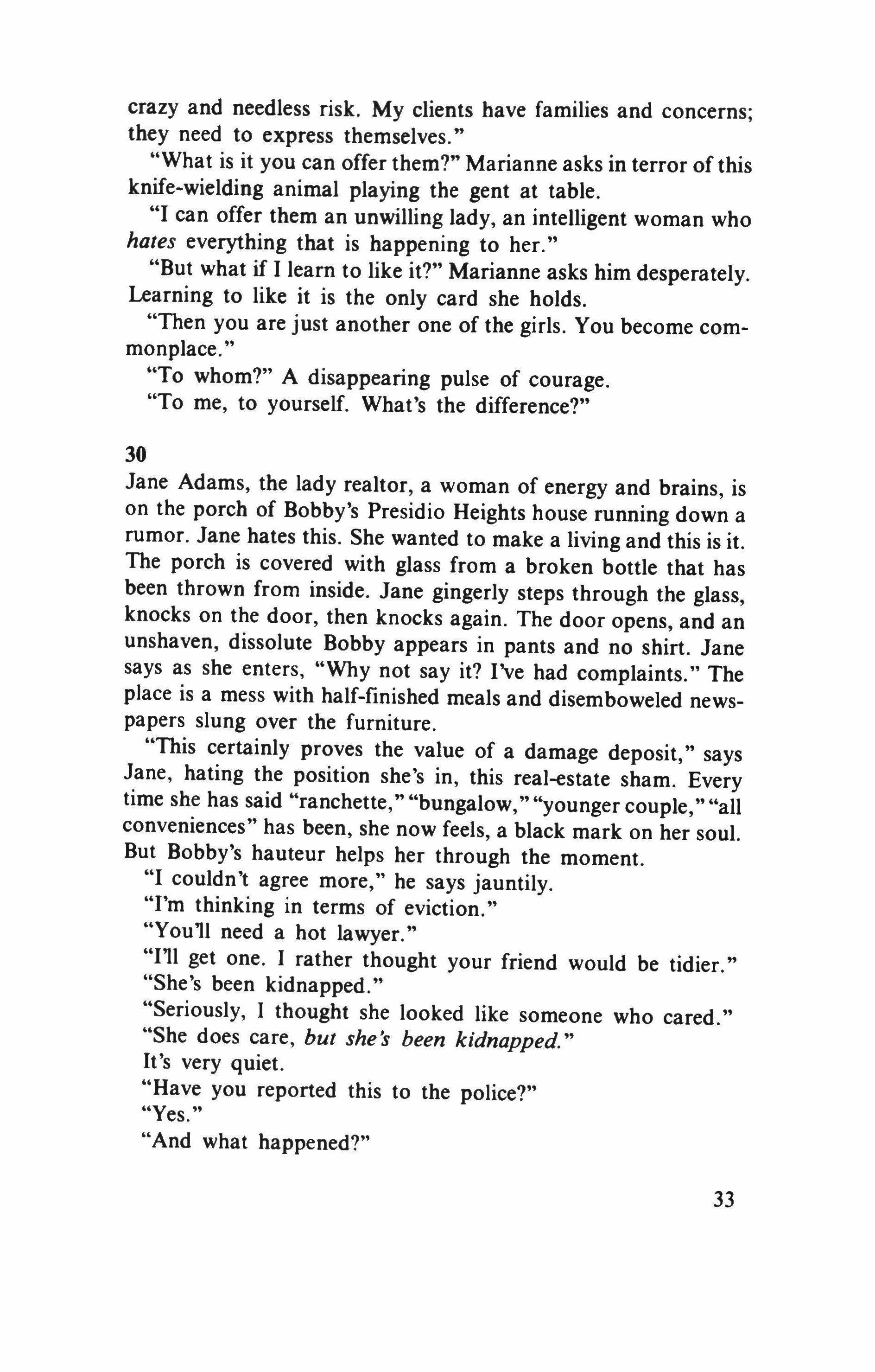
33

"They said she had merely left. She had a police record, which they said indicated that she had simply moved on."
"A police record for what?"
"Prostitution.
"Well, 1 would never have guessed that."
"Please don't evict me. I'll get a maid."
"You look like you could cry."
"Can 1 touch you?" Bobby asks.
"We shook hands once," she said.
"Can 1 touch your hand again? I'm desperate."
When Bobby has finished seducing Jane in the sordid shambles of the bedroom, he says, "I want my Marianne back." His throat seizes. Tears stream onto his wino face.
"You make me feel like a stand-in."
"You are a stand-in."
This flings Jane into all the ugliness of her trade and before she can stop herself she says, "I'm going to have your ass evicted if it's the last thing 1 do. I'll see you in hell, you bastard."
But then Bobby begins to cry a little and once again she hates herself for being mean, a sensation Bobby has not experienced. He whimpers, "Please help me." He's beginning to acquire the tiniest bit of a new erection.
31
During the long day in bed, Bobby tells Jane everything he knows about Marianne, Donna, and Chino. Plus what he heard about Jan and La Costa. He keeps checking to be sure that Jane really knows the town. Too, he likes her hard, flat-sided buttocks, her irrational exclamations, and her lingerie. Sometimes he cries a little, but Jane is drawn to him because he is crying less and less. Finally, he has a shower and puts on his striking clothes. How handsome! she will recall thinking.
32
Chino is in the luxurious living room of his condominium. He is speaking to Max, a hearty mid-forties salmon canner and developer from up north. Chino plays a marvelous new role; and compared to the love birds in Presidio Heights, Chino and Max are just plain happier.
"North Beach had grown tiresome, even to me," Chino
34
explains. "The fire escape made everything a little vulgar. Would you not say so?"
"I accept your work, Donald," smiles Max. Chino has gone back to "Donald Arthur Jones." Max is the only one with manners enough to accept it. The girls keep calling him Chino, as if he were some beaner from down yonder.
"And that one little door with no place to go. And the aging beatniks! Ugh! But that one little door made it seem so much like a drive-up window. I'm no McDonald's!"
"What is the tariff going to be tonight, my friend? I have just emerged from a series of conferences and desperately need to have some fun."
"Five hundred dollars."
"Rather steep, isn't it?"
"You know the law. Think of my risk. She's very pretty, very educated. She has no reason to be here."
Max pays him, remarking, "Don't overbook her. A thing like that can lose its bloom overnight."
Chino looks like a pixie as he opens the door to Marianne's room. She lies curled up on an enormous bed covered by a huge, wholesome, handmade quilt. She faces the wall. The first thing she hears is the door close, then Max's gruff voice: "Get up."
33
Three in the morning and the same bed. Marianne is bound, gagged, and naked, eerily delineated by a small amount of light that is sufficient, nonetheless, to reveal her tangled hair, stained face, and sense of all-consuming defeat and pollution.
The light snaps on and La Costa stands in the doorway staring expressionlessly at Marianne. La Costa's large eyes blink regularly until she has taken it all in. Then she goes into sudden motion, freeing Marianne from the knots that bind her face, hands, and feet. Marianne gets up. The new freedom makes her nauseous for a moment.
"Are you going to be all right?"
"Yes. Are you La Costa?"
"Yes, the black one. Why don't you come here and lie down?" La Costa makes the ravaged bed with deft, efficient movements. The elephantine Max twisted everything in his ardor.
"I want some water. I want to walk."
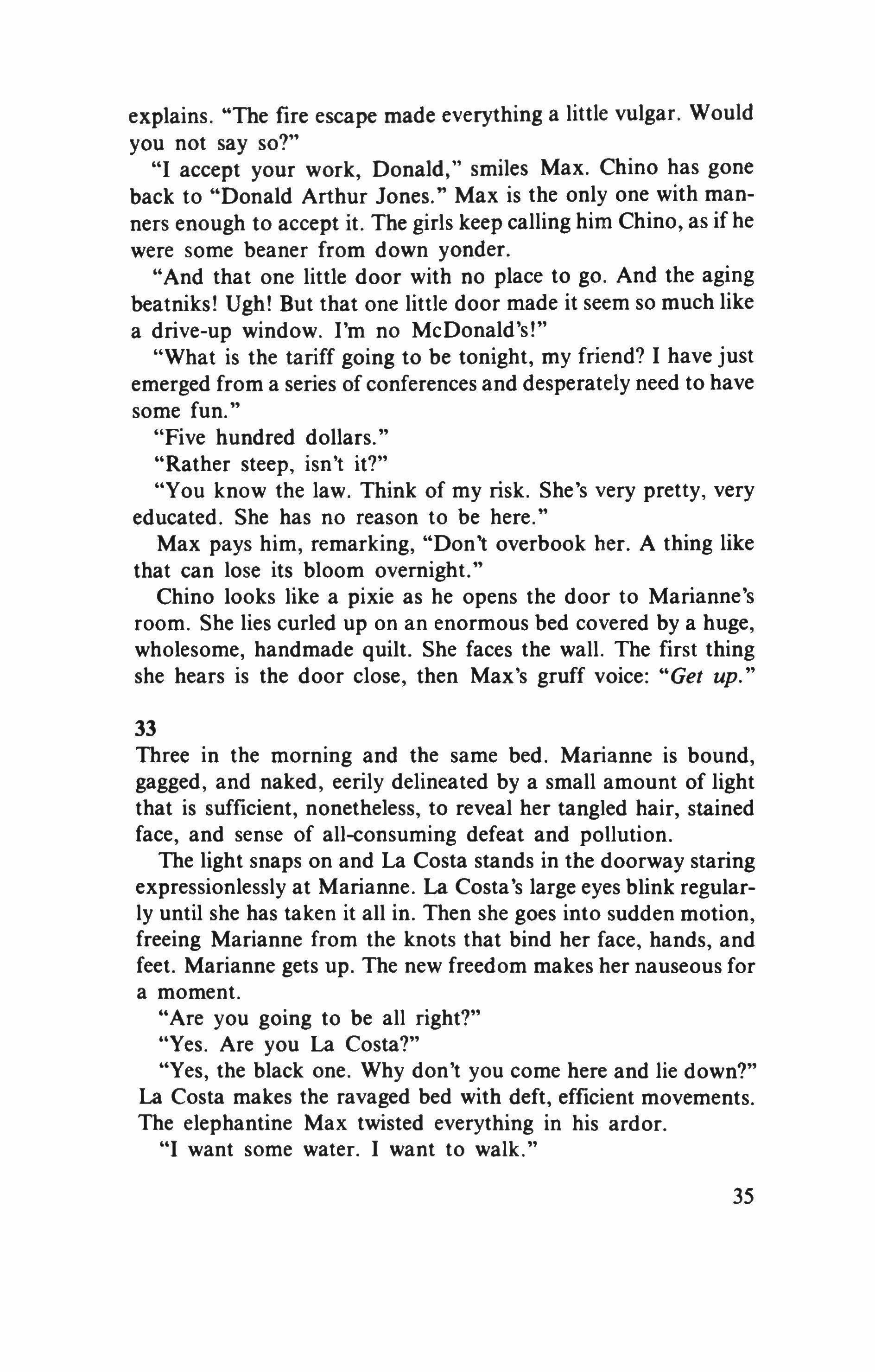
35
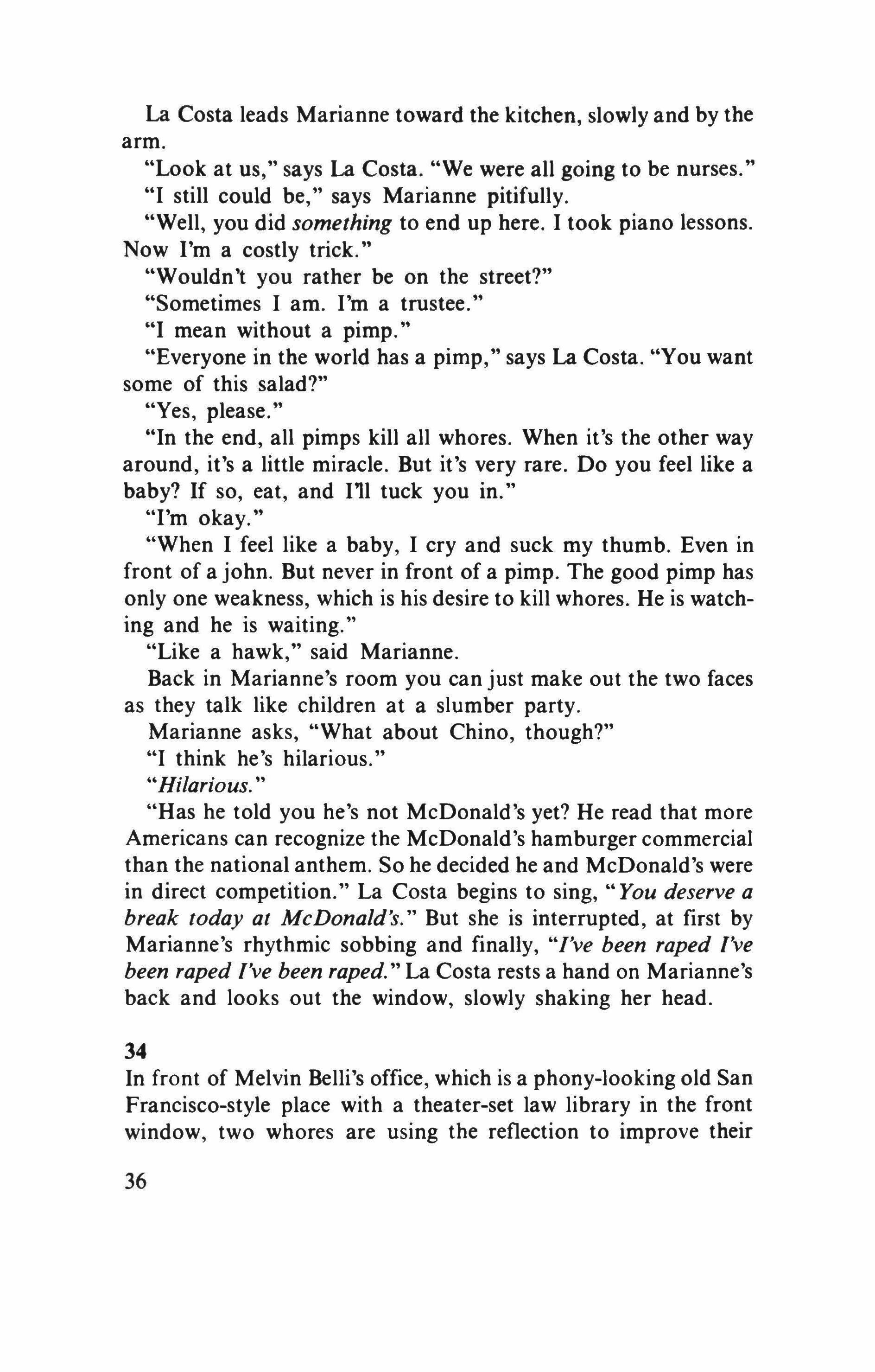
La Costa leads Marianne toward the kitchen, slowly and by the arm.
"Look at us," says La Costa. "We were all going to be nurses."
"I still could be," says Marianne pitifully.
"Well, you did something to end up here. I took piano lessons. Now I'm a costly trick."
"Wouldn't you rather be on the street?"
"Sometimes I am. I'm a trustee."
"I mean without a pimp."
"Everyone in the world has a pimp," says La Costa. "You want some of this salad?"
"Yes, please."
"In the end, all pimps kill all whores. When it's the other way around, it's a little miracle. But it's very rare. Do you feel like a baby? If so, eat, and I'll tuck you in."
"I'm okay."
"When I feel like a baby, I cry and suck my thumb. Even in front of a john. But never in front of a pimp. The good pimp has only one weakness, which is his desire to kill whores. He is watching and he is waiting."
"Like a hawk," said Marianne.
Back in Marianne's room you can just make out the two faces as they talk like children at a slumber party.
Marianne asks, "What about Chino, though?"
"I think he's hilarious."
"Hilarious.
"Has he told you he's not McDonald's yet? He read that more Americans can recognize the McDonald's hamburger commercial than the national anthem. So he decided he and McDonald's were in direct competition." La Costa begins to sing, "You deserve a break today at McIkmald's," But she is interrupted, at first by Marianne's rhythmic sobbing and finally, "I've been raped I've been raped I've been raped." La Costa rests a hand on Marianne's back and looks out the window, slowly shaking her head.
34
In front of Melvin Belli's office, which is a phony-looking old San Francisco-style place with a theater-set law library in the front window, two whores are using the reflection to improve their
36
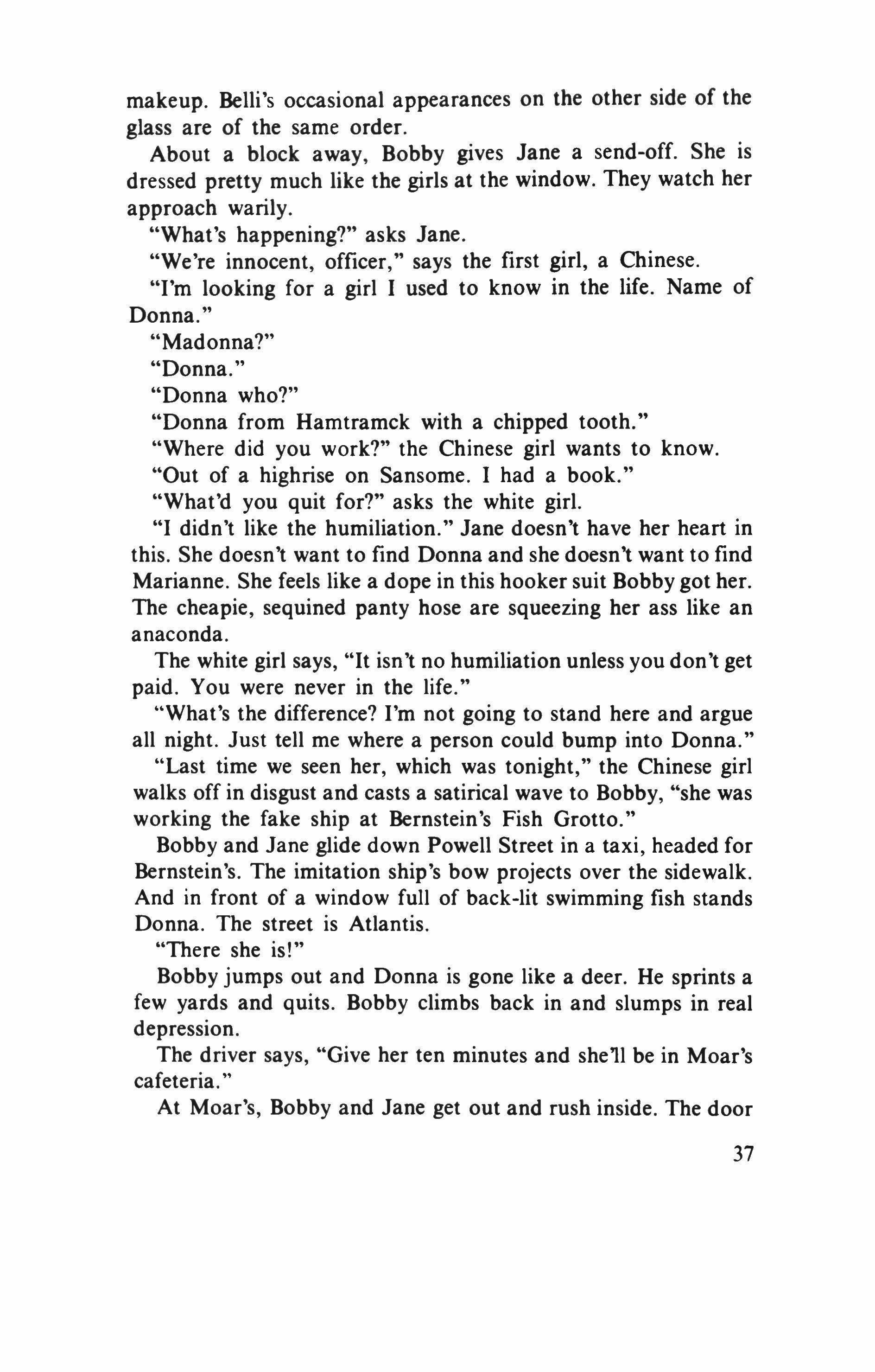
makeup. Belli's occasional appearances on the other side of the glass are of the same order.
About a block away, Bobby gives Jane a send-off. She is dressed pretty much like the girls at the window. They watch her approach warily.
"What's happening?" asks Jane.
"We're innocent, officer," says the first girl, a Chinese.
"I'm looking for a girl I used to know in the life. Name of Donna."
"Madonna?"
"Donna."
"Donna who?"
"Donna from Hamtramck with a chipped tooth."
"Where did you work?" the Chinese girl wants to know.
"Out of a highrise on Sansome. I had a book."
"What'd you quit for?" asks the white girl.
"I didn't like the humiliation." Jane doesn't have her heart in this. She doesn't want to find Donna and she doesn't want to find Marianne. She feels like a dope in this hooker suit Bobby got her. The cheapie, sequined panty hose are squeezing her ass like an anaconda.
The white girl says, "It isn't no humiliation unless you don't get paid. You were never in the life."
"What's the difference? I'm not going to stand here and argue all night. Just tell me where a person could bump into Donna."
"Last time we seen her, which was tonight," the Chinese girl walks off in disgust and casts a satirical wave to Bobby, "she was working the fake ship at Bernstein's Fish Grotto."
Bobby and Jane glide down Powell Street in a taxi, headed for Bernstein's. The imitation ship's bow projects over the sidewalk. And in front of a window full of back-lit swimming fish stands Donna. The street is Atlantis.
"There she is!"
Bobby jumps out and Donna is gone like a deer. He sprints a few yards and quits. Bobby climbs back in and slumps in real depression.
The driver says, "Give her ten minutes and she'll be in Moar's cafeteria.
At Moar's, Bobby and Jane get out and rush inside. The door
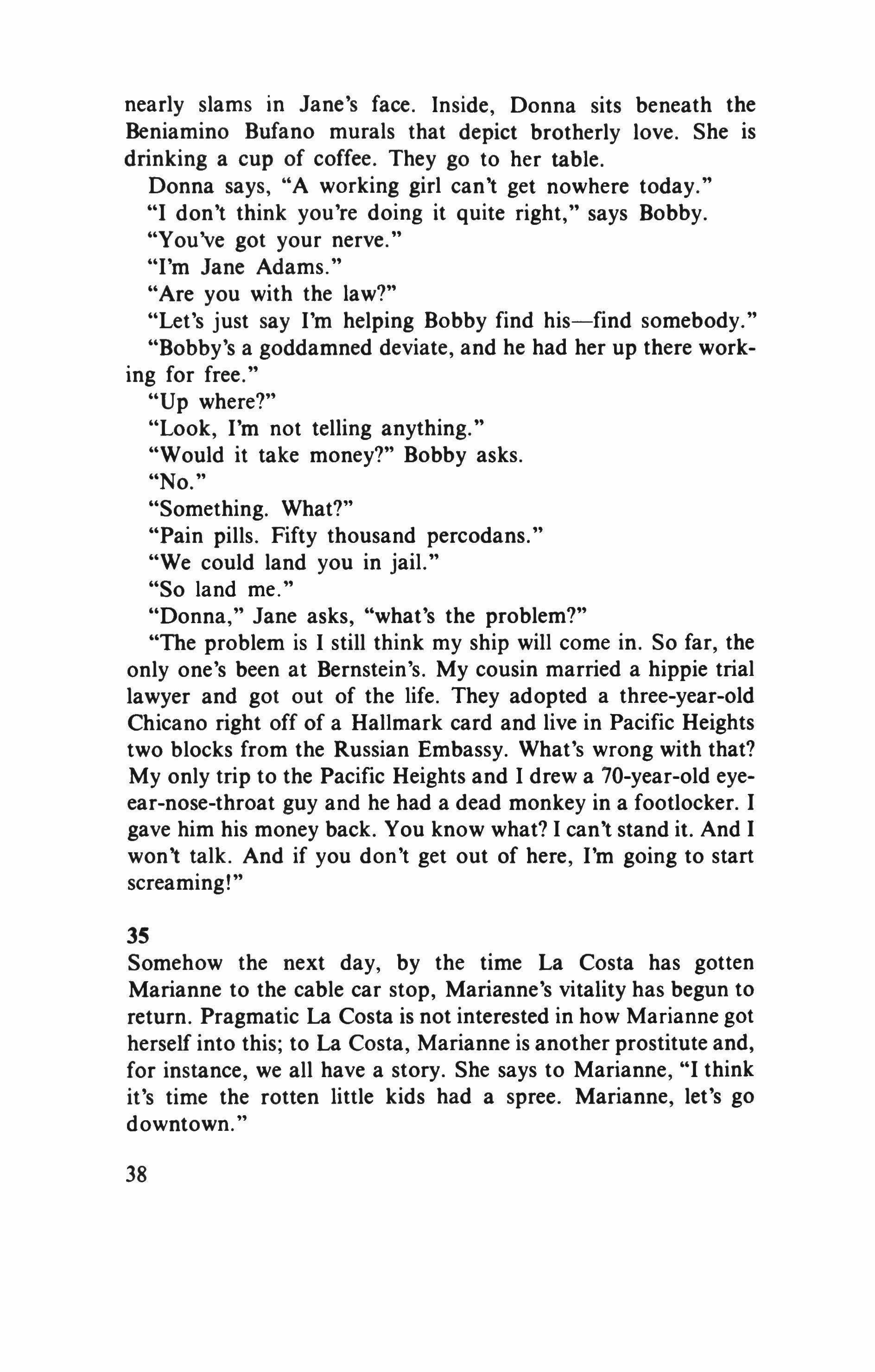
nearly slams in Jane's face. Inside, Donna sits beneath the Beniamino Bufano murals that depict brotherly love. She is drinking a cup of coffee. They go to her table.
Donna says, "A working girl can't get nowhere today."
"I don't think you're doing it quite right," says Bobby.
"You've got your nerve."
"I'm Jane Adams."
"Are you with the law?"
"Let's just say I'm helping Bobby find his-find somebody."
"Bobby's a goddamned deviate, and he had her up there working for free."
"Up where?"
"Look, I'm not telling anything."
"Would it take money?" Bobby asks.
"No."
"Something. What?"
"Pain pills. Fifty thousand percodans."
"We could land you in jail."
"So land me."
"Donna," Jane asks, "what's the problem?"
"The problem is 1 still think my ship will come in. So far, the only one's been at Bernstein's. My cousin married a hippie trial lawyer and got out of the life. They adopted a three-year-old Chicano right off of a Hallmark card and live in Pacific Heights two blocks from the Russian Embassy. What's wrong with that? My only trip to the Pacific Heights and 1 drew a 70-year-old eyeear-nose-throat guy and he had a dead monkey in a footlocker. 1 gave him his money back. You know what? I can't stand it. And 1 won't talk. And if you don't get out of here, I'm going to start screaming!"
35
Somehow the next day, by the time La Costa has gotten Marianne to the cable car stop, Marianne's vitality has begun to return. Pragmatic La Costa is not interested in how Marianne got herself into this; to La Costa, Marianne is another prostitute and, for instance, we all have a story. She says to Marianne, "I think it's time the rotten little kids had a spree. Marianne, let's go downtown.
38
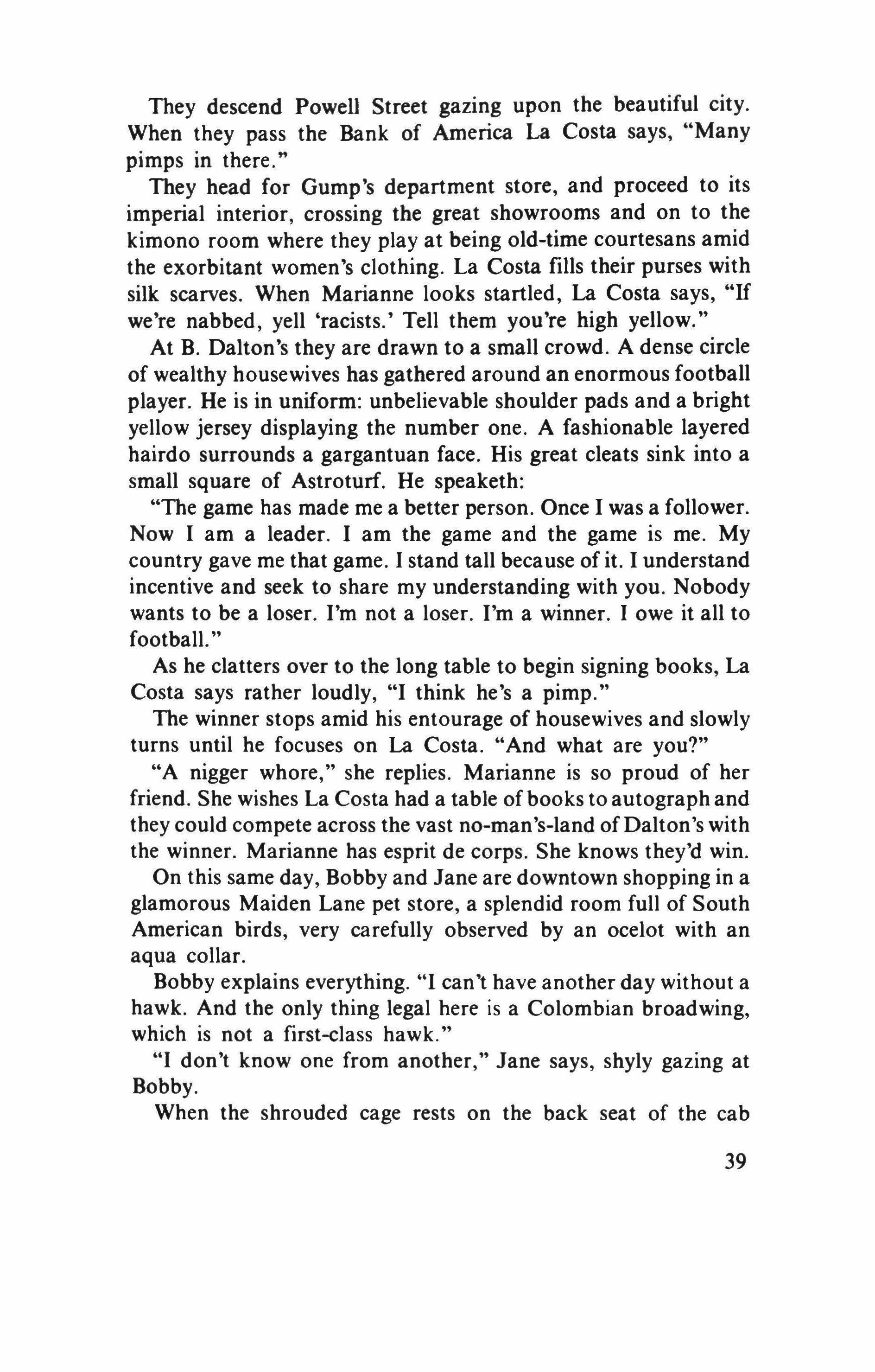
They descend Powell Street gazing upon the beautiful city. When they pass the Bank of America La Costa says, "Many pimps in there."
They head for Gump's department store, and proceed to its imperial interior, crossing the great showrooms and on to the kimono room where they play at being old-time courtesans amid the exorbitant women's clothing. La Costa fills their purses with silk scarves. When Marianne looks startled, La Costa says, "If we're nabbed, yell 'racists.' Tell them you're high yellow."
At B. Dalton's they are drawn to a small crowd. A dense circle of wealthy housewives has gathered around an enormous football player. He is in uniform: unbelievable shoulder pads and a bright yellow jersey displaying the number one. A fashionable layered hairdo surrounds a gargantuan face. His great cleats sink into a small square of Astroturf. He speaketh:
"The game has made me a better person. Once I was a follower. Now 1 am a leader. 1 am the game and the game is me. My country gave me that game. 1 stand tall because of it. 1 understand incentive and seek to share my understanding with you. Nobody wants to be a loser. I'm not a loser. I'm a winner. lowe it all to football.
As he clatters over to the long table to begin signing books, La Costa says rather loudly, "I think he's a pimp."
The winner stops amid his entourage of housewives and slowly turns until he focuses on La Costa. "And what are you?"
"A nigger whore," she replies. Marianne is so proud of her friend. She wishes La Costa had a table of books to autograph and they could compete across the vast no-man's-land of Dalton's with the winner. Marianne has esprit de corps. She knows they'd win.
On this same day, Bobby and Jane are downtown shopping in a glamorous Maiden Lane pet store, a splendid room full of South American birds, very carefully observed by an ocelot with an aqua collar.
Bobby explains everything. "I can't have another day without a hawk. And the only thing legal here is a Colombian broadwing, which is not a first-class hawk."
"I don't know one from another," Jane says, shyly gazing at Bobby.
When the shrouded cage rests on the back seat of the cab
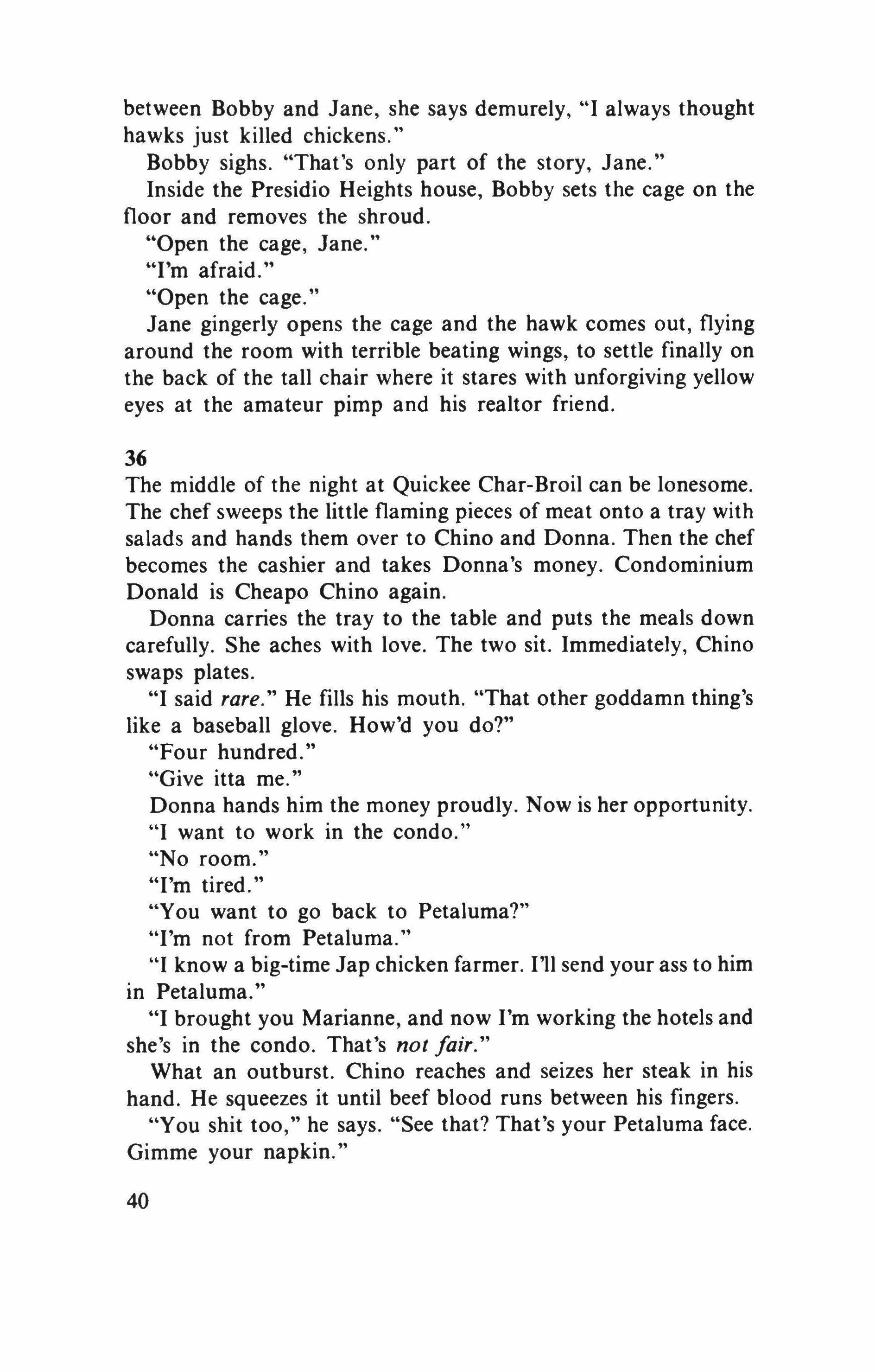
between Bobby and Jane, she says demurely, "I always thought hawks just killed chickens."
Bobby sighs. "That's only part of the story, Jane."
Inside the Presidio Heights house, Bobby sets the cage on the floor and removes the shroud.
"Open the cage, Jane."
"I'm afraid."
"Open the cage."
Jane gingerly opens the cage and the hawk comes out, flying around the room with terrible beating wings, to settle finally on the back of the tall chair where it stares with unforgiving yellow eyes at the amateur pimp and his realtor friend.
36
The middle of the night at Quickee Char-Broil can be lonesome. The chef sweeps the little flaming pieces of meat onto a tray with salads and hands them over to Chino and Donna. Then the chef becomes the cashier and takes Donna's money. Condominium Donald is Cheapo Chino again.
Donna carries the tray to the table and puts the meals down carefully. She aches with love. The two sit. Immediately, Chino swaps plates.
"I said rare." He fills his mouth. "That other goddamn thing's like a baseball glove. How'd you do?"
"Four hundred."
"Give itta me."
Donna hands him the money proudly. Now is her opportunity.
"I want to work in the condo."
"No room."
"I'm tired."
"You want to go back to Petaluma?"
"I'm not from Petaluma."
"I know a big-time Jap chicken farmer. 111 send your ass to him in Petaluma."
"I brought you Marianne, and now I'm working the hotels and she's in the condo. That's not fair."
What an outburst. Chino reaches and seizes her steak in his hand. He squeezes it until beef blood runs between his fingers.
"You shit too," he says. "See that? That's your Petaluma face. Gimme your napkin."
40
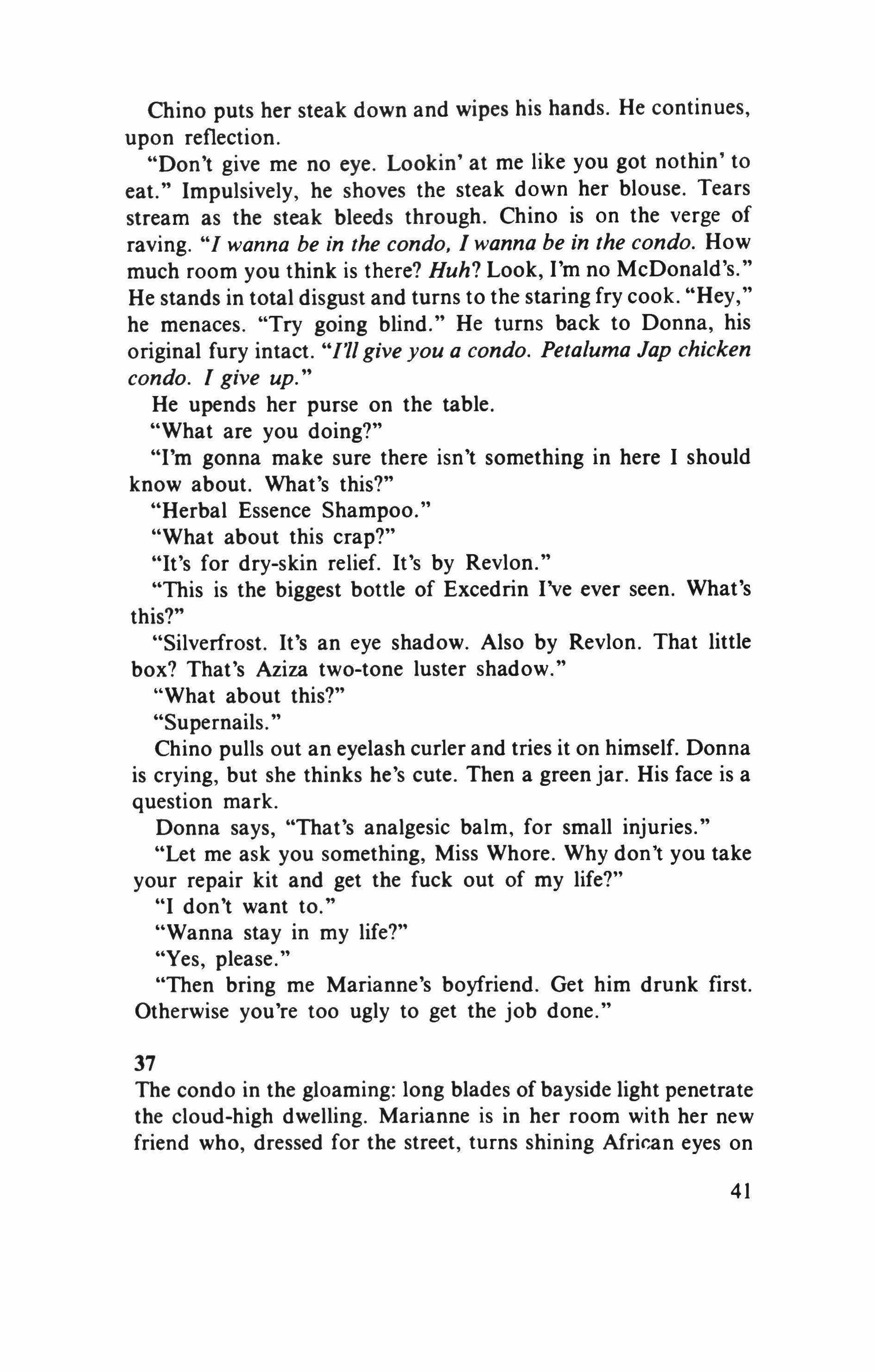
Chino puts her steak down and wipes his hands. He continues, upon reflection.
"Don't give me no eye. Lookin' at me like you got nothin' to eat." Impulsively, he shoves the steak down her blouse. Tears stream as the steak bleeds through. Chino is on the verge of raving. "I wanna be in the condo, I wanna be in the condo. How much room you think is there? Huh? Look, I'm no McDonald's." He stands in total disgust and turns to the staring fry cook. "Hey," he menaces. "Try going blind." He turns back to Donna, his original fury intact. "['II give you a condo. Petaluma Jap chicken condo. I give up."
He upends her purse on the table.
"What are you doing?"
"I'm gonna make sure there isn't something in here I should know about. What's this?"
"Herbal Essence Shampoo."
"What about this crap?"
"It's for dry-skin relief. It's by Revlon."
"This is the biggest bottle of Excedrin I've ever seen. What's this?"
"Silverfrost. It's an eye shadow. Also by Revlon. That little box? That's Aziza two-tone luster shadow."
"What about this?"
"Supernails.
Chino pulls out an eyelash curler and tries it on himself. Donna is crying, but she thinks he's cute. Then a green jar. His face is a question mark.
Donna says, "That's analgesic balm, for small injuries."
"Let me ask you something, Miss Whore. Why don't you take your repair kit and get the fuck out of my life?"
"I don't want to."
"Wanna stay in my life?"
"Yes, please."
"Then bring me Marianne's boyfriend. Get him drunk first. Otherwise you're too ugly to get the job done."
37
The condo in the gloaming: long blades of bayside light penetrate the cloud-high dwelling. Marianne is in her room with her new friend who, dressed for the street, turns shining African eyes on
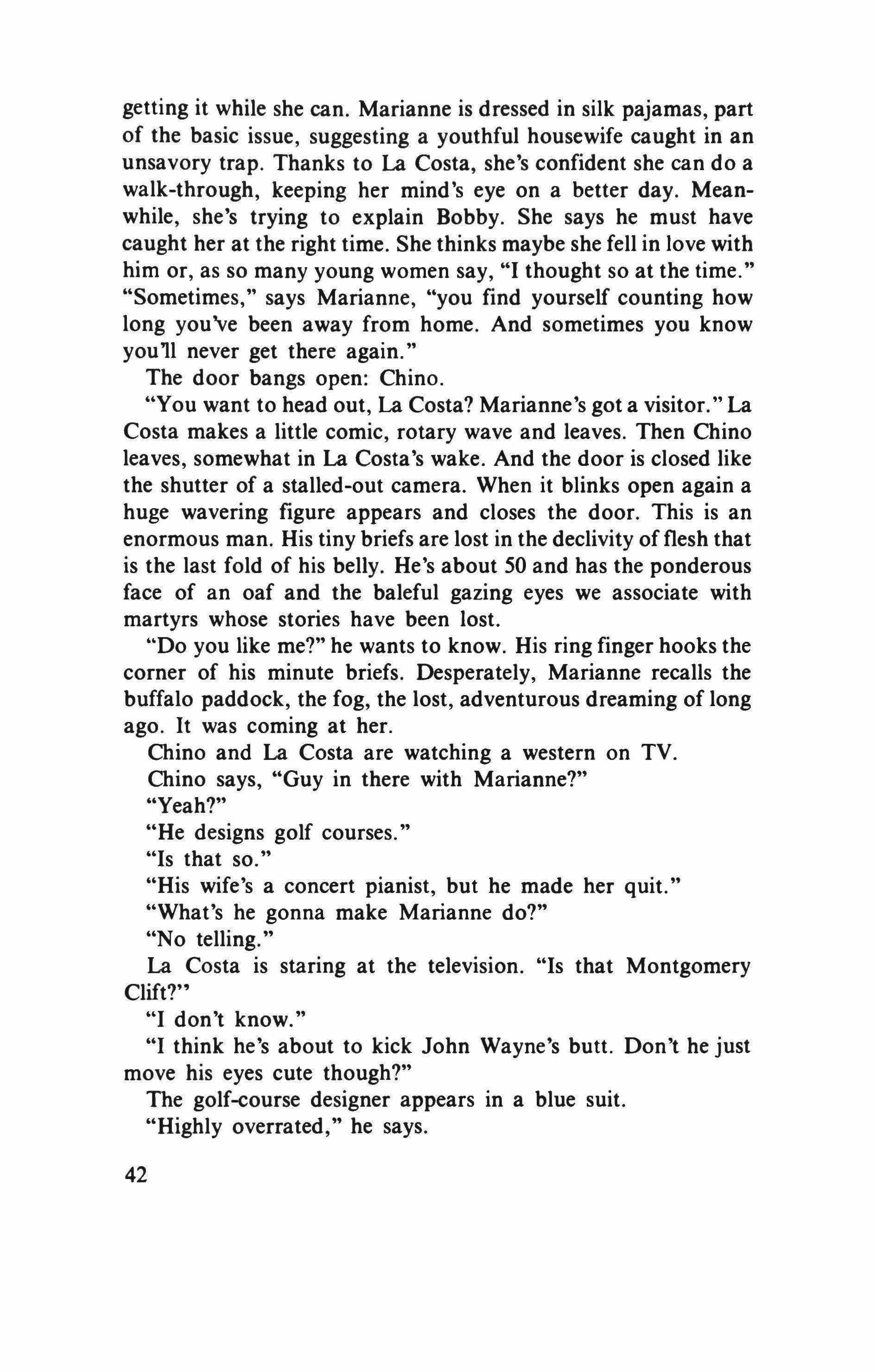
getting it while she can. Marianne is dressed in silk pajamas, part of the basic issue, suggesting a youthful housewife caught in an unsavory trap. Thanks to La Costa, she's confident she can do a walk-through, keeping her mind's eye on a better day. Meanwhile, she's trying to explain Bobby. She says he must have caught her at the right time. She thinks maybe she fell in love with him or, as so many young women say, "I thought so at the time." "Sometimes," says Marianne, "you find yourself counting how long you've been away from home. And sometimes you know you'll never get there again."
The door bangs open: Chino.
"You want to head out, La Costa? Marianne's got a visitor." La Costa makes a little comic, rotary wave and leaves. Then Chino leaves, somewhat in La Costa's wake. And the door is closed like the shutter of a stalled-out camera. When it blinks open again a huge wavering figure appears and closes the door. This is an enormous man. His tiny briefs are lost in the declivity of flesh that is the last fold of his belly. He's about 50 and has the ponderous face of an oaf and the baleful gazing eyes we associate with martyrs whose stories have been lost.
"Do you like me?" he wants to know. His ring finger hooks the corner of his minute briefs. Desperately, Marianne recalls the buffalo paddock, the fog, the lost, adventurous dreaming of long ago. It was coming at her.
Chino and La Costa are watching a western on TV.
Chino says, "Guy in there with Marianne?" "Yeah?"
"He designs golf courses."
"Is that so."
"His wife's a concert pianist, but he made her quit."
"What's he gonna make Marianne do?"
"N0 telling."
La Costa is staring at the television. "Is that Montgomery Clift?"
"I don't know."
"I think he's about to kick John Wayne's butt. Don't he just move his eyes cute though?"
The golf-course designer appears in a blue suit.
"Highly overrated," he says.
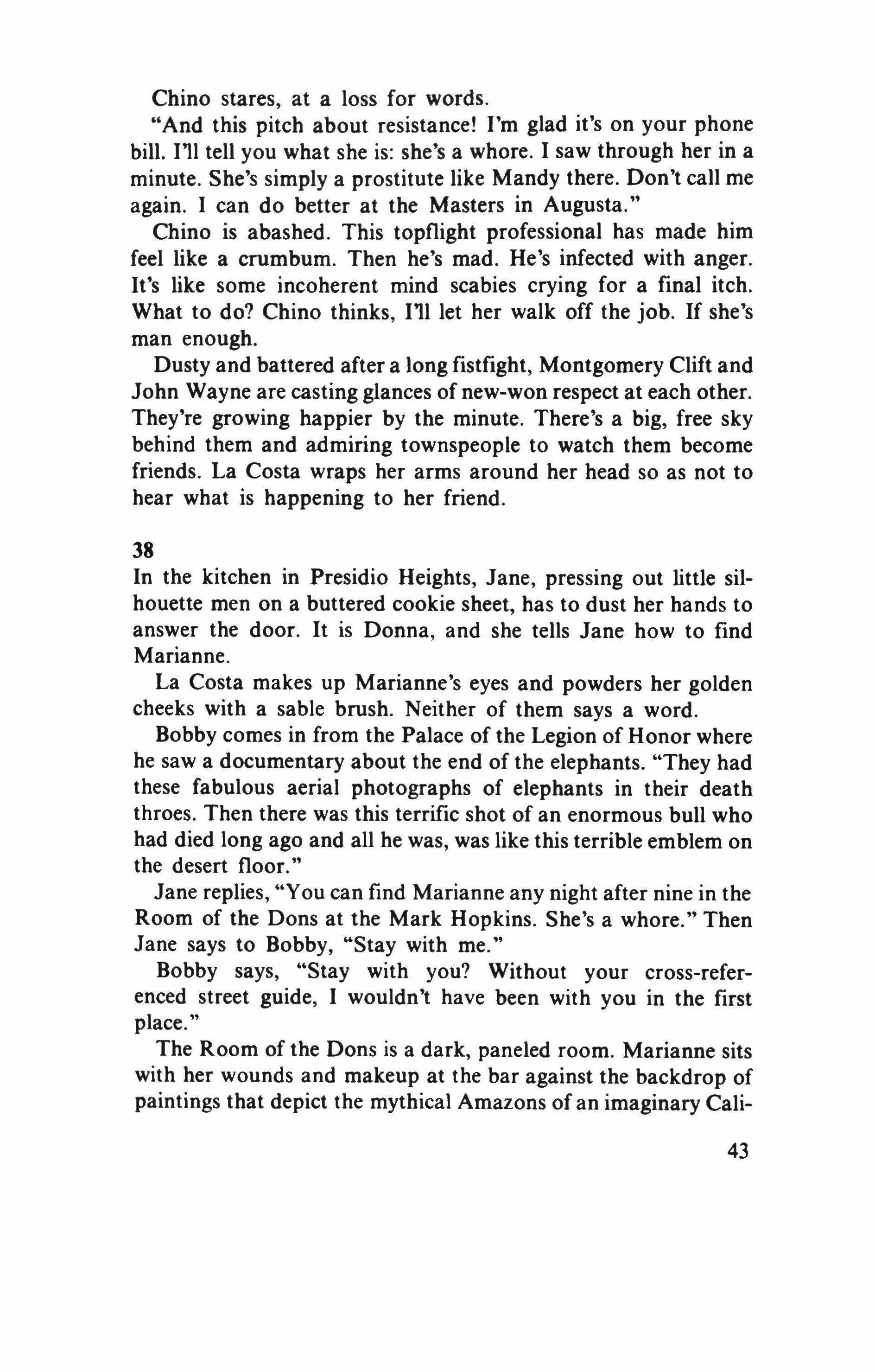
Chino stares, at a loss for words.
"And this pitch about resistance! I'm glad it's on your phone bill. 111 tell you what she is: she's a whore. I saw through her in a minute. She's simply a prostitute like Mandy there. Don't call me again. I can do better at the Masters in Augusta."
Chino is abashed. This topflight professional has made him feel like a crumbum. Then he's mad. He's infected with anger. It's like some incoherent mind scabies crying for a final itch. What to do? Chino thinks, I'll let her walk off the job. If she's man enough.
Dusty and battered after a long fistfight, Montgomery Clift and John Wayne are casting glances of new-won respect at each other. They're growing happier by the minute. There's a big, free sky behind them and admiring townspeople to watch them become friends. La Costa wraps her arms around her head so as not to hear what is happening to her friend.
38
In the kitchen in Presidio Heights, Jane, pressing out little silhouette men on a buttered cookie sheet, has to dust her hands to answer the door. It is Donna, and she tells Jane how to find Marianne.
La Costa makes up Marianne's eyes and powders her golden cheeks with a sable brush. Neither of them says a word.
Bobby comes in from the Palace of the Legion of Honor where he saw a documentary about the end of the elephants. "They had these fabulous aerial photographs of elephants in their death throes. Then there was this terrific shot of an enormous bull who had died long ago and all he was, was like this terrible emblem on the desert floor."
Jane replies, "You can find Marianne any night after nine in the Room of the Dons at the Mark Hopkins. She's a whore." Then Jane says to Bobby, "Stay with me."
Bobby says, "Stay with you? Without your cross-referenced street guide, I wouldn't have been with you in the first place."
The Room of the Dons is a dark, paneled room. Marianne sits with her wounds and makeup at the bar against the backdrop of paintings that depict the mythical Amazons of an imaginary Cali-

fornia. Bobby sits next to her and rests his head on her shoulder. He holds her arm in both of his hands.
"Oh, my baby."
"Hello, Bobby."
"Has it been awful?"
"No.
"Can we go?"
"We need a room."
"Can we go home?" says Bobby.
"I've got a place."
Once they're inside Marianne's room in the condominium, Bobby turns his eyes toward her in terrified suspension. He walks to the window and its pricey vista.
"Am 1 going to have to pay?" he asks.
"Yes.
"Then I think you're trapped."
"No, you are," she says.
Bobby hands her his wallet. "I don't want to hear the numbers. Take out how much it is."
Marianne peels the bills into her purse and gives Bobby his wallet back.
"Shall I undress you?" she asks.
"Did you take out for that?"
"I took out for everything," she says slowly. And for once in Bobby's life pure desire pours through him like flame. For once.
Having quietly let himself in, Chino waits his turn in the front room. But as with Bobby, nothing happens quite as he has foreseen it. Because Marianne's door bursts open and Bobby flings himself into the hallway, a knife plunged in the base of his neck, jetting fatal quantities of blood on everything. Bobby clambers down the hallway toward Chino, like a bride in a dream, smearing the walls as he goes; reaching, reaching toward the only man in the place.
39
The bloody bed is repeatedly ignited by flashbulbs. The officer turns to the press for a moment of candor. The people have to know. A stretcher passes covered with a sheet, the anonymous
44
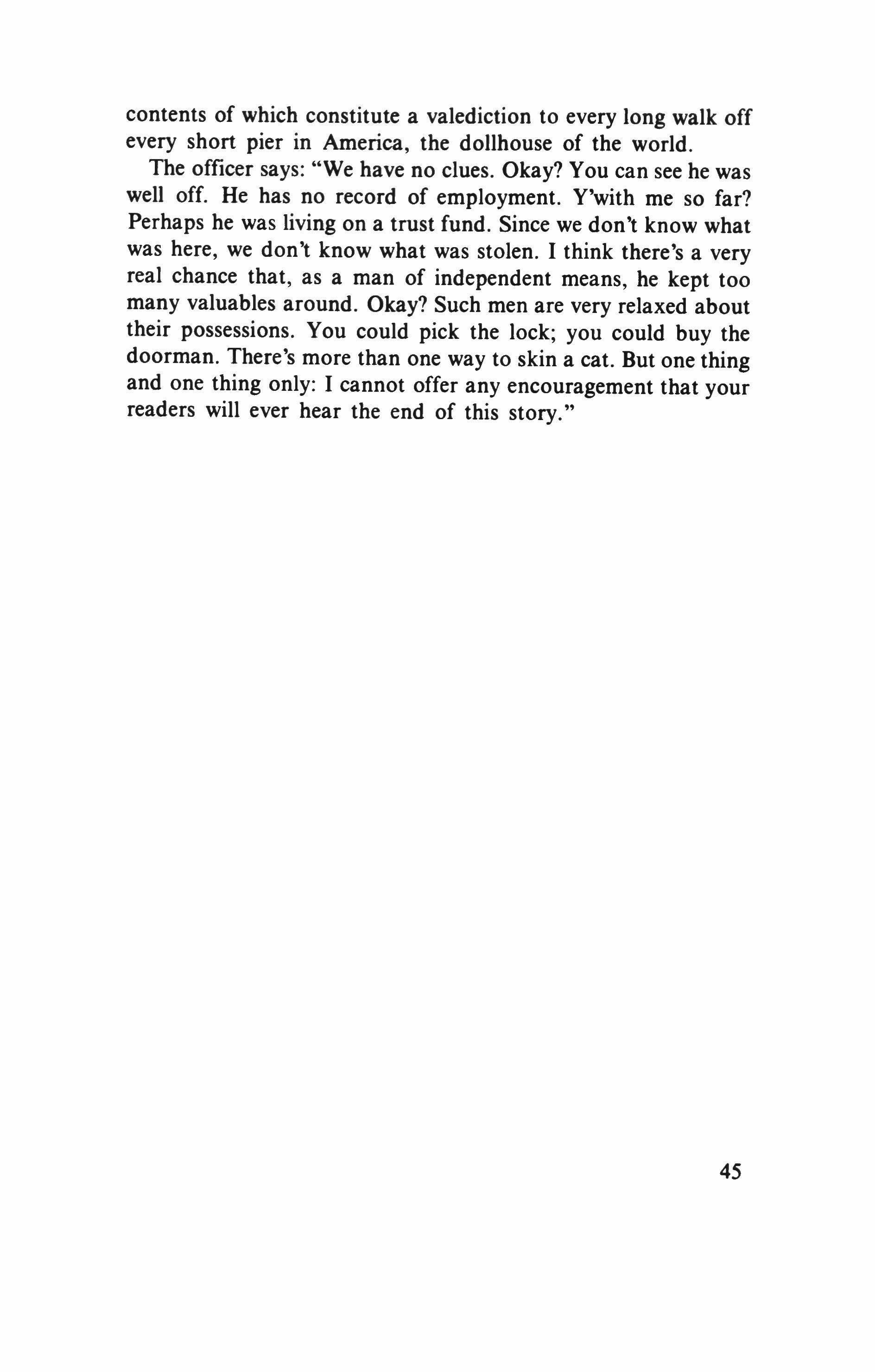
contents of which constitute a valediction to every long walk off every short pier in America, the dollhouse of the world.
The officer says: "We have no clues. Okay? You can see he was well off. He has no record of employment. Y'with me so far? Perhaps he was living on a trust fund. Since we don't know what was here, we don't know what was stolen. I think there's a very real chance that, as a man of independent means, he kept too many valuables around. Okay? Such men are very relaxed about their possessions. You could pick the lock; you could buy the doorman. There's more than one way to skin a cat. But one thing and one thing only: I cannot offer any encouragement that your readers will ever hear the end of this story."

Stephen K.arpilow was intensely interested in science. Anyway, that was the phrase his mother always used, a phrase Stephen disliked without being sure why-"intensely interested." For his eleventh birthday she had given him a bird book and binoculars.
He knelt now at the dining room window, which overlooked the long downhill sweep of the back lawn, trying to focus on Carl's house. The circle bounding his field of vision kept pulling apart into two overlapping ones, like the picture in his science book of an amoeba dividing. A fringe flicked down, then immediately up again-his eyelashes, blurry and gigantic.
Though Carl was a neighbor, he lived in a different neighborhood. You could tell when you walked down Stephen's smooth back lawn, hopped the little stream at the bottom that trickled out of one culvert and disappeared into another, and started up Carl's back lawn, ugly with crabgrass and dog turds. Carl's house was like all the others on its street, a little old place with peeling paint and roof of ripped tarpaper. Stephen's own street had been carved out of the woods only a few years ago, and some of the spreading houses still didn't have their lawns grown in. The garages were double, with doors that rose in response to clickers that people carried in their cars.

For July, the morning was nice and cool. He and Carl had planned a bike ride to pick up a rat for the long, glossy indigo snake Stephen had in his basement. The snake-a female, according to the packing slip-had just come in a box from Amarillo, Texas, and Amarillo was what he had named her. He was surprised by her dry smoothness when you stroked her, the strength of her body as she twisted in your hands.
Was it still too early to go and knock on Carl's door? It was practically nine. But he felt he had to be extra careful with the Pruitts. He was afraid of intruding on them, on some awful problem they might be having. "I frankly don't know how they eat," he had heard his mother say.
Besides, Carl himself made Stephen feel shy. Carl was a year older, already in junior high, a lean and silent blond. His silence gave him a power that Stephen feared. You never knew what he was thinking, and whatever you were thinking, if you mentioned it, didn't interest him at all.
The place they had to go for the rat was a long and hilly distance away. Stephen pedaled easily on his ten-speed, but Carl sweated and panted on his heavy old Schwinn, which he used for his paper route-the kind of bike nobody rode anymore; it had fat tires and no gears at all. You could hear rubber rubbing on metal each time the wheels turned, and the chain rattling in the chain guard. Stephen found it first embarrassing, then irritating, going slowly enough to stay together.
The trees and bushes were loud with birds-it seemed to Stephen that he had never heard and seen so many in his life. But Carl, pumping along doggedly, took no notice of them at all. Coming to the top of the worst hill, he grew red in the face, and for the last stretch had to get off and walk his bike. Stephen rode in rolling circles around him, like the overlapping O's his mother made him practice for his penmanship.
Carl was staring straight ahead. Stephen finally couldn't stand it. "Hey," he said. "Let's switch a while."
Wordlessly, Carl laid his bike down by the roadside-it had no kick stand-and waited.
Stephen dismounted and raised Carl's heavy bike with difficulty. From here on it was mostly downhill. Even so, he was shocked at how hard the thing was to pedal. Descending the first hill he stood up to pump, gaining all the momentum he could.
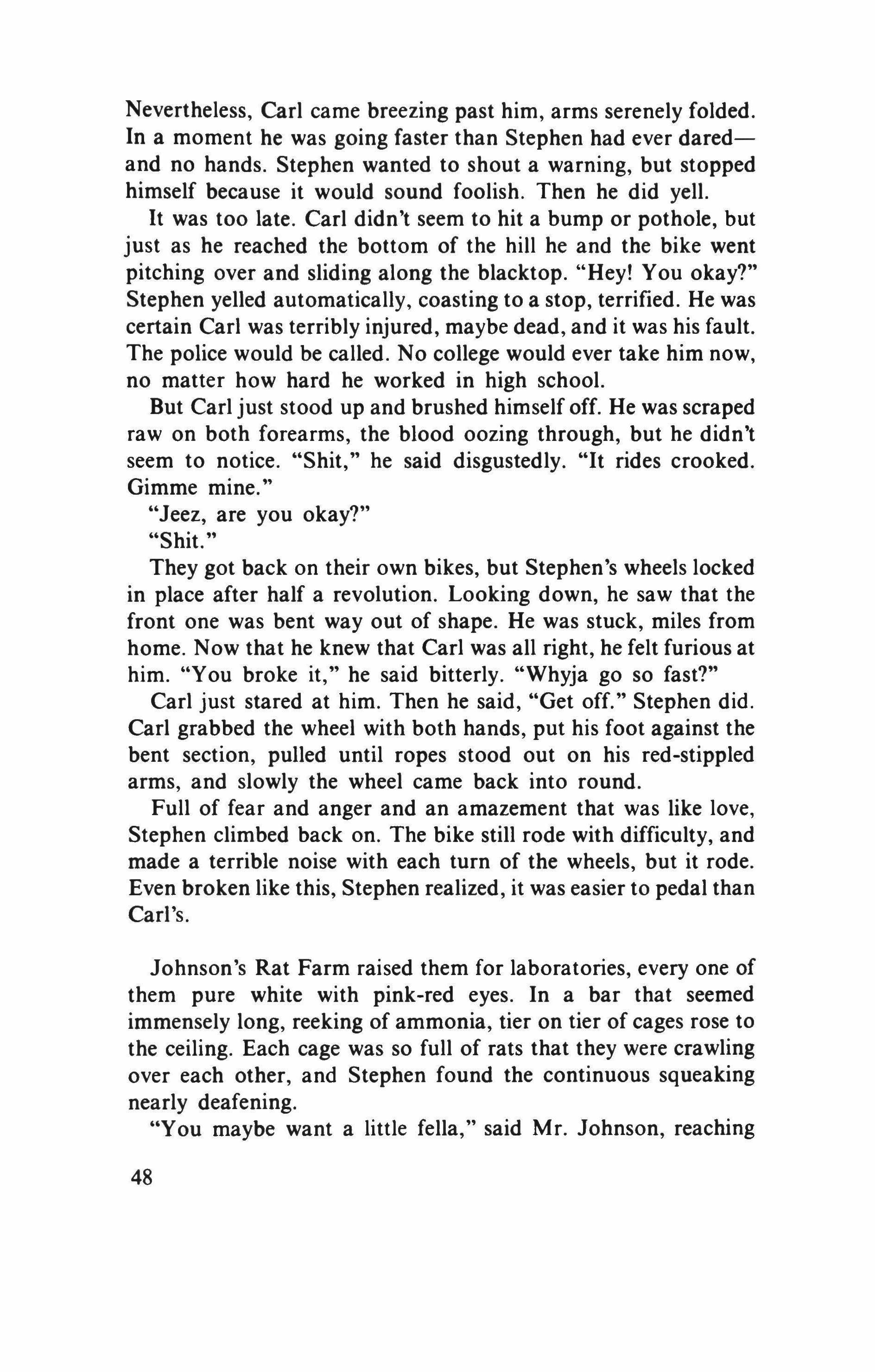
Nevertheless, Carl came breezing past him, arms serenely folded. In a moment he was going faster than Stephen had ever daredand no hands. Stephen wanted to shout a warning, but stopped himself because it would sound foolish. Then he did yell.
It was too late. Carl didn't seem to hit a bump or pothole, but just as he reached the bottom of the hill he and the bike went pitching over and sliding along the blacktop. "Hey! You okay?"
Stephen yelled automatically, coasting to a stop, terrified. He was certain Carl was terribly injured, maybe dead, and it was his fault. The police would be called. No college would ever take him now, no matter how hard he worked in high school.
But Carl just stood up and brushed himself off. He was scraped raw on both forearms, the blood oozing through, but he didn't seem to notice. "Shit," he said disgustedly. "It rides crooked. Gimme mine."
"Jeez, are you okay?" "Shit.
They got back on their own bikes, but Stephen's wheels locked in place after half a revolution. Looking down, he saw that the front one was bent way out of shape. He was stuck, miles from home. Now that he knew that Carl was all right, he felt furious at him. "You broke it," he said bitterly. "Whyja go so fast?"
Carl just stared at him. Then he said, "Get off." Stephen did. Carl grabbed the wheel with both hands, put his foot against the bent section, pulled until ropes stood out on his red-stippled arms, and slowly the wheel came back into round.
Full of fear and anger and an amazement that was like love, Stephen climbed back on. The bike still rode with difficulty, and made a terrible noise with each turn of the wheels, but it rode. Even broken like this, Stephen realized, it was easier to pedal than Carl's.
Johnson's Rat Farm raised them for laboratories, every one of them pure white with pink-red eyes. In a bar that seemed immensely long, reeking of ammonia, tier on tier of cages rose to the ceiling. Each cage was so full of rats that they were crawling over each other, and Stephen found the continuous squeaking nearly deafening.
"You maybe want a little fella," said Mr. Johnson, reaching

into a cage and pulling out a fuzzy thing shorter than his thumb. He held it in mid-air by its tail. It stupidly splayed its four legs and wiggled them about, arching its body and squealing fiercely.
"This is a pretty big snake," Stephen said loudly, his hands over his ears.
"Well, okay," said Mr. Johnson, and pulled out a larger rat from the next tier. Stephen held open the canvas sack he had brought in his saddlebag, and Mr. Johnson dropped the rat in. "That one's fifty cents," he said.
Carl, hands in pockets, had gone straight to the dim far end of the barn, and now came easing back. "What about one of those big bastards down there," he said. Mr. Johnson looked disapproving at this language, and Stephen felt ashamed of his friend, and of himself for bringing Carl along.
Halfway home, the grating got worse. Stephen grew afraid that he was damaging his bike more, riding it when it was in this shape. "I've gotta stop," he said. "I'm gonna push it." Carl said nothing but stopped beside him. It always surprised Stephen when Carl followed his lead like this-even that Carl, who was older and so sure of himself, wanted to be with him at all. "His parents send him over," Stephen's mother had said cruelly. "They're tickled to death that he has a friend like you."
Though it was now close to midday, birds were still singing along the roadside. "There's a blue jay," Stephen said once, and, another time, "Was that a hummingbird?" Carl did not respond. The blood was dry now on his arms, dull and brownish in the sun, patterned in long clouds and continents.
They walked along in silence, and the wonder of how many birds there were grew on Stephen-birds in the bushes, in the trees, thick in the woods that stretched back on both sides of the road, birds hopping on lawns when they came to houses, birds flying overhead. There were uncountable birds at all points of the compass, he realized, swarms of bright birds filling the jungles, great clouds of seabirds along the shores. Pushing his bike along, he almost ran over a decaying one on the roadside. He held his breath as he passed, feeling strange.
Though why should he? With so many birds, weren't there naturally going to be a lot of dead ones? But that was just the thing-there weren't a lot. You saw them dead only once in a
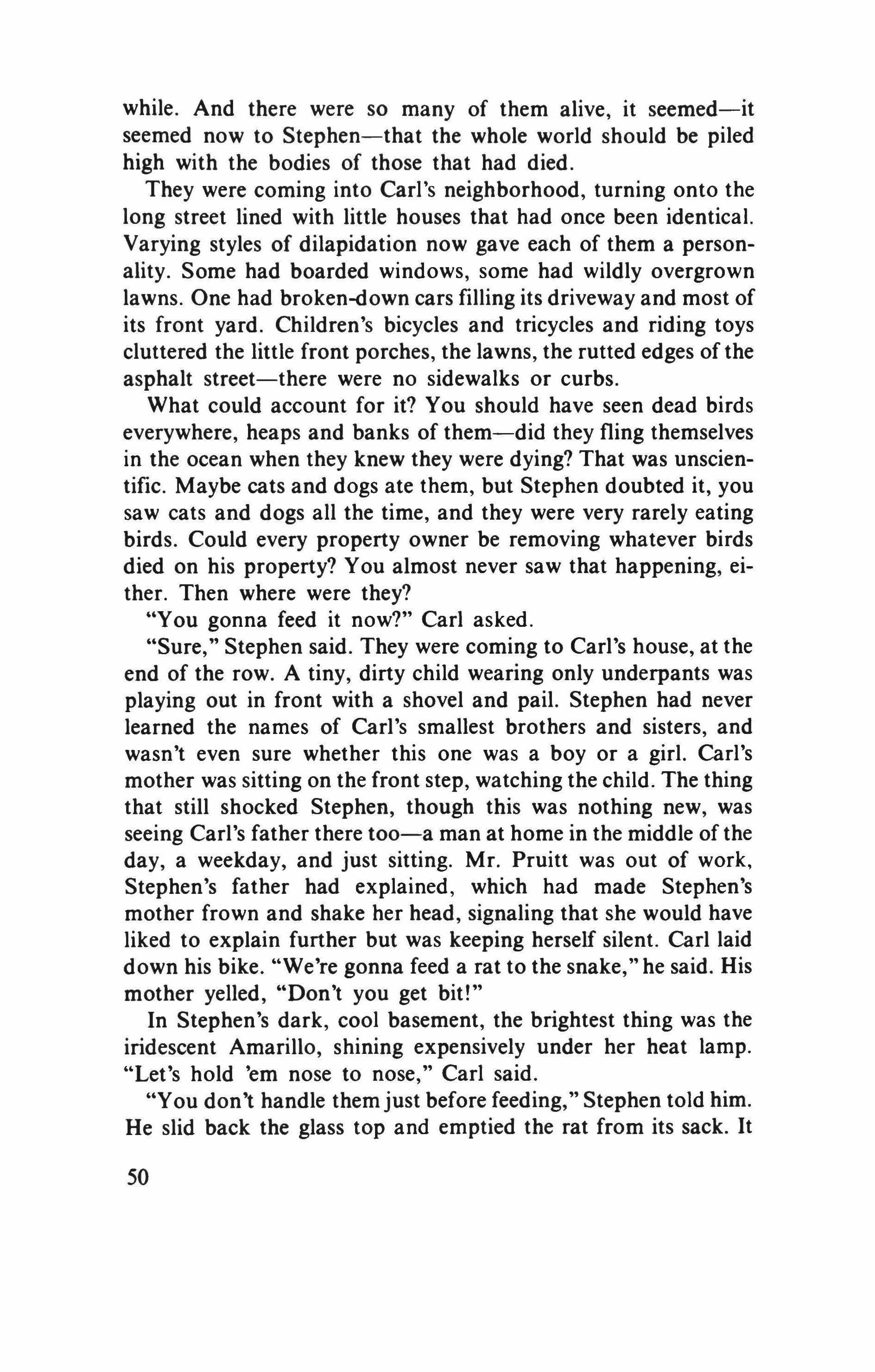
while. And there were so many of them alive, it seemed-it seemed now to Stephen-that the whole world should be piled high with the bodies of those that had died.
They were coming into Carl's neighborhood, turning onto the long street lined with little houses that had once been identical. Varying styles of dilapidation now gave each of them a personality. Some had boarded windows, some had wildly overgrown lawns. One had broken-down cars filling its driveway and most of its front yard. Children's bicycles and tricycles and riding toys cluttered the little front porches, the lawns, the rutted edges of the asphalt street-there were no sidewalks or curbs.
What could account for it? You should have seen dead birds everywhere, heaps and banks of them-did they fling themselves in the ocean when they knew they were dying? That was unscientific. Maybe cats and dogs ate them, but Stephen doubted it, you saw cats and dogs all the time, and they were very rarely eating birds. Could every property owner be removing whatever birds died on his property? You almost never saw that happening, either. Then where were they?
"You gonna feed it now?" Carl asked.
"Sure," Stephen said. They were coming to Carl's house, at the end of the row. A tiny, dirty child wearing only underpants was playing out in front with a shovel and pail. Stephen had never learned the names of Carl's smallest brothers and sisters, and wasn't even sure whether this one was a boy or a girl. Carl's mother was sitting on the front step, watching the child. The thing that still shocked Stephen, though this was nothing new, was seeing Carl's father there too-a man at home in the middle of the day, a weekday, and just sitting. Mr. Pruitt was out of work, Stephen's father had explained, which had made Stephen's mother frown and shake her head, signaling that she would have liked to explain further but was keeping herself silent. Carl laid down his bike. "We're gonna feed a rat to the snake," he said. His mother yelled, "Don't you get bit!"
In Stephen's dark, cool basement, the brightest thing was the iridescent Amarillo, shining expensively under her heat lamp. "Let's hold 'em nose to nose," Carl said.
"You don't handle them just before feeding," Stephen told him. He slid back the glass top and emptied the rat from its sack. It
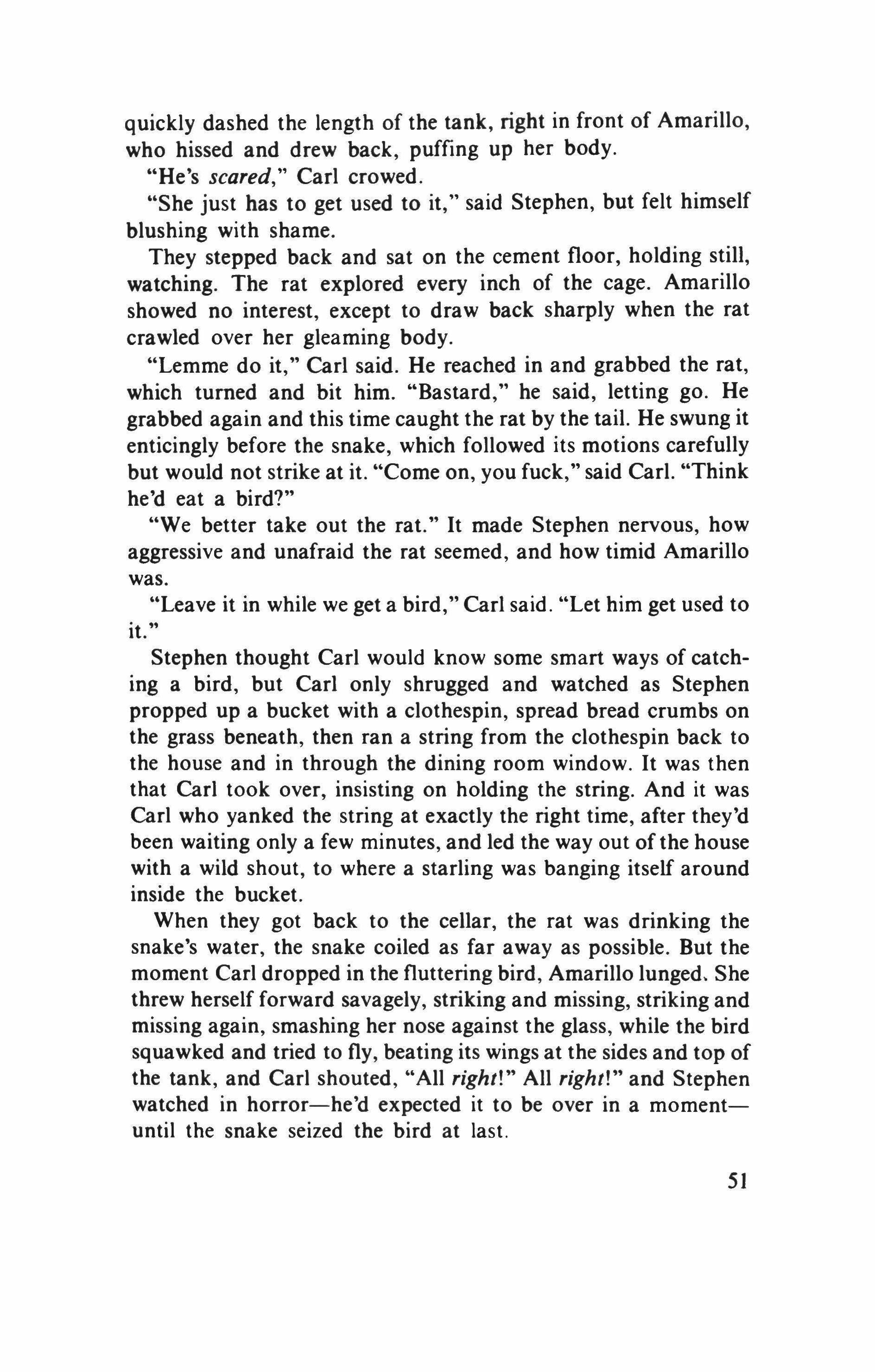
quickly dashed the length of the tank, right in front of Amarillo, who hissed and drew back, puffing up her body.
"He's scared," Carl crowed.
"She just has to get used to it," said Stephen, but felt himself blushing with shame.
They stepped back and sat on the cement floor, holding still, watching. The rat explored every inch of the cage. Amarillo showed no interest, except to draw back sharply when the rat crawled over her gleaming body.
"Lemme do it," Carl said. He reached in and grabbed the rat, which turned and bit him. "Bastard," he said, letting go. He grabbed again and this time caught the rat by the tail. He swung it enticingly before the snake, which followed its motions carefully but would not strike at it. "Come on, you fuck," said Carl. "Think he'd eat a bird?"
"We better take out the rat." It made Stephen nervous, how aggressive and unafraid the rat seemed, and how timid Amarillo was.
"Leave it in while we get a bird," Carl said. "Let him get used to it. "
Stephen thought Carl would know some smart ways of catching a bird, but Carl only shrugged and watched as Stephen propped up a bucket with a clothespin, spread bread crumbs on the grass beneath, then ran a string from the clothespin back to the house and in through the dining room window. It was then that Carl took over, insisting on holding the string. And it was Carl who yanked the string at exactly the right time, after they'd been waiting only a few minutes, and led the way out of the house with a wild shout, to where a starling was banging itself around inside the bucket.
When they got back to the cellar, the rat was drinking the snake's water, the snake coiled as far away as possible. But the moment Carl dropped in the fluttering bird, Amarillo lunged. She threw herself forward savagely, striking and missing, striking and missing again, smashing her nose against the glass, while the bird squawked and tried to fly, beating its wings at the sides and top of the tank, and Carl shouted, "All right!" All right!" and Stephen watched in horror-he'd expected it to be over in a momentuntil the snake seized the bird at last.
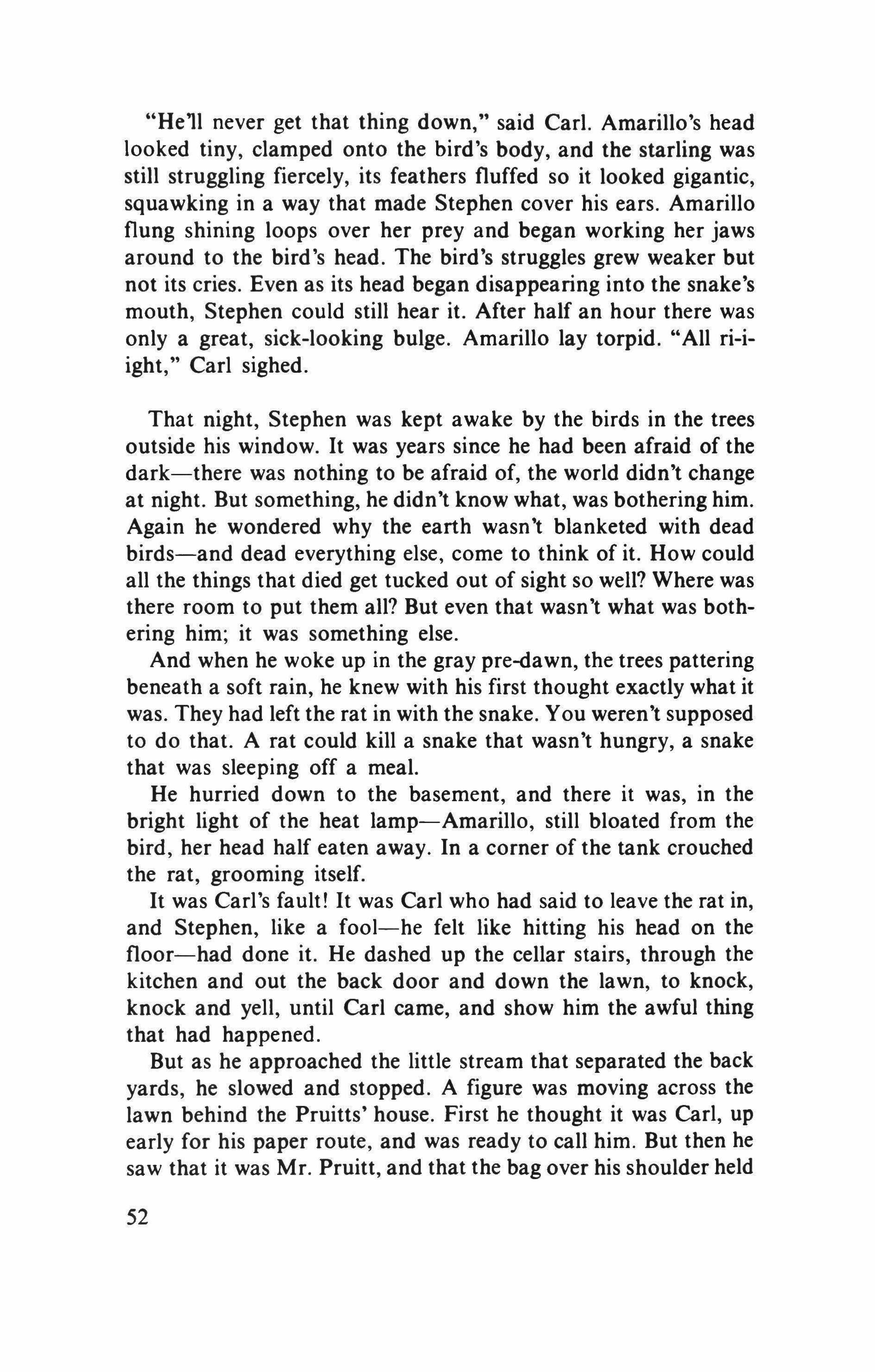
"He'll never get that thing down," said Carl. Amarillo's head looked tiny, clamped onto the bird's body, and the starling was still struggling fiercely, its feathers fluffed so it looked gigantic, squawking in a way that made Stephen cover his ears. Amarillo flung shining loops over her prey and began working her jaws around to the bird's head. The bird's struggles grew weaker but not its cries. Even as its head began disappearing into the snake's mouth, Stephen could still hear it. After half an hour there was only a great, sick-looking bulge. Amarillo lay torpid. "All ri-iight," Carl sighed.
That night, Stephen was kept awake by the birds in the trees outside his window. It was years since he had been afraid of the dark-there was nothing to be afraid of, the world didn't change at night. But something, he didn't know what, was bothering him. Again he wondered why the earth wasn't blanketed with dead birds-and dead everything else, come to think of it. How could all the things that died get tucked out of sight so well? Where was there room to put them all? But even that wasn't what was bothering him; it was something else.
And when he woke up in the gray pre-dawn, the trees pattering beneath a soft rain, he knew with his first thought exactly what it was. They had left the rat in with the snake. You weren't supposed to do that. A rat could kill a snake that wasn't hungry, a snake that was sleeping off a meal.
He hurried down to the basement, and there it was, in the bright light of the heat lamp-Amarillo, still bloated from the bird, her head half eaten away. In a corner of the tank crouched the rat, grooming itself.
It was Carl's fault! It was Carl who had said to leave the rat in, and Stephen, like a fool-he felt like hitting his head on the floor-had done it. He dashed up the cellar stairs, through the kitchen and out the back door and down the lawn, to knock, knock and yell, until Carl came, and show him the awful thing that had happened.
But as he approached the little stream that separated the back yards, he slowed and stopped. A figure was moving across the lawn behind the Pruitts' house. First he thought it was Carl, up early for his paper route, and was ready to call him. But then he saw that it was Mr. Pruitt, and that the bag over his shoulder held
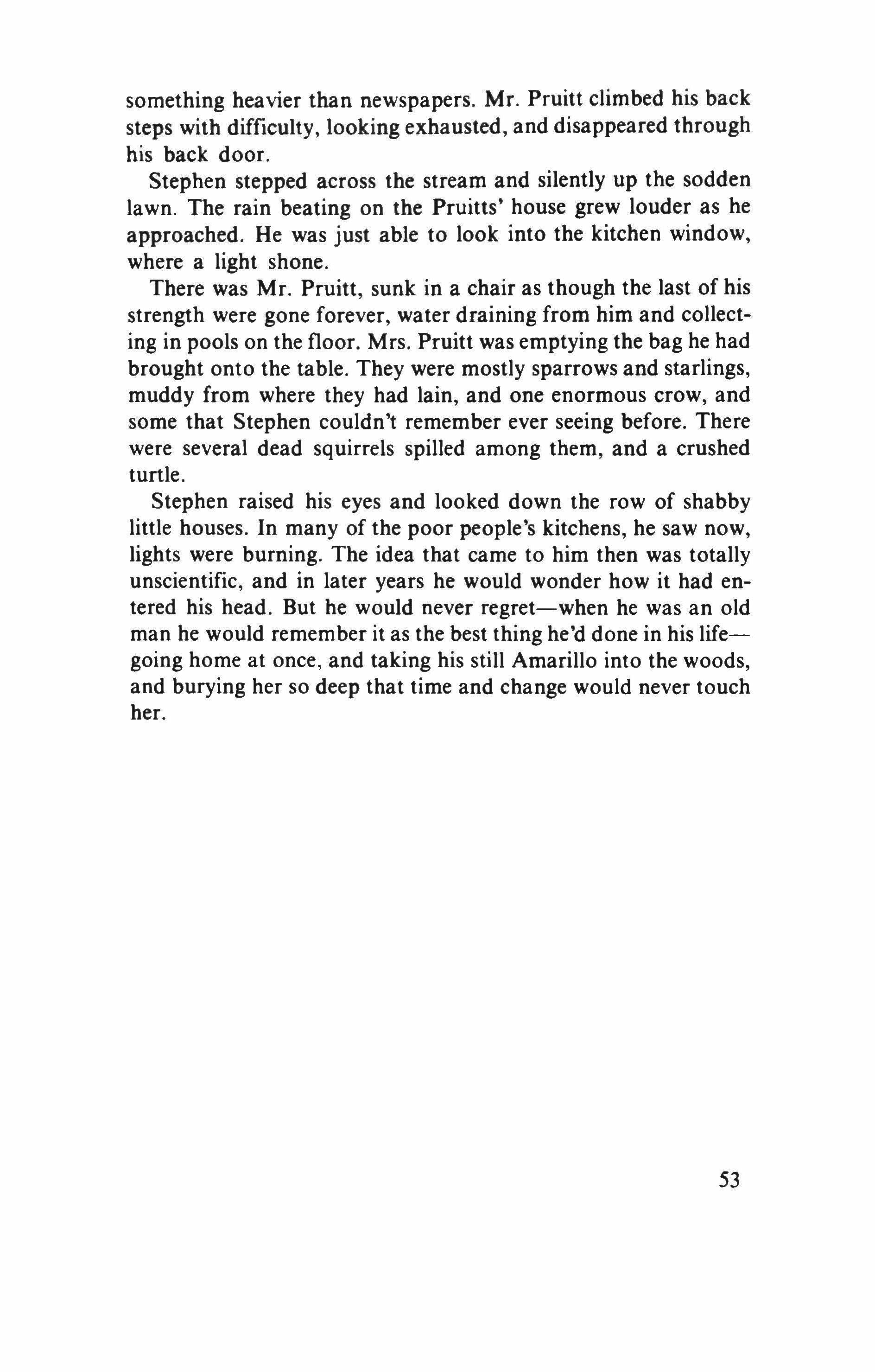
something heavier than newspapers. Mr. Pruitt climbed his back steps with difficulty, looking exhausted, and disappeared through his back door.
Stephen stepped across the stream and silently up the sodden lawn. The rain beating on the Pruitts' house grew louder as he approached. He was just able to look into the kitchen window, where a light shone.
There was Mr. Pruitt, sunk in a chair as though the last of his strength were gone forever, water draining from him and collecting in pools on the floor. Mrs. Pruitt was emptying the bag he had brought onto the table. They were mostly sparrows and starlings, muddy from where they had lain, and one enormous crow, and some that Stephen couldn't remember ever seeing before. There were several dead squirrels spilled among them, and a crushed turtle.
Stephen raised his eyes and looked down the row of shabby little houses. In many of the poor people's kitchens, he saw now, lights were burning. The idea that came to him then was totally unscientific, and in later years he would wonder how it had entered his head. But he would never regret-when he was an old man he would remember it as the best thing he'd done in his lifegoing home at once, and taking his still Amarillo into the woods, and burying her so deep that time and change would never touch her.
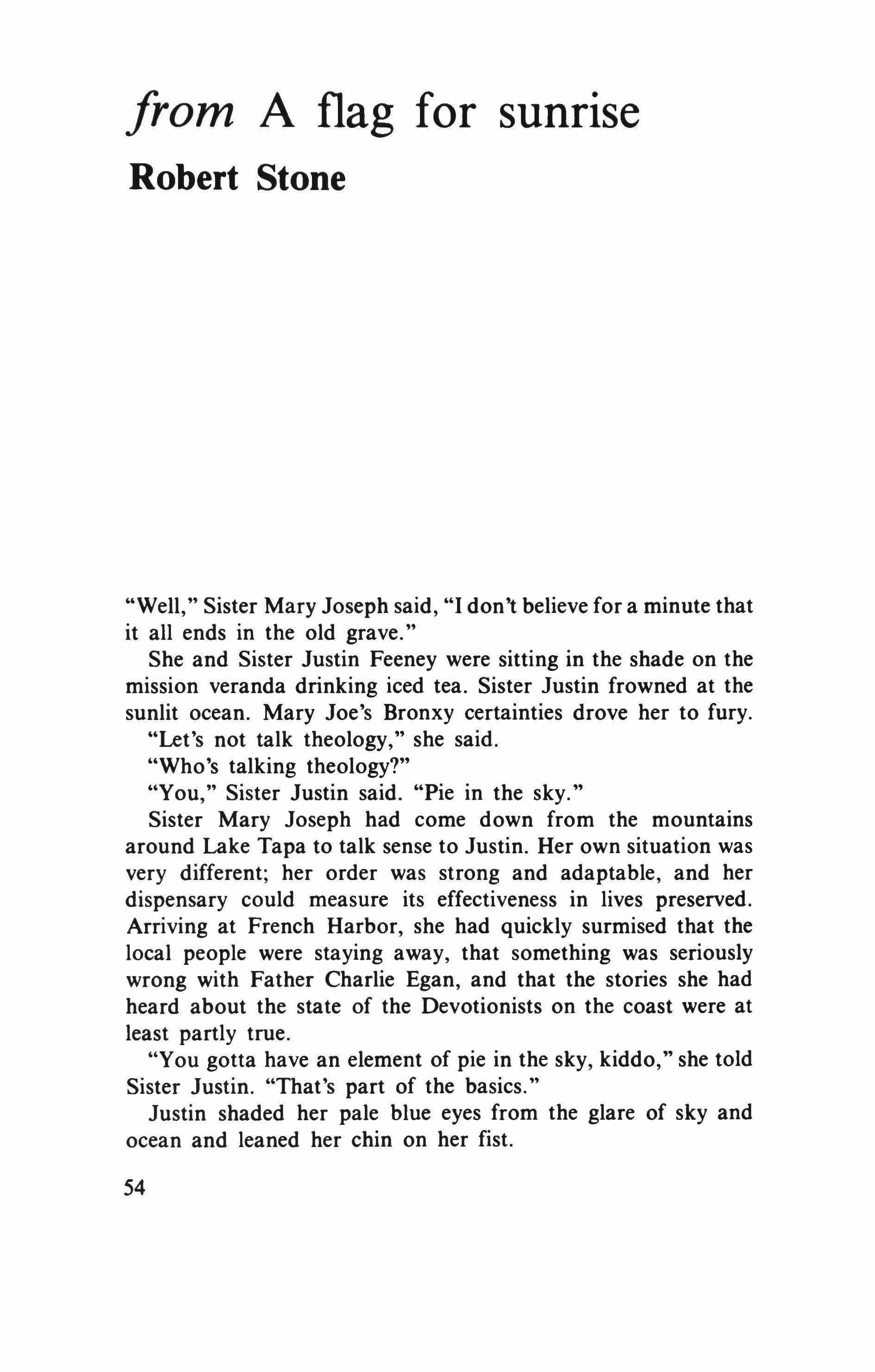
"Well," Sister Mary Joseph said, "I don't believe for a minute that it all ends in the old grave."
She and Sister Justin Feeney were sitting in the shade on the mission veranda drinking iced tea. Sister Justin frowned at the sunlit ocean. Mary Joe's Bronxy certainties drove her to fury.
"Let's not talk theology," she said.
"Who's talking theology?"
"You," Sister Justin said. "Pie in the sky."
Sister Mary Joseph had come down from the mountains around Lake Tapa to talk sense to Justin. Her own situation was very different; her order was strong and adaptable, and her dispensary could measure its effectiveness in lives preserved. Arriving at French Harbor, she had quickly surmised that the local people were staying away, that something was seriously wrong with Father Charlie Egan, and that the stories she had heard about the state of the Devotionists on the coast were at least partly true.
"You gotta have an element of pie in the sky, kiddo," she told Sister Justin. "That's part of the basics."
Justin shaded her pale blue eyes from the glare of sky and ocean and leaned her chin on her fist.
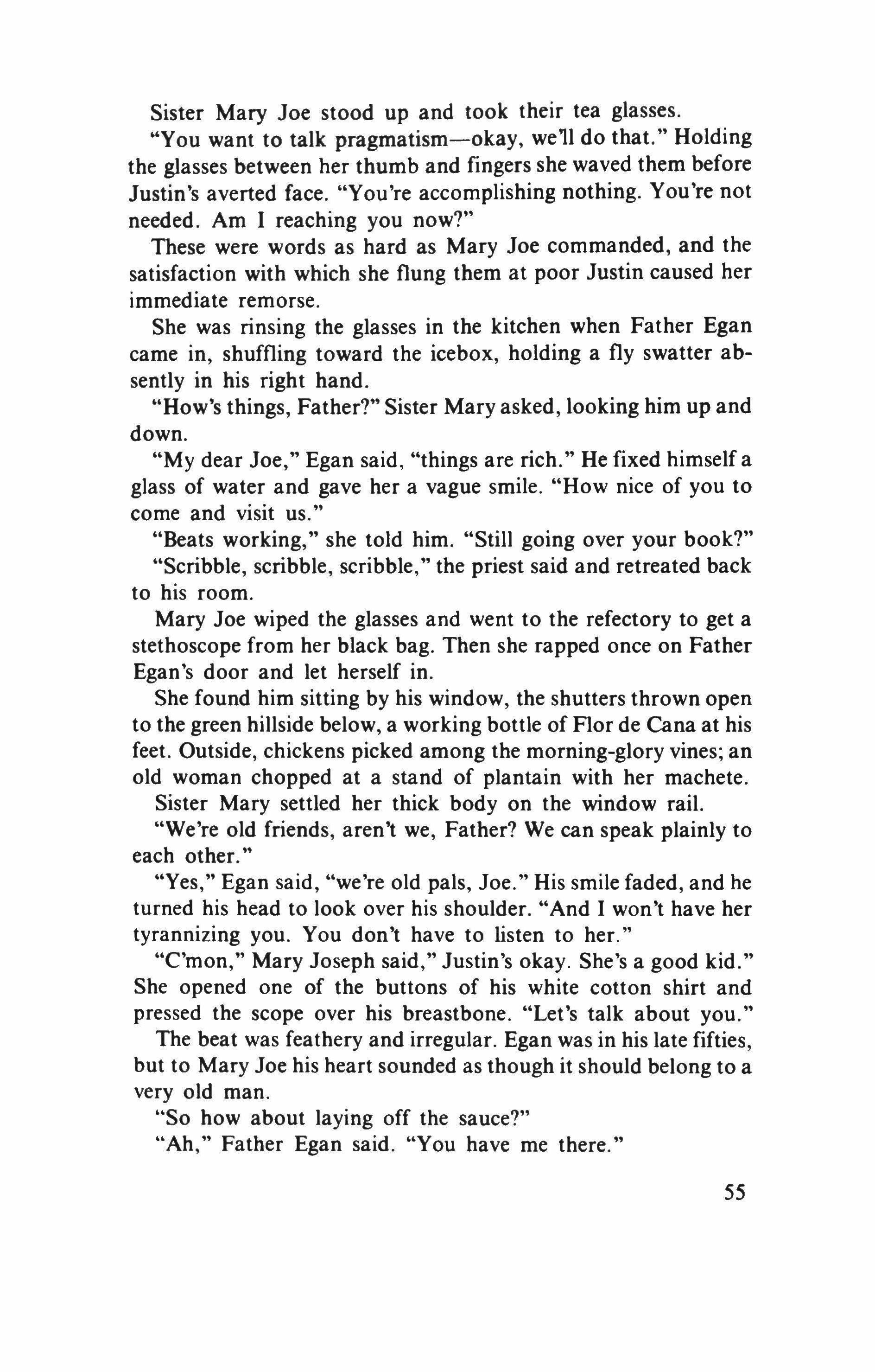
Sister Mary Joe stood up and took their tea glasses.
"You want to talk pragmatism-okay, we'll do that." Holding the glasses between her thumb and fingers she waved them before Justin's averted face. "You're accomplishing nothing. You're not needed. Am I reaching you now?"
These were words as hard as Mary Joe commanded, and the satisfaction with which she flung them at poor Justin caused her immediate remorse.
She was rinsing the glasses in the kitchen when Father Egan came in, shuffling toward the icebox, holding a fly swatter absently in his right hand.
"How's things, Father?" Sister Mary asked, looking him up and down.
"My dear Joe," Egan said, "things are rich." He fixed himself a glass of water and gave her a vague smile. "How nice of you to come and visit us."
"Beats working," she told him. "Still going over your book?"
"Scribble, scribble, scribble," the priest said and retreated back to his room.
Mary Joe wiped the glasses and went to the refectory to get a stethoscope from her black bag. Then she rapped once on Father Egan's door and let herself in.
She found him sitting by his window, the shutters thrown open to the green hillside below, a working bottle of Flor de Cana at his feet. Outside, chickens picked among the morning-glory vines; an old woman chopped at a stand of plantain with her machete.
Sister Mary settled her thick body on the window rail.
"We're old friends, aren't we, Father? We can speak plainly to each other."
"Yes," Egan said, "we're old pals, Joe." His smile faded, and he turned his head to look over his shoulder. "And I won't have her tyrannizing you. You don't have to listen to her."
"C'mon," Mary Joseph said," Justin's okay. She's a good kid." She opened one of the buttons of his white cotton shirt and pressed the scope over his breastbone. "Let's talk about you."
The beat was feathery and irregular. Egan was in his late fifties, but to Mary Joe his heart sounded as though it should belong to a very old man.
"So how about laying off the sauce?"
"Ah," Father Egan said. "You have me there."
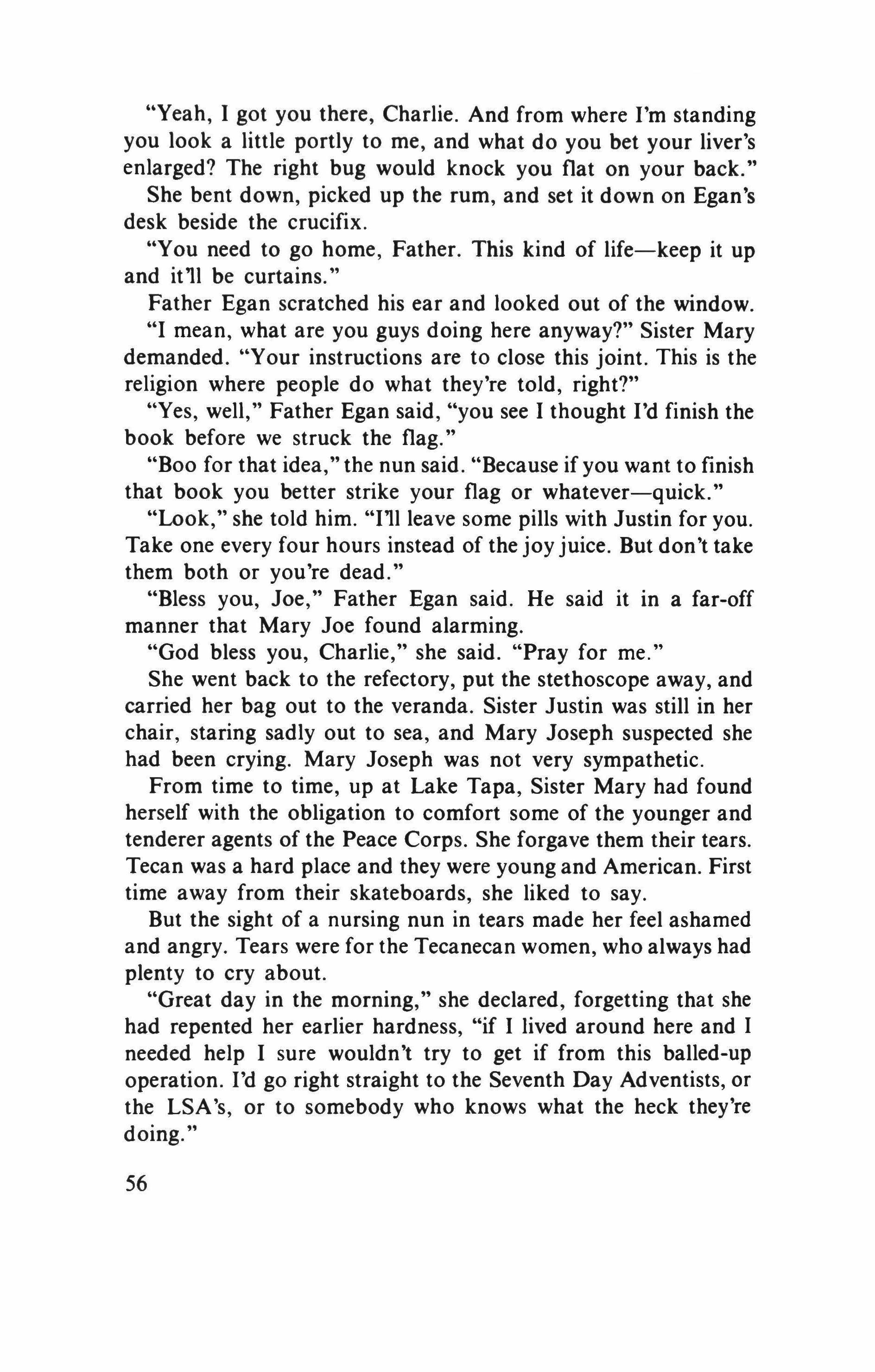
"Yeah, 1 got you there, Charlie. And from where I'm standing you look a little portly to me, and what do you bet your liver's enlarged? The right bug would knock you flat on your back."
She bent down, picked up the rum, and set it down on Egan's desk beside the crucifix.
"You need to go home, Father. This kind of life-keep it up and it'll be curtains."
Father Egan scratched his ear and looked out of the window.
"I mean, what are you guys doing here anyway?" Sister Mary demanded. "Your instructions are to close this joint. This is the religion where people do what they're told, right?"
"Yes, well," Father Egan said, "you see 1 thought I'd finish the book before we struck the flag."
"Boo for that idea," the nun said. "Because if you want to finish that book you better strike your flag or whatever-quick."
"Look," she told him. "111 leave some pills with Justin for you. Take one every four hours instead of the joyjuice. But don't take them both or you're dead."
"Bless you, Joe," Father Egan said. He said it in a far-off manner that Mary Joe found alarming.
"God bless you, Charlie," she said. "Pray for me."
She went back to the refectory, put the stethoscope away, and carried her bag out to the veranda. Sister Justin was still in her chair, staring sadly out to sea, and Mary Joseph suspected she had been crying. Mary Joseph was not very sympathetic.
From time to time, up at Lake Tapa, Sister Mary had found herself with the obligation to comfort some of the younger and tenderer agents of the Peace Corps. She forgave them their tears. Tecan was a hard place and they were young and American. First time away from their skateboards, she liked to say.
But the sight of a nursing nun in tears made her feel ashamed and angry. Tears were for the Tecanecan women, who always had plenty to cry about.
"Great day in the morning," she declared, forgetting that she had repented her earlier hardness, "if 1 lived around here and I needed help 1 sure wouldn't try to get if from this balled-up operation. I'd go right straight to the Seventh Day Adventists, or the LSA's, or to somebody who knows what the heck they're doing."
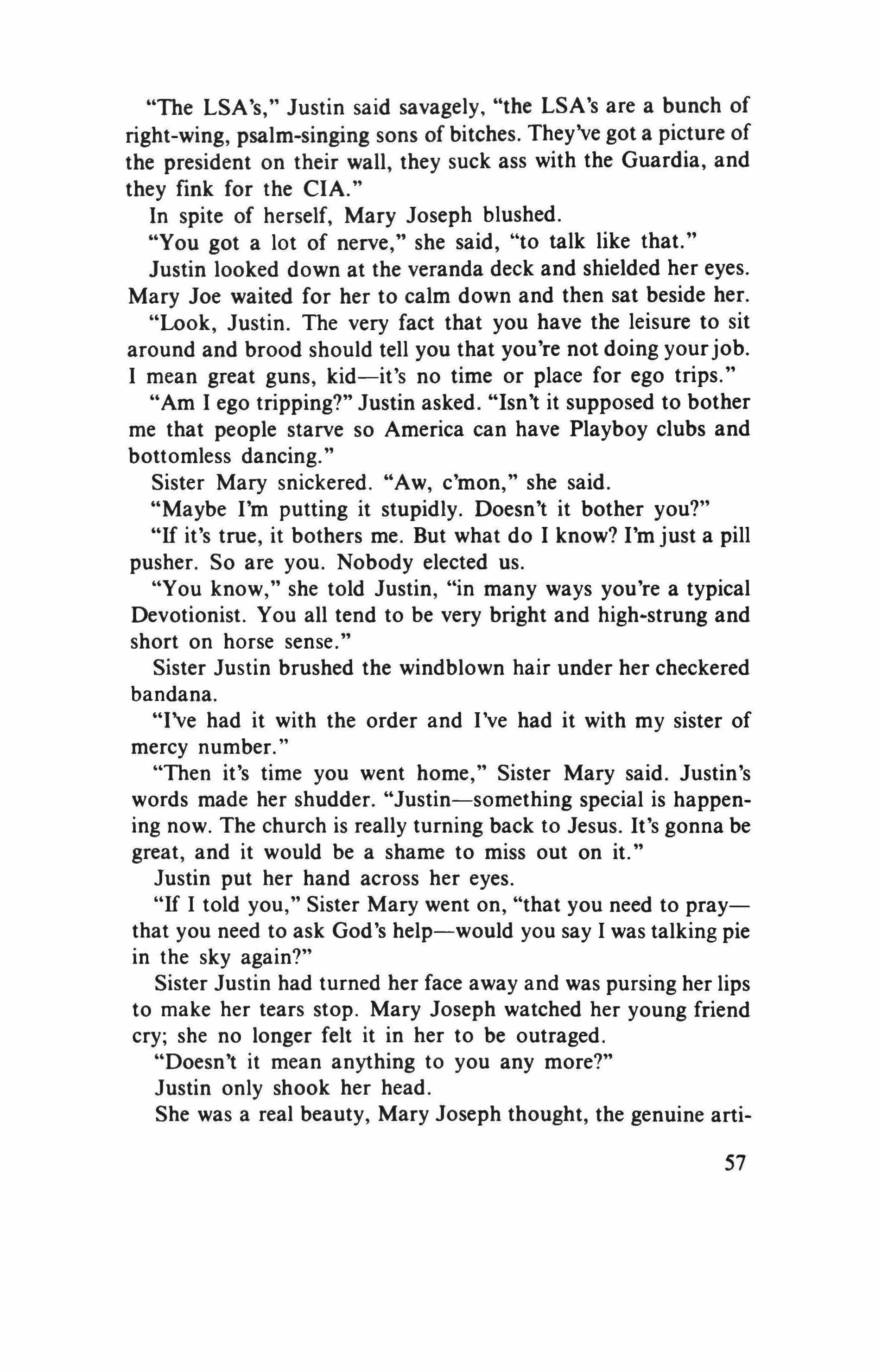
"The LSA's," Justin said savagely, "the LSA's are a bunch of right-wing, psalm-singing sons of bitches. They've got a picture of the president on their wall, they suck ass with the Guardia, and they fink for the CIA."
In spite of herself, Mary Joseph blushed.
"You got a lot of nerve," she said, "to talk like that."
Justin looked down at the veranda deck and shielded her eyes. Mary Joe waited for her to calm down and then sat beside her.
"Look, Justin. The very fact that you have the leisure to sit around and brood should tell you that you're not doing yourjob. I mean great guns, kid-it's no time or place for ego trips."
"Am I ego tripping?" Justin asked. "Isn't it supposed to bother me that people starve so America can have Playboy clubs and bottomless dancing."
Sister Mary snickered. "Aw, c'mon," she said.
"Maybe I'm putting it stupidly. Doesn't it bother you?"
"If it's true, it bothers me. But what do I know? I'm just a pill pusher. So are you. Nobody elected us.
"You know," she told Justin, "in many ways you're a typical Devotionist. You all tend to be very bright and high-strung and short on horse sense."
Sister Justin brushed the windblown hair under her checkered bandana.
"I've had it with the order and I've had it with my sister of mercy number."
"Then it's time you went home," Sister Mary said. Justin's words made her shudder. "Justin-something special is happening now. The church is really turning back to Jesus. It's gonna be great, and it would be a shame to miss out on it."
Justin put her hand across her eyes.
"If I told you," Sister Mary went on, "that you need to praythat you need to ask God's help-would you say I was talking pie in the sky again?"
Sister Justin had turned her face away and was pursing her lips to make her tears stop. Mary Joseph watched her young friend cry; she no longer felt it in her to be outraged.
"Doesn't it mean anything to you any more?"
Justin only shook her head.
She was a real beauty, Mary Joseph thought, the genuine arti-
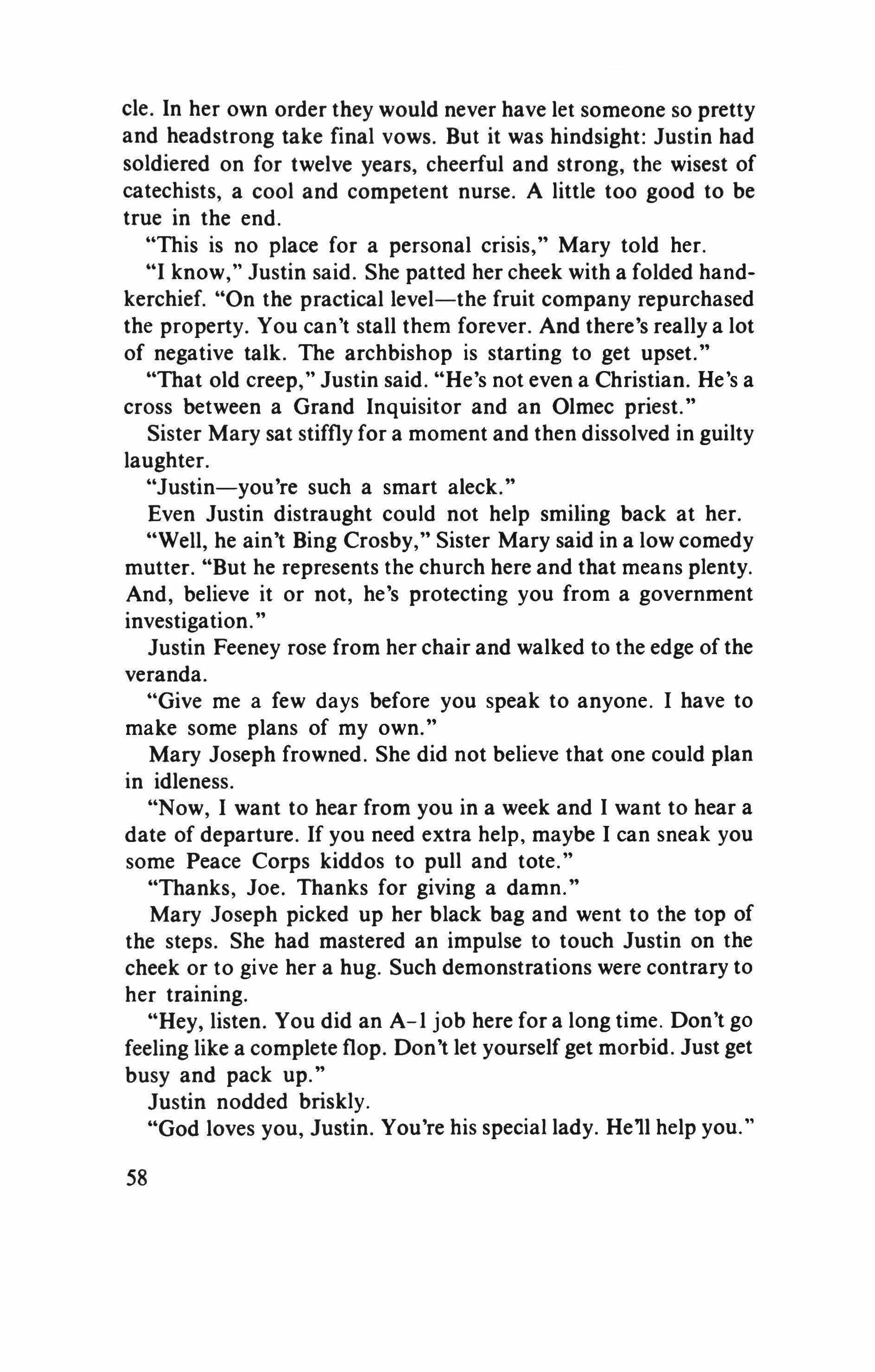
cleo In her own order they would never have let someone so pretty and headstrong take final vows. But it was hindsight: Justin had soldiered on for twelve years, cheerful and strong, the wisest of catechists, a cool and competent nurse. A little too good to be true in the end.
"This is no place for a personal crisis," Mary told her.
"I know," Justin said. She patted her cheek with a folded handkerchief. "On the practical level-the fruit company repurchased the property. You can't stall them forever. And there's really a lot of negative talk. The archbishop is starting to get upset."
"That old creep," Justin said. "He's not even a Christian. He's a cross between a Grand Inquisitor and an Olmec priest."
Sister Mary sat stiffly for a moment and then dissolved in guilty laughter.
"Justin-you're such a smart aleck."
Even Justin distraught could not help smiling back at her.
"Well, he ain't Bing Crosby," Sister Mary said in a low comedy mutter. "But he represents the church here and that means plenty. And, believe it or not, he's protecting you from a government investigation.
Justin Feeney rose from her chair and walked to the edge of the veranda.
"Give me a few days before you speak to anyone. I have to make some plans of my own."
Mary Joseph frowned. She did not believe that one could plan in idleness.
"Now, I want to hear from you in a week and I want to hear a date of departure. If you need extra help, maybe I can sneak you some Peace Corps kiddos to pull and tote."
"Thanks, Joe. Thanks for giving a damn."
Mary Joseph picked up her black bag and went to the top of the steps. She had mastered an impulse to touch Justin on the cheek or to give her a hug. Such demonstrations were contrary to her training.
"Hey, listen. You did an A-I job here for a long time. Don't go feeling like a complete flop. Don't let yourself get morbid. Just get busy and pack up."
Justin nodded briskly.
"God loves you, Justin. You're his special lady He'll help you.
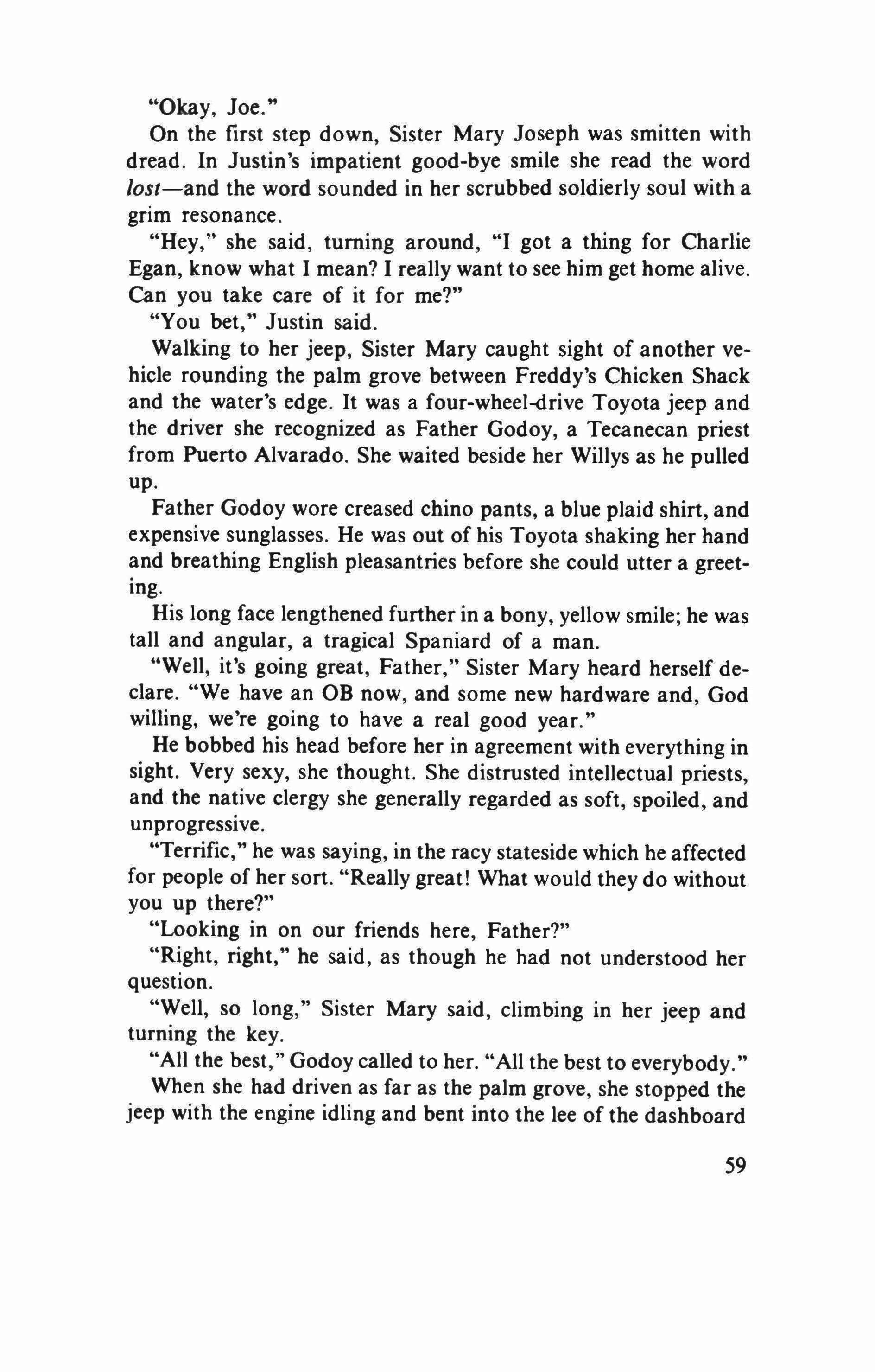
"Okay, Joe."
On the first step down, Sister Mary Joseph was smitten with dread. In Justin's impatient good-bye smile she read the word lost-and the word sounded in her scrubbed soldierly soul with a grim resonance.
"Hey," she said, turning around, "I got a thing for Charlie Egan, know what I mean? I really want to see him get home alive. Can you take care of it for me?"
"You bet," Justin said.
Walking to her jeep, Sister Mary caught sight of another vehicle rounding the palm grove between Freddy's Chicken Shack and the water's edge. It was a four-wheel-drive Toyota jeep and the driver she recognized as Father Godoy, a Tecanecan priest from Puerto Alvarado. She waited beside her Willys as he pulled up.
Father Godoy wore creased chino pants, a blue plaid shirt, and expensive sunglasses. He was out of his Toyota shaking her hand and breathing English pleasantries before she could utter a greeting.
His long face lengthened further in a bony, yellow smile; he was tall and angular, a tragical Spaniard of a man.
"Well, it's going great, Father," Sister Mary heard herself declare. "We have an OB now, and some new hardware and, God willing, we're going to have a real good year."
He bobbed his head before her in agreement with everything in sight. Very sexy, she thought. She distrusted intellectual priests, and the native clergy she generally regarded as soft, spoiled, and unprogressive.
"Terrific," he was saying, in the racy stateside which he affected for people of her sort. "Really great! What would they do without you up there?"
"Looking in on our friends here, Father?"
"Right, right," he said, as though he had not understood her question.
"Well, so long," Sister Mary said, climbing in her jeep and turning the key.
"All the best," Godoy called to her. "All the best to everybody."
When she had driven as far as the palm grove, she stopped the jeep with the engine idling and bent into the lee of the dashboard
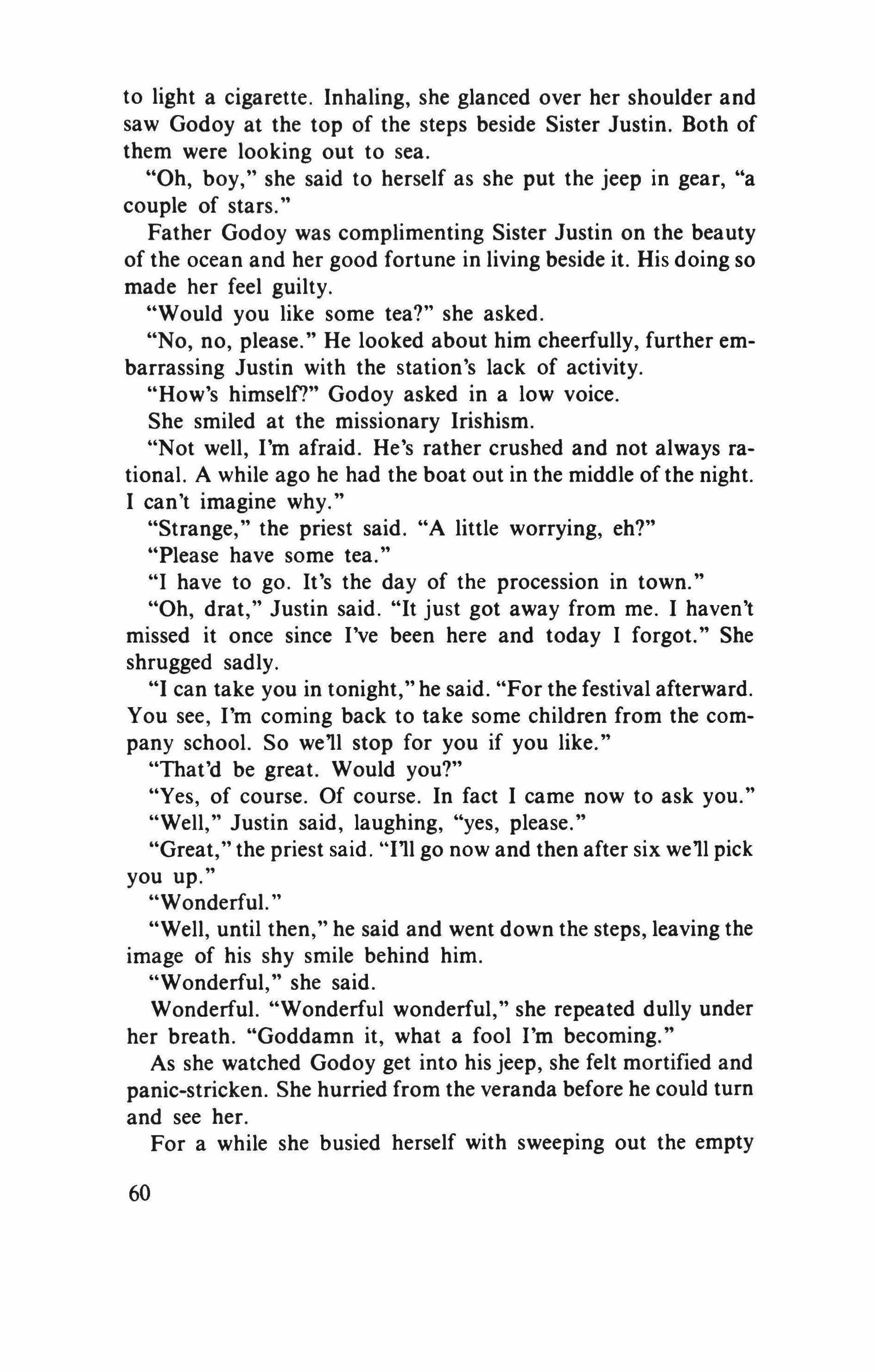
to light a cigarette. Inhaling, she glanced over her shoulder and saw Godoy at the top of the steps beside Sister Justin. Both of them were looking out to sea.
"Oh, boy," she said to herself as she put the jeep in gear, "a couple of stars."
Father Godoy was complimenting Sister Justin on the beauty of the ocean and her good fortune in living beside it. His doing so made her feel guilty.
"Would you like some tea?" she asked. "No, no, please." He looked about him cheerfully, further embarrassing Justin with the station's lack of activity.
"How's himself?" Godoy asked in a low voice. She smiled at the missionary Irishism.
"Not well, I'm afraid. He's rather crushed and not always rational. A while ago he had the boat out in the middle of the night. I can't imagine why."
"Strange," the priest said. "A little worrying, eh?"
"Please have some tea."
"I have to go. It's the day of the procession in town."
"Oh, drat," Justin said. "It just got away from me. I haven't missed it once since I've been here and today 1 forgot." She shrugged sadly.
"I can take you in tonight," he said. "For the festival afterward. You see, I'm coming back to take some children from the company school. So we'll stop for you if you like."
"That'd be great. Would you?"
"Yes, of course. Of course. In fact I came now to ask you."
"Well," Justin said, laughing, "yes, please."
"Great," the priest said. "111 go now and then after six we'll pick you up."
"Wonderful. "
"Well, until then," he said and went down the steps, leaving the image of his shy smile behind him.
"Wonderful," she said.
Wonderful. "Wonderful wonderful," she repeated dully under her breath. "Goddamn it, what a fool I'm becoming."
As she watched Godoy get into his jeep, she felt mortified and panic-stricken. She hurried from the veranda before he could turn and see her.
For a while she busied herself with sweeping out the empty
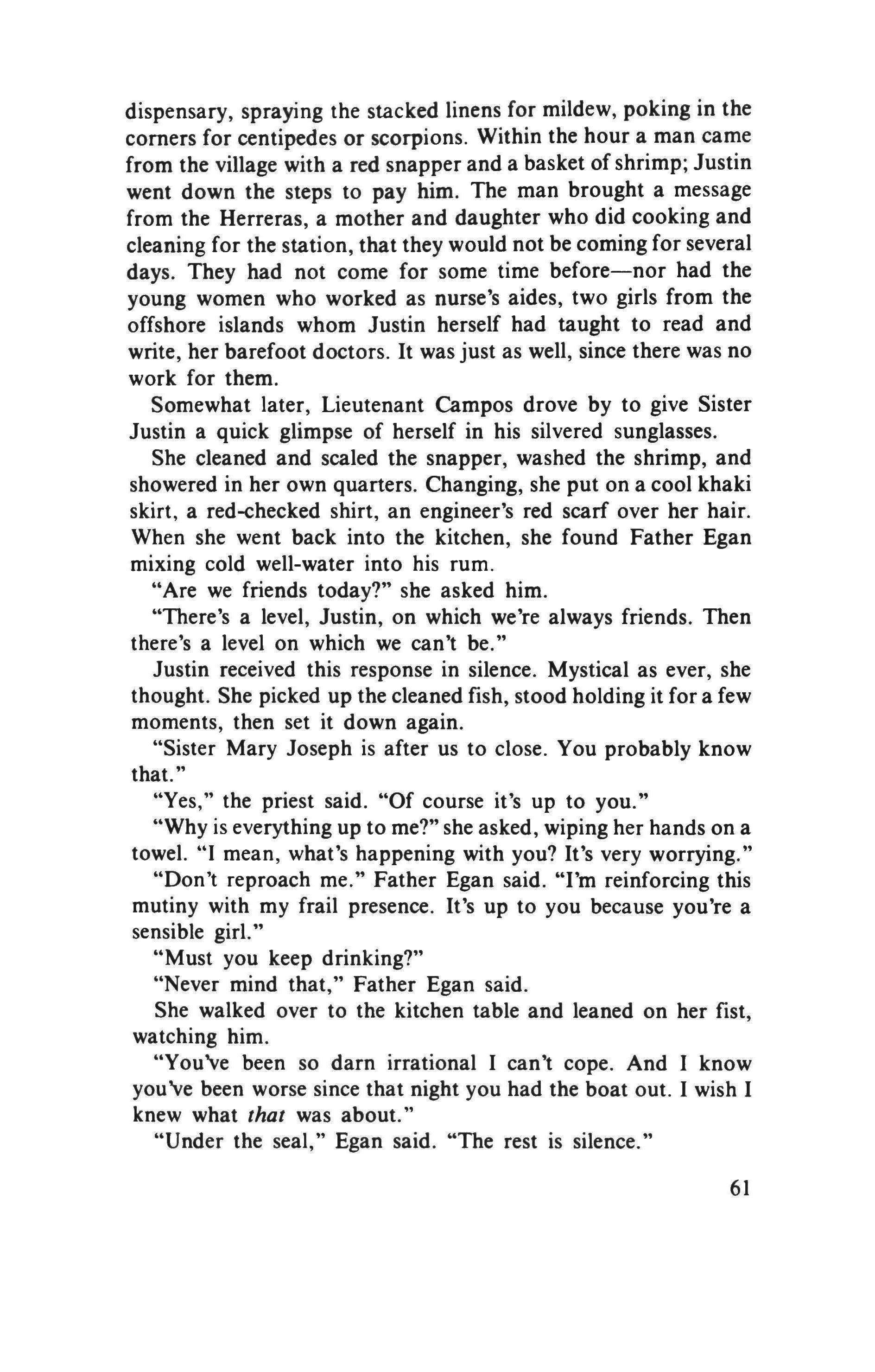
dispensary, spraying the stacked linens for mildew, poking in the comers for centipedes or scorpions. Within the hour a man came from the village with a red snapper and a basket of shrimp; Justin went down the steps to pay him. The man brought a message from the Herreras, a mother and daughter who did cooking and cleaning for the station, that they would not be coming for several days. They had not come for some time before-nor had the young women who worked as nurse's aides, two girls from the offshore islands whom Justin herself had taught to read and write, her barefoot doctors. It was just as well, since there was no work for them.
Somewhat later, Lieutenant Campos drove by to give Sister Justin a quick glimpse of herself in his silvered sunglasses. She cleaned and scaled the snapper, washed the shrimp, and showered in her own quarters. Changing, she put on a cool khaki skirt, a red-checked shirt, an engineer's red scarf over her hair. When she went back into the kitchen, she found Father Egan mixing cold well-water into his rum.
"Are we friends today?" she asked him.
"There's a level, Justin, on which we're always friends. Then there's a level on which we can't be."
Justin received this response in silence. Mystical as ever, she thought. She picked up the cleaned fish, stood holding it for a few moments, then set it down again.
"Sister Mary Joseph is after us to close. You probably know that.
"Yes," the priest said. "Of course it's up to you."
"Why is everything up to me?" she asked, wiping her hands on a towel. "I mean, what's happening with you? It's very worrying."
"Don't reproach me." Father Egan said. "I'm reinforcing this mutiny with my frail presence. It's up to you because you're a sensible girl."
"Must you keep drinking?"
"Never mind that," Father Egan said.
She walked over to the kitchen table and leaned on her fist, watching him.
"You've been so dam irrational I can't cope. And I know you've been worse since that night you had the boat out. I wish I knew what that was about."
"Under the seal," Egan said. "The rest is silence."
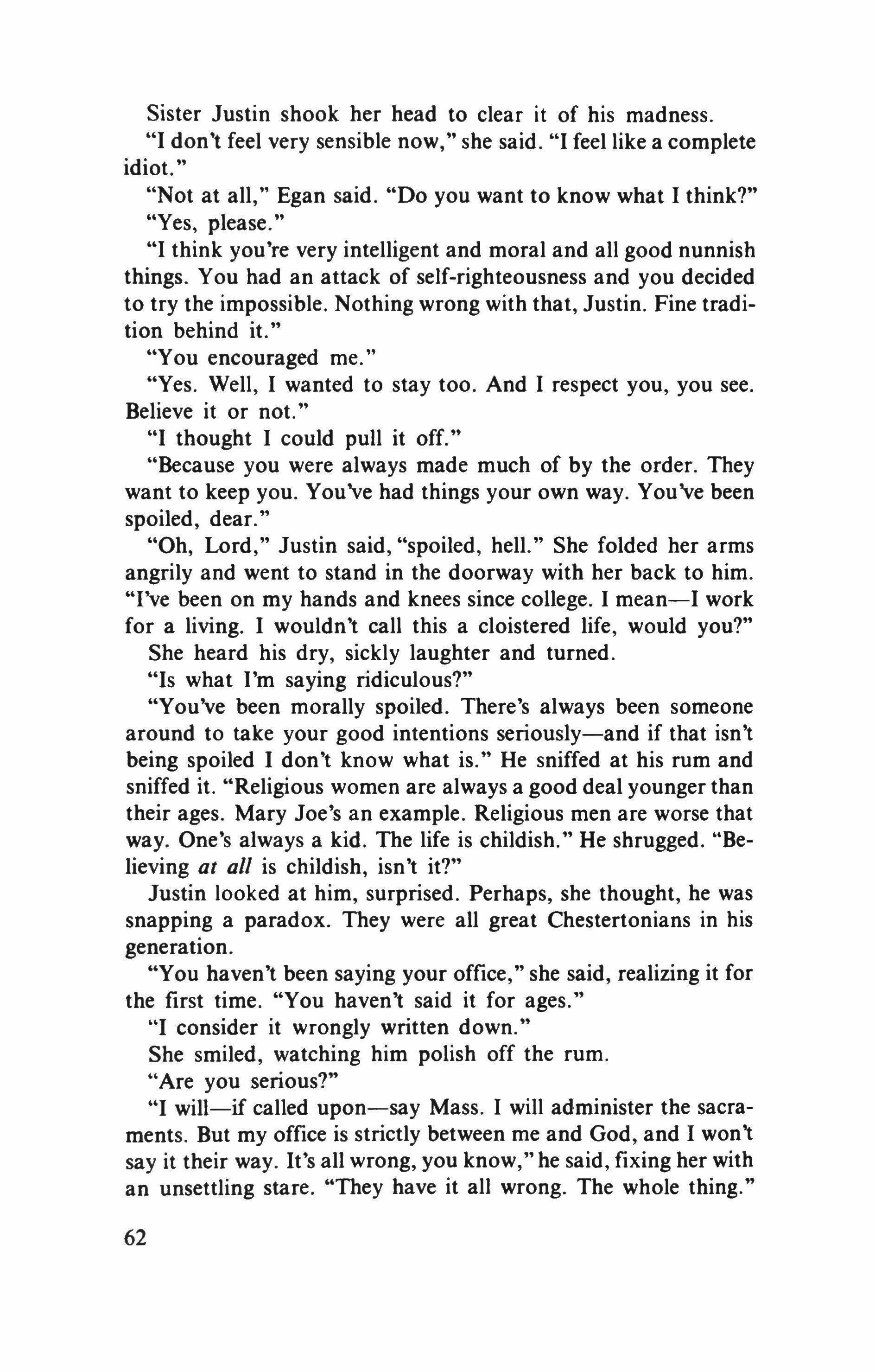
Sister Justin shook her head to clear it of his madness.
"I don't feel very sensible now," she said. "I feel like a complete idiot.
"Not at all," Egan said. "Do you want to know what I think?"
"Yes, please."
"I think you're very intelligent and moral and all good nunnish things. You had an attack of self-righteousness and you decided to try the impossible. Nothing wrong with that, Justin. Fine tradition behind it."
"You encouraged me."
"Yes. Well, I wanted to stay too. And I respect you, you see. Believe it or not."
"I thought I could pull it off."
"Because you were always made much of by the order. They want to keep you. You've had things your own way. You've been spoiled, dear."
"Oh, Lord," Justin said, "spoiled, hell." She folded her arms angrily and went to stand in the doorway with her back to him. "I've been on my hands and knees since college. I mean-I work for a living. I wouldn't call this a cloistered life, would you?"
She heard his dry, sickly laughter and turned.
"Is what I'm saying ridiculous?"
"You've been morally spoiled. There's always been someone around to take your good intentions seriously-and if that isn't being spoiled I don't know what is." He sniffed at his rum and sniffed it. "Religious women are always a good deal younger than their ages. Mary Joe's an example. Religious men are worse that way. One's always a kid. The life is childish." He shrugged. "Believing at all is childish, isn't it?"
Justin looked at him, surprised. Perhaps, she thought, he was snapping a paradox. They were all great Chestertonians in his generation.
"You haven't been saying your office," she said, realizing it for the first time. "You haven't said it for ages."
"I consider it wrongly written down."
She smiled, watching him polish off the rum.
"Are you serious?"
"I will-if called upon-say Mass. I will administer the sacraments. But my office is strictly between me and God, and I won't say it their way. It's all wrong, you know," he said, fixing her with an unsettling stare. "They have it all wrong. The whole thing."
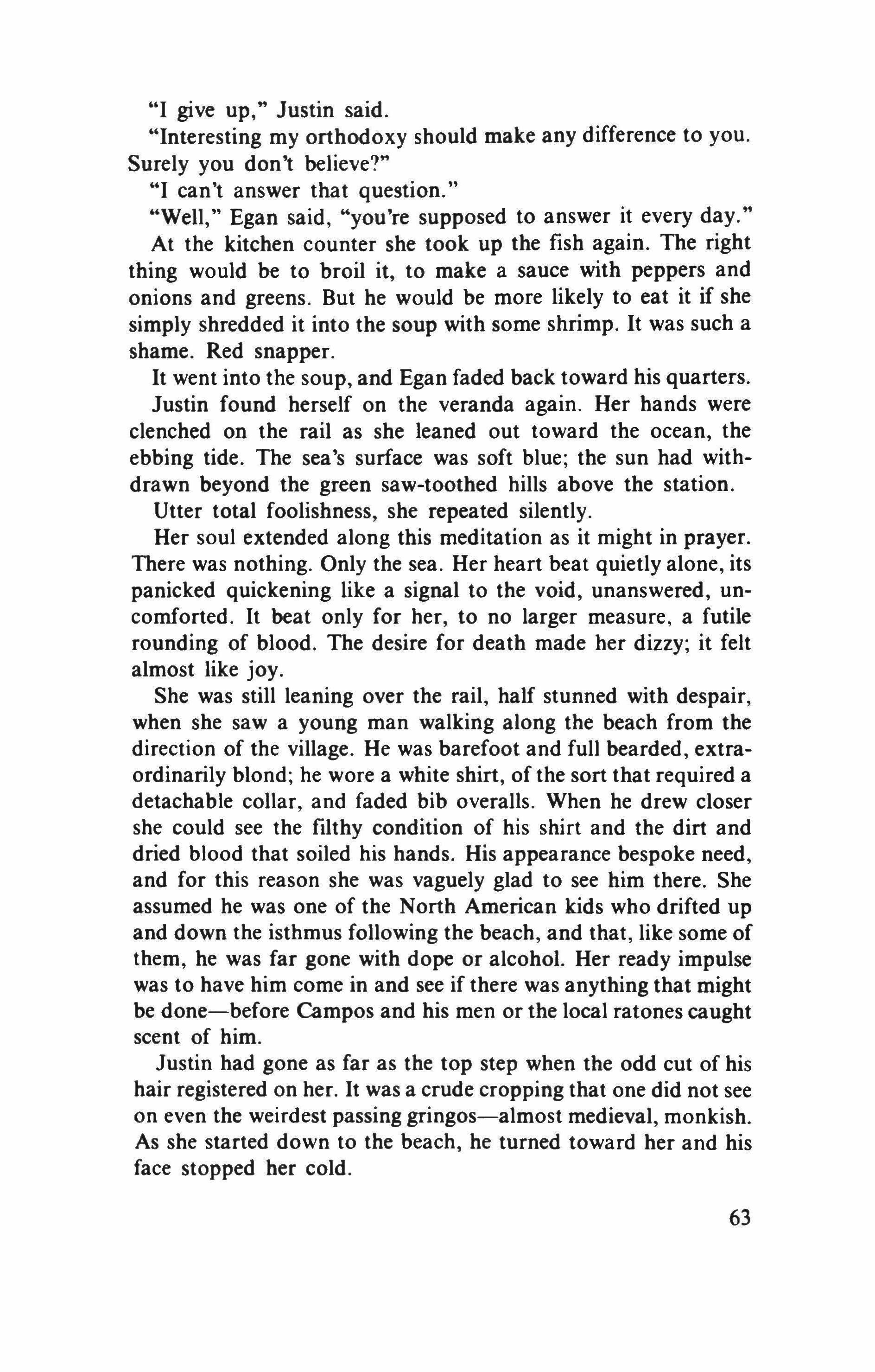
"I give up," Justin said.
"Interesting my orthodoxy should make any difference to you. Surely you don't believe?"
"I can't answer that question."
"Well," Egan said, "you're supposed to answer it every day."
At the kitchen counter she took up the fish again. The right thing would be to broil it, to make a sauce with peppers and onions and greens. But he would be more likely to eat it if she simply shredded it into the soup with some shrimp. It was such a shame. Red snapper.
It went into the soup, and Egan faded back toward his quarters.
Justin found herself on the veranda again. Her hands were clenched on the rail as she leaned out toward the ocean, the ebbing tide. The sea's surface was soft blue; the sun had withdrawn beyond the green saw-toothed hills above the station.
Utter total foolishness, she repeated silently. Her soul extended along this meditation as it might in prayer. There was nothing. Only the sea. Her heart beat quietly alone, its panicked quickening like a signal to the void, unanswered, uncomforted. It beat only for her, to no larger measure, a futile rounding of blood. The desire for death made her dizzy; it felt almost like joy.
She was still leaning over the rail, half stunned with despair, when she saw a young man walking along the beach from the direction of the village. He was barefoot and full bearded, extraordinarily blond; he wore a white shirt, of the sort that required a detachable collar, and faded bib overalls. When he drew closer she could see the filthy condition of his shirt and the dirt and dried blood that soiled his hands. His appearance bespoke need, and for this reason she was vaguely glad to see him there. She assumed he was one of the North American kids who drifted up and down the isthmus following the beach, and that, like some of them, he was far gone with dope or alcohol. Her ready impulse was to have him come in and see if there was anything that might be done-before Campos and his men or the local ratones caught scent of him.
Justin had gone as far as the top step when the odd cut of his hair registered on her. It was a crude cropping that one did not see on even the weirdest passing gringos-almost medieval, monkish. As she started down to the beach, he turned toward her and his face stopped her cold.
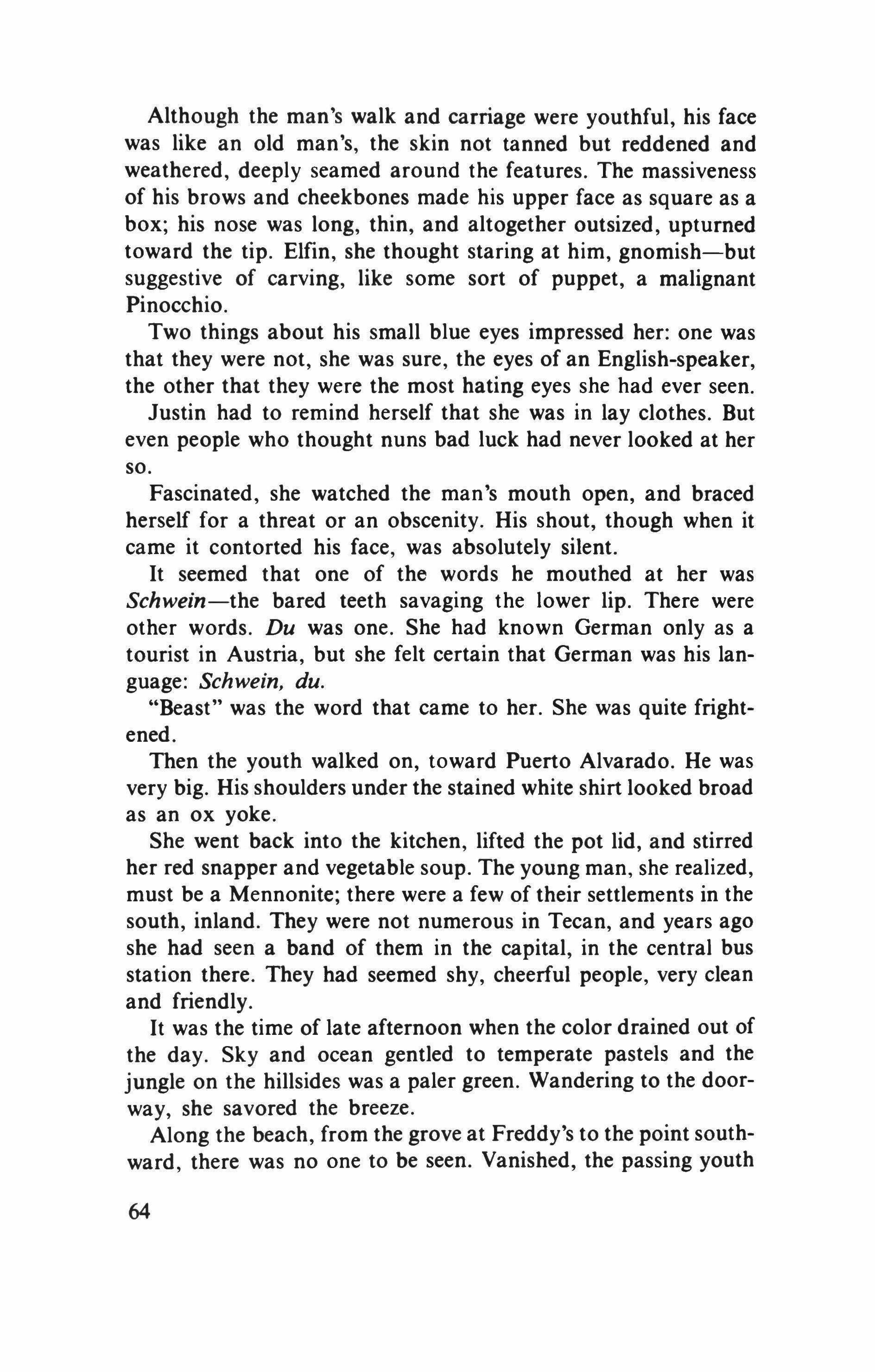
Although the man's walk and carriage were youthful, his face was like an old man's, the skin not tanned but reddened and weathered, deeply seamed around the features. The massiveness of his brows and cheekbones made his upper face as square as a box; his nose was long, thin, and altogether outsized, upturned toward the tip. Elfin, she thought staring at him, gnomish-but suggestive of carving, like some sort of puppet, a malignant Pinocchio.
Two things about his small blue eyes impressed her: one was that they were not, she was sure, the eyes of an English-speaker, the other that they were the most hating eyes she had ever seen.
Justin had to remind herself that she was in lay clothes. But even people who thought nuns bad luck had never looked at her so.
Fascinated, she watched the man's mouth open, and braced herself for a threat or an obscenity. His shout, though when it came it contorted his face, was absolutely silent.
It seemed that one of the words he mouthed at her was Schwein-the bared teeth savaging the lower lip. There were other words. Du was one. She had known German only as a tourist in Austria, but she felt certain that German was his language: Schwein, duo "Beast" was the word that came to her. She was quite frightened.
Then the youth walked on, toward Puerto Alvarado. He was very big. His shoulders under the stained white shirt looked broad as an ox yoke.
She went back into the kitchen, lifted the pot lid, and stirred her red snapper and vegetable soup. The young man, she realized, must be a Mennonite; there were a few of their settlements in the south, inland. They were not numerous in Tecan, and years ago she had seen a band of them in the capital, in the central bus station there. They had seemed shy, cheerful people, very clean and friendly.
It was the time of late afternoon when the color drained out of the day. Sky and ocean gentled to temperate pastels and the jungle on the hillsides was a paler green. Wandering to the doorway, she savored the breeze.
Along the beach, from the grove at Freddy's to the point southward, there was no one to be seen. Vanished, the passing youth

seemed to be a creature compounded of her fears; the hatred, the German-ness were the stuff of nightmare and bad history. Somehow her despair had summoned him.
When Godoy and his jeep load of small boys pulled up at the foot of the station steps, she ran down gratefully to join them. The boys were black Caribs, and there were six of them crowded into the jeep, some with the Indian cast of eye or the shock of coarse straight hair that marked the Caribs among the black people of the coast.
"Buenas," she called to them and to Godoy.
"Buenas," the boys said and made room for her. Some of the younger boys smiled; the two oldest ogled her with grim elaborateness. She sat down next to the priest.
"We're off," he declared.
"Right on," Sister Justin said gaily.
Along the roadside, plantation hands walked homeward, cradling their machetes against their shoulders; children struggled along under loads of firewood for the evening meal. At every fresh creek there were women gathering up laundry from the rocks on which it had been drying in the last of the daylight, and other women hurrying along balancing ochre jugs on their heads, filled with cooking water from the public well. But most of the people on the road were walking toward Puerto Alvarado and what remained of the day's fiesta.
Each time they passed a settlement of sticks and palm thatch, Godoy would sound his horn, a child would wave, and the boys in the jeep would display their privilege as passengers in a private vehicle.
The road led them inland through banana and then pineapple, to the top of Pico Hill, where they could see the ocean again and the wharves of the distant port; then down again past acres of yellow-painted, numbered company houses; finally to the tin and crate-wood shacks on the edge of town. From the town center they could hear the report of exploding firecrackers and the blare of the sound truck the Syrian storekeeper had hired to publicize his holiday specials.
There was a block of paved street where the houses had carports and painted fences, then the Gran Hotel, the Texaco station-and they turned into the crowded plaza. Godoy eased the jeep through the crowds and parked against the church wall,
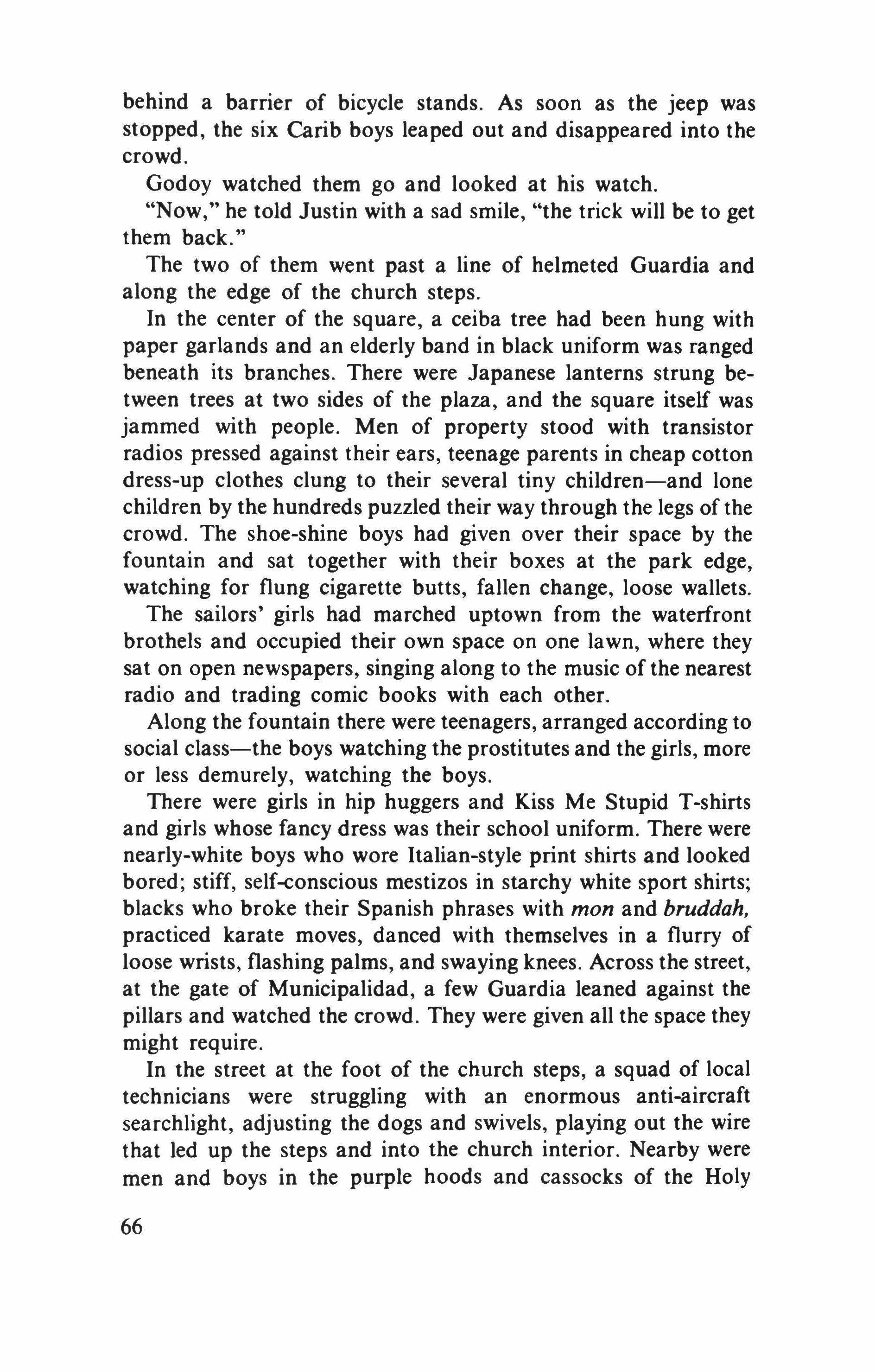
behind a barrier of bicycle stands. As soon as the jeep was stopped, the six Carib boys leaped out and disappeared into the crowd.
Godoy watched them go and looked at his watch.
"Now," he told Justin with a sad smile, "the trick will be to get them back."
The two of them went past a line of helmeted Guardia and along the edge of the church steps.
In the center of the square, a ceiba tree had been hung with paper garlands and an elderly band in black uniform was ranged beneath its branches. There were Japanese lanterns strung between trees at two sides of the plaza, and the square itself was jammed with people. Men of property stood with transistor radios pressed against their ears, teenage parents in cheap cotton dress-up clothes clung to their several tiny children-and lone children by the hundreds puzzled their way through the legs of the crowd. The shoe-shine boys had given over their space by the fountain and sat together with their boxes at the park edge, watching for flung cigarette butts, fallen change, loose wallets.
The sailors' girls had marched uptown from the waterfront brothels and occupied their own space on one lawn, where they sat on open newspapers, singing along to the music of the nearest radio and trading comic books with each other.
Along the fountain there were teenagers, arranged according to social class-the boys watching the prostitutes and the girls, more or less demurely, watching the boys.
There were girls in hip huggers and Kiss Me Stupid T-shirts and girls whose fancy dress was their school uniform. There were nearly-white boys who wore Italian-style print shirts and looked bored; stiff, self-conscious mestizos in starchy white sport shirts; blacks who broke their Spanish phrases with mon and bruddah, practiced karate moves, danced with themselves in a flurry of loose wrists, flashing palms, and swaying knees. Across the street, at the gate of Municipalidad, a few Guardia leaned against the pillars and watched the crowd. They were given all the space they might require.
In the street at the foot of the church steps, a squad of local technicians were struggling with an enormous anti-aircraft searchlight, adjusting the dogs and swivels, playing out the wire that led up the steps and into the church interior. Nearby were men and boys in the purple hoods and cassocks of the Holy
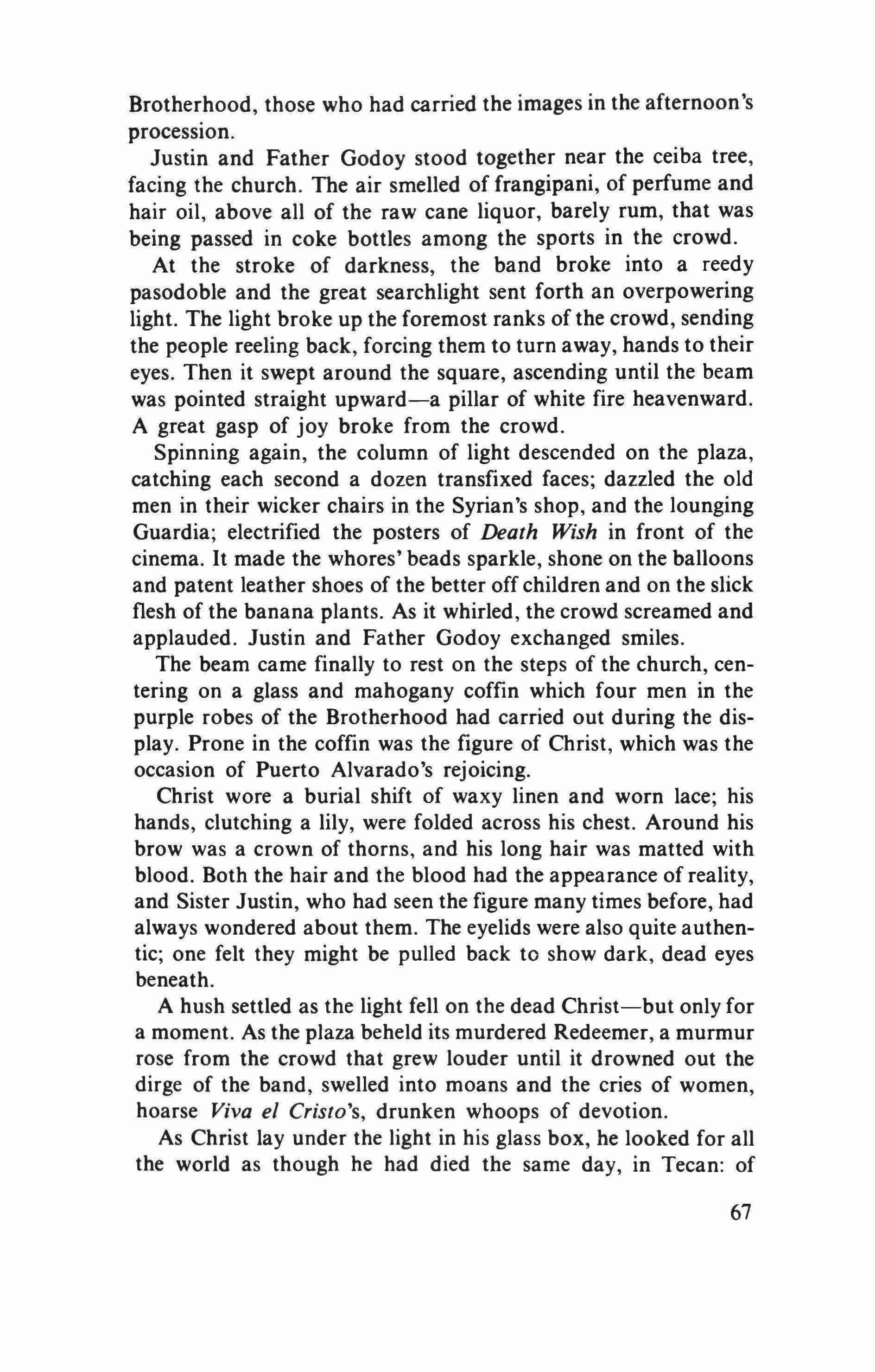
Brotherhood, those who had carried the images in the afternoon's procession.
Justin and Father Godoy stood together near the ceiba tree, facing the church. The air smelled of frangipani, of perfume and hair oil, above all of the raw cane liquor, barely rum, that was being passed in coke bottles among the sports in the crowd.
At the stroke of darkness, the band broke into a reedy pasodoble and the great searchlight sent forth an overpowering light. The light broke up the foremost ranks of the crowd, sending the people reeling back, forcing them to turn away, hands to their eyes. Then it swept around the square, ascending until the beam was pointed straight upward-a pillar of white fire heavenward. A great gasp of joy broke from the crowd.
Spinning again, the column of light descended on the plaza, catching each second a dozen transfixed faces; dazzled the old men in their wicker chairs in the Syrian's shop, and the lounging Guardia; electrified the posters of Death Wish in front of the cinema. It made the whores' beads sparkle, shone on the balloons and patent leather shoes of the better off children and on the slick flesh of the banana plants. As it whirled, the crowd screamed and applauded. Justin and Father Godoy exchanged smiles.
The beam came finally to rest on the steps of the church, centering on a glass and mahogany coffin which four men in the purple robes of the Brotherhood had carried out during the display. Prone in the coffin was the figure of Christ, which was the occasion of Puerto Alvarado's rejoicing.
Christ wore a burial shift of waxy linen and worn lace; his hands, clutching a lily, were folded across his chest. Around his brow was a crown of thorns, and his long hair was matted with blood. Both the hair and the blood had the appearance of reality, and Sister Justin, who had seen the figure many times before, had always wondered about them. The eyelids were also quite authentic; one felt they might be pulled back to show dark, dead eyes beneath.
A hush settled as the light fell on the dead Christ-but only for a moment. As the plaza beheld its murdered Redeemer, a murmur rose from the crowd that grew louder until it drowned out the dirge of the band, swelled into moans and the cries of women, hoarse Viva el Cristo'S, drunken whoops of devotion.
As Christ lay under the light in his glass box, he looked for all the world as though he had died the same day, in Tecan: of
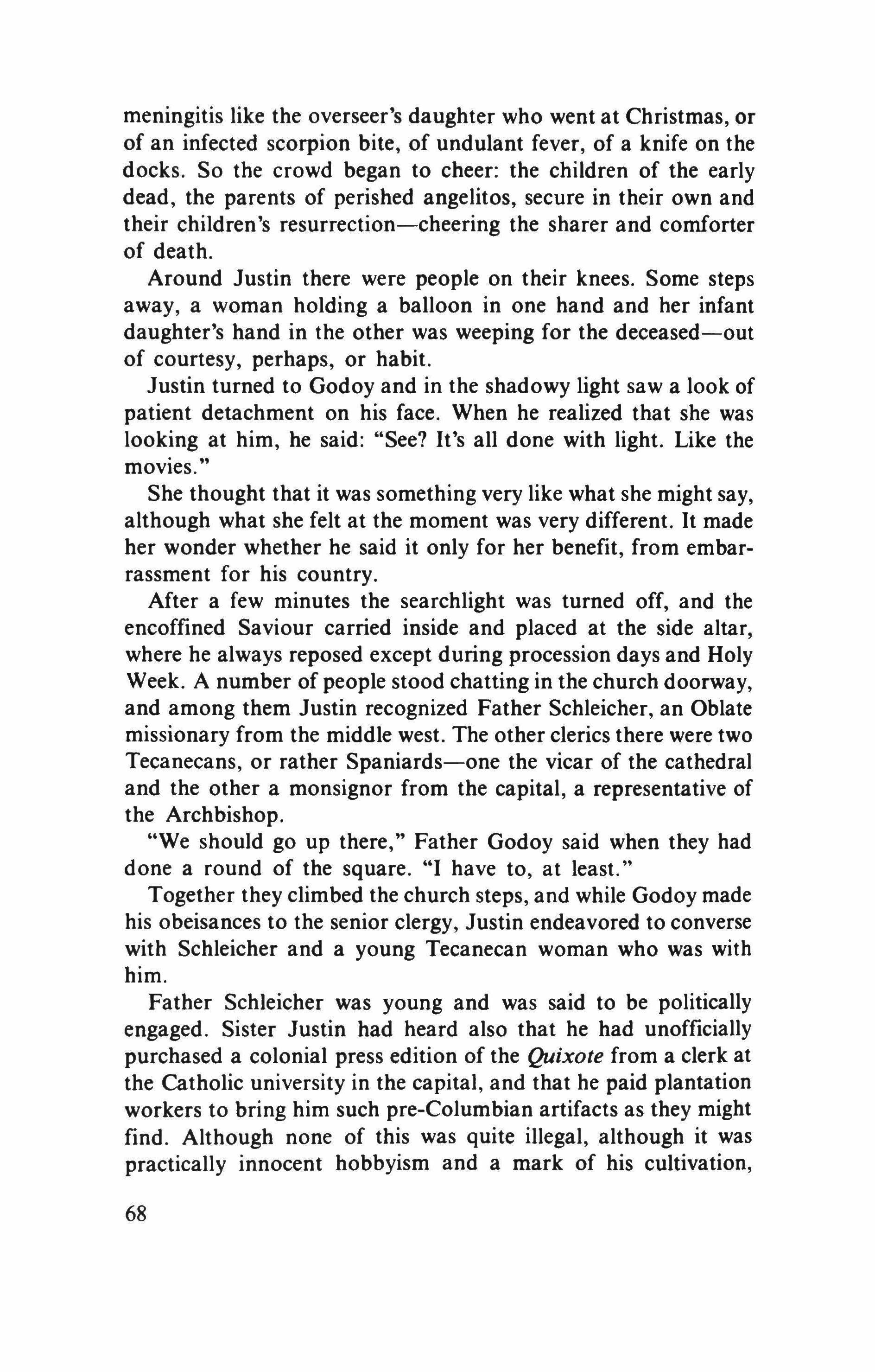
meningitis like the overseer's daughter who went at Christmas, or of an infected scorpion bite, of undulant fever, of a knife on the docks. So the crowd began to cheer: the children of the early dead, the parents of perished angelitos, secure in their own and their children's resurrection-cheering the sharer and comforter of death.
Around Justin there were people on their knees. Some steps away, a woman holding a balloon in one hand and her infant daughter's hand in the other was weeping for the deceased-out of courtesy, perhaps, or habit.
Justin turned to Godoy and in the shadowy light saw a look of patient detachment on his face. When he realized that she was looking at him, he said: "See? It's all done with light. Like the movies."
She thought that it was something very like what she might say, although what she felt at the moment was very different. It made her wonder whether he said it only for her benefit, from embarrassment for his country.
After a few minutes the searchlight was turned off, and the encoffined Saviour carried inside and placed at the side altar, where he always reposed except during procession days and Holy Week. A number of people stood chatting in the church doorway, and among them Justin recognized Father Schleicher, an Oblate missionary from the middle west. The other clerics there were two Tecanecans, or rather Spaniards-one the vicar of the cathedral and the other a monsignor from the capital, a representative of the Archbishop.
"We should go up there," Father Godoy said when they had done a round of the square. "I have to, at least."
Together they climbed the church steps, and while Godoy made his obeisances to the senior clergy, Justin endeavored to converse with Schleicher and a young Tecanecan woman who was with him.
Father Schleicher was young and was said to be politically engaged. Sister Justin had heard also that he had unofficially purchased a colonial press edition of the Quixote from a clerk at the Catholic university in the capital, and that he paid plantation workers to bring him such pre-Columbian artifacts as they might find. Although none of this was quite illegal, although it was practically innocent hobbyism and a mark of his cultivation,
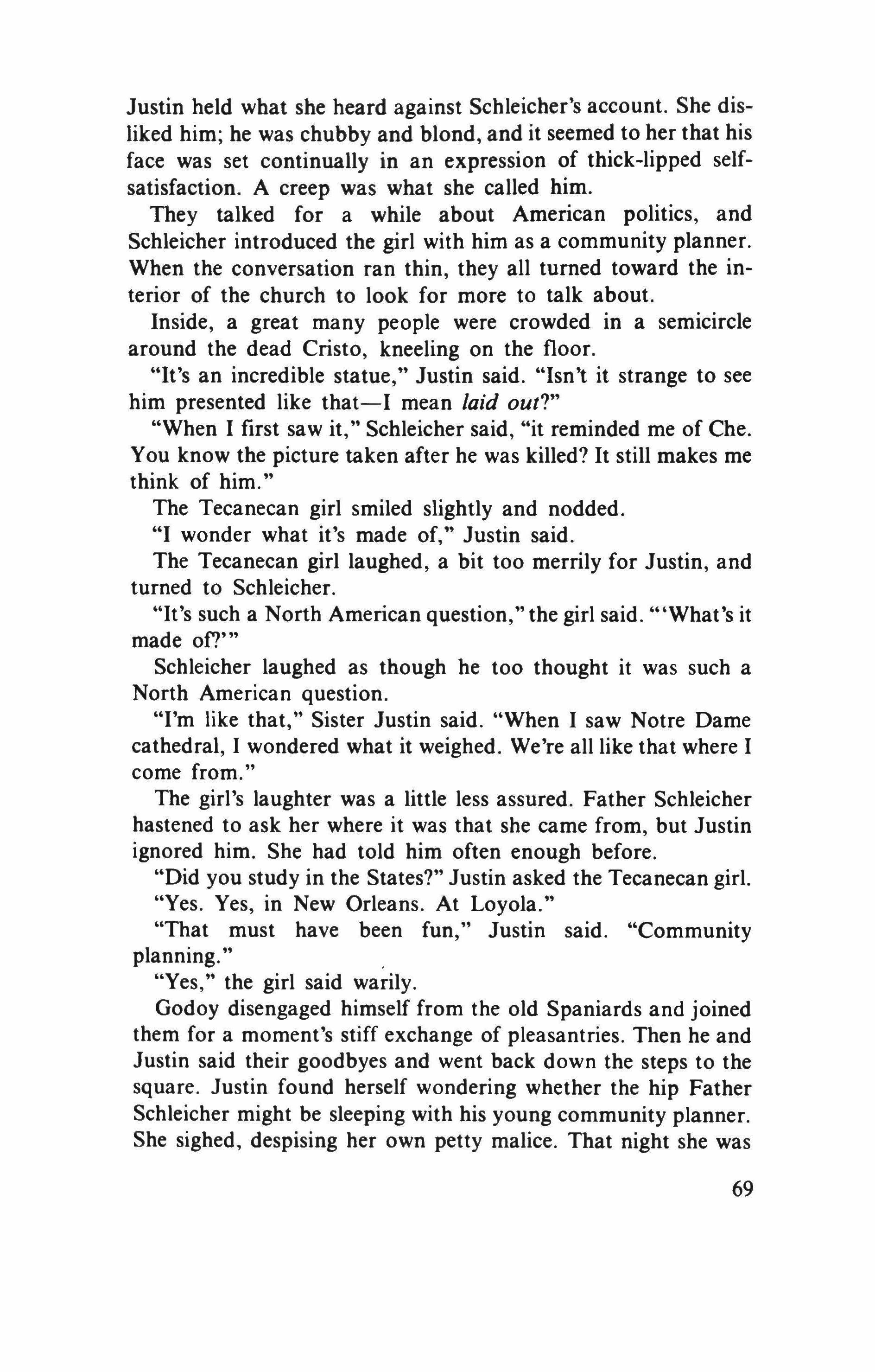
Justin held what she heard against Schleicher's account. She disliked him; he was chubby and blond, and it seemed to her that his face was set continually in an expression of thick-lipped selfsatisfaction. A creep was what she called him.
They talked for a while about American politics, and Schleicher introduced the girl with him as a community planner. When the conversation ran thin, they all turned toward the interior of the church to look for more to talk about.
Inside, a great many people were crowded in a semicircle around the dead Cristo, kneeling on the floor.
"It's an incredible statue," Justin said. "Isn't it strange to see him presented like that-I mean laid out?"
"When 1 first saw it," Schleicher said, "it reminded me of Che. You know the picture taken after he was killed? It still makes me think of him."
The Tecanecan girl smiled slightly and nodded.
"I wonder what it's made of," Justin said.
The Tecanecan girl laughed, a bit too merrily for Justin, and turned to Schleicher.
"It's such a North American question," the girl said. "'What's it made ofl'"
Schleicher laughed as though he too thought it was such a North American question.
"I'm like that," Sister Justin said. "When 1 saw Notre Dame cathedral, I wondered what it weighed. We're all like that where I come from."
The girl's laughter was a little less assured. Father Schleicher hastened to ask her where it was that she came from, but Justin ignored him. She had told him often enough before.
"Did you study in the States?" Justin asked the Tecanecan girl.
"Yes. Yes, in New Orleans. At Loyola."
"That must have been fun," Justin said. "Community planning. "
"Yes," the girl said warily.
Godoy disengaged himself from the old Spaniards and joined them for a moment's stiff exchange of pleasantries. Then he and Justin said their goodbyes and went back down the steps to the square. Justin found herself wondering whether the hip Father Schleicher might be sleeping with his young community planner. She sighed, despising her own petty malice. That night she was
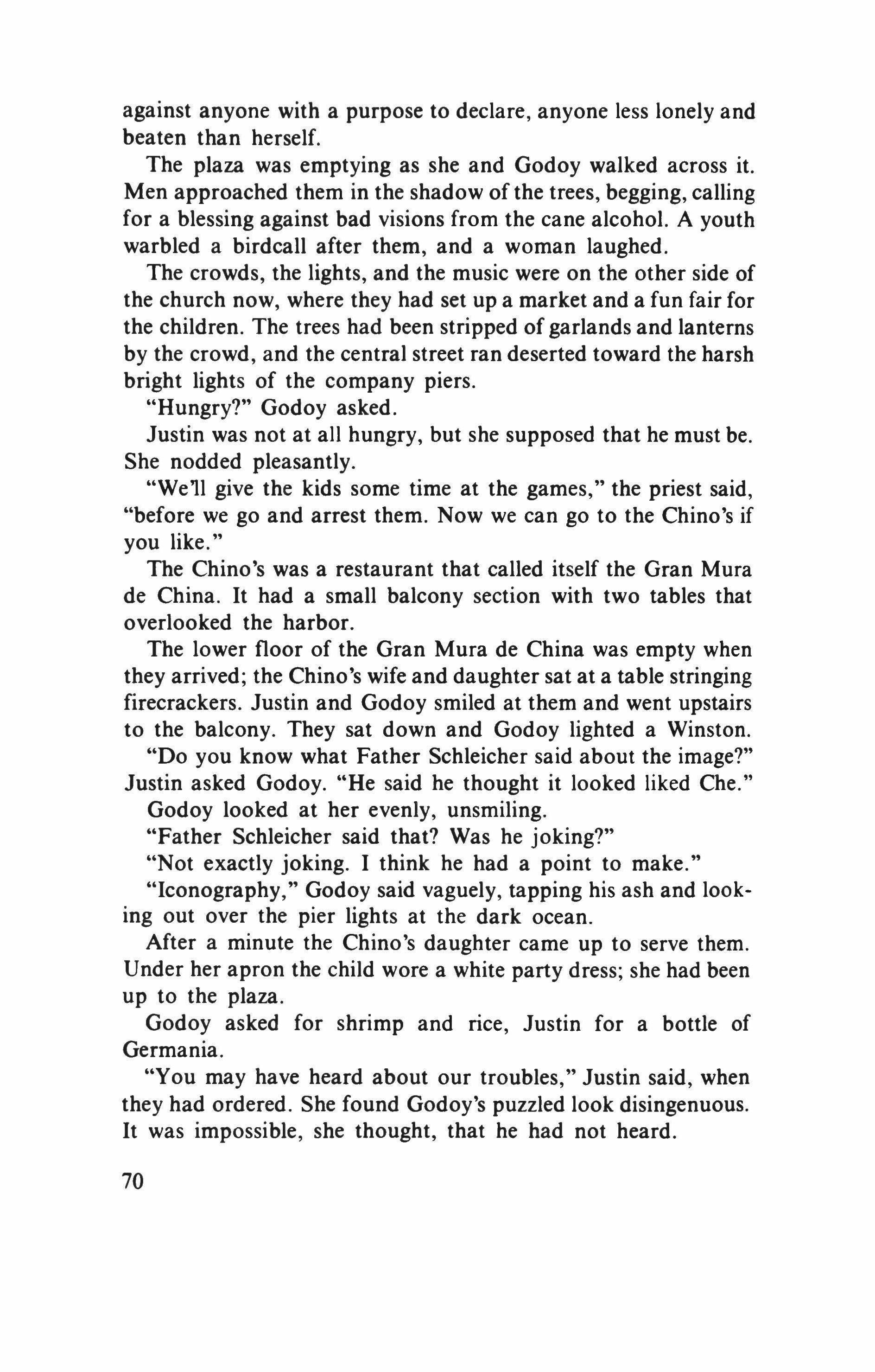
against anyone with a purpose to declare, anyone less lonely and beaten than herself.
The plaza was emptying as she and Godoy walked across it. Men approached them in the shadow of the trees, begging, calling for a blessing against bad visions from the cane alcohol. A youth warbled a birdcall after them, and a woman laughed.
The crowds, the lights, and the music were on the other side of the church now, where they had set up a market and a fun fair for the children. The trees had been stripped of garlands and lanterns by the crowd, and the central street ran deserted toward the harsh bright lights of the company piers.
"Hungry?" Godoy asked.
Justin was not at all hungry, but she supposed that he must be. She nodded pleasantly.
"We'll give the kids some time at the games," the priest said, "before we go and arrest them. Now we can go to the Chino's if you like."
The Chino's was a restaurant that called itself the Gran Mura de China. It had a small balcony section with two tables that overlooked the harbor.
The lower floor of the Gran Mura de China was empty when they arrived; the Chino's wife and daughter sat at a table stringing firecrackers. Justin and Godoy smiled at them and went upstairs to the balcony. They sat down and Godoy lighted a Winston.
"Do you know what Father Schleicher said about the image?" Justin asked Godoy. "He said he thought it looked liked Che."
Godoy looked at her evenly, unsmiling.
"Father Schleicher said that? Was he joking?"
"Not exactly joking. I think he had a point to make."
"Iconography," Godoy said vaguely, tapping his ash and looking out over the pier lights at the dark ocean.
After a minute the Chino's daughter came up to serve them. Under her apron the child wore a white party dress; she had been up to the plaza.
Godoy asked for shrimp and rice, Justin for a bottle of Germania.
"You may have heard about our troubles," Justin said, when they had ordered. She found Godoy's puzzled look disingenuous. It was impossible, she thought, that he had not heard.
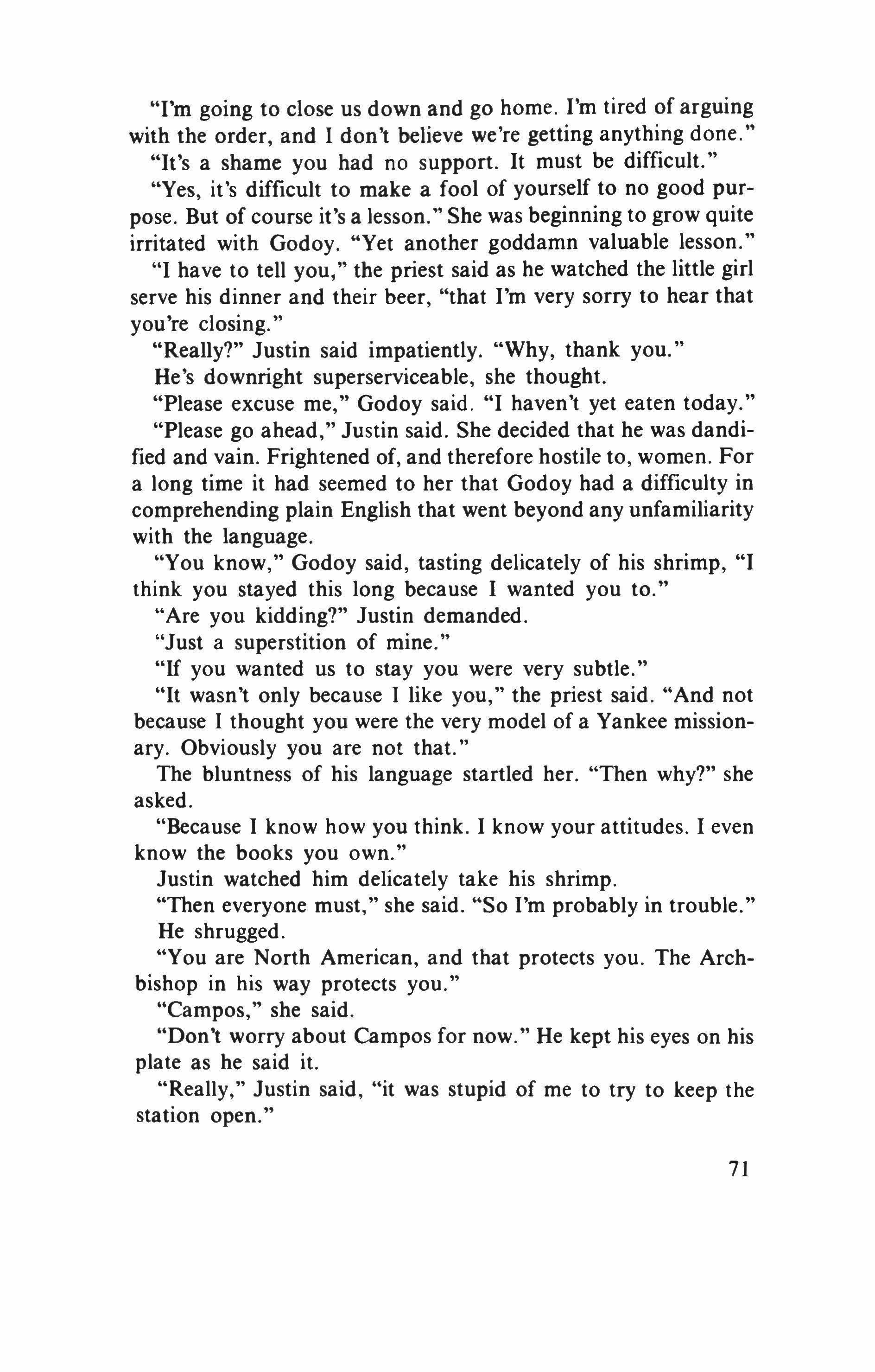
"I'm going to close us down and go home. I'm tired of arguing with the order, and I don't believe we're getting anything done."
"It's a shame you had no support. It must be difficult."
"Yes, it's difficult to make a fool of yourself to no good purpose. But of course it's a lesson." She was beginning to grow quite irritated with Godoy. "Yet another goddamn valuable lesson."
"I have to tell you," the priest said as he watched the little girl serve his dinner and their beer, "that I'm very sorry to hear that you're closing."
"Really?" Justin said impatiently. "Why, thank you."
He's downright superserviceable, she thought.
"Please excuse me," Godoy said. "I haven't yet eaten today."
"Please go ahead," Justin said. She decided that he was dandified and vain. Frightened of, and therefore hostile to, women. For a long time it had seemed to her that Godoy had a difficulty in comprehending plain English that went beyond any unfamiliarity with the language.
"You know," Godoy said, tasting delicately of his shrimp, "I think you stayed this long because 1 wanted you to."
"Are you kidding?" Justin demanded.
"Just a superstition of mine."
"If you wanted us to stay you were very subtle."
"It wasn't only because I like you," the priest said. "And not because I thought you were the very model of a Yankee missionary. Obviously you are not that."
The bluntness of his language startled her. "Then why?" she asked.
"Because I know how you think. I know your attitudes. 1 even know the books you own."
Justin watched him delicately take his shrimp.
"Then everyone must," she said. "So I'm probably in trouble."
He shrugged.
"You are North American, and that protects you. The Archbishop in his way protects you."
"Campos," she said.
"Don't worry about Campos for now." He kept his eyes on his plate as he said it.
"Really," Justin said, "it was stupid of me to try to keep the station open."
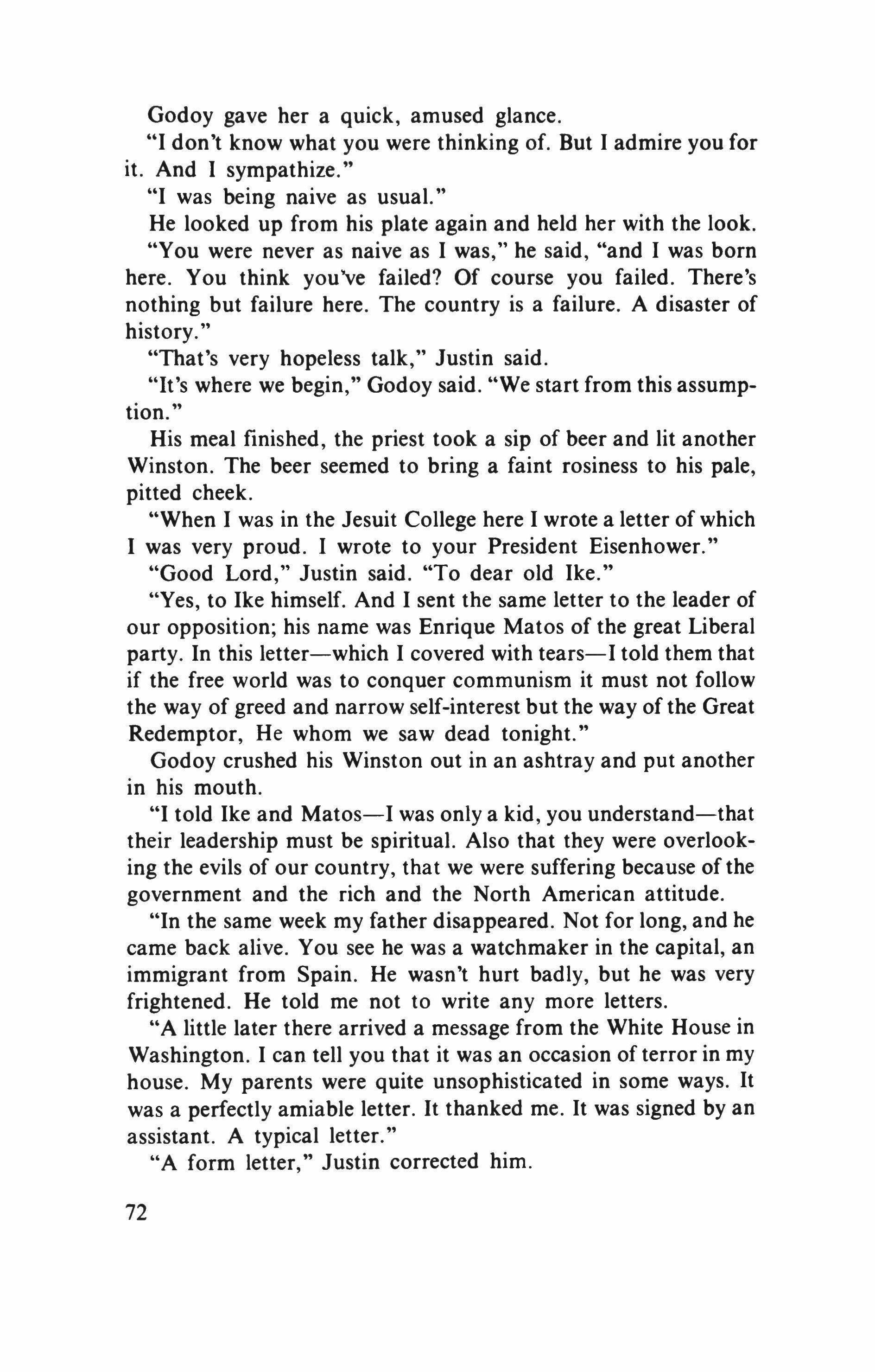
Godoy gave her a quick, amused glance.
"I don't know what you were thinking of. But I admire you for it. And 1 sympathize."
"I was being naive as usual."
He looked up from his plate again and held her with the look.
"You were never as naive as 1 was," he said, "and 1 was born here. You think you'Ve failed? Of course you failed. There's nothing but failure here. The country is a failure. A disaster of history.
"That's very hopeless talk," Justin said.
"It's where we begin," Godoy said. "We start from this assumption.
His meal finished, the priest took a sip of beer and lit another Winston. The beer seemed to bring a faint rosiness to his pale, pitted cheek.
"When I was in the Jesuit College here I wrote a letter of which I was very proud. I wrote to your President Eisenhower."
"Good Lord," Justin said. "To dear old Ike."
"Yes, to Ike himself. And I sent the same letter to the leader of our opposition; his name was Enrique Matos of the great Liberal party. In this letter-which I covered with tears-I told them that if the free world was to conquer communism it must not follow the way of greed and narrow self-interest but the way of the Great Redemptor, He whom we saw dead tonight."
Godoy crushed his Winston out in an ashtray and put another in his mouth.
"I told Ike and Matos-I was only a kid, you understand-that their leadership must be spiritual. Also that they were overlooking the evils of our country, that we were suffering because ofthe government and the rich and the North American attitude.
"In the same week my father disappeared. Not for long, and he came back alive. You see he was a watchmaker in the capital, an immigrant from Spain. He wasn't hurt badly, but he was very frightened. He told me not to write any more letters.
"A little later there arrived a message from the White House in Washington. I can tell you that it was an occasion of terror in my house. My parents were quite unsophisticated in some ways. It was a perfectly amiable letter. It thanked me. It was signed by an assistant. A typical letter."
"A form letter," Justin corrected him.
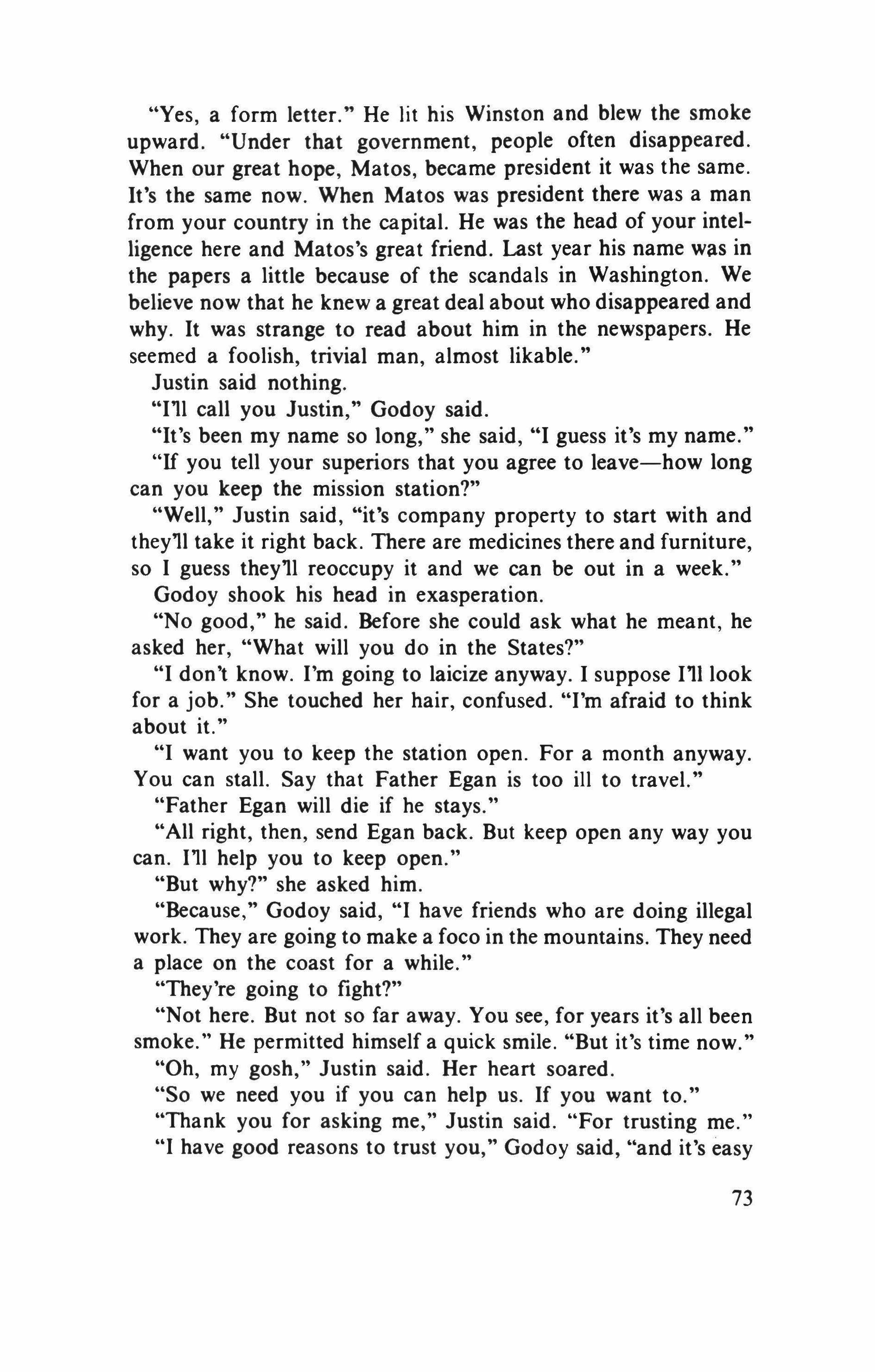
"Yes, a form letter." He lit his Winston and blew the smoke upward. "Under that government, people often disappeared. When our great hope, Matos, became president it was the same. It's the same now. When Matos was president there was a man from your country in the capital. He was the head of your intelligence here and Matos's great friend. Last year his name was in the papers a little because of the scandals in Washington. We believe now that he knew a great deal about who disappeared and why. It was strange to read about him in the newspapers. He seemed a foolish, trivial man, almost likable."
Justin said nothing.
"I'll call you Justin," Godoy said.
"It's been my name so long," she said, "I guess it's my name."
"If you tell your superiors that you agree to leave-how long can you keep the mission station?"
"Well," Justin said, "it's company property to start with and they'll take it right back. There are medicines there and furniture, so 1 guess they'll reoccupy it and we can be out in a week."
Godoy shook his head in exasperation.
"No good," he said. Before she could ask what he meant, he asked her, "What will you do in the States?"
"I don't know. I'm going to laicize anyway. I suppose 111 look for a job." She touched her hair, confused. "I'm afraid to think about it."
"I want you to keep the station open. For a month anyway. You can stall. Say that Father Egan is too ill to travel."
"Father Egan will die if he stays."
"All right, then, send Egan back. But keep open any way you can. I'll help you to keep open."
"But why?" she asked him.
"Because," Godoy said, "I have friends who are doing illegal work. They are going to make a foco in the mountains. They need a place on the coast for a while."
"They're going to fight?"
"Not here. But not so far away. You see, for years it's all been smoke." He permitted himself a quick smile. "But it's time now."
"Oh, my gosh," Justin said. Her heart soared.
"So we need you if you can help us. If you want to."
"Thank you for asking me," Justin said. "For trusting me."
"I have good reasons to trust you," Godoy said, "and it's easy
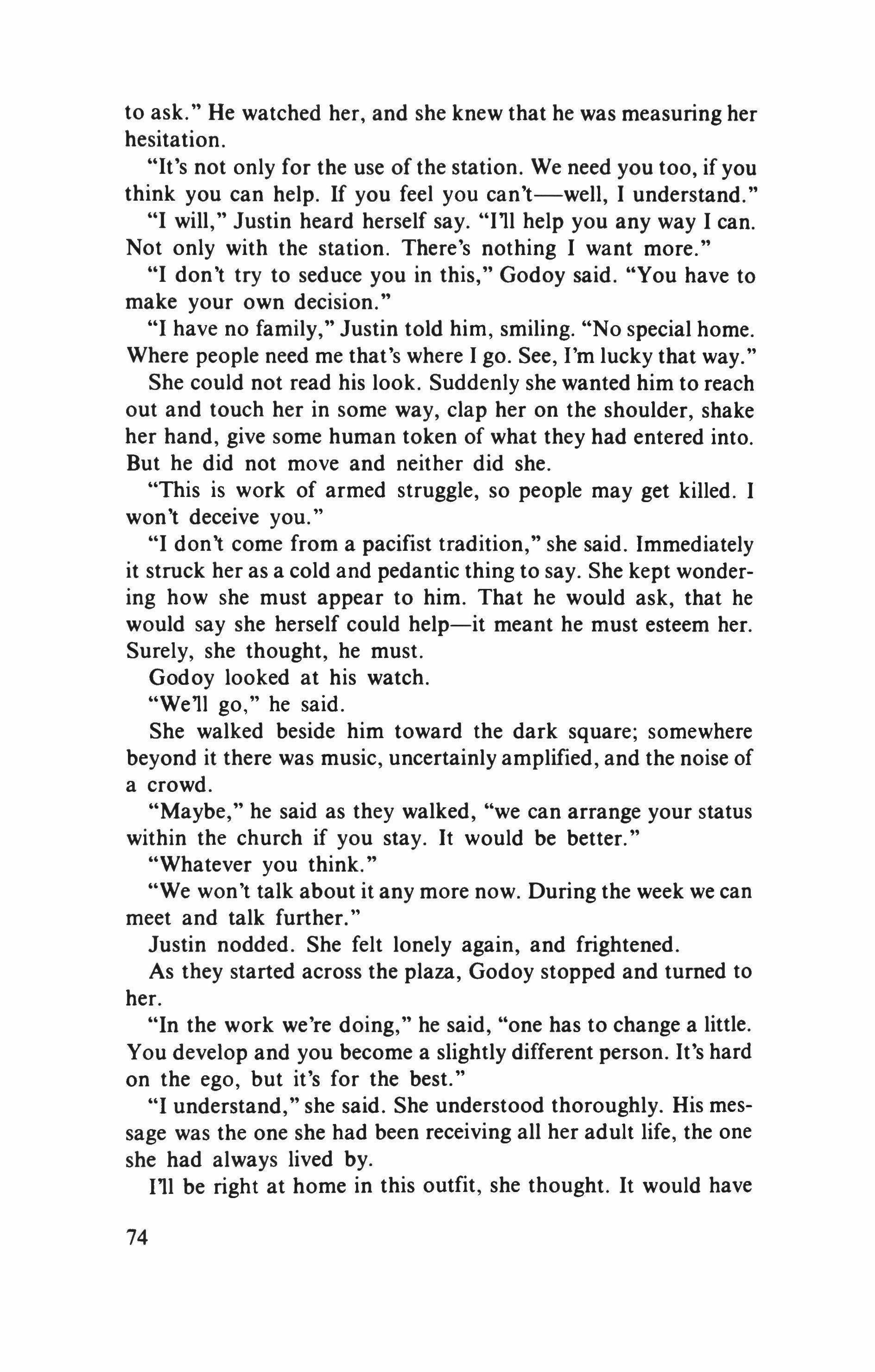
to ask." He watched her, and she knew that he was measuring her hesitation.
"It's not only for the use of the station. We need you too, if you think you can help. If you feel you can't-well, I understand."
"I will," Justin heard herself say. "I'll help you any way I can. Not only with the station. There's nothing I want more."
"I don't try to seduce you in this," Godoy said. "You have to make your own decision."
"I have no family," Justin told him, smiling. "No special home. Where people need me that's where I go. See, I'm lucky that way."
She could not read his look. Suddenly she wanted him to reach out and touch her in some way, clap her on the shoulder, shake her hand, give some human token of what they had entered into. But he did not move and neither did she.
"This is work of armed struggle, so people may get killed. I won't deceive you."
"I don't come from a pacifist tradition," she said. Immediately it struck her as a cold and pedantic thing to say. She kept wondering how she must appear to him. That he would ask, that he would say she herself could help-it meant he must esteem her. Surely, she thought, he must.
Godoy looked at his watch.
"We'll go," he said.
She walked beside him toward the dark square; somewhere beyond it there was music, uncertainly amplified, and the noise of a crowd.
"Maybe," he said as they walked, "we can arrange your status within the church if you stay. It would be better."
"Whatever you think."
"We won't talk about it any more now. During the week we can meet and talk further."
Justin nodded. She felt lonely again, and frightened.
As they started across the plaza, Godoy stopped and turned to her.
"In the work we're doing," he said, "one has to change a little. You develop and you become a slightly different person. It's hard on the ego, but it's for the best."
"I understand," she said. She understood thoroughly. His message was the one she had been receiving all her adult life, the one she had always lived by.
I'll be right at home in this outfit, she thought. It would have
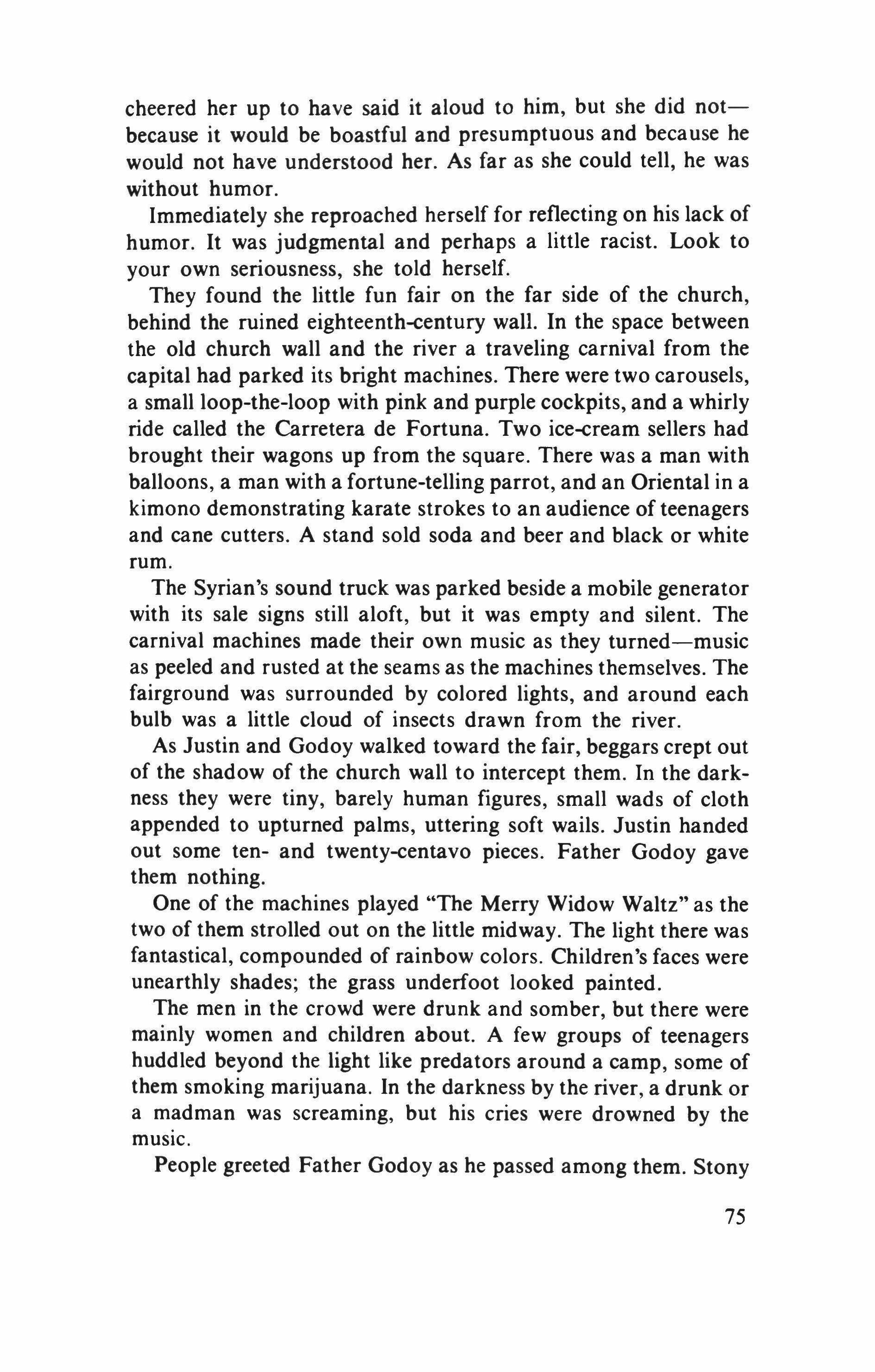
cheered her up to have said it aloud to him, but she did notbecause it would be boastful and presumptuous and because he would not have understood her. As far as she could tell, he was without humor.
Immediately she reproached herself for reflecting on his lack of humor. It was judgmental and perhaps a little racist. Look to your own seriousness, she told herself.
They found the little fun fair on the far side of the church, behind the ruined eighteenth-century wall. In the space between the old church wall and the river a traveling carnival from the capital had parked its bright machines. There were two carousels, a small loop-the-loop with pink and purple cockpits, and a whirly ride called the Carretera de Fortuna. Two ice-cream sellers had brought their wagons up from the square. There was a man with balloons, a man with a fortune-telling parrot, and an Oriental in a kimono demonstrating karate strokes to an audience of teenagers and cane cutters. A stand sold soda and beer and black or white rum.
The Syrian's sound truck was parked beside a mobile generator with its sale signs still aloft, but it was empty and silent. The carnival machines made their own music as they turned-music as peeled and rusted at the seams as the machines themselves. The fairground was surrounded by colored lights, and around each bulb was a little cloud of insects drawn from the river.
As Justin and Godoy walked toward the fair, beggars crept out of the shadow of the church wall to intercept them. In the darkness they were tiny, barely human figures, small wads of cloth appended to upturned palms, uttering soft wails. Justin handed out some ten- and twenty-centavo pieces. Father Godoy gave them nothing.
One of the machines played "The Merry Widow Waltz" as the two of them strolled out on the little midway. The light there was fantastical, compounded of rainbow colors. Children's faces were unearthly shades; the grass underfoot looked painted.
The men in the crowd were drunk and somber, but there were mainly women and children about. A few groups of teenagers huddled beyond the light like predators around a camp, some of them smoking marijuana. In the darkness by the river, a drunk or a madman was screaming, but his cries were drowned by the music.
People greeted Father Godoy as he passed among them. Stony
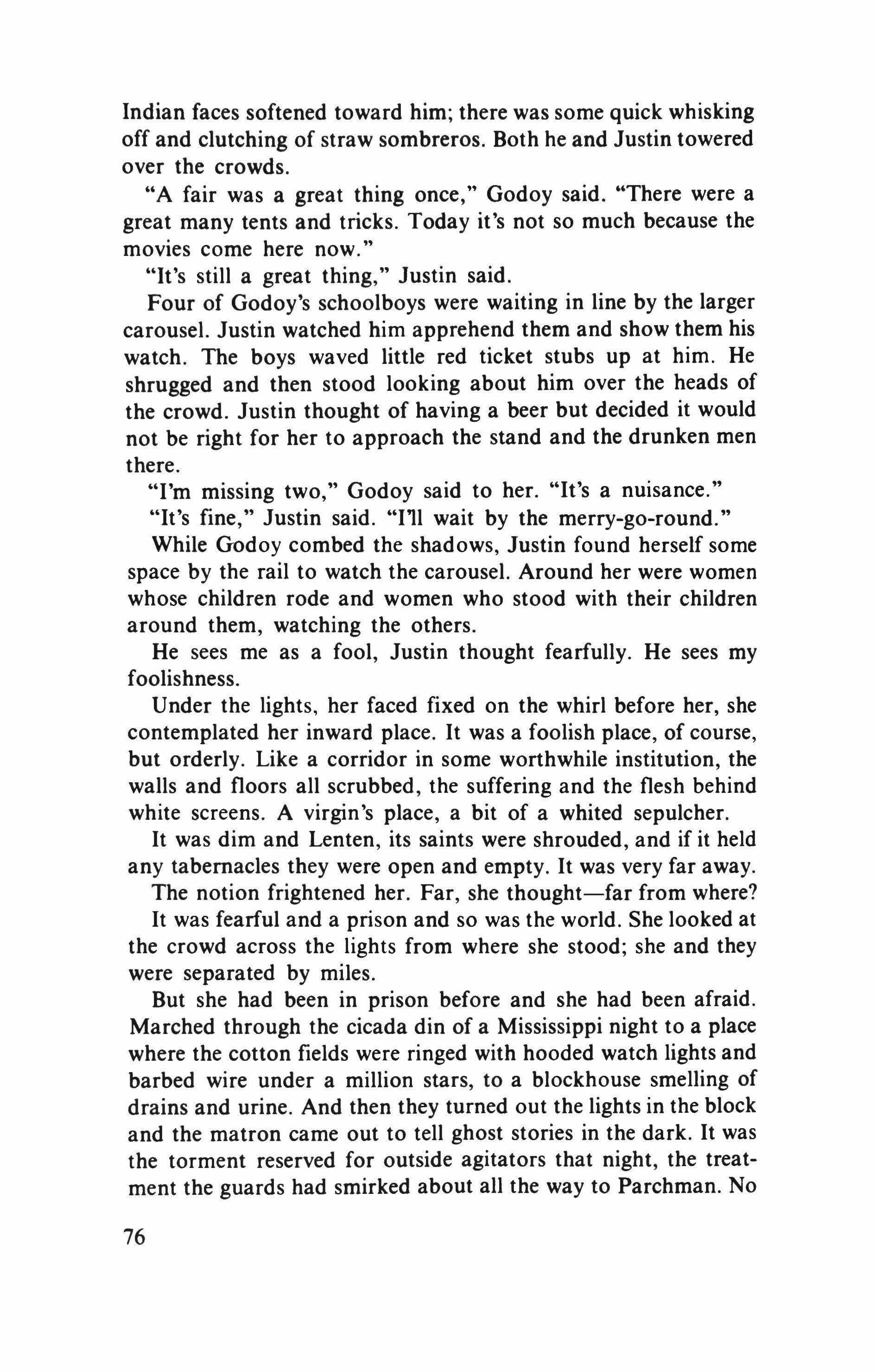
Indian faces softened toward him; there was some quick whisking off and clutching of straw sombreros. Both he and Justin towered over the crowds.
"A fair was a great thing once," Godoy said. "There were a great many tents and tricks. Today it's not so much because the movies come here now."
"It's still a great thing," Justin said.
Four of Godoy's schoolboys were waiting in line by the larger carousel. Justin watched him apprehend them and show them his watch. The boys waved little red ticket stubs up at him. He shrugged and then stood looking about him over the heads of the crowd. Justin thought of having a beer but decided it would not be right for her to approach the stand and the drunken men there.
"I'm missing two," Godoy said to her. "It's a nuisance."
"It's fine," Justin said. "I'll wait by the merry-go-round."
While Godoy combed the shadows, Justin found herself some space by the rail to watch the carousel. Around her were women whose children rode and women who stood with their children around them, watching the others.
He sees me as a fool, Justin thought fearfully. He sees my foolishness.
Under the lights, her faced fixed on the whirl before her, she contemplated her inward place. It was a foolish place, of course, but orderly. Like a corridor in some worthwhile institution, the walls and floors all scrubbed, the suffering and the flesh behind white screens. A virgin's place, a bit of a whited sepulcher.
It was dim and Lenten, its saints were shrouded, and if it held any tabernacles they were open and empty. It was very far away.
The notion frightened her. Far, she thought-far from where?
It was fearful and a prison and so was the world. She looked at the crowd across the lights from where she stood; she and they were separated by miles.
But she had been in prison before and she had been afraid. Marched through the cicada din of a Mississippi night to a place where the cotton fields were ringed with hooded watch lights and barbed wire under a million stars, to a blockhouse smelling of drains and urine. And then they turned out the lights in the block and the matron came out to tell ghost stories in the dark. It was the torment reserved for outside agitators that night, the treatment the guards had smirked about all the way to Parchman. No
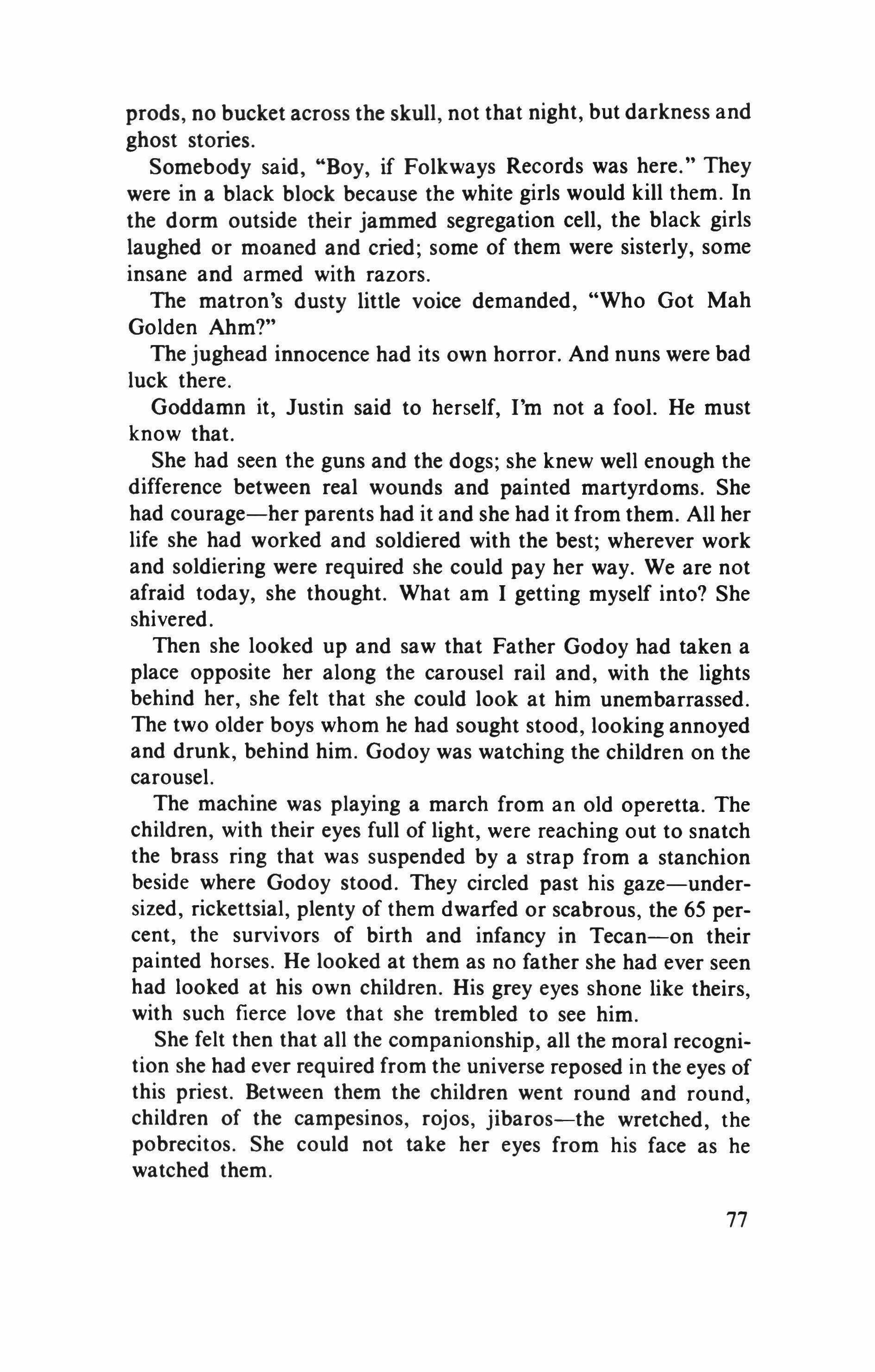
prods, no bucket across the skull, not that night, but darkness and ghost stories.
Somebody said, "Boy, if Folkways Records was here." They were in a black block because the white girls would kill them. In the dorm outside their jammed segregation cell, the black girls laughed or moaned and cried; some of them were sisterly, some insane and armed with razors.
The matron's dusty little voice demanded, "Who Got Mah Golden Ahm?"
The jughead innocence had its own horror. And nuns were bad luck there.
Goddamn it, Justin said to herself, I'm not a fool. He must know that.
She had seen the guns and the dogs; she knew well enough the difference between real wounds and painted martyrdoms. She had courage-her parents had it and she had it from them. All her life she had worked and soldiered with the best; wherever work and soldiering were required she could pay her way. We are not afraid today, she thought. What am I getting myself into? She shivered.
Then she looked up and saw that Father Godoy had taken a place opposite her along the carousel rail and, with the lights behind her, she felt that she could look at him unembarrassed. The two older boys whom he had sought stood, looking annoyed and drunk, behind him. Godoy was watching the children on the carousel.
The machine was playing a march from an old operetta. The children, with their eyes full of light, were reaching out to snatch the brass ring that was suspended by a strap from a stanchion beside where Godoy stood. They circled past his gaze-undersized, rickettsial, plenty of them dwarfed or scabrous, the 65 percent, the survivors of birth and infancy in Tecan-on their painted horses. He looked at them as no father she had ever seen had looked at his own children. His grey eyes shone like theirs, with such fierce love that she trembled to see him.
She felt then that all the companionship, all the moral recognition she had ever required from the universe reposed in the eyes of this priest. Between them the children went round and round, children of the campesinos, rojos, jibaros-the wretched, the pobrecitos. She could not take her eyes from his face as he watched them.
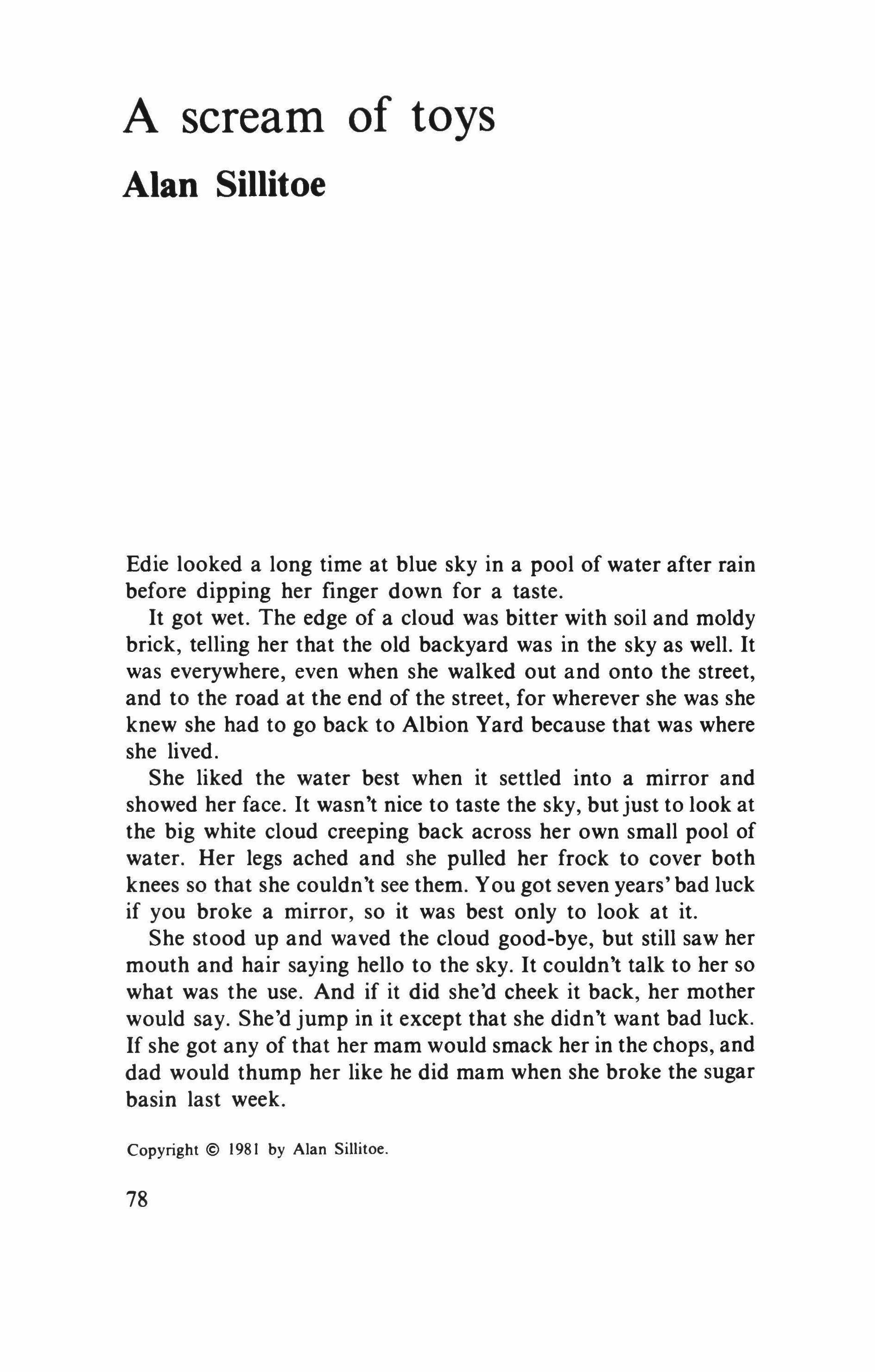
Edie looked a long time at blue sky in a pool of water after rain before dipping her finger down for a taste.
It got wet. The edge of a cloud was bitter with soil and moldy brick, telling her that the old backyard was in the sky as well. It was everywhere, even when she walked out and onto the street, and to the road at the end of the street, for wherever she was she knew she had to go back to Albion Yard because that was where she lived.
She liked the water best when it settled into a mirror and showed her face. It wasn't nice to taste the sky, but just to look at the big white cloud creeping back across her own small pool of water. Her legs ached and she pulled her frock to cover both knees so that she couldn't see them. You got seven years' bad luck if you broke a mirror, so it was best only to look at it.
She stood up and waved the cloud good-bye, but still saw her mouth and hair saying hello to the sky. It couldn't talk to her so what was the use. And if it did she'd cheek it back, her mother would say. She'd jump in it except that she didn't want bad luck. If she got any of that her mam would smack her in the chops, and dad would thump her like he did mam when she broke the sugar basin last week.
Copyright © 1981 by Alan Sillitoe.
78
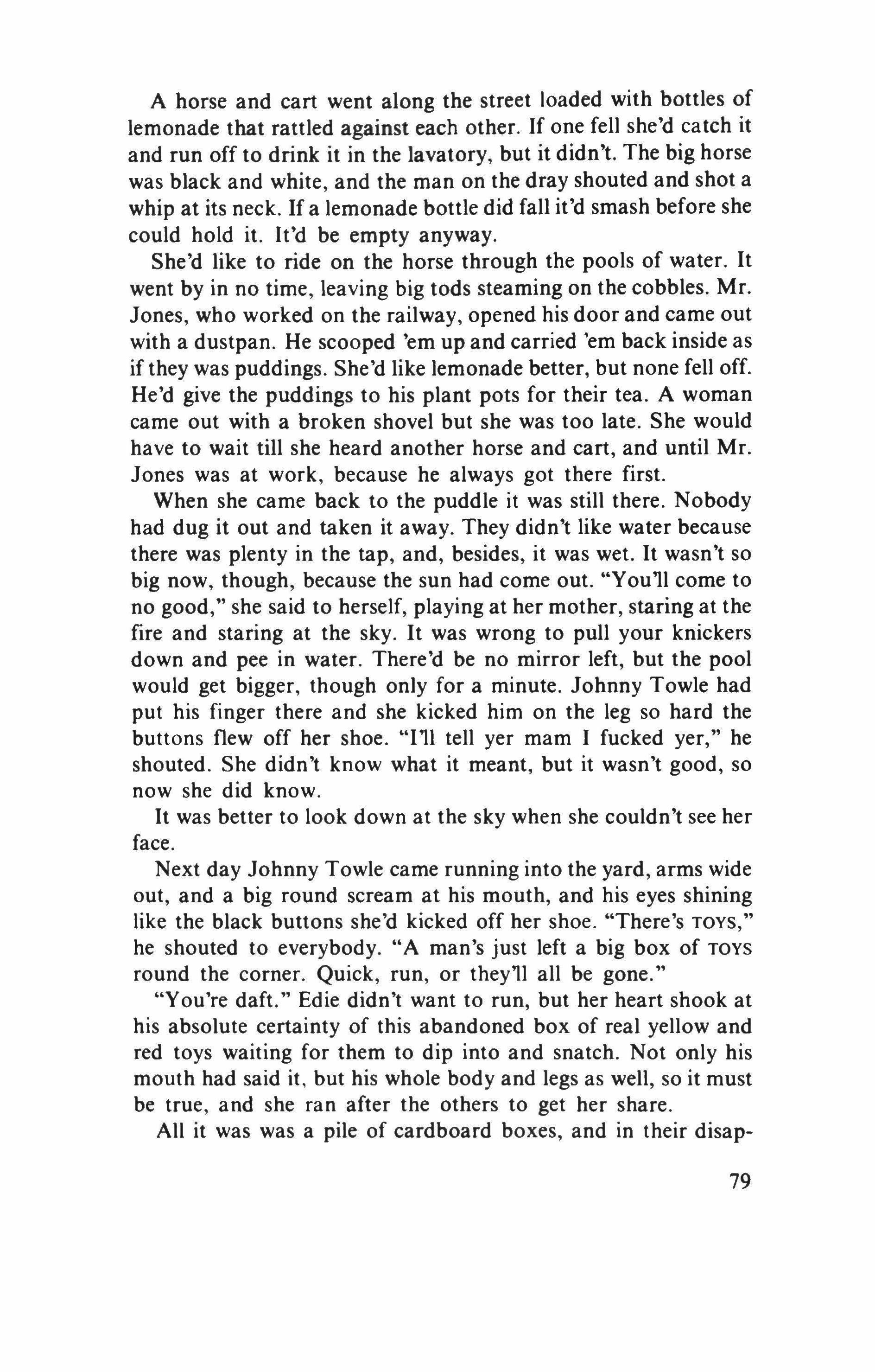
A horse and cart went along the street loaded with bottles of lemonade that rattled against each other. If one fell she'd catch it and run off to drink it in the lavatory, but it didn't. The big horse was black and white, and the man on the dray shouted and shot a whip at its neck. If a lemonade bottle did fall it'd smash before she could hold it. It'd be empty anyway.
She'd like to ride on the horse through the pools of water. It went by in no time, leaving big tods steaming on the cobbles. Mr. Jones, who worked on the railway, opened his door and came out with a dustpan. He scooped 'em up and carried 'em back inside as ifthey was puddings. She'd like lemonade better, but none fell off. He'd give the puddings to his plant pots for their tea. A woman came out with a broken shovel but she was too late. She would have to wait till she heard another horse and cart, and until Mr. Jones was at work, because he always got there first.
When she came back to the puddle it was still there. Nobody had dug it out and taken it away. They didn't like water because there was plenty in the tap, and, besides, it was wet. It wasn't so big now, though, because the sun had come out. "You'll come to no good," she said to herself, playing at her mother, staring at the fire and staring at the sky. It was wrong to pull your knickers down and pee in water. There'd be no mirror left, but the pool would get bigger, though only for a minute. Johnny Towle had put his finger there and she kicked him on the leg so hard the buttons flew off her shoe. "I'll tell yer mam I fucked yer," he shouted. She didn't know what it meant, but it wasn't good, so now she did know.
It was better to look down at the sky when she couldn't see her face.
Next day Johnny Towle came running into the yard, arms wide out, and a big round scream at his mouth, and his eyes shining like the black buttons she'd kicked off her shoe. "There's TOYS," he shouted to everybody. "A man's just left a big box of TOYS round the corner. Quick, run, or they'll all be gone."
"You're daft." Edie didn't want to run, but her heart shook at his absolute certainty of this abandoned box of real yellow and red toys waiting for them to dip into and snatch. Not only his mouth had said it, but his whole body and legs as well, so it must be true, and she ran after the others to get her share.
All it was was a pile of cardboard boxes, and in their disap-
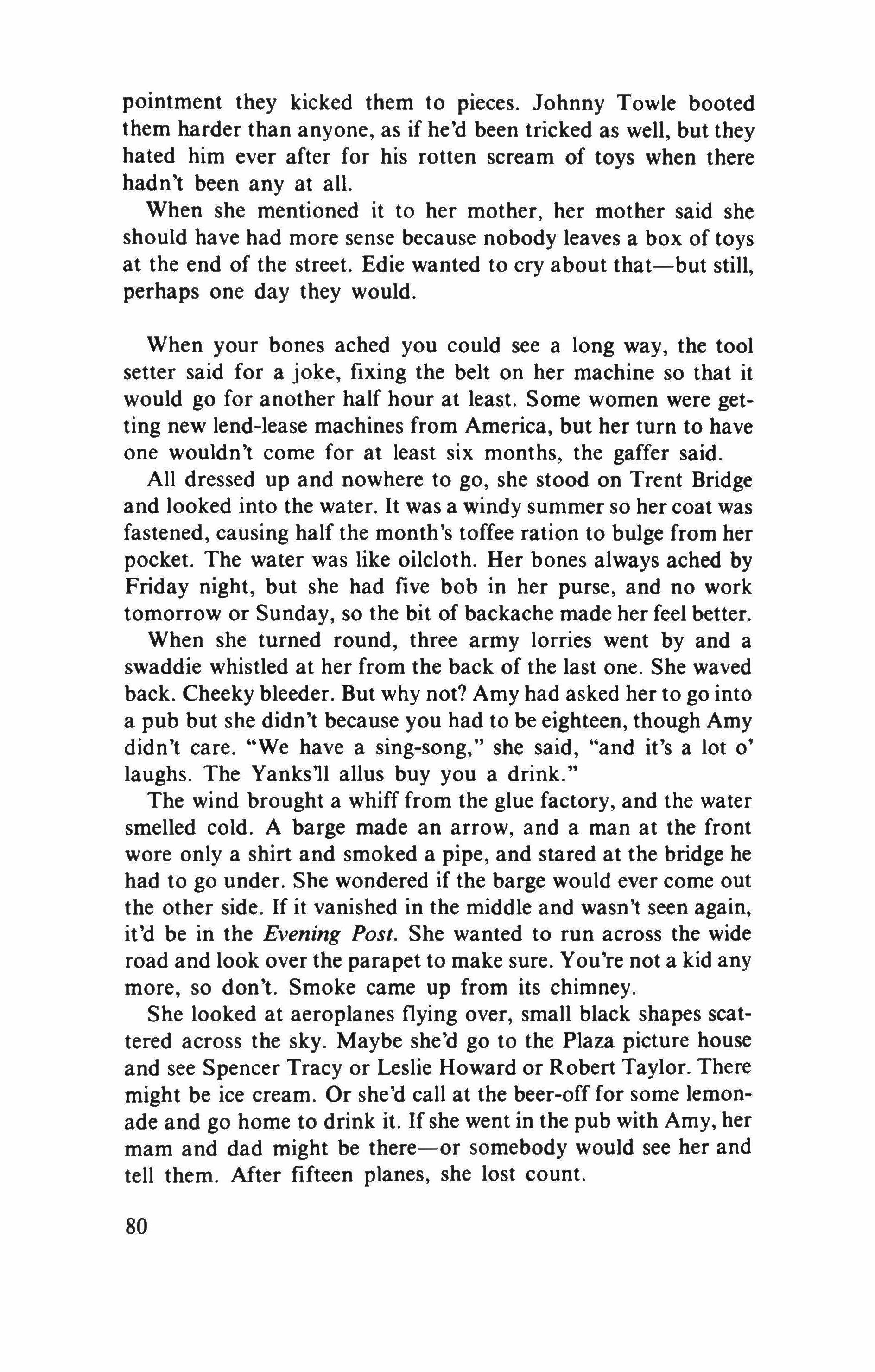
pointment they kicked them to pieces. Johnny Towle booted them harder than anyone, as if he'd been tricked as well, but they hated him ever after for his rotten scream of toys when there hadn't been any at all.
When she mentioned it to her mother, her mother said she should have had more sense because nobody leaves a box of toys at the end of the street. Edie wanted to cry about that-but still, perhaps one day they would.
When your bones ached you could see a long way, the tool setter said for a joke, fixing the belt on her machine so that it would go for another half hour at least. Some women were getting new lend-lease machines from America, but her turn to have one wouldn't come for at least six months, the gaffer said.
All dressed up and nowhere to go, she stood on Trent Bridge and looked into the water. It was a windy summer so her coat was fastened, causing half the month's toffee ration to bulge from her pocket. The water was like oilcloth. Her bones always ached by Friday night, but she had five bob in her purse, and no work tomorrow or Sunday, so the bit of backache made her feel better.
When she turned round, three army lorries went by and a swaddie whistled at her from the back of the last one. She waved back. Cheeky bleeder. But why not? Amy had asked her to go into a pub but she didn't because you had to be eighteen, though Amy didn't care. "We have a sing-song," she said, "and it's a lot 0' laughs. The Yanks'll allus buy you a drink."
The wind brought a whiff from the glue factory, and the water smelled cold. A barge made an arrow, and a man at the front wore only a shirt and smoked a pipe, and stared at the bridge he had to go under. She wondered if the barge would ever come out the other side. If it vanished in the middle and wasn't seen again, it'd be in the Evening Post. She wanted to run across the wide road and look over the parapet to make sure. You're not a kid any more, so don't. Smoke came up from its chimney.
She looked at aeroplanes flying over, small black shapes scattered across the sky. Maybe she'd go to the Plaza picture house and see Spencer Tracy or Leslie Howard or Robert Taylor. There might be ice cream. Or she'd call at the beer-off for some lemonade and go home to drink it. If she went in the pub with Amy, her mam and dad might be there-or somebody would see her and tell them. After fifteen planes, she lost count.
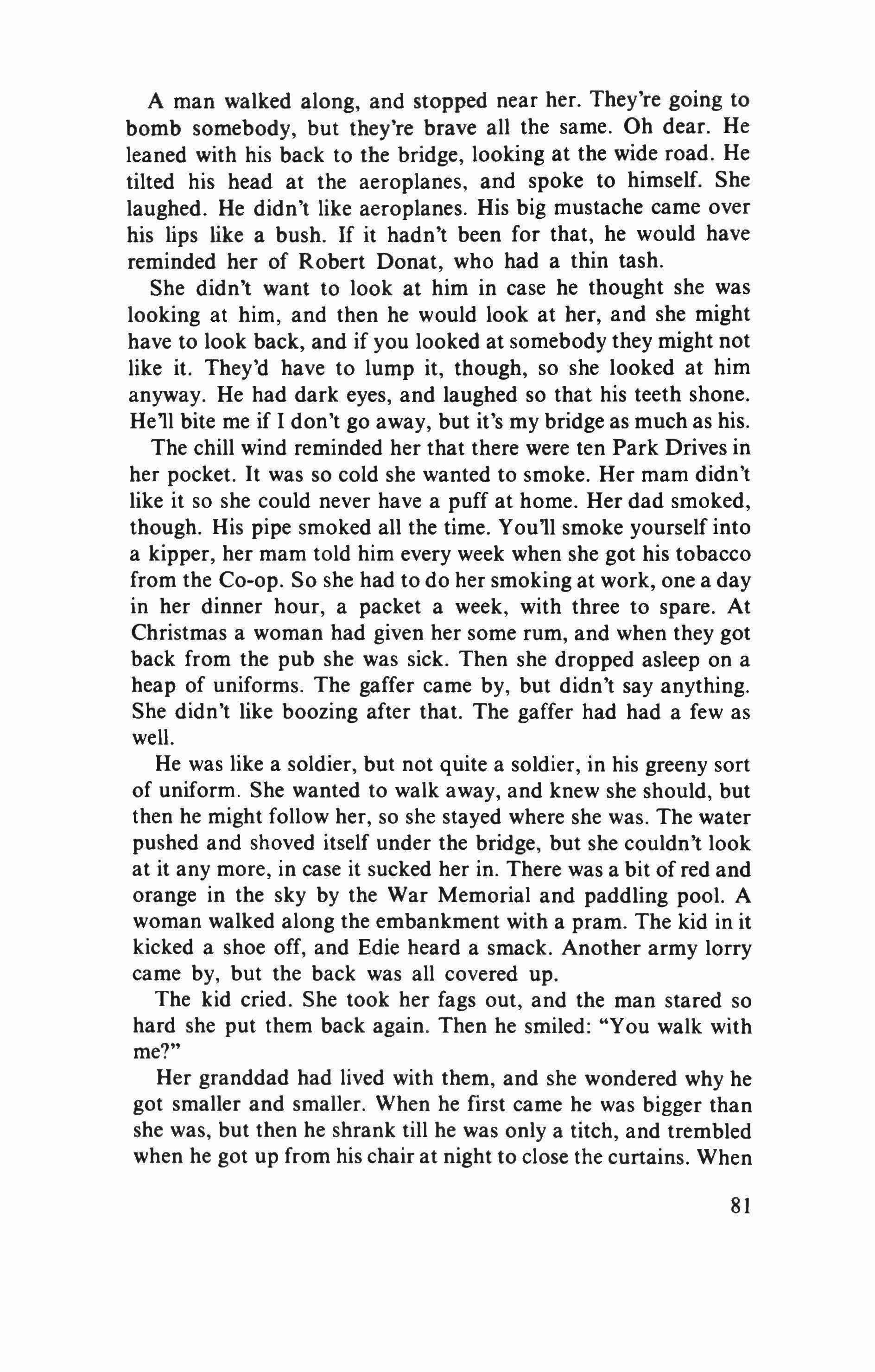
A man walked along, and stopped near her. They're going to bomb somebody, but they're brave all the same. Oh dear. He leaned with his back to the bridge, looking at the wide road. He tilted his head at the aeroplanes, and spoke to himself. She laughed. He didn't like aeroplanes. His big mustache came over his lips like a bush. If it hadn't been for that, he would have reminded her of Robert Donat, who had a thin tash.
She didn't want to look at him in case he thought she was looking at him, and then he would look at her, and she might have to look back, and if you looked at somebody they might not like it. They'd have to lump it, though, so she looked at him anyway. He had dark eyes, and laughed so that his teeth shone. He'll bite me if I don't go away, but it's my bridge as much as his.
The chill wind reminded her that there were ten Park Drives in her pocket. It was so cold she wanted to smoke. Her mam didn't like it so she could never have a puff at home. Her dad smoked, though. His pipe smoked all the time. You'll smoke yourself into a kipper, her mam told him every week when she got his tobacco from the Co-op. So she had to do her smoking at work, one a day in her dinner hour, a packet a week, with three to spare. At Christmas a woman had given her some rum, and when they got back from the pub she was sick. Then she dropped asleep on a heap of uniforms. The gaffer came by, but didn't say anything. She didn't like boozing after that. The gaffer had had a few as well.
He was like a soldier, but not quite a soldier, in his greeny sort of uniform. She wanted to walk away, and knew she should, but then he might follow her, so she stayed where she was. The water pushed and shoved itself under the bridge, but she couldn't look at it any more, in case it sucked her in. There was a bit of red and orange in the sky by the War Memorial and paddling pool. A woman walked along the embankment with a pram. The kid in it kicked a shoe off, and Edie heard a smack. Another army lorry came by, but the back was all covered up.
The kid cried. She took her fags out, and the man stared so hard she put them back again. Then he smiled: "You walk with me?"
Her granddad had lived with them, and she wondered why he got smaller and smaller. When he first came he was bigger than she was, but then he shrank till he was only a titch, and trembled when he got up from his chair at night to close the curtains. When
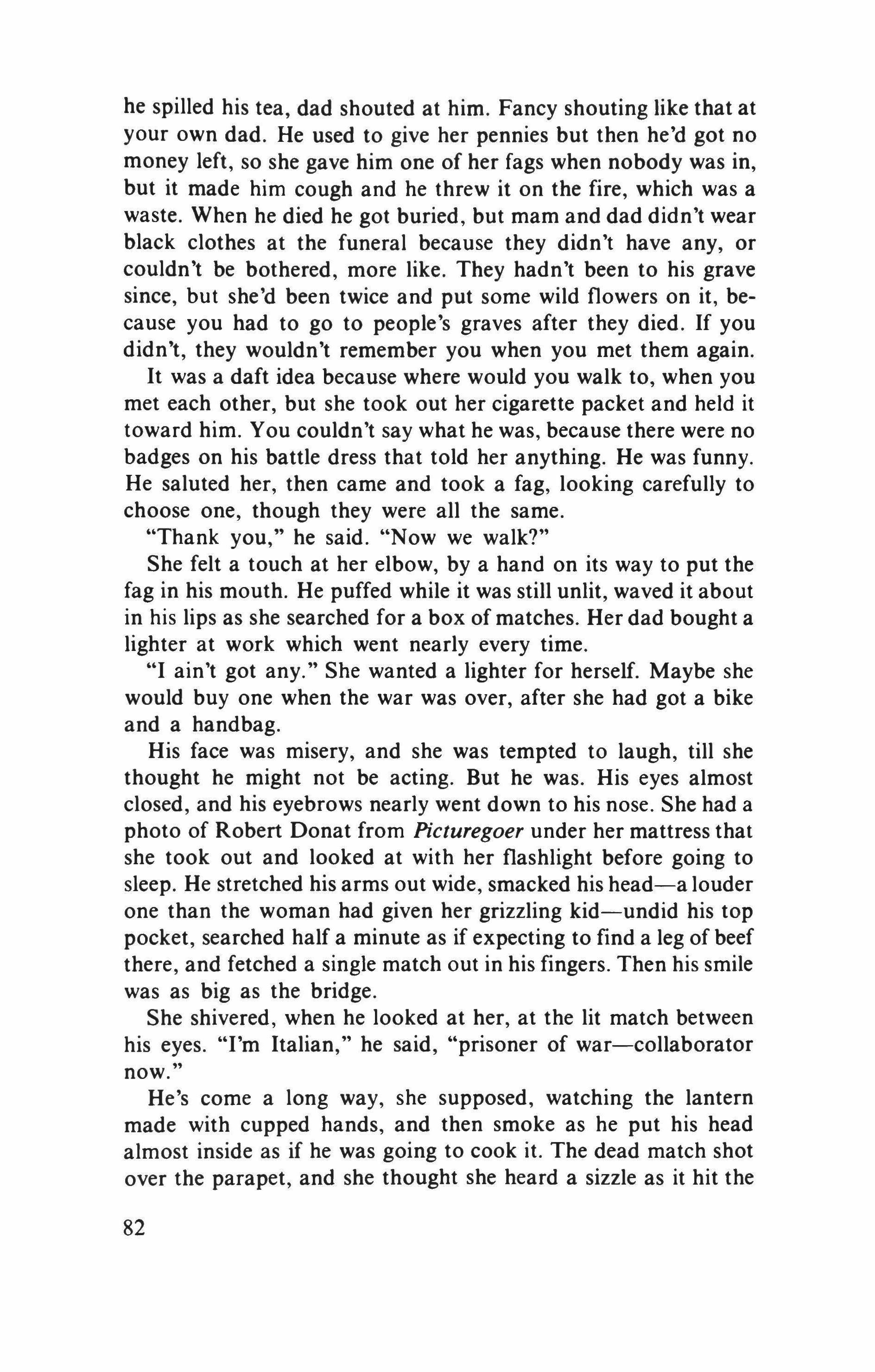
he spilled his tea, dad shouted at him. Fancy shouting like that at your own dad. He used to give her pennies but then he'd got no money left, so she gave him one of her fags when nobody was in, but it made him cough and he threw it on the fire, which was a waste. When he died he got buried, but mam and dad didn't wear black clothes at the funeral because they didn't have any, or couldn't be bothered, more like. They hadn't been to his grave since, but she'd been twice and put some wild flowers on it, because you had to go to people's graves after they died. If you didn't, they wouldn't remember you when you met them again.
It was a daft idea because where would you walk to, when you met each other, but she took out her cigarette packet and held it toward him. You couldn't say what he was, because there were no badges on his battle dress that told her anything. He was funny. He saluted her, then came and took a fag, looking carefully to choose one, though they were all the same.
"Thank you," he said. "Now we walk?"
She felt a touch at her elbow, by a hand on its way to put the fag in his mouth. He puffed while it was still unlit, waved it about in his lips as she searched for a box of matches. Her dad bought a lighter at work which went nearly every time.
"I ain't got any." She wanted a lighter for herself. Maybe she would buy one when the war was over, after she had got a bike and a handbag.
His face was misery, and she was tempted to laugh, till she thought he might not be acting. But he was. His eyes almost closed, and his eyebrows nearly went down to his nose. She had a photo of Robert Donat from Picturegoer under her mattress that she took out and looked at with her flashlight before going to sleep. He stretched his arms out wide, smacked his head-a louder one than the woman had given her grizzling kid-undid his top pocket, searched half a minute as if expecting to find a leg of beef there, and fetched a single match out in his fingers. Then his smile was as big as the bridge.
She shivered, when he looked at her, at the lit match between his eyes. "I'm Italian," he said, "prisoner of war-collaborator now."
He's come a long way, she supposed, watching the lantern made with cupped hands, and then smoke as he put his head almost inside as if he was going to cook it. The dead match shot over the parapet, and she thought she heard a sizzle as it hit the
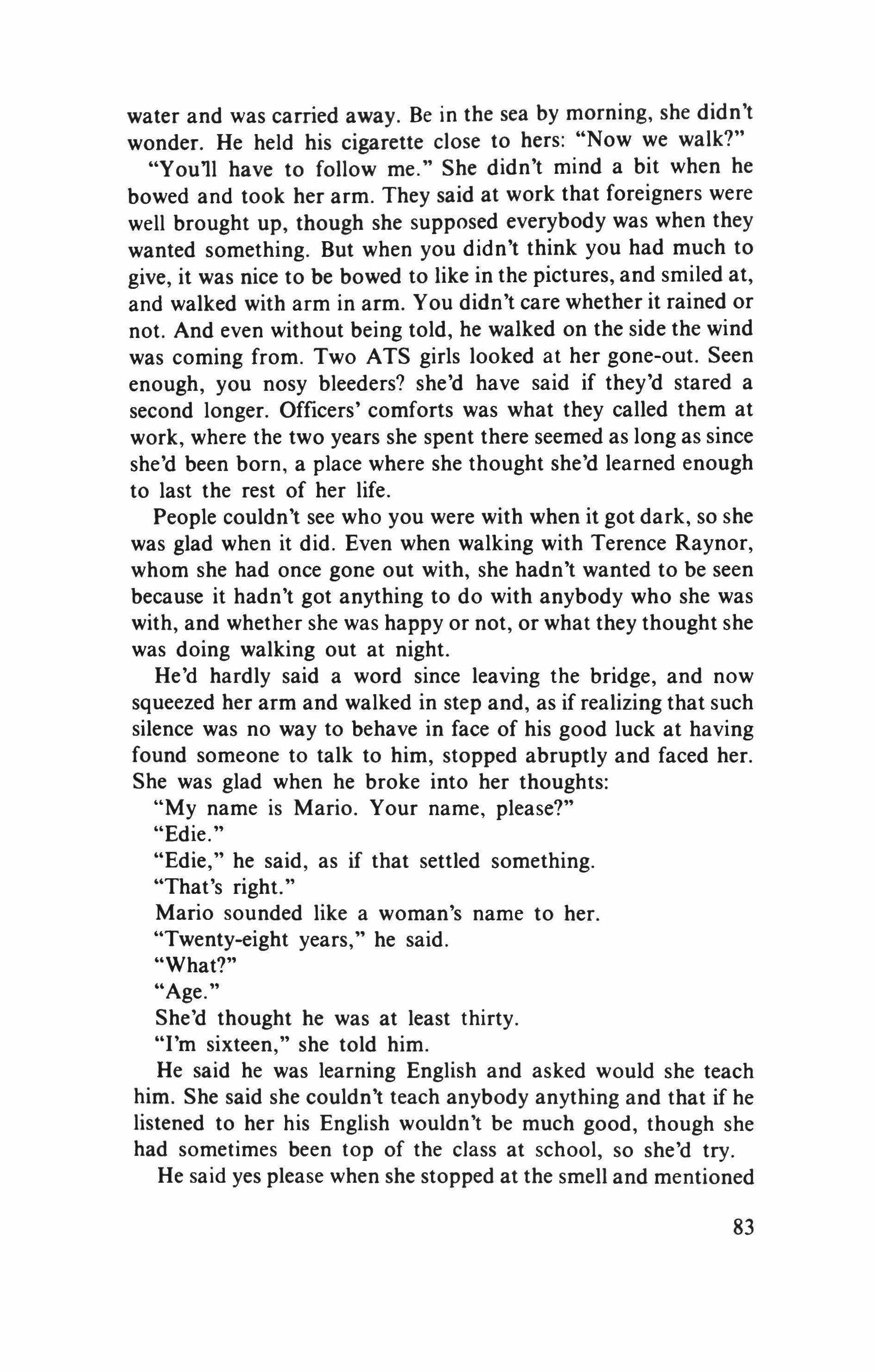
water and was carried away. Be in the sea by morning, she didn't wonder. He held his cigarette close to hers: "Now we walk?"
"You'll have to follow me." She didn't mind a bit when he bowed and took her arm. They said at work that foreigners were well brought up, though she supposed everybody was when they wanted something. But when you didn't think you had much to give, it was nice to be bowed to like in the pictures, and smiled at, and walked with arm in arm. You didn't care whether it rained or not. And even without being told, he walked on the side the wind was coming from. Two ATS girls looked at her gone-out. Seen enough, you nosy bleeders? she'd have said if they'd stared a second longer. Officers' comforts was what they called them at work, where the two years she spent there seemed as long as since she'd been born, a place where she thought she'd learned enough to last the rest of her life.
People couldn't see who you were with when it got dark, so she was glad when it did. Even when walking with Terence Raynor, whom she had once gone out with, she hadn't wanted to be seen because it hadn't got anything to do with anybody who she was with, and whether she was happy or not, or what they thought she was doing walking out at night.
He'd hardly said a word since leaving the bridge, and now squeezed her arm and walked in step and, as if realizing that such silence was no way to behave in face of his good luck at having found someone to talk to him, stopped abruptly and faced her. She was glad when he broke into her thoughts:
"My name is Mario. Your name, please?"
"Edie.
"Edie," he said, as if that settled something.
"That's right."
Mario sounded like a woman's name to her.
"Twenty-eight years," he said.
"What?"
"Age."
She'd thought he was at least thirty.
"I'm sixteen," she told him.
He said he was learning English and asked would she teach him. She said she couldn't teach anybody anything and that if he listened to her his English wouldn't be much good, though she had sometimes been top of the c1ass at school, so she'd try.
He said yes please when she stopped at the smell and mentioned
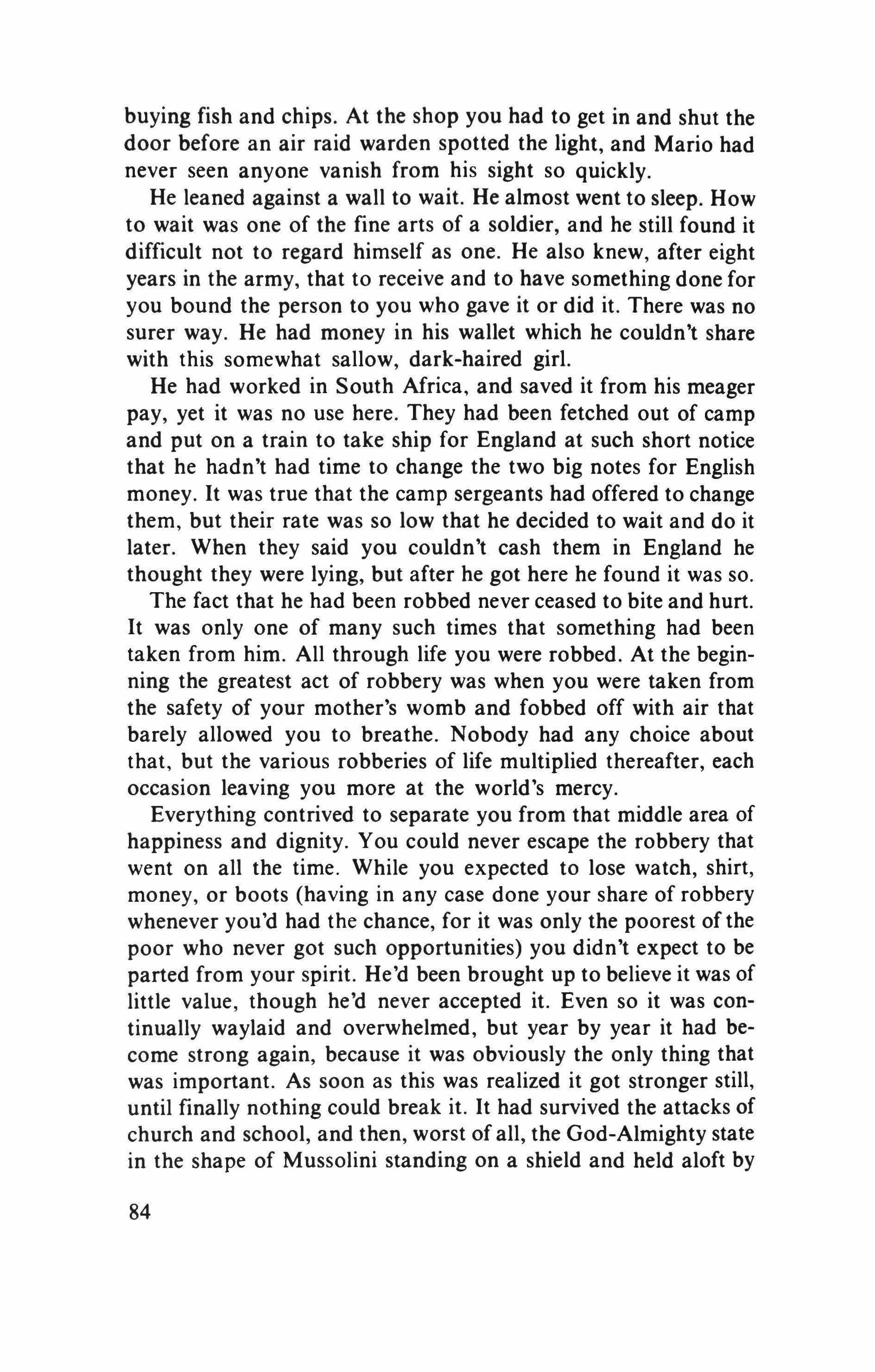
buying fish and chips. At the shop you had to get in and shut the door before an air raid warden spotted the light, and Mario had never seen anyone vanish from his sight so quickly.
He leaned against a wall to wait. He almost went to sleep. How to wait was one of the fine arts of a soldier, and he still found it difficult not to regard himself as one. He also knew, after eight years in the army, that to receive and to have something done for you bound the person to you who gave it or did it. There was no surer way. He had money in his wallet which he couldn't share with this somewhat sallow, dark-haired girl.
He had worked in South Africa, and saved it from his meager pay, yet it was no use here. They had been fetched out of camp and put on a train to take ship for England at such short notice that he hadn't had time to change the two big notes for English money. It was true that the camp sergeants had offered to change them, but their rate was so low that he decided to wait and do it later. When they said you couldn't cash them in England he thought they were lying, but after he got here he found it was so.
The fact that he had been robbed never ceased to bite and hurt. It was only one of many such times that something had been taken from him. All through life you were robbed. At the beginning the greatest act of robbery was when you were taken from the safety of your mother's womb and fobbed off with air that barely allowed you to breathe. Nobody had any choice about that, but the various robberies of life multiplied thereafter, each occasion leaving you more at the world's mercy.
Everything contrived to separate you from that middle area of happiness and dignity. You could never escape the robbery that went on all the time. While you expected to lose watch, shirt, money, or boots (having in any case done your share of robbery whenever you'd had the chance, for it was only the poorest ofthe poor who never got such opportunities) you didn't expect to be parted from your spirit. He'd been brought up to believe it was of little value, though he'd never accepted it. Even so it was continually waylaid and overwhelmed, but year by year it had become strong again, because it was obviously the only thing that was important. As soon as this was realized it got stronger still, until finally nothing could break it. It had survived the attacks of church and school, and then, worst of all, the God-Almighty state in the shape of Mussolini standing on a shield and held aloft by
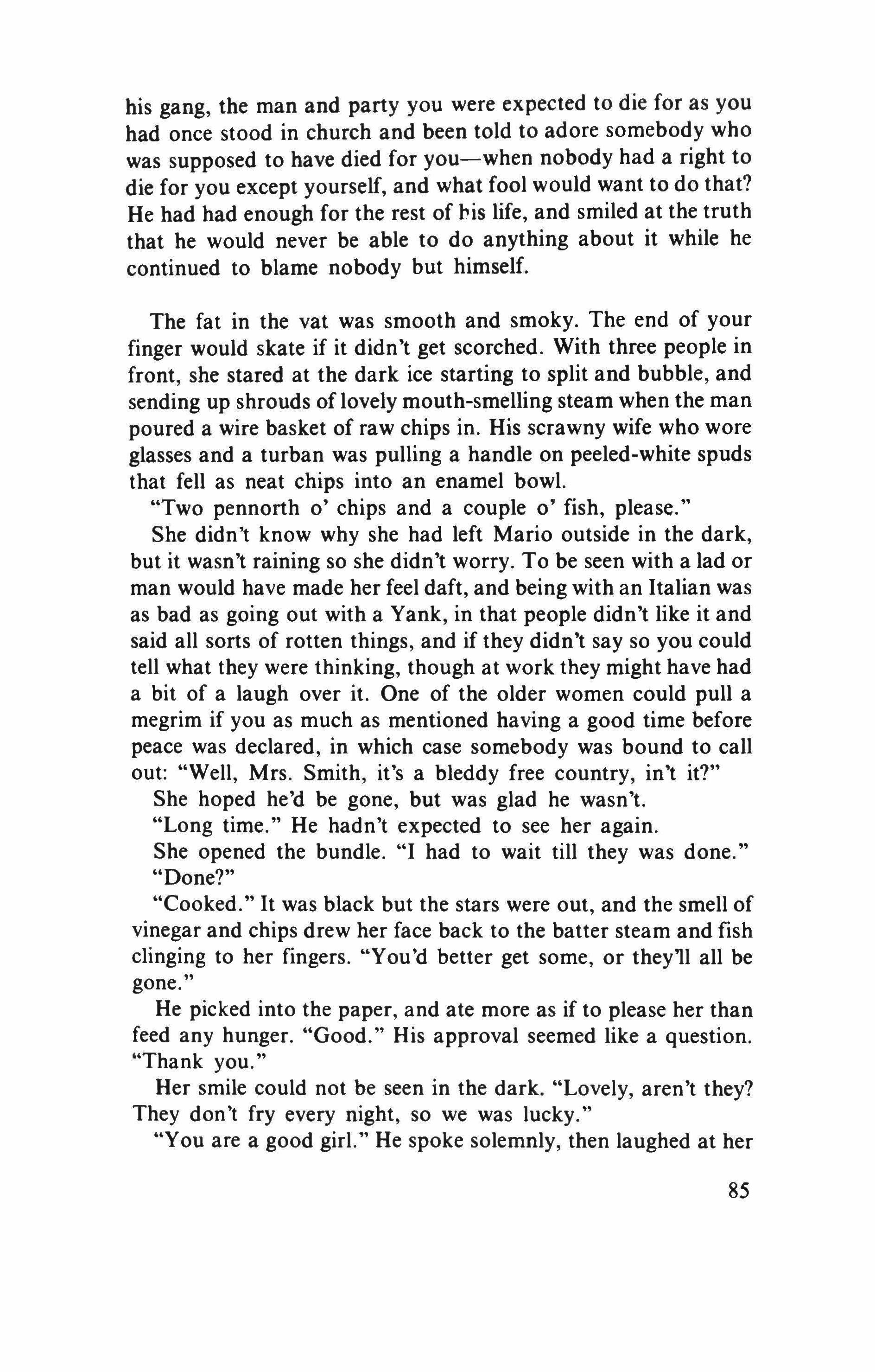
his gang, the man and party you were expected to die for as you had once stood in church and been told to adore somebody who was supposed to have died for you-when nobody had a right to die for you except yourself, and what fool would want to do that? He had had enough for the rest of his life, and smiled at the truth that he would never be able to do anything about it while he continued to blame nobody but himself.
The fat in the vat was smooth and smoky. The end of your finger would skate if it didn't get scorched. With three people in front, she stared at the dark ice starting to split and bubble, and sending up shrouds of lovely mouth-smelling steam when the man poured a wire basket of raw chips in. His scrawny wife who wore glasses and a turban was pulling a handle on peeled-white spuds that fell as neat chips into an enamel bowl.
"Two pennorth 0' chips and a couple 0' fish, please."
She didn't know why she had left Mario outside in the dark, but it wasn't raining so she didn't worry. To be seen with a lad or man would have made her feel daft, and being with an Italian was as bad as going out with a Yank, in that people didn't like it and said all sorts of rotten things, and if they didn't say so you could tell what they were thinking, though at work they might have had a bit of a laugh over it. One of the older women could pull a megrim if you as much as mentioned having a good time before peace was declared, in which case somebody was bound to call out: "Well, Mrs. Smith, it's a bleddy free country, in't it?"
She hoped he'd be gone, but was glad he wasn't.
"Long time." He hadn't expected to see her again.
She opened the bundle. "I had to wait till they was done." "Done?"
"Cooked." It was black but the stars were out, and the smell of vinegar and chips drew her face back to the batter steam and fish clinging to her fingers. "You'd better get some, or they'll all be gone."
He picked into the paper, and ate more as if to please her than feed any hunger. "Good." His approval seemed like a question. "Thank you."
Her smile could not be seen in the dark. "Lovely, aren't they? They don't fry every night, so we was lucky."
"You are a good girl." He spoke solemnly, then laughed at her
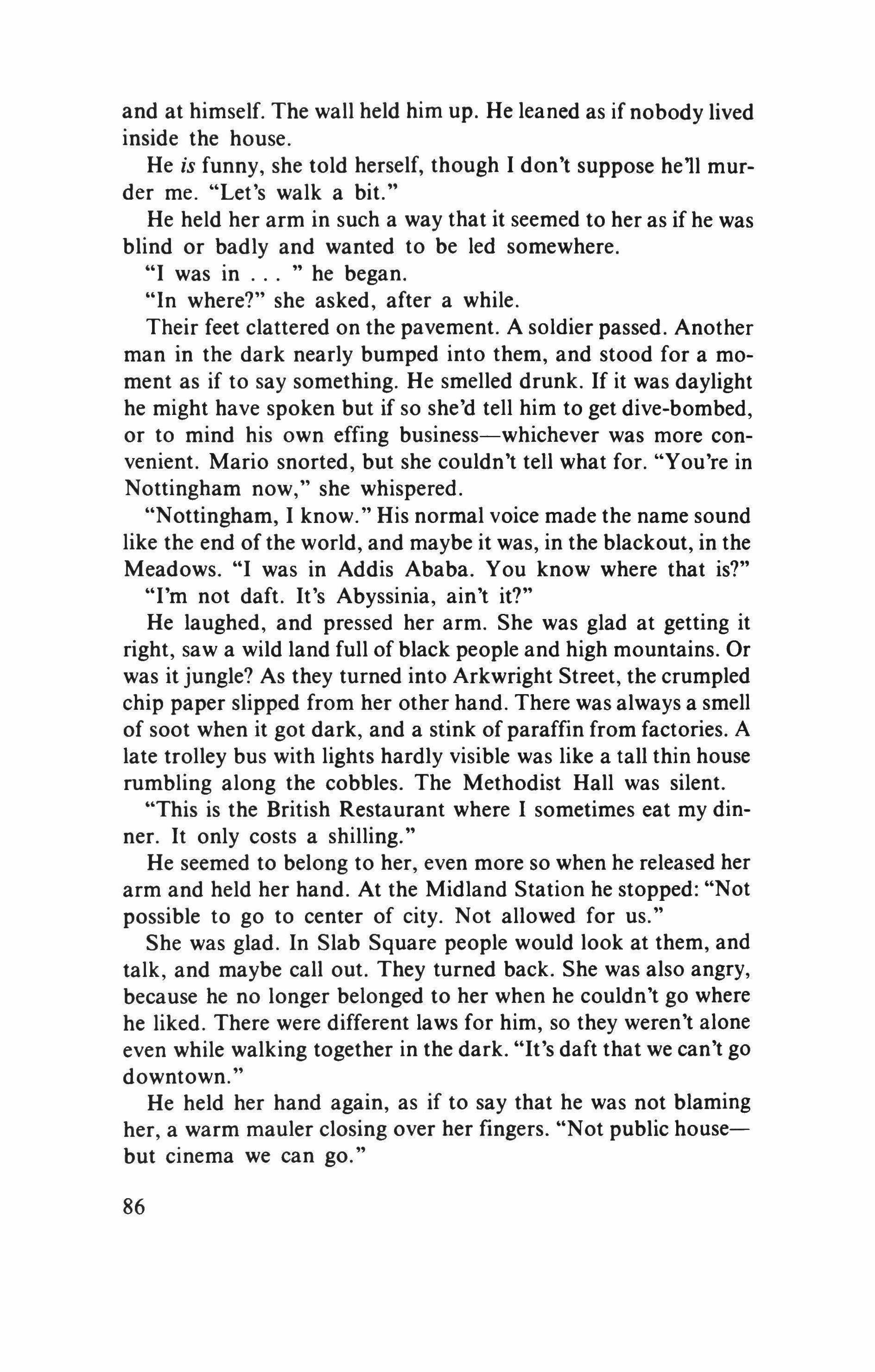
and at himself. The wall held him up. He leaned as if nobody lived inside the house.
He is funny, she told herself, though I don't suppose he'll murder me. "Let's walk a bit."
He held her arm in such a way that it seemed to her as if he was blind or badly and wanted to be led somewhere.
"I was in he began.
"In where?" she asked, after a while.
Their feet clattered on the pavement. A soldier passed. Another man in the dark nearly bumped into them, and stood for a moment as if to say something. He smelled drunk. If it was daylight he might have spoken but if so she'd tell him to get dive-bombed, or to mind his own effing business-whichever was more convenient. Mario snorted, but she couldn't tell what for. "You're in Nottingham now," she whispered.
"Nottingham, I know." His normal voice made the name sound like the end of the world, and maybe it was, in the blackout, in the Meadows. "I was in Addis Ababa. You know where that is?"
"I'm not daft. It's Abyssinia, ain't it?"
He laughed, and pressed her arm. She was glad at getting it right, saw a wild land full of black people and high mountains. Or was it jungle? As they turned into Arkwright Street, the crumpled chip paper slipped from her other hand. There was always a smell of soot when it got dark, and a stink of paraffin from factories. A late trolley bus with lights hardly visible was like a tall thin house rumbling along the cobbles. The Methodist Hall was silent.
"This is the British Restaurant where I sometimes eat my dinner. It only costs a shilling."
He seemed to belong to her, even more so when he released her arm and held her hand. At the Midland Station he stopped: "Not possible to go to center of city. Not allowed for us."
She was glad. In Slab Square people would look at them, and talk, and maybe call out. They turned back. She was also angry, because he no longer belonged to her when he couldn't go where he liked. There were different laws for him, so they weren't alone even while walking together in the dark. "It's daft that we can't go downtown.
He held her hand again, as if to say that he was not blaming her, a warm mauler closing over her fingers. "Not public housebut cinema we can go."
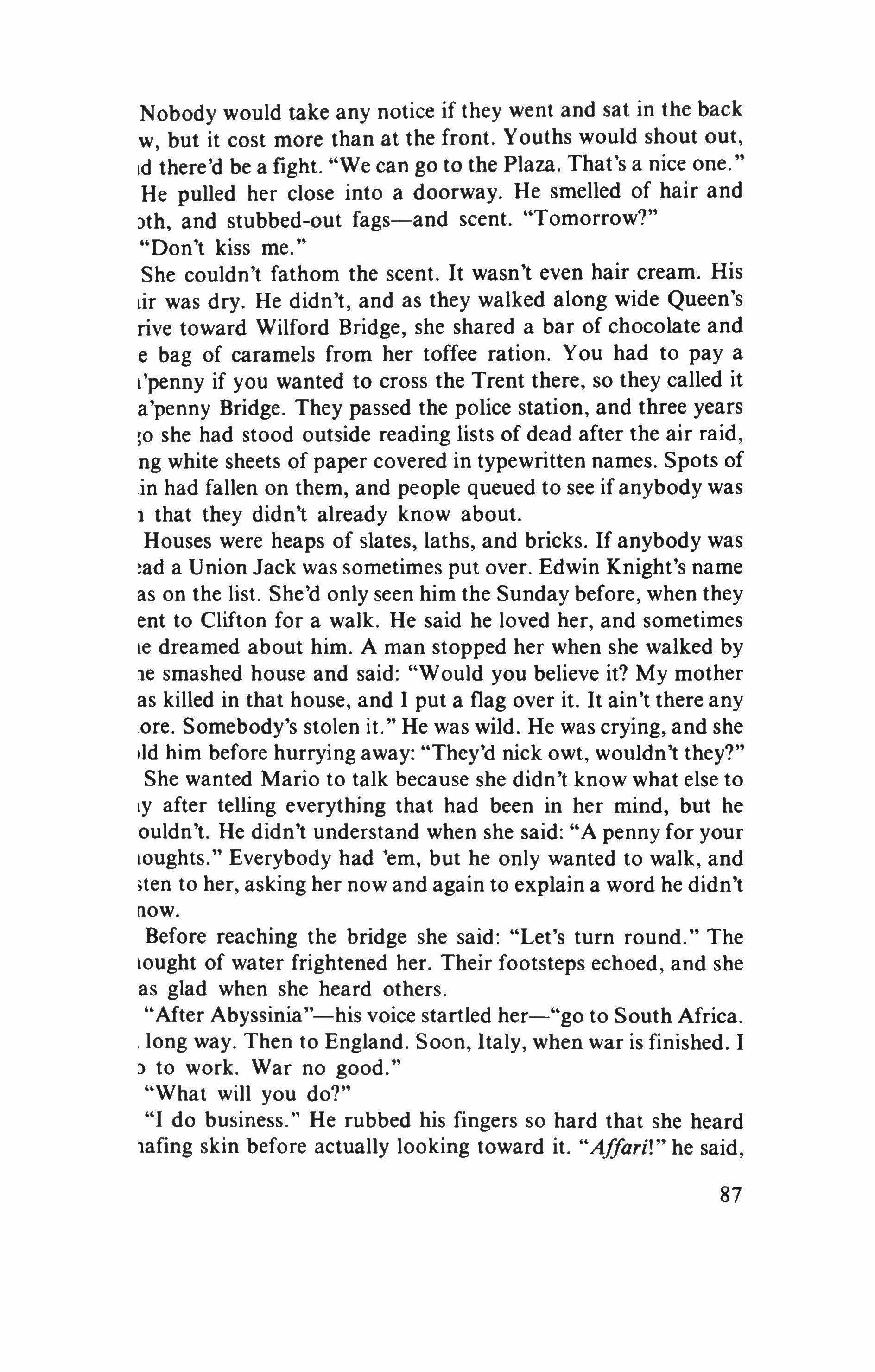
Nobody would take any notice if they went and sat in the back w but it cost more than at the front. Youths would shout out, , rd there'd be a fight. "We can go to the Plaza. That's a nice one." He pulled her close into a doorway. He smelled of hair and oth, and stubbed-out fags-and scent. "Tomorrow?" "Don't kiss me."
She couldn't fathom the scent. It wasn't even hair cream. His iir was dry. He didn't, and as they walked along wide Queen's rive toward Wilford Bridge, she shared a bar of chocolate and e bag of caramels from her toffee ration. You had to pay a i'penny if you wanted to cross the Trent there, so they called it a'penny Bridge. They passed the police station, and three years :0 she had stood outside reading lists of dead after the air raid, ng white sheets of paper covered in typewritten names. Spots of .in had fallen on them, and people queued to see if anybody was 1 that they didn't already know about.
Houses were heaps of slates, laths, and bricks. If anybody was sad a Union Jack was sometimes put over. Edwin Knight's name as on the list. She'd only seen him the Sunday before, when they ent to Clifton for a walk. He said he loved her, and sometimes re dreamed about him. A man stopped her when she walked by ae smashed house and said: "Would you believe it? My mother as killed in that house, and I put a flag over it. It ain't there any lore. Somebody's stolen it." He was wild. He was crying, and she ild him before hurrying away: "They'd nick owt, wouldn't they?"
She wanted Mario to talk because she didn't know what else to Ly after telling everything that had been in her mind, but he ouldn't. He didn't understand when she said: "A penny for your ioughts." Everybody had 'em, but he only wanted to walk, and sten to her, asking her now and again to explain a word he didn't now.
Before reaching the bridge she said: "Let's turn round." The iought of water frightened her. Their footsteps echoed, and she as glad when she heard others.
"After Abyssinia"-his voice startled her-"go to South Africa. .Iong way. Then to England. Soon, Italy, when war is finished. 1 J to work. War no good."
"What will you do?"
"I do business." He rubbed his fingers so hard that she heard rafing skin before actually looking toward it. "Affarit" he said,
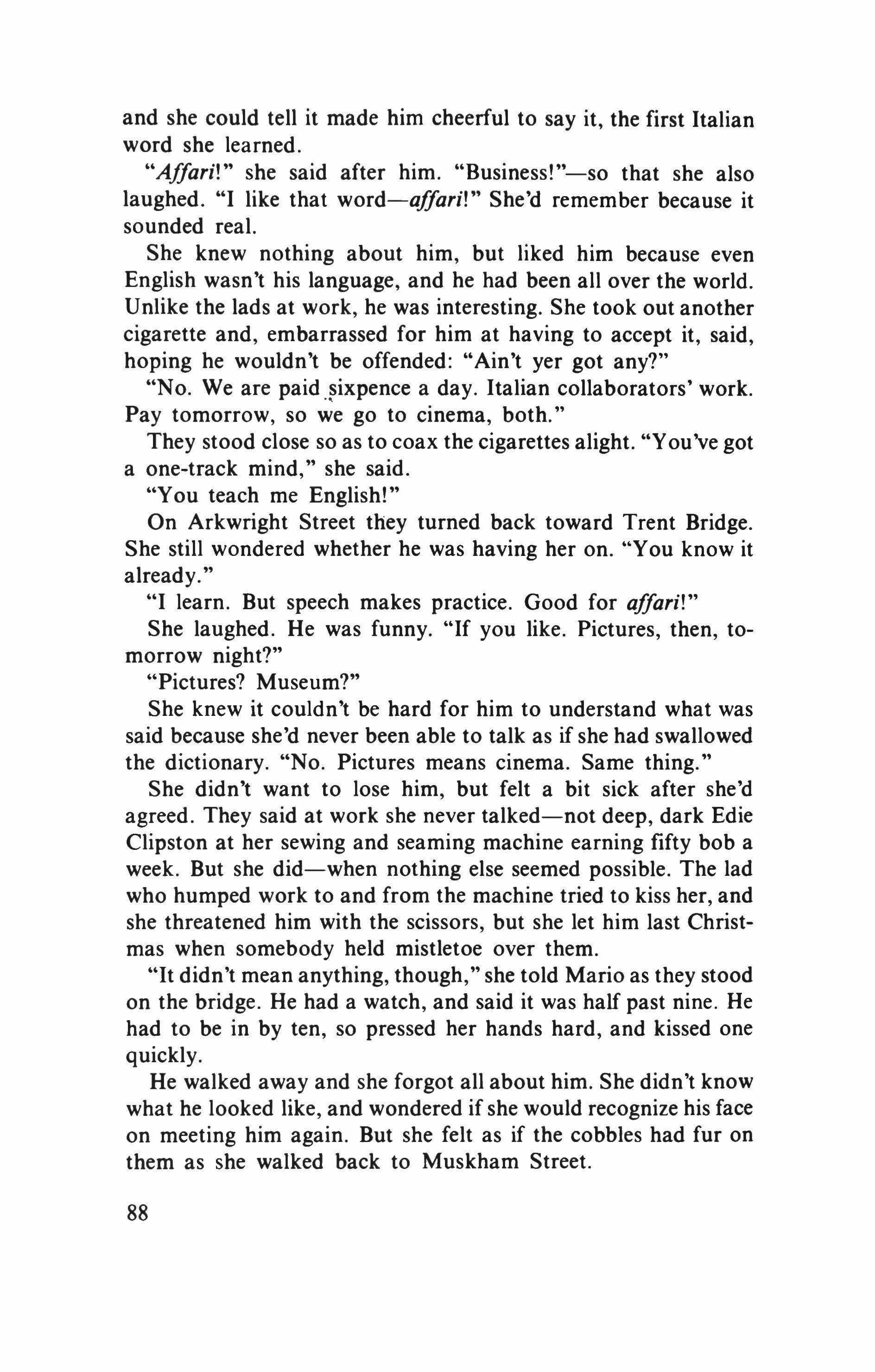
and she could tell it made him cheerful to say it, the first Italian word she learned.
"Affari!" she said after him. "Business!"-so that she also laughed. "I like that word-affari!" She'd remember because it sounded real.
She knew nothing about him, but liked him because even English wasn't his language, and he had been all over the world. Unlike the lads at work, he was interesting. She took out another cigarette and, embarrassed for him at having to accept it, said, hoping he wouldn't be offended: "Ain't yer got any?"
"No. We are paid .�ixpence a day. Italian collaborators' work. Pay tomorrow, so we go to cinema, both."
They stood close so as to coax the cigarettes alight. "Y ou've got a one-track mind," she said.
"You teach me English!"
On Arkwright Street they turned back toward Trent Bridge. She still wondered whether he was having her on. "You know it already."
"I learn. But speech makes practice. Good for affari!"
She laughed. He was funny. "If you like. Pictures, then, tomorrow night?"
"Pictures? Museum?"
She knew it couldn't be hard for him to understand what was said because she'd never been able to talk as if she had swallowed the dictionary. "No. Pictures means cinema. Same thing."
She didn't want to lose him, but felt a bit sick after she'd agreed. They said at work she never talked-not deep, dark Edie Clipston at her sewing and seaming machine earning fifty bob a week. But she did-when nothing else seemed possible. The lad who humped work to and from the machine tried to kiss her, and she threatened him with the scissors, but she let him last Christmas when somebody held mistletoe over them.
"It didn't mean anything, though," she told Mario as they stood on the bridge. He had a watch, and said it was half past nine. He had to be in by ten, so pressed her hands hard, and kissed one quickly.
He walked away and she forgot all about him. She didn't know what he looked like, and wondered if she would recognize his face on meeting him again. But she felt as if the cobbles had fur on them as she walked back to Muskham Street.
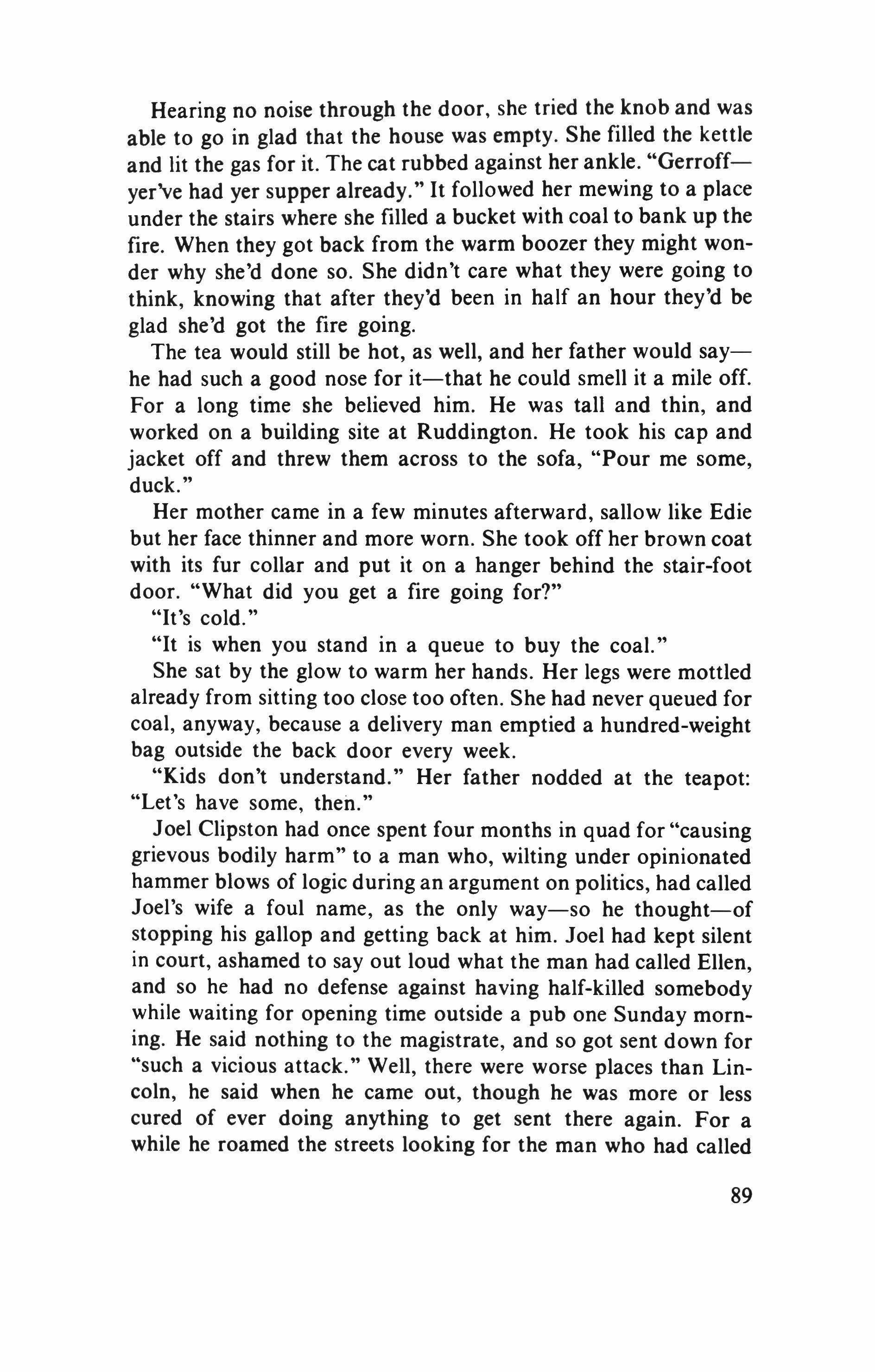
Hearing no noise through the door, she tried the knob and was able to go in glad that the house was empty. She filled the kettle and lit the gas for it. The cat rubbed against her ankle. "Gerroffyer've had yer supper already." It followed her mewing to a place under the stairs where she filled a bucket with coal to bank up the fire. When they got back from the warm boozer they might wonder why she'd done so. She didn't care what they were going to think, knowing that after they'd been in half an hour they'd be glad she'd got the fire going.
The tea would still be hot, as well, and her father would sayhe had such a good nose for it-that he could smell it a mile off. For a long time she believed him. He was tall and thin, and worked on a building site at Ruddington. He took his cap and jacket off and threw them across to the sofa, "Pour me some, duck."
Her mother came in a few minutes afterward, sallow like Edie but her face thinner and more worn. She took off her brown coat with its fur collar and put it on a hanger behind the stair-foot door. "What did you get a fire going for?"
"It's cold."
"It is when you stand in a queue to buy the coal."
She sat by the glow to warm her hands. Her legs were mottled already from sitting too close too often. She had never queued for coal, anyway, because a delivery man emptied a hundred-weight bag outside the back door every week.
"Kids don't understand." Her father nodded at the teapot: "Let's have some, then."
Joel Clipston had once spent four months in quad for "causing grievous bodily harm" to a man who, wilting under opinionated hammer blows of logic during an argument on politics, had called Joel's wife a foul name, as the only way-so he thought-of stopping his gallop and getting back at him. Joel had kept silent in court, ashamed to say out loud what the man had called Ellen, and so he had no defense against having half-killed somebody while waiting for opening time outside a pub one Sunday morning. He said nothing to the magistrate, and so got sent down for "such a vicious attack." Well, there were worse places than Lincoln, he said when he came out, though he was more or less cured of ever doing anything to get sent there again. For a while he roamed the streets looking for the man who had called
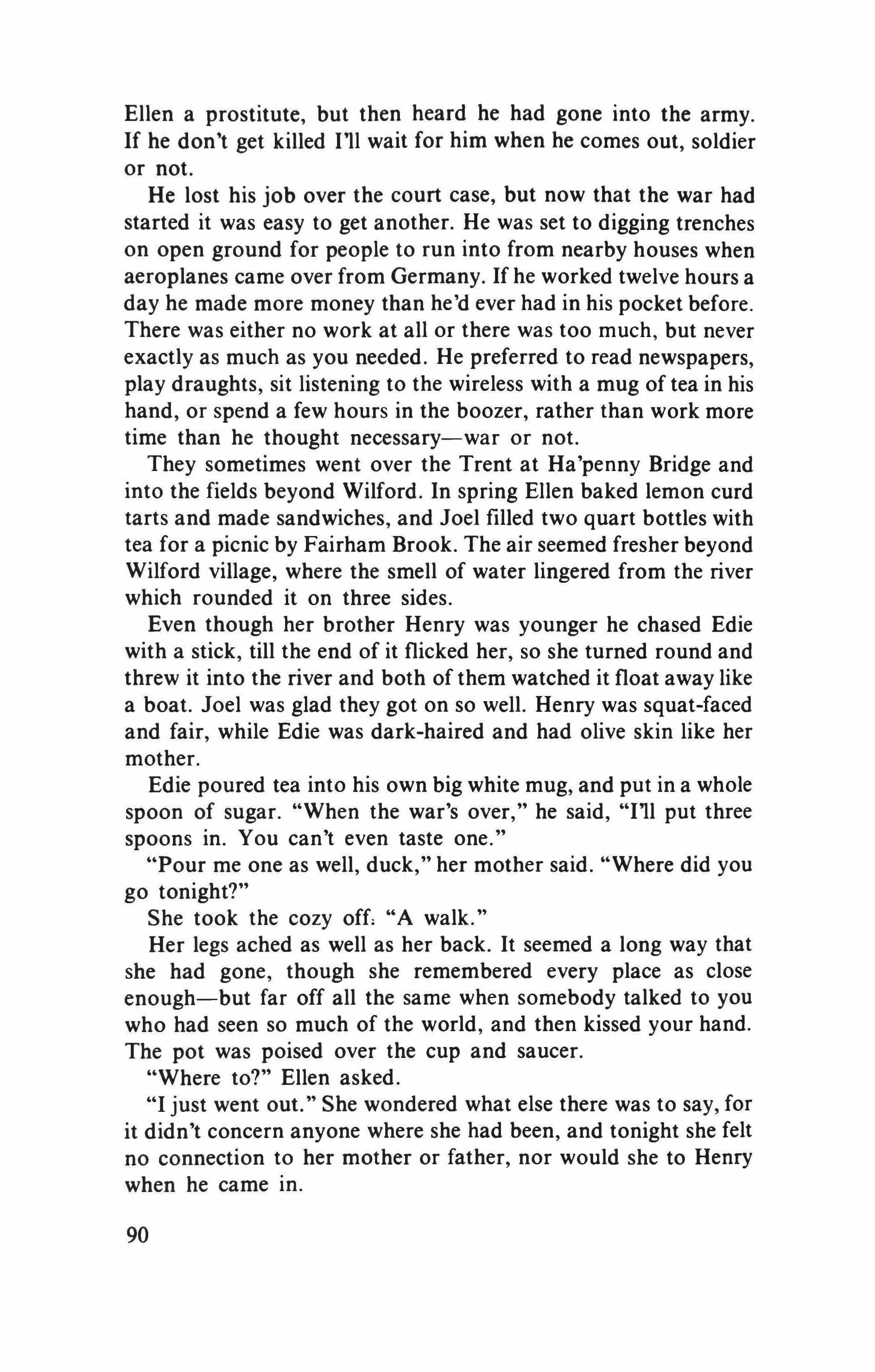
Ellen a prostitute, but then heard he had gone into the army. If he don't get killed I'll wait for him when he comes out, soldier or not.
He lost his job over the court case, but now that the war had started it was easy to get another. He was set to digging trenches on open ground for people to run into from nearby houses when aeroplanes came over from Germany. If he worked twelve hours a day he made more money than he'd ever had in his pocket before. There was either no work at all or there was too much, but never exactly as much as you needed. He preferred to read newspapers, play draughts, sit listening to the wireless with a mug of tea in his hand, or spend a few hours in the boozer, rather than work more time than he thought necessary-war or not.
They sometimes went over the Trent at Ha'penny Bridge and into the fields beyond Wilford. In spring Ellen baked lemon curd tarts and made sandwiches, and Joel filled two quart bottles with tea for a picnic by Fairham Brook. The air seemed fresher beyond Wilford village, where the smell of water lingered from the river which rounded it on three sides.
Even though her brother Henry was younger he chased Edie with a stick, till the end of it flicked her, so she turned round and threw it into the river and both of them watched it float away like a boat. Joel was glad they got on so well. Henry was squat-faced and fair, while Edie was dark-haired and had olive skin like her mother.
Edie poured tea into his own big white mug, and put in a whole spoon of sugar. "When the war's over," he said, "111 put three spoons in. You can't even taste one."
"Pour me one as well, duck," her mother said. "Where did you go tonight?"
She took the cozy off. "A walk."
Her legs ached as well as her back. It seemed a long way that she had gone, though she remembered every place as close enough-but far off all the same when somebody talked to you who had seen so much of the world, and then kissed your hand. The pot was poised over the cup and saucer.
"Where to?" Ellen asked.
"I just went out." She wondered what else there was to say, for it didn't concern anyone where she had been, and tonight she felt no connection to her mother or father, nor would she to Henry when he came in.
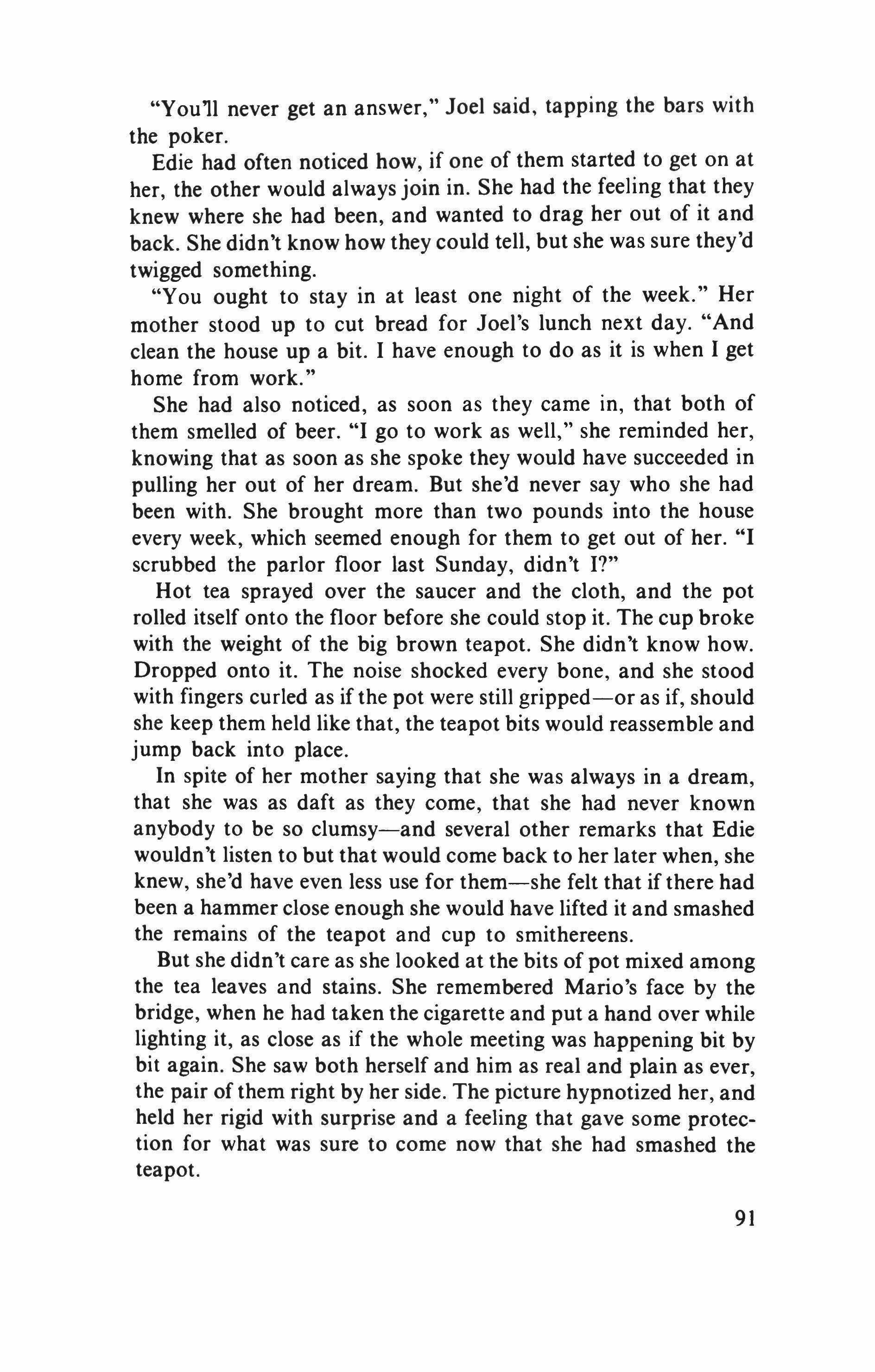
"You'll never get an answer," Joel said, tapping the bars with the poker.
Edie had often noticed how, if one of them started to get on at her, the other would always join in. She had the feeling that they knew where she had been, and wanted to drag her out of it and back. She didn't know how they could tell, but she was sure they'd twigged something.
"You ought to stay in at least one night of the week." Her mother stood up to cut bread for Joel's lunch next day. "And clean the house up a bit. I have enough to do as it is when I get home from work."
She had also noticed, as soon as they came in, that both of them smelled of beer. "I go to work as well," she reminded her, knowing that as soon as she spoke they would have succeeded in pulling her out of her dream. But she'd never say who she had been with. She brought more than two pounds into the house every week, which seemed enough for them to get out of her. "I scrubbed the parlor floor last Sunday, didn't I?"
Hot tea sprayed over the saucer and the cloth, and the pot rolled itself onto the floor before she could stop it. The cup broke with the weight of the big brown teapot. She didn't know how. Dropped onto it. The noise shocked every bone, and she stood with fingers curled as if the pot were still gripped-or as if, should she keep them held like that, the teapot bits would reassemble and jump back into place.
In spite of her mother saying that she was always in a dream, that she was as daft as they come, that she had never known anybody to be so clumsy-and several other remarks that Edie wouldn't listen to but that would come back to her later when, she knew, she'd have even less use for them-she felt that ifthere had been a hammer close enough she would have lifted it and smashed the remains of the teapot and cup to smithereens.
But she didn't care as she looked at the bits of pot mixed among the tea leaves and stains. She remembered Mario's face by the bridge, when he had taken the cigarette and put a hand over while lighting it, as close as if the whole meeting was happening bit by bit again. She saw both herself and him as real and plain as ever, the pair of them right by her side. The picture hypnotized her, and held her rigid with surprise and a feeling that gave some protection for what was sure to come now that she had smashed the teapot.
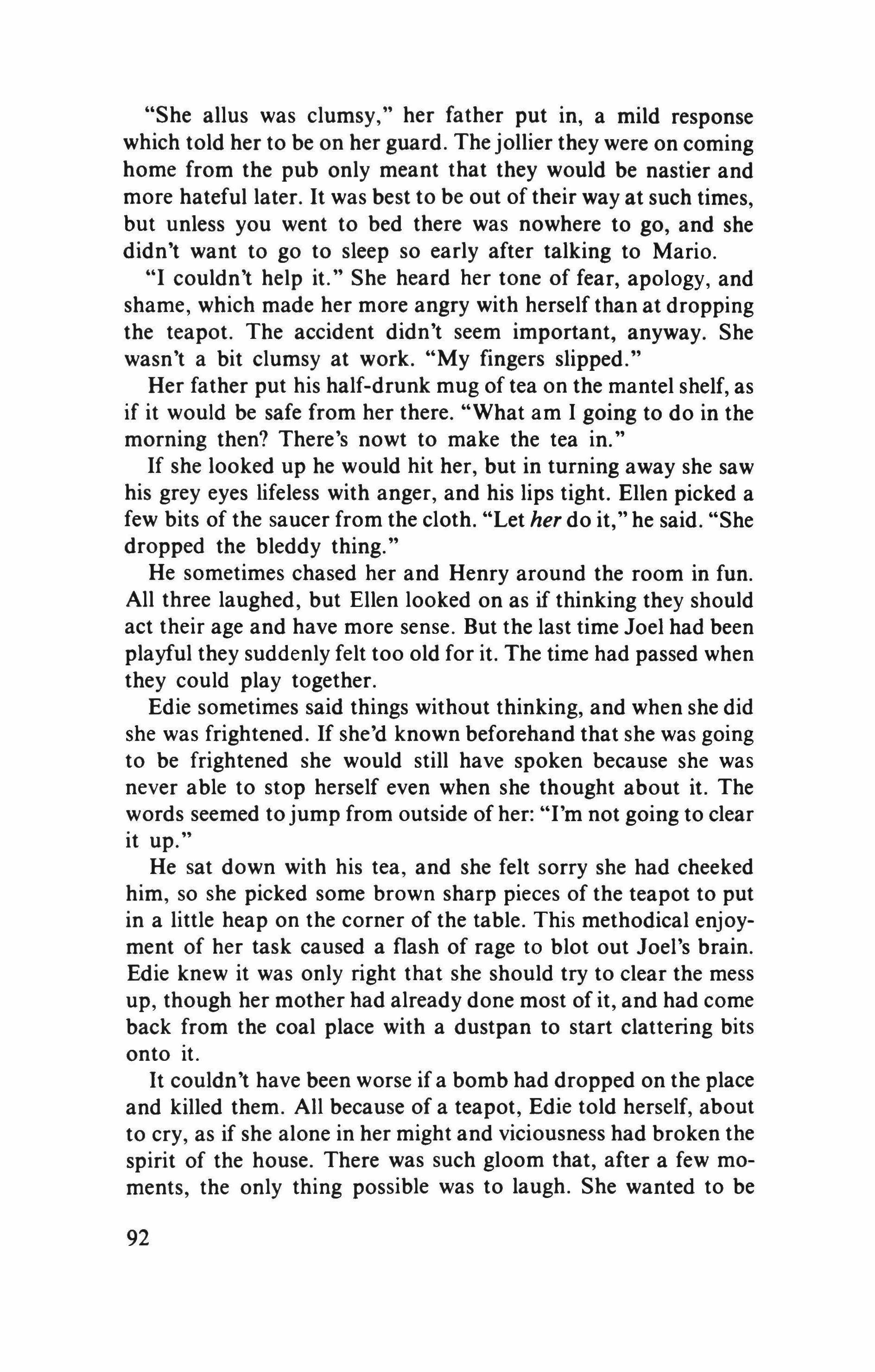
"She allus was clumsy," her father put in, a mild response which told her to be on her guard. The jollier they were on coming home from the pub only meant that they would be nastier and more hateful later. It was best to be out of their way at such times, but unless you went to bed there was nowhere to go, and she didn't want to go to sleep so early after talking to Mario.
"I couldn't help it." She heard her tone of fear, apology, and shame, which made her more angry with herself than at dropping the teapot. The accident didn't seem important, anyway. She wasn't a bit clumsy at work. "My fingers slipped."
Her father put his half-drunk mug of tea on the mantel shelf, as if it would be safe from her there. "What am I going to do in the morning then? There's nowt to make the tea in."
If she looked up he would hit her, but in turning away she saw his grey eyes lifeless with anger, and his lips tight. Ellen picked a few bits of the saucer from the cloth. "Let her do it," he said. "She dropped the bleddy thing."
He sometimes chased her and Henry around the room in fun. All three laughed, but Ellen looked on as if thinking they should act their age and have more sense. But the last time Joel had been playful they suddenly felt too old for it. The time had passed when they could play together.
Edie sometimes said things without thinking, and when she did she was frightened. If she'd known beforehand that she was going to be frightened she would still have spoken because she was never able to stop herself even when she thought about it. The words seemed to jump from outside of her: "I'm not going to clear it up."
He sat down with his tea, and she felt sorry she had cheeked him, so she picked some brown sharp pieces of the teapot to put in a little heap on the corner of the table. This methodical enjoyment of her task caused a flash of rage to blot out Joel's brain. Edie knew it was only right that she should try to clear the mess up, though her mother had already done most of it, and had come back from the coal place with a dustpan to start clattering bits onto it.
It couldn't have been worse if a bomb had dropped on the place and killed them. All because of a teapot, Edie told herself, about to cry, as if she alone in her might and viciousness had broken the spirit of the house. There was such gloom that, after a few moments, the only thing possible was to laugh. She wanted to be
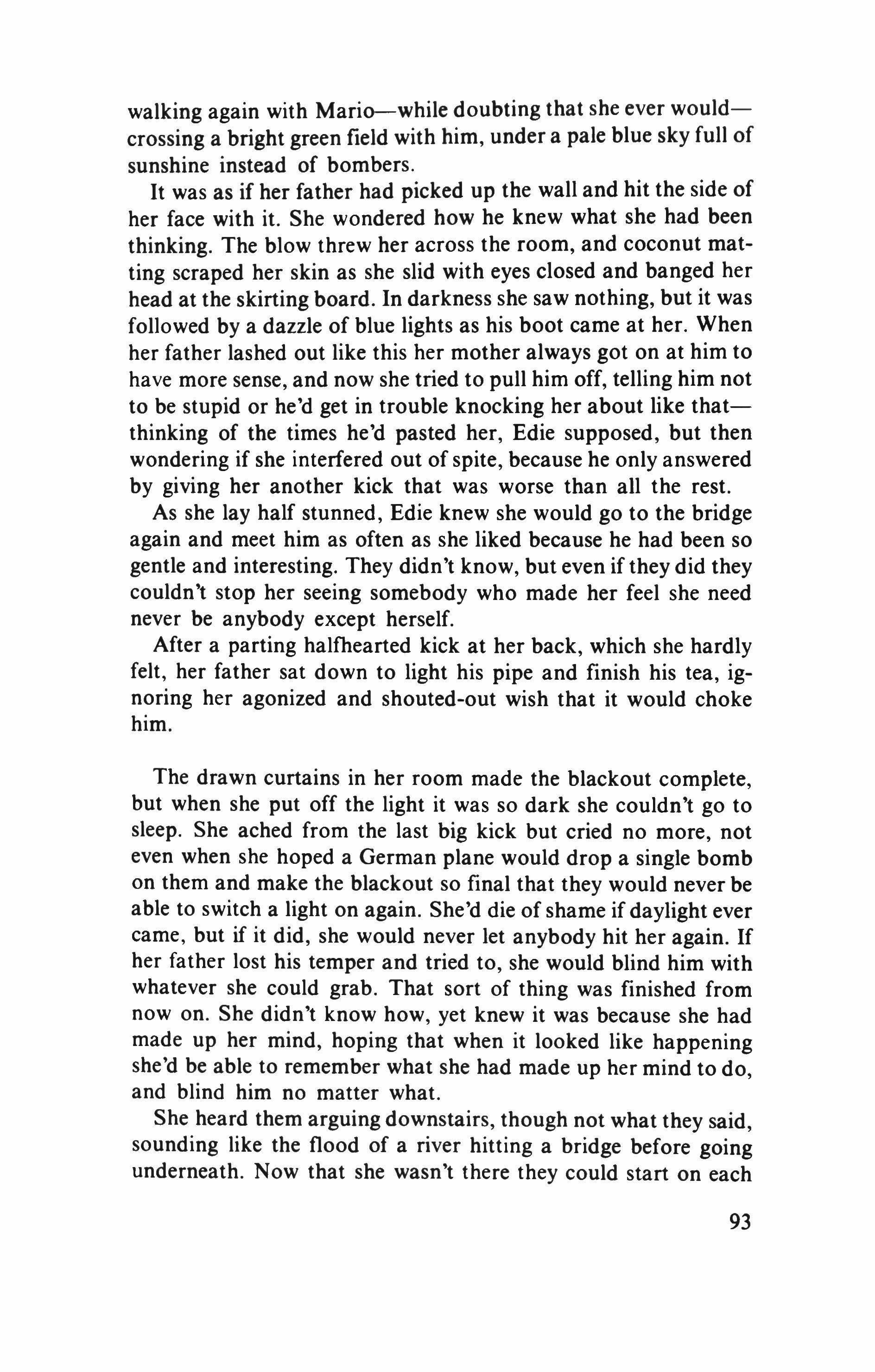
walking again with Mario-while doubting that she ever wouldcrossing a bright green field with him, under a pale blue sky full of sunshine instead of bombers.
It was as if her father had picked up the wall and hit the side of her face with it. She wondered how he knew what she had been thinking. The blow threw her across the room, and coconut matting scraped her skin as she slid with eyes closed and banged her head at the skirting board. In darkness she saw nothing, but it was followed by a dazzle of blue lights as his boot came at her. When her father lashed out like this her mother always got on at him to have more sense, and now she tried to pull him off, telling him not to be stupid or he'd get in trouble knocking her about like thatthinking of the times he'd pasted her, Edie supposed, but then wondering if she interfered out of spite, because he only answered by giving her another kick that was worse than all the rest.
As she lay half stunned, Edie knew she would go to the bridge again and meet him as often as she liked because he had been so gentle and interesting. They didn't know, but even if they did they couldn't stop her seeing somebody who made her feel she need never be anybody except herself.
After a parting halfhearted kick at her back, which she hardly felt, her father sat down to light his pipe and finish his tea, ignoring her agonized and shouted-out wish that it would choke him.
The drawn curtains in her room made the blackout complete, but when she put off the light it was so dark she couldn't go to sleep. She ached from the last big kick but cried no more, not even when she hoped a German plane would drop a single bomb on them and make the blackout so final that they would never be able to switch a light on again. She'd die of shame if daylight ever came, but if it did, she would never let anybody hit her again. If her father lost his temper and tried to, she would blind him with whatever she could grab. That sort of thing was finished from now on. She didn't know how, yet knew it was because she had made up her mind, hoping that when it looked like happening she'd be able to remember what she had made up her mind to do, and blind him no matter what.
She heard them arguing downstairs, though not what they said, sounding like the flood of a river hitting a bridge before going underneath. Now that she wasn't there they could start on each
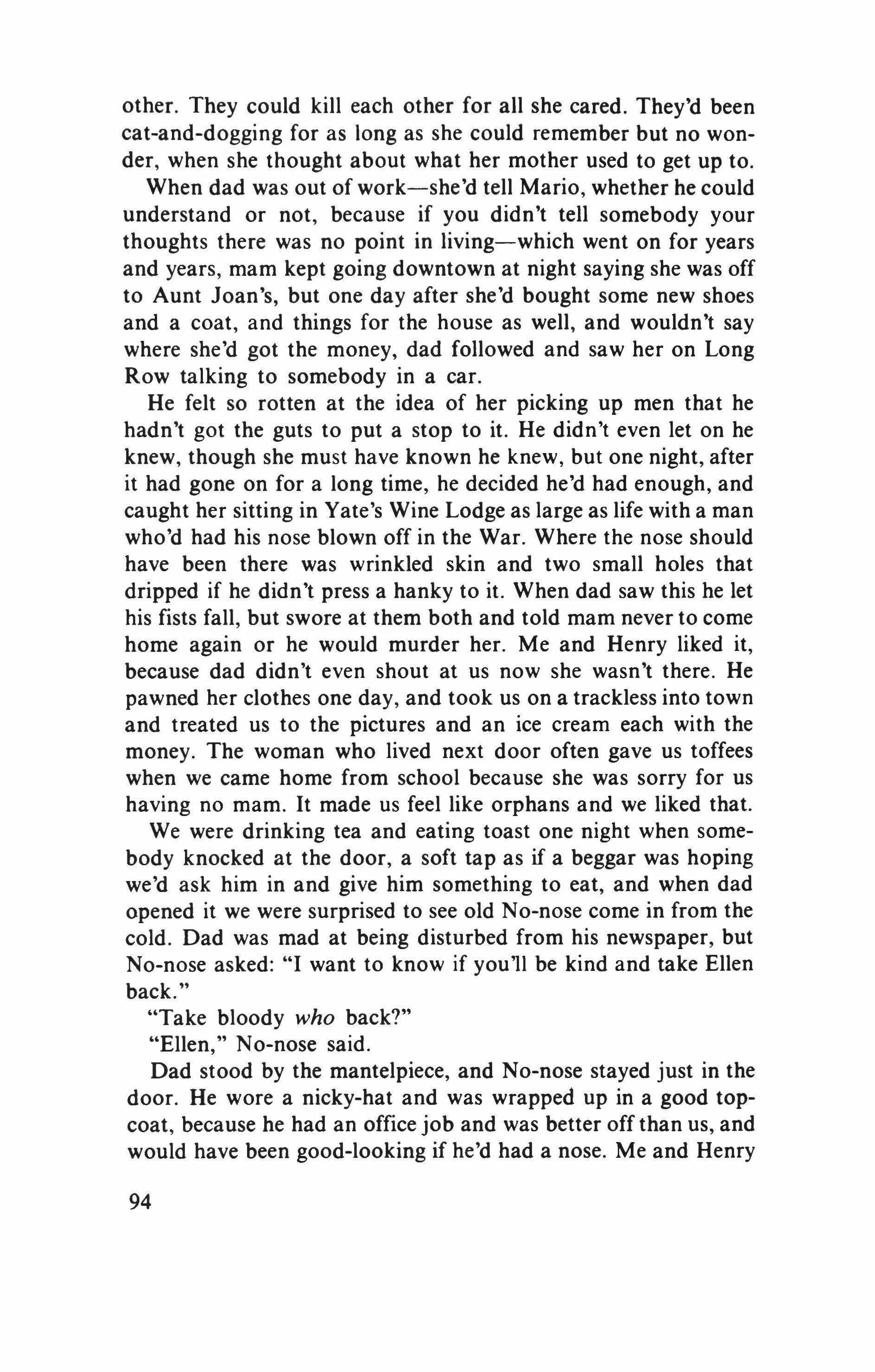
other. They could kill each other for all she cared. They'd been cat-and-dogging for as long as she could remember but no wonder, when she thought about what her mother used to get up to.
When dad was out of work-she'd tell Mario, whether he could understand or not, because if you didn't tell somebody your thoughts there was no point in living-which went on for years and years, mam kept going downtown at night saying she was off to Aunt Joan's, but one day after she'd bought some new shoes and a coat, and things for the house as well, and wouldn't say where she'd got the money, dad followed and saw her on Long Row talking to somebody in a car.
He felt so rotten at the idea of her picking up men that he hadn't got the guts to put a stop to it. He didn't even let on he knew, though she must have known he knew, but one night, after it had gone on for a long time, he decided he'd had enough, and caught her sitting in Yate's Wine Lodge as large as life with a man who'd had his nose blown off in the War. Where the nose should have been there was wrinkled skin and two small holes that dripped if he didn't press a hanky to it. When dad saw this he let his fists fall, but swore at them both and told mam never to come home again or he would murder her. Me and Henry liked it, because dad didn't even shout at us now she wasn't there. He pawned her clothes one day, and took us on a trackless into town and treated us to the pictures and an ice cream each with the money. The woman who lived next door often gave us toffees when we came home from school because she was sorry for us having no mam. It made us feel like orphans and we liked that.
We were drinking tea and eating toast one night when somebody knocked at the door, a soft tap as if a beggar was hoping we'd ask him in and give him something to eat, and when dad opened it we were surprised to see old No-nose come in from the cold. Dad was mad at being disturbed from his newspaper, but No-nose asked: "I want to know if you'll be kind and take Ellen back."
"Take bloody who back?"
"Ellen," No-nose said.
Dad stood by the mantelpiece, and No-nose stayed just in the door. He wore a nicky-hat and was wrapped up in a good topcoat, because he had an office job and was better off than us, and would have been good-looking if he'd had a nose. Me and Henry
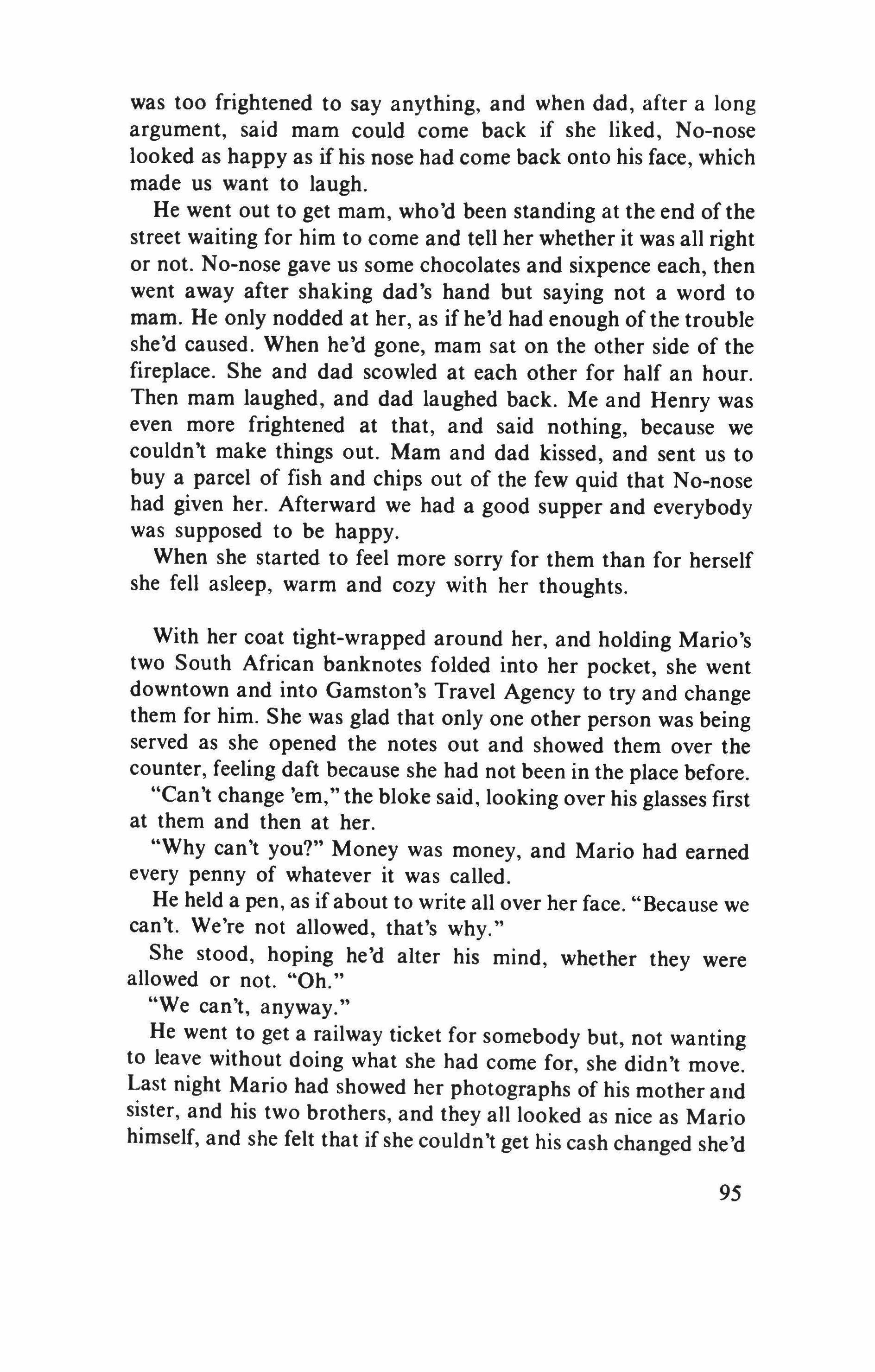
was too frightened to say anything, and when dad, after a long argument, said mam could come back if she liked, No-nose looked as happy as if his nose had come back onto his face, which made us want to laugh.
He went out to get mam, who'd been standing at the end of the street waiting for him to come and tell her whether it was all right or not. No-nose gave us some chocolates and sixpence each, then went away after shaking dad's hand but saying not a word to mam. He only nodded at her, as if he'd had enough ofthe trouble she'd caused. When he'd gone, mam sat on the other side of the fireplace. She and dad scowled at each other for half an hour. Then mam laughed, and dad laughed back. Me and Henry was even more frightened at that, and said nothing, because we couldn't make things out. Mam and dad kissed, and sent us to buy a parcel of fish and chips out of the few quid that No-nose had given her. Afterward we had a good supper and everybody was supposed to be happy.
When she started to feel more sorry for them than for herself she fell asleep, warm and cozy with her thoughts.
With her coat tight-wrapped around her, and holding Mario's two South African banknotes folded into her pocket, she went downtown and into Gamston's Travel Agency to try and change them for him. She was glad that only one other person was being served as she opened the notes out and showed them over the counter, feeling daft because she had not been in the place before.
"Can't change 'em," the bloke said, looking over his glasses first at them and then at her.
"Why can't you?" Money was money, and Mario had earned every penny of whatever it was called.
He held a pen, as if about to write all over her face. "Because we can't. We're not allowed, that's why."
She stood, hoping he'd alter his mind, whether they were allowed or not. "Oh."
"We can't, anyway."
He went to get a railway ticket for somebody but, not wanting to leave without doing what she had come for, she didn't move. Last night Mario had showed her photographs of his mother and sister, and his two brothers, and they all looked as nice as Mario himself, and she felt that if she couldn't get his cash changed she'd

be letting them down as well as him. So she held up the large gaudy-colored banknotes again.
The man came back. "Nothing I can do for you. It's foreign money, and there's a war on, and that's why we can't change it. Come in after the war, then it might be all right!"
"It'll be too late, then. I need it now."
A woman behind the counter put a cup oftea by his elbow, and maybe he didn't want to let it get cold because he said, as if ready to fetch the police to her: "Where did you get 'em from?"
She saw by his face, and knew from his tone, that he thought she had nicked them, or-she screwed the words painfully into her mind-earned them like that. Her mouth filled with swearing, but she couldn't spit it at him as he deserved, so walked out and then went quickly along Parliament Street toward a cafe where she could get a cup of tea.
The sun was in her eyes so she turned her back to it. When Mario walked onto the bridge she gave him the banknotes back. "Sorry."
"N0 affari'I"
"The bleeders wouldn't do it."
He scowled. "Bleeders?"
She explained.
He didn't talk for half an hour. They walked along the embankment where rowing boats were tied to the wooden landing stage, and she wondered when and at what place they would reach the sea if she and Mario got into one of them. Maybe they'd get to Italy, and have no more trouble from anybody.
He held her hand tightly so she knew he was brooding about something which it was no use asking him to explain. But he didn't seem angry. He was miles away, living in words and colors and sounds that she knew she had no hope of understanding, though when she tried to picture them she liked the warm and dreamy feeling that came to her. If she had been with an Englishman she wouldn't have had such dreams. They'd have joshed and teased each other like kids. But with Mario she saw mountains and yellow trees, and a sky so blue it would blind you if you looked full at it. But she couldn't get beyond that, and didn't want to because her dream was a long way beyond what was normally
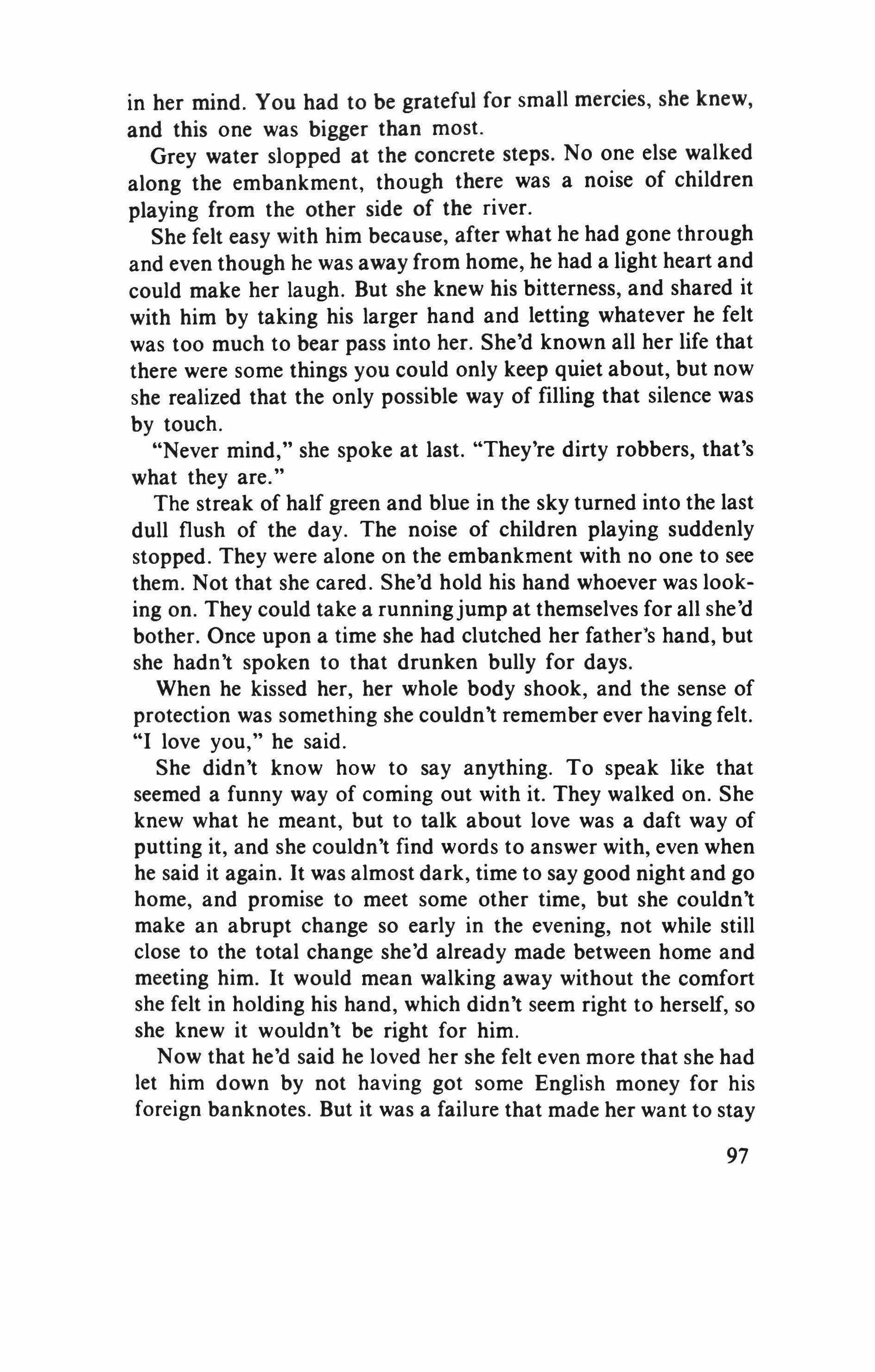
in her mind. You had to be grateful for small mercies, she knew, and this one was bigger than most.
Grey water slopped at the concrete steps. No one else walked along the embankment, though there was a noise of children playing from the other side of the river.
She felt easy with him because, after what he had gone through and even though he was away from home, he had a light heart and could make her laugh. But she knew his bitterness, and shared it with him by taking his larger hand and letting whatever he felt was too much to bear pass into her. She'd known all her life that there were some things you could only keep quiet about, but now she realized that the only possible way of filling that silence was by touch.
"Never mind," she spoke at last. "They're dirty robbers, that's what they are."
The streak of half green and blue in the sky turned into the last dull flush of the day. The noise of children playing suddenly stopped. They were alone on the embankment with no one to see them. Not that she cared. She'd hold his hand whoever was looking on. They could take a runningjump at themselves for all she'd bother. Once upon a time she had clutched her father's hand, but she hadn't spoken to that drunken bully for days.
When he kissed her, her whole body shook, and the sense of protection was something she couldn't remember ever having felt. "I love you," he said.
She didn't know how to say anything. To speak like that seemed a funny way of coming out with it. They walked on. She knew what he meant, but to talk about love was a daft way of putting it, and she couldn't find words to answer with, even when he said it again. It was almost dark, time to say good night and go home, and promise to meet some other time, but she couldn't make an abrupt change so early in the evening, not while still close to the total change she'd already made between home and meeting him. It would mean walking away without the comfort she felt in holding his hand, which didn't seem right to herself, so she knew it wouldn't be right for him.
Now that he'd said he loved her she felt even more that she had let him down by not having got some English money for his foreign banknotes. But it was a failure that made her want to stay

with him. They were closer because of it, and she was almost glad they'd been so rotten to her at the travel agents'.
A policeman stood by Ha'penny Bridge, talking to the woman tollkeeper who leaned by a tiny brick house to collect money from any carts, motors, bikes, or people that went over. Mario said: "Not go there."
There was plenty of dusk to hide them, so she wondered what he meant, as they stood on the lowest step by the water which, had it come up another inch, would have flowed over her shoes. "It don't matter, does it?"
"In camp at ten. Too late now. No Italian out after ten o'clock."
The world was full of trouble for things that did no harm. She wondered who started it but didn't know. No soul would suffer if Mario walked about after ten at night. It wouldn't stop the day starting up tomorrow. "Will you get shouted at?"
He smiled. "I gave sergeant money. But police don't know, and ask for papers, then send me back, and tell Captain. Then Mario will not walk with Edie for three weeks."
If they went over Ha'penny Bridge to fields on the other side they'd be safe from prying eyes, and from having to make up their minds where to go any more. He pressed his face to her hair, and said things she didn't understand but that she was glad to hear. She was also glad she had washed her hair last night, which meant it was still clean.
Mario led her up the steps and back to the roadway. She stood still while he peered. "Police gone now," he whispered.
She took two ha'pennies from her pocket and they went hand in hand to the gate. The old woman stood in shadow, wearing a thick coat and scarf to keep out the chill damp. The river pushed itself forcefully along, and the other side seemed far off from where they stood. The noise of a cow sounded from the fields.
The woman took her ha'pennies and put them into her pocket. "You'd better be back before twelve."
"Why?" Edie asked. "Are you going to wind the bridge up?" All she wanted was to get to the other side, and coming back was too far in the future to worry about.
"Cheeky young devil!" the old woman called. A sliver of moon showed itself, as if coming slowly down to cut the river to ribbons. But there were streaks of night mist toward
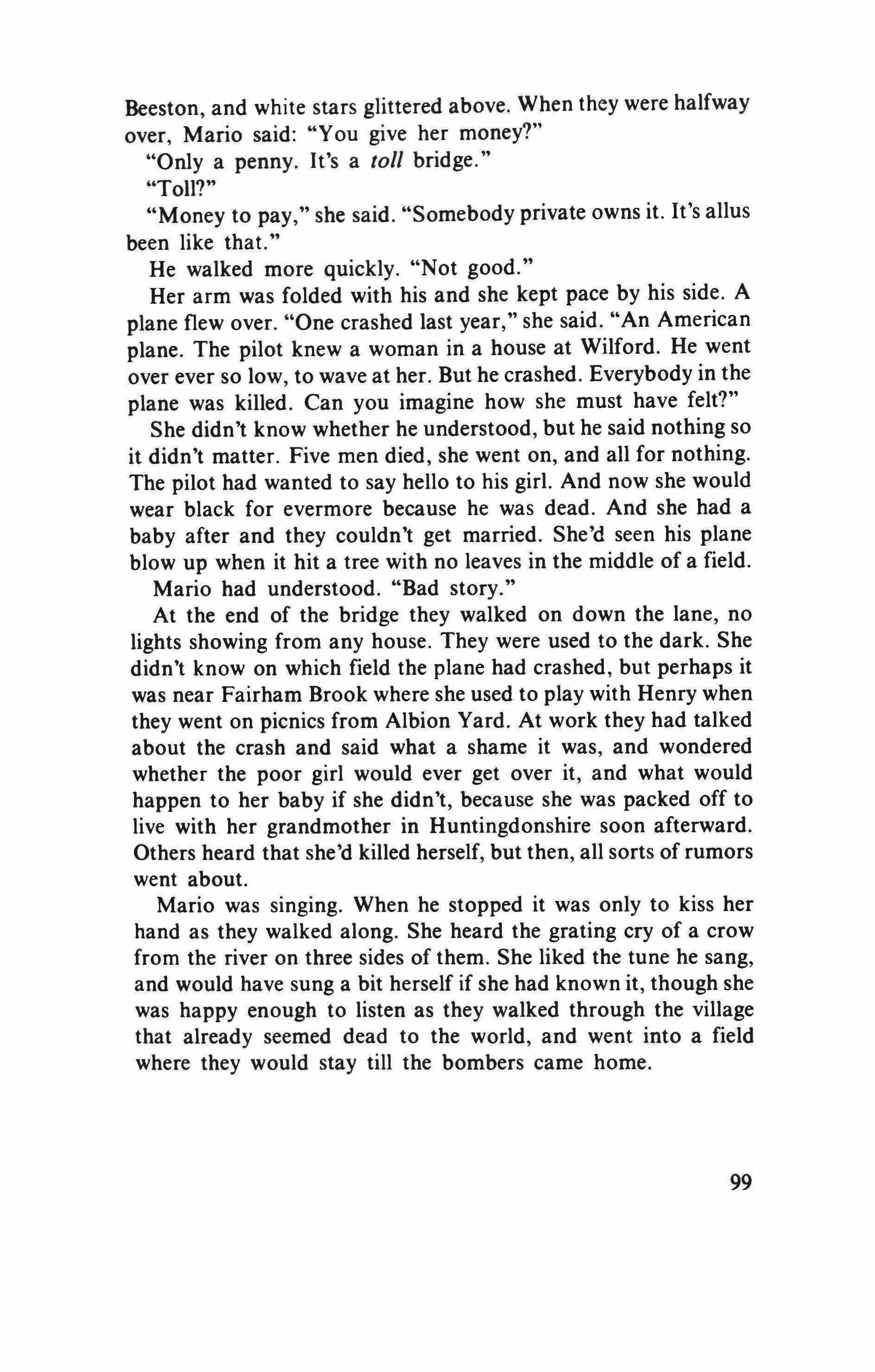
Beeston, and white stars glittered above. When they were halfway over, Mario said: "You give her money?"
"Only a penny. It's a toll bridge."
"Toll?"
"Money to pay," she said. "Somebody private owns it. It's allus been like that."
He walked more quickly. "Not good."
Her arm was folded with his and she kept pace by his side. A plane flew over. "One crashed last year," she said. "An American plane. The pilot knew a woman in a house at Wilford. He went over ever so low, to wave at her. But he crashed. Everybody in the plane was killed. Can you imagine how she must have felt?"
She didn't know whether he understood, but he said nothing so it didn't matter. Five men died, she went on, and all for nothing. The pilot had wanted to say hello to his girl. And now she would wear black for evermore because he was dead. And she had a baby after and they couldn't get married. She'd seen his plane blow up when it hit a tree with no leaves in the middle of a field.
Mario had understood. "Bad story."
At the end of the bridge they walked on down the lane, no lights showing from any house. They were used to the dark. She didn't know on which field the plane had crashed, but perhaps it was near Fairham Brook where she used to play with Henry when they went on picnics from Albion Yard. At work they had talked about the crash and said what a shame it was, and wondered whether the poor girl would ever get over it, and what would happen to her baby if she didn't, because she was packed off to live with her grandmother in Huntingdonshire soon afterward. Others heard that she'd killed herself, but then, all sorts of rumors went about.
Mario was singing. When he stopped it was only to kiss her hand as they walked along. She heard the grating cry of a crow from the river on three sides of them. She liked the tune he sang, and would have sung a bit herself if she had known it, though she was happy enough to listen as they walked through the village that already seemed dead to the world, and went into a field where they would stay till the bombers came home.
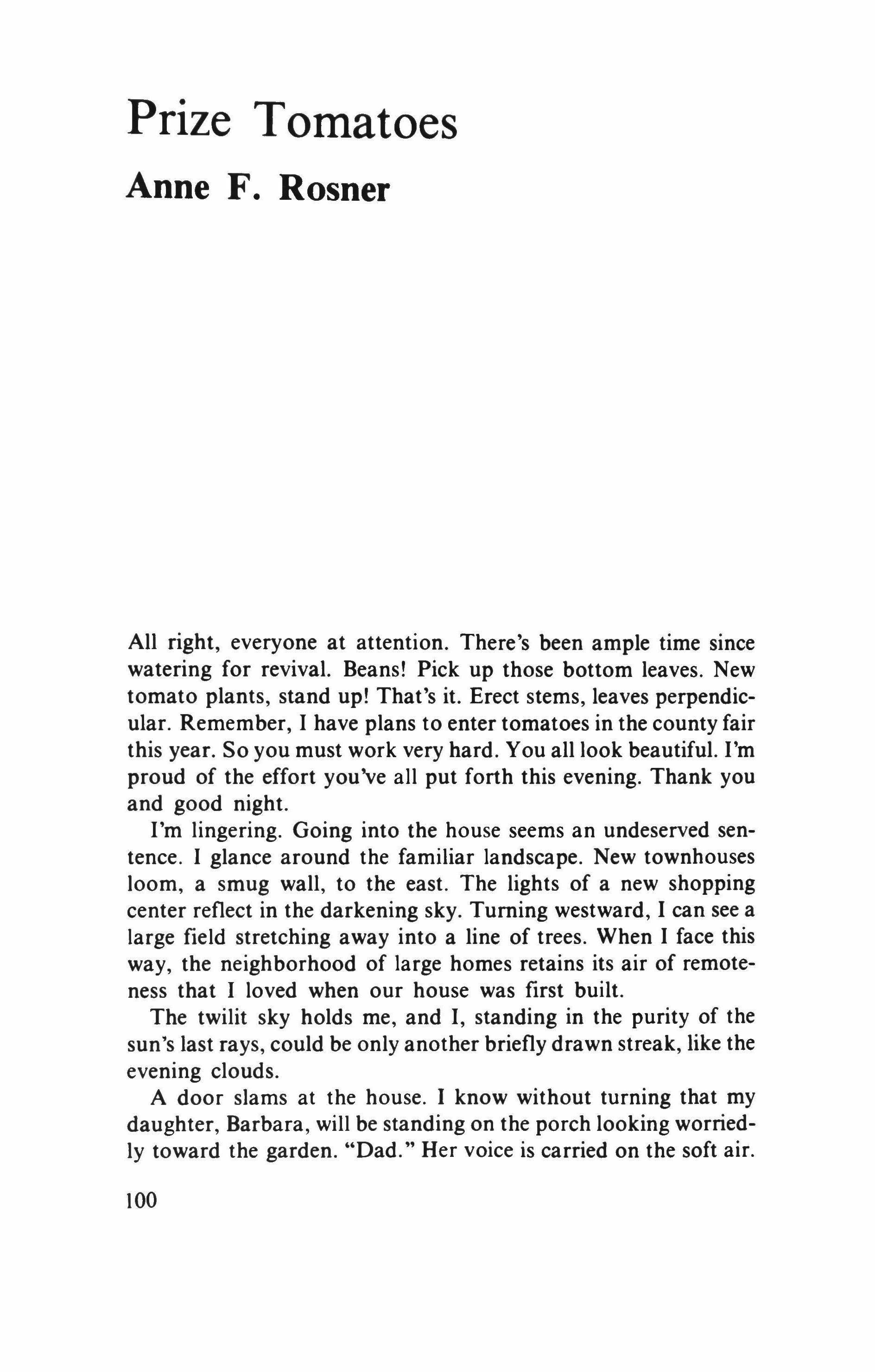
All right, everyone at attention. There's been ample time since watering for revival. Beans! Pick up those bottom leaves. New tomato plants, stand up! That's it. Erect stems, leaves perpendicular. Remember, I have plans to enter tomatoes in the county fair this year. So you must work very hard. You all look beautiful. I'm proud of the effort you've all put forth this evening. Thank you and good night.
I'm lingering. Going into the house seems an undeserved sentence. I glance around the familiar landscape. New townhouses loom, a smug wall, to the east. The lights of a new shopping center reflect in the darkening sky. Turning westward, I can see a large field stretching away into a line of trees. When I face this way, the neighborhood of large homes retains its air of remoteness that I loved when our house was first built.
The twilit sky holds me, and I, standing in the purity of the sun's last rays, could be only another briefly drawn streak, like the evening clouds.
A door slams at the house. I know without turning that my daughter, Barbara, will be standing on the porch looking worriedly toward the garden. "Dad." Her voice is carried on the soft air.
100

I wave, smiling a smile she can't see from the porch. But this casual smile prepares me to walk to the house. Light, light step. Easy, loose gait. The picture of a man returning from engaging in a modest interest. She'll wait, my sentinel daughter, until she sees that I'm going into the house.
Barbara, her husband, Dick, and their two children had been contemplating a move when I went into the hospital three years ago. It was decided that it would work out well for everyone if she and her family moved into my house when I came home from the hospital. Shaky and acutely mindful of the emptiness of the big house, I had not resisted, had indeed been grateful for the arrangement.
I approach the porch. Barbara says, "It's getting dark. I was afraid you might get chilled."
"Yes," I agree, "I think I will get a sweater."
An anxious flash across her eyes. "You're going to come back from your room, aren't you, Dad?" she asks. "There's a very good play on television tonight. I thought we could all watch it."
Dr. Hooper, the psychiatrist, has told her that I'm not to spend too much time alone.
"That sounds great," I say. "111 just get the sweater and be back out.
Barbara retreats to the living room. I enter my bedroom, sighing in resignation because 111 have to postpone looking through the new seed catalogue that came in the mail today until everyone is in bed. Although Dr. Hooper has released me from his care, he and his advice hang about the house like iron-willed specters.
The children are both out for the evening. Dick, Barbara, and I settle into our tacitly appointed places before the television. The play proves to be avant-garde, hard to follow. My mind wanders. I think about the cabbage again. Just the under-leaves seem a bit ragged. I remind myself to question Mr. Miggs about a possible culprit. Not cabbage worms, I know, because those are easy to see. Maybe-.
"Dad, did you notice the way these sets have been designed for the scene changes? Isn't that clever?"
I start. No need to panic. Calm, cool. Maybejust a nod will do. I nod. She buys it. I try again to concentrate on the show. Lucky Dick has fallen asleep, unnoticed. God, I'm weary of Barbara's concern.
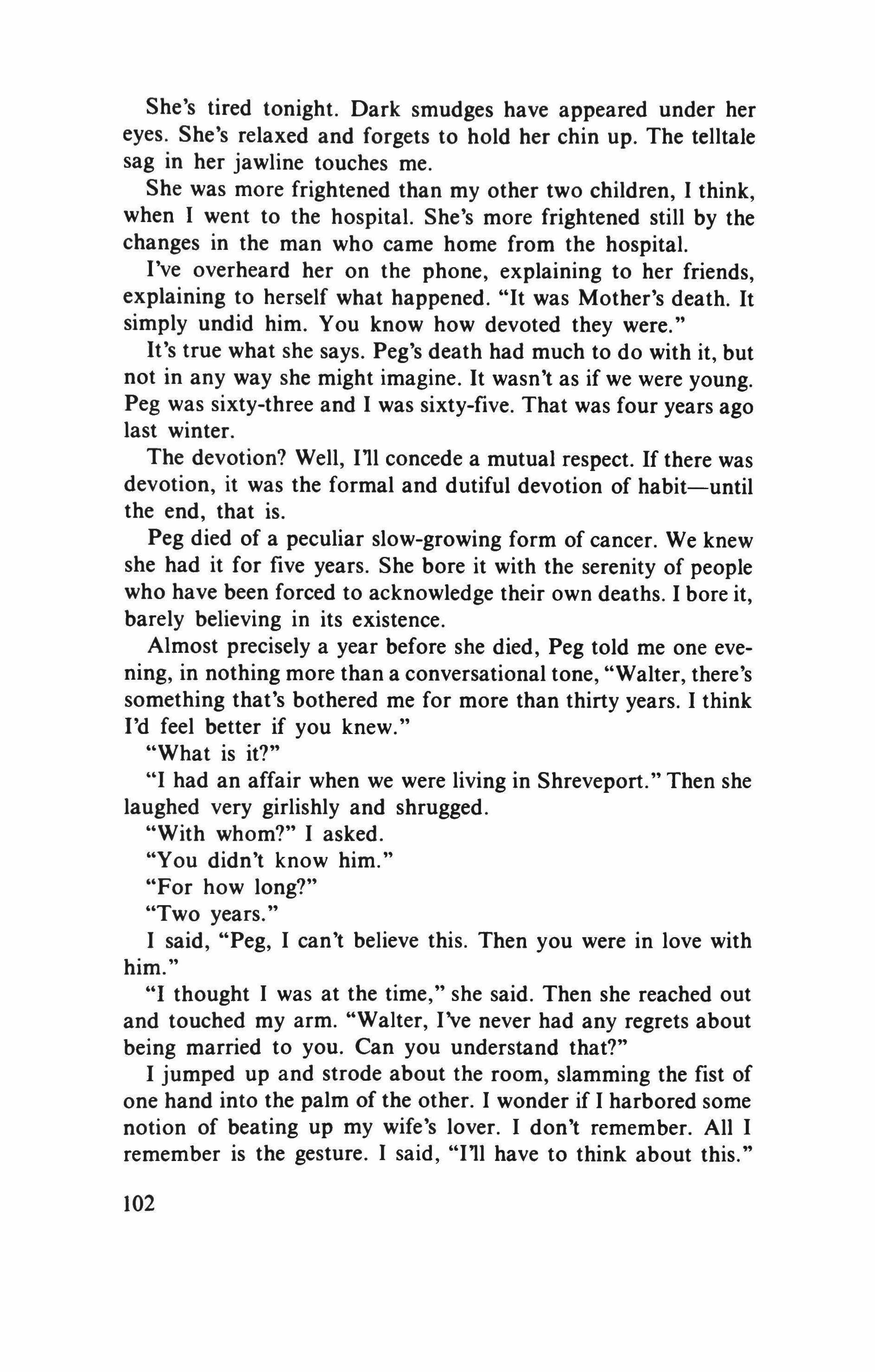
She's tired tonight. Dark smudges have appeared under her eyes. She's relaxed and forgets to hold her chin up. The telltale sag in her jawline touches me.
She was more frightened than my other two children, I think, when I went to the hospital. She's more frightened still by the changes in the man who came home from the hospital.
I've overheard her on the phone, explaining to her friends, explaining to herself what happened. "It was Mother's death. It simply undid him. You know how devoted they were."
It's true what she says. Peg's death had much to do with it, but not in any way she might imagine. It wasn't as if we were young. Peg was sixty-three and I was sixty-five. That was four years ago last winter.
The devotion? Well, 111 concede a mutual respect. If there was devotion, it was the formal and dutiful devotion of habit-until the end, that is.
Peg died of a peculiar slow-growing form of cancer. We knew she had it for five years. She bore it with the serenity of people who have been forced to acknowledge their own deaths. I bore it, barely believing in its existence.
Almost precisely a year before she died, Peg told me one evening, in nothing more than a conversational tone, "Walter, there's something that's bothered me for more than thirty years. I think I'd feel better if you knew."
"What is it?"
"I had an affair when we were living in Shreveport." Then she laughed very girlishly and shrugged.
"With whom?" I asked.
"You didn't know him."
"For how long?"
"Two years."
I said, "Peg, I can't believe this. Then you were in love with him."
"I thought I was at the time," she said. Then she reached out and touched my arm. "Walter, I've never had any regrets about being married to you. Can you understand that?"
I jumped up and strode about the room, slamming the fist of one hand into the palm of the other. I wonder if I harbored some notion of beating up my wife's lover. I don't remember. All I remember is the gesture. I said, "111 have to think about this."
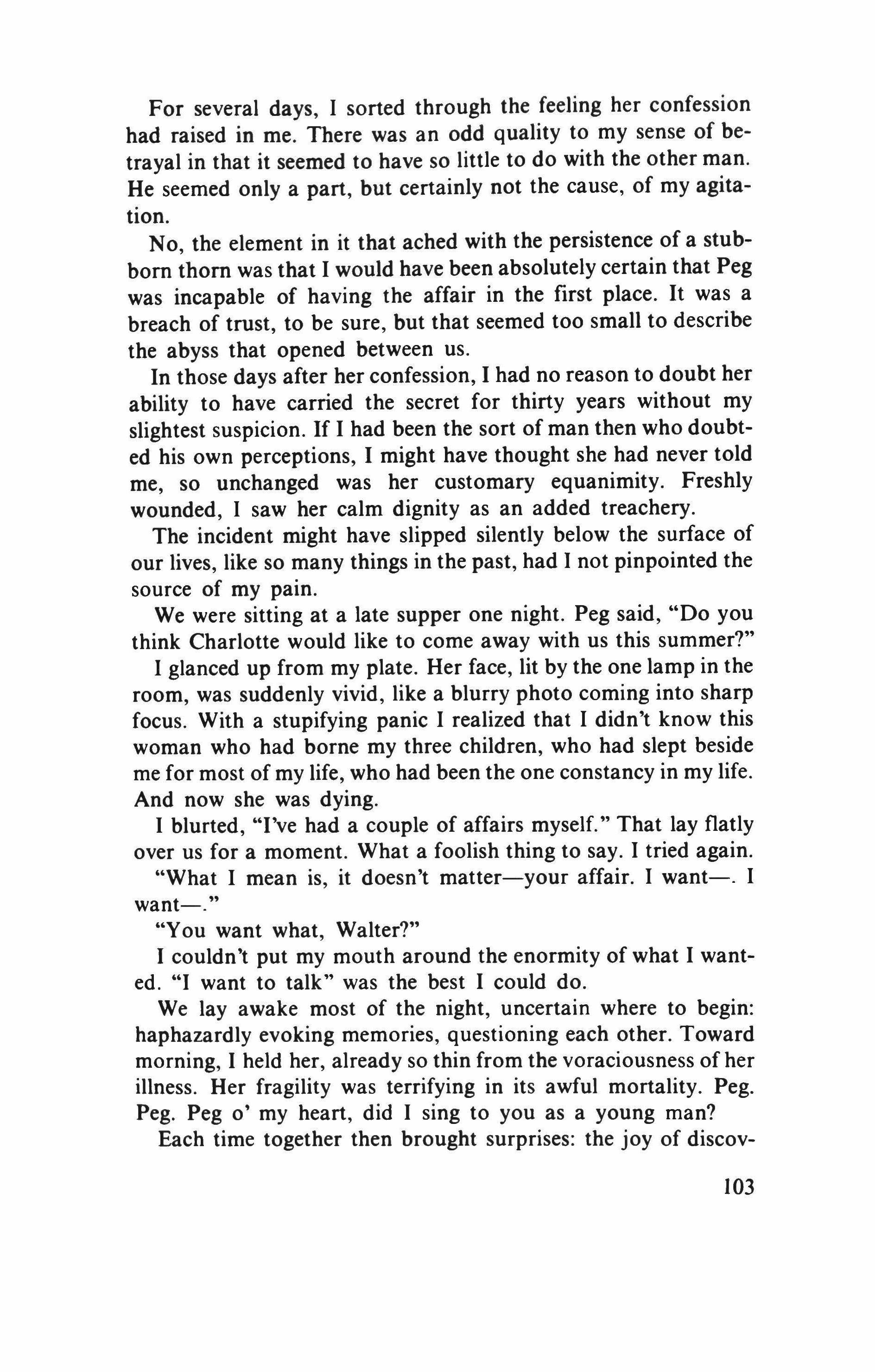
For several days, I sorted through the feeling her confession had raised in me. There was an odd quality to my sense of betrayal in that it seemed to have so little to do with the other man. He seemed only a part, but certainly not the cause, of my agitation.
No, the element in it that ached with the persistence of a stubborn thorn was that I would have been absolutely certain that Peg was incapable of having the affair in the first place. It was a breach of trust, to be sure, but that seemed too small to describe the abyss that opened between us.
In those days after her confession, I had no reason to doubt her ability to have carried the secret for thirty years without my slightest suspicion. If I had been the sort of man then who doubted his own perceptions, I might have thought she had never told me, so unchanged was her customary equanimity. Freshly wounded, I saw her calm dignity as an added treachery.
The incident might have slipped silently below the surface of our lives, like so many things in the past, had 1 not pinpointed the source of my pain.
We were sitting at a late supper one night. Peg said, "Do you think Charlotte would like to come away with us this summer?"
1 glanced up from my plate. Her face, lit by the one lamp in the room, was suddenly vivid, like a blurry photo coming into sharp focus. With a stupifying panic 1 realized that 1 didn't know this woman who had borne my three children, who had slept beside me for most of my life, who had been the one constancy in my life. And now she was dying.
1 blurted, "I've had a couple of affairs myself." That lay flatly over us for a moment. What a foolish thing to say. 1 tried again. "What I mean is, it doesn't matter-your affair. 1 want-. 1 want-."
"You want what, Walter?"
I couldn't put my mouth around the enormity of what 1 wanted. "I want to talk" was the best 1 could do.
We lay awake most of the night, uncertain where to begin: haphazardly evoking memories, questioning each other. Toward morning, 1 held her, already so thin from the voraciousness of her illness. Her fragility was terrifying in its awful mortality. Peg. Peg. Peg 0' my heart, did 1 sing to you as a young man? Each time together then brought surprises: the joy of discov-
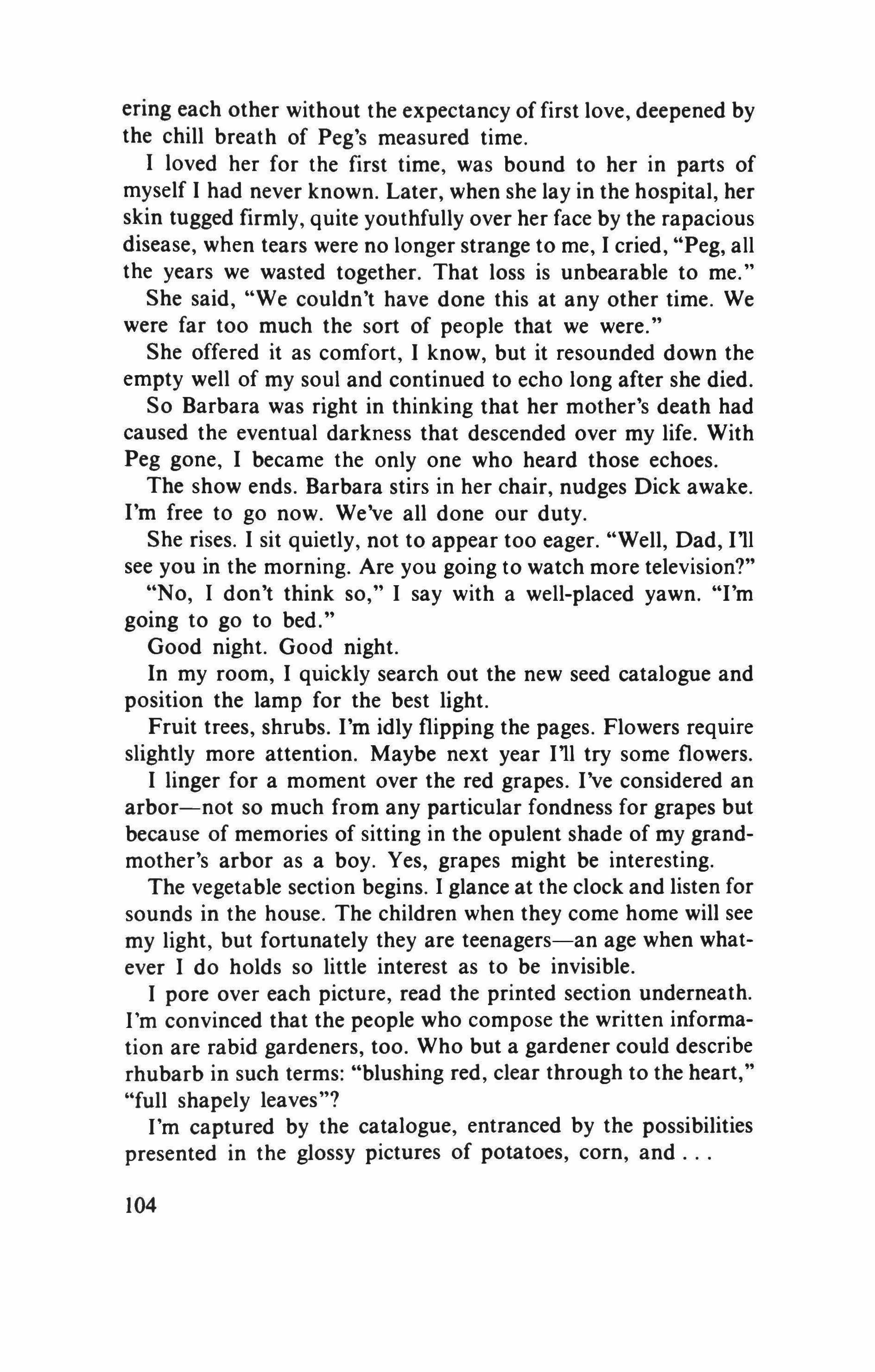
ering each other without the expectancy of first love, deepened by the chill breath of Peg's measured time.
I loved her for the first time, was bound to her in parts of myself I had never known. Later, when she lay in the hospital, her skin tugged firmly, quite youthfully over her face by the rapacious disease, when tears were no longer strange to me, I cried, "Peg, all the years we wasted together. That loss is unbearable to me."
She said, "We couldn't have done this at any other time. We were far too much the sort of people that we were."
She offered it as comfort, I know, but it resounded down the empty well of my soul and continued to echo long after she died.
So Barbara was right in thinking that her mother's death had caused the eventual darkness that descended over my life. With Peg gone, I became the only one who heard those echoes.
The show ends. Barbara stirs in her chair, nudges Dick awake. I'm free to go now. We've all done our duty.
She rises. I sit quietly, not to appear too eager. "Well, Dad, I'll see you in the morning. Are you going to watch more television?"
"No, I don't think so," I say with a well-placed yawn. "I'm going to go to bed."
Good night. Good night.
In my room, I quickly search out the new seed catalogue and position the lamp for the best light.
Fruit trees, shrubs. I'm idly flipping the pages. Flowers require slightly more attention. Maybe next year I'll try some flowers.
I linger for a moment over the red grapes. I've considered an arbor-not so much from any particular fondness for grapes but because of memories of sitting in the opulent shade of my grandmother's arbor as a boy. Yes, grapes might be interesting.
The vegetable section begins. I glance at the clock and listen for sounds in the house. The children when they come home will see my light, but fortunately they are teenagers-an age when whatever I do holds so little interest as to be invisible.
I pore over each picture, read the printed section underneath. I'm convinced that the people who compose the written information are rabid gardeners, too. Who but a gardener could describe rhubarb in such terms: "blushing red, clear through to the heart," "full shapely leaves"?
I'm captured by the catalogue, entranced by the possibilities presented in the glossy pictures of potatoes, corn, and
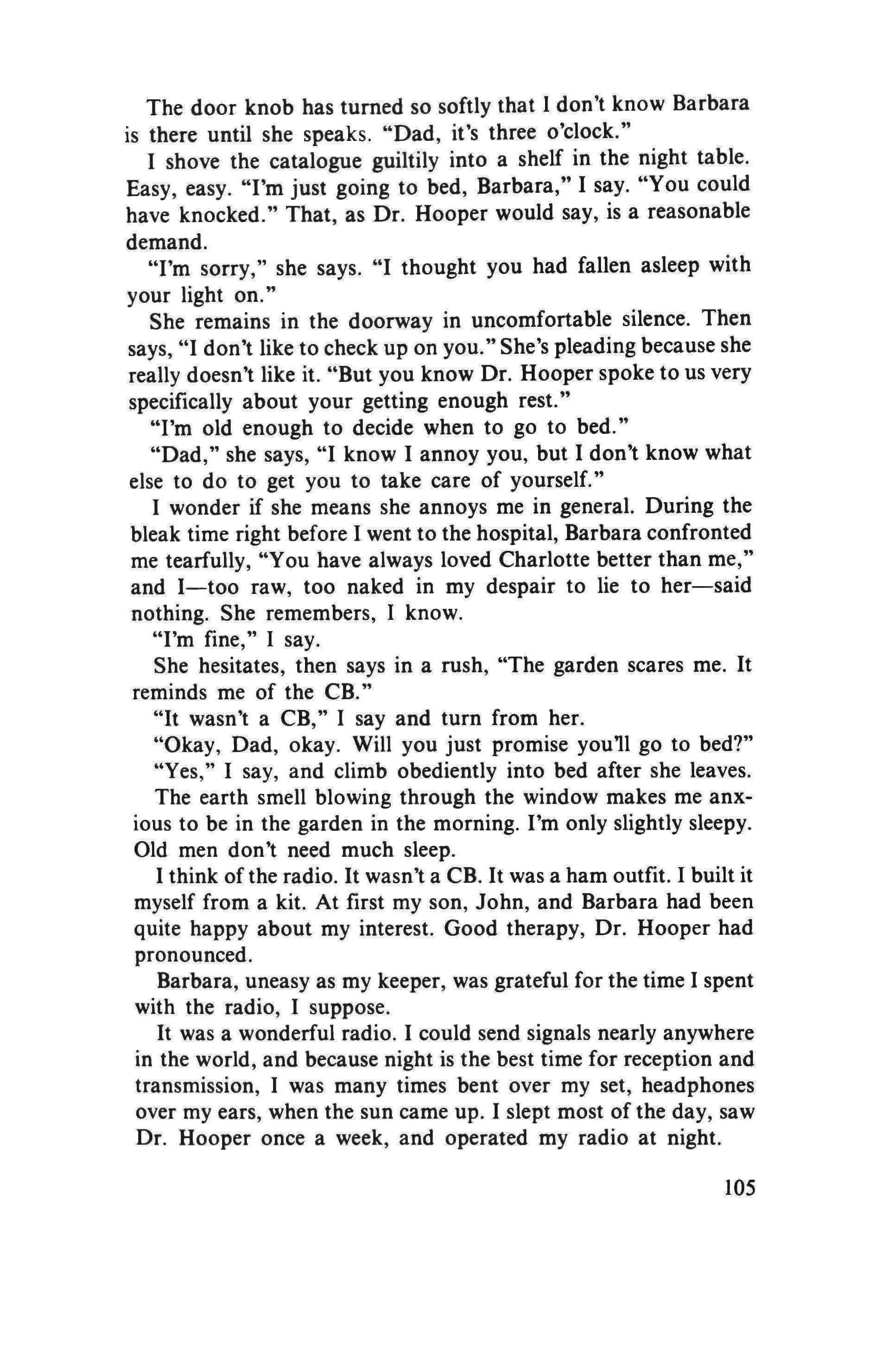
The door knob has turned so softly that I don't know Barbara is there until she speaks. "Dad, it's three o'clock."
1 shove the catalogue guiltily into a shelf in the night table. Easy, easy. "I'm just going to bed, Barbara," 1 say. "You could have knocked." That, as Dr. Hooper would say, is a reasonable demand.
"I'm sorry," she says. "I thought you had fallen asleep with your light on."
She remains in the doorway in uncomfortable silence. Then says, "I don't like to check up on you." She's pleading because she really doesn't like it. "But you know Dr. Hooper spoke to us very specifically about your getting enough rest."
"I'm old enough to decide when to go to bed."
"Dad," she says, "I know 1 annoy you, but 1 don't know what else to do to get you to take care of yourself."
1 wonder if she means she annoys me in general. During the bleak time right before 1 went to the hospital, Barbara confronted me tearfully, "You have always loved Charlotte better than me," and I-too raw, too naked in my despair to lie to her-said nothing. She remembers, 1 know.
"I'm fine," 1 say.
She hesitates, then says in a rush, "The garden scares me. It reminds me of the CB."
"It wasn't a CB," 1 say and tum from her.
"Okay, Dad, okay. Will you just promise you'll go to bed?"
"Yes," 1 say, and climb obediently into bed after she leaves.
The earth smell blowing through the window makes me anxious to be in the garden in the morning. I'm only slightly sleepy. Old men don't need much sleep.
I think ofthe radio. It wasn't a CB. It was a ham outfit. 1 built it myself from a kit. At first my son, John, and Barbara had been quite happy about my interest. Good therapy, Dr. Hooper had pronounced.
Barbara, uneasy as my keeper, was grateful for the time I spent with the radio, I suppose.
It was a wonderful radio. 1 could send signals nearly anywhere in the world, and because night is the best time for reception and transmission, I was many times bent over my set, headphones over my ears, when the sun came up. I slept most of the day, saw Dr. Hooper once a week, and operated my radio at night.
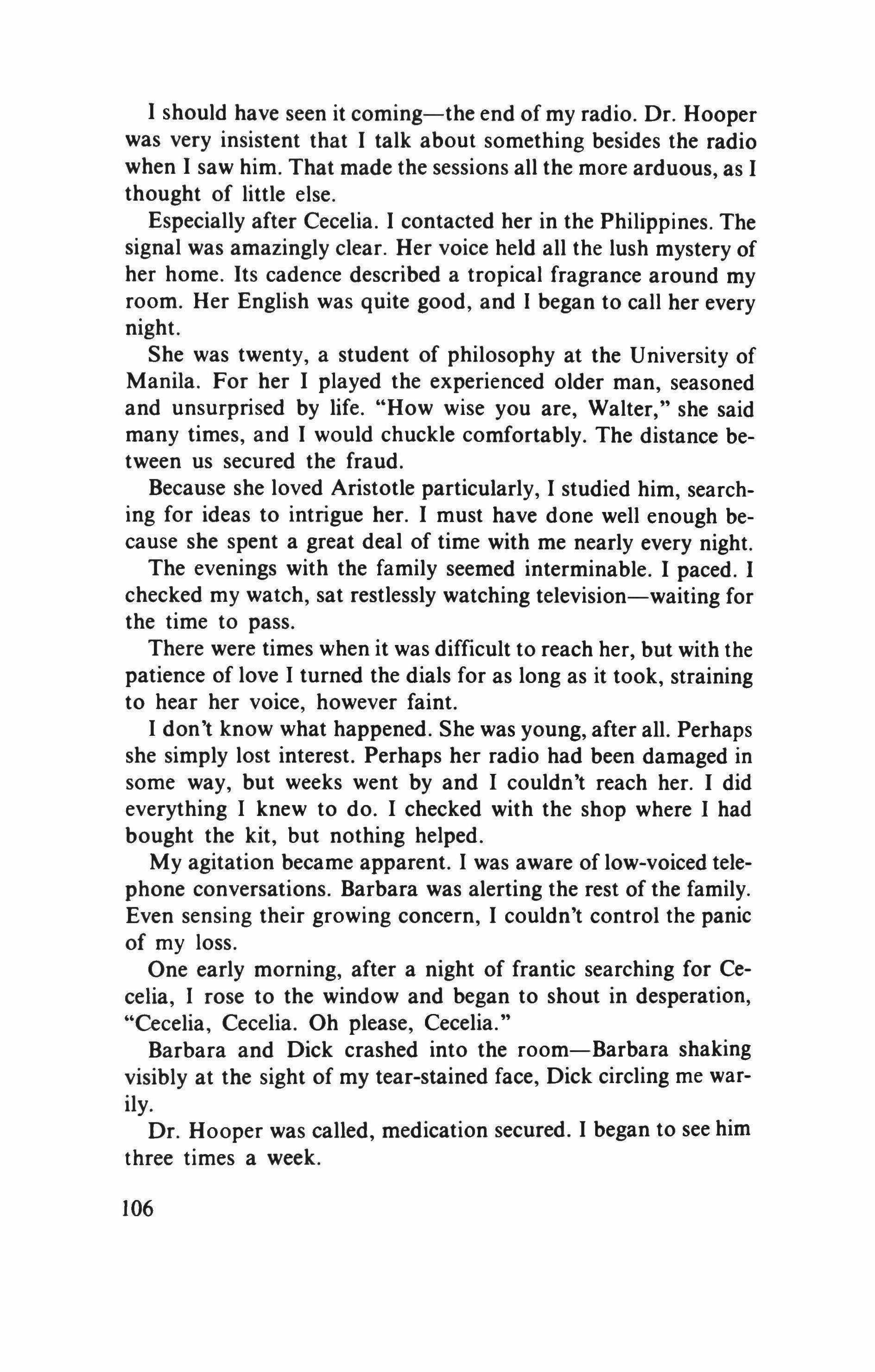
I should have seen it coming-the end of my radio. Dr. Hooper was very insistent that I talk about something besides the radio when I saw him. That made the sessions all the more arduous, as I thought of little else.
Especially after Cecelia. I contacted her in the Philippines. The signal was amazingly clear. Her voice held all the lush mystery of her home. Its cadence described a tropical fragrance around my room. Her English was quite good, and I began to call her every night.
She was twenty, a student of philosophy at the University of Manila. For her I played the experienced older man, seasoned and unsurprised by life. "How wise you are, Walter," she said many times, and I would chuckle comfortably. The distance between us secured the fraud.
Because she loved Aristotle particularly, I studied him, searching for ideas to intrigue her. I must have done well enough because she spent a great deal of time with me nearly every night.
The evenings with the family seemed interminable. I paced. I checked my watch, sat restlessly watching television-waiting for the time to pass.
There were times when it was difficult to reach her, but with the patience of love I turned the dials for as long as it took, straining to hear her voice, however faint.
I don't know what happened. She was young, after all. Perhaps she simply lost interest. Perhaps her radio had been damaged in some way, but weeks went by and I couldn't reach her. I did everything I knew to do. I checked with the shop where I had bought the kit, but nothing helped.
My agitation became apparent. I was aware of low-voiced telephone conversations. Barbara was alerting the rest of the family. Even sensing their growing concern, I couldn't control the panic of my loss.
One early morning, after a night of frantic searching for Cecelia, I rose to the window and began to shout in desperation, "Cecelia, Cecelia. Oh please, Cecelia."
Barbara and Dick crashed into the room- Barbara shaking visibly at the sight of my tear-stained face, Dick circling me warily.
Dr. Hooper was called, medication secured. I began to see him three times a week.

I disliked going to see Dr. Hooper. In fact, I probably dislike Dr. Hooper. He has a sharp nose that points downward, seeming always to be calling attention to his shoes. He is a hard-faced man who makes much of small things. As though seeing him three times a week weren't punishment enough for alarming my family, he neatly disposed of my radio as well.
"Walter, you must see what this radio has meant to you," he said. "Your need for communication was served without your having to risk any real intimacy. This is why it became such an obsession. Because you need the communication.
"I think, and I have told your family the same thing, that it's fine for you to enjoy the radio, but you must put it into balance with the rest of your life."
But I didn't enjoy the radio any more. I had seen the radio as a great benevolent spider spinning a shining web over the world at the touch of my fingers. After Dr. Hooper, it became only a perverse instrument of a crazy old man. It gathered dust in my room until my grandson dismantled it for parts.
At last, I'm sleepy. Ah, Cecelia, why did you leave me?
Barbara and Dick are off to work, the children still sleeping. In the garden the lettuce holds the dew in its fluted depths. Last year tiny black insects riddled the leaves with holes. Mr. Miggs suggested planting radishes in their rows "to draw them devils off the lettuce." This year the leaves are unblemished and the little bugs reside, apparently oblivious to the lettuce, on the tough, useless radish leaves.
I kneel, carefully sliding my fingers along the stem of a weed that has grown hidden within the lettuce leaves, then shoved its imprudent head above them. It crows there among the cultivated plants. I place my fingers as close to the ground as possible. Otherwise the stem will break off from the root and the weed will put out another shoot within days. Broken off at the ground, weeds enlarge in the root to return tougher than ever. I must pull up the entire root.
I give a light tug. It remains fixed. I exert more pressure. The root begins to give. Rolling my wrist, I give it a final yank. Too hard. It comes out, the stem broken. You son of a bitch, 111 get you. I thrust my hand into the lettuce, gently pushing the leaves aside, and see the end of the weed. It has broken right at the

ground. I dig with my fingers around the shaft, losing a lettuce leaf in the process. All right, now I'm angry. I'm going to get you if I have to stay out here all day. With only my fingertips, I get a sturdy hold and pull. Hah! there you are. That's the end of you.
Inspection, inspection everybody. Corn, you have a goalknee-high by the Fourth of July. Kale, recovering nicely from an insect attack. And my beauties, the tomatoes, are in flower, yellow blossoms dotting the dark green vines. I have such plans for you at the fair this year.
"Dad?"
I turn. My younger daughter, Charlotte, stands at the edge of the garden. She is the baby and the rebel of the family. I smile in welcome.
"You look so peaceful out here," she says. Her remark makes me love her very much.
"Hello, dear." I embrace her.
She has been dieting again. Her face is gaunt beneath a deep tan.
"Come on," I say, "111 get you a cup of coffee."
"No, no, you go on with what you've been doing."
She teases me-the only one of the three who dares to do that. "So what are you doing today, Farmer Brinkman?"
"I'm pea picking. I'm going to freeze them."
She seldom visits when Barbara is here. Their views of the world have been irreconcilable since childhood.
She sees where I'm going to work and sits down at the end of the row. Because the sun has risen in the sky, I roll my shirtsleeves up. The harsh sunlight shines on my arms; the scars on the inside of my wrists are as bright as lightning. Charlotte sees. She winces with an almost imperceptible shudder.
I'm told that Charlotte was the one who found me, lying on the blood-soaked bed. So much blood, they all agreed, and yet I didn't die.
I wanted to die. There was no fear when I slid the razor painlessly across my wrists-just a relief as though it made no difference whether that red flow emptied onto the crisp white sheets or remained encased in my veins.
I pull my gloves from my pocket, slip them on, adjust them over my wrists. Charlotte and I are relieved.
She talks of a recent trip to Bermuda she has made. I haven't
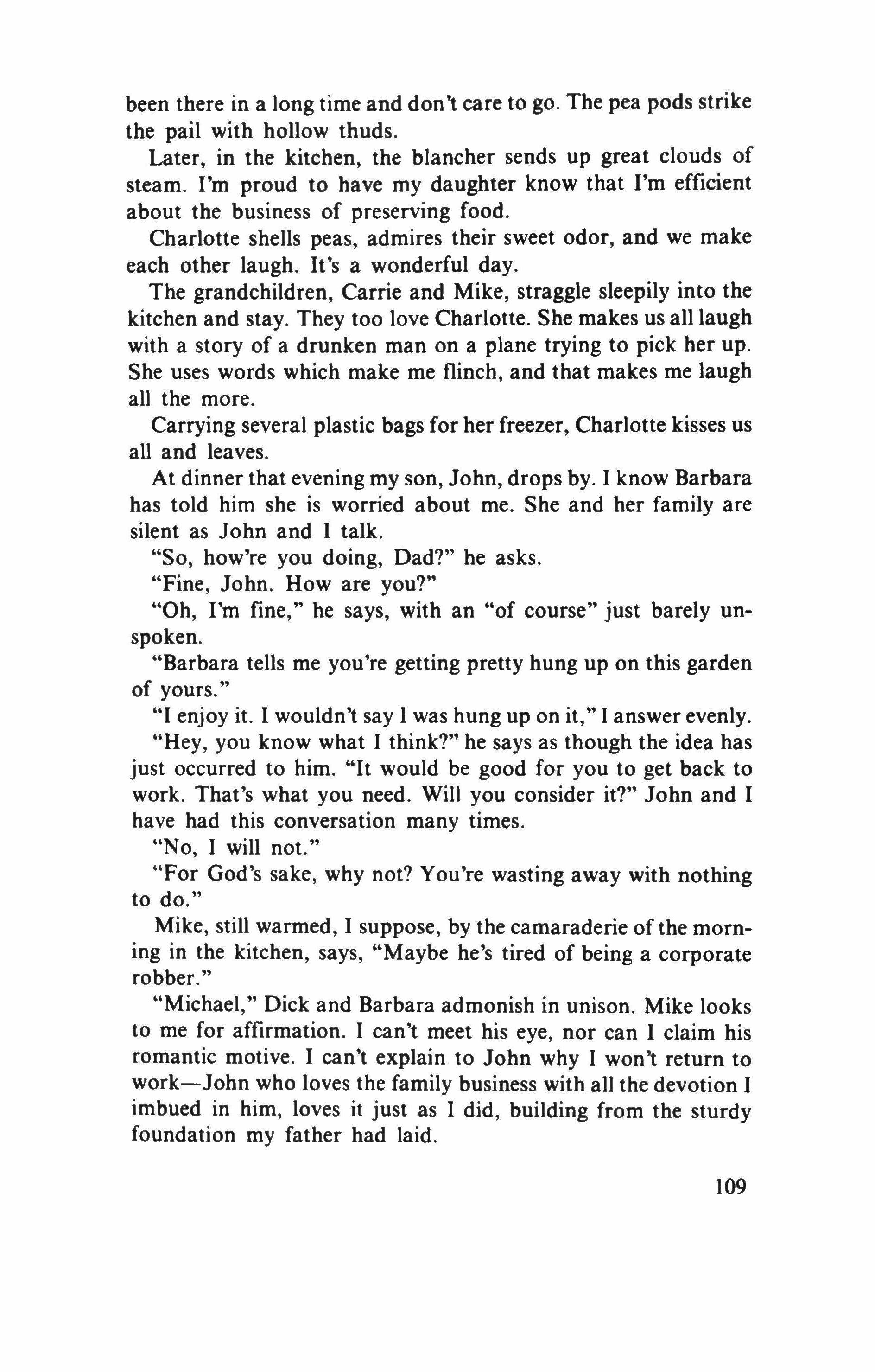
been there in a long time and don't care to go. The pea pods strike the pail with hollow thuds.
Later, in the kitchen, the blancher sends up great clouds of steam. I'm proud to have my daughter know that I'm efficient about the business of preserving food.
Charlotte shells peas, admires their sweet odor, and we make each other laugh. It's a wonderful day.
The grandchildren, Carrie and Mike, straggle sleepily into the kitchen and stay. They too love Charlotte. She makes us all laugh with a story of a drunken man on a plane trying to pick her up. She uses words which make me flinch, and that makes me laugh all the more.
Carrying several plastic bags for her freezer, Charlotte kisses us all and leaves.
At dinner that evening my son, John, drops by. I know Barbara has told him she is worried about me. She and her family are silent as John and I talk.
"So, how're you doing, Dad?" he asks.
"Fine, John. How are you?"
"Oh, I'm fine," he says, with an "of course" just barely unspoken.
"Barbara tells me you're getting pretty hung up on this garden of yours."
"I enjoy it. 1 wouldn't say I was hung up on it," I answer evenly.
"Hey, you know what I think?" he says as though the idea has just occurred to him. "It would be good for you to get back to work. That's what you need. Will you consider it?" John and 1 have had this conversation many times.
"N0, I will not."
"For God's sake, why not? You're wasting away with nothing to do."
Mike, still warmed, 1 suppose, by the camaraderie of the morning in the kitchen, says, "Maybe he's tired of being a corporate robber."
"Michael," Dick and Barbara admonish in unison. Mike looks to me for affirmation. I can't meet his eye, nor can 1 claim his romantic motive. 1 can't explain to John why I won't return to work-John who loves the family business with all the devotion 1 imbued in him, loves it just as I did, building from the sturdy foundation my father had laid.
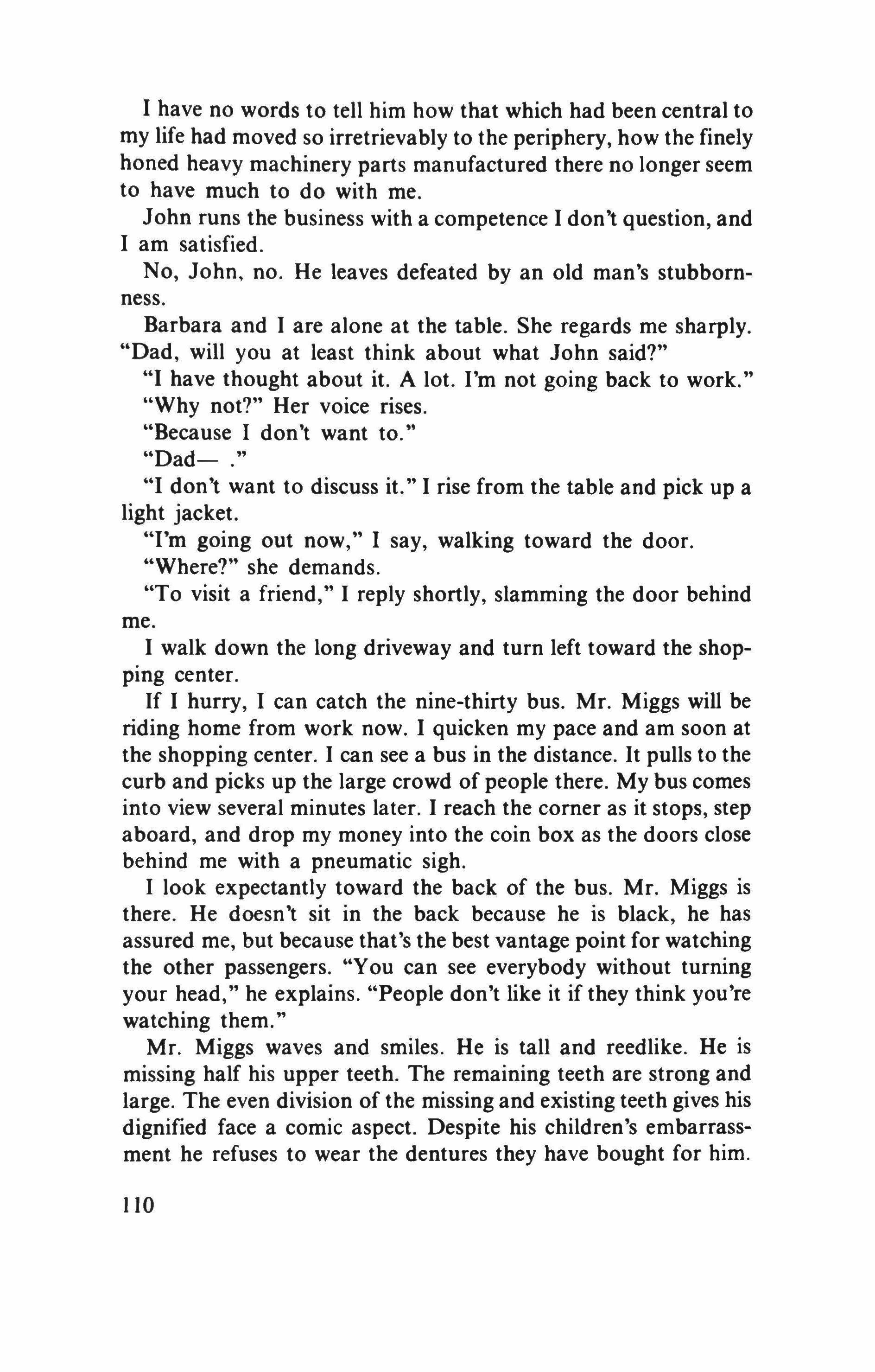
I have no words to tell him how that which had been central to my life had moved so irretrievably to the periphery, how the finely honed heavy machinery parts manufactured there no longer seem to have much to do with me.
John runs the business with a competence I don't question, and I am satisfied.
No, John, no. He leaves defeated by an old man's stubbornness.
Barbara and I are alone at the table. She regards me sharply. "Dad, will you at least think about what John said?"
"I have thought about it. A lot. I'm not going back to work."
"Why not?" Her voice rises.
"Because I don't want to."
"Dad- ."
"I don't want to discuss it." I rise from the table and pick up a light jacket.
"I'm going out now," I say, walking toward the door.
"Where?" she demands.
"To visit a friend," I reply shortly, slamming the door behind me.
I walk down the long driveway and turn left toward the shopping center.
If I hurry, I can catch the nine-thirty bus. Mr. Miggs will be riding home from work now. I quicken my pace and am soon at the shopping center. I can see a bus in the distance. It pulls to the curb and picks up the large crowd of people there. My bus comes into view several minutes later. I reach the corner as it stops, step aboard, and drop my money into the coin box as the doors close behind me with a pneumatic sigh.
I look expectantly toward the back of the bus. Mr. Miggs is there. He doesn't sit in the back because he is black, he has assured me, but because that's the best vantage point for watching the other passengers. "You can see everybody without turning your head," he explains. "People don't like it if they think you're watching them."
Mr. Miggs waves and smiles. He is tall and reedlike. He is missing half his upper teeth. The remaining teeth are strong and large. The even division of the missing and existing teeth gives his dignified face a comic aspect. Despite his children's embarrassment he refuses to wear the dentures they have bought for him.
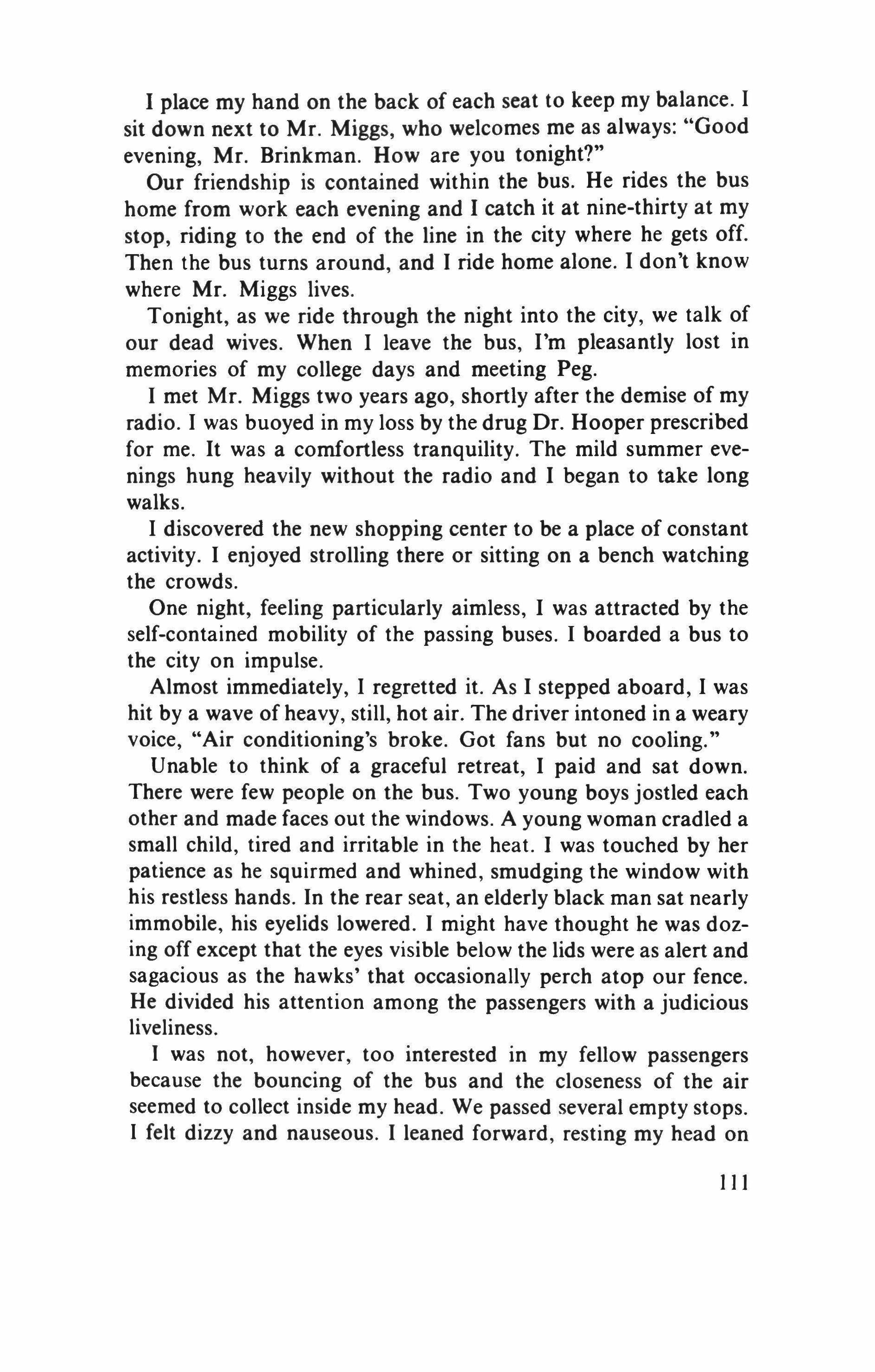
I place my hand on the back of each seat to keep my balance. I sit down next to Mr. Miggs, who welcomes me as always: "Good evening, Mr. Brinkman. How are you tonight?"
Our friendship is contained within the bus. He rides the bus home from work each evening and I catch it at nine-thirty at my stop, riding to the end of the line in the city where he gets off. Then the bus turns around, and I ride home alone. I don't know where Mr. Miggs lives.
Tonight, as we ride through the night into the city, we talk of our dead wives. When I leave the bus, I'm pleasantly lost in memories of my college days and meeting Peg.
I met Mr. Miggs two years ago, shortly after the demise of my radio. I was buoyed in my loss by the drug Dr. Hooper prescribed for me. It was a comfortless tranquility. The mild summer evenings hung heavily without the radio and I began to take long walks.
I discovered the new shopping center to be a place of constant activity. I enjoyed strolling there or sitting on a bench watching the crowds.
One night, feeling particularly aimless, I was attracted by the self-contained mobility of the passing buses. I boarded a bus to the city on impulse.
Almost immediately, I regretted it. As I stepped aboard, I was hit by a wave of heavy, still, hot air. The driver intoned in a weary voice, "Air conditioning's broke. Got fans but no cooling."
Unable to think of a graceful retreat, I paid and sat down. There were few people on the bus. Two young boys jostled each other and made faces out the windows. A young woman cradled a small child, tired and irritable in the heat. I was touched by her patience as he squirmed and whined, smudging the window with his restless hands. In the rear seat, an elderly black man sat nearly immobile, his eyelids lowered. I might have thought he was dozing off except that the eyes visible below the lids were as alert and sagacious as the hawks' that occasionally perch atop our fence. He divided his attention among the passengers with a judicious liveliness.
I was not, however, too interested in my fellow passengers because the bouncing of the bus and the closeness of the air seemed to collect inside my head. We passed several empty stops. I felt dizzy and nauseous. I leaned forward, resting my head on
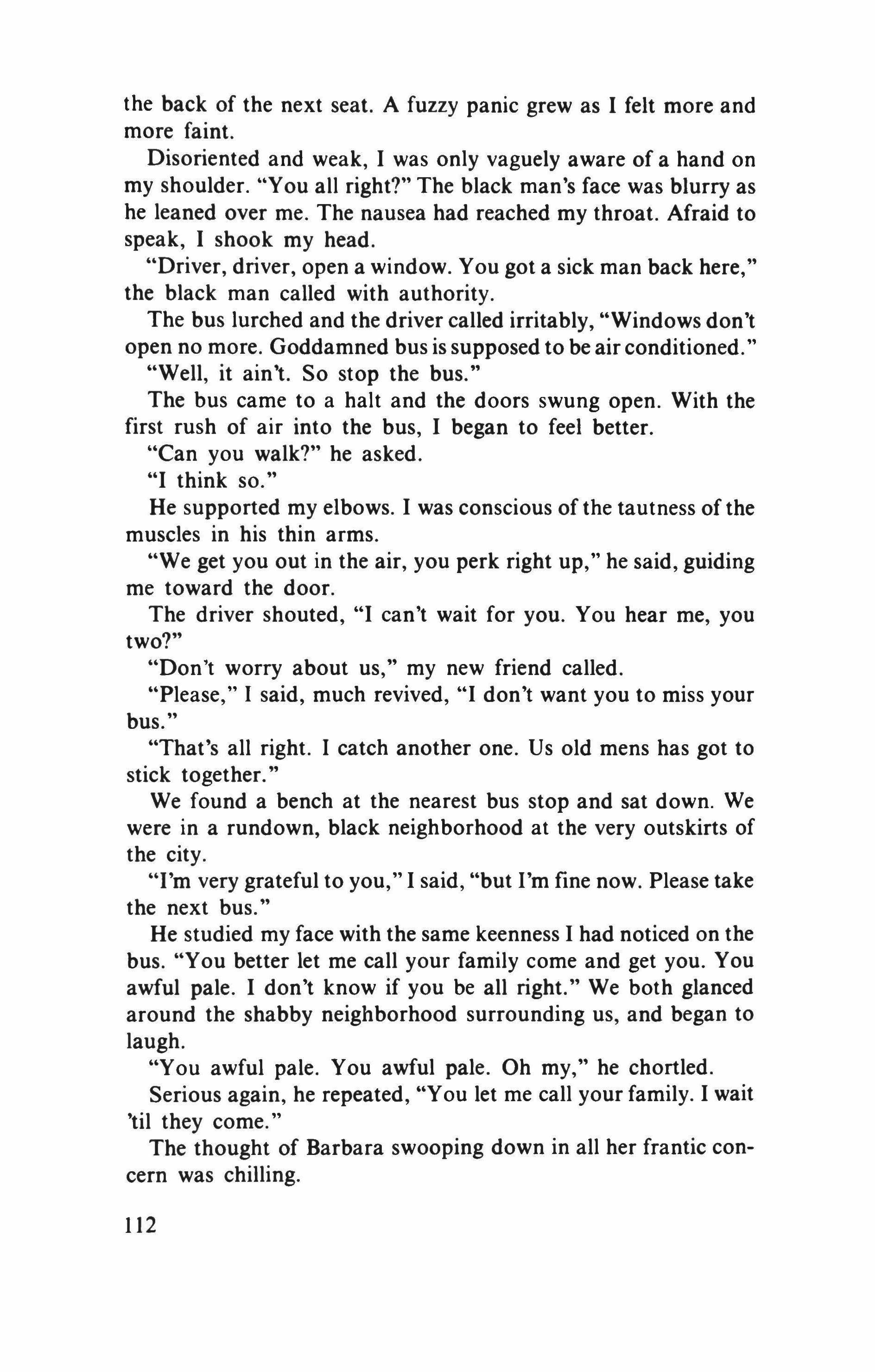
the back of the next seat. A fuzzy panic grew as 1 felt more and more faint.
Disoriented and weak, 1 was only vaguely aware of a hand on my shoulder. "You all right?" The black man's face was blurry as he leaned over me. The nausea had reached my throat. Afraid to speak, 1 shook my head.
"Driver, driver, open a window. You got a sick man back here," the black man called with authority.
The bus lurched and the driver called irritably, "Windows don't open no more. Goddamned bus is supposed to be air conditioned."
"Well, it ain't. So stop the bus."
The bus came to a halt and the doors swung open. With the first rush of air into the bus, 1 began to feel better.
"Can you walk?" he asked.
"I think so."
He supported my elbows. 1 was conscious of the tautness of the muscles in his thin arms.
"We get you out in the air, you perk right up," he said, guiding me toward the door.
The driver shouted, "I can't wait for you. You hear me, you two?"
"Don't worry about us," my new friend called.
"Please," 1 said, much revived, "I don't want you to miss your bus."
"That's all right. I catch another one. Us old mens has got to stick together."
We found a bench at the nearest bus stop and sat down. We were in a rundown, black neighborhood at the very outskirts of the city.
"I'm very grateful to you," I said, "but I'm fine now. Please take the next bus."
He studied my face with the same keenness 1 had noticed on the bus. "You better let me call your family come and get you. You awful pale. 1 don't know if you be all right." We both glanced around the shabby neighborhood surrounding us, and began to laugh.
"You awful pale. You awful pale. Oh my," he chortled.
Serious again, he repeated, "You let me call your family. I wait 'til they come."
The thought of Barbara swooping down in all her frantic concern was chilling.
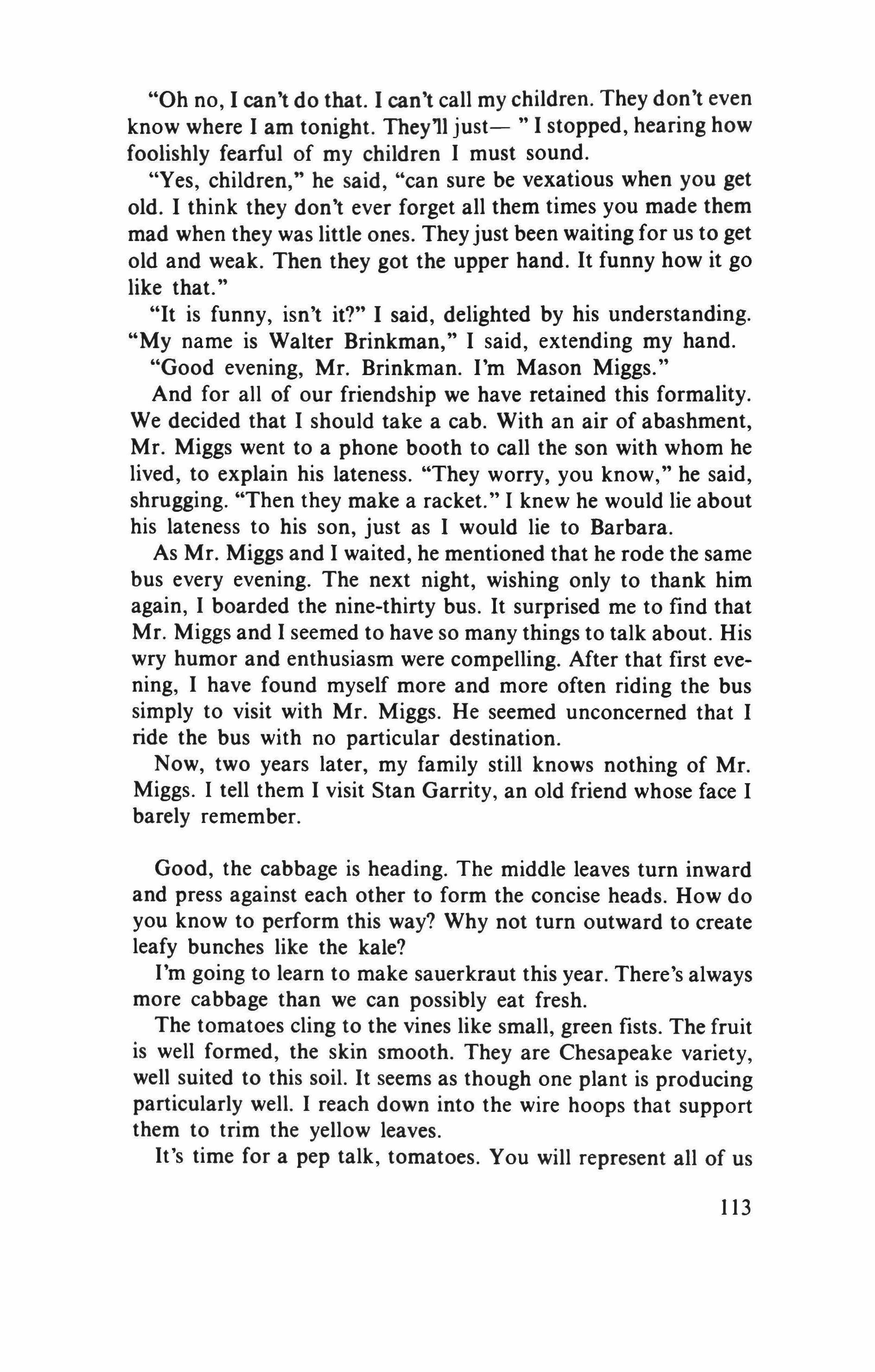
"Oh no, I can't do that. I can't call my children. They don't even know where I am tonight. They'll just- I stopped, hearing how foolishly fearful of my children I must sound.
"Yes, children," he said, "can sure be vexatious when you get old. I think they don't ever forget all them times you made them mad when they was little ones. Theyjust been waiting for us to get old and weak. Then they got the upper hand. It funny how it go like that."
"It is funny, isn't it?" I said, delighted by his understanding. "My name is Walter Brinkman," I said, extending my hand.
"Good evening, Mr. Brinkman. I'm Mason Miggs."
And for all of our friendship we have retained this formality. We decided that I should take a cab. With an air of abashment, Mr. Miggs went to a phone booth to call the son with whom he lived, to explain his lateness. "They worry, you know," he said, shrugging. "Then they make a racket." I knew he would lie about his lateness to his son, just as I would lie to Barbara.
As Mr. Miggs and I waited, he mentioned that he rode the same bus every evening. The next night, wishing only to thank him again, I boarded the nine-thirty bus. It surprised me to find that Mr. Miggs and I seemed to have so many things to talk about. His wry humor and enthusiasm were compelling. After that first evening, I have found myself more and more often riding the bus simply to visit with Mr. Miggs. He seemed unconcerned that I ride the bus with no particular destination.
Now, two years later, my family still knows nothing of Mr. Miggs. I tell them I visit Stan Garrity, an old friend whose face I barely remember.
Good, the cabbage is heading. The middle leaves turn inward and press against each other to form the concise heads. How do you know to perform this way? Why not turn outward to create leafy bunches like the kale?
I'm going to learn to make sauerkraut this year. There's always more cabbage than we can possibly eat fresh.
The tomatoes cling to the vines like small, green fists. The fruit is well formed, the skin smooth. They are Chesapeake variety, well suited to this soil. It seems as though one plant is producing particularly well. I reach down into the wire hoops that support them to trim the yellow leaves.
It's time for a pep talk, tomatoes. You will represent all of us
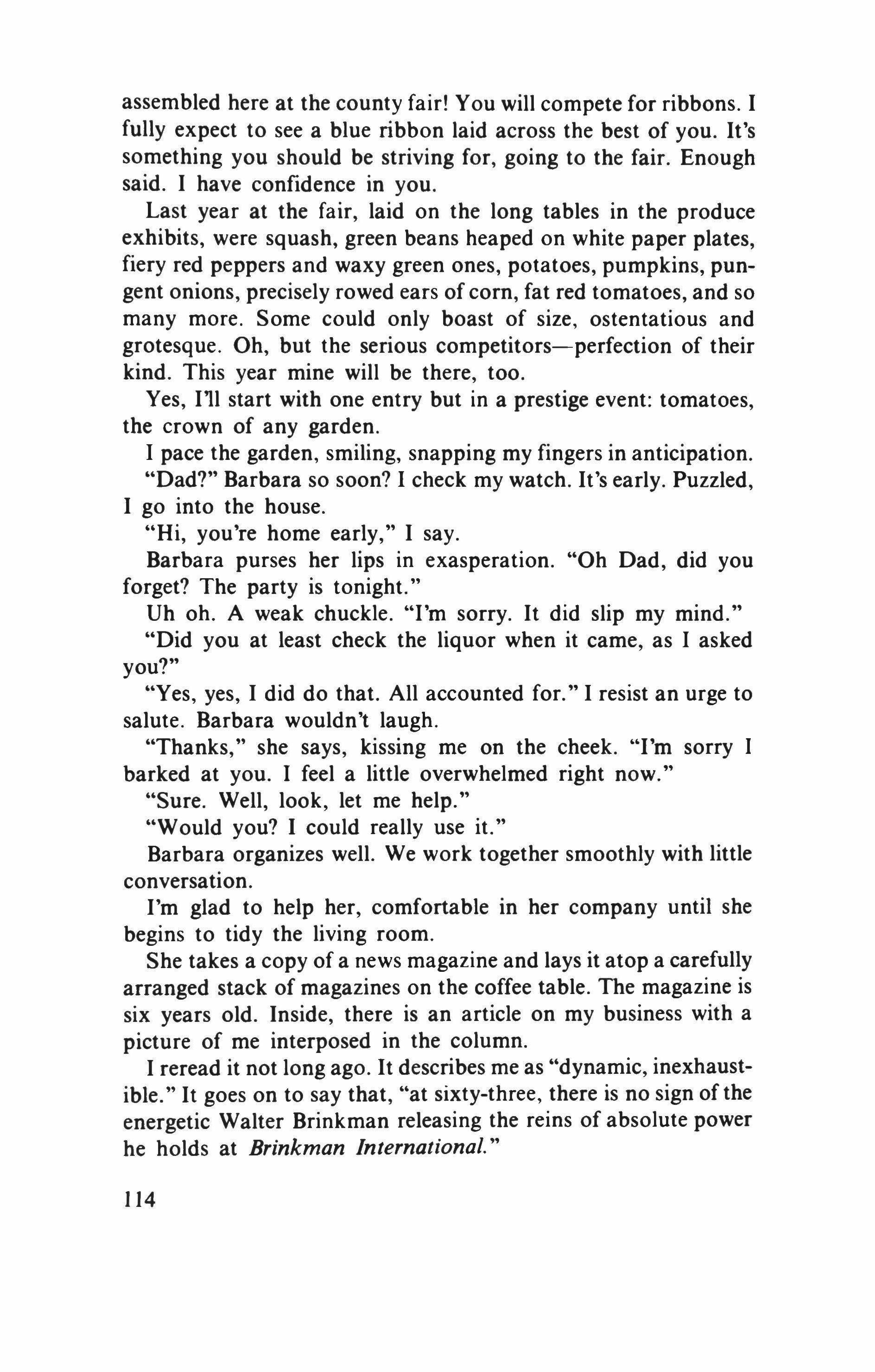
assembled here at the county fair! You will compete for ribbons. I fully expect to see a blue ribbon laid across the best of you. It's something you should be striving for, going to the fair. Enough said. I have confidence in you.
Last year at the fair, laid on the long tables in the produce exhibits, were squash, green beans heaped on white paper plates, fiery red peppers and waxy green ones, potatoes, pumpkins, pungent onions, precisely rowed ears of corn, fat red tomatoes, and so many more. Some could only boast of size, ostentatious and grotesque. Oh, but the serious competitors-perfection of their kind. This year mine will be there, too.
Yes, 111 start with one entry but in a prestige event: tomatoes, the crown of any garden.
I pace the garden, smiling, snapping my fingers in anticipation. "Dad?" Barbara so soon? I check my watch. It's early. Puzzled, I go into the house.
"Hi, you're home early," I say.
Barbara purses her lips in exasperation. "Oh Dad, did you forget? The party is tonight."
Uh oh. A weak chuckle. "I'm sorry. It did slip my mind."
"Did you at least check the liquor when it came, as I asked you?"
"Yes, yes, I did do that. All accounted for." I resist an urge to salute. Barbara wouldn't laugh.
"Thanks," she says, kissing me on the cheek. "I'm sorry barked at you. I feel a little overwhelmed right now."
"Sure. Well, look, let me help."
"Would you? I could really use it."
Barbara organizes well. We work together smoothly with little conversation.
I'm glad to help her, comfortable in her company until she begins to tidy the living room.
She takes a copy of a news magazine and lays it atop a carefully arranged stack of magazines on the coffee table. The magazine is six years old. Inside, there is an article on my business with a picture of me interposed in the column.
I reread it not long ago. It describes me as "dynamic, inexhaustible." It goes on to say that, "at sixty-three, there is no sign ofthe energetic Walter Brinkman releasing the reins of absolute power he holds at Brinkman International."
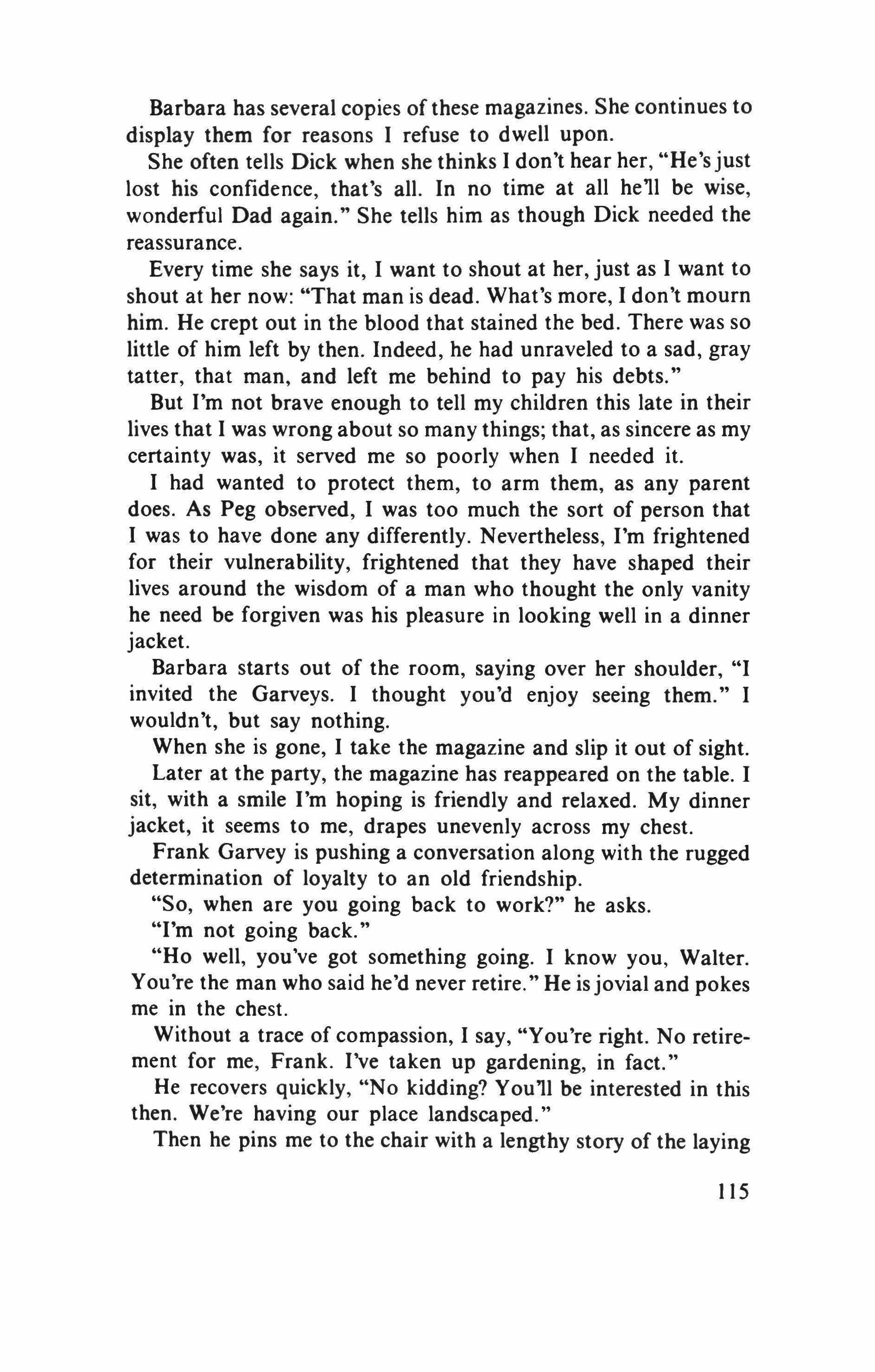
Barbara has several copies of these magazines. She continues to display them for reasons I refuse to dwell upon.
She often tells Dick when she thinks I don't hear her, "He's just lost his confidence, that's all. In no time at all he'll be wise, wonderful Dad again." She tells him as though Dick needed the reassurance.
Every time she says it, I want to shout at her, just as I want to shout at her now: "That man is dead. What's more, I don't mourn him. He crept out in the blood that stained the bed. There was so little of him left by then. Indeed, he had unraveled to a sad, gray tatter, that man, and left me behind to pay his debts."
But I'm not brave enough to tell my children this late in their lives that I was wrong about so many things; that, as sincere as my certainty was, it served me so poorly when I needed it.
I had wanted to protect them, to arm them, as any parent does. As Peg observed, I was too much the sort of person that I was to have done any differently. Nevertheless, I'm frightened for their vulnerability, frightened that they have shaped their lives around the wisdom of a man who thought the only vanity he need be forgiven was his pleasure in looking well in a dinner jacket.
Barbara starts out of the room, saying over her shoulder, "I invited the Garveys. I thought you'd enjoy seeing them." I wouldn't, but say nothing.
When she is gone, I take the magazine and slip it out of sight.
Later at the party, the magazine has reappeared on the table. 1 sit, with a smile I'm hoping is friendly and relaxed. My dinner jacket, it seems to me, drapes unevenly across my chest.
Frank Garvey is pushing a conversation along with the rugged determination of loyalty to an old friendship.
"So, when are you going back to work?" he asks.
"I'm not going back."
"Ho well, you've got something going. 1 know you, Walter. You're the man who said he'd never retire." He is jovial and pokes me in the chest.
Without a trace of compassion, I say, "You're right. No retirement for me, Frank. I've taken up gardening, in fact."
He recovers quickly, "No kidding? You'll be interested in this then. We're having our place landscaped."
Then he pins me to the chair with a lengthy story of the laying
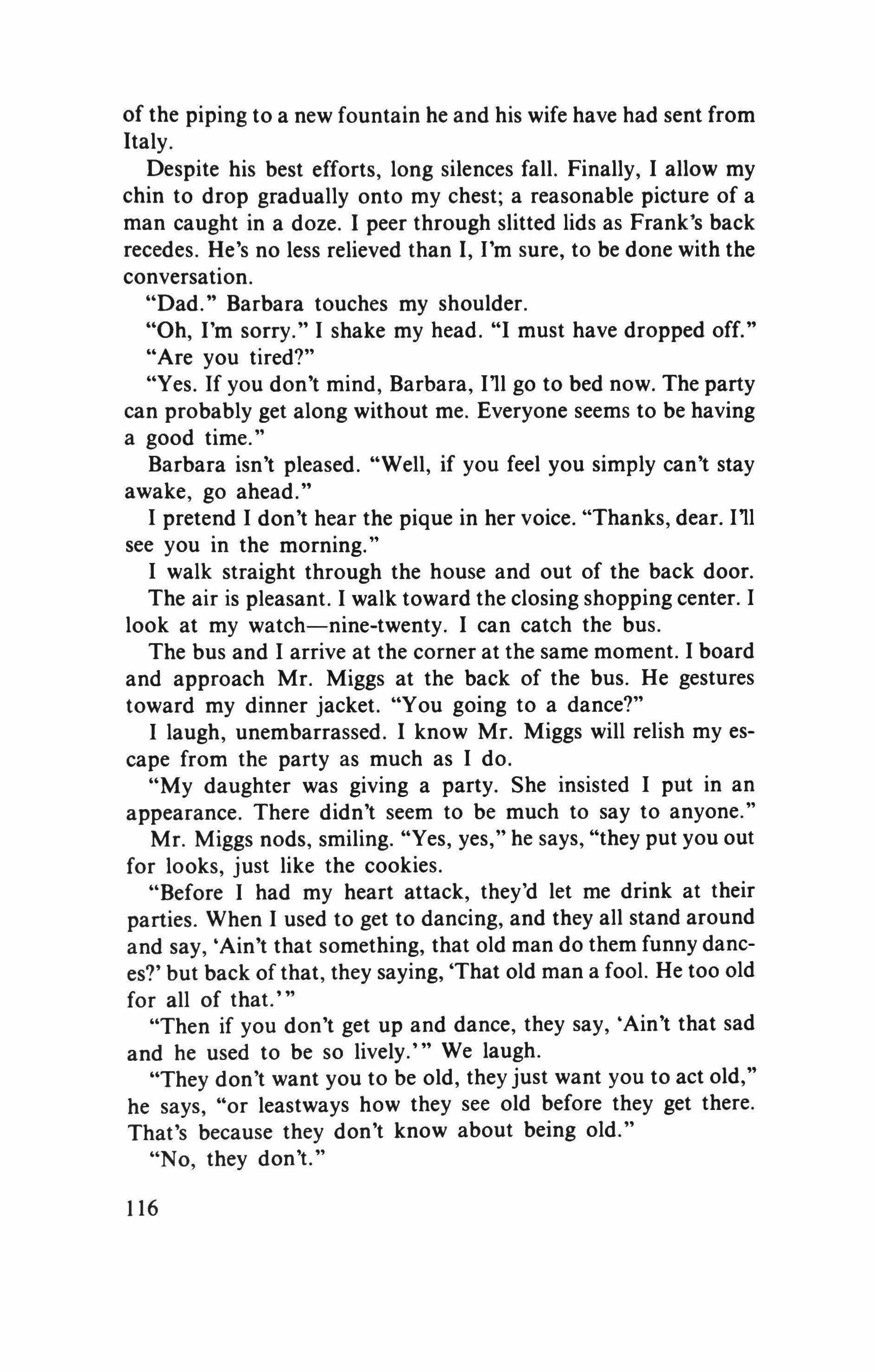
of the piping to a new fountain he and his wife have had sent from Italy.
Despite his best efforts, long silences fall. Finally, 1 allow my chin to drop gradually onto my chest; a reasonable picture of a man caught in a doze. 1 peer through slitted lids as Frankos back recedes. He's no less relieved than I, I'm sure, to be done with the conversation.
"Dad." Barbara touches my shoulder.
"Oh, I'm sorry." 1 shake my head. "I must have dropped off."
"Are you tired?"
"Yes. If you don't mind, Barbara, 111 go to bed now. The party can probably get along without me. Everyone seems to be having a good time."
Barbara isn't pleased. "Well, if you feel you simply can't stay awake, go ahead."
1 pretend 1 don't hear the pique in her voice. "Thanks, dear. 111 see you in the morning."
1 walk straight through the house and out of the back door.
The air is pleasant. 1 walk toward the closing shopping center. I look at my watch-nine-twenty. 1 can catch the bus.
The bus and 1 arrive at the corner at the same moment. 1 board and approach Mr. Miggs at the back of the bus. He gestures toward my dinner jacket. "You going to a dance?"
1 laugh, unembarrassed. 1 know Mr. Miggs will relish my escape from the party as much as 1 do.
"My daughter was giving a party. She insisted 1 put in an appearance. There didn't seem to be much to say to anyone."
Mr. Miggs nods, smiling. "Yes, yes," he says, "they put you out for looks, just like the cookies.
"Before I had my heart attack, they'd let me drink at their parties. When 1 used to get to dancing, and they all stand around and say, 'Ain't that something, that old man do them funny dances?' but back of that, they saying, 'That old man a fool. He too old for all of that.'"
"Then if you don't get up and dance, they say, 'Ain't that sad and he used to be so lively." We laugh.
"They don't want you to be old, they just want you to act old," he says, "or leastways how they see old before they get there. That's because they don't know about being old."
"N0, they don't."
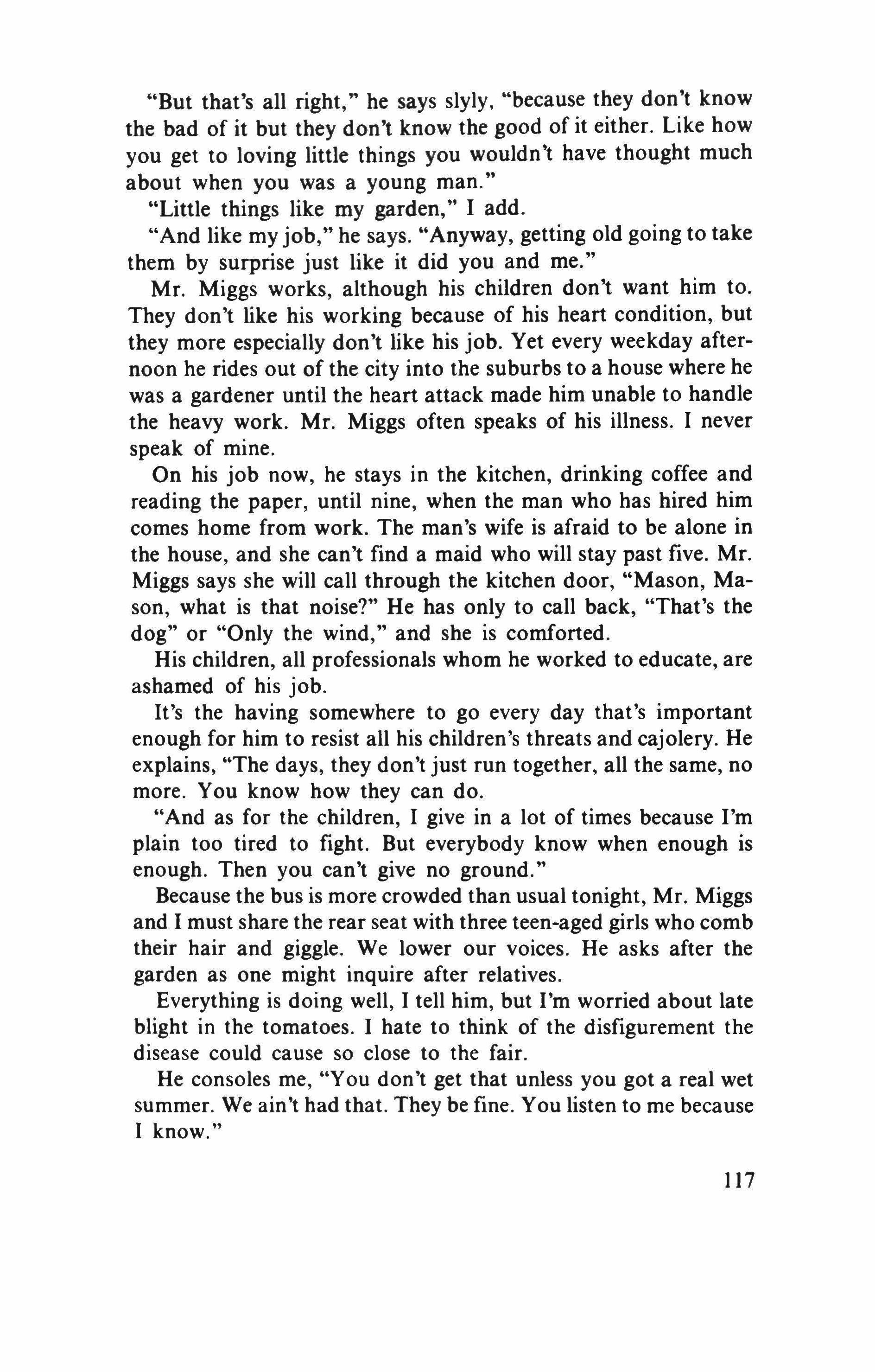
"But that's all right," he says slyly, "because they don't know the bad of it but they don't know the good of it either. Like how you get to loving little things you wouldn't have thought much about when you was a young man."
"Little things like my garden," I add.
"And like my job," he says. "Anyway, getting old going to take them by surprise just like it did you and me."
Mr. Miggs works, although his children don't want him to. They don't like his working because of his heart condition, but they more especially don't like his job. Yet every weekday afternoon he rides out of the city into the suburbs to a house where he was a gardener until the heart attack made him unable to handle the heavy work. Mr. Miggs often speaks of his illness. I never speak of mine.
On his job now, he stays in the kitchen, drinking coffee and reading the paper, until nine, when the man who has hired him comes home from work. The man's wife is afraid to be alone in the house, and she can't find a maid who will stay past five. Mr. Miggs says she will call through the kitchen door, "Mason, Mason, what is that noise?" He has only to call back, "That's the dog" or "Only the wind," and she is comforted.
His children, all professionals whom he worked to educate, are ashamed of his job.
It's the having somewhere to go every day that's important enough for him to resist all his children's threats and cajolery. He explains, "The days, they don't just run together, all the same, no more. You know how they can do.
"And as for the children, I give in a lot of times because I'm plain too tired to fight. But everybody know when enough is enough. Then you can't give no ground."
Because the bus is more crowded than usual tonight, Mr. Miggs and I must share the rear seat with three teen-aged girls who comb their hair and giggle. We lower our voices. He asks after the garden as one might inquire after relatives.
Everything is doing well, I tell him, but I'm worried about late blight in the tomatoes. I hate to think of the disfigurement the disease could cause so close to the fair.
He consoles me, "You don't get that unless you got a real wet summer. We ain't had that. They be fine. You listen to me because I know."
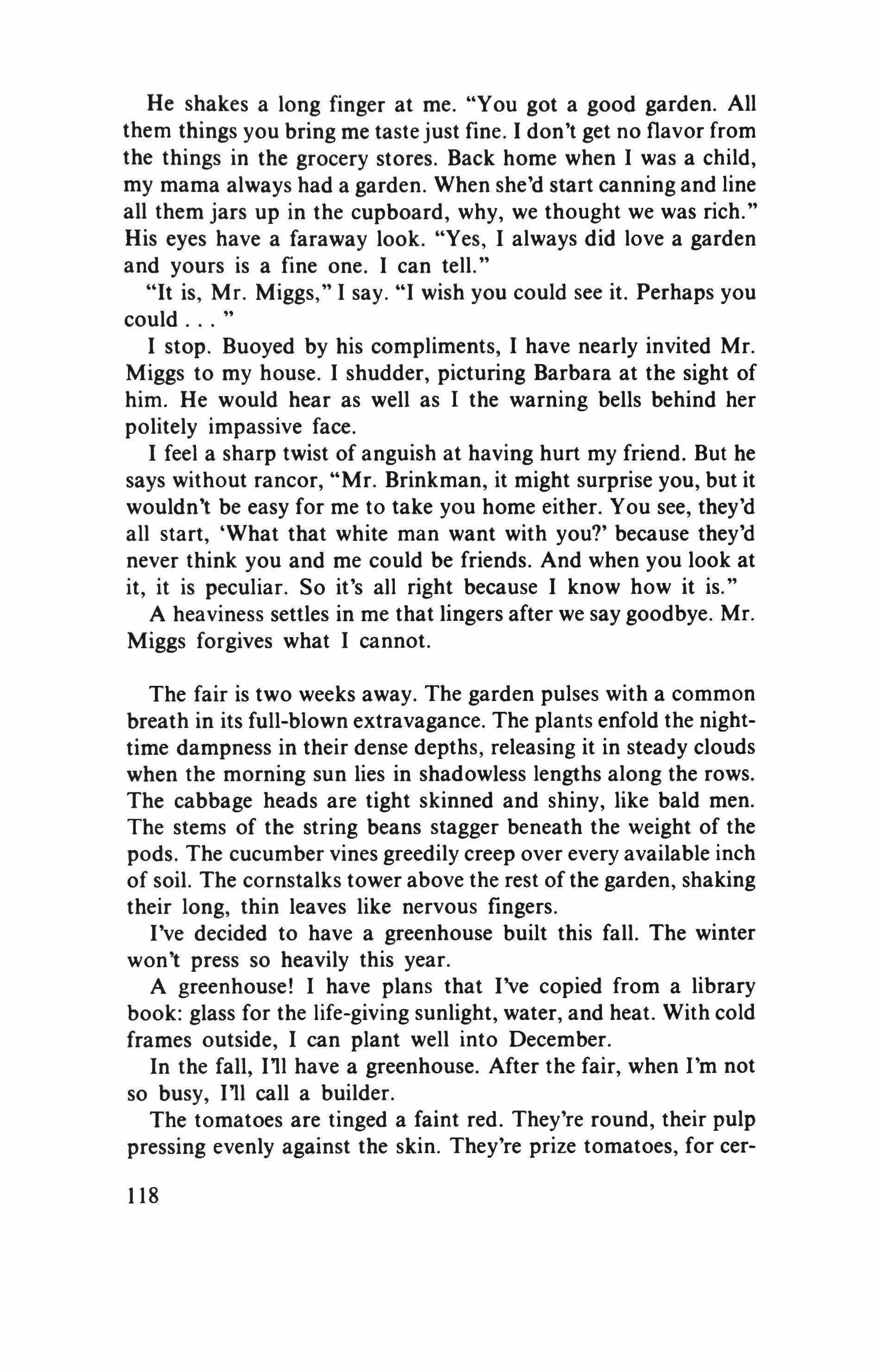
He shakes a long finger at me. "You got a good garden. All them things you bring me taste just fine. I don't get no flavor from the things in the grocery stores. Back home when I was a child, my mama always had a garden. When she'd start canning and line all them jars up in the cupboard, why, we thought we was rich." His eyes have a faraway look. "Yes, I always did love a garden and yours is a fine one. I can tell."
"It is, Mr. Miggs," I say. "I wish you could see it. Perhaps you could
I stop. Buoyed by his compliments, I have nearly invited Mr. Miggs to my house. I shudder, picturing Barbara at the sight of him. He would hear as well as I the warning bells behind her politely impassive face.
I feel a sharp twist of anguish at having hurt my friend. But he says without rancor, "Mr. Brinkman, it might surprise you, but it wouldn't be easy for me to take you home either. You see, they'd all start, 'What that white man want with you?' because they'd never think you and me could be friends. And when you look at it, it is peculiar. So it's all right because I know how it is."
A heaviness settles in me that lingers after we say goodbye. Mr. Miggs forgives what I cannot.
The fair is two weeks away. The garden pulses with a common breath in its full-blown extravagance. The plants enfold the nighttime dampness in their dense depths, releasing it in steady clouds when the morning sun lies in shadowless lengths along the rows. The cabbage heads are tight skinned and shiny, like bald men. The stems of the string beans stagger beneath the weight of the pods. The cucumber vines greedily creep over every available inch of soil. The cornstalks tower above the rest of the garden, shaking their long, thin leaves like nervous fingers.
I've decided to have a greenhouse built this fall. The winter won't press so heavily this year.
A greenhouse! I have plans that I've copied from a library book: glass for the life-giving sunlight, water, and heat. With cold frames outside, I can plant well into December.
In the fall, 111 have a greenhouse. After the fair, when I'm not so busy, 111 call a builder.
The tomatoes are tinged a faint red. They're round, their pulp pressing evenly against the skin. They're prize tomatoes, for cerus
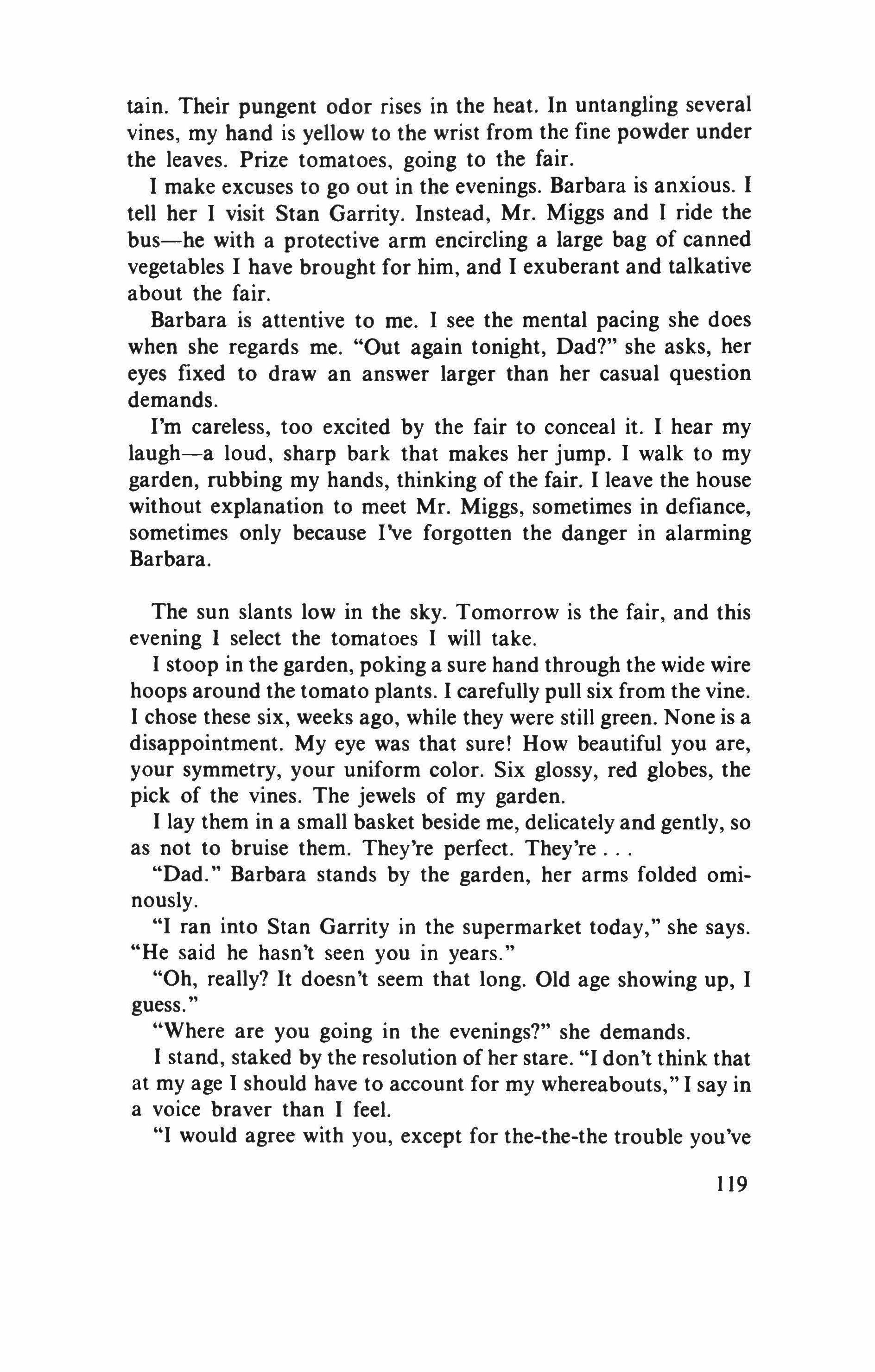
tain. Their pungent odor rises in the heat. In untangling several vines, my hand is yellow to the wrist from the fine powder under the leaves. Prize tomatoes, going to the fair.
I make excuses to go out in the evenings. Barbara is anxious. I tell her I visit Stan Garrity. Instead, Mr. Miggs and I ride the bus-he with a protective arm encircling a large bag of canned vegetables I have brought for him, and I exuberant and talkative about the fair.
Barbara is attentive to me. I see the mental pacing she does when she regards me. "Out again tonight, Dad?" she asks, her eyes fixed to draw an answer larger than her casual question demands.
I'm careless, too excited by the fair to conceal it. I hear my laugh-a loud, sharp bark that makes her jump. I walk to my garden, rubbing my hands, thinking of the fair. I leave the house without explanation to meet Mr. Miggs, sometimes in defiance, sometimes only because I've forgotten the danger in alarming Barbara.
The sun slants low in the sky. Tomorrow is the fair, and this evening I select the tomatoes I will take.
I stoop in the garden, poking a sure hand through the wide wire hoops around the tomato plants. I carefully pull six from the vine. 1 chose these six, weeks ago, while they were still green. None is a disappointment. My eye was that sure! How beautiful you are, your symmetry, your uniform color. Six glossy, red globes, the pick of the vines. The jewels of my garden.
I lay them in a small basket beside me, delicately and gently, so as not to bruise them. They're perfect. They're "Dad." Barbara stands by the garden, her arms folded ominously.
"I ran into Stan Garrity in the supermarket today," she says. "He said he hasn't seen you in years."
"Oh, really? It doesn't seem that long. Old age showing up, I guess.
"Where are you going in the evenings?" she demands. 1 stand, staked by the resolution of her stare. "I don't think that at my age 1 should have to account for my whereabouts," 1 say in a voice braver than 1 feel.
"I would agree with you, except for the-the-the trouble you've
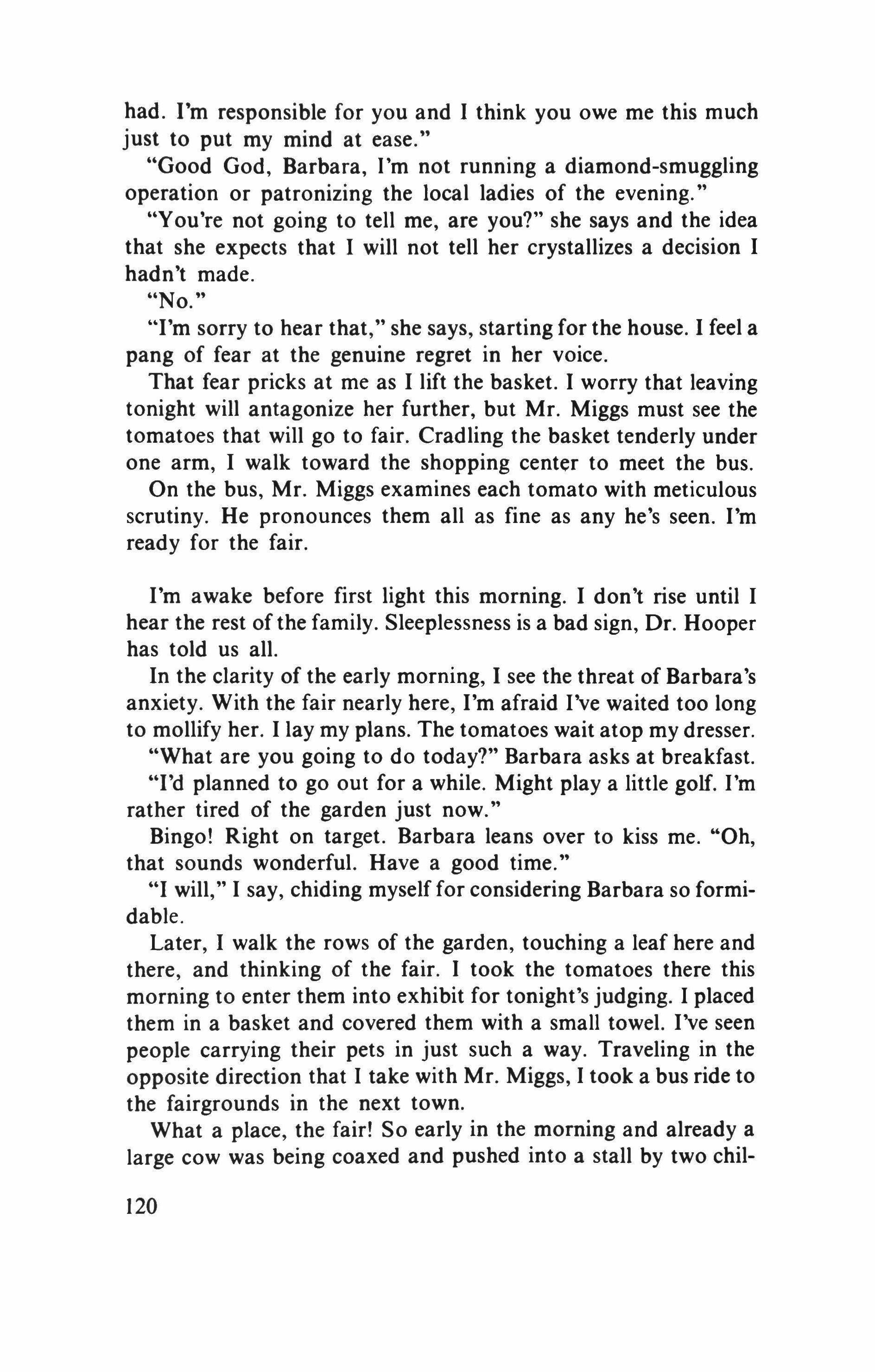
had. I'm responsible for you and I think you owe me this much just to put my mind at ease."
"Good God, Barbara, I'm not running a diamond-smuggling operation or patronizing the local ladies of the evening."
"You're not going to tell me, are you?" she says and the idea that she expects that I will not tell her crystallizes a decision I hadn't made.
"No."
"I'm sorry to hear that," she says, starting for the house. I feel a pang of fear at the genuine regret in her voice.
That fear pricks at me as I lift the basket. I worry that leaving tonight will antagonize her further, but Mr. Miggs must see the tomatoes that will go to fair. Cradling the basket tenderly under one arm, I walk toward the shopping center to meet the bus.
On the bus, Mr. Miggs examines each tomato with meticulous scrutiny. He pronounces them all as fine as any he's seen. I'm ready for the fair.
I'm awake before first light this morning. I don't rise until I hear the rest ofthe family. Sleeplessness is a bad sign, Dr. Hooper has told us all.
In the clarity of the early morning, I see the threat of Barbara's anxiety. With the fair nearly here, I'm afraid I've waited too long to mollify her. I lay my plans. The tomatoes wait atop my dresser.
"What are you going to do today?" Barbara asks at breakfast.
"I'd planned to go out for a while. Might playa little golf. I'm rather tired of the garden just now."
Bingo! Right on target. Barbara leans over to kiss me. "Oh, that sounds wonderful. Have a good time."
"I will," I say, chiding myself for considering Barbara so formidable.
Later, I walk the rows of the garden, touching a leaf here and there, and thinking of the fair. I took the tomatoes there this morning to enter them into exhibit for tonight's judging, I placed them in a basket and covered them with a small towel. I've seen people carrying their pets in just such a way. Traveling in the opposite direction that I take with Mr. Miggs, I took a bus ride to the fairgrounds in the next town.
What a place, the fair! So early in the morning and already a large cow was being coaxed and pushed into a stall by two chil120
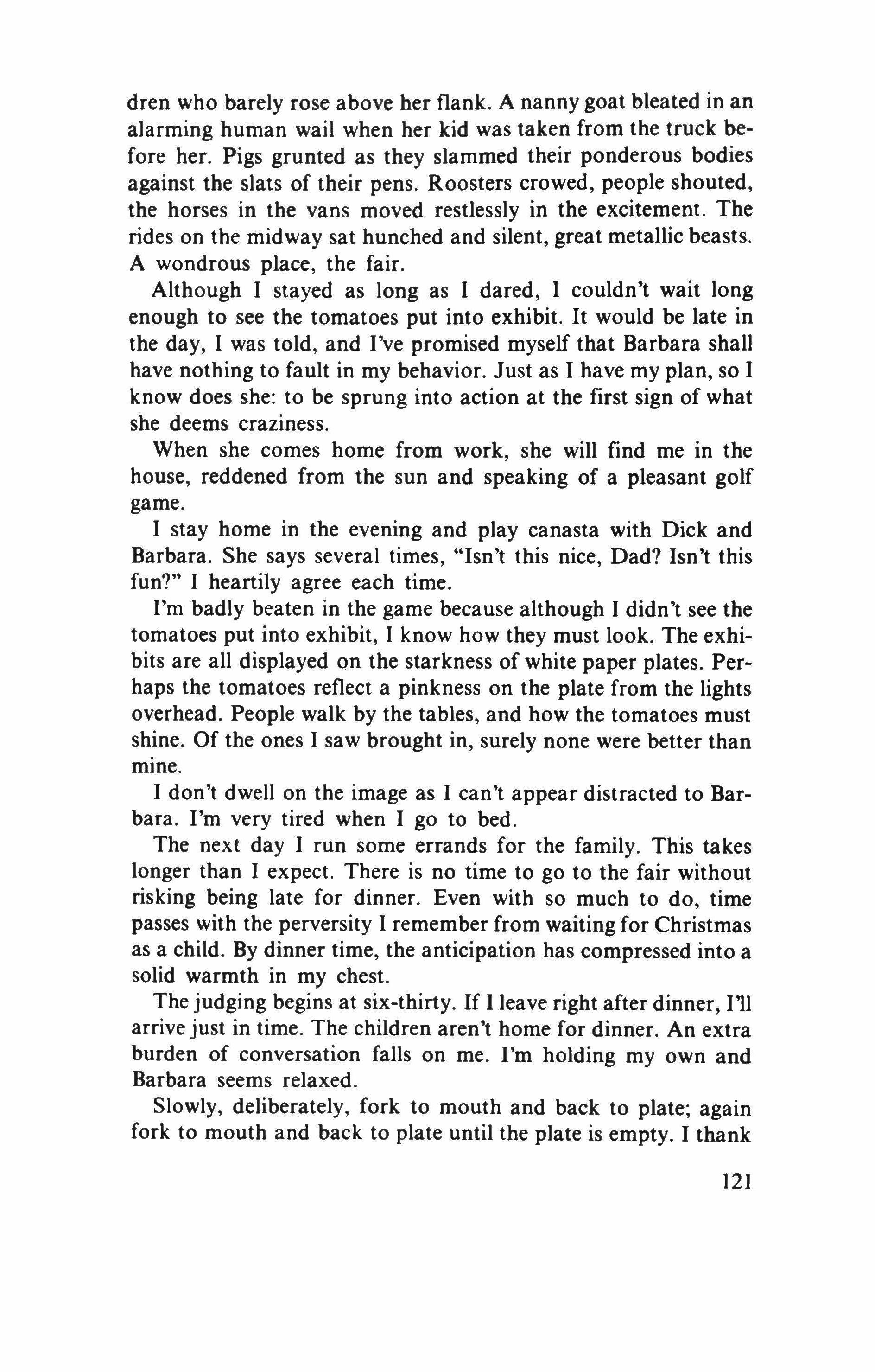
dren who barely rose above her flank. A nanny goat bleated in an alarming human wail when her kid was taken from the truck before her. Pigs grunted as they slammed their ponderous bodies against the slats of their pens. Roosters crowed, people shouted, the horses in the vans moved restlessly in the excitement. The rides on the midway sat hunched and silent, great metallic beasts. A wondrous place, the fair.
Although I stayed as long as I dared, I couldn't wait long enough to see the tomatoes put into exhibit. It would be late in the day, I was told, and I've promised myself that Barbara shall have nothing to fault in my behavior. Just as I have my plan, so I know does she: to be sprung into action at the first sign of what she deems craziness.
When she comes home from work, she will find me in the house, reddened from the sun and speaking of a pleasant golf game.
I stay home in the evening and play canasta with Dick and Barbara. She says several times, "Isn't this nice, Dad? Isn't this fun?" I heartily agree each time.
I'm badly beaten in the game because although I didn't see the tomatoes put into exhibit, I know how they must look. The exhibits are all displayed on the starkness of white paper plates. Perhaps the tomatoes reflect a pinkness on the plate from the lights overhead. People walk by the tables, and how the tomatoes must shine. Of the ones I saw brought in, surely none were better than mine.
I don't dwell on the image as I can't appear distracted to Barbara. I'm very tired when I go to bed.
The next day I run some errands for the family. This takes longer than I expect. There is no time to go to the fair without risking being late for dinner. Even with so much to do, time passes with the perversity I remember from waiting for Christmas as a child. By dinner time, the anticipation has compressed into a solid warmth in my chest.
The judging begins at six-thirty. If I leave right after dinner, 111 arrive just in time. The children aren't home for dinner. An extra burden of conversation falls on me. I'm holding my own and Barbara seems relaxed.
Slowly, deliberately, fork to mouth and back to plate; again fork to mouth and back to plate until the plate is empty. I thank 121
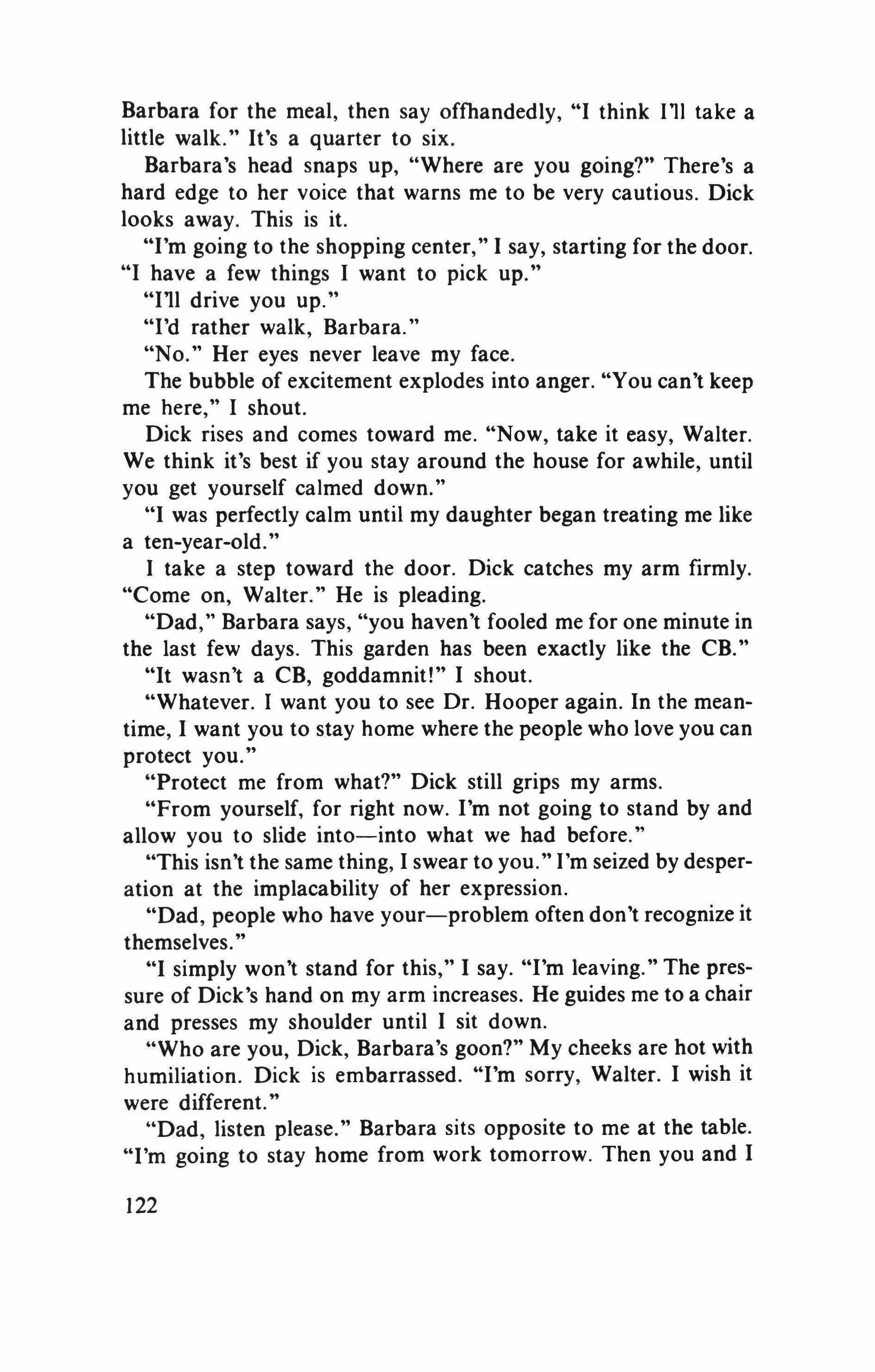
Barbara for the meal, then say offhandedly, "I think 111 take a little walk." It's a quarter to six.
Barbara's head snaps up, "Where are you going?" There's a hard edge to her voice that warns me to be very cautious. Dick looks away. This is it.
"I'm going to the shopping center," I say, starting for the door. "I have a few things I want to pick up."
"I'll drive you up."
"I'd rather walk, Barbara."
"No." Her eyes never leave my face.
The bubble of excitement explodes into anger. "You can't keep me here," I shout.
Dick rises and comes toward me. "Now, take it easy, Walter. We think it's best if you stay around the house for awhile, until you get yourself calmed down."
"I was perfectly calm until my daughter began treating me like a ten-year-old."
I take a step toward the door. Dick catches my arm firmly. "Come on, Walter." He is pleading.
"Dad," Barbara says, "you haven't fooled me for one minute in the last few days. This garden has been exactly like the CB."
"It wasn't a CB, goddamnit!" I shout.
"Whatever. I want you to see Dr. Hooper again. In the meantime, I want you to stay home where the people who love you can protect you."
"Protect me from what?" Dick still grips my arms.
"From yourself, for right now. I'm not going to stand by and allow you to slide into-into what we had before."
"This isn't the same thing, I swear to you." I'm seized by desperation at the implacability of her expression.
"Dad, people who have your-problem often don't recognize it themselves.
"I simply won't stand for this," I say. "I'm leaving." The pressure of Dick's hand on my arm increases. He guides me to a chair and presses my shoulder until I sit down.
"Who are you, Dick, Barbara's goon?" My cheeks are hot with humiliation. Dick is embarrassed. "I'm sorry, Walter. I wish it were different."
"Dad, listen please." Barbara sits opposite to me at the table. "I'm going to stay home from work tomorrow. Then you and I
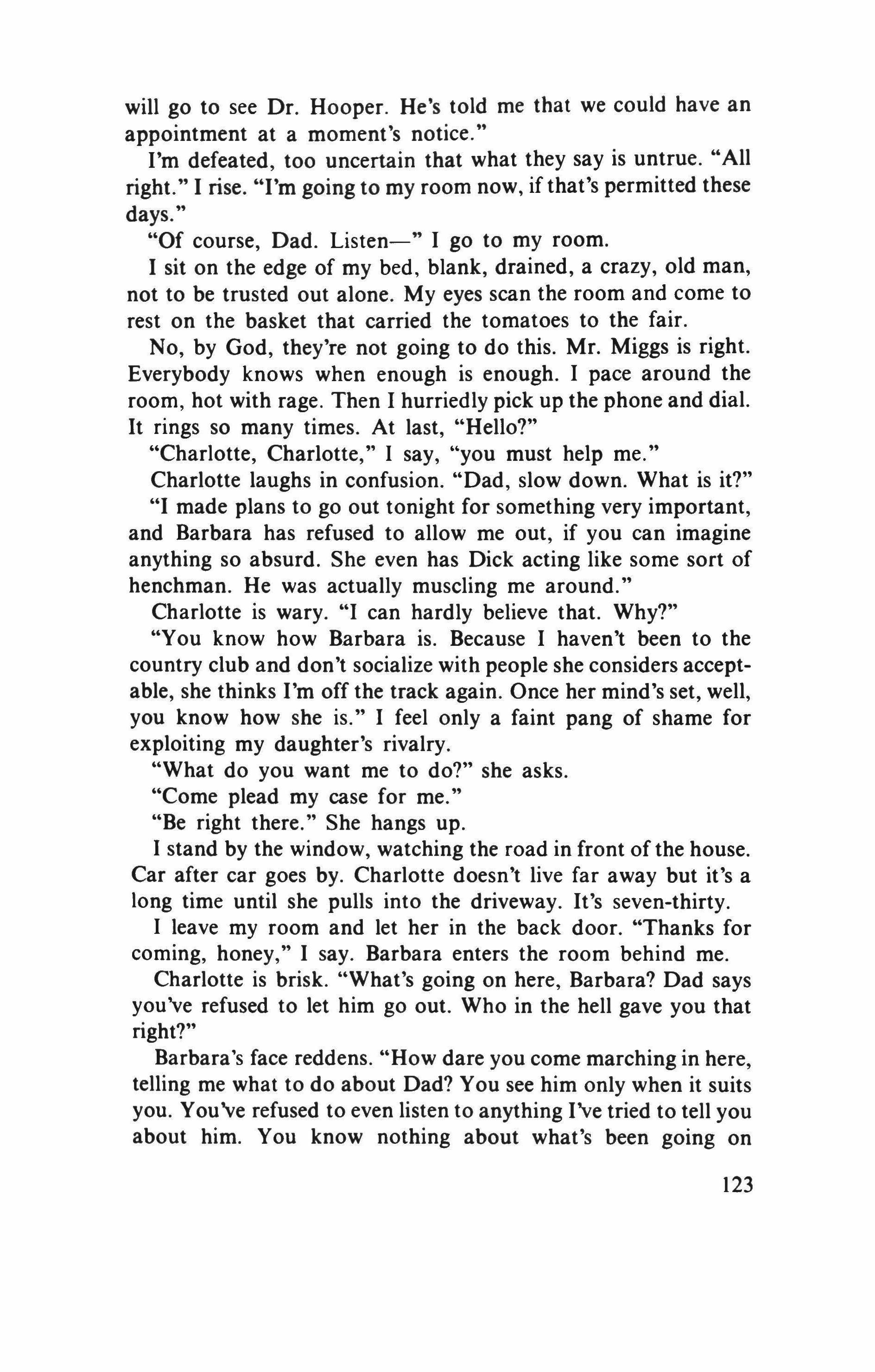
will go to see Dr. Hooper. He's told me that we could have an appointment at a moment's notice."
I'm defeated, too uncertain that what they say is untrue. "All right." I rise. "I'm going to my room now, if that's permitted these days."
"Of course, Dad. Listen-" I go to my room.
I sit on the edge of my bed, blank, drained, a crazy, old man, not to be trusted out alone. My eyes scan the room and come to rest on the basket that carried the tomatoes to the fair.
No, by God, they're not going to do this. Mr. Miggs is right. Everybody knows when enough is enough. I pace around the room, hot with rage. Then I hurriedly pick up the phone and dial. It rings so many times. At last, "Hello?"
"Charlotte, Charlotte," I say, "you must help me."
Charlotte laughs in confusion. "Dad, slow down. What is it?"
"I made plans to go out tonight for something very important, and Barbara has refused to allow me out, if you can imagine anything so absurd. She even has Dick acting like some sort of henchman. He was actually muscling me around."
Charlotte is wary. "I can hardly believe that. Why?"
"You know how Barbara is. Because I haven't been to the country club and don't socialize with people she considers acceptable, she thinks I'm off the track again. Once her mind's set, well, you know how she is." I feel only a faint pang of shame for exploiting my daughter's rivalry.
"What do you want me to do?" she asks.
"Come plead my case for me."
"Be right there." She hangs up.
I stand by the window, watching the road in front of the house. Car after car goes by. Charlotte doesn't live far away but it's a long time until she pulls into the driveway. It's seven-thirty.
I leave my room and let her in the back door. "Thanks for coming, honey," I say. Barbara enters the room behind me.
Charlotte is brisk. "What's going on here, Barbara? Dad says you've refused to let him go out. Who in the hell gave you that right?"
Barbara's face reddens. "How dare you come marching in here, telling me what to do about Dad? You see him only when it suits you. You've refused to even listen to anything I've tried to tell you about him. You know nothing about what's been going on
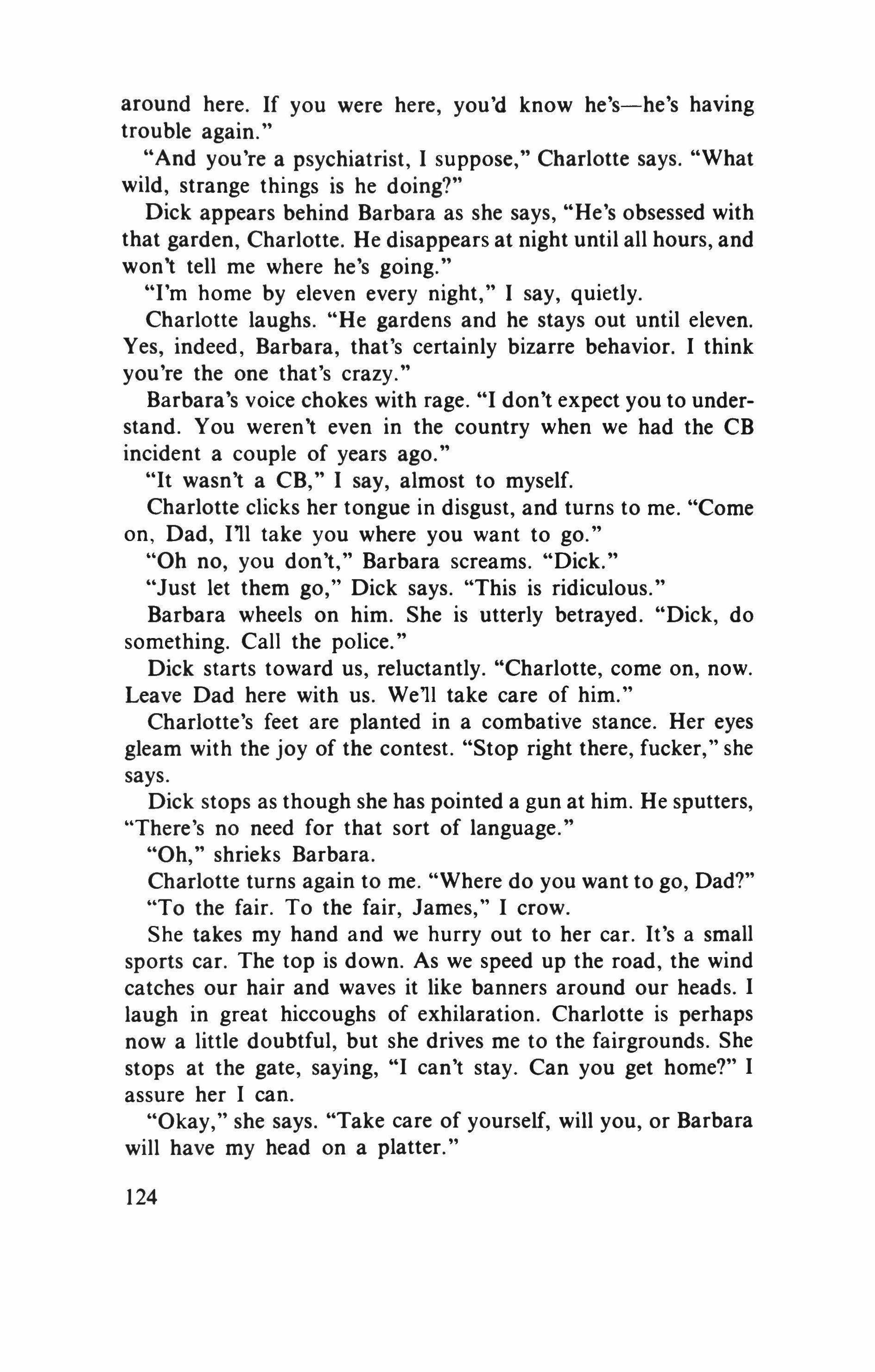
around here. If you were here, you'd know he's-he's having trouble again."
"And you're a psychiatrist, I suppose," Charlotte says. "What wild, strange things is he doing?"
Dick appears behind Barbara as she says, "He's obsessed with that garden, Charlotte. He disappears at night until all hours, and won't tell me where he's going."
"I'm home by eleven every night," I say, quietly.
Charlotte laughs. "He gardens and he stays out until eleven. Yes, indeed, Barbara, that's certainly bizarre behavior. I think you're the one that's crazy."
Barbara's voice chokes with rage. "I don't expect you to understand. You weren't even in the country when we had the CB incident a couple of years ago."
"It wasn't a CB," I say, almost to myself.
Charlotte clicks her tongue in disgust, and turns to me. "Come on, Dad, 111 take you where you want to go."
"Oh no, you don't," Barbara screams. "Dick."
"Just let them go," Dick says. "This is ridiculous."
Barbara wheels on him. She is utterly betrayed. "Dick, do something. Call the police."
Dick starts toward us, reluctantly. "Charlotte, come on, now. Leave Dad here with us. We1l take care of him."
Charlotte's feet are planted in a combative stance. Her eyes gleam with the joy of the contest. "Stop right there, fucker," she says.
Dick stops as though she has pointed a gun at him. He sputters, "There's no need for that sort of language."
"Oh," shrieks Barbara.
Charlotte turns again to me. "Where do you want to go, Dad?"
"To the fair. To the fair, James," 1 crow.
She takes my hand and we hurry out to her car. It's a small sports car. The top is down. As we speed up the road, the wind catches our hair and waves it like banners around our heads. I laugh in great hiccoughs of exhilaration. Charlotte is perhaps now a little doubtful, but she drives me to the fairgrounds. She stops at the gate, saying, "I can't stay. Can you get home?" I assure her I can.
"Okay," she says. "Take care of yourself, will you, or Barbara will have my head on a platter."
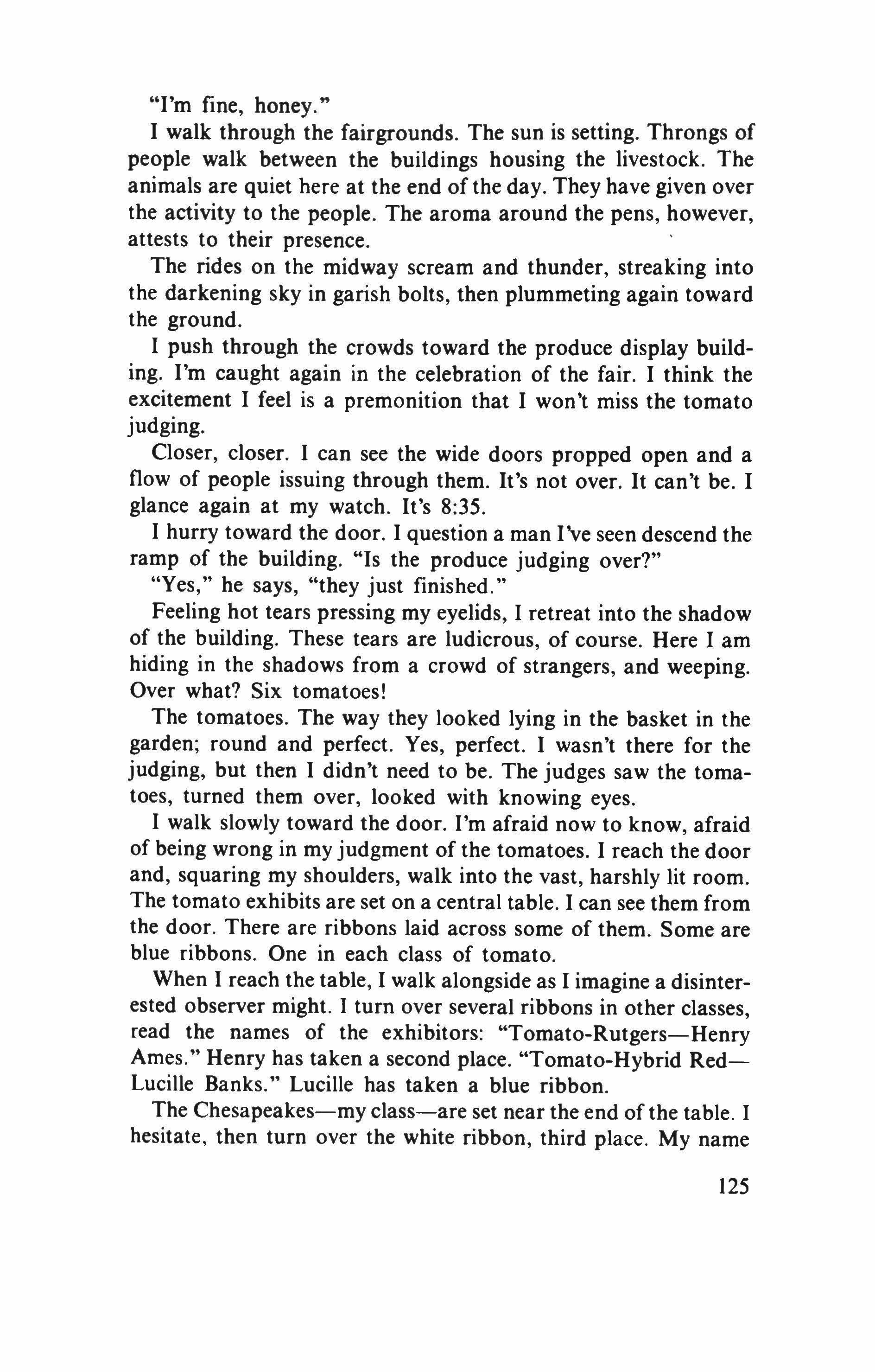
"I'm fine, honey."
I walk through the fairgrounds. The sun is setting. Throngs of people walk between the buildings housing the livestock. The animals are quiet here at the end of the day. They have given over the activity to the people. The aroma around the pens, however, attests to their presence.
The rides on the midway scream and thunder, streaking into the darkening sky in garish bolts, then plummeting again toward the ground.
I push through the crowds toward the produce display building. I'm caught again in the celebration of the fair. I think the excitement I feel is a premonition that I won't miss the tomato judging.
Closer, closer. I can see the wide doors propped open and a flow of people issuing through them. It's not over. It can't be. I glance again at my watch. It's 8:35.
I hurry toward the door. I question a man I've seen descend the ramp of the building. "Is the produce judging over?"
"Yes," he says, "they just finished."
Feeling hot tears pressing my eyelids, I retreat into the shadow of the building. These tears are ludicrous, of course. Here I am hiding in the shadows from a crowd of strangers, and weeping. Over what? Six tomatoes!
The tomatoes. The way they looked lying in the basket in the garden; round and perfect. Yes, perfect. I wasn't there for the judging, but then I didn't need to be. The judges saw the tomatoes, turned them over, looked with knowing eyes.
I walk slowly toward the door. I'm afraid now to know, afraid of being wrong in my judgment of the tomatoes. I reach the door and, squaring my shoulders, walk into the vast, harshly lit room. The tomato exhibits are set on a central table. I can see them from the door. There are ribbons laid across some of them. Some are blue ribbons. One in each class of tomato.
When I reach the table, I walk alongside as I imagine a disinterested observer might. I turn over several ribbons in other classes, read the names of the exhibitors: "Tomato-Rutgers-Henry Ames." Henry has taken a second place. "Tomato-Hybrid RedLucille Banks." Lucille has taken a blue ribbon.
The Chesapeakes-my class-are set near the end of the table. I hesitate, then turn over the white ribbon, third place. My name
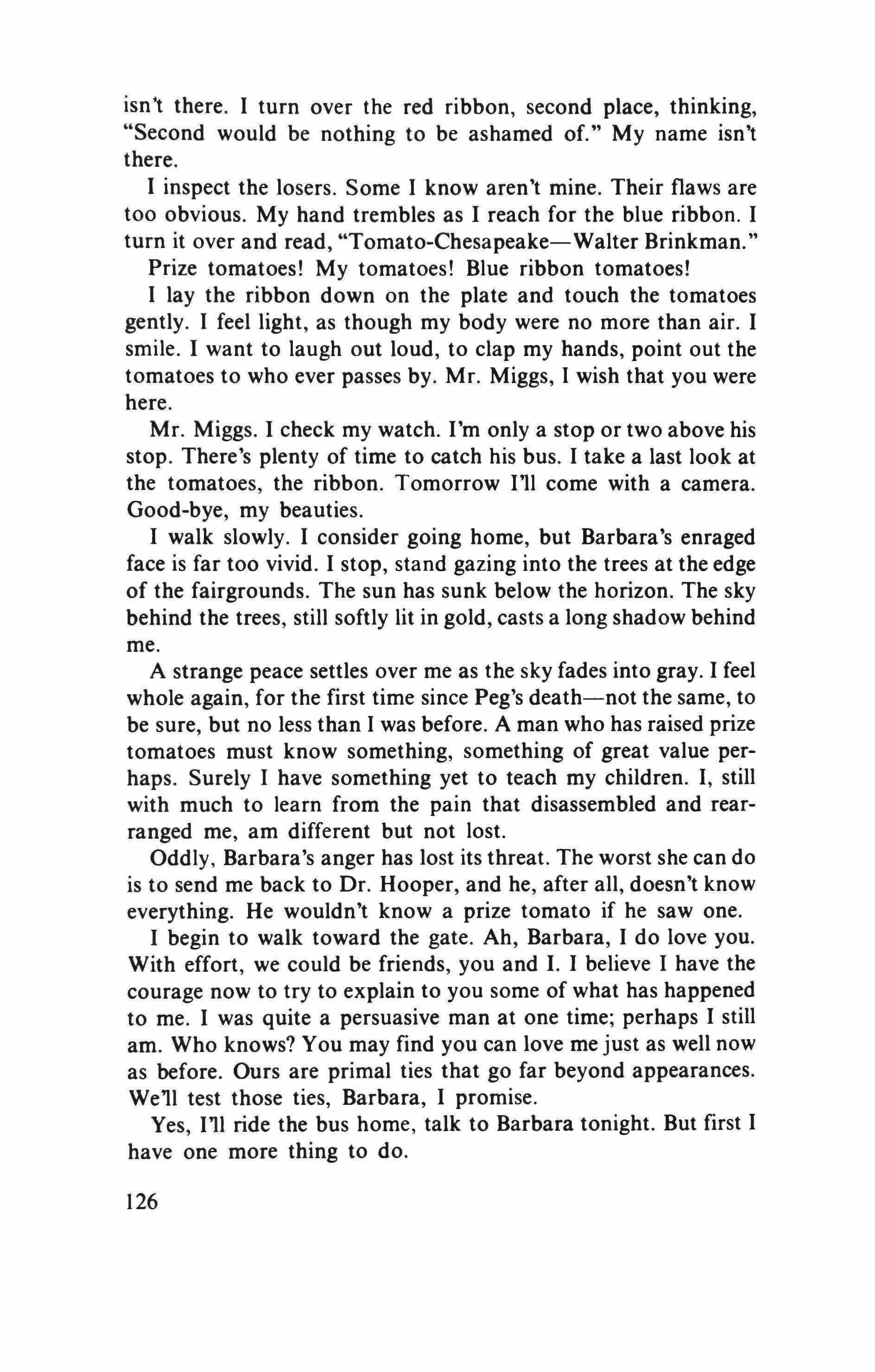
isn't there. I turn over the red ribbon, second place, thinking, "Second would be nothing to be ashamed of." My name isn't there.
I inspect the losers. Some I know aren't mine. Their flaws are too obvious. My hand trembles as I reach for the blue ribbon. I turn it over and read, "Tomato-Chesapeake-Walter Brinkman."
Prize tomatoes! My tomatoes! Blue ribbon tomatoes!
I lay the ribbon down on the plate and touch the tomatoes gently. I feel light, as though my body were no more than air. I smile. I want to laugh out loud, to clap my hands, point out the tomatoes to who ever passes by. Mr. Miggs, I wish that you were here.
Mr. Miggs. I check my watch. I'm only a stop or two above his stop. There's plenty of time to catch his bus. I take a last look at the tomatoes, the ribbon. Tomorrow I'll come with a camera. Good-bye, my beauties.
I walk slowly. I consider going home, but Barbara's enraged face is far too vivid. I stop, stand gazing into the trees at the edge of the fairgrounds. The sun has sunk below the horizon. The sky behind the trees, still softly lit in gold, casts a long shadow behind me.
A strange peace settles over me as the sky fades into gray. I feel whole again, for the first time since Peg's death-not the same, to be sure, but no less than I was before. A man who has raised prize tomatoes must know something, something of great value perhaps. Surely I have something yet to teach my children. I, still with much to learn from the pain that disassembled and rearranged me, am different but not lost.
Oddly, Barbara's anger has lost its threat. The worst she can do is to send me back to Dr. Hooper, and he, after all, doesn't know everything. He wouldn't know a prize tomato if he saw one.
I begin to walk toward the gate. Ah, Barbara, I do love you. With effort, we could be friends, you and I. I believe I have the courage now to try to explain to you some of what has happened to me. I was quite a persuasive man at one time; perhaps I still am. Who knows? You may find you can love me just as well now as before. Ours are primal ties that go far beyond appearances. We'll test those ties, Barbara, I promise. Yes, 111 ride the bus home, talk to Barbara tonight. But first I have one more thing to do.
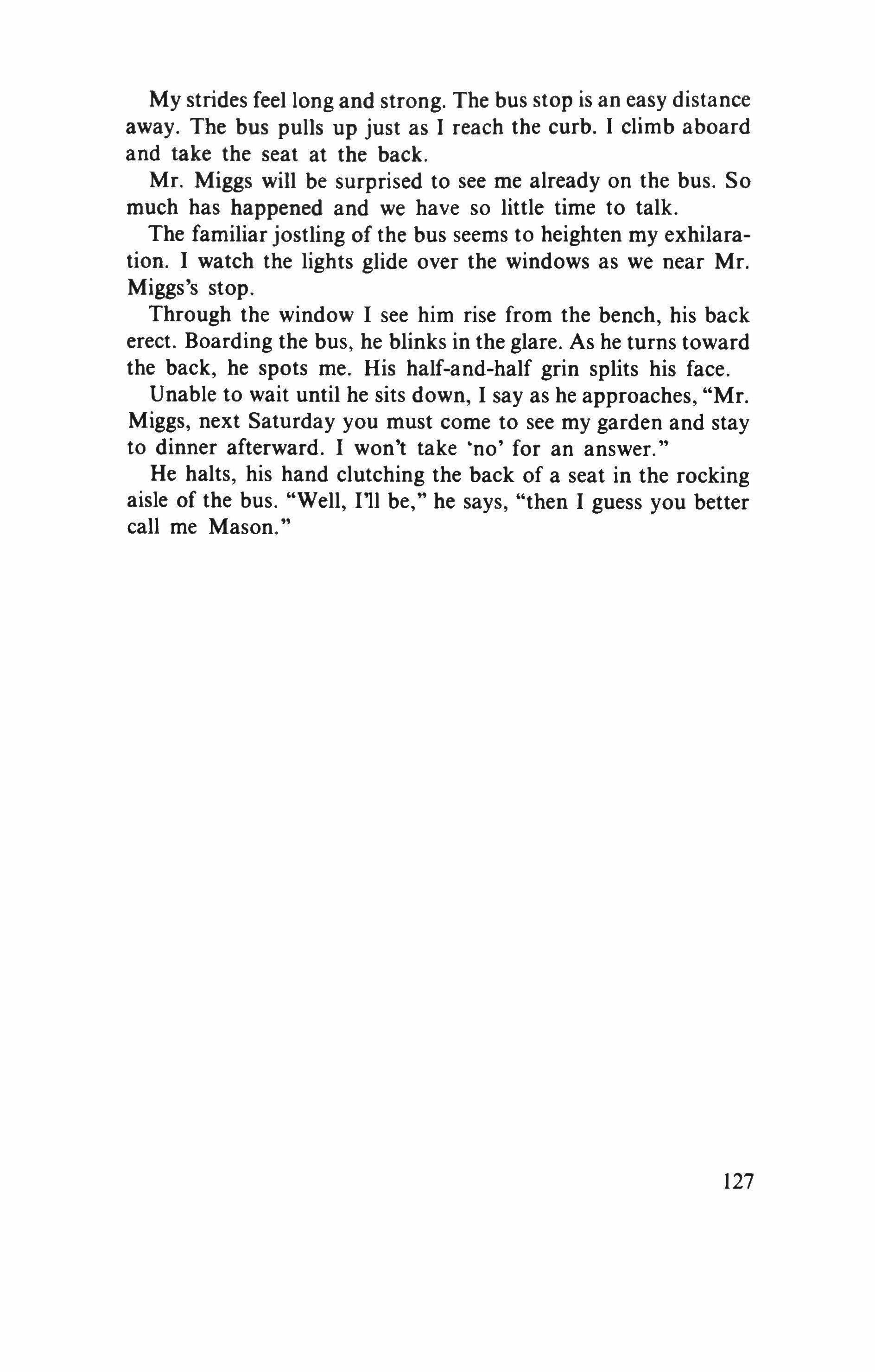
My strides feel long and strong. The bus stop is an easy distance away. The bus pulls up just as I reach the curb. I climb aboard and take the seat at the back.
Mr. Miggs will be surprised to see me already on the bus. So much has happened and we have so little time to talk.
The familiar jostling of the bus seems to heighten my exhilaration. I watch the lights glide over the windows as we near Mr. Miggs's stop.
Through the window I see him rise from the bench, his back erect. Boarding the bus, he blinks in the glare. As he turns toward the back, he spots me. His half-and-half grin splits his face.
Unable to wait until he sits down, I say as he approaches, "Mr. Miggs, next Saturday you must come to see my garden and stay to dinner afterward. I won't take 'no' for an answer."
He halts, his hand clutching the back of a seat in the rocking aisle of the bus. "Well, 111 be," he says, "then I guess you better call me Mason."
"Oh dear, what can the matter be?"Benedict Kiely
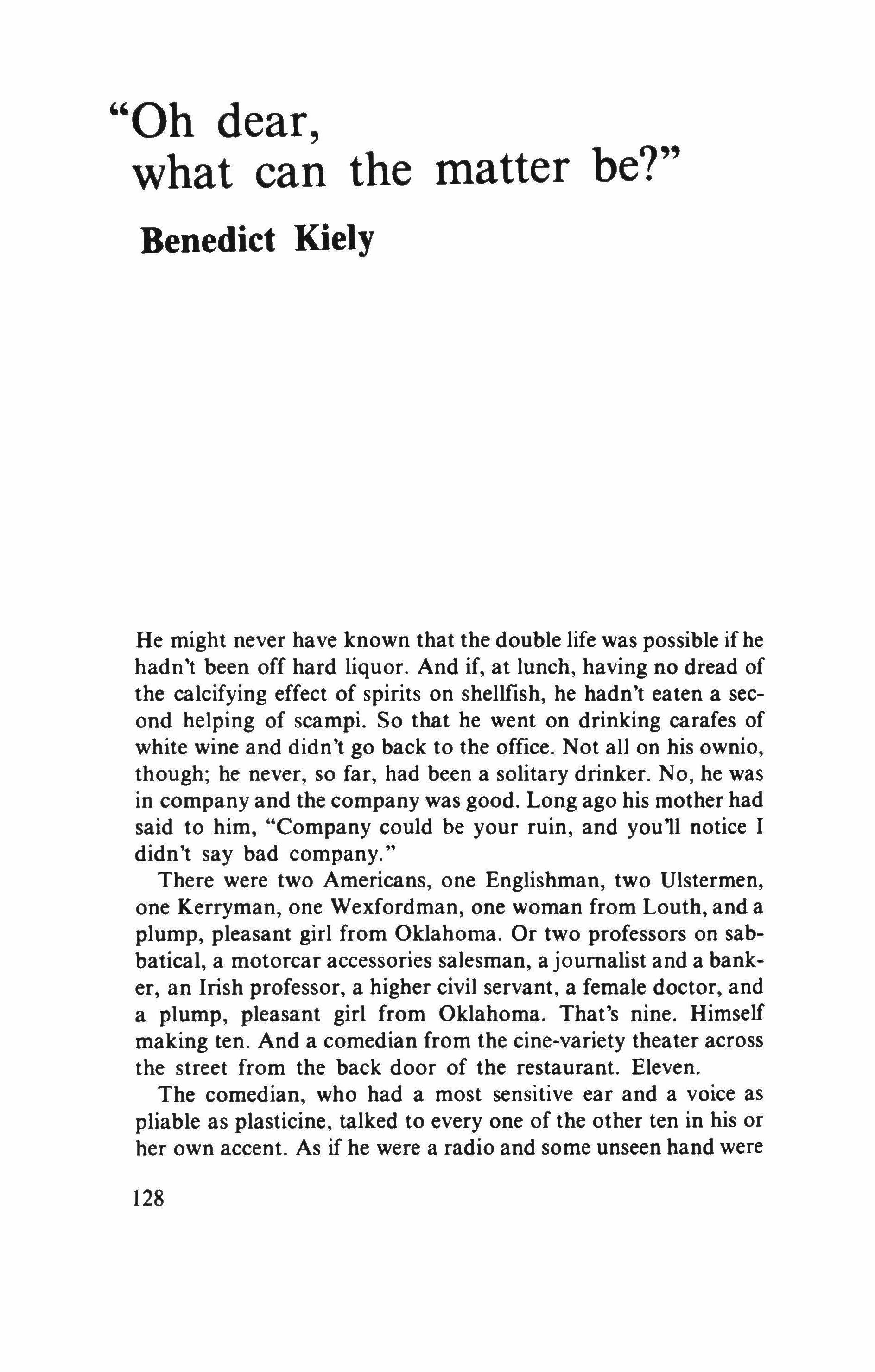
He might never have known that the double life was possible if he hadn't been off hard liquor. And if, at lunch, having no dread of the calcifying effect of spirits on shellfish, he hadn't eaten a second helping of scampi. So that he went on drinking carafes of white wine and didn't go back to the office. Not all on his ownio, though; he never, so far, had been a solitary drinker. No, he was in company and the company was good. Long ago his mother had said to him, "Company could be your ruin, and you'll notice I didn't say bad company."
There were two Americans, one Englishman, two Ulstermen, one Kerryman, one Wexfordman, one woman from Louth, and a plump, pleasant girl from Oklahoma. Or two professors on sabbatical, a motorcar accessories salesman, a journalist and a banker, an Irish professor, a higher civil servant, a female doctor, and a plump, pleasant girl from Oklahoma. That's nine. Himself making ten. And a comedian from the cine-variety theater across the street from the back door of the restaurant. Eleven.
The comedian, who had a most sensitive ear and a voice as pliable as plasticine, talked to everyone of the other ten in his or her own accent. As if he were a radio and some unseen hand were 128
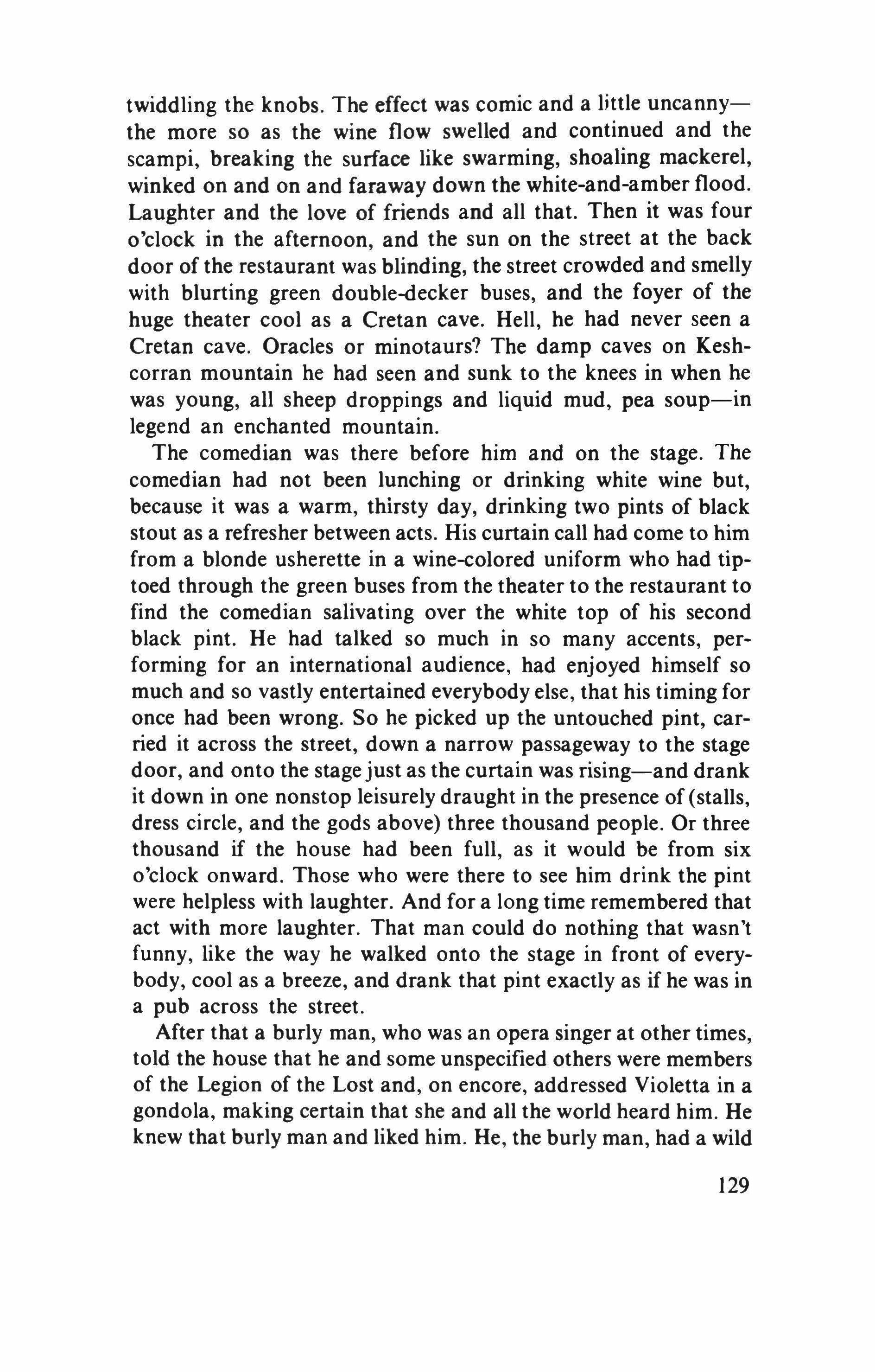
twiddling the knobs. The effect was comic and a little uncannythe more so as the wine flow swelled and continued and the scampi, breaking the surface like swarming, shoaling mackerel, winked on and on and faraway down the white-and-amber flood. Laughter and the love of friends and all that. Then it was four o'clock in the afternoon, and the sun on the street at the back door of the restaurant was blinding, the street crowded and smelly with blurting green double-decker buses, and the foyer of the huge theater cool as a Cretan cave. Hell, he had never seen a Cretan cave. Oracles or minotaurs? The damp caves on Keshcorran mountain he had seen and sunk to the knees in when he was young, all sheep droppings and liquid mud, pea soup-in legend an enchanted mountain.
The comedian was there before him and on the stage. The comedian had not been lunching or drinking white wine but, because it was a warm, thirsty day, drinking two pints of black stout as a refresher between acts. His curtain call had come to him from a blonde usherette in a wine-colored uniform who had tiptoed through the green buses from the theater to the restaurant to find the comedian salivating over the white top of his second black pint. He had talked so much in so many accents, performing for an international audience, had enjoyed himself so much and so vastly entertained everybody else, that his timing for once had been wrong. So he picked up the untouched pint, carried it across the street, down a narrow passageway to the stage door, and onto the stagejust as the curtain was rising-and drank it down in one nonstop leisurely draught in the presence of (stalls, dress circle, and the gods above) three thousand people. Or three thousand if the house had been full, as it would be from six o'clock onward. Those who were there to see him drink the pint were helpless with laughter. And for a long time remembered that act with more laughter. That man could do nothing that wasn't funny, like the way he walked onto the stage in front of everybody, cool as a breeze, and drank that pint exactly as if he was in a pub across the street.
After that a burly man, who was an opera singer at other times, told the house that he and some unspecified others were members of the Legion of the Lost and, on encore, addressed Violetta in a gondola, making certain that she and all the world heard him. He knew that burly man and liked him. He, the burly man, had a wild
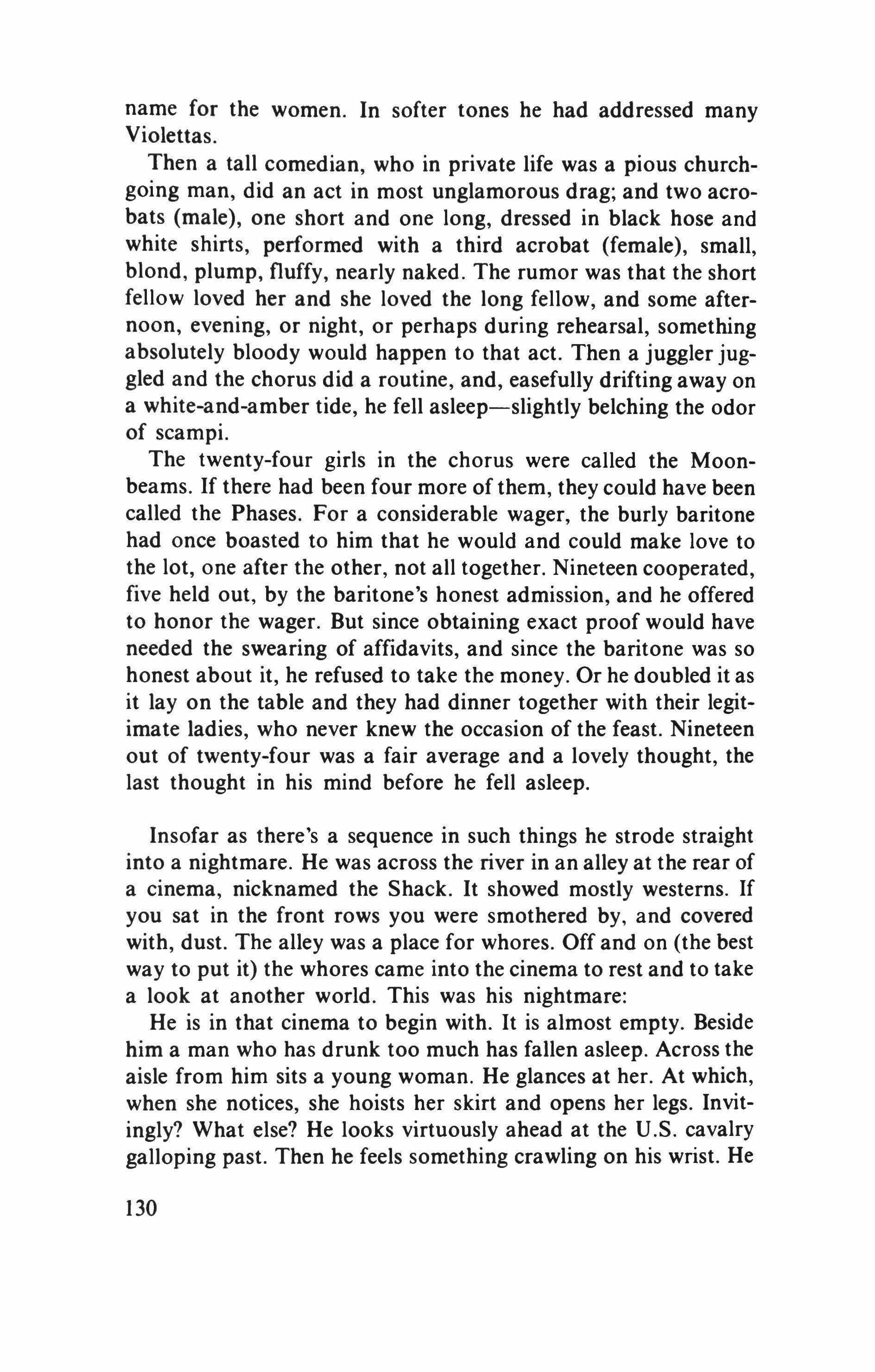
name for the women. In softer tones he had addressed many Violettas.
Then a tall comedian, who in private life was a pious churchgoing man, did an act in most unglamorous drag; and two acrobats (male), one short and one long, dressed in black hose and white shirts, performed with a third acrobat (female), small, blond, plump, fluffy, nearly naked. The rumor was that the short fellow loved her and she loved the long fellow, and some afternoon, evening, or night, or perhaps during rehearsal, something absolutely bloody would happen to that act. Then a jugglerjuggled and the chorus did a routine, and, easefully drifting away on a white-and-amber tide, he fell asleep-slightly belching the odor of scampi.
The twenty-four girls in the chorus were called the Moonbeams. If there had been four more of them, they could have been called the Phases. For a considerable wager, the burly baritone had once boasted to him that he would and could make love to the lot, one after the other, not all together. Nineteen cooperated, five held out, by the baritone's honest admission, and he offered to honor the wager. But since obtaining exact proof would have needed the swearing of affidavits, and since the baritone was so honest about it, he refused to take the money. Or he doubled it as it lay on the table and they had dinner together with their legitimate ladies, who never knew the occasion of the feast. Nineteen out of twenty-four was a fair average and a lovely thought, the last thought in his mind before he fell asleep.
Insofar as there's a sequence in such things he strode straight into a nightmare. He was across the river in an alley at the rear of a cinema, nicknamed the Shack. It showed mostly westerns. If you sat in the front rows you were smothered by, and covered with, dust. The alley was a place for whores. Off and on (the best way to put it) the whores came into the cinema to rest and to take a look at another world. This was his nightmare: He is in that cinema to begin with. It is almost empty. Beside him a man who has drunk too much has fallen asleep. Across the aisle from him sits a young woman. He glances at her. At which, when she notices, she hoists her skirt and opens her legs. Invitingly? What else? He looks virtuously ahead at the U.S. cavalry galloping past. Then he feels something crawling on his wrist. He
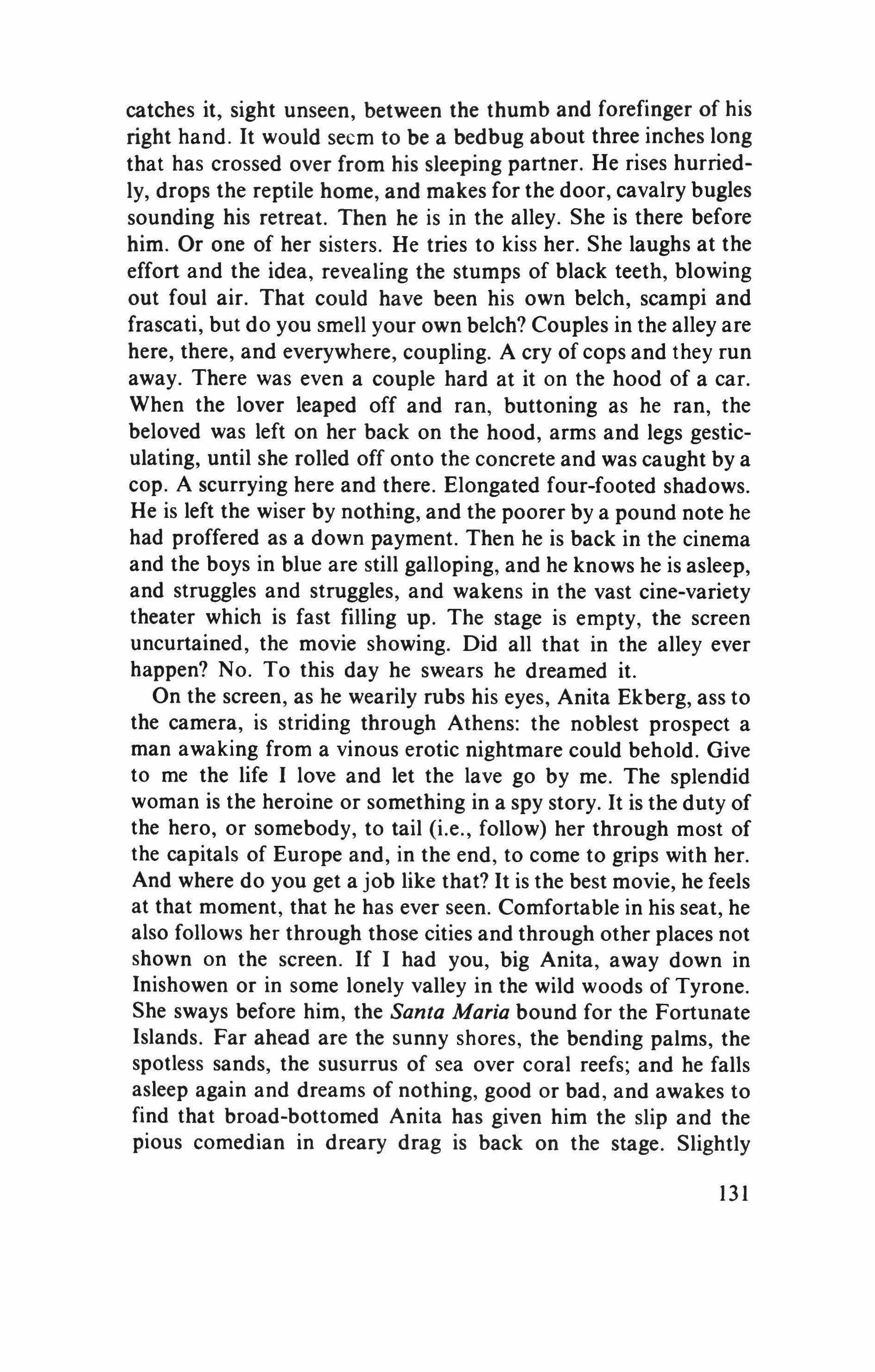
catches it, sight unseen, between the thumb and forefinger of his right hand. It would seem to be a bedbug about three inches long that has crossed over from his sleeping partner. He rises hurriedly, drops the reptile home, and makes for the door, cavalry bugles sounding his retreat. Then he is in the alley. She is there before him. Or one of her sisters. He tries to kiss her. She laughs at the effort and the idea, revealing the stumps of black teeth, blowing out foul air. That could have been his own belch, scampi and frascati, but do you smell your own belch? Couples in the alley are here, there, and everywhere, coupling. A cry of cops and they run away. There was even a couple hard at it on the hood of a car. When the lover leaped off and ran, buttoning as he ran, the beloved was left on her back on the hood, arms and legs gesticulating, until she rolled off onto the concrete and was caught by a cop. A scurrying here and there. Elongated four-footed shadows. He is left the wiser by nothing, and the poorer by a pound note he had proffered as a down payment. Then he is back in the cinema and the boys in blue are still galloping, and he knows he is asleep, and struggles and struggles, and wakens in the vast cine-variety theater which is fast filling up. The stage is empty, the screen uncurtained, the movie showing. Did all that in the alley ever happen? No. To this day he swears he dreamed it.
On the screen, as he wearily rubs his eyes, Anita Ekberg, ass to the camera, is striding through Athens: the noblest prospect a man awaking from a vinous erotic nightmare could behold. Give to me the life I love and let the lave go by me. The splendid woman is the heroine or something in a spy story. It is the duty of the hero, or somebody, to tail (i.e., follow) her through most of the capitals of Europe and, in the end, to come to grips with her. And where do you get a job like that? It is the best movie, he feels at that moment, that he has ever seen. Comfortable in his seat, he also follows her through those cities and through other places not shown on the screen. If I had you, big Anita, away down in Inishowen or in some lonely valley in the wild woods of Tyrone. She sways before him, the Santa Maria bound for the Fortunate Islands. Far ahead are the sunny shores, the bending palms, the spotless sands, the susurrus of sea over coral reefs; and he falls asleep again and dreams of nothing, good or bad, and awakes to find that broad-bottomed Anita has given him the slip and the pious comedian in dreary drag is back on the stage. Slightly
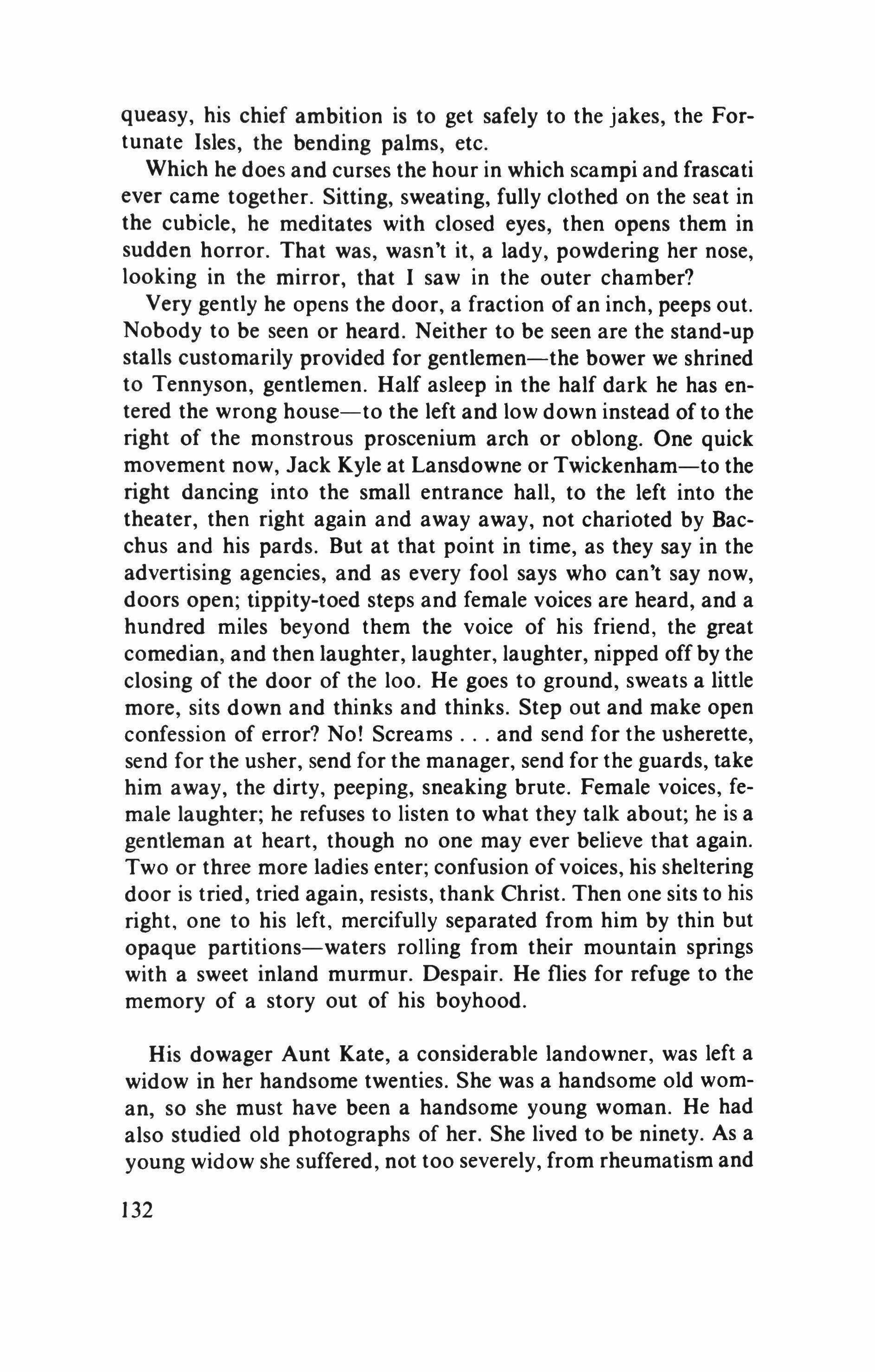
queasy, his chief ambition is to get safely to the jakes, the Fortunate Isles, the bending palms, etc.
Which he does and curses the hour in which scampi and frascati ever came together. Sitting, sweating, fully clothed on the seat in the cubicle, he meditates with closed eyes, then opens them in sudden horror. That was, wasn't it, a lady, powdering her nose, looking in the mirror, that I saw in the outer chamber?
Very gently he opens the door, a fraction of an inch, peeps out. Nobody to be seen or heard. Neither to be seen are the stand-up stalls customarily provided for gentlemen-the bower we shrined to Tennyson, gentlemen. Half asleep in the half dark he has entered the wrong house-to the left and low down instead of to the right of the monstrous proscenium arch or oblong. One quick movement now, Jack Kyle at Lansdowne or Twickenham-to the right dancing into the small entrance hall, to the left into the theater, then right again and away away, not charioted by Bacchus and his pards. But at that point in time, as they say in the advertising agencies, and as every fool says who can't say now, doors open; tippity-toed steps and female voices are heard, and a hundred miles beyond them the voice of his friend, the great comedian, and then laughter, laughter, laughter, nipped off by the closing of the door of the 100. He goes to ground, sweats a little more, sits down and thinks and thinks. Step out and make open confession of error? No! Screams and send for the usherette, send for the usher, send for the manager, send for the guards, take him away, the dirty, peeping, sneaking brute. Female voices, female laughter; he refuses to listen to what they talk about; he is a gentleman at heart, though no one may ever believe that again. Two or three more ladies enter; confusion of voices, his sheltering door is tried, tried again, resists, thank Christ. Then one sits to his right. one to his left, mercifully separated from him by thin but opaque partitions-waters rolling from their mountain springs with a sweet inland murmur. Despair. He flies for refuge to the memory of a story out of his boyhood.
His dowager Aunt Kate, a considerable landowner, was left a widow in her handsome twenties. She was a handsome old woman, so she must have been a handsome young woman. He had also studied old photographs of her. She lived to be ninety. As a young widow she suffered, not too severely, from rheumatism and
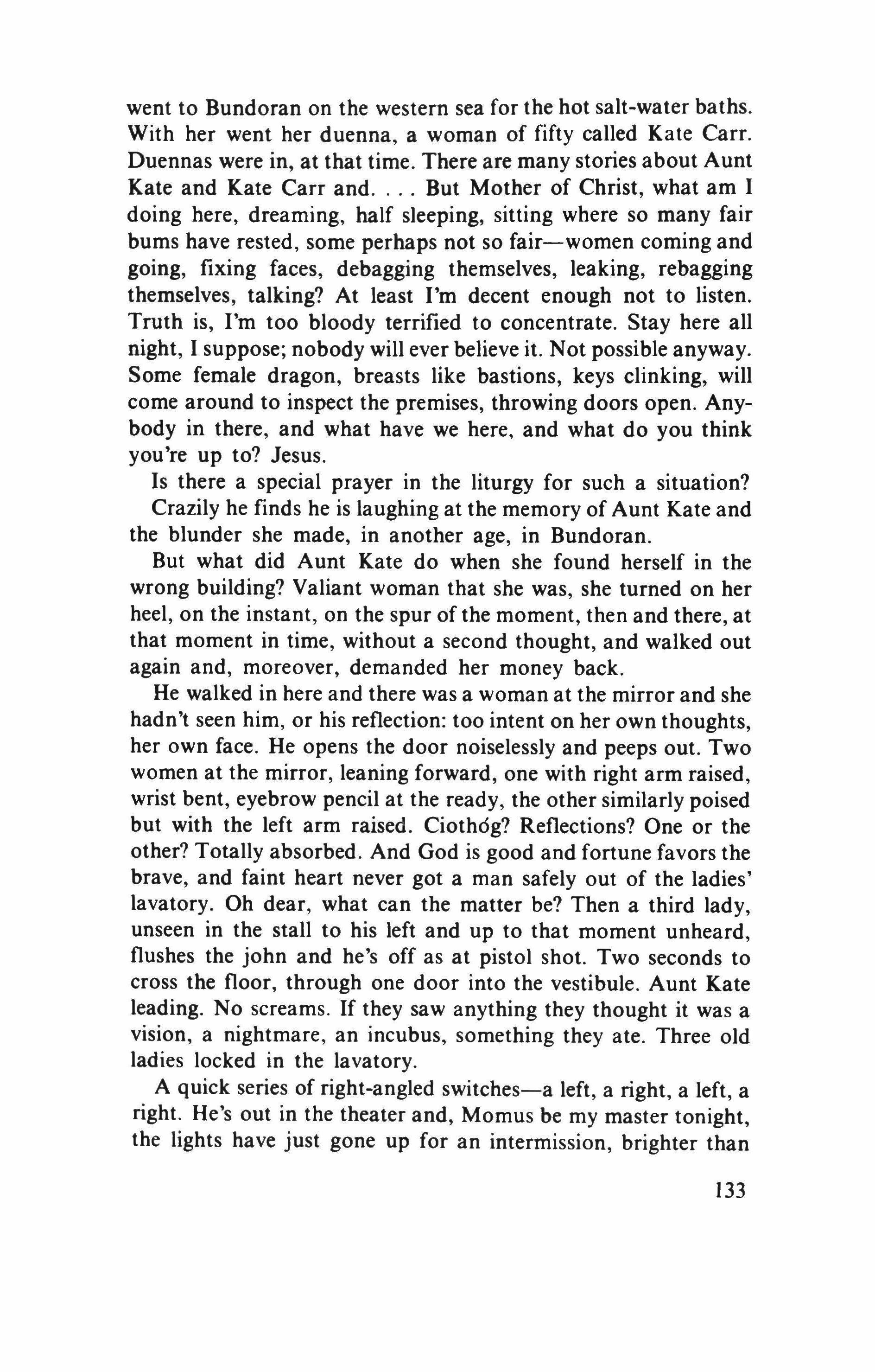
went to Bundoran on the western sea for the hot salt-water baths. With her went her duenna, a woman of fifty called Kate Carr. Duennas were in, at that time. There are many stories about Aunt Kate and Kate Carr and But Mother of Christ, what am I doing here, dreaming, half sleeping, sitting where so many fair bums have rested, some perhaps not so fair-women coming and going, fixing faces, debagging themselves, leaking, rebagging themselves, talking? At least I'm decent enough not to listen. Truth is, I'm too bloody terrified to concentrate. Stay here all night, I suppose; nobody will ever believe it. Not possible anyway. Some female dragon, breasts like bastions, keys clinking, will come around to inspect the premises, throwing doors open. Anybody in there, and what have we here, and what do you think you're up to? Jesus.
Is there a special prayer in the liturgy for such a situation?
Crazily he finds he is laughing at the memory of Aunt Kate and the blunder she made, in another age, in Bundoran.
But what did Aunt Kate do when she found herself in the wrong building? Valiant woman that she was, she turned on her heel, on the instant, on the spur of the moment, then and there, at that moment in time, without a second thought, and walked out again and, moreover, demanded her money back.
He walked in here and there was a woman at the mirror and she hadn't seen him, or his reflection: too intent on her own thoughts, her own face. He opens the door noiselessly and peeps out. Two women at the mirror, leaning forward, one with right arm raised, wrist bent, eyebrow pencil at the ready, the other similarly poised but with the left arm raised. Ciothog? Reflections? One or the other? Totally absorbed. And God is good and fortune favors the brave, and faint heart never got a man safely out of the ladies' lavatory. Oh dear, what can the matter be? Then a third lady, unseen in the stall to his left and up to that moment unheard, flushes the john and he's off as at pistol shot. Two seconds to cross the floor, through one door into the vestibule. Aunt Kate leading. No screams. If they saw anything they thought it was a vision, a nightmare, an incubus, something they ate. Three old ladies locked in the lavatory.
A quick series of right-angled switches-a left, a right, a left, a right. He's out in the theater and, Momus be my master tonight, the lights have just gone up for an intermission, brighter than
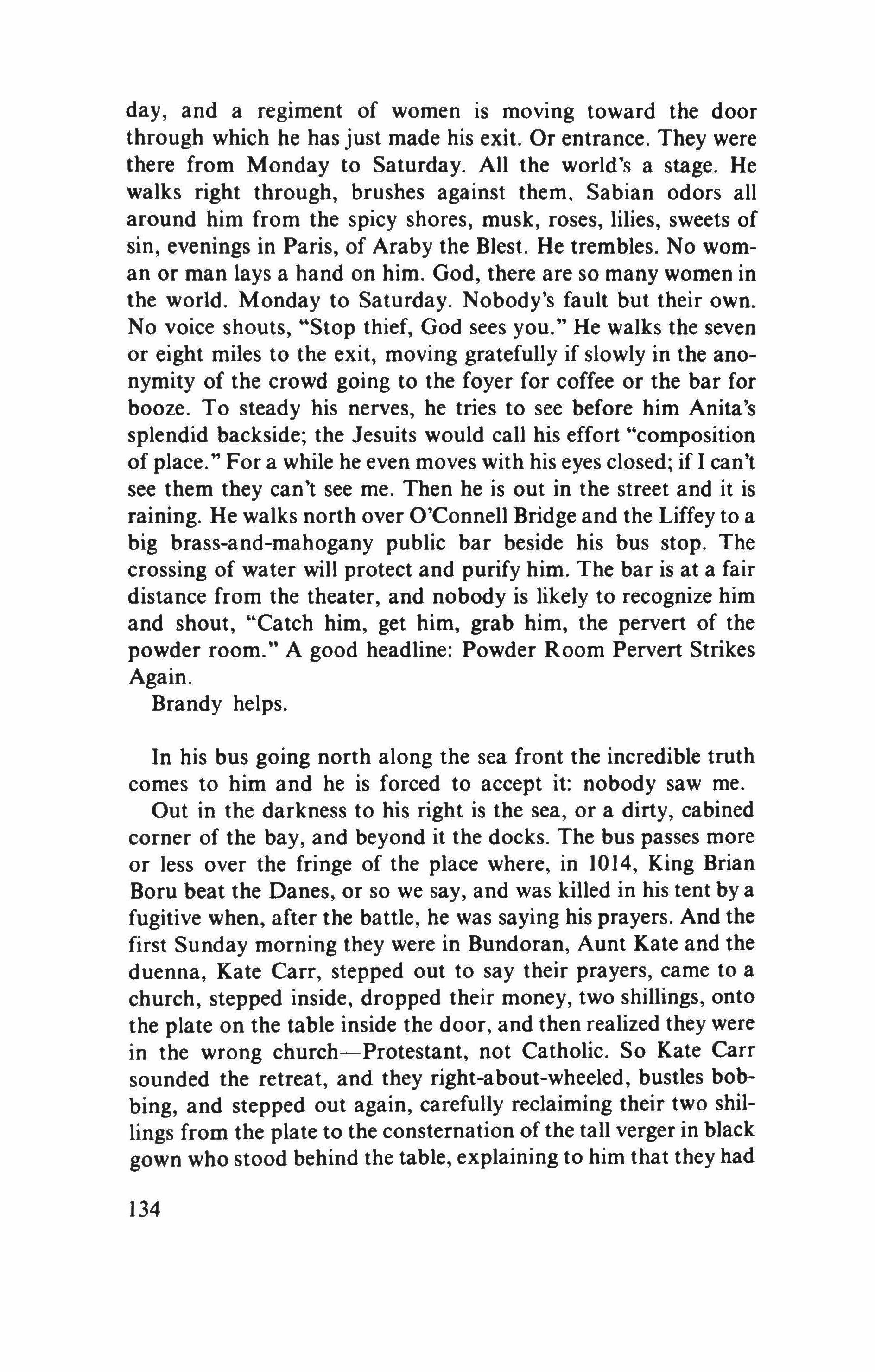
day, and a regiment of women is moving toward the door through which he has just made his exit. Or entrance. They were there from Monday to Saturday. All the world's a stage. He walks right through, brushes against them, Sabian odors all around him from the spicy shores, musk, roses, lilies, sweets of sin, evenings in Paris, of Araby the Blest. He trembles. No woman or man lays a hand on him. God, there are so many women in the world. Monday to Saturday. Nobody's fault but their own. No voice shouts, "Stop thief, God sees you." He walks the seven or eight miles to the exit, moving gratefully if slowly in the anonymity of the crowd going to the foyer for coffee or the bar for booze. To steady his nerves, he tries to see before him Anita's splendid backside; the Jesuits would call his effort "composition of place." For a while he even moves with his eyes closed; if I can't see them they can't see me. Then he is out in the street and it is raining. He walks north over O'Connell Bridge and the Liffey to a big brass-and-mahogany public bar beside his bus stop. The crossing of water will protect and purify him. The bar is at a fair distance from the theater, and nobody is likely to recognize him and shout, "Catch him, get him, grab him, the pervert of the powder room." A good headline: Powder Room Pervert Strikes Again. Brandy helps.
In his bus going north along the sea front the incredible truth comes to him and he is forced to accept it: nobody saw me. Out in the darkness to his right is the sea, or a dirty, cabined corner of the bay, and beyond it the docks. The bus passes more or less over the fringe of the place where, in 1014, King Brian Boru beat the Danes, or so we say, and was killed in his tent by a fugitive when, after the battle, he was saying his prayers. And the first Sunday morning they were in Bundoran, Aunt Kate and the duenna, Kate Carr, stepped out to say their prayers, came to a church, stepped inside, dropped their money, two shillings, onto the plate on the table inside the door, and then realized they were in the wrong church-Protestant, not Catholic. So Kate Carr sounded the retreat, and they right-about-wheeled bustles bobbing, and stepped out again, carefully reclaiming their two shillings from the plate to the consternation of the tall verger in black gown who stood behind the table, explaining to him that they had
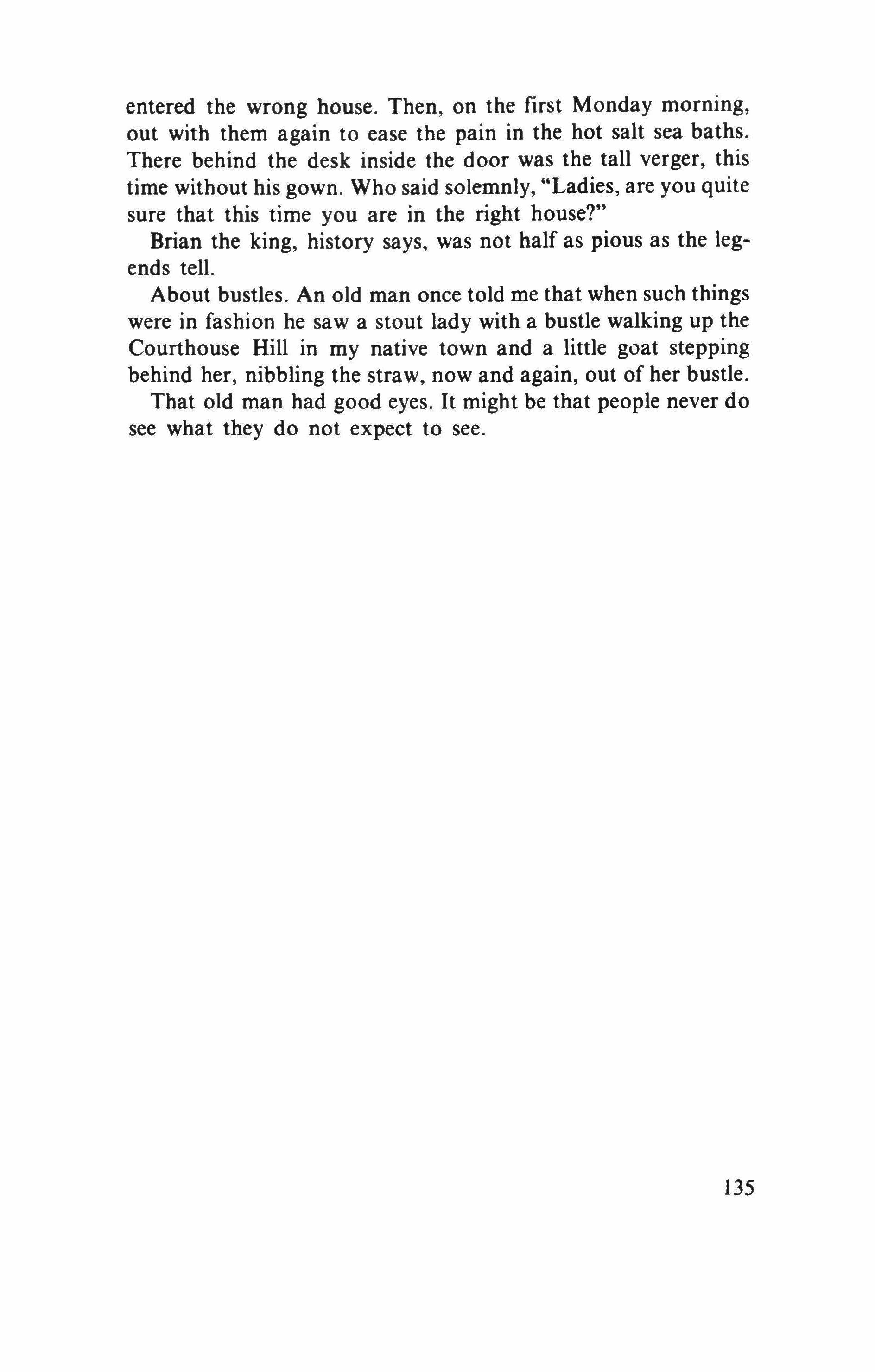
entered the wrong house. Then, on the first Monday morning, out with them again to ease the pain in the hot salt sea baths. There behind the desk inside the door was the tall verger, this time without his gown. Who said solemnly, "Ladies, are you quite sure that this time you are in the right house?"
Brian the king, history says, was not half as pious as the legends tell.
About bustles. An old man once told me that when such things were in fashion he saw a stout lady with a bustle walking up the Courthouse Hill in my native town and a little goat stepping behind her, nibbling the straw, now and again, out of her bustle.
That old man had good eyes. It might be that people never do see what they do not expect to see.

Here is the situation: it looks to Marian like a midlife crisis; my father suggests a leftover issue from my analysis; my mother says when she was my age she was menopausal; as long as my children have known me I've been given to ups and downs; Vera sees a fear of success, Michelle a problem with intimacy; my I Ching for this year is The Abyss. According to Janice what can you expect from a Saturn cycle-Saturn is a bitch, disturbance and redefinition in the area of the ego. She gave me an amulet to ward off the last two years but they happened anyway. And they're still happening. Maybe they would have been worse.
There haven't been many times when I thought being dead might be better. One was when I was five and had scarlet fever, the pain was so terrible and right in the same place as where I was thinking, all by myself for months because of the quarantine. Another was in high school, I was afraid I wouldn't even get into Brooklyn College just across the street, visible from the intermediate algebra class in which I was destroying my average and ruining my parents' lives. And then in one too many northeastern winters I had two little kids coming down with something and no housekeeper, no husband, no lover, no money,
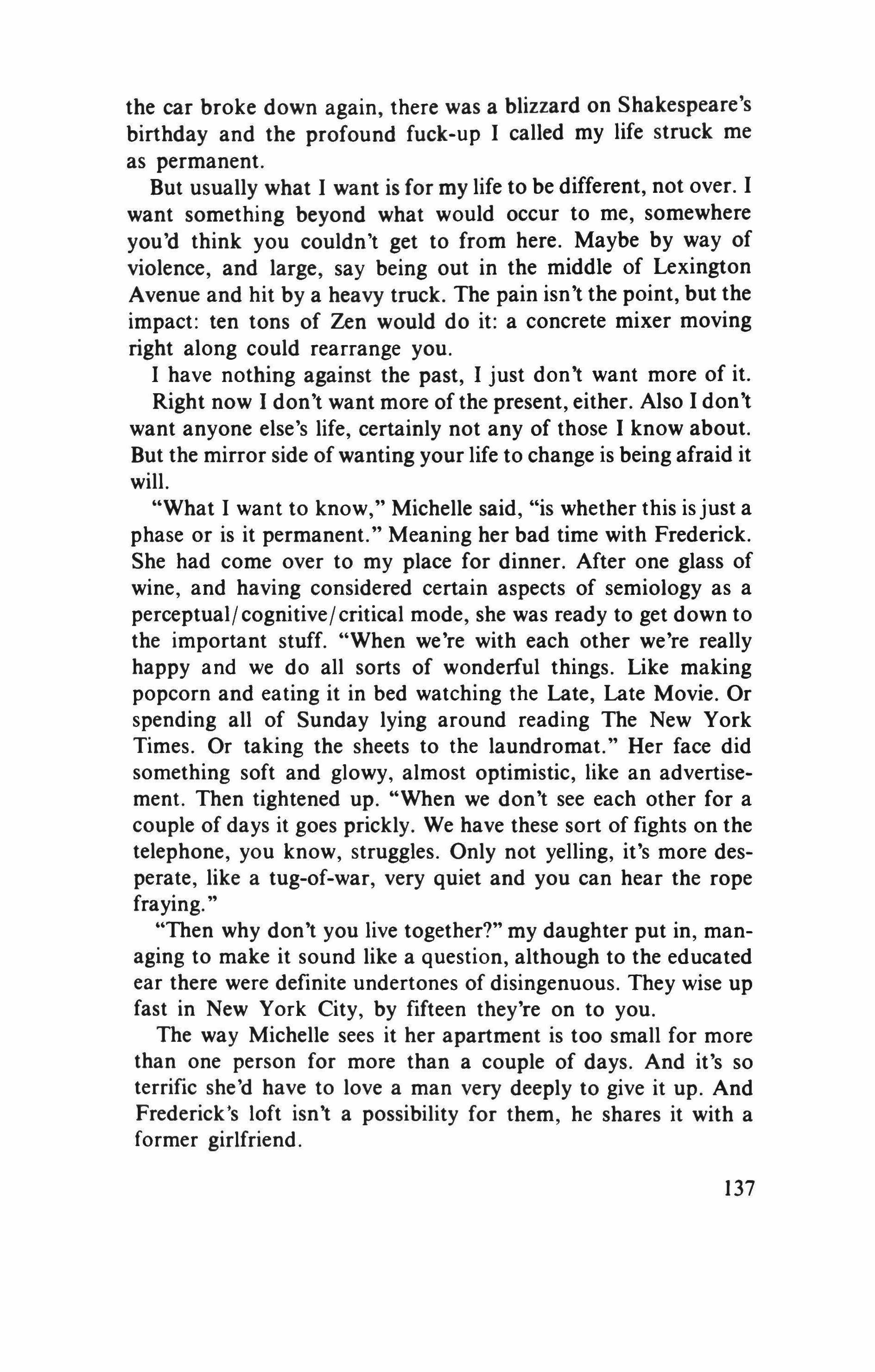
the car broke down again, there was a blizzard on Shakespeare's birthday and the profound fuck-up I called my life struck me as permanent.
But usually what I want is for my life to be different, not over. I want something beyond what would occur to me, somewhere you'd think you couldn't get to from here. Maybe by way of violence, and large, say being out in the middle of Lexington Avenue and hit by a heavy truck. The pain isn't the point, but the impact: ten tons of Zen would do it: a concrete mixer moving right along could rearrange you.
I have nothing against the past, I just don't want more of it.
Right now I don't want more ofthe present, either. Also I don't want anyone else's life, certainly not any of those I know about. But the mirror side of wanting your life to change is being afraid it will.
"What I want to know," Michelle said, "is whether this is just a phase or is it permanent." Meaning her bad time with Frederick. She had come over to my place for dinner. After one glass of wine, and having considered certain aspects of semiology as a perceptual/cognitive/ critical mode, she was ready to get down to the important stuff. "When we're with each other we're really happy and we do all sorts of wonderful things. Like making popcorn and eating it in bed watching the Late, Late Movie. Or spending all of Sunday lying around reading The New York Times. Or taking the sheets to the laundromat." Her face did something soft and glowy, almost optimistic, like an advertisement. Then tightened up. "When we don't see each other for a couple of days it goes prickly. We have these sort of fights on the telephone, you know, struggles. Only not yelling, it's more desperate, like a tug-of-war, very quiet and you can hear the rope fraying.
"Then why don't you live together?" my daughter put in, managing to make it sound like a question, although to the educated ear there were definite undertones of disingenuous. They wise up fast in New York City, by fifteen they're on to you.
The way Michelle sees it her apartment is too small for more than one person for more than a couple of days. And it's so terrific she'd have to love a man very deeply to give it up. And Frederick's loft isn't a possibility for them, he shares it with a former girlfriend.
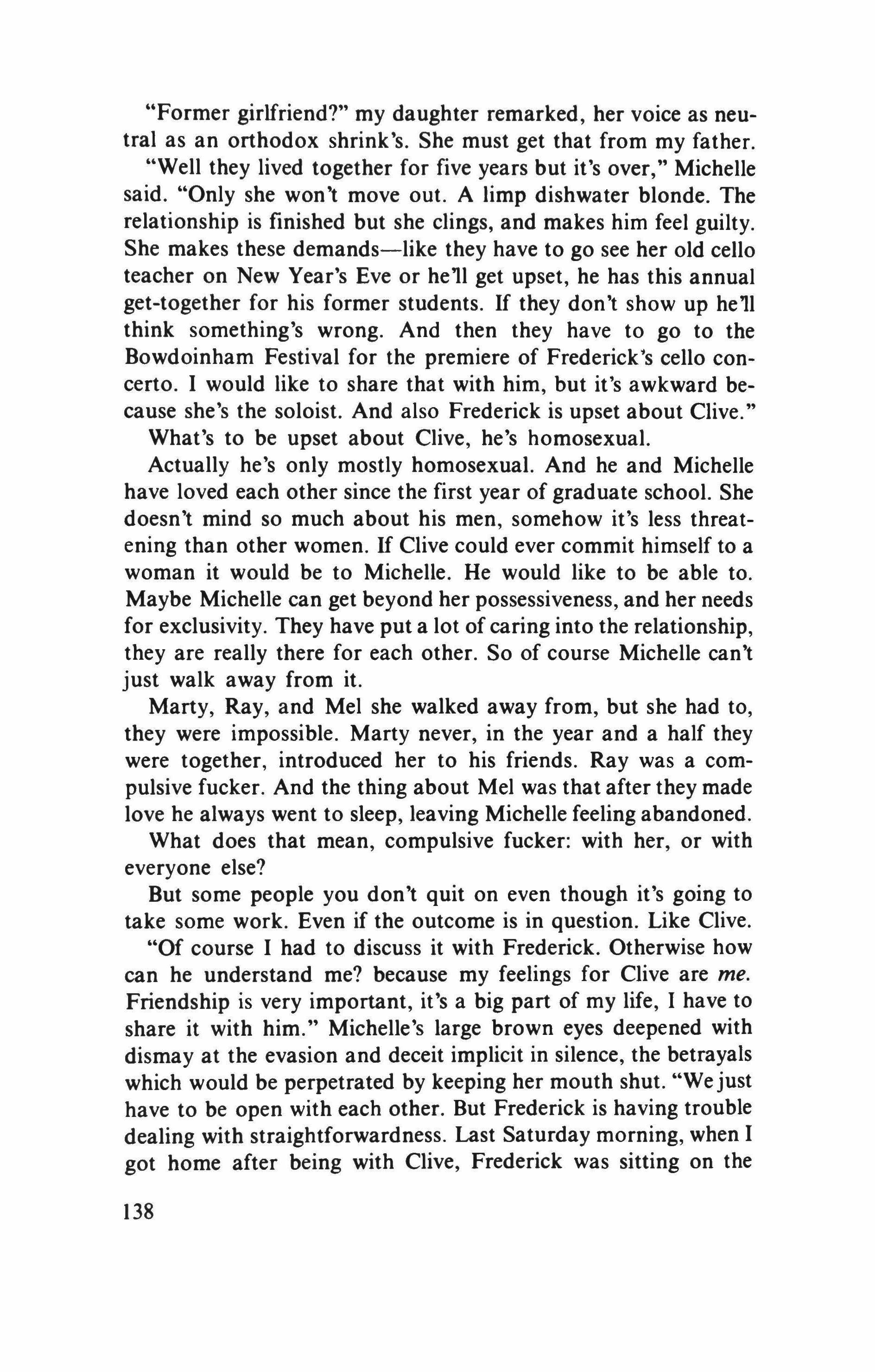
"Former girlfriend?" my daughter remarked, her voice as neutral as an orthodox shrink's. She must get that from my father.
"Well they lived together for five years but it's over," Michelle said. "Only she won't move out. A limp dishwater blonde. The relationship is finished but she clings, and makes him feel guilty. She makes these demands-like they have to go see her old cello teacher on New Year's Eve or he'll get upset, he has this annual get-together for his former students. If they don't show up he'll think something's wrong. And then they have to go to the Bowdoinham Festival for the premiere of Frederick's cello concerto. I would like to share that with him, but it's awkward because she's the soloist. And also Frederick is upset about Clive." What's to be upset about Clive, he's homosexual.
Actually he's only mostly homosexual. And he and Michelle have loved each other since the first year of graduate school. She doesn't mind so much about his men, somehow it's less threatening than other women. If Clive could ever commit himself to a woman it would be to Michelle. He would like to be able to.
Maybe Michelle can get beyond her possessiveness, and her needs for exclusivity. They have put a lot of caring into the relationship, they are really there for each other. So of course Michelle can't just walk away from it.
Marty, Ray, and Mel she walked away from, but she had to, they were impossible. Marty never, in the year and a half they were together, introduced her to his friends. Ray was a compulsive fucker. And the thing about Mel was that after they made love he always went to sleep, leaving Michelle feeling abandoned. What does that mean, compulsive fucker: with her, or with everyone else?
But some people you don't quit on even though it's going to take some work. Even if the outcome is in question. Like Clive.
"Of course I had to discuss it with Frederick. Otherwise how can he understand me? because my feelings for Clive are me. Friendship is very important, it's a big part of my life, I have to share it with him." Michelle's large brown eyes deepened with dismay at the evasion and deceit implicit in silence, the betrayals which would be perpetrated by keeping her mouth shut. "We just have to be open with each other. But Frederick is having trouble dealing with straightforwardness. Last Saturday morning, when I got home after being with Clive, Frederick was sitting on the
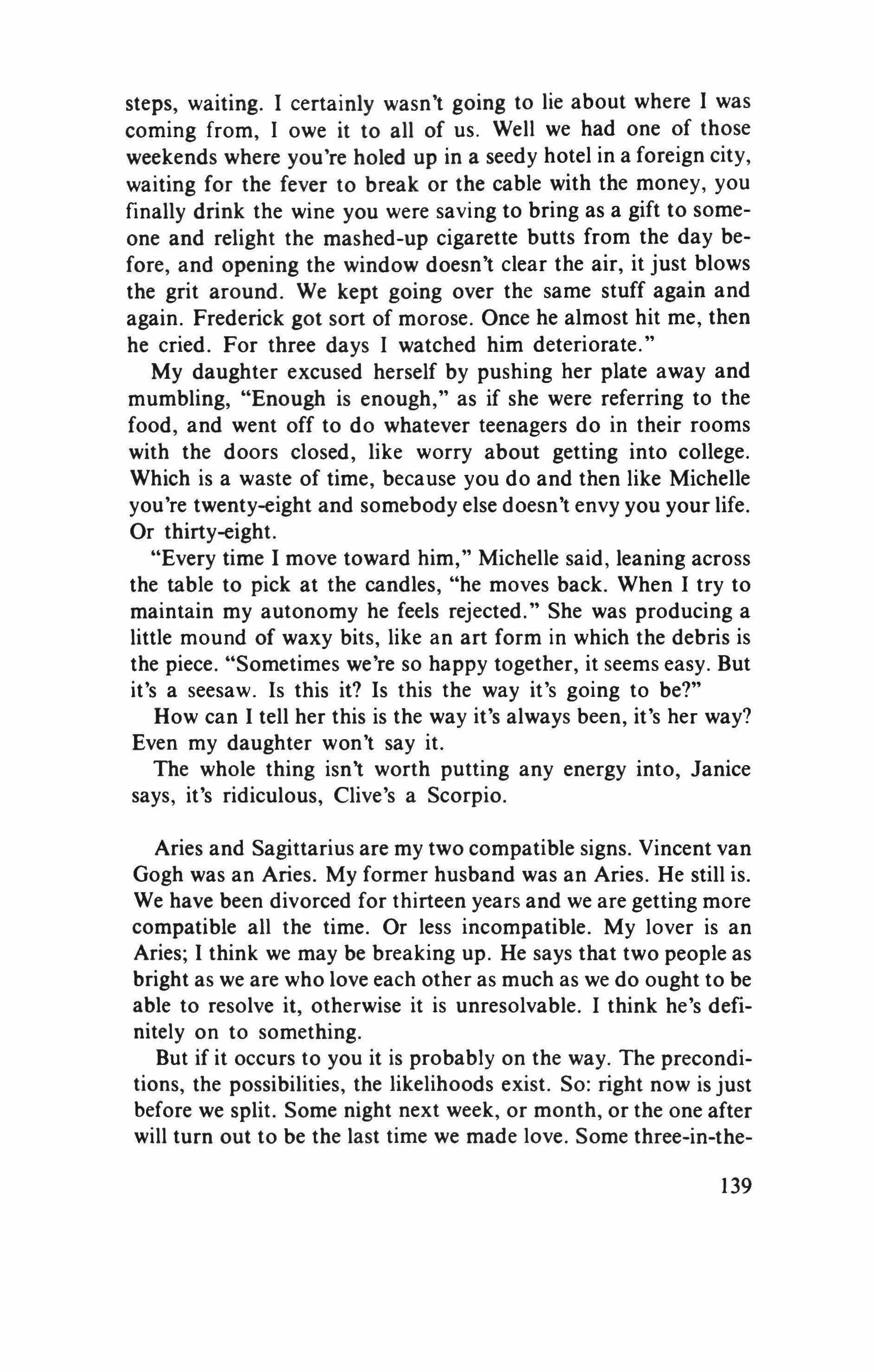
steps, waiting. I certainly wasn't going to lie about where I was coming from, lowe it to all of us. Well we had one of those weekends where you're holed up in a seedy hotel in a foreign city, waiting for the fever to break or the cable with the money, you finally drink the wine you were saving to bring as a gift to someone and relight the mashed-up cigarette butts from the day before, and opening the window doesn't clear the air, it just blows the grit around. We kept going over the same stuff again and again. Frederick got sort of morose. Once he almost hit me, then he cried. For three days I watched him deteriorate."
My daughter excused herself by pushing her plate away and mumbling, "Enough is enough," as if she were referring to the food, and went off to do whatever teenagers do in their rooms with the doors closed, like worry about getting into college. Which is a waste of time, because you do and then like Michelle you're twenty-eight and somebody else doesn't envy you your life. Or thirty-eight.
"Every time I move toward him," Michelle said, leaning across the table to pick at the candles, "he moves back. When I try to maintain my autonomy he feels rejected." She was producing a little mound of waxy bits, like an art form in which the debris is the piece. "Sometimes we're so happy together, it seems easy. But it's a seesaw. Is this it? Is this the way it's going to be?"
How can I tell her this is the way it's always been, it's her way? Even my daughter won't say it.
The whole thing isn't worth putting any energy into, Janice says, it's ridiculous, Clive's a Scorpio.
Aries and Sagittarius are my two compatible signs. Vincent van Gogh was an Aries. My former husband was an Aries. He still is. We have been divorced for thirteen years and we are getting more compatible all the time. Or less incompatible. My lover is an Aries; I think we may be breaking up. He says that two people as bright as we are who love each other as much as we do ought to be able to resolve it, otherwise it is unresolvable. I think he's definitely on to something.
But if it occurs to you it is probably on the way. The preconditions, the possibilities, the likelihoods exist. So: right now is just before we split. Some night next week, or month, or the one after will turn out to be the last time we made love. Some three-in-the-
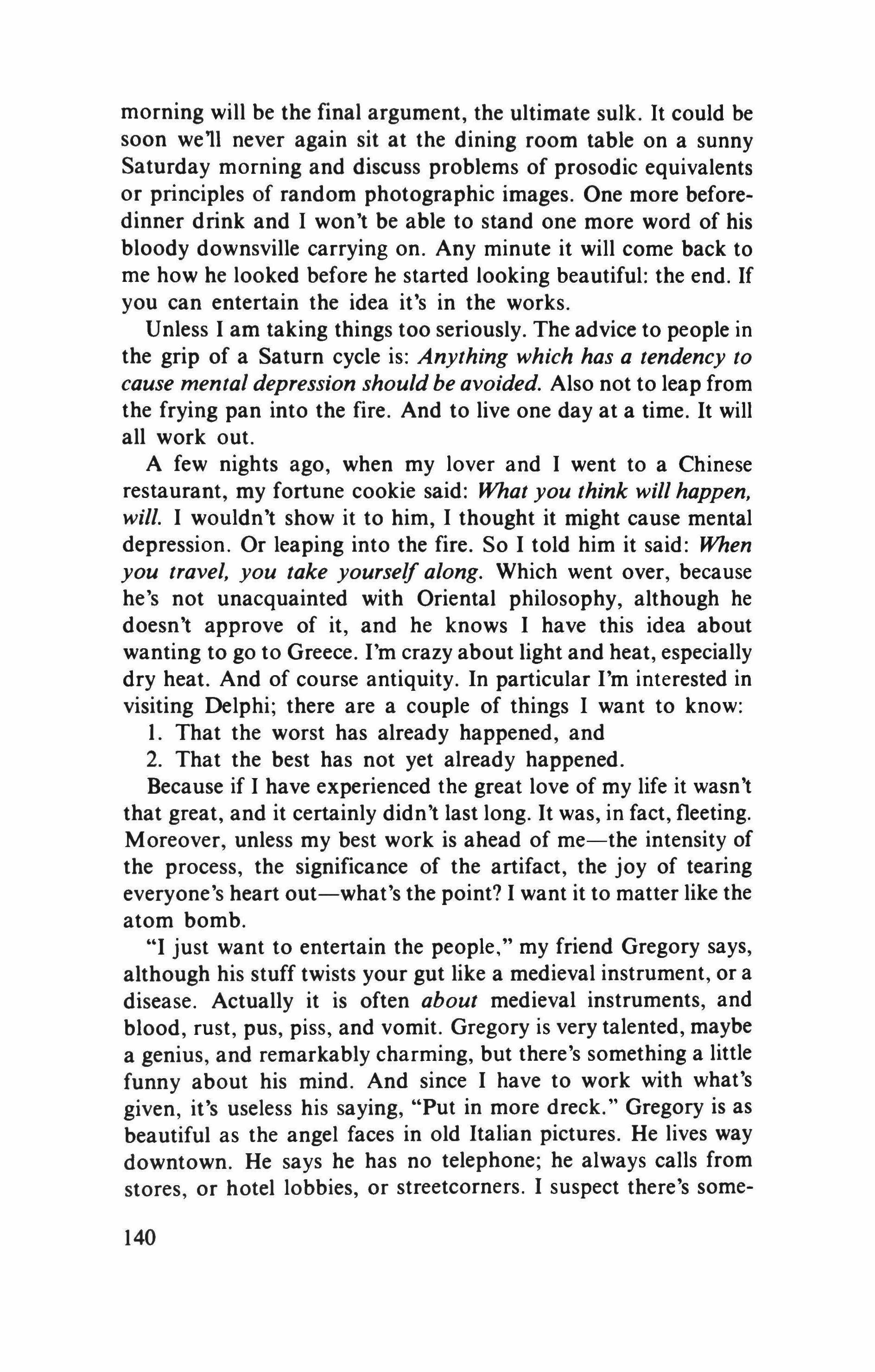
morning will be the final argument, the ultimate sulk. It could be soon we'll never again sit at the dining room table on a sunny Saturday morning and discuss problems of prosodic equivalents or principles of random photographic images. One more beforedinner drink and I won't be able to stand one more word of his bloody downsville carrying on. Any minute it will come back to me how he looked before he started looking beautiful: the end. If you can entertain the idea it's in the works.
Unless I am taking things too seriously. The advice to people in the grip of a Saturn cycle is: Anything which has a tendency to cause mental depression should be avoided. Also not to leap from the frying pan into the fire. And to live one day at a time. It will all work out.
A few nights ago, when my lover and I went to a Chinese restaurant, my fortune cookie said: What you think will happen, will. I wouldn't show it to him, I thought it might cause mental depression. Or leaping into the fire. So I told him it said: When you travel, you take yourself along. Which went over, because he's not unacquainted with Oriental philosophy, although he doesn't approve of it, and he knows I have this idea about wanting to go to Greece. I'm crazy about light and heat, especially dry heat. And of course antiquity. In particular I'm interested in visiting Delphi; there are a couple of things I want to know:
1. That the worst has already happened, and
2. That the best has not yet already happened.
Because if I have experienced the great love of my life it wasn't that great, and it certainly didn't last long. It was, in fact, fleeting. Moreover, unless my best work is ahead of me-the intensity of the process, the significance of the artifact, the joy of tearing everyone's heart out-what's the point? I want it to matter like the atom bomb.
"I just want to entertain the people," my friend Gregory says, although his stuff twists your gut like a medieval instrument, or a disease. Actually it is often about medieval instruments, and blood, rust, pus, piss, and vomit. Gregory is very talented, maybe a genius, and remarkably charming, but there's something a little funny about his mind. And since I have to work with what's given, it's useless his saying, "Put in more dreck." Gregory is as beautiful as the angel faces in old Italian pictures. He lives way downtown. He says he has no telephone; he always calls from stores, or hotel lobbies, or streetcorners. I suspect there's some-
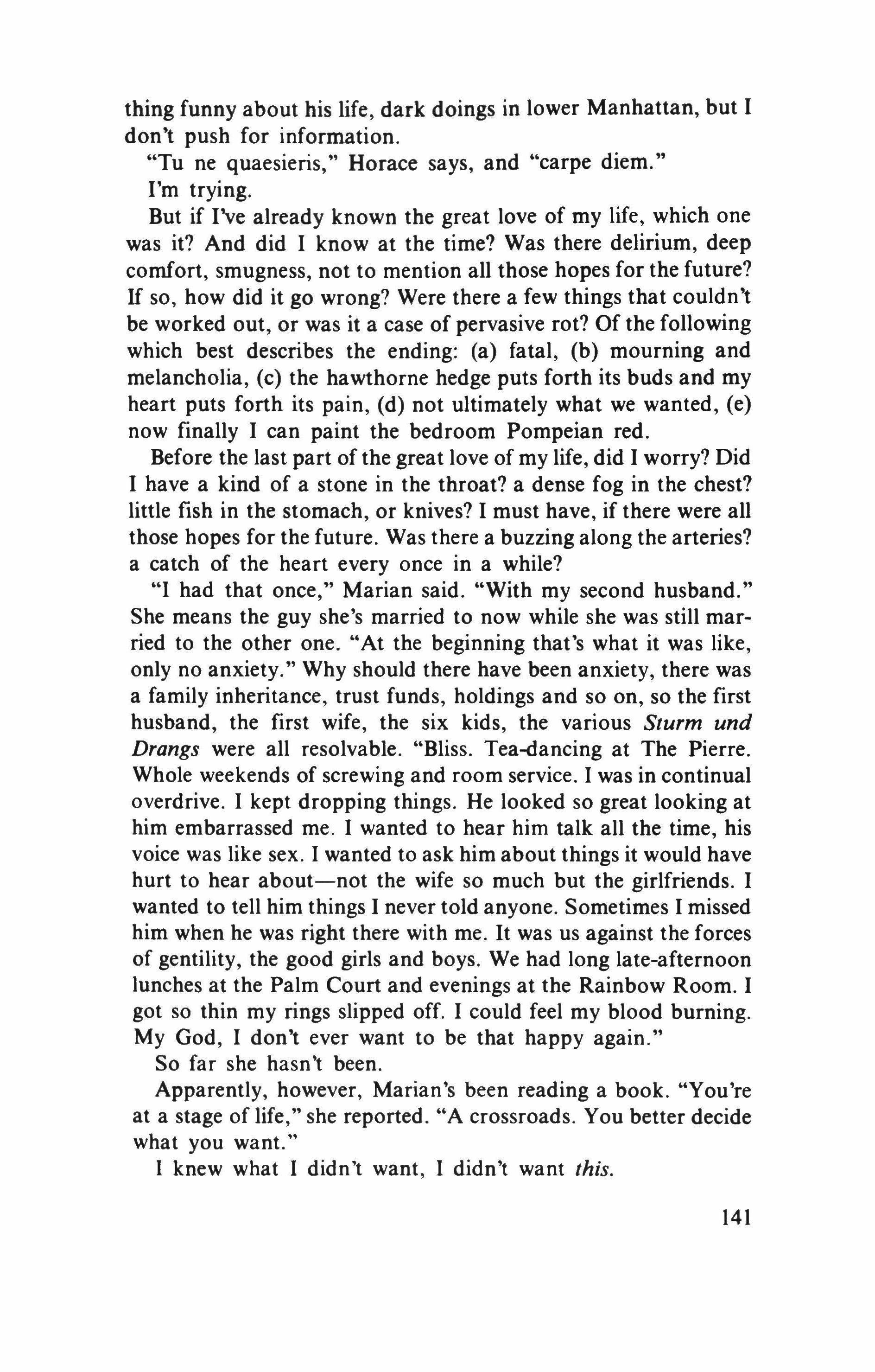
thing funny about his life, dark doings in lower Manhattan, but I don't push for information.
"Tu ne quaesieris," Horace says, and "carpe diem."
I'm trying.
But if I've already known the great love of my life, which one was it? And did 1 know at the time? Was there delirium, deep comfort, smugness, not to mention all those hopes for the future? If so, how did it go wrong? Were there a few things that couldn't be worked out, or was it a case of pervasive rot? Of the following which best describes the ending: (a) fatal, (b) mourning and melancholia, (c) the hawthorne hedge puts forth its buds and my heart puts forth its pain, (d) not ultimately what we wanted, (e) now finally 1 can paint the bedroom Pompeian red.
Before the last part of the great love of my life, did 1 worry? Did 1 have a kind of a stone in the throat? a dense fog in the chest? little fish in the stomach, or knives? I must have, if there were all those hopes for the future. Was there a buzzing along the arteries? a catch of the heart every once in a while?
"I had that once," Marian said. "With my second husband." She means the guy she's married to now while she was still married to the other one. "At the beginning that's what it was like, only no anxiety." Why should there have been anxiety, there was a family inheritance, trust funds, holdings and so on, so the first husband, the first wife, the six kids, the various Sturm und Drangs were all resolvable. "Bliss. Tea-dancing at The Pierre. Whole weekends of screwing and room service. 1 was in continual overdrive. 1 kept dropping things. He looked so great looking at him embarrassed me. 1 wanted to hear him talk all the time, his voice was like sex. I wanted to ask him about things it would have hurt to hear about-not the wife so much but the girlfriends. 1 wanted to tell him things I never told anyone. Sometimes I missed him when he was right there with me. It was us against the forces of gentility, the good girls and boys. We had long late-afternoon lunches at the Palm Court and evenings at the Rainbow Room. I got so thin my rings slipped off. I could feel my blood burning. My God, I don't ever want to be that happy again."
So far she hasn't been.
Apparently, however, Marian's been reading a book. "You're at a stage of life," she reported. "A crossroads. You better decide what you want."
I knew what I didn't want, I didn't want this.
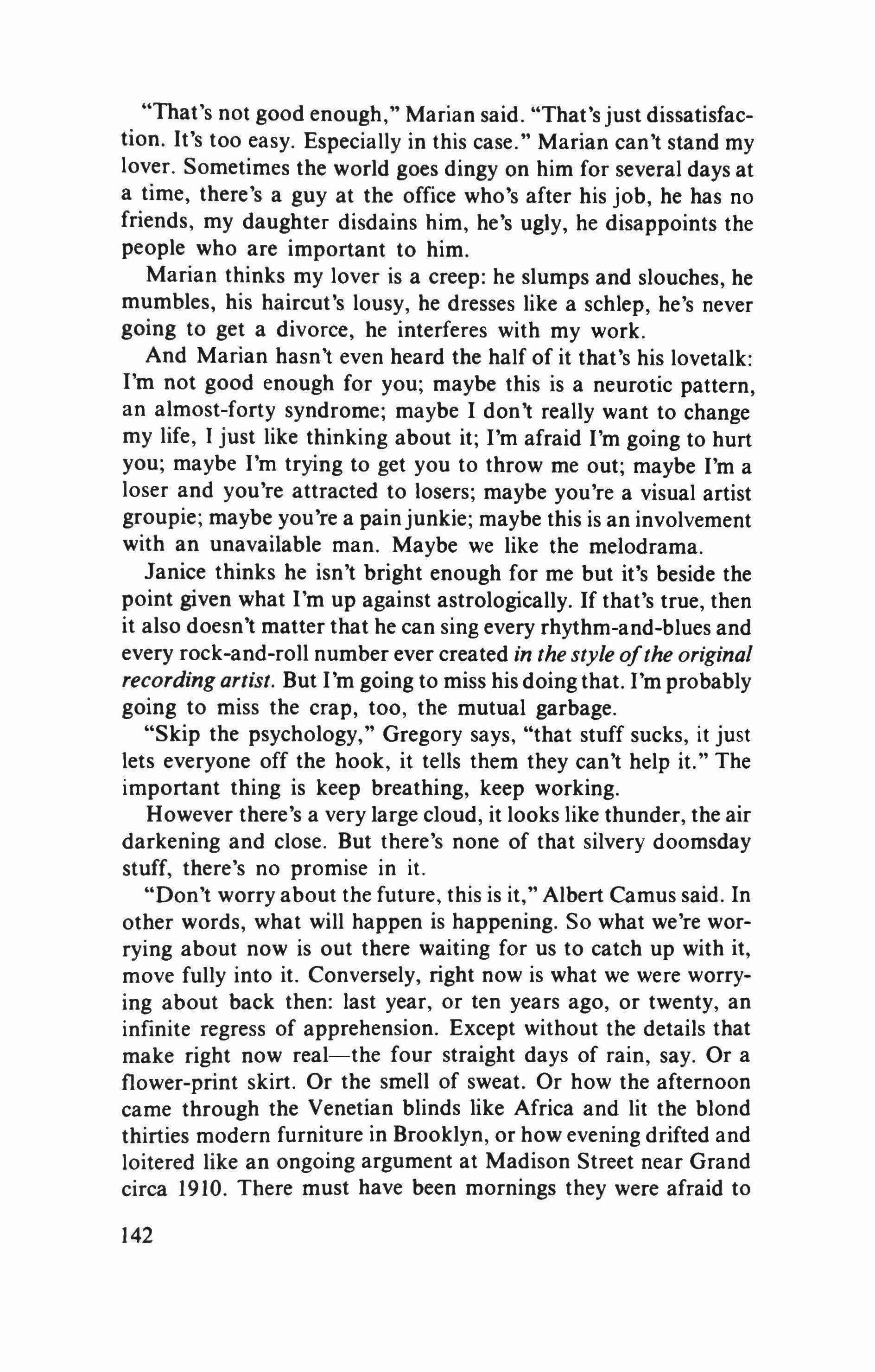
"That's not good enough," Marian said. "That's just dissatisfaction. It's too easy. Especially in this case." Marian can't stand my lover. Sometimes the world goes dingy on him for several days at a time, there's a guy at the office who's after his job, he has no friends, my daughter disdains him, he's ugly, he disappoints the people who are important to him.
Marian thinks my lover is a creep: he slumps and slouches, he mumbles, his haircut's lousy, he dresses like a schlep, he's never going to get a divorce, he interferes with my work.
And Marian hasn't even heard the half of it that's his lovetalk: I'm not good enough for you; maybe this is a neurotic pattern, an almost-forty syndrome; maybe I don't really want to change my life, I just like thinking about it; I'm afraid I'm going to hurt you; maybe I'm trying to get you to throw me out; maybe I'm a loser and you're attracted to losers; maybe you're a visual artist groupie; maybe you're a painjunkie; maybe this is an involvement with an unavailable man. Maybe we like the melodrama.
Janice thinks he isn't bright enough for me but it's beside the point given what I'm up against astrologically. If that's true, then it also doesn't matter that he can sing every rhythm-and-blues and every rock-and-roll number ever created in the style ofthe original recording artist. But I'm going to miss his doing that. I'm probably going to miss the crap, too, the mutual garbage.
"Skip the psychology," Gregory says, "that stuff sucks, it just lets everyone off the hook, it tells them they can't help it." The important thing is keep breathing, keep working.
However there's a very large cloud, it looks like thunder, the air darkening and close. But there's none of that silvery doomsday stuff, there's no promise in it.
"Don't worry about the future, this is it," Albert Camus said. In other words, what will happen is happening. So what we're worrying about now is out there waiting for us to catch up with it, move fully into it. Conversely, right now is what we were worrying about back then: last year, or ten years ago, or twenty, an infinite regress of apprehension. Except without the details that make right now real-the four straight days of rain, say. Or a flower-print skirt. Or the smell of sweat. Or how the afternoon came through the Venetian blinds like Africa and lit the blond thirties modern furniture in Brooklyn, or how evening drifted and loitered like an ongoing argument at Madison Street near Grand circa 1910. There must have been mornings they were afraid to
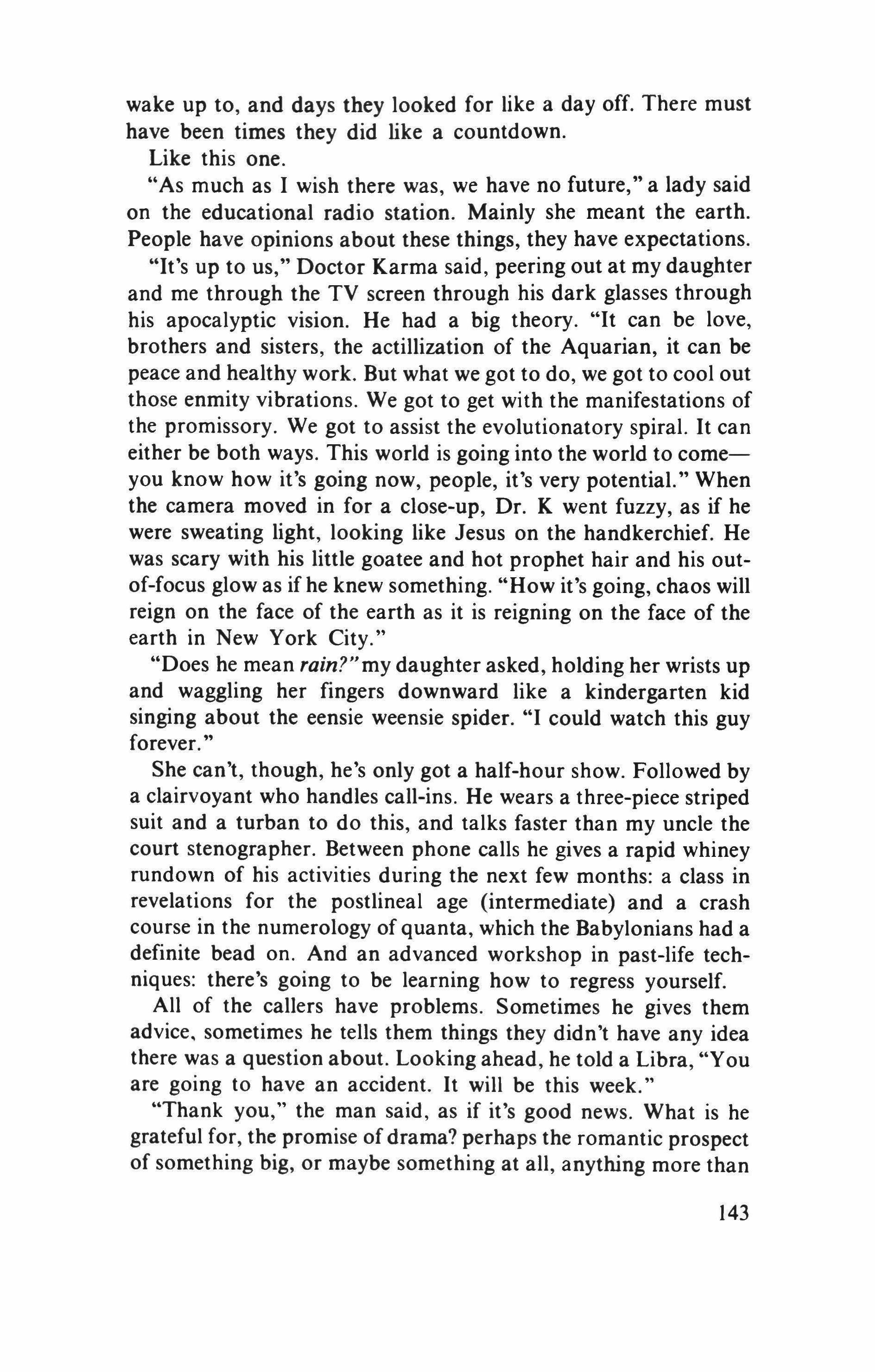
wake up to, and days they looked for like a day off. There must have been times they did like a countdown.
Like this one.
"As much as I wish there was, we have no future," a lady said on the educational radio station. Mainly she meant the earth. People have opinions about these things, they have expectations.
"It's up to us," Doctor Karma said, peering out at my daughter and me through the TV screen through his dark glasses through his apocalyptic vision. He had a big theory. "It can be love, brothers and sisters, the actillization of the Aquarian, it can be peace and healthy work. But what we got to do, we got to cool out those enmity vibrations. We got to get with the manifestations of the promissory. We got to assist the evolutionatory spiral. It can either be both ways. This world is going into the world to comeyou know how it's going now, people, it's very potential." When the camera moved in for a close-up, Dr. K went fuzzy, as if he were sweating light, looking like Jesus on the handkerchief. He was scary with his little goatee and hot prophet hair and his outof-focus glow as if he knew something. "How it's going, chaos will reign on the face of the earth as it is reigning on the face of the earth in New York City."
"Does he mean rain?"my daughter asked, holding her wrists up and waggling her fingers downward like a kindergarten kid singing about the eensie weensie spider. "I could watch this guy forever.
She can't, though, he's only got a half-hour show. Followed by a clairvoyant who handles call-ins. He wears a three-piece striped suit and a turban to do this, and talks faster than my uncle the court stenographer. Between phone calls he gives a rapid whiney rundown of his activities during the next few months: a class in revelations for the postlineal age (intermediate) and a crash course in the numerology of quanta, which the Babylonians had a definite bead on. And an advanced workshop in past-life techniques: there's going to be learning how to regress yourself.
All of the callers have problems. Sometimes he gives them advice, sometimes he tells them things they didn't have any idea there was a question about. Looking ahead, he told a Libra, "You are going to have an accident. It will be this week."
"Thank you," the man said, as if it's good news. What is he grateful for, the promise of drama? perhaps the romantic prospect of something big, or maybe something at all, anything more than
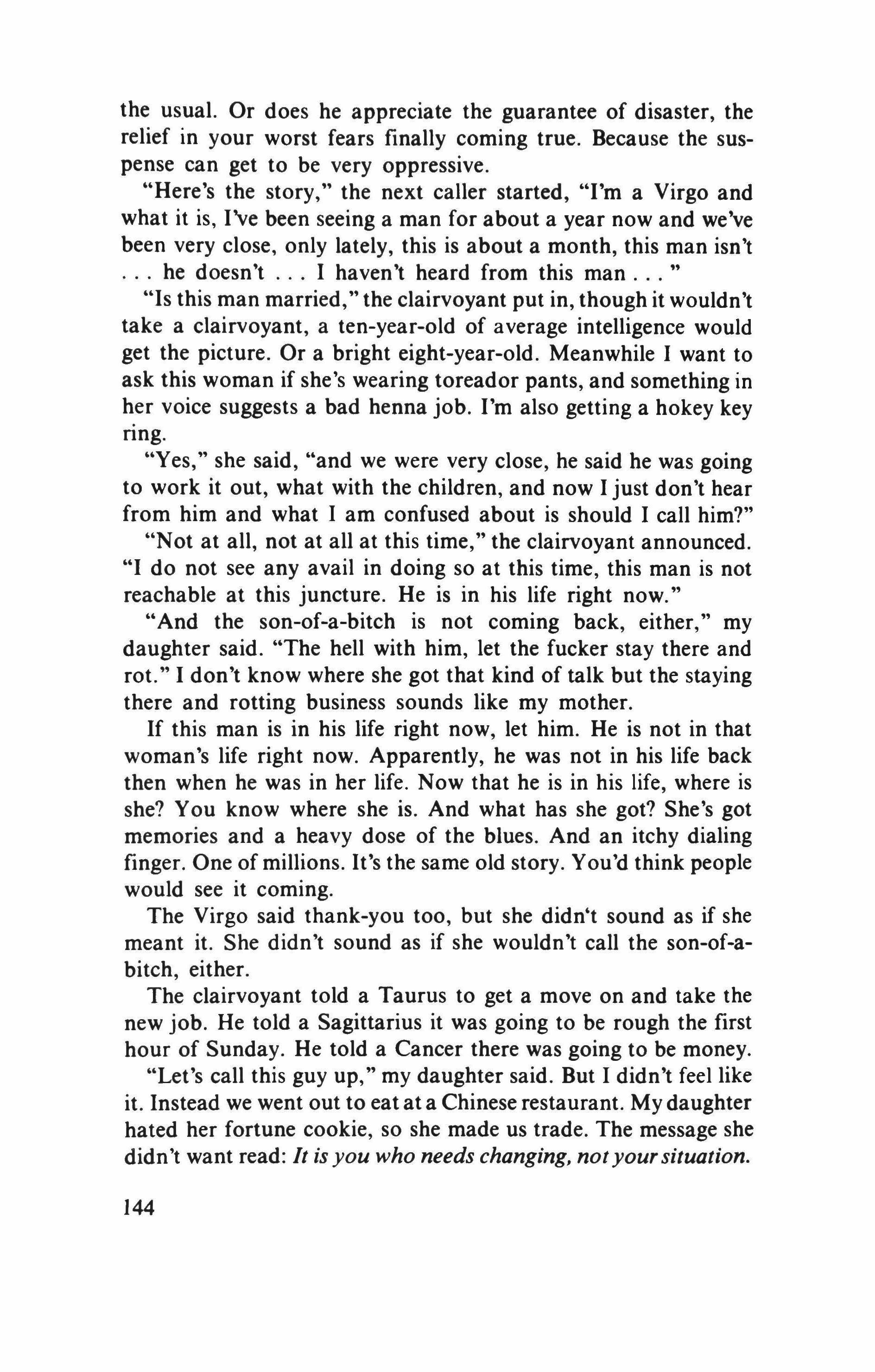
the usual. Or does he appreciate the guarantee of disaster, the relief in your worst fears finally coming true. Because the suspense can get to be very oppressive.
"Here's the story," the next caller started, "I'm a Virgo and what it is, I've been seeing a man for about a year now and we've been very close, only lately, this is about a month, this man isn't he doesn't I haven't heard from this man
"Is this man married," the clairvoyant put in, though it wouldn't take a clairvoyant, a ten-year-old of average intelligence would get the picture. Or a bright eight-year-old. Meanwhile I want to ask this woman if she's wearing toreador pants, and something in her voice suggests a bad henna job. I'm also getting a hokey key ring.
"Yes," she said, "and we were very close, he said he was going to work it out, what with the children, and now I just don't hear from him and what I am confused about is should I call him?"
"Not at all, not at all at this time," the clairvoyant announced. "I do not see any avail in doing so at this time, this man is not reachable at this juncture. He is in his life right now."
"And the son-of-a-bitch is not coming back, either," my daughter said. "The hell with him, let the fucker stay there and rot." I don't know where she got that kind of talk but the staying there and rotting business sounds like my mother.
If this man is in his life right now, let him. He is not in that woman's life right now. Apparently, he was not in his life back then when he was in her life. Now that he is in his life, where is she? You know where she is. And what has she got? She's got memories and a heavy dose of the blues. And an itchy dialing finger. One of millions. It's the same old story. You'd think people would see it coming.
The Virgo said thank-you too, but she didn't sound as if she meant it. She didn't sound as if she wouldn't call the son-of-abitch, either.
The clairvoyant told a Taurus to get a move on and take the new job. He told a Sagittarius it was going to be rough the first hour of Sunday. He told a Cancer there was going to be money.
"Let's call this guy up," my daughter said. But I didn't feel like it. Instead we went out to eat at a Chinese restaurant. My daughter hated her fortune cookie, so she made us trade. The message she didn't want read: It is you who needs changing, notyoursituation.

Maybe that's why people don't see it coming. And why they don't recognize their same old stories when they're in them.
There are two kinds of same old story: the one a person has been doing all along, over and over, and the one a person never did before but millions of others have. Either way they say, "But this is different." As if there's some doubt about the upshot.
And they ask all those questions: horoscopes, Tarot, I Ching, palm reading, psychoanalysis, tea leaves, Marxism, the Church, the weather report. And Anna Karenina.
As if they didn't know.
As if this time maybe Anna isn't going to end up under the train.
A couple of months ago my daughter and I were in the living room having a conversation, the rock-and-roll playing on the radio', early sundown with that beautiful rose-colored western light, when I looked out of the window. On the streetcorner a young woman whose long frizzy pale blonde hair had flowers twined in it was wearing a raggedy lace-trimmed lox-colored satin nightgown she was trying to pass off as a dress, and floppy sandals. What they call funky drop-dead chic. The effect went well beyond tacky.
"Look at that," I said. "Fantastic, she looks like Ophelia in the drowning scene."
"Oh my God," my daughter said, "you mean Ophelia drowns?"
"Of course Ophelia drowns. She looks just like this girl out there, with flowers, floating down the
"Don't tell me," my daughter said. "Now you've spoiled it. You're mean."
"You must be crazy," I said. "Everyone knows Ophelia drowns. I didn't spoil it. That's one of those things everyone knows: Ophelia drowns. That isn't even the important part. The thing is she goes mad and "Stop it!" she shouted. "You're just making it worse." She absolutely wouldn't come to the window to see the girl in the nightgown. "Just give me a fucking break and don't say a word to me about Oedipus."
She meant it. My daughter is the only person I know who is reading Oedipus for plot.
Sometimes you can't have a conversation with people.
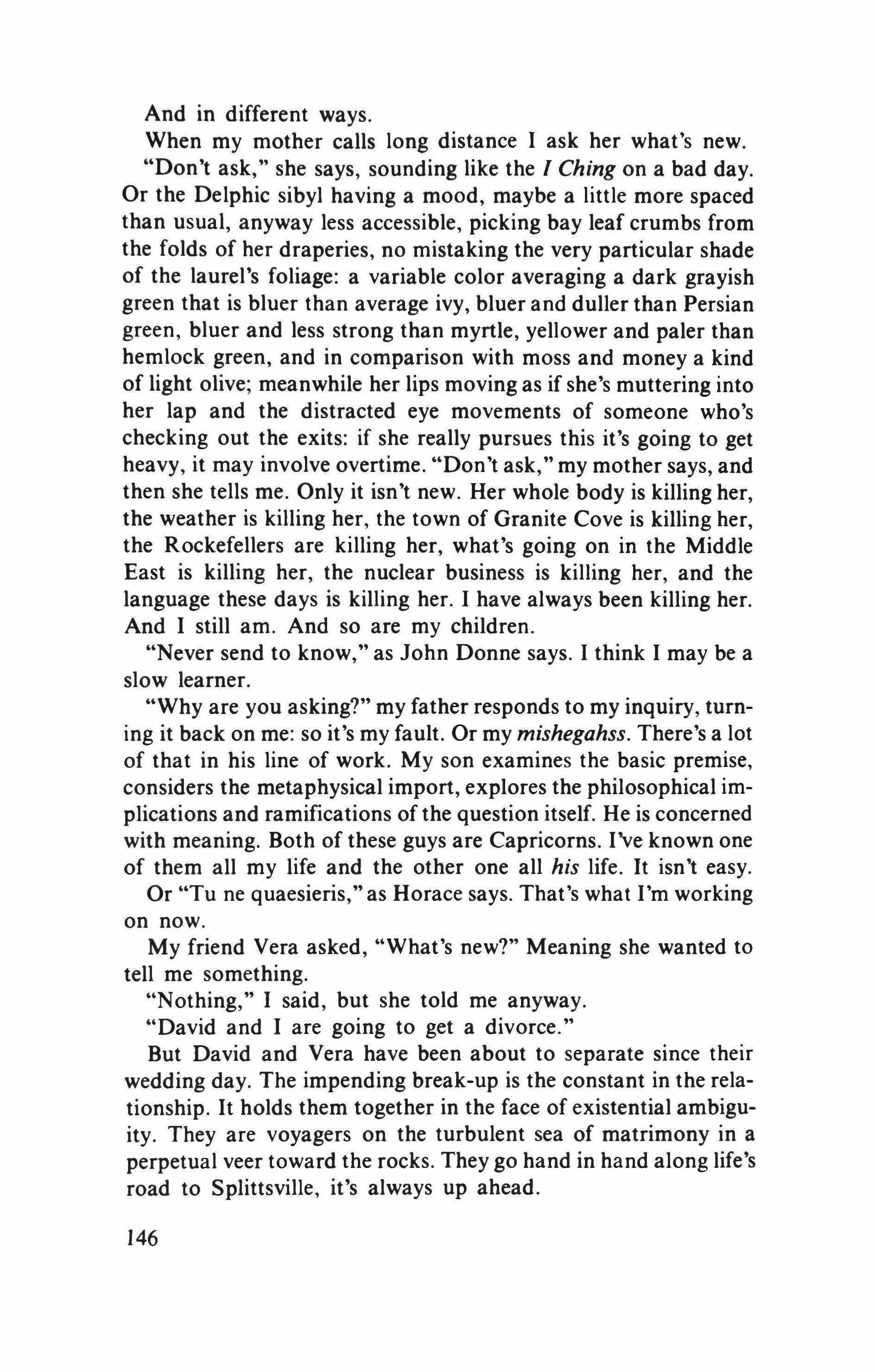
And in different ways.
When my mother calls long distance I ask her what's new.
"Don't ask," she says, sounding like the I Ching on a bad day. Or the Delphic sibyl having a mood, maybe a little more spaced than usual, anyway less accessible, picking bay leaf crumbs from the folds of her draperies, no mistaking the very particular shade of the laurel's foliage: a variable color averaging a dark grayish green that is bluer than average ivy, bluer and duller than Persian green, bluer and less strong than myrtle, yellower and paler than hemlock green, and in comparison with moss and money a kind of light olive; meanwhile her lips moving as if she's muttering into her lap and the distracted eye movements of someone who's checking out the exits: if she really pursues this it's going to get heavy, it may involve overtime. "Don't ask," my mother says, and then she tells me. Only it isn't new. Her whole body is killing her, the weather is killing her, the town of Granite Cove is killing her, the Rockefellers are killing her, what's going on in the Middle East is killing her, the nuclear business is killing her, and the language these days is killing her. I have always been killing her. And I still am. And so are my children.
"Never send to know," as John Donne says. I think I may be a slow learner.
"Why are you asking?" my father responds to my inquiry, turning it back on me: so it's my fault. Or my mishegahss. There's a lot of that in his line of work. My son examines the basic premise, considers the metaphysical import, explores the philosophical implications and ramifications of the question itself. He is concerned with meaning. Both of these guys are Capricorns. I've known one of them all my life and the other one all his life. It isn't easy. Or "Tu ne quaesieris," as Horace says. That's what I'm working on now.
My friend Vera asked, "What's new?" Meaning she wanted to tell me something.
"Nothing," I said, but she told me anyway. "David and I are going to get a divorce." But David and Vera have been about to separate since their wedding day. The impending break-up is the constant in the relationship. It holds them together in the face of existential ambiguity. They are voyagers on the turbulent sea of matrimony in a perpetual veer toward the rocks. They go hand in hand along life's road to Splittsville, it's always up ahead.
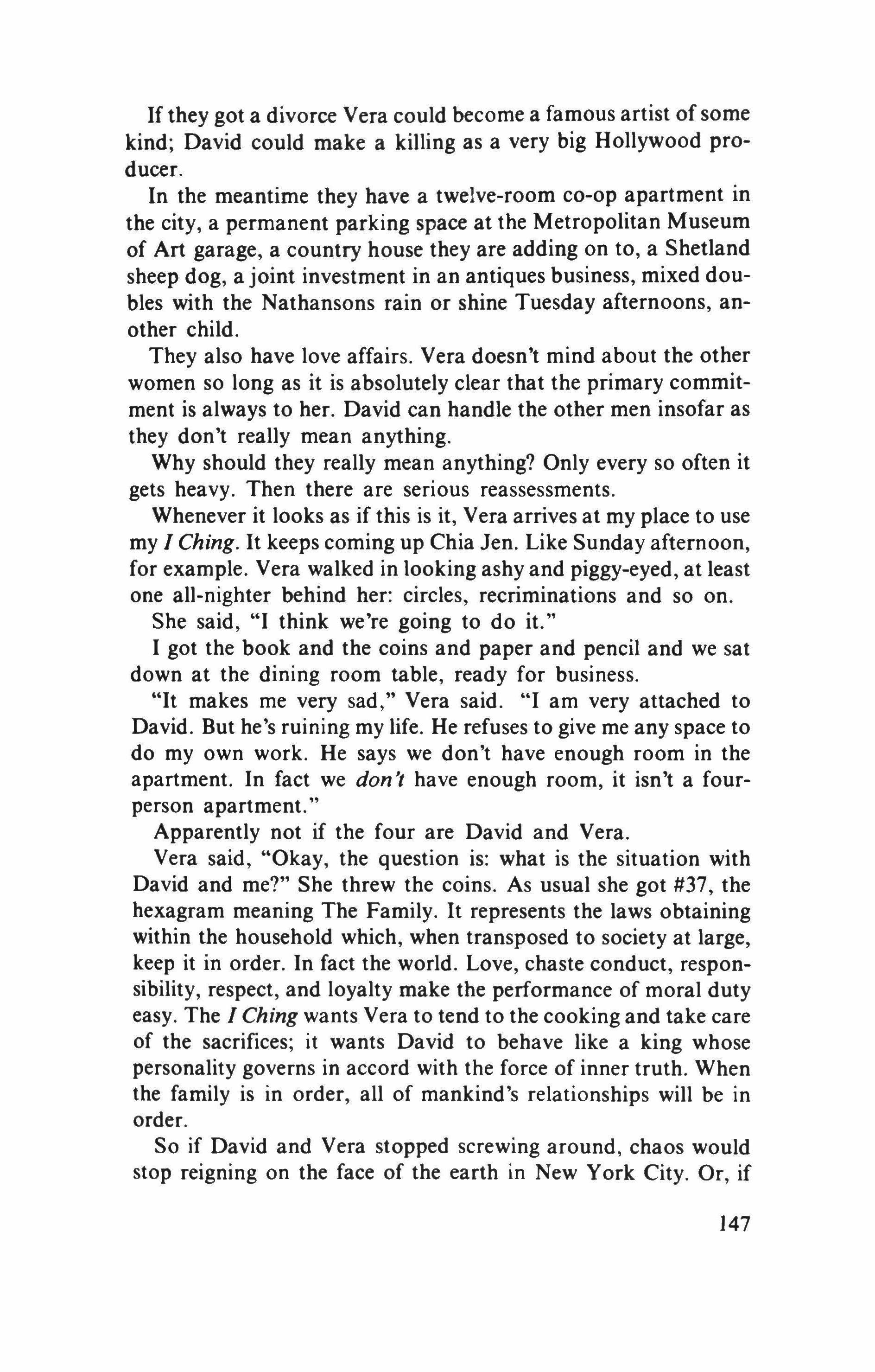
If they got a divorce Vera could become a famous artist of some kind; David could make a killing as a very big Hollywood producer.
In the meantime they have a twelve-room co-op apartment in the city, a permanent parking space at the Metropolitan Museum of Art garage, a country house they are adding on to, a Shetland sheep dog, a joint investment in an antiques business, mixed doubles with the Nathansons rain or shine Tuesday afternoons, another child.
They also have love affairs. Vera doesn't mind about the other women so long as it is absolutely clear that the primary commitment is always to her. David can handle the other men insofar as they don't really mean anything.
Why should they really mean anything? Only every so often it gets heavy. Then there are serious reassessments.
Whenever it looks as if this is it, Vera arrives at my place to use my I Ching. It keeps coming up Chia Jen. Like Sunday afternoon, for example. Vera walked in looking ashy and piggy-eyed, at least one all-nighter behind her: circles, recriminations and so on.
She said, "I think we're going to do it."
I got the book and the coins and paper and pencil and we sat down at the dining room table, ready for business.
"It makes me very sad," Vera said. "I am very attached to David. But he's ruining my life. He refuses to give me any space to do my own work. He says we don't have enough room in the apartment. In fact we don't have enough room, it isn't a fourperson apartment."
Apparently not if the four are David and Vera.
Vera said, "Okay, the question is: what is the situation with David and me?" She threw the coins. As usual she got #37, the hexagram meaning The Family. It represents the laws obtaining within the household which, when transposed to society at large, keep it in order. In fact the world. Love, chaste conduct, responsibility, respect, and loyalty make the performance of moral duty easy. The I Ching wants Vera to tend to the cooking and take care of the sacrifices; it wants David to behave like a king whose personality governs in accord with the force of inner truth. When the family is in order, all of mankind's relationships will be in order.
So if David and Vera stopped screwing around, chaos would stop reigning on the face of the earth in New York City. Or, if
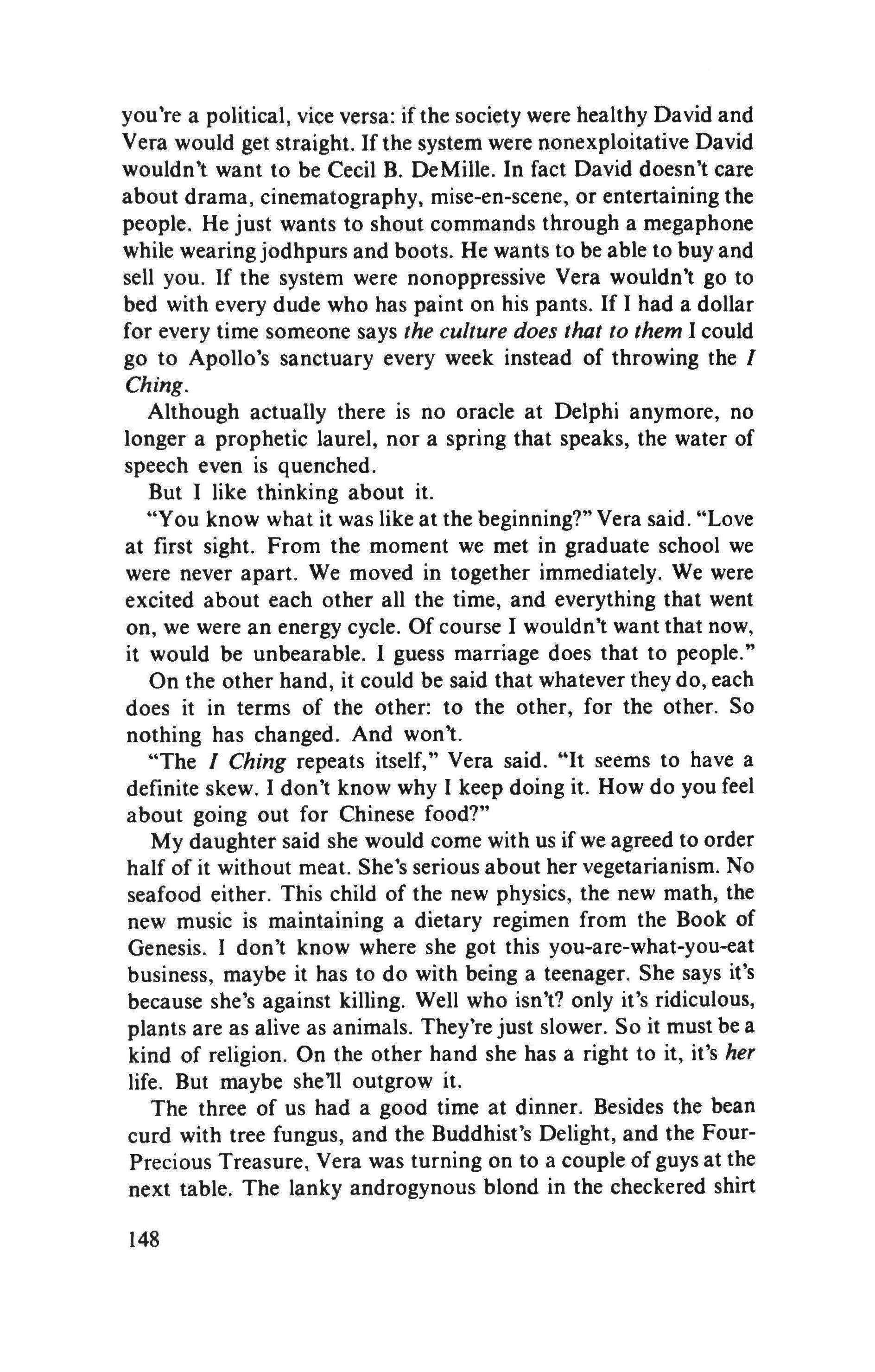
you're a political, vice versa: if the society were healthy David and Vera would get straight. If the system were nonexploitative David wouldn't want to be Cecil B. DeMille. In fact David doesn't care about drama, cinematography, mise-en-scene, or entertaining the people. He just wants to shout commands through a megaphone while wearingjodhpurs and boots. He wants to be able to buy and sell you. If the system were nonoppressive Vera wouldn't go to bed with every dude who has paint on his pants. If I had a dollar for every time someone says the culture does that to them I could go to Apollo's sanctuary every week instead of throwing the I Ching.
Although actually there is no oracle at Delphi anymore, no longer a prophetic laurel, nor a spring that speaks, the water of speech even is quenched.
But I like thinking about it.
"You know what it was like at the beginning?" Vera said. "Love at first sight. From the moment we met in graduate school we were never apart. We moved in together immediately. We were excited about each other all the time, and everything that went on, we were an energy cycle. Of course I wouldn't want that now, it would be unbearable. I guess marriage does that to people."
On the other hand, it could be said that whatever they do, each does it in terms of the other: to the other, for the other. So nothing has changed. And won't.
"The I Ching repeats itself," Vera said. "It seems to have a definite skew. I don't know why I keep doing it. How do you feel about going out for Chinese food?"
My daughter said she would come with us if we agreed to order half of it without meat. She's serious about her vegetarianism. No seafood either. This child of the new physics, the new math, the new music is maintaining a dietary regimen from the Book of Genesis. I don't know where she got this you-are-what-you-eat business, maybe it has to do with being a teenager. She says it's because she's against killing. Well who isn't? only it's ridiculous, plants are as alive as animals. They're just slower. So it must be a kind of religion. On the other hand she has a right to it, it's her life. But maybe she'll outgrow it.
The three of us had a good time at dinner. Besides the bean curd with tree fungus, and the Buddhist's Delight, and the FourPrecious Treasure, Vera was turning on to a couple of guys at the next table. The lanky androgynous blond in the checkered shirt
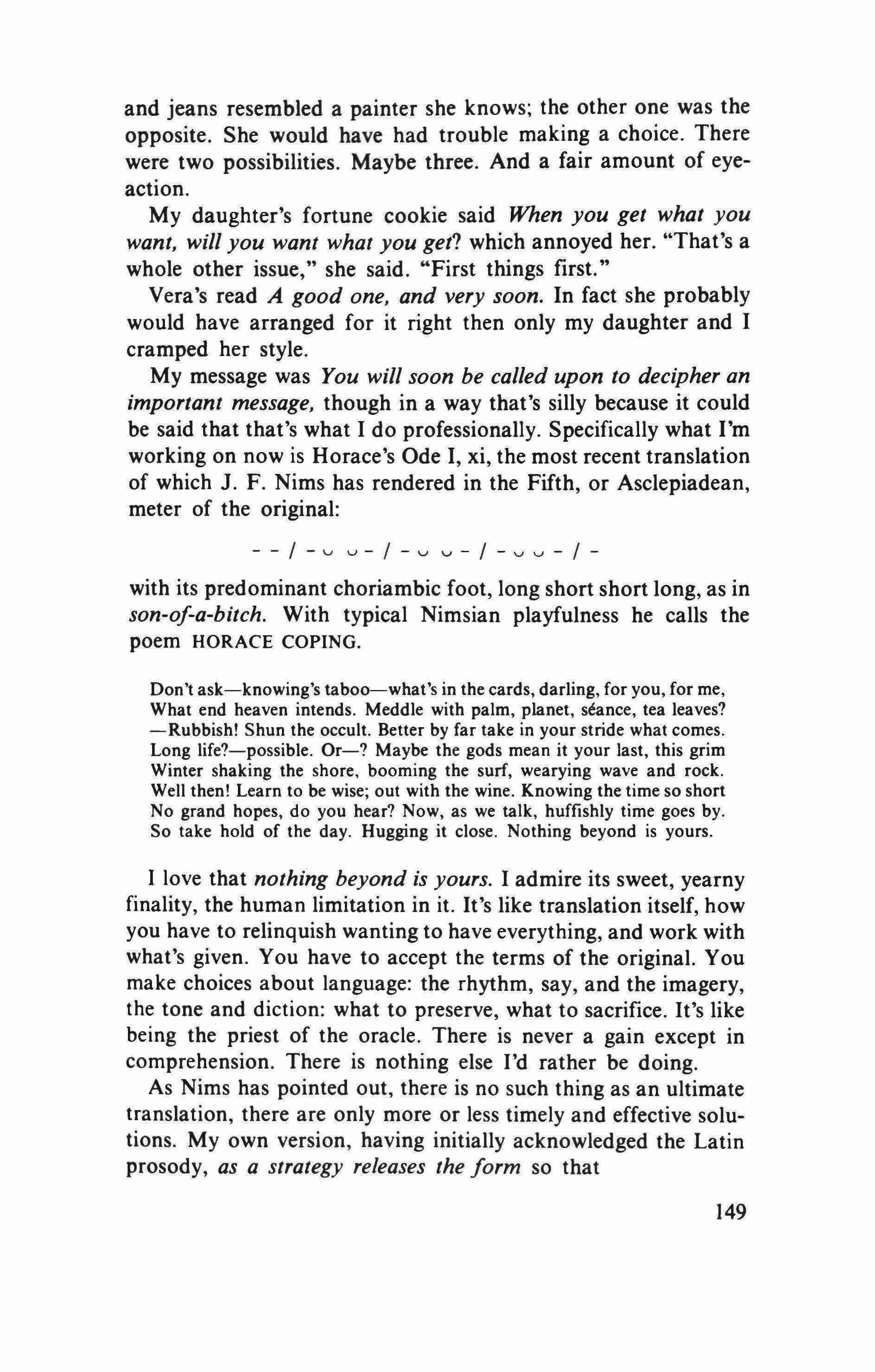
and jeans resembled a painter she knows; the other one was the opposite. She would have had trouble making a choice. There were two possibilities. Maybe three. And a fair amount of eyeaction.
My daughter's fortune cookie said When you get what you want, will you want what you get? which annoyed her. "That's a whole other issue," she said. "First things first."
Vera's read A good one, and very soon. In fact she probably would have arranged for it right then only my daughter and I cramped her style.
My message was You will soon be called upon to decipher an important message, though in a way that's silly because it could be said that that's what I do professionally. Specifically what I'm working on now is Horace's Ode I, xi, the most recent translation of which J. F. Nims has rendered in the Fifth, or Asclepiadean, meter of the original:
with its predominant choriambic foot, long short short long, as in son-of-a-bitch. With typical Nimsian playfulness he calls the poem HORACE COPING.
Don't ask-knowing's taboo-what's in the cards, darling, for you, for me, What end heaven intends. Meddle with palm, planet, seance, tea leaves? -Rubbish! Shun the occult. Better by far take in your stride what comes. Long life?-possible. Or-? Maybe the gods mean it your last, this grim Winter shaking the shore, booming the surf, wearying wave and rock. Well then! Learn to be wise; out with the wine. Knowing the time so short No grand hopes, do you hear? Now, as we talk, huffishly time goes by. So take hold of the day. Hugging it close. Nothing beyond is yours.
I love that nothing beyond is yours. I admire its sweet, yearny finality, the human limitation in it. It's like translation itself, how you have to relinquish wanting to have everything, and work with what's given. You have to accept the terms of the original. You make choices about language: the rhythm, say, and the imagery, the tone and diction: what to preserve, what to sacrifice. It's like being the priest of the oracle. There is never a gain except in comprehension. There is nothing else I'd rather be doing.
As Nirns has pointed out, there is no such thing as an ultimate translation, there are only more or less timely and effective solutions. My own version, having initially acknowledged the Latin prosody, as a strategy releases the form so that
Tu ne quaesieris, scire nefas, quem mihi, quem tibi finem di dederint, Leuconoe, nee Babylonios temptaris numeros.
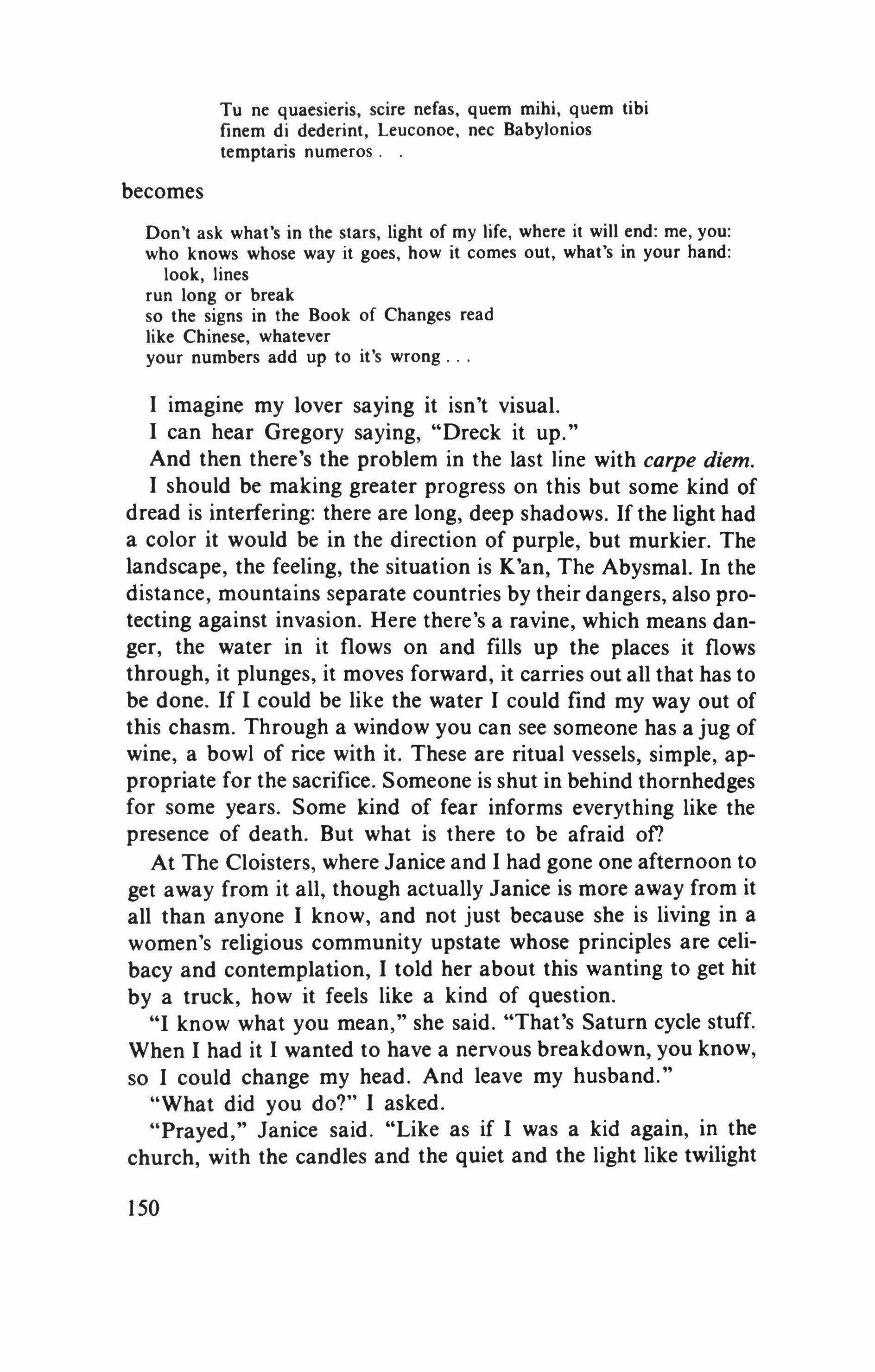
becomes
Don't ask what's in the stars, light of my life, where it will end: me, you: who knows whose way it goes, how it comes out, what's in your hand: look, lines run long or break so the signs in the Book of Changes read like Chinese, whatever your numbers add up to it's wrong
I imagine my lover saying it isn't visual. I can hear Gregory saying, "Dreck it up."
And then there's the problem in the last line with carpe diem.
I should be making greater progress on this but some kind of dread is interfering: there are long, deep shadows. If the light had a color it would be in the direction of purple, but murkier. The landscape, the feeling, the situation is K'an, The Abysmal. In the distance, mountains separate countries by their dangers, also protecting against invasion. Here there's a ravine, which means danger, the water in it flows on and fills up the places it flows through, it plunges, it moves forward, it carries out all that has to be done. If 1 could be like the water I could find my way out of this chasm. Through a window you can see someone has a jug of wine, a bowl of rice with it. These are ritual vessels, simple, appropriate for the sacrifice. Someone is shut in behind thornhedges for some years. Some kind of fear informs everything like the presence of death. But what is there to be afraid of?
At The Cloisters, where Janice and 1 had gone one afternoon to get away from it all, though actually Janice is more away from it all than anyone 1 know, and not just because she is living in a women's religious community upstate whose principles are celibacy and contemplation, 1 told her about this wanting to get hit by a truck, how it feels like a kind of question.
"I know what you mean," she said. "That's Saturn cycle stuff. When I had it 1 wanted to have a nervous breakdown, you know, so 1 could change my head. And leave my husband."
"What did you do?" 1 asked. "Prayed," Janice said. "Like as if 1 was a kid again, in the church, with the candles and the quiet and the light like twilight

and the statue of the Virgin." She took a little card out of her purse and handed it to me. There was a bunch of flowers in one corner and a saint in another. Christ, our Lord, assures us that we will receive if only we ask. Even the poet reminds us that more things are wrought by prayer than this world dreams of
Okay, though it sounds as if the poet is the last person everyone would imagine reminding us of something like that: too earthbound, or maybejust plain not too bright. Is this the generic poet, or someone particular? As for the requests, how many are you allowed? and of what magnitude? When I was a kid I was supposed to wait for stuff to be offered to me, as if they could read my mind. And no nagging. This is a better system.
"Did it work?" I asked.
"In a way. I didn't exactly get the breakdown, though it's probably just as well. I guess Geminis don't need that, they're practically schizy anyway with all that flux. What I needed was to get back to Mary. To have a woman to talk to. It was very helpful. Of course it took me a while to arrive at the community, but it's the right place. Like you don't always have to be dealing with sex, and money, and power-everything isn't a goddamn big deal all the time. You know what I mean? Celibacy, cooperation, contemplation. I wouldn't recommend it for you, but it really feels good. I guess faith and belief are very important to me. Listen, I have to go. I have a doctor's appointment."
"What's the matter? Are you sick?" I really didn't want Janice to have something wrong with her.
"No, I'm okay. I promise. I'm just going to get fitted for a diaphragm.
"What do you mean?" I said, which wasn't exactly what I meant. Janice shrugged. "Well," she said, taking her religious card back and putting it in her purse, "you never know."
I wish it were that simple. In fact only sometimes you never know. And if you did, how would it affect your seizing the day: push coming to shove? steering in the direction of the skid? not holding your breath? a lot of sleeping?
Seizing the day-literally, plucking it, like a flower, except that pluck the day is silly, and take hold ofthe day sounds like the first line of an instruction manual for one of those kits where you've got pieces missing and unusable extras and you end up having failed to put something together-means making an effort, ex-
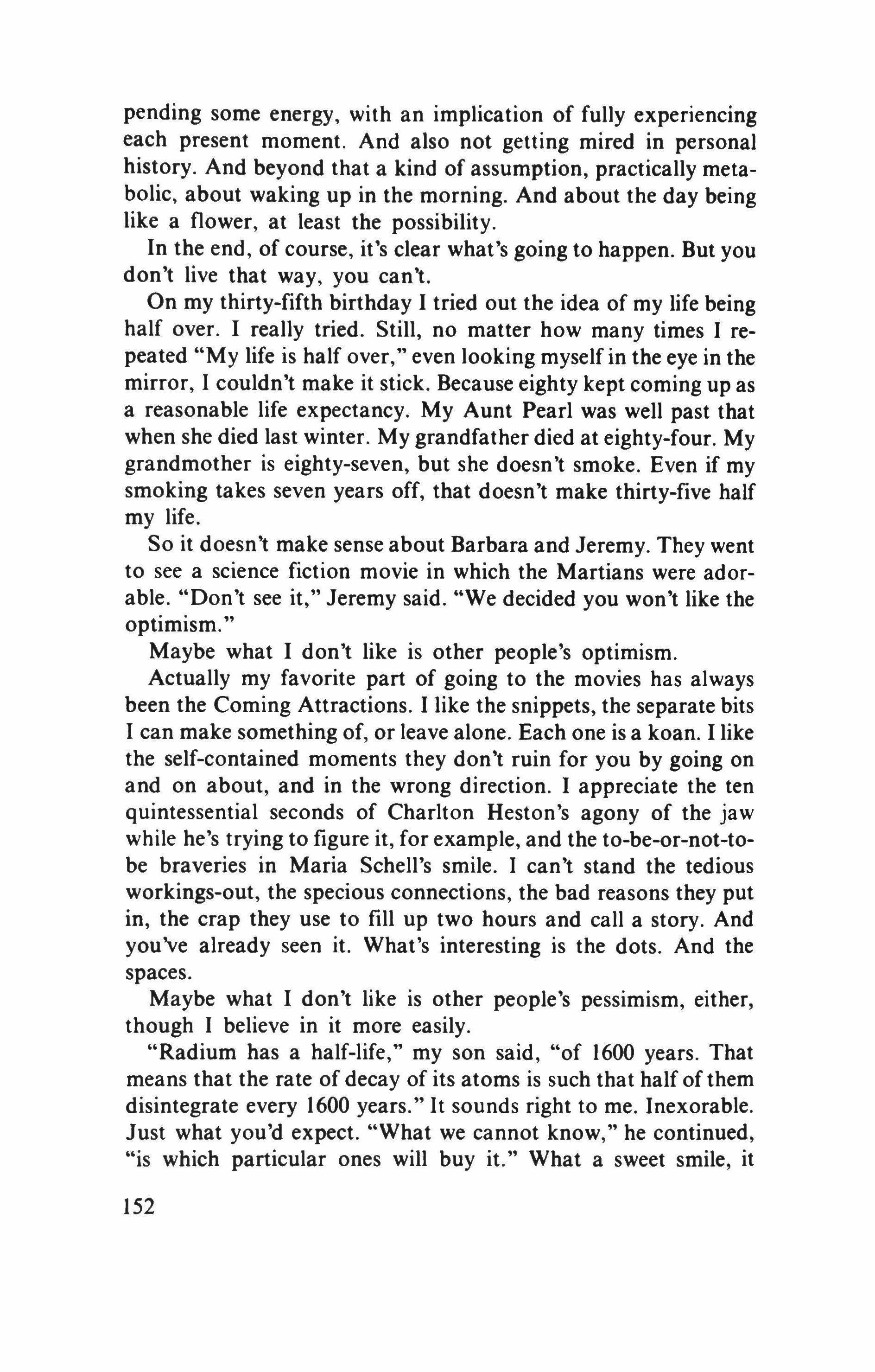
pending some energy, with an implication of fully experiencing each present moment. And also not getting mired in personal history. And beyond that a kind of assumption, practically metabolic, about waking up in the morning. And about the day being like a flower, at least the possibility.
In the end, of course, it's clear what's going to happen. But you don't live that way, you can't.
On my thirty-fifth birthday I tried out the idea of my life being half over. I really tried. Still, no matter how many times I repeated "My life is half over," even looking myself in the eye in the mirror, I couldn't make it stick. Because eighty kept coming up as a reasonable life expectancy. My Aunt Pearl was well past that when she died last winter. My grandfather died at eighty-four. My grandmother is eighty-seven, but she doesn't smoke. Even if my smoking takes seven years off, that doesn't make thirty-five half my life.
So it doesn't make sense about Barbara and Jeremy. They went to see a science fiction movie in which the Martians were adorable. "Don't see it," Jeremy said. "We decided you won't like the optimism.
Maybe what I don't like is other people's optimism.
Actually my favorite part of going to the movies has always been the Coming Attractions. I like the snippets, the separate bits I can make something of, or leave alone. Each one is a koan. I like the self-contained moments they don't ruin for you by going on and on about, and in the wrong direction. I appreciate the ten quintessential seconds of Charlton Heston's agony of the jaw while he's trying to figure it, for example, and the to-be-or-not-tobe braveries in Maria Schell's smile. I can't stand the tedious workings-out, the specious connections, the bad reasons they put in, the crap they use to fill up two hours and call a story. And you've already seen it. What's interesting is the dots. And the spaces.
Maybe what I don't like is other people's pessimism, either, though I believe in it more easily.
"Radium has a half-life," my son said, "of 1600 years. That means that the rate of decay of its atoms is such that half of them disintegrate every 1600 years." It sounds right to me. Inexorable. Just what you'd expect. "What we cannot know," he continued, "is which particular ones will buy it." What a sweet smile, it

suffused his countenance. "The thing about quantum mechanics is that it does not predict individual, specific events, it concerns itself only with group behavior. And even then," he went on, "instead of making statements about what will take place it considers particles as tendencies to happen, the strength of these tendencies being expressed in terms of probabilities."
So much for future phenomena, which do not interest him. What interests him is the odds that something will happen. Or not happen. What interests him is the Uncertainty Principle. Not to mention the extent to which the act of participation, e.g., observation and/ or measurement, creates the reality.
I like there being this sort of mysticism in physics, but it also makes me uneasy.
"You and Einstein," my son said. "He didn't go for it at all. Because for whatever reasons he had a stake in comprehensible order-you know, the universe as coherent, consistent, and observable. Which of course implies a kind of foreknowledge. Which is very reassuring."
"Don't patronize me," I said.
"Don't take everything personally," he said. "This has nothing to do with you. The point is that when there are fundamental principles and patterns which are going to turn out to be the case with stuff we don't know yet, we already have a handle on how to look for it, and where. But the deep comfort is that there are patterns. Einstein claimed to have no doubt about that. What he did wonder about was whether God had had any choice with regard to creating the universe in the way He created it."
"Now that's an interesting idea," I said.
"It is interesting," my son said, smiling fondly down at me. "But it's literature."
Then he went back to school to do some more thinking about thinking.
But that's what it always comes down to, freedom and compulsion. And responsibility. It's like the difference between asking What am I going to do? and What is going to happen?
The other evening after dinner my daughter, my lover, and I had something resembling a conversation.
"What do you think you'll be in your next life?" my daughter asked.
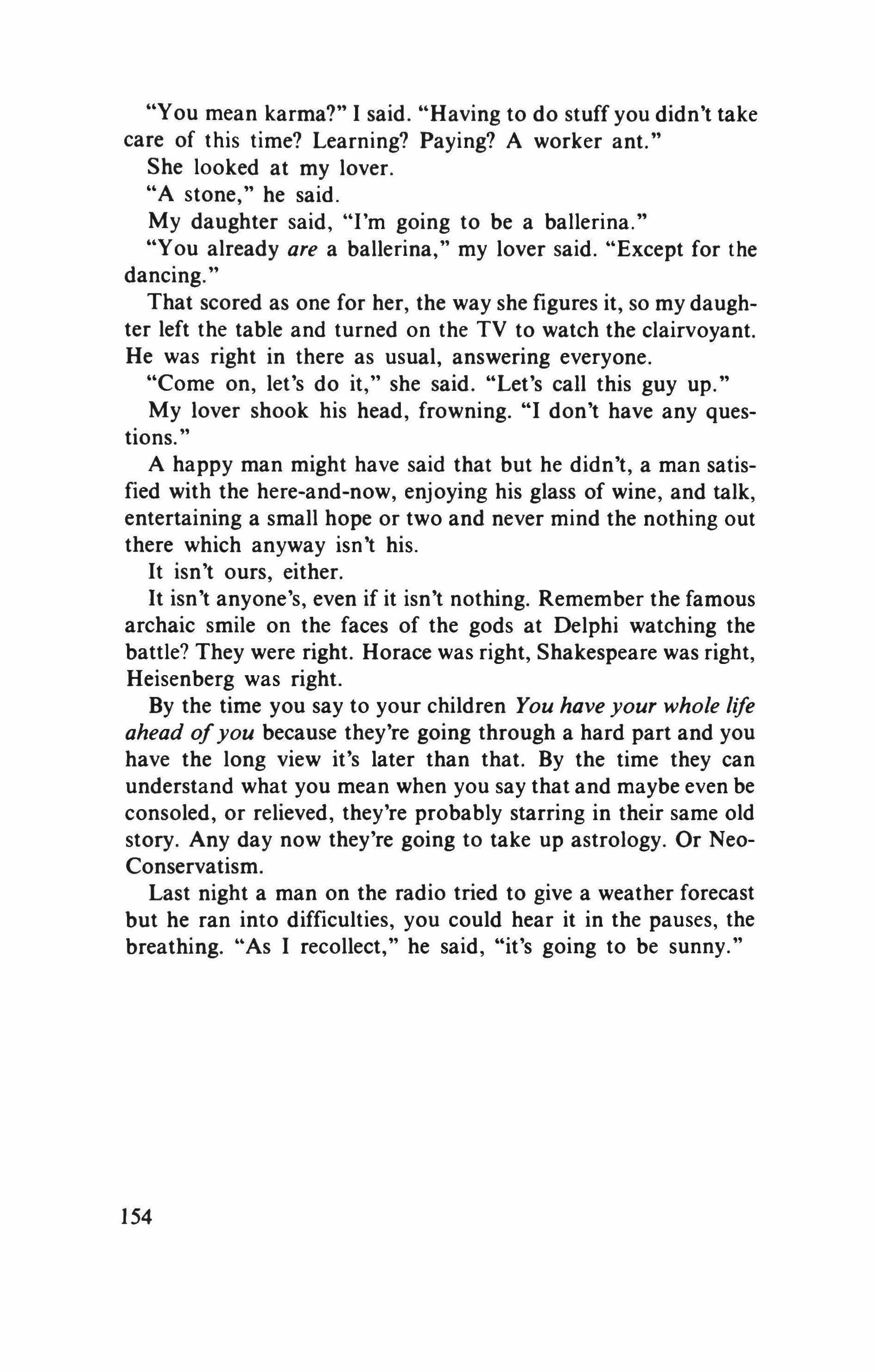
"You mean karma?" 1 said. "Having to do stuff you didn't take care of this time? Learning? Paying? A worker ant."
She looked at my lover.
"A stone," he said.
My daughter said, "I'm going to be a ballerina."
"You already are a ballerina," my lover said. "Except for the dancing."
That scored as one for her, the way she figures it, so my daughter left the table and turned on the TV to watch the clairvoyant. He was right in there as usual, answering everyone.
"Come on, let's do it," she said. "Let's call this guy up."
My lover shook his head, frowning. "I don't have any questions.
A happy man might have said that but he didn't, a man satisfied with the here-and-now, enjoying his glass of wine, and talk, entertaining a small hope or two and never mind the nothing out there which anyway isn't his.
It isn't ours, either.
It isn't anyone's, even if it isn't nothing. Remember the famous archaic smile on the faces of the gods at Delphi watching the battle? They were right. Horace was right, Shakespeare was right, Heisenberg was right.
By the time you say to your children You have your whole life ahead ofyou because they're going through a hard part and you have the long view it's later than that. By the time they can understand what you mean when you say that and maybe even be consoled, or relieved, they're probably starring in their same old story. Any day now they're going to take up astrology. Or NeoConservatism.
Last night a man on the radio tried to give a weather forecast but he ran into difficulties, you could hear it in the pauses, the breathing. "As 1 recollect," he said, "it's going to be sunny."
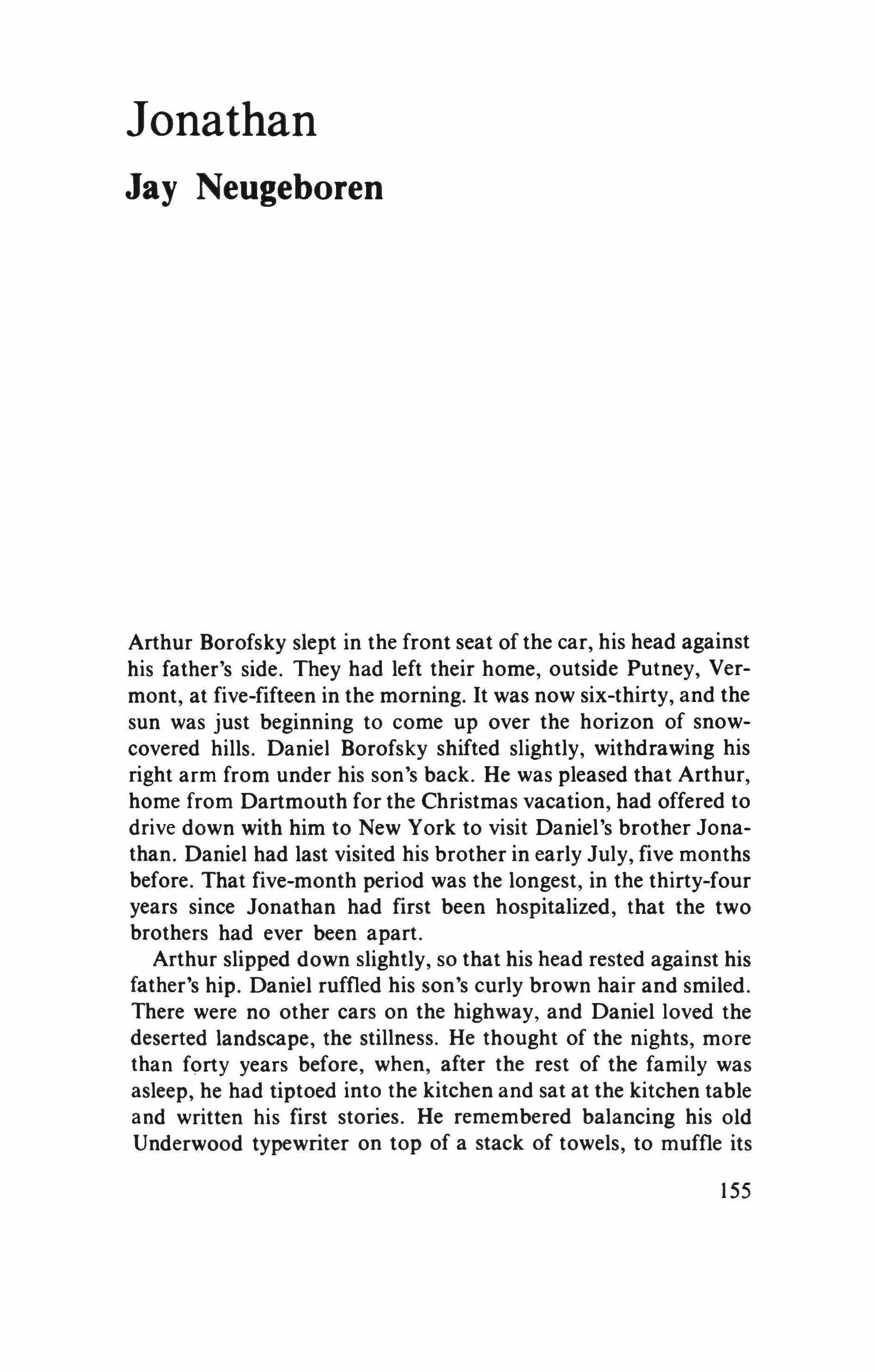
Arthur Borofsky slept in the front seat of the car, his head against his father's side. They had left their home, outside Putney, Vermont, at five-fifteen in the morning. It was now six-thirty, and the sun was just beginning to come up over the horizon of snowcovered hills. Daniel Borofsky shifted slightly, withdrawing his right arm from under his son's back. He was pleased that Arthur, home from Dartmouth for the Christmas vacation, had offered to drive down with him to New York to visit Daniel's brother Jonathan. Daniel had last visited his brother in early July, five months before. That five-month period was the longest, in the thirty-four years since Jonathan had first been hospitalized, that the two brothers had ever been apart.
Arthur slipped down slightly, so that his head rested against his father's hip. Daniel ruffled his son's curly brown hair and smiled. There were no other cars on the highway, and Daniel loved the deserted landscape, the stillness. He thought of the nights, more than forty years before, when, after the rest of the family was asleep, he had tiptoed into the kitchen and sat at the kitchen table and written his first stories. He remembered balancing his old Underwood typewriter on top of a stack of towels, to muffle its

sound. He remembered, above all, how still the apartment was, and how good he'd felt to be conjuring up voices and stories where nothing had existed before-voices and stories that, once they were down on paper, neither his mother nor his sisters could ever take away from him. He remembered Jonathan's smilesweet Jonathan!-when the two ofthem would sit in bed together and Daniel would read aloud from the drafts of the stories he was working on.
A copy of Daniel's latest book, Two Rabbis, inscribed "With deepest love to Jonathan, who's been there and knows," lay on the back seat, along with a twine-wrapped package: two new sets of underwear, a pair of gray corduroy trousers, cookies that Janet had baked, a new toothbrush, three packs of Chesterfield cigarettes, and chewing gum.
Arthur stirred and sat up. "I'll drive," he said, rubbing his eyes.
"You don't mind?"
"I don't mind," Arthur answered. "I told you before."
Daniel reached across the front seat of the car impulsively, and took his son's hand. "I appreciate this, Arthur. Really. It means a lot to me."
Arthur pulled his hand away. "You don't have to thank me so much," he said.
Daniel shrugged. "Well. You know Janet thinks I shouldn't go-that 1 go so often only because 1 still feel "Yeah," Arthur said. "I know all about it, with you and Mom." He leaned his head against the window, looking away from his father, at the snow.
"But tell me something," Daniel said. "If you'd had a brother or sister-if Mother had been willing to have another child-I know it's too late now, but just supposing-do you think it would have made a difference?"
"Oh Christ," Arthur sighed. "Here we go round the mulberry bush. Just don't, okay, Dad? Just don't start in with all that psychological crap again. Do us both a favor." He looked into his father's face and his voice shifted and was, for a moment, less cold. He spoke deliberately, as if he'd practiced the words and memorized them. "Look. I told you before to stop worrying so much about me, okay? That would be a big help. Mom's never been as fragile as you like to think, and neither am I. Okay. I'm not like Uncle Jonathan and neither is she. Okay. I'm not-"
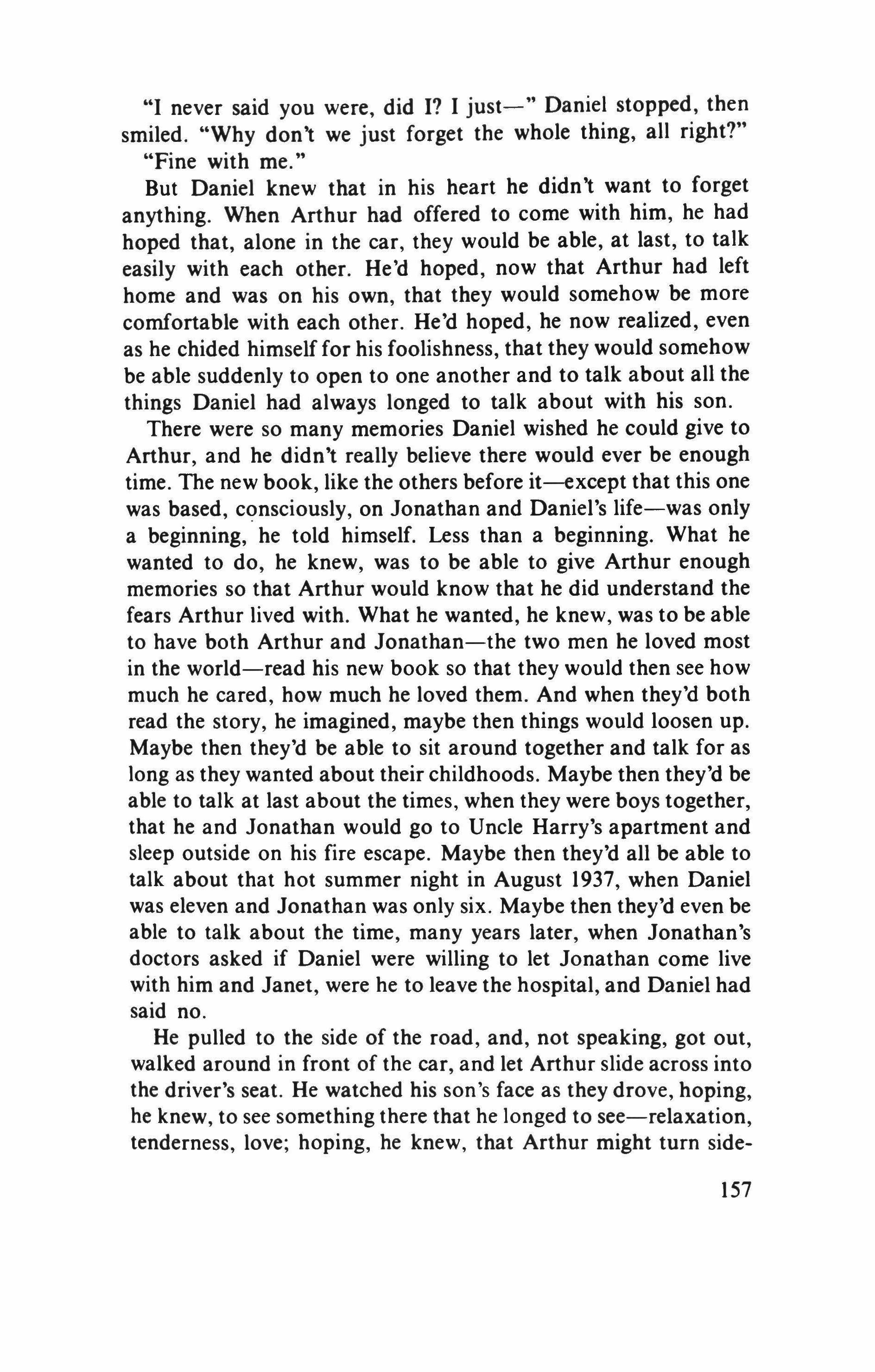
"I never said you were, did I? 1 just-" Daniel stopped, then smiled. "Why don't we just forget the whole thing, all right?"
"Fine with me."
But Daniel knew that in his heart he didn't want to forget anything. When Arthur had offered to come with him, he had hoped that, alone in the car, they would be able, at last, to talk easily with each other. He'd hoped, now that Arthur had left home and was on his own, that they would somehow be more comfortable with each other. He'd hoped, he now realized, even as he chided himself for his foolishness, that they would somehow be able suddenly to open to one another and to talk about all the things Daniel had always longed to talk about with his son.
There were so many memories Daniel wished he could give to Arthur, and he didn't really believe there would ever be enough time. The new book, like the others before it-except that this one was based, consciously, on Jonathan and Daniel's life-was only a beginning, he told himself. Less than a beginning. What he wanted to do, he knew, was to be able to give Arthur enough memories so that Arthur would know that he did understand the fears Arthur lived with. What he wanted, he knew, was to be able to have both Arthur and Jonathan-the two men he loved most in the world-read his new book so that they would then see how much he cared, how much he loved them. And when they'd both read the story, he imagined, maybe then things would loosen up. Maybe then they'd be able to sit around together and talk for as long as they wanted about their childhoods. Maybe then they'd be able to talk at last about the times, when they were boys together, that he and Jonathan would go to Uncle Harry's apartment and sleep outside on his fire escape. Maybe then they'd all be able to talk about that hot summer night in August 1937, when Daniel was eleven and Jonathan was only six. Maybe then they'd even be able to talk about the time, many years later, when Jonathan's doctors asked if Daniel were willing to let Jonathan come live with him and Janet, were he to leave the hospital, and Daniel had said no.
He pulled to the side of the road, and, not speaking, got out, walked around in front of the car, and let Arthur slide across into the driver's seat. He watched his son's face as they drove, hoping, he knew, to see something there that he longed to see-relaxation, tenderness, love; hoping, he knew, that Arthur might turn side-
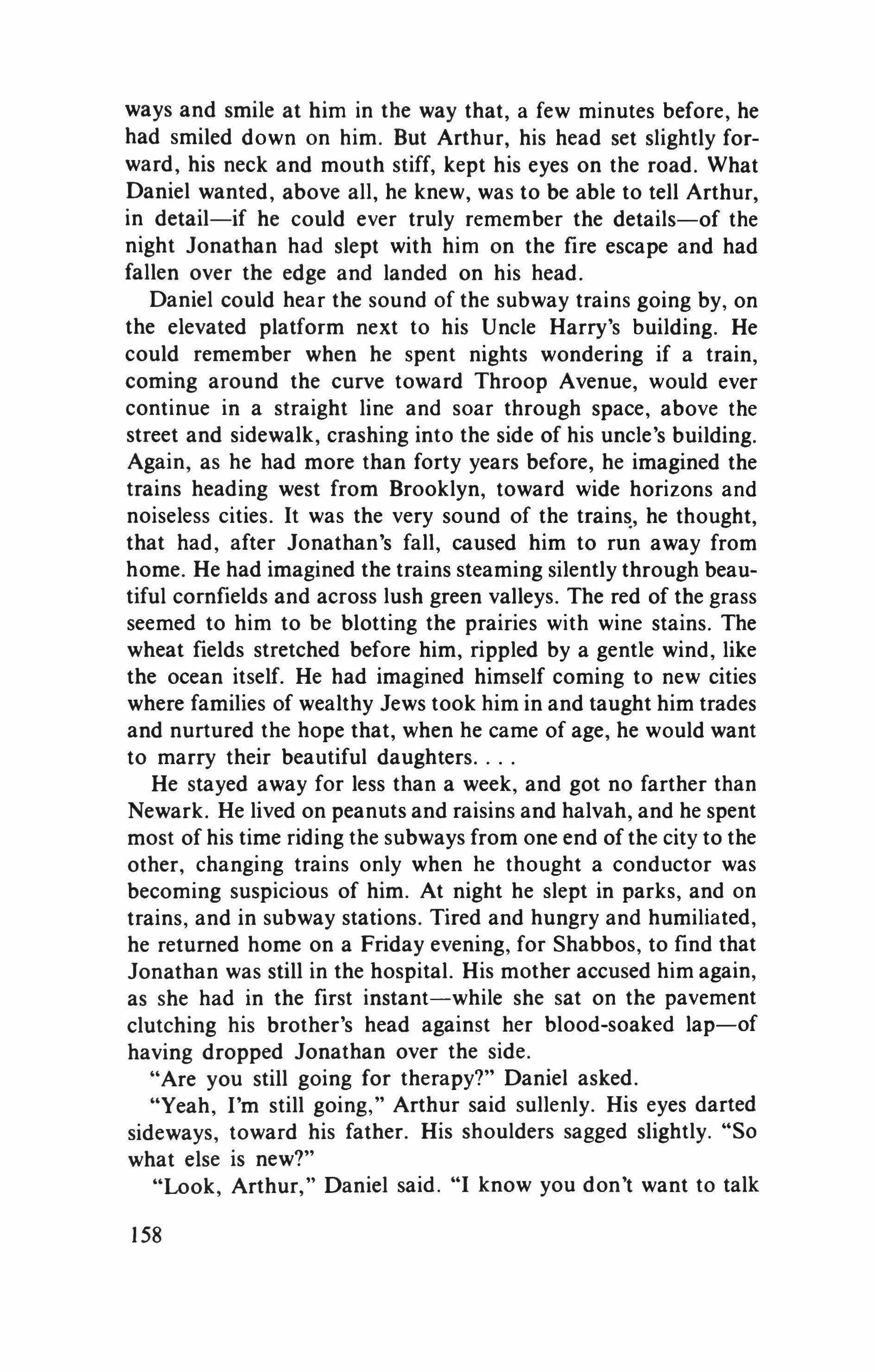
ways and smile at him in the way that, a few minutes before, he had smiled down on him. But Arthur, his head set slightly forward, his neck and mouth stiff, kept his eyes on the road. What Daniel wanted, above all, he knew, was to be able to tell Arthur, in detail-if he could ever truly remember the details-of the night Jonathan had slept with him on the fire escape and had fallen over the edge and landed on his head.
Daniel could hear the sound of the subway trains going by, on the elevated platform next to his Uncle Harry's building. He could remember when he spent nights wondering if a train, coming around the curve toward Throop Avenue, would ever continue in a straight line and soar through space, above the street and sidewalk, crashing into the side of his uncle's building. Again, as he had more than forty years before, he imagined the trains heading west from Brooklyn, toward wide horizons and noiseless cities. It was the very sound of the trains, he thought, that had, after Jonathan's fall, caused him to run away from home. He had imagined the trains steaming silently through beautiful cornfields and across lush green valleys. The red of the grass seemed to him to be blotting the prairies with wine stains. The wheat fields stretched before him, rippled by a gentle wind, like the ocean itself. He had imagined himself coming to new cities where families of wealthy Jews took him in and taught him trades and nurtured the hope that, when he came of age, he would want to marry their beautiful daughters
He stayed away for less than a week, and got no farther than Newark. He lived on peanuts and raisins and halvah, and he spent most of his time riding the subways from one end of the city to the other, changing trains only when he thought a conductor was becoming suspicious of him. At night he slept in parks, and on trains, and in subway stations. Tired and hungry and humiliated, he returned home on a Friday evening, for Shabbos, to find that Jonathan was still in the hospital. His mother accused him again, as she had in the first instant-while she sat on the pavement clutching his brother's head against her blood-soaked lap-of having dropped Jonathan over the side.
"Are you still going for therapy?" Daniel asked.
"Yeah, I'm still going," Arthur said sullenly. His eyes darted sideways, toward his father. His shoulders sagged slightly. "So what else is new?"
"Look, Arthur," Daniel said. "I know you don't want to talk

about it with me-you don't even want me to ask-but if we hide this from each other, then-"
"Let's not and say we did, okay?"
"Let's not what?"
"Let's not go round the mulberry bush." Arthur sighed again. "Look. The doctor thinks 1 don't need to see him once a week even any more. Maybe every other week during spring semester. He seems pleased with my progress. But he says 1 still have a hard time trusting anyone. Okay? It's why 1 fly off into such fits sometimes, like when-"
"I didn't mean to intrude. 1just wanted to know if you were still going.
"Bullshit. You want to know everything."
Daniel shook his head. He waited, then spoke very gently. "Not really, Arthur. You're on your own now. 1 do wish things weren't so hard for you sometimes, but 1 don't-"
"You mean well, right? Like your famous mother and sisters you're always talking about-my grandmother and aunts, of blessed memory."
"Of blessed memory," Daniel repeated. He laughed then. "I like your style," he said.
"Me too," Arthur said morosely, but Daniel saw the straight line of Arthur's thin mouth break slightly, toward a smile. "I guess. "
"Did 1 ever tell you about the time Jonathan bit Mommayour grandmother-on the lip?"
Arthur turned toward his father. He smiled brightly. "No kidding?"
"Do you want to hear?"
Arthur turned back, his smile gone. "I suppose. If you want to tell me."
"It was in the same hospital he's in now. I'd take the train and bus in from the city, where your mother and 1 were living thenyou weren't born yet; this was twenty, twenty-one years ago-and I'd always meet Momma and Poppa in the main lobby. Every Tuesday evening. We'd go for a family therapy session together once a week
Sunlight filtered onto the tiled walls through enormous barred windows. Dr. Teitleman, who was very old and spoke with a heavy German accent, and a man named Mr. Gordon, a student
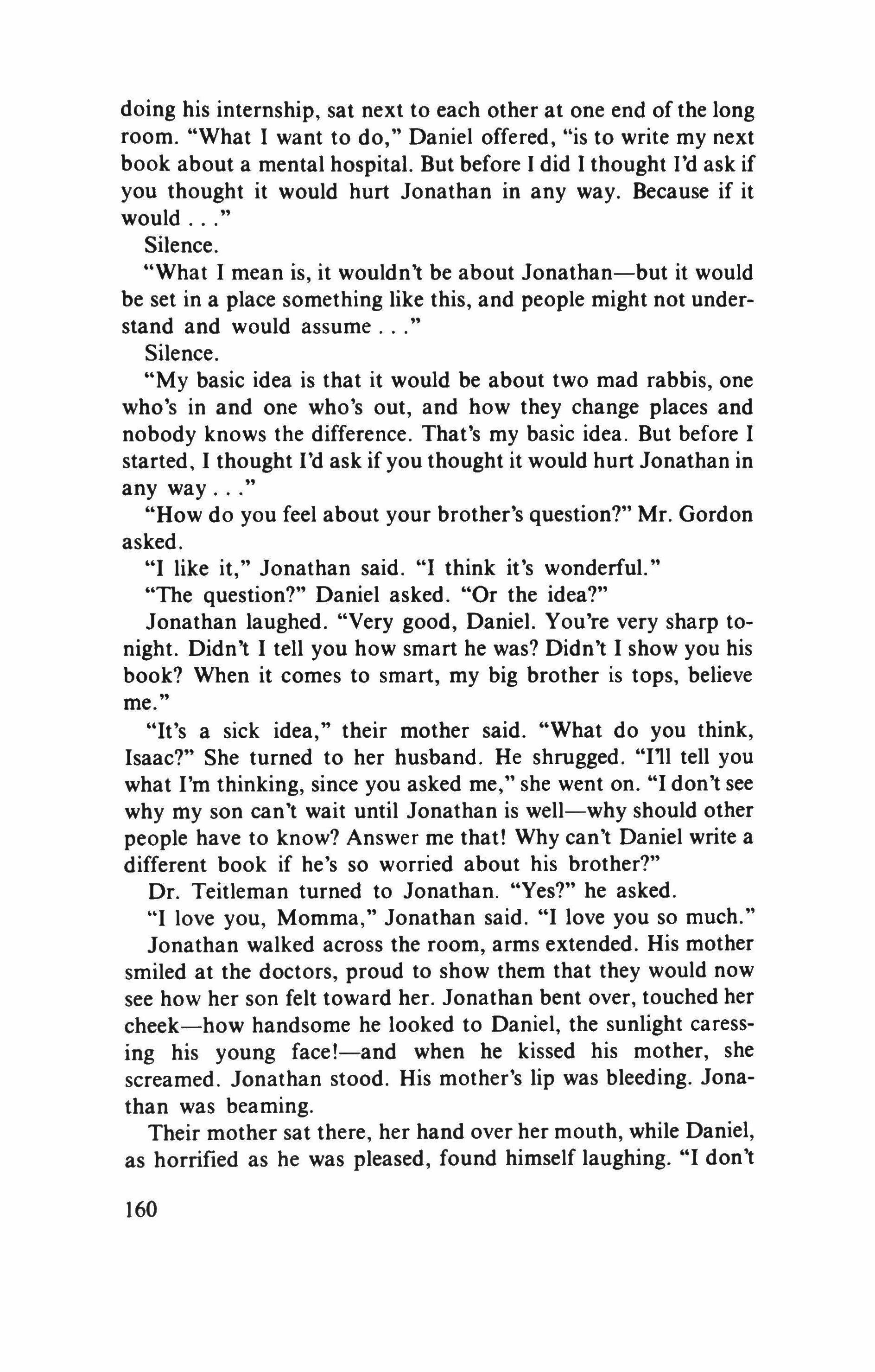
doing his internship, sat next to each other at one end of the long room. "What I want to do," Daniel offered, "is to write my next book about a mental hospital. But before I did 1 thought I'd ask if you thought it would hurt Jonathan in any way. Because if it would Silence.
"What 1 mean is, it wouldn't be about Jonathan-but it would be set in a place something like this, and people might not understand and would assume " Silence.
"My basic idea is that it would be about two mad rabbis, one who's in and one who's out, and how they change places and nobody knows the difference. That's my basic idea. But before 1 started, I thought I'd ask if you thought it would hurt Jonathan in any way
"How do you feel about your brother's question?" Mr. Gordon asked.
"I like it," Jonathan said. "I think it's wonderful."
"The question?" Daniel asked. "Or the idea?"
Jonathan laughed. "Very good, Daniel. You're very sharp tonight. Didn't I tell you how smart he was? Didn't 1 show you his book? When it comes to smart, my big brother is tops, believe me."
"It's a sick idea," their mother said. "What do you think, Isaac?" She turned to her husband. He shrugged. "111 tell you what I'm thinking, since you asked me," she went on. "I don't see why my son can't wait until Jonathan is well-why should other people have to know? Answer me that! Why can't Daniel write a different book if he's so worried about his brother?"
Dr. Teitleman turned to Jonathan. "Yes?" he asked.
"I love you, Momma," Jonathan said. "I love you so much."
Jonathan walked across the room, arms extended. His mother smiled at the doctors, proud to show them that they would now see how her son felt toward her. Jonathan bent over, touched her cheek-how handsome he looked to Daniel, the sunlight caressing his young facet-and when he kissed his mother, she screamed. Jonathan stood. His mother's lip was bleeding. Jonathan was beaming.
Their mother sat there, her hand over her mouth, while Daniel, as horrified as he was pleased, found himself laughing. "I don't
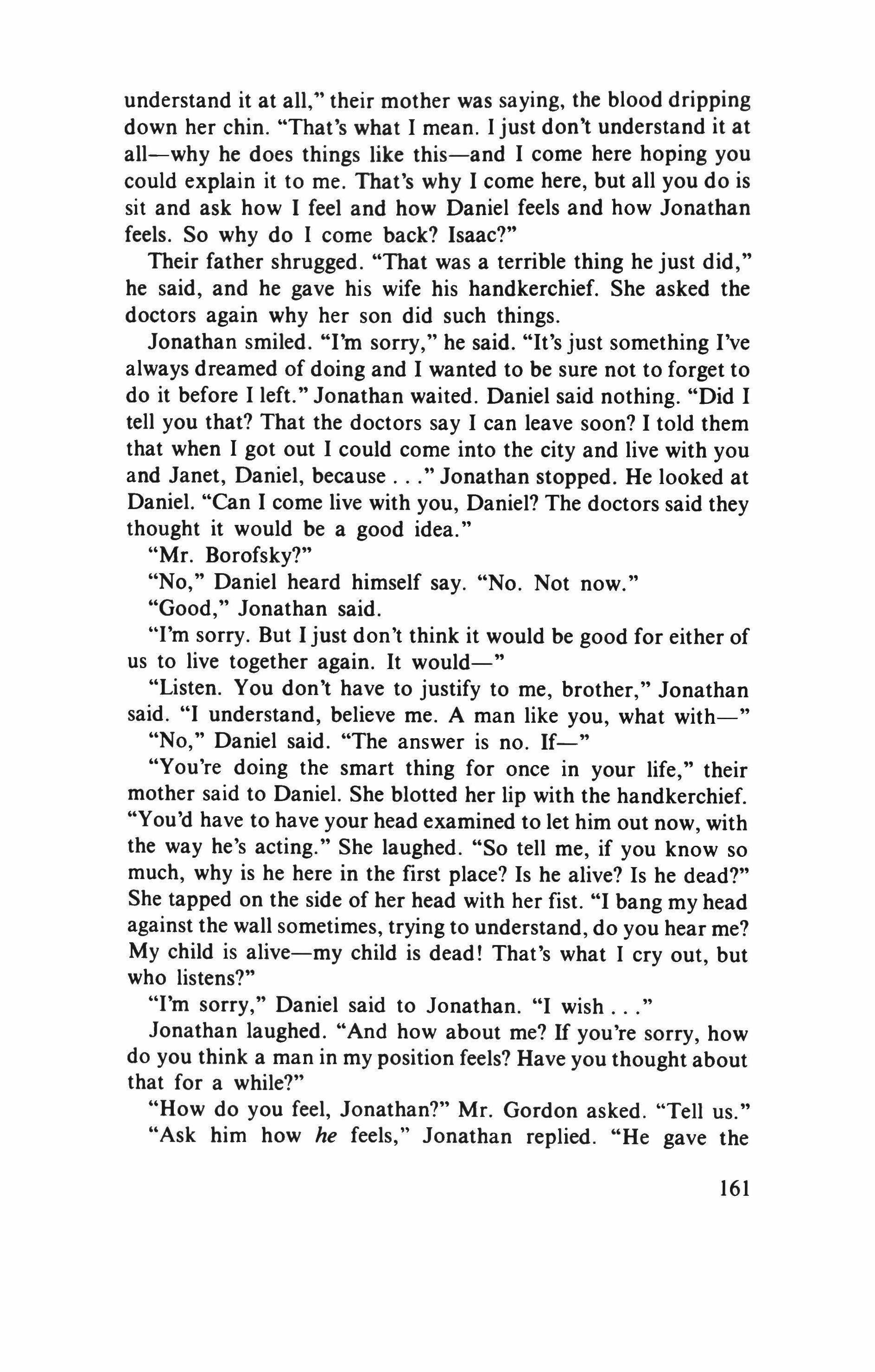
understand it at all," their mother was saying, the blood dripping down her chin. "That's what 1 mean. 1 just don't understand it at all-why he does things like this-and 1 come here hoping you could explain it to me. That's why 1 come here, but all you do is sit and ask how 1 feel and how Daniel feels and how Jonathan feels. So why do 1 come back? Isaac?"
Their father shrugged. "That was a terrible thing he just did," he said, and he gave his wife his handkerchief. She asked the doctors again why her son did such things. Jonathan smiled. "I'm sorry," he said. "It's just something I've always dreamed of doing and I wanted to be sure not to forget to do it before I left." Jonathan waited. Daniel said nothing. "Did I tell you that? That the doctors say 1 can leave soon? I told them that when 1 got out I could come into the city and live with you and Janet, Daniel, because Jonathan stopped. He looked at Daniel. "Can I come live with you, Daniel? The doctors said they thought it would be a good idea."
"Mr. Borofsky?"
"No," Daniel heard himself say. "No. Not now."
"Good," Jonathan said.
"I'm sorry. But I just don't think it would be good for either of us to live together again. It would-" "Listen. You don't have to justify to me, brother," Jonathan said. "I understand, believe me. A man like you, what with-" "No," Daniel said. "The answer is no. If-"
"You're doing the smart thing for once in your life," their mother said to Daniel. She blotted her lip with the handkerchief. "You'd have to have your head examined to let him out now, with the way he's acting." She laughed. "So tell me, if you know so much, why is he here in the first place? Is he alive? Is he dead?" She tapped on the side of her head with her fist. "I bang my head against the wall sometimes, trying to understand, do you hear me? My child is alive-my child is dead! That's what 1 cry out, but who listens?"
"I'm sorry," Daniel said to Jonathan. "I wish Jonathan laughed. "And how about me? If you're sorry, how do you think a man in my position feels? Have you thought about that for a while?"
"How do you feel, Jonathan?" Mr. Gordon asked. "Tell us." "Ask him how he feels," Jonathan replied. "He gave the
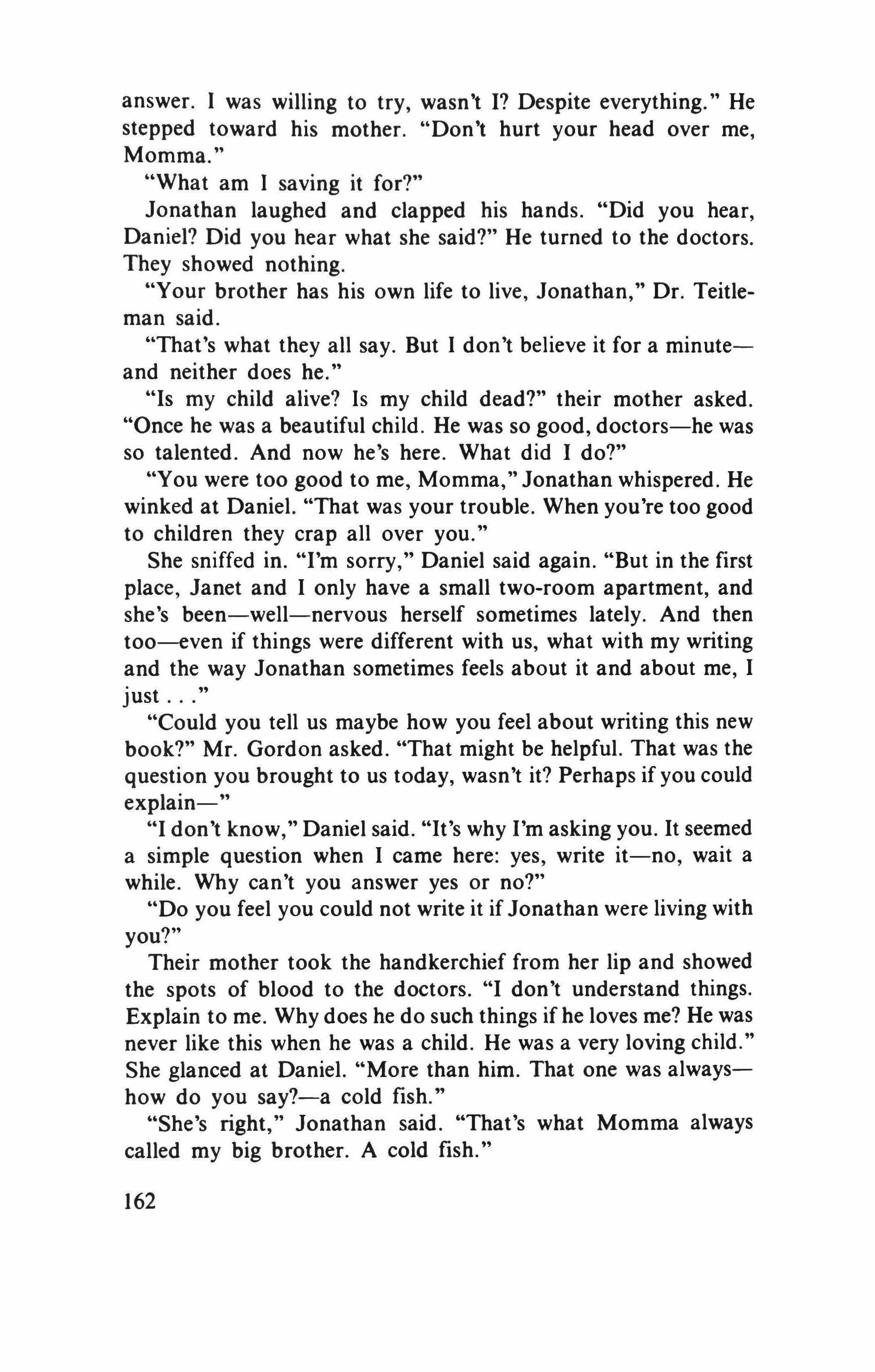
answer. I was willing to try, wasn't I? Despite everything." He stepped toward his mother. "Don't hurt your head over me, Momma."
"What am I saving it for?"
Jonathan laughed and clapped his hands. "Did you hear, Daniel? Did you hear what she said?" He turned to the doctors. They showed nothing.
"Your brother has his own life to live, Jonathan," Dr. Teitleman said.
"That's what they all say. But I don't believe it for a minuteand neither does he."
"Is my child alive? Is my child dead?" their mother asked. "Once he was a beautiful child. He was so good, doctors-he was so talented. And now he's here. What did I do?"
"You were too good to me, Momma," Jonathan whispered. He winked at Daniel. "That was your trouble. When you're too good to children they crap all over you."
She sniffed in. "I'm sorry," Daniel said again. "But in the first place, Janet and I only have a small two-room apartment, and she's been-well-nervous herself sometimes lately. And then too-even if things were different with us, what with my writing and the way Jonathan sometimes feels about it and about me, I just "
"Could you tell us maybe how you feel about writing this new book?" Mr. Gordon asked. "That might be helpful. That was the question you brought to us today, wasn't it? Perhaps if you could explain-"
"I don't know," Daniel said. "It's why I'm asking you. It seemed a simple question when I came here: yes, write it-no, wait a while. Why can't you answer yes or no?"
"Do you feel you could not write it if Jonathan were living with you?"
Their mother took the handkerchief from her lip and showed the spots of blood to the doctors. "I don't understand things. Explain to me. Why does he do such things if he loves me? He was never like this when he was a child. He was a very loving child." She glanced at Daniel. "More than him. That one was alwayshow do you say?-a cold fish."
"She's right," Jonathan said. "That's what Momma always called my big brother. A cold fish." 162
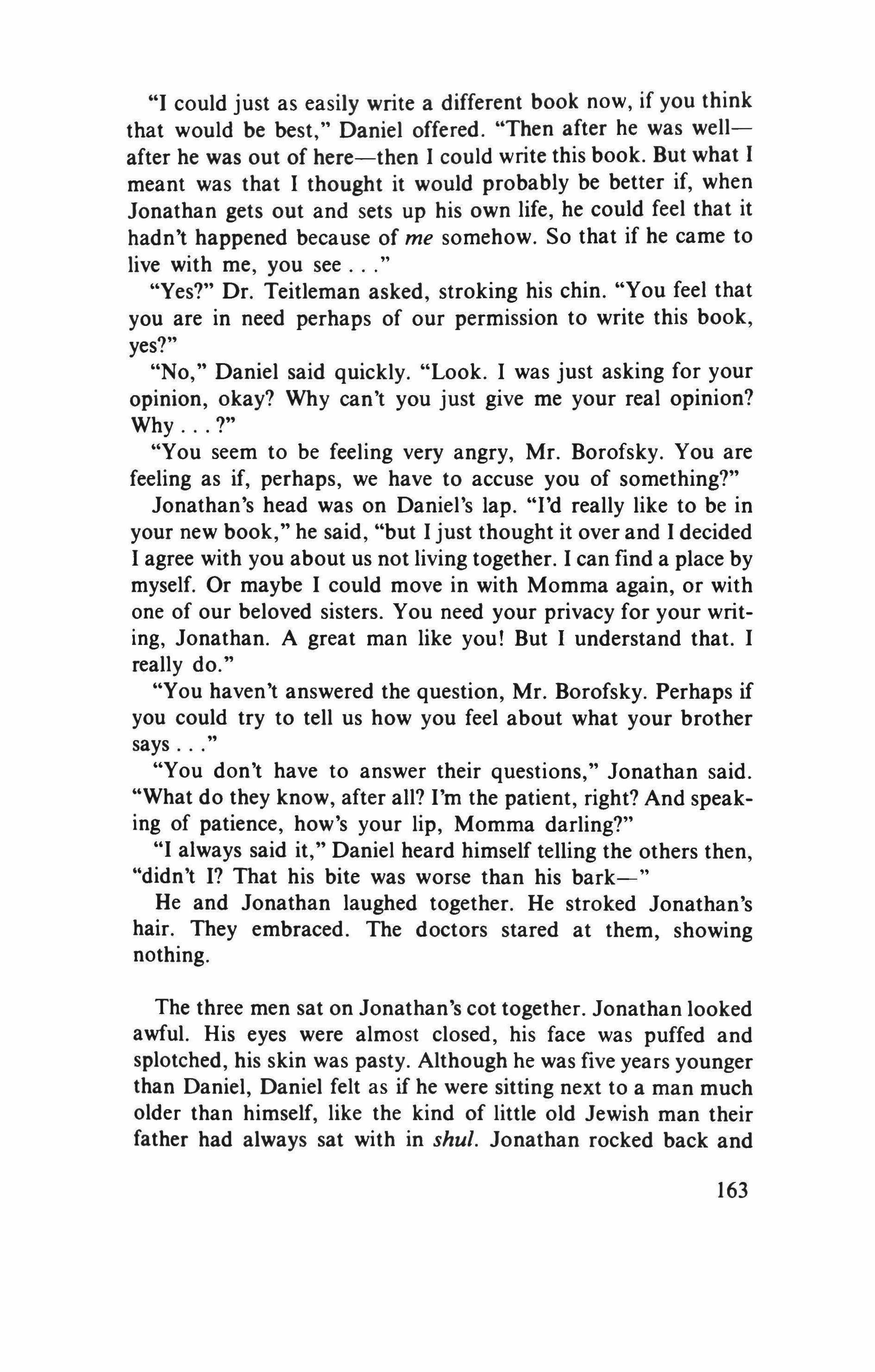
"I could just as easily write a different book now, if you think that would be best," Daniel offered. "Then after he was wellafter he was out of here-then 1 could write this book. But what 1 meant was that 1 thought it would probably be better if, when Jonathan gets out and sets up his own life, he could feel that it hadn't happened because of me somehow. So that if he came to live with me, you see "Yes?" Dr. Teitleman asked, stroking his chin. "You feel that you are in need perhaps of our permission to write this book, yes?"
"No," Daniel said quickly. "Look. ] was just asking for your opinion, okay? Why can't you just give me your real opinion? Why ?"
"You seem to be feeling very angry, Mr. Borofsky. You are feeling as if, perhaps, we have to accuse you of something?"
Jonathan's head was on Daniel's lap. "I'd really like to be in your new book," he said, "but I just thought it over and 1 decided 1 agree with you about us not living together. 1 can find a place by myself. Or maybe 1 could move in with Momma again, or with one of our beloved sisters. You need your privacy for your writing, Jonathan. A great man like you! But 1 understand that. I really do."
"You haven't answered the question, Mr. Borofsky. Perhaps if you could try to tell us how you feel about what your brother says
"You don't have to answer their questions," Jonathan said. "What do they know, after all? I'm the patient, right? And speaking of patience, how's your lip, Momma darling?"
"I always said it," Daniel heard himself telling the others then, "didn't I? That his bite was worse than his bark -
He and Jonathan laughed together. He stroked Jonathan's hair. They embraced. The doctors stared at them, showing nothing.
The three men sat on Jonathan's cot together. Jonathan looked awful. His eyes were almost closed, his face was puffed and splotched, his skin was pasty. Although he was five years younger than Daniel, Daniel felt as if he were sitting next to a man much older than himself, like the kind of little old Jewish man their father had always sat with in shul. Jonathan rocked back and 163
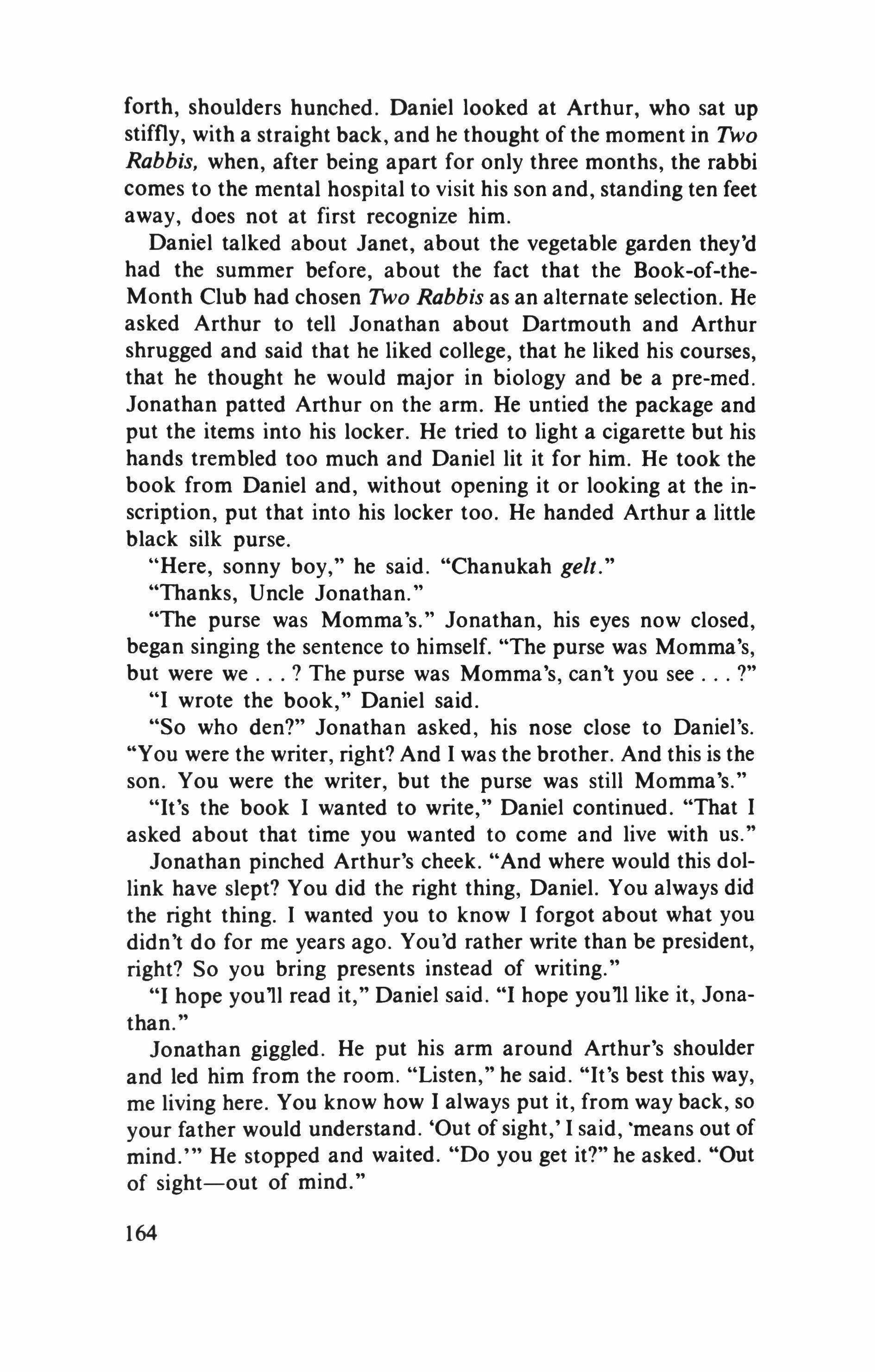
forth, shoulders hunched. Daniel looked at Arthur, who sat up stiffly, with a straight back, and he thought of the moment in Two Rabbis, when, after being apart for only three months, the rabbi comes to the mental hospital to visit his son and, standing ten feet away, does not at first recognize him.
Daniel talked about Janet, about the vegetable garden they'd had the summer before, about the fact that the Book-of-theMonth Club had chosen Two Rabbis as an alternate selection. He asked Arthur to tell Jonathan about Dartmouth and Arthur shrugged and said that he liked college, that he liked his courses, that he thought he would major in biology and be a pre-med.
Jonathan patted Arthur on the arm. He untied the package and put the items into his locker. He tried to light a cigarette but his hands trembled too much and Daniel lit it for him. He took the book from Daniel and, without opening it or looking at the inscription, put that into his locker too. He handed Arthur a little black silk purse.
"Here, sonny boy," he said. "Chanukah gelt."
"Thanks, Uncle Jonathan."
"The purse was Momma's." Jonathan, his eyes now closed, began singing the sentence to himself. "The purse was Momma's, but were we ? The purse was Momma's, can't you see T"
"I wrote the book," Daniel said.
"So who den?" Jonathan asked, his nose close to Daniel's. "You were the writer, right? And 1 was the brother. And this is the son. You were the writer, but the purse was still Momma's."
"It's the book I wanted to write," Daniel continued. "That I asked about that time you wanted to come and live with us."
Jonathan pinched Arthur's cheek. "And where would this dollink have slept? You did the right thing, Daniel. You always did the right thing. I wanted you to know I forgot about what you didn't do for me years ago. You'd rather write than be president, right? So you bring presents instead of writing."
"I hope you'll read it," Daniel said. "I hope you'll like it, Jonathan."
Jonathan giggled. He put his arm around Arthur's shoulder and led him from the room. "Listen," he said. "It's best this way, me living here. You know how I always put it, from way back, so your father would understand. 'Out of sight,' I said, 'means out of mind. '" He stopped and waited. "Do you get it?" he asked. "Out of sight-out of mind."

He leaned on Arthur. Daniel walked behind them. They stopped and Jonathan introduced Arthur to some other patients. A tall man, his hair in curlers, a purple scarf around his wrist, was banging his head against a soda machine. In the lounge, patients sat and watched television. Jonathan and Arthur joined them. Jonathan offered his new pack of cigarettes to the other patients, going to each of them, saying their names, introducing them all to Arthur, the son of his famous brother.
Jonathan let his head rest against Arthur's shoulder. Daniel saw Arthur raise his arm-hesitate-and then put it around Jonathan's shoulder, easily and gently. What was he feeling? Daniel turned away. An old man asked him for directions to the Staten Island ferry. Daniel smiled, but said nothing. The man cursed him in Yiddish and left. Daniel read the notices on the bulletin board-letters from the director and staff, rules and regulations, therapy schedules, bus schedules, menus.
Jonathan touched his arm. "I told him I'm too old to go to college, so he doesn't have to worry that I'd want to move in with him. But tell me something, Daniel: what's it like to have a son? Our father had two sons, but where did it ever get him? Can you please tell me that ?"
Jonathan started crying. He walked away from them. Daniel walked after him and put his arms around him. Jonathan let his head rest against his brother's chest. "Poppa used to come here and give me chocolate bars even though Momma told him not to, did I ever tell you? He gave the guards money so they wouldn't beat me up, in the old days. But we never spoke, Daniel." Jonathan looked around and motioned to Arthur. He put his arms around both of them and whispered: "Do you think maybe Poppa was so quiet because his tongue wasn't right? Do you remember when I tried to chew my tongue up, Daniel?" Daniel nodded. "But listen. Maybe Poppa's tongue wasn't right from the time he licked Momma's shoes. What do you think?"
Daniel tried to pull away, but Jonathan held on to his collar. "When did he ever do such a thing?" Daniel asked. Jonathan leaned back and laughed. "You mean you don't remember such a scene and yet you have the nerve to think you can write a book about us? Oh Daniel-sometimes you worry me!" He patted his brother on the arm, then put one arm into Daniel's and one into Arthur's and led them along the corridor. "But listen. It wasn't such a big deal, I suppose, but I remembered it
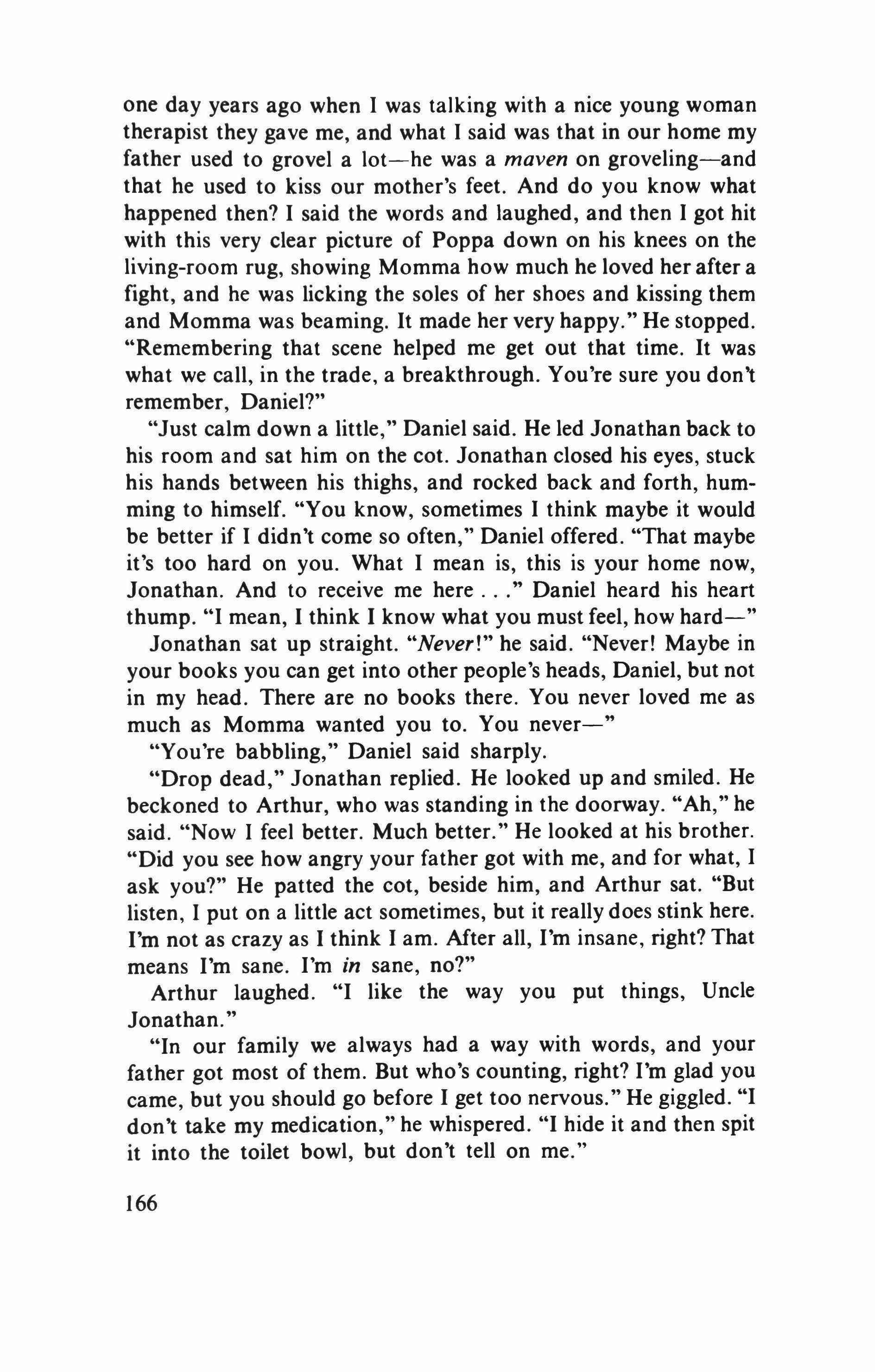
one day years ago when I was talking with a nice young woman therapist they gave me, and what I said was that in our home my father used to grovel a lot-he was a maven on groveling-and that he used to kiss our mother's feet. And do you know what happened then? I said the words and laughed, and then I got hit with this very clear picture of Poppa down on his knees on the living-room rug, showing Momma how much he loved her after a fight, and he was licking the soles of her shoes and kissing them and Momma was beaming. It made her very happy." He stopped. "Remembering that scene helped me get out that time. It was what we call, in the trade, a breakthrough. You're sure you don't remember, Daniel?"
"Just calm down a little," Daniel said. He led Jonathan back to his room and sat him on the cot. Jonathan closed his eyes, stuck his hands between his thighs, and rocked back and forth, humming to himself. "You know, sometimes I think maybe it would be better if I didn't come so often," Daniel offered. "That maybe it's too hard on you. What I mean is, this is your home now, Jonathan. And to receive me here Daniel heard his heart thump. "I mean, I think I know what you must feel, how hard-" Jonathan sat up straight. "Never!" he said. "Never! Maybe in your books you can get into other people's heads, Daniel, but not in my head. There are no books there. You never loved me as much as Momma wanted you to. You never-"
"You're babbling," Daniel said sharply. "Drop dead," Jonathan replied. He looked up and smiled. He beckoned to Arthur, who was standing in the doorway. "Ah," he said. "Now I feel better. Much better." He looked at his brother. "Did you see how angry your father got with me, and for what, I ask you?" He patted the cot, beside him, and Arthur sat. "But listen, I put on a little act sometimes, but it really does stink here. I'm not as crazy as I think I am. After all, I'm insane, right? That means I'm sane. I'm in sane, no?"
Arthur laughed. "I like the way you put things, Uncle Jonathan.
"In our family we always had a way with words, and your father got most of them. But who's counting, right? I'm glad you came, but you should go before I get too nervous." He giggled. "I don't take my medication," he whispered. "I hide it and then spit it into the toilet bowl, but don't tell on me."
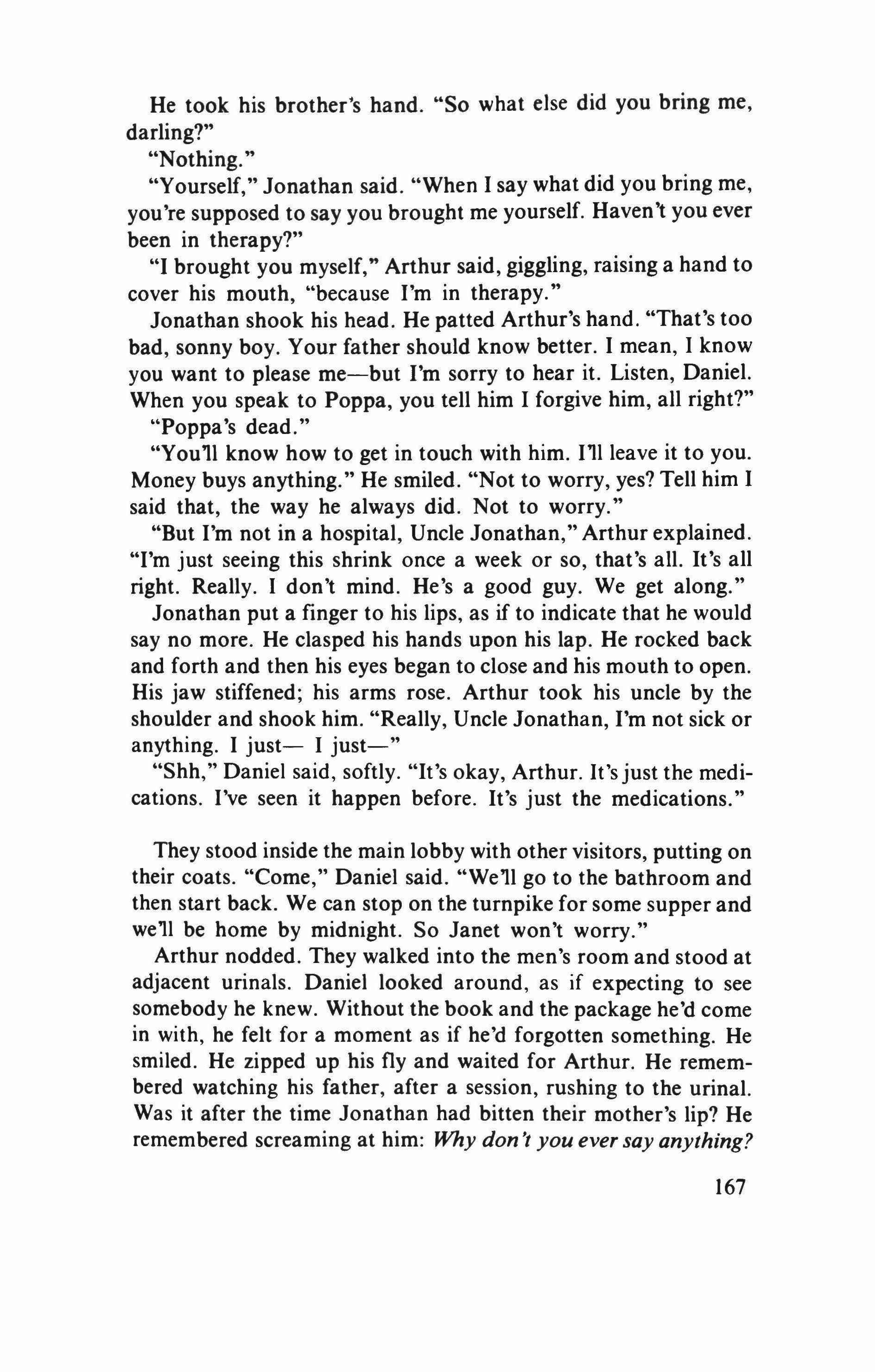
He took his brother's hand. "So what else did you bring me, darling?"
"Nothing.
"Yourself," Jonathan said. "When 1 say what did you bring me, you're supposed to say you brought me yourself. Haven't you ever been in therapy?"
"I brought you myself," Arthur said, giggling, raising a hand to cover his mouth, "because I'm in therapy."
Jonathan shook his head. He patted Arthur's hand. "That's too bad, sonny boy. Your father should know better. 1 mean, 1 know you want to please me-but I'm sorry to hear it. Listen, Daniel. When you speak to Poppa, you tell him 1 forgive him, all right?"
"Poppa's dead."
"You'll know how to get in touch with him. 111 leave it to you. Money buys anything." He smiled. "Not to worry, yes? Tell him 1 said that, the way he always did. Not to worry."
"But I'm not in a hospital, Uncle Jonathan," Arthur explained. "I'm just seeing this shrink once a week or so, that's all. It's all right. Really. I don't mind. He's a good guy. We get along."
Jonathan put a finger to his lips, as if to indicate that he would say no more. He clasped his hands upon his lap. He rocked back and forth and then his eyes began to close and his mouth to open. His jaw stiffened; his arms rose. Arthur took his uncle by the shoulder and shook him. "Really, Uncle Jonathan, I'm not sick or anything. I just- I just-"
"Shh," Daniel said, softly. "It's okay, Arthur. It's just the medications. I've seen it happen before. It's just the medications."
They stood inside the main lobby with other visitors, putting on their coats. "Come," Daniel said. "We'll go to the bathroom and then start back. We can stop on the turnpike for some supper and we'll be home by midnight. So Janet won't worry."
Arthur nodded. They walked into the men's room and stood at adjacent urinals. Daniel looked around, as if expecting to see somebody he knew. Without the book and the package he'd come in with, he felt for a moment as if he'd forgotten something. He smiled. He zipped up his fly and waited for Arthur. He remembered watching his father, after a session, rushing to the urinal. Was it after the time Jonathan had bitten their mother's lip? He remembered screaming at him: Why don't you ever say anything?
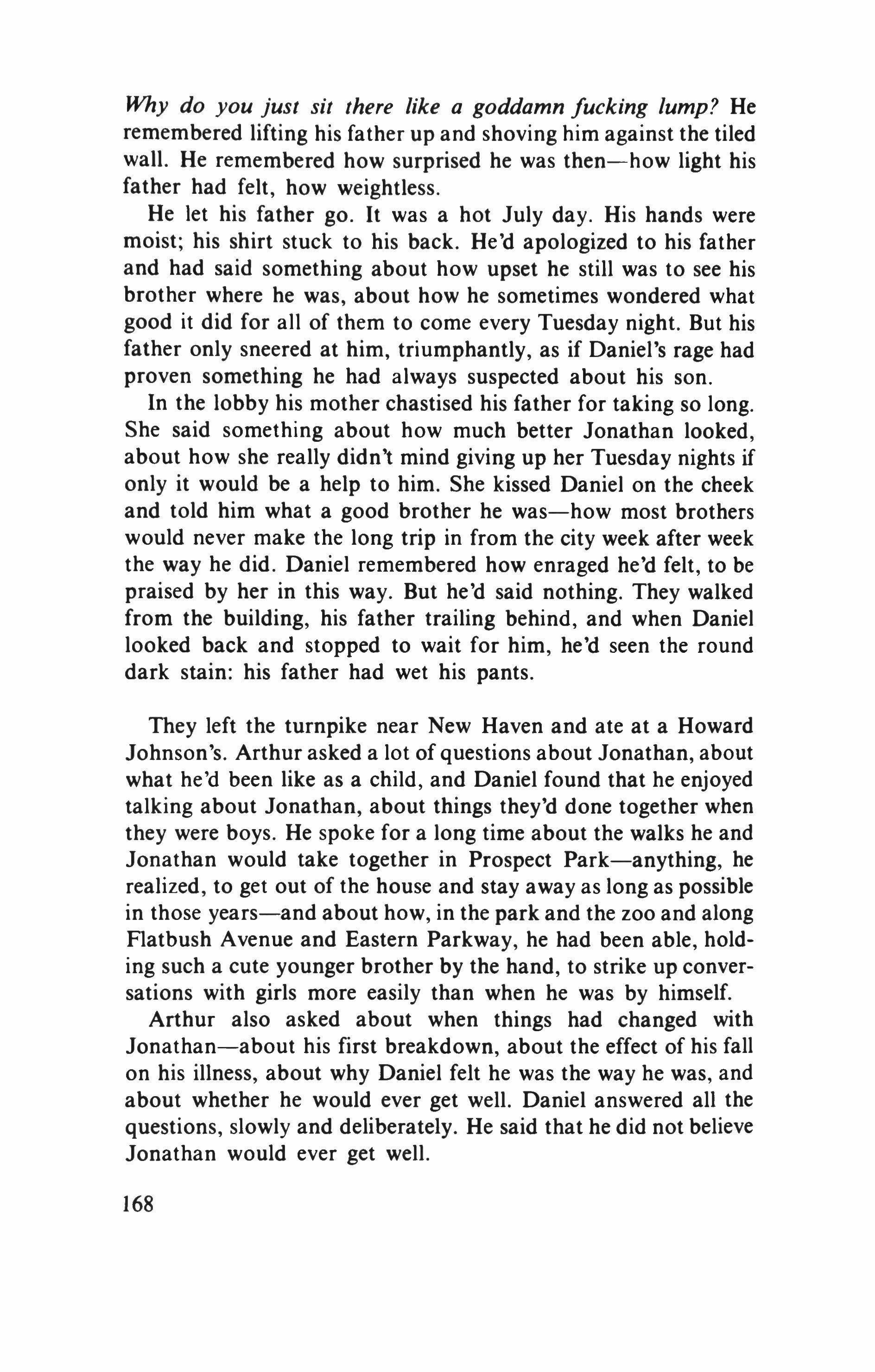
Why do you just sit there like a goddamn fucking lump? He remembered lifting his father up and shoving him against the tiled wall. He remembered how surprised he was then-how light his father had felt, how weightless.
He let his father go. It was a hot July day. His hands were moist; his shirt stuck to his back. He'd apologized to his father and had said something about how upset he still was to see his brother where he was, about how he sometimes wondered what good it did for all of them to come every Tuesday night. But his father only sneered at him, triumphantly, as if Daniel's rage had proven something he had always suspected about his son.
In the lobby his mother chastised his father for taking so long. She said something about how much better Jonathan looked, about how she really didn't mind giving up her Tuesday nights if only it would be a help to him. She kissed Daniel on the cheek and told him what a good brother he was-how most brothers would never make the long trip in from the city week after week the way he did. Daniel remembered how enraged he'd felt, to be praised by her in this way. But he'd said nothing. They walked from the building, his father trailing behind, and when Daniel looked back and stopped to wait for him, he'd seen the round dark stain: his father had wet his pants.
They left the turnpike near New Haven and ate at a Howard Johnson's. Arthur asked a lot of questions about Jonathan, about what he'd been like as a child, and Daniel found that he enjoyed talking about Jonathan, about things they'd done together when they were boys. He spoke for a long time about the walks he and Jonathan would take together in Prospect Park-anything, he realized, to get out of the house and stay away as long as possible in those years-and about how, in the park and the zoo and along Flatbush Avenue and Eastern Parkway, he had been able, holding such a cute younger brother by the hand, to strike up conversations with girls more easily than when he was by himself.
Arthur also asked about when things had changed with Jonathan-about his first breakdown, about the effect of his fall on his illness, about why Daniel felt he was the way he was, and about whether he would ever get well. Daniel answered all the questions, slowly and deliberately. He said that he did not believe Jonathan would ever get well.
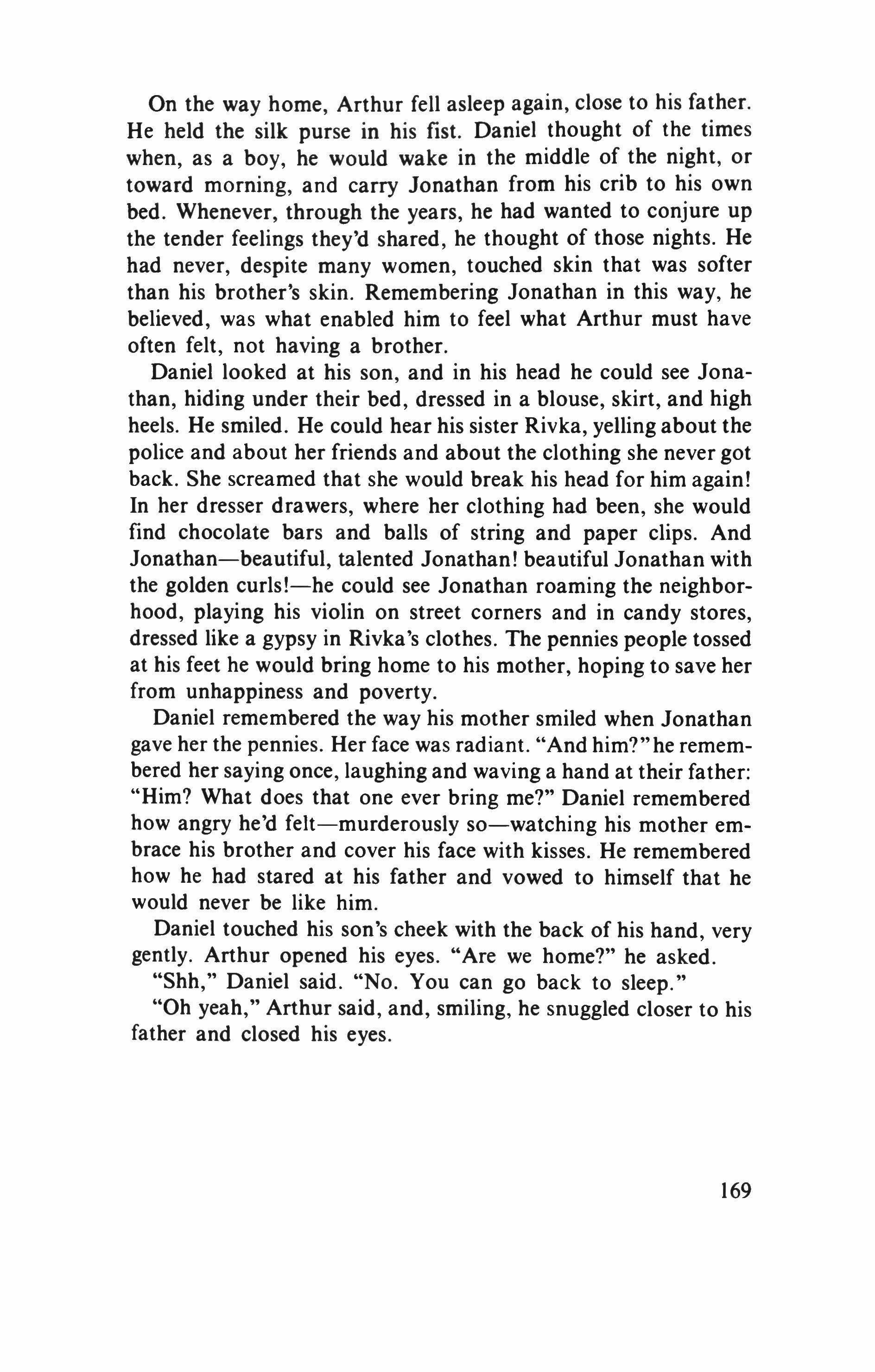
On the way home, Arthur fell asleep again, close to his father. He held the silk purse in his fist. Daniel thought of the times when, as a boy, he would wake in the middle of the night, or toward morning, and carry Jonathan from his crib to his own bed. Whenever, through the years, he had wanted to conjure up the tender feelings they'd shared, he thought of those nights. He had never, despite many women, touched skin that was softer than his brother's skin. Remembering Jonathan in this way, he believed, was what enabled him to feel what Arthur must have often felt, not having a brother.
Daniel looked at his son, and in his head he could see Jonathan, hiding under their bed, dressed in a blouse, skirt, and high heels. He smiled. He could hear his sister Rivka, yelling about the police and about her friends and about the clothing she never got back. She screamed that she would break his head for him again! In her dresser drawers, where her clothing had been, she would find chocolate bars and balls of string and paper clips. And Jonathan-beautiful, talented Jonathan! beautiful Jonathan with the golden curls!-he could see Jonathan roaming the neighborhood, playing his violin on street corners and in candy stores, dressed like a gypsy in Rivka's clothes. The pennies people tossed at his feet he would bring home to his mother, hoping to save her from unhappiness and poverty.
Daniel remembered the way his mother smiled when Jonathan gave her the pennies. Her face was radiant. "And him?"he remembered her saying once, laughing and waving a hand at their father: "Him? What does that one ever bring me?" Daniel remembered how angry he'd felt-murderously so-watching his mother embrace his brother and cover his face with kisses. He remembered how he had stared at his father and vowed to himself that he would never be like him.
Daniel touched his son's cheek with the back of his hand, very gently. Arthur opened his eyes. "Are we home?" he asked.
"Shh," Daniel said. "No. You can go back to sleep."
"Oh yeah," Arthur said, and, smiling, he snuggled closer to his father and closed his eyes.
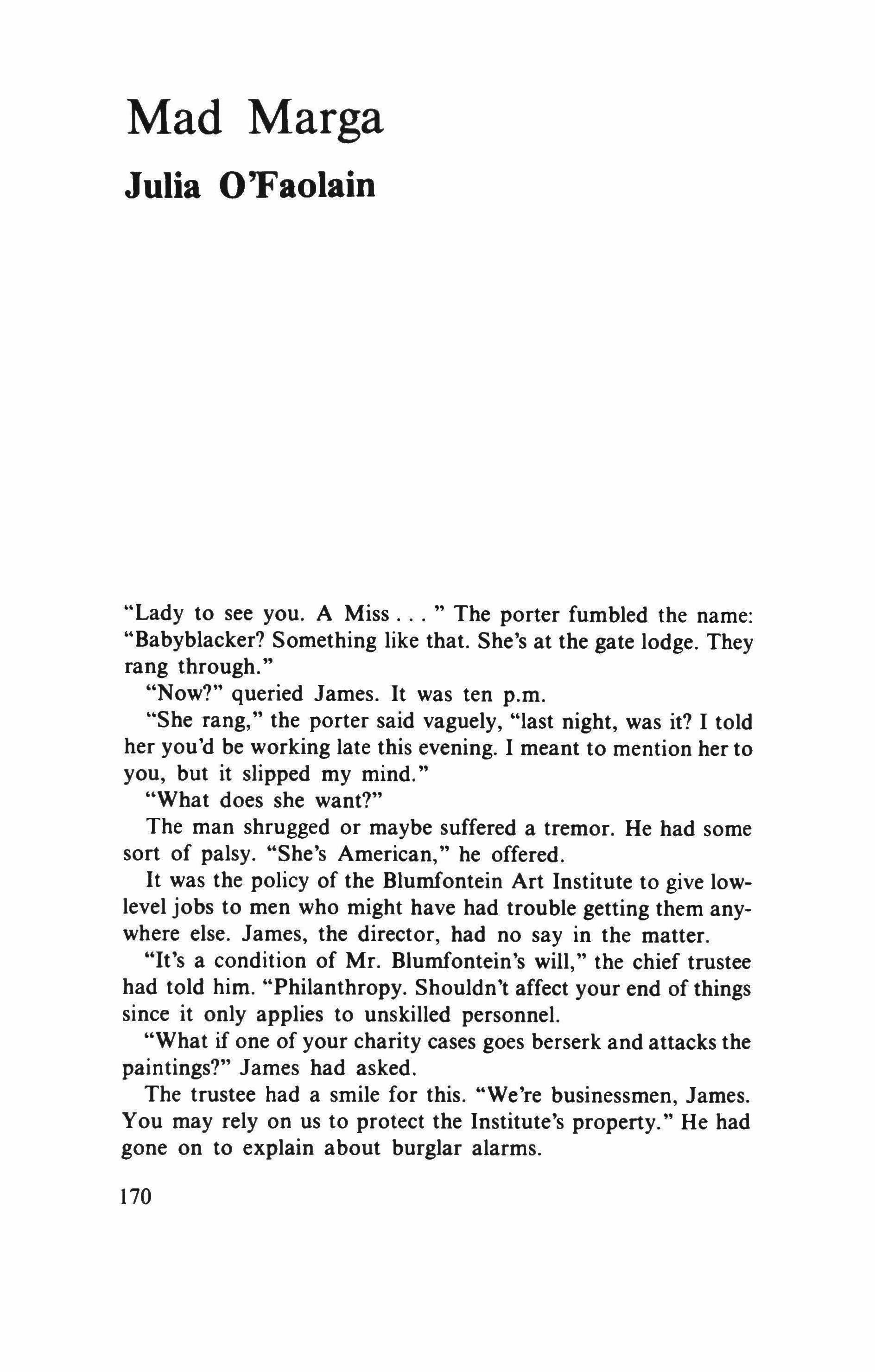
"Lady to see you. A Miss The porter fumbled the name: "Babyblacker? Something like that. She's at the gate lodge. They rang through."
"Now?" queried James. It was ten p.m.
"She rang," the porter said vaguely, "last night, was it? I told her you'd be working late this evening. I meant to mention her to you, but it slipped my mind."
"What does she want?"
The man shrugged or maybe suffered a tremor. He had some sort of palsy. "She's American," he offered.
It was the policy of the Blumfontein Art Institute to give lowlevel jobs to men who might have had trouble getting them anywhere else. James, the director, had no say in the matter.
"It's a condition of Mr. Blumfontein's will," the chief trustee had told him. "Philanthropy. Shouldn't affect your end of things since it only applies to unskilled personnel.
"What if one of your charity cases goes berserk and attacks the paintings?" James had asked.
The trustee had a smile for this. "We're businessmen, James. You may rely on us to protect the Institute's property." He had gone on to explain about burglar alarms.
170
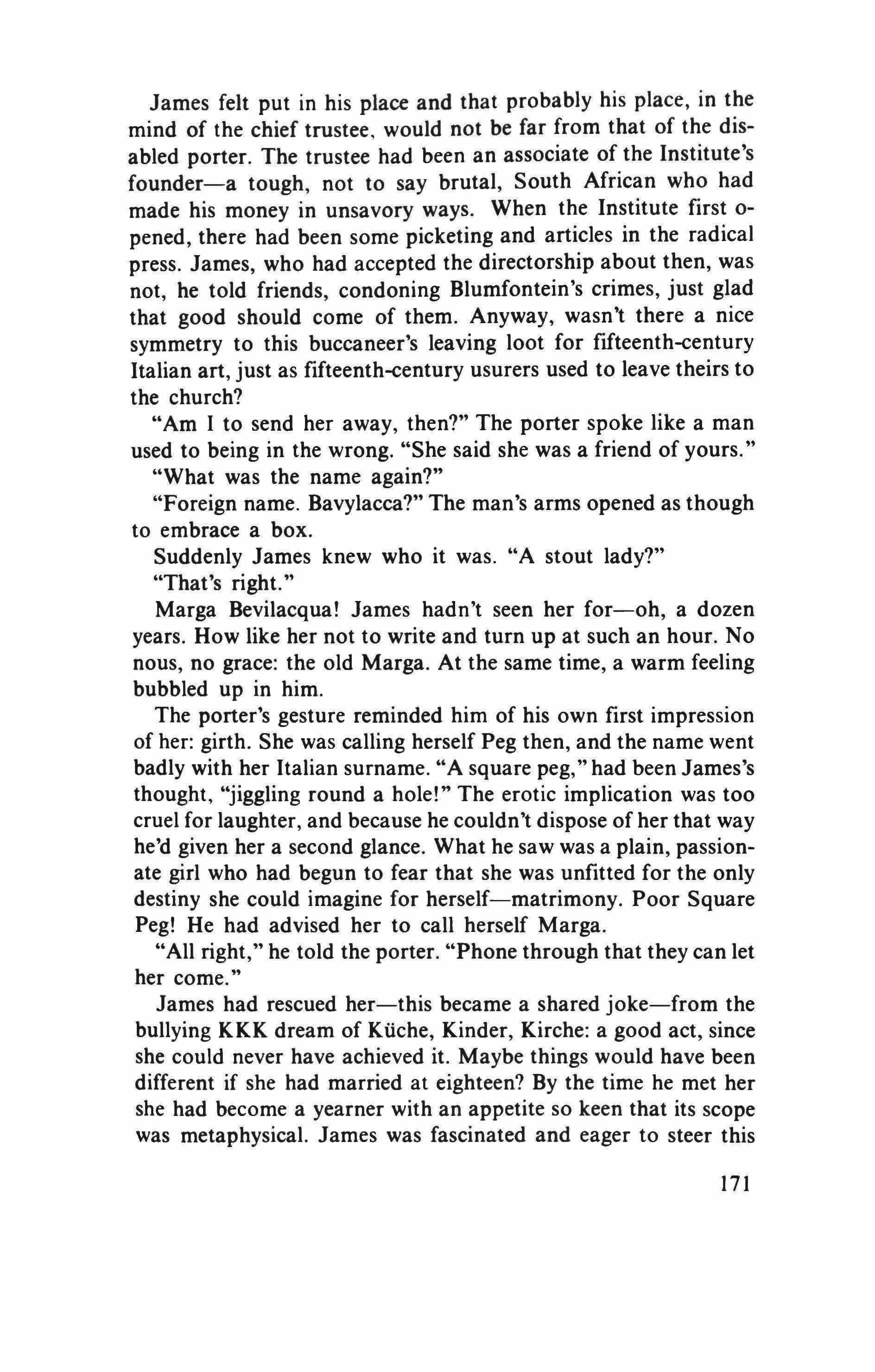
James felt put in his place and that probably his place, in the mind of the chief trustee, would not be far from that of the disabled porter. The trustee had been an associate of the Institute's founder-a tough, not to say brutal, South African who had made his money in unsavory ways. When the Institute first opened, there had been some picketing and articles in the radical press. James, who had accepted the directorship about then, was not, he told friends, condoning Blumfontein's crimes, just glad that good should come of them. Anyway, wasn't there a nice symmetry to this buccaneer's leaving loot for fifteenth-century Italian art, just as fifteenth-century usurers used to leave theirs to the church?
"Am I to send her away, then?" The porter spoke like a man used to being in the wrong. "She said she was a friend of yours.
"What was the name again?"
"Foreign name. Bavylacca?" The man's arms opened as though to embrace a box.
Suddenly James knew who it was. "A stout lady?"
"That's right."
Marga Bevilacqua! James hadn't seen her for-oh, a dozen years. How like her not to write and turn up at such an hour. No nous, no grace: the old Marga. At the same time, a warm feeling bubbled up in him.
The porter's gesture reminded him of his own first impression of her: girth. She was calling herself Peg then, and the name went badly with her Italian surname. "A square peg," had been James's thought, "jiggling round a hole!" The erotic implication was too cruel for laughter, and because he couldn't dispose of her that way he'd given her a second glance. What he saw was a plain, passionate girl who had begun to fear that she was unfitted for the only destiny she could imagine for herself-matrimony. Poor Square Peg! He had advised her to call herself Marga.
"All right," he told the porter. "Phone through that they can let her come."
James had rescued her-this became a shared joke-from the bullying KKK dream of Kuche, Kinder, Kirche: a good act, since she could never have achieved it. Maybe things would have been different if she had married at eighteen? By the time he met her she had become a yearner with an appetite so keen that its scope was metaphysical. James was fascinated and eager to steer this
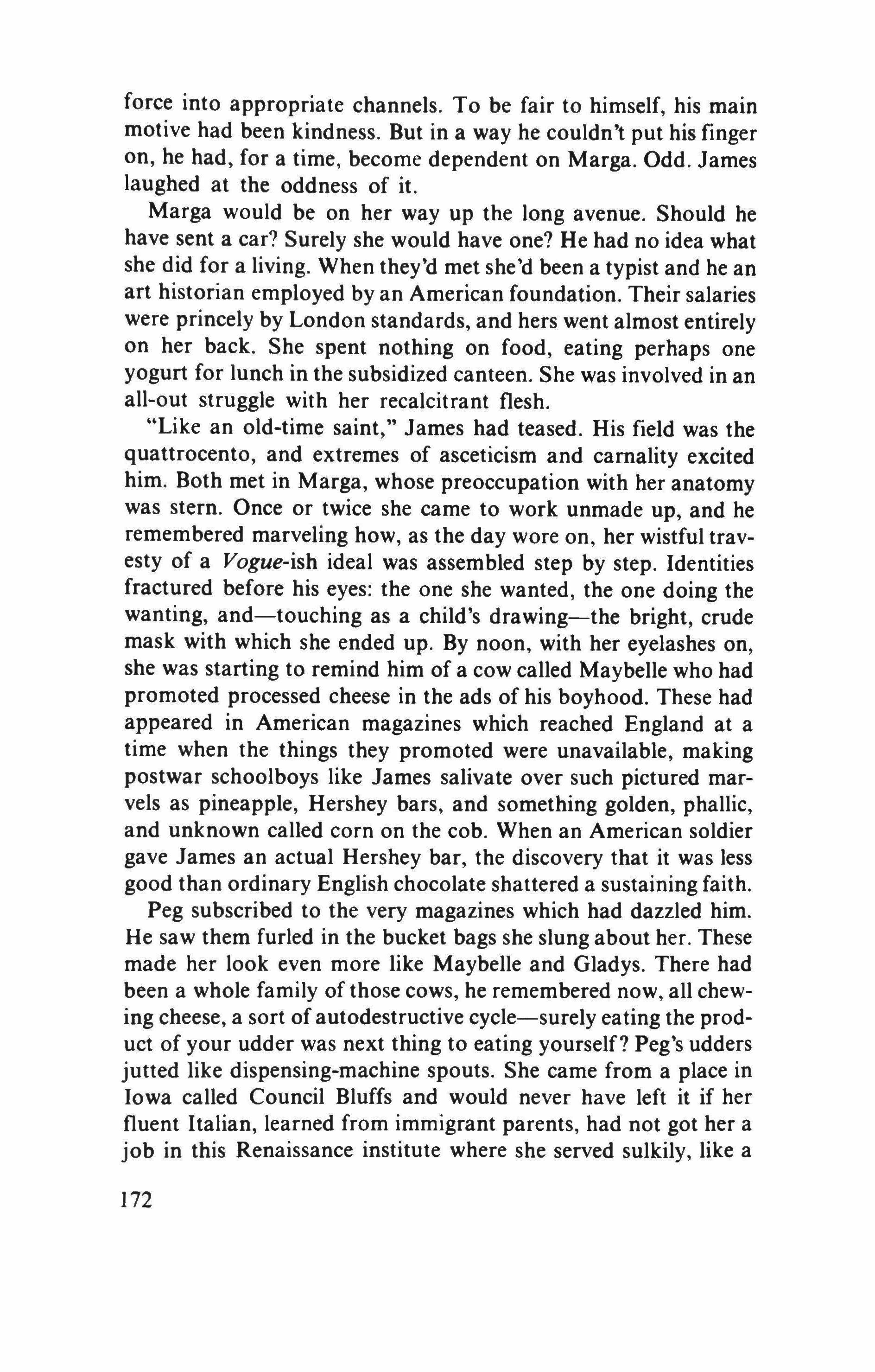
force into appropriate channels. To be fair to himself, his main motive had been kindness. But in a way he couldn't put his finger on, he had, for a time, become dependent on Marga. Odd. James laughed at the oddness of it.
Marga would be on her way up the long avenue. Should he have sent a car? Surely she would have one? He had no idea what she did for a living. When they'd met she'd been a typist and he an art historian employed by an American foundation. Their salaries were princely by London standards, and hers went almost entirely on her back. She spent nothing on food, eating perhaps one yogurt for lunch in the subsidized canteen. She was involved in an all-out struggle with her recalcitrant flesh.
"Like an old-time saint," James had teased. His field was the quattrocento, and extremes of asceticism and carnality excited him. Both met in Marga, whose preoccupation with her anatomy was stern. Once or twice she came to work unmade up, and he remembered marveling how, as the day wore on, her wistful travesty of a Vogue-ish ideal was assembled step by step. Identities fractured before his eyes: the one she wanted, the one doing the wanting, and-touching as a child's drawing-the bright, crude mask with which she ended up. By noon, with her eyelashes on, she was starting to remind him of a cow called Maybelle who had promoted processed cheese in the ads of his boyhood. These had appeared in American magazines which reached England at a time when the things they promoted were unavailable, making postwar schoolboys like James salivate over such pictured marvels as pineapple, Hershey bars, and something golden, phallic, and unknown called corn on the cob. When an American soldier gave James an actual Hershey bar, the discovery that it was less good than ordinary English chocolate shattered a sustaining faith.
Peg subscribed to the very magazines which had dazzled him. He saw them furled in the bucket bags she slung about her. These made her look even more like Maybelle and Gladys. There had been a whole family of those cows, he remembered now, all chewing cheese, a sort of autodestructive cycle-surely eating the product of your udder was next thing to eating yourself? Peg's udders jutted like dispensing-machine spouts. She came from a place in Iowa called Council Bluffs and would never have left it if her fluent Italian, learned from immigrant parents, had not got her a job in this Renaissance institute where she served sulkily, like a
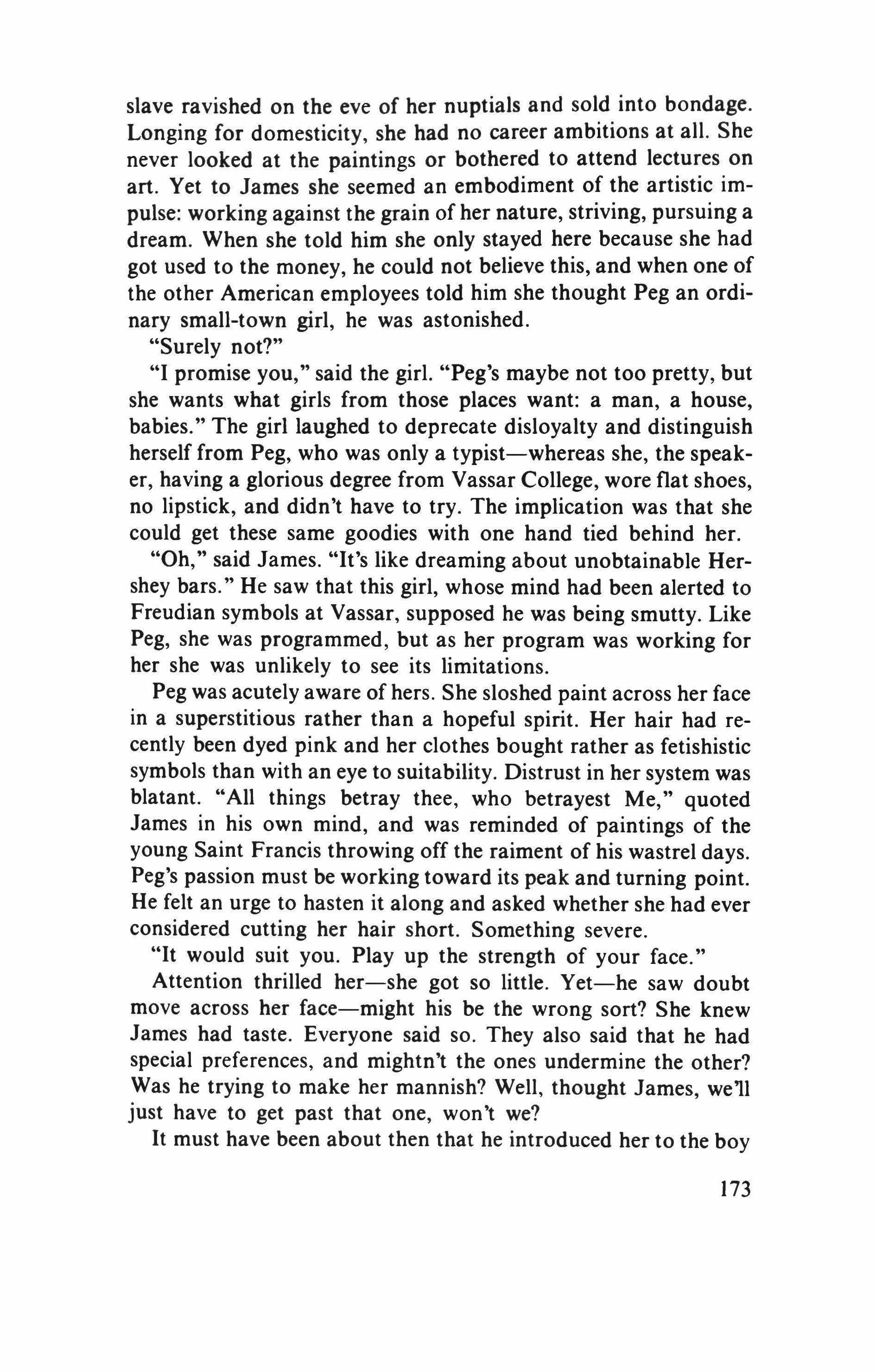
slave ravished on the eve of her nuptials and sold into bondage. Longing for domesticity, she had no career ambitions at all. She never looked at the paintings or bothered to attend lectures on art. Yet to James she seemed an embodiment of the artistic impulse: working against the grain of her nature, striving, pursuing a dream. When she told him she only stayed here because she had got used to the money, he could not believe this, and when one of the other American employees told him she thought Peg an ordinary small-town girl, he was astonished.
"Surely not?"
"I promise you," said the girl. "Peg's maybe not too pretty, but she wants what girls from those places want: a man, a house, babies." The girl laughed to deprecate disloyalty and distinguish herself from Peg, who was only a typist-whereas she, the speaker, having a glorious degree from Vassar College, wore flat shoes, no lipstick, and didn't have to try. The implication was that she could get these same goodies with one hand tied behind her.
"Oh," said James. "It's like dreaming about unobtainable Hershey bars." He saw that this girl, whose mind had been alerted to Freudian symbols at Vassar, supposed he was being smutty. Like Peg, she was programmed, but as her program was working for her she was unlikely to see its limitations.
Peg was acutely aware of hers. She sloshed paint across her face in a superstitious rather than a hopeful spirit. Her hair had recently been dyed pink and her clothes bought rather as fetishistic symbols than with an eye to suitability. Distrust in her system was blatant. "All things betray thee, who betrayest Me," quoted James in his own mind, and was reminded of paintings of the young Saint Francis throwing off the raiment of his wastrel days. Peg's passion must be working toward its peak and turning point. He felt an urge to hasten it along and asked whether she had ever considered cutting her hair short. Something severe.
"It would suit you. Play up the strength of your face."
Attention thrilled her-she got so little. Yet-he saw doubt move across her face-might his be the wrong sort? She knew James had taste. Everyone said so. They also said that he had special preferences, and mightn't the ones undermine the other? Was he trying to make her mannish? Well, thought James, we'll just have to get past that one, won't we?
It must have been about then that he introduced her to the boy
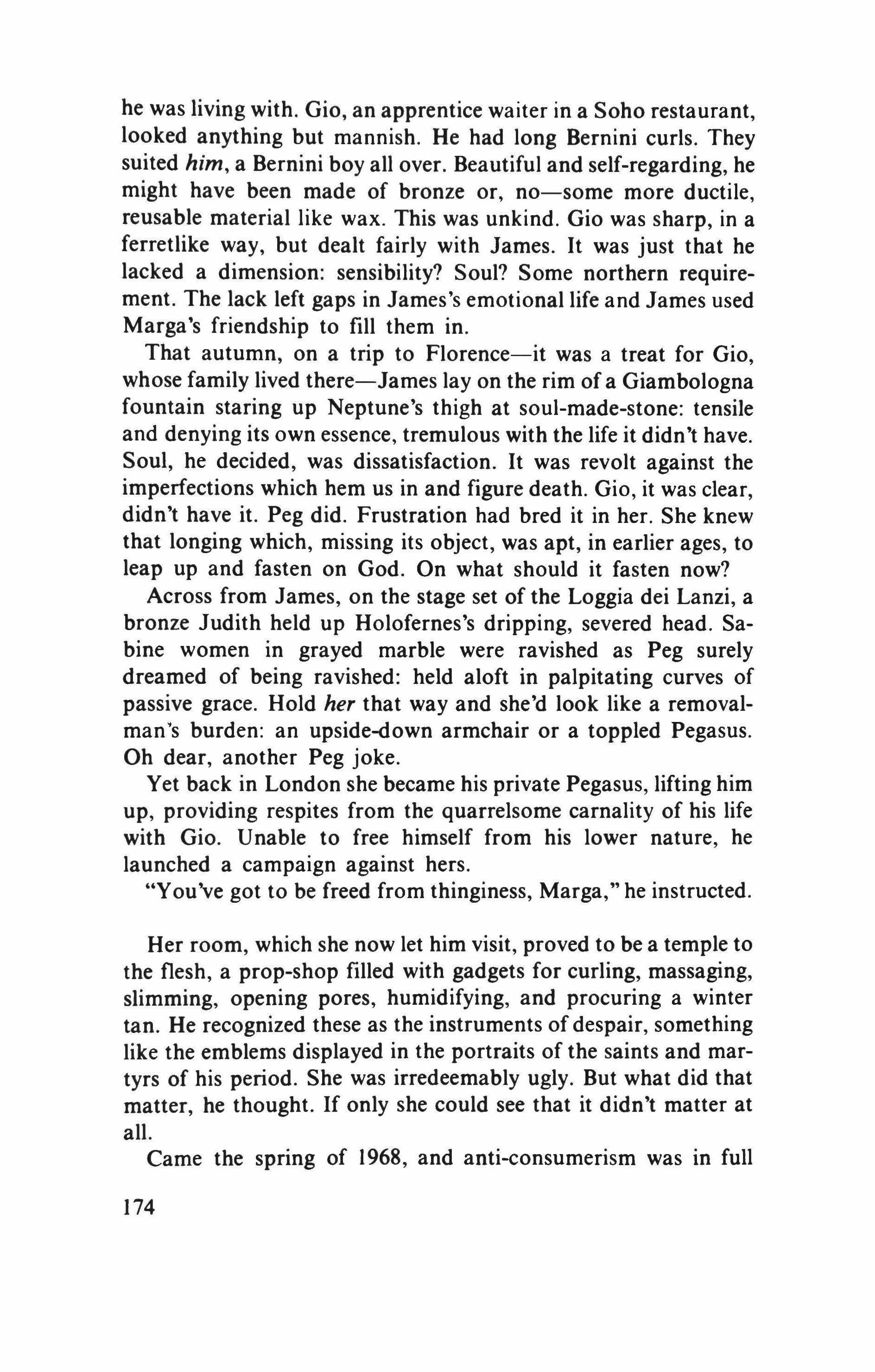
he was living with. Gio, an apprentice waiter in a Soho restaurant, looked anything but mannish. He had long Bernini curls. They suited him, a Bernini boy all over. Beautiful and self-regarding, he might have been made of bronze or, no-some more ductile, reusable material like wax. This was unkind. Gio was sharp, in a ferretlike way, but dealt fairly with James. It was just that he lacked a dimension: sensibility? Soul? Some northern requirement. The lack left gaps in James's emotional life and James used Marga's friendship to fill them in.
That autumn, on a trip to Florence-it was a treat for Gio, whose family lived there-James lay on the rim of a Giambologna fountain staring up Neptune's thigh at soul-made-stone: tensile and denying its own essence, tremulous with the life it didn't have. Soul, he decided, was dissatisfaction. It was revolt against the imperfections which hem us in and figure death. Gio, it was clear, didn't have it. Peg did. Frustration had bred it in her. She knew that longing which, missing its object, was apt, in earlier ages, to leap up and fasten on God. On what should it fasten now?
Across from James, on the stage set of the Loggia dei Lanzi, a bronze Judith held up Holofernes's dripping, severed head. Sabine women in grayed marble were ravished as Peg surely dreamed of being ravished: held aloft in palpitating curves of passive grace. Hold her that way and she'd look like a removalman's burden: an upside-down armchair or a toppled Pegasus. Oh dear, another Peg joke.
Yet back in London she became his private Pegasus, lifting him up, providing respites from the quarrelsome carnality of his life with Gio. Unable to free himself from his lower nature, he launched a campaign against hers.
"You've got to be freed from thinginess, Marga," he instructed.
Her room, which she now let him visit, proved to be a temple to the flesh, a prop-shop filled with gadgets for curling, massaging, slimming, opening pores, humidifying, and procuring a winter tan. He recognized these as the instruments of despair, something like the emblems displayed in the portraits of the saints and martyrs of his period. She was irredeemably ugly. But what did that matter, he thought. If only she could see that it didn't matter at all.
Came the spring of 1968, and anti-consumerism was in full
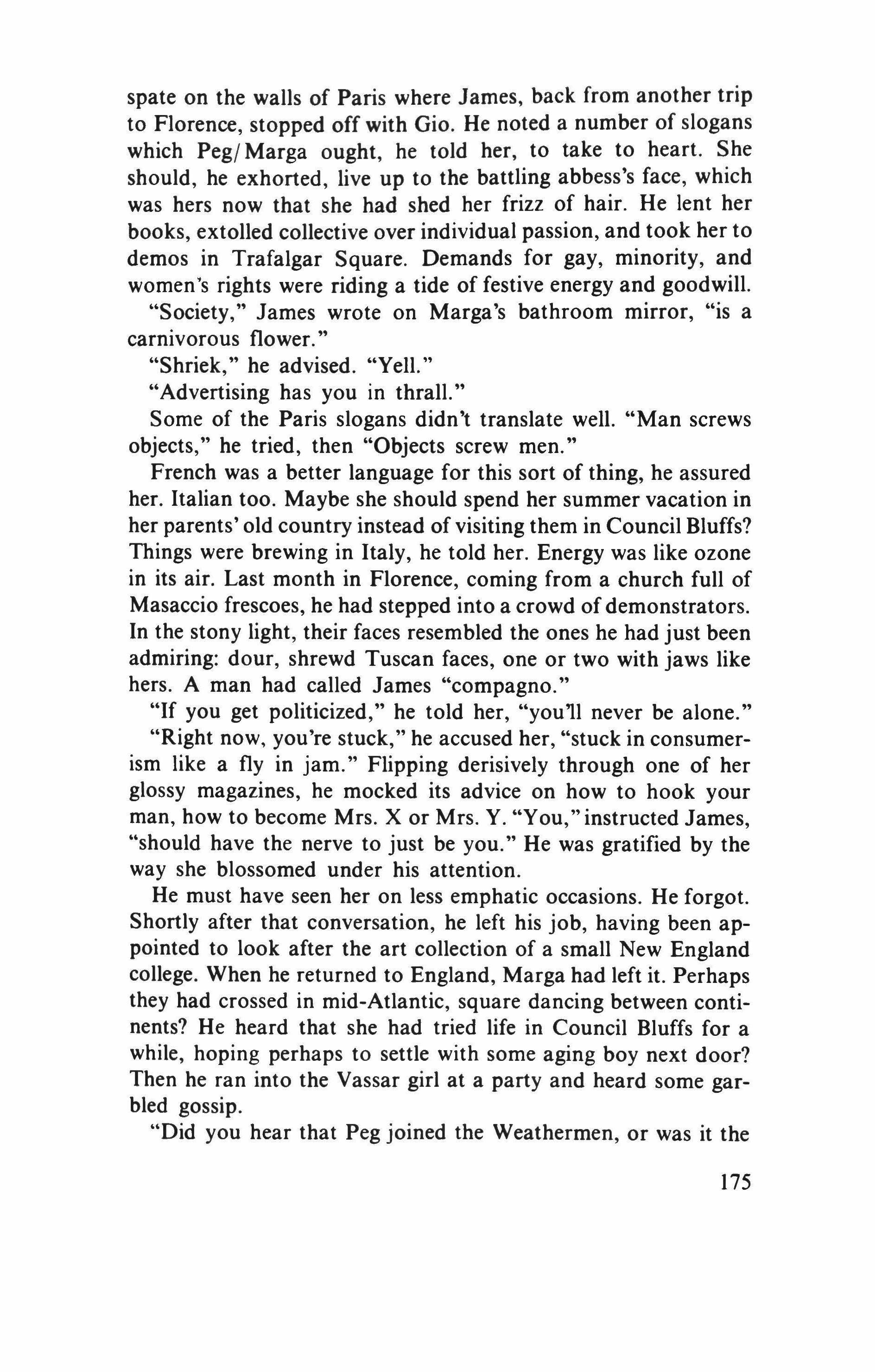
spate on the walls of Paris where James, back from another trip to Florence, stopped off with Gio. He noted a number of slogans which Peg/ Marga ought, he told her, to take to heart. She should, he exhorted, live up to the battling abbess's face, which was hers now that she had shed her frizz of hair. He lent her books, extolled collective over individual passion, and took her to demos in Trafalgar Square. Demands for gay, minority, and women's rights were riding a tide of festive energy and goodwill.
"Society," James wrote on Marga's bathroom mirror, "is a carnivorous flower."
"Shriek," he advised. "Yell."
"Advertising has you in thrall."
Some of the Paris slogans didn't translate well. "Man screws objects," he tried, then "Objects screw men."
French was a better language for this sort of thing, he assured her. Italian too. Maybe she should spend her summer vacation in her parents' old country instead of visiting them in Council Bluffs? Things were brewing in Italy, he told her. Energy was like ozone in its air. Last month in Florence, coming from a church full of Masaccio frescoes, he had stepped into a crowd of demonstrators. In the stony light, their faces resembled the ones he had just been admiring: dour, shrewd Tuscan faces, one or two with jaws like hers. A man had called James "compagno."
"If you get politicized," he told her, "you'll never be alone."
"Right now, you're stuck," he accused her, "stuck in consumerism like a fly in jam." Flipping derisively through one of her glossy magazines, he mocked its advice on how to hook your man, how to become Mrs. X or Mrs. Y. "You," instructed James, "should have the nerve to just be you." He was gratified by the way she blossomed under his attention.
He must have seen her on less emphatic occasions. He forgot. Shortly after that conversation, he left his job, having been appointed to look after the art collection of a small New England college. When he returned to England, Marga had left it. Perhaps they had crossed in mid-Atlantic, square dancing between continents? He heard that she had tried life in Council Bluffs for a while, hoping perhaps to settle with some aging boy next door? Then he ran into the Vassar girl at a party and heard some garbled gossip.
"Did you hear that Peg joined the Weathermen, or was it the 175
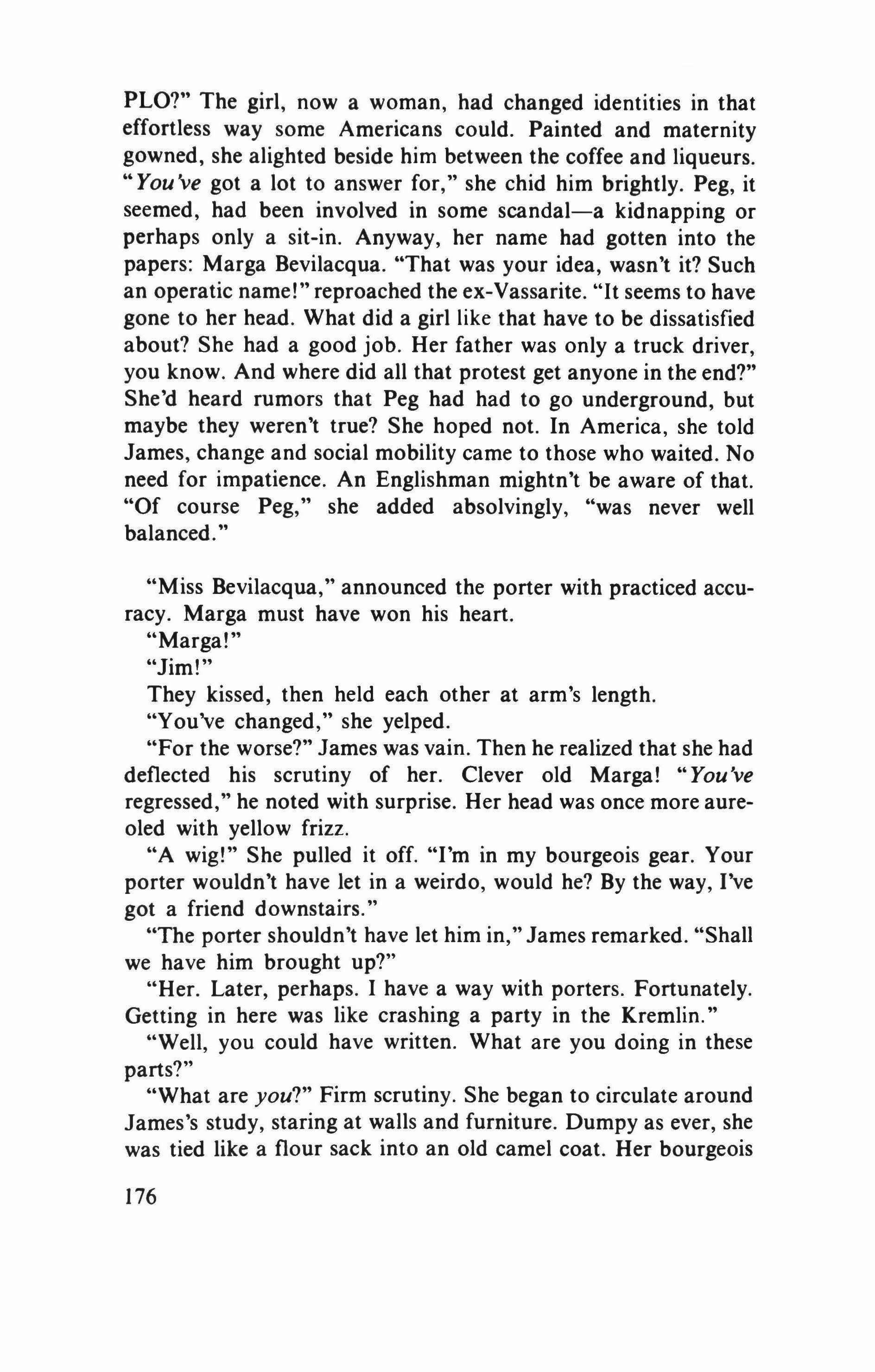
PLO?" The girl, now a woman, had changed identities in that effortless way some Americans could. Painted and maternity gowned, she alighted beside him between the coffee and liqueurs. "You've got a lot to answer for," she chid him brightly. Peg, it seemed, had been involved in some scandal-a kidnapping or perhaps only a sit-in. Anyway, her name had gotten into the papers: Marga Bevilacqua. "That was your idea, wasn't it? Such an operatic name!" reproached the ex-Vassarite. "It seems to have gone to her head. What did a girl like that have to be dissatisfied about? She had a good job. Her father was only a truck driver, you know. And where did all that protest get anyone in the end?" She'd heard rumors that Peg had had to go underground, but maybe they weren't true? She hoped not. In America, she told James, change and social mobility came to those who waited. No need for impatience. An Englishman mightn't be aware of that. "Of course Peg," she added absolvingly, "was never well balanced.
"Miss Bevilacqua," announced the porter with practiced accuracy. Marga must have won his heart.
"Marga!"
"Jim!"
They kissed, then held each other at arm's length.
"You've changed," she yelped.
"For the worse?" James was vain. Then he realized that she had deflected his scrutiny of her. Clever old Marga! You've regressed," he noted with surprise. Her head was once more aureoled with yellow frizz.
"A wig!" She pulled it off. "I'm in my bourgeois gear. Your porter wouldn't have let in a weirdo, would he? By the way, I've got a friend downstairs."
"The porter shouldn't have let him in," James remarked. "Shall we have him brought up?"
"Her. Later, perhaps. I have a way with porters. Fortunately. Getting in here was like crashing a party in the Kremlin."
"Well, you could have written. What are you doing in these parts?"
"What are you?" Firm scrutiny. She began to circulate around James's study, staring at walls and furniture. Dumpy as ever, she was tied like a flour sack into an old camel coat. Her bourgeois 176
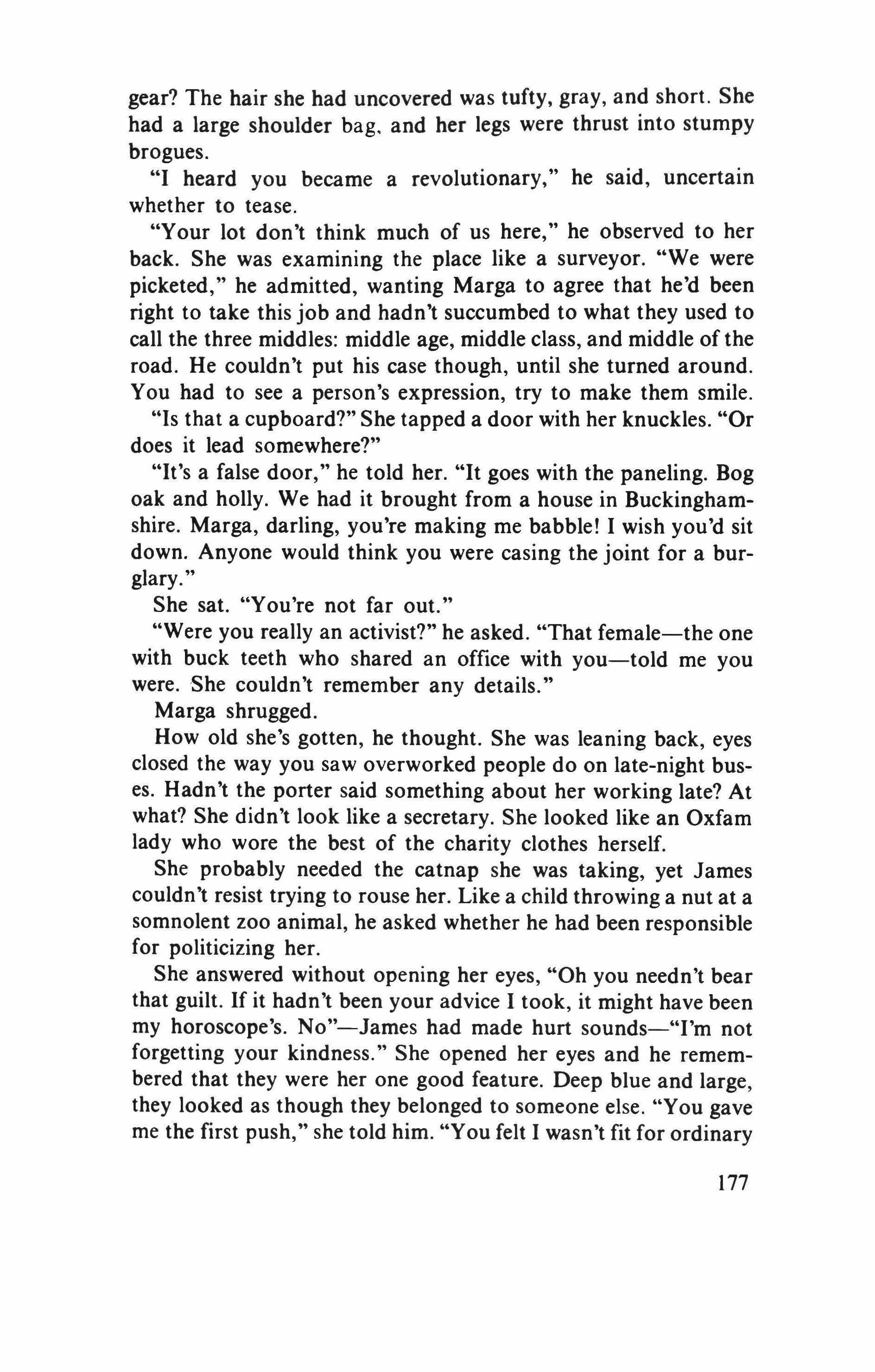
gear? The hair she had uncovered was tufty, gray, and short. She had a large shoulder bag. and her legs were thrust into stumpy brogues.
"I heard you became a revolutionary," he said, uncertain whether to tease.
"Your lot don't think much of us here," he observed to her back. She was examining the place like a surveyor. "We were picketed," he admitted, wanting Marga to agree that he'd been right to take this job and hadn't succumbed to what they used to call the three middles: middle age, middle class, and middle of the road. He couldn't put his case though, until she turned around. You had to see a person's expression, try to make them smile.
"Is that a cupboard?" She tapped a door with her knuckles. "Or does it lead somewhere?"
"It's a false door," he told her. "It goes with the paneling. Bog oak and holly. We had it brought from a house in Buckinghamshire. Marga, darling, you're making me babble! I wish you'd sit down. Anyone would think you were casing the joint for a burglary."
She sat. "You're not far out."
"Were you really an activist?" he asked. "That female-the one with buck teeth who shared an office with you-told me you were. She couldn't remember any details."
Marga shrugged.
How old she's gotten, he thought. She was leaning back, eyes closed the way you saw overworked people do on late-night buses. Hadn't the porter said something about her working late? At what? She didn't look like a secretary. She looked like an Oxfam lady who wore the best of the charity clothes herself.
She probably needed the catnap she was taking, yet James couldn't resist trying to rouse her. Like a child throwing a nut at a somnolent zoo animal, he asked whether he had been responsible for politicizing her.
She answered without opening her eyes, "Oh you needn't bear that guilt. If it hadn't been your advice I took, it might have been my horoscope's. No"-James had made hurt sounds-"I'm not forgetting your kindness." She opened her eyes and he remembered that they were her one good feature. Deep blue and large, they looked as though they belonged to someone else. "You gave me the first push," she told him. "You felt I wasn't fit for ordinary
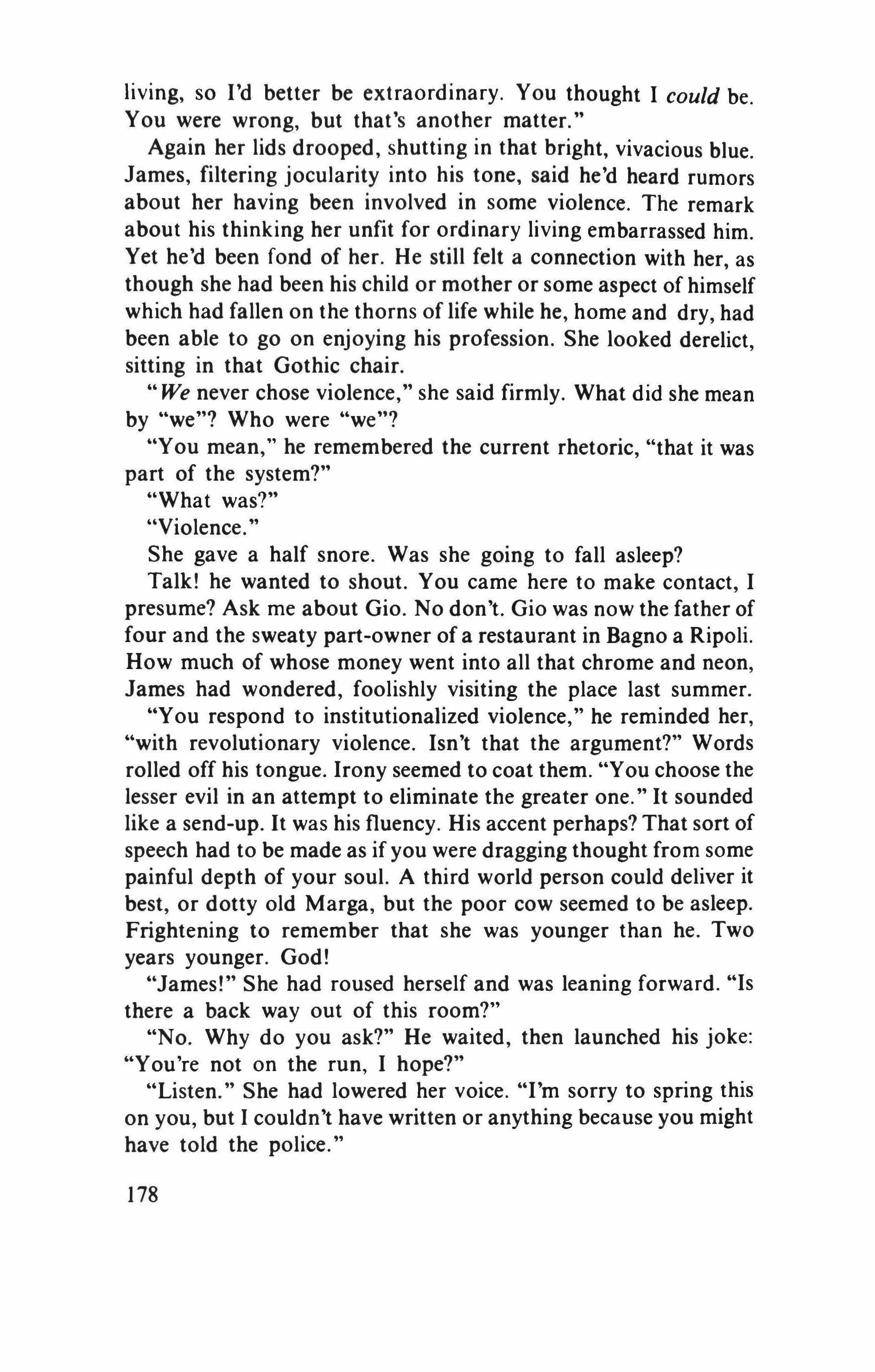
living, so I'd better be extraordinary. You thought I could be. You were wrong, but that's another matter."
Again her lids drooped, shutting in that bright, vivacious blue. James, filtering jocularity into his tone, said he'd heard rumors about her having been involved in some violence. The remark about his thinking her unfit for ordinary living embarrassed him. Yet he'd been fond of her. He still felt a connection with her, as though she had been his child or mother or some aspect of himself which had fallen on the thorns of life while he, home and dry, had been able to go on enjoying his profession. She looked derelict, sitting in that Gothic chair.
"We never chose violence," she said firmly. What did she mean by "we"? Who were "we"?
"You mean," he remembered the current rhetoric, "that it was part of the system?"
"What was?"
"Violence."
She gave a half snore. Was she going to fall asleep? Talk! he wanted to shout. You came here to make contact, I presume? Ask me about Gio. No don't. Gio was now the father of four and the sweaty part-owner of a restaurant in Bagno a Ripoli. How much of whose money went into all that chrome and neon, James had wondered, foolishly visiting the place last summer.
"You respond to institutionalized violence," he reminded her, "with revolutionary violence. Isn't that the argument?" Words rolled off his tongue. Irony seemed to coat them. "You choose the lesser evil in an attempt to eliminate the greater one." It sounded like a send-up. It was his fluency. His accent perhaps? That sort of speech had to be made as if you were dragging thought from some painful depth of your soul. A third world person could deliver it best, or dotty old Marga, but the poor cow seemed to be asleep. Frightening to remember that she was younger than he. Two years younger. God!
"James!" She had roused herself and was leaning forward. "Is there a back way out of this room?"
"No. Why do you ask?" He waited, then launched his joke: "You're not on the run, I hope?"
"Listen." She had lowered her voice. "I'm sorry to spring this on you, but I couldn't have written or anything because you might have told the police."
178
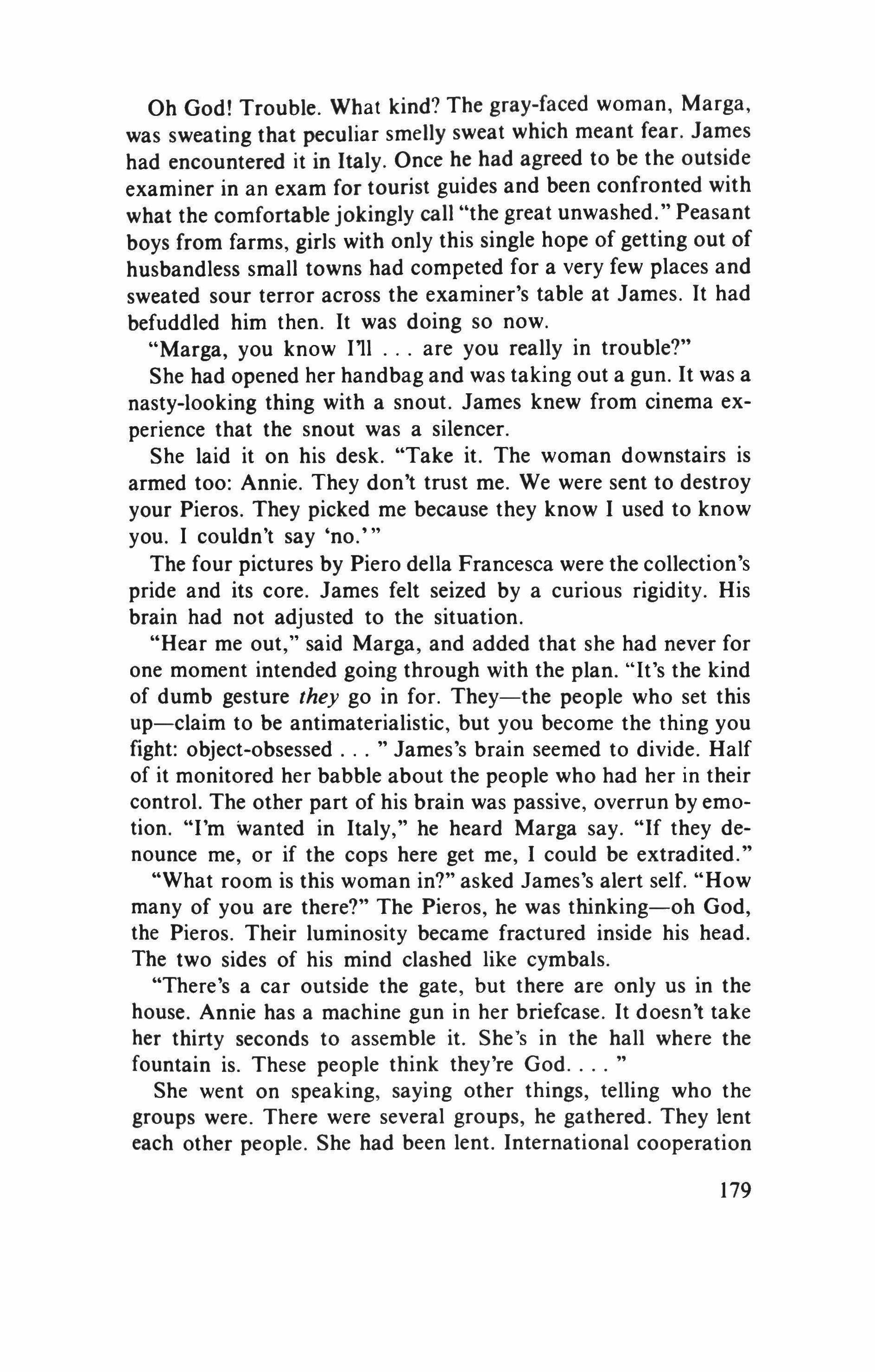
Oh God! Trouble. What kind? The gray-faced woman, Marga, was sweating that peculiar smelly sweat which meant fear. James had encountered it in Italy. Once he had agreed to be the outside examiner in an exam for tourist guides and been confronted with what the comfortable jokingly call "the great unwashed." Peasant boys from farms, girls with only this single hope of getting out of husbandless small towns had competed for a very few places and sweated sour terror across the examiner's table at James. It had befuddled him then. It was doing so now.
"Marga, you know 111 are you really in trouble?"
She had opened her handbag and was taking out a gun. It was a nasty-looking thing with a snout. James knew from cinema experience that the snout was a silencer.
She laid it on his desk. "Take it. The woman downstairs is armed too: Annie. They don't trust me. We were sent to destroy your Pieros. They picked me because they know I used to know you. I couldn't say 'no. ",
The four pictures by Piero della Francesca were the collection's pride and its core. James felt seized by a curious rigidity. His brain had not adjusted to the situation.
"Hear me out," said Marga, and added that she had never for one moment intended going through with the plan. "It's the kind of dumb gesture they go in for. They-the people who set this up-claim to be antimaterialistic, but you become the thing you fight: object-obsessed James's brain seemed to divide. Half of it monitored her babble about the people who had her in their control. The other part of his brain was passive, overrun by emotion. "I'm wanted in Italy," he heard Marga say. "If they denounce me, or if the cops here get me, I could be extradited."
"What room is this woman in?" asked James's alert self. "How many of you are there?" The Pieros, he was thinking-oh God, the Pieros. Their luminosity became fractured inside his head. The two sides of his mind clashed like cymbals.
"There's a car outside the gate, but there are only us in the house. Annie has a machine gun in her briefcase. It doesn't take her thirty seconds to assemble it. She's in the hall where the fountain is. These people think they're God
She went on speaking, saying other things, telling who the groups were. There were several groups, he gathered. They lent each other people. She had been lent. International cooperation
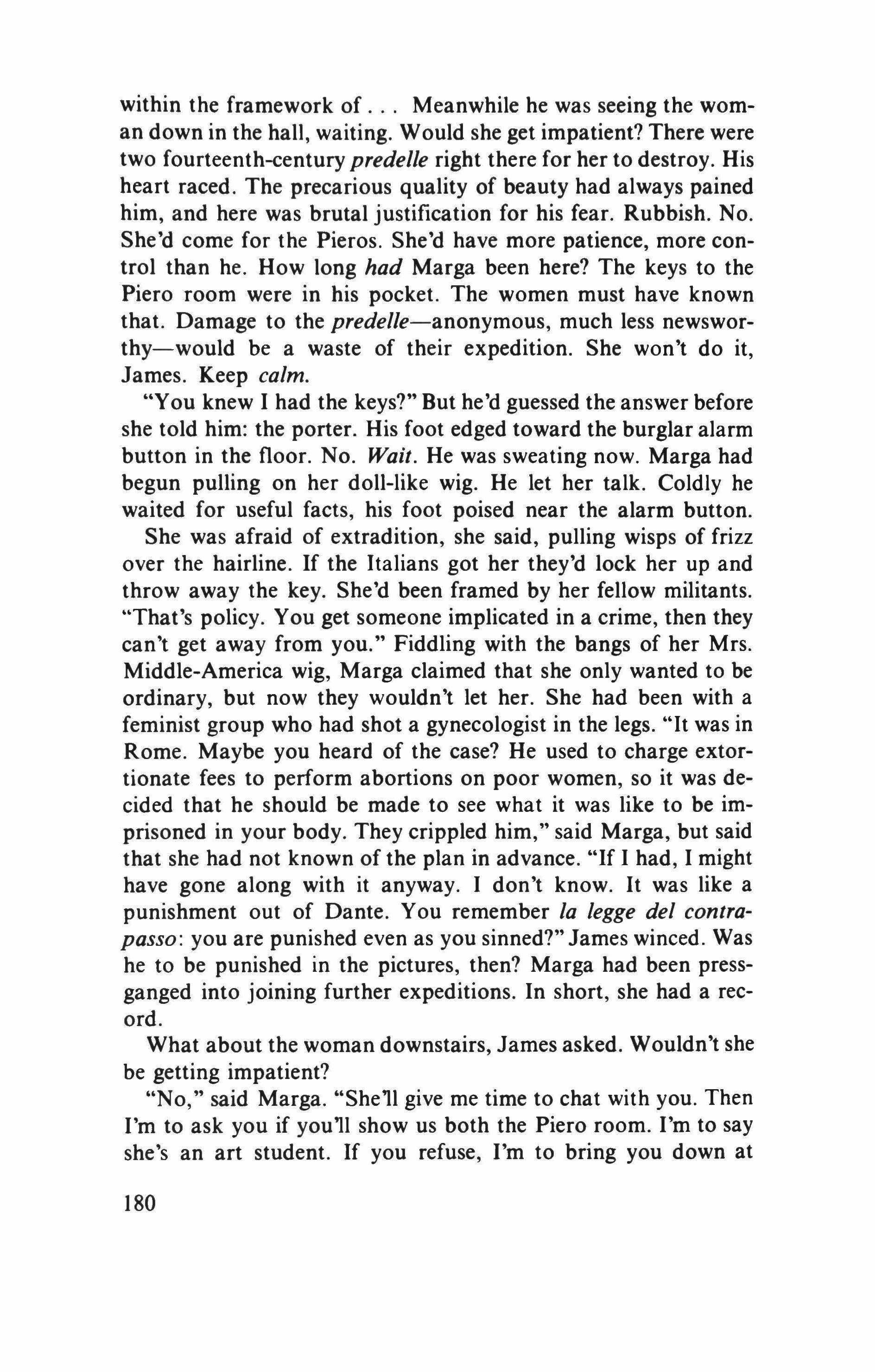
within the framework of Meanwhile he was seeing the woman down in the hall, waiting. Would she get impatient? There were two fourteenth-centurypredelle right there for her to destroy. His heart raced. The precarious quality of beauty had always pained him, and here was brutal justification for his fear. Rubbish. No. She'd come for the Pieros. She'd have more patience, more control than he. How long had Marga been here? The keys to the Piero room were in his pocket. The women must have known that. Damage to the predelle-anonymous, much less newsworthy-would be a waste of their expedition. She won't do it, James. Keep calm.
"You knew I had the keys?" But he'd guessed the answer before she told him: the porter. His foot edged toward the burglar alarm button in the floor. No. Wait. He was sweating now. Marga had begun pulling on her doll-like wig. He let her talk. Coldly he waited for useful facts, his foot poised near the alarm button. She was afraid of extradition, she said, pulling wisps of frizz over the hairline. If the Italians got her they'd lock her up and throwaway the key. She'd been framed by her fellow militants. "That's policy. You get someone implicated in a crime, then they can't get away from you." Fiddling with the bangs of her Mrs. Middle-America wig, Marga claimed that she only wanted to be ordinary, but now they wouldn't let her. She had been with a feminist group who had shot a gynecologist in the legs. "It was in Rome. Maybe you heard of the case? He used to charge extortionate fees to perform abortions on poor women, so it was decided that he should be made to see what it was like to be imprisoned in your body. They crippled him," said Marga, but said that she had not known of the plan in advance. "If I had, I might have gone along with it anyway. I don't know. It was like a punishment out of Dante. You remember la legge del contrapasso: you are punished even as you sinned?" James winced. Was he to be punished in the pictures, then? Marga had been pressganged into joining further expeditions. In short, she had a record.
What about the woman downstairs, James asked. Wouldn't she be getting impatient?
"No," said Marga. "She'll give me time to chat with you. Then I'm to ask you if you'll show us both the Piero room. I'm to say she's an art student. If you refuse, I'm to bring you down at
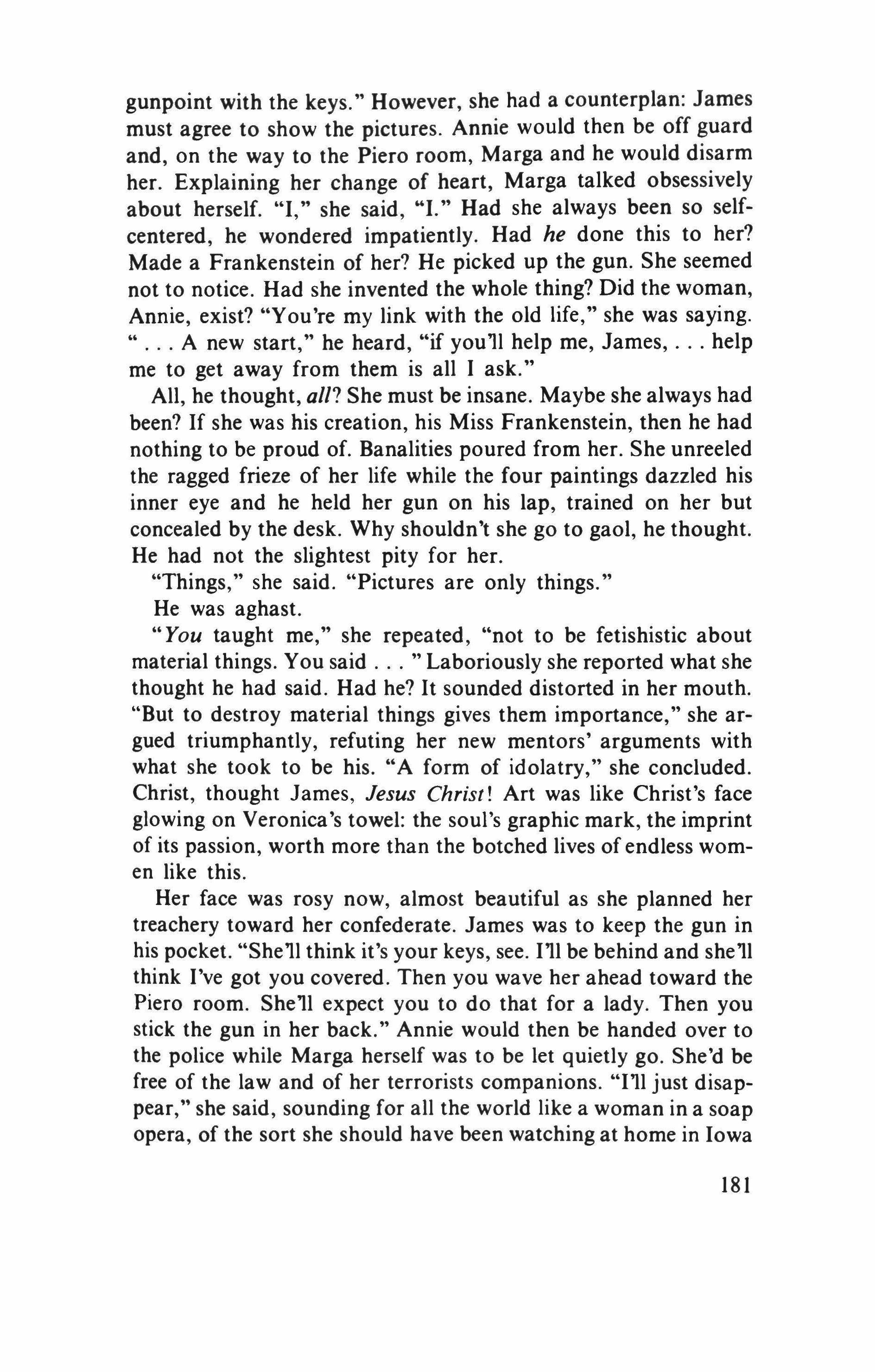
gunpoint with the keys." However, she had a counterplan: James must agree to show the pictures. Annie would then be off guard and, on the way to the Piero room, Marga and he would disarm her. Explaining her change of heart, Marga talked obsessively about herself. "I," she said, "I." Had she always been so selfcentered, he wondered impatiently. Had he done this to her? Made a Frankenstein of her? He picked up the gun. She seemed not to notice. Had she invented the whole thing? Did the woman, Annie, exist? "You're my link with the old life," she was saying. A new start," he heard, "if you'll help me, James, help me to get away from them is all I ask."
All, he thought, all? She must be insane. Maybe she always had been? If she was his creation, his Miss Frankenstein, then he had nothing to be proud of. Banalities poured from her. She unreeled the ragged frieze of her life while the four paintings dazzled his inner eye and he held her gun on his lap, trained on her but concealed by the desk. Why shouldn't she go to gaol, he thought. He had not the slightest pity for her.
"Things," she said. "Pictures are only things."
He was aghast.
"You taught me," she repeated, "not to be fetishistic about material things. You said "Laboriously she reported what she thought he had said. Had he? It sounded distorted in her mouth. "But to destroy material things gives them importance," she argued triumphantly, refuting her new mentors' arguments with what she took to be his. "A form of idolatry," she concluded. Christ, thought James, Jesus Christ! Art was like Christ's face glowing on Veronica's towel: the soul's graphic mark, the imprint of its passion, worth more than the botched lives of endless women like this.
Her face was rosy now, almost beautiful as she planned her treachery toward her confederate. James was to keep the gun in his pocket. "She'll think it's your keys, see. 111 be behind and she'll think I've got you covered. Then you wave her ahead toward the Piero room. She'll expect you to do that for a lady. Then you stick the gun in her back." Annie would then be handed over to the police while Marga herself was to be let quietly go. She'd be free of the law and of her terrorists companions. "111 just disappear," she said, sounding for all the world like a woman in a soap opera, of the sort she should have been watching at home in Iowa
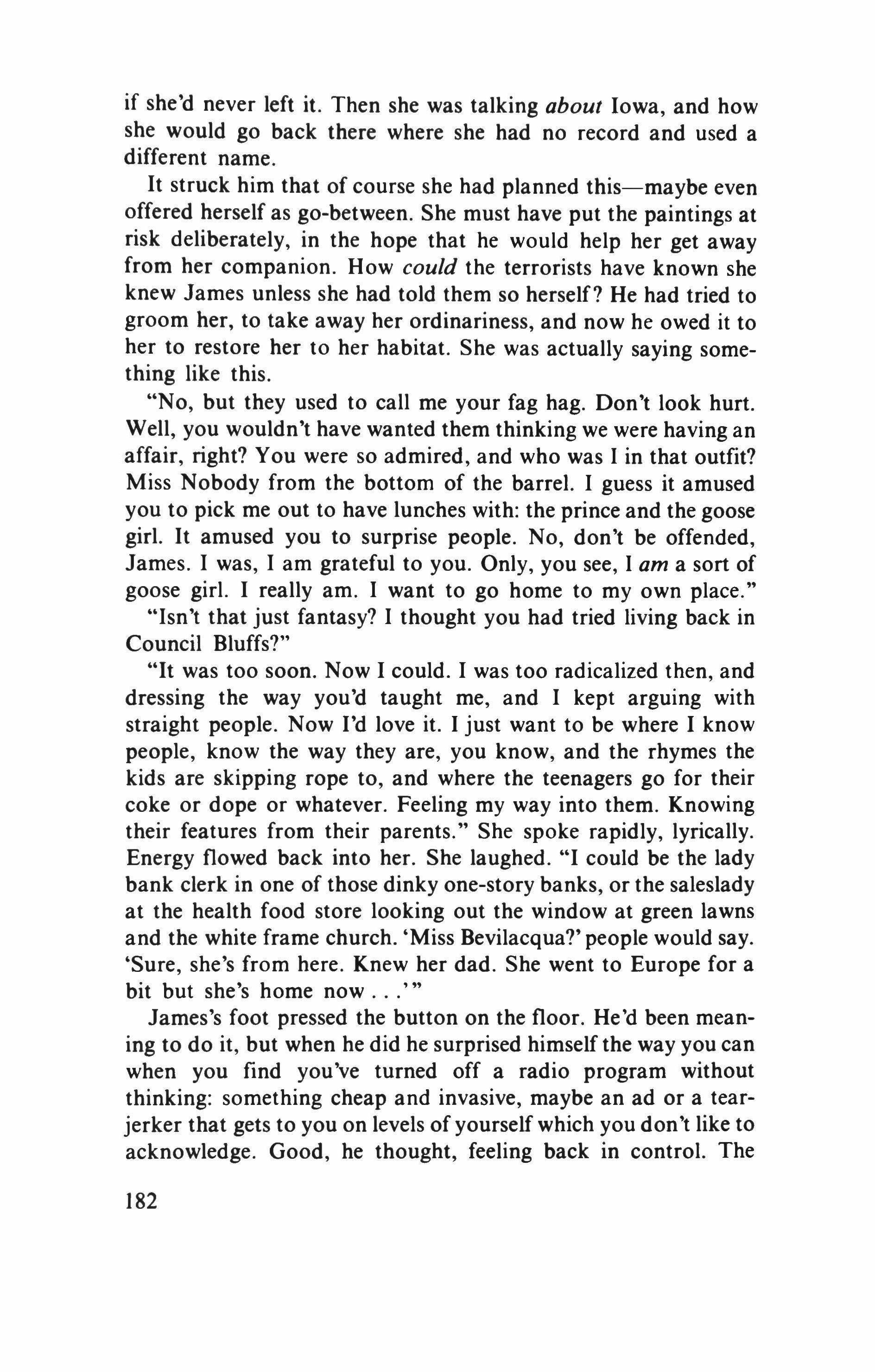
if she'd never left it. Then she was talking about Iowa, and how she would go back there where she had no record and used a different name.
It struck him that of course she had planned this-maybe even offered herself as go-between. She must have put the paintings at risk deliberately, in the hope that he would help her get away from her companion. How could the terrorists have known she knew James unless she had told them so herself? He had tried to groom her, to take away her ordinariness, and now he owed it to her to restore her to her habitat. She was actually saying something like this.
"N0, but they used to call me your fag hag. Don't look hurt. Well, you wouldn't have wanted them thinking we were having an affair, right? You were so admired, and who was I in that outfit? Miss Nobody from the bottom of the barrel. I guess it amused you to pick me out to have lunches with: the prince and the goose girl. It amused you to surprise people. No, don't be offended, James. I was, I am grateful to you. Only, you see, I am a sort of goose girl. I really am. I want to go home to my own place."
"Isn't that just fantasy? I thought you had tried living back in Council Bluffs?"
"It was too soon. Now I could. I was too radicalized then, and dressing the way you'd taught me, and I kept arguing with straight people. Now I'd love it. I just want to be where I know people, know the way they are, you know, and the rhymes the kids are skipping rope to, and where the teenagers go for their coke or dope or whatever. Feeling my way into them. Knowing their features from their parents." She spoke rapidly, lyrically. Energy flowed back into her. She laughed. "I could be the lady bank clerk in one of those dinky one-story banks, or the saleslady at the health food store looking out the window at green lawns and the white frame church. 'Miss Bevilacqua?' people would say. 'Sure, she's from here. Knew her dad. She went to Europe for a bit but she's home now
James's foot pressed the button on the floor. He'd been meaning to do it, but when he did he surprised himself the way you can when you find you've turned off a radio program without thinking: something cheap and invasive, maybe an ad or a tearjerker that gets to you on levels of yourself which you don't like to acknowledge. Good, he thought, feeling back in control. The
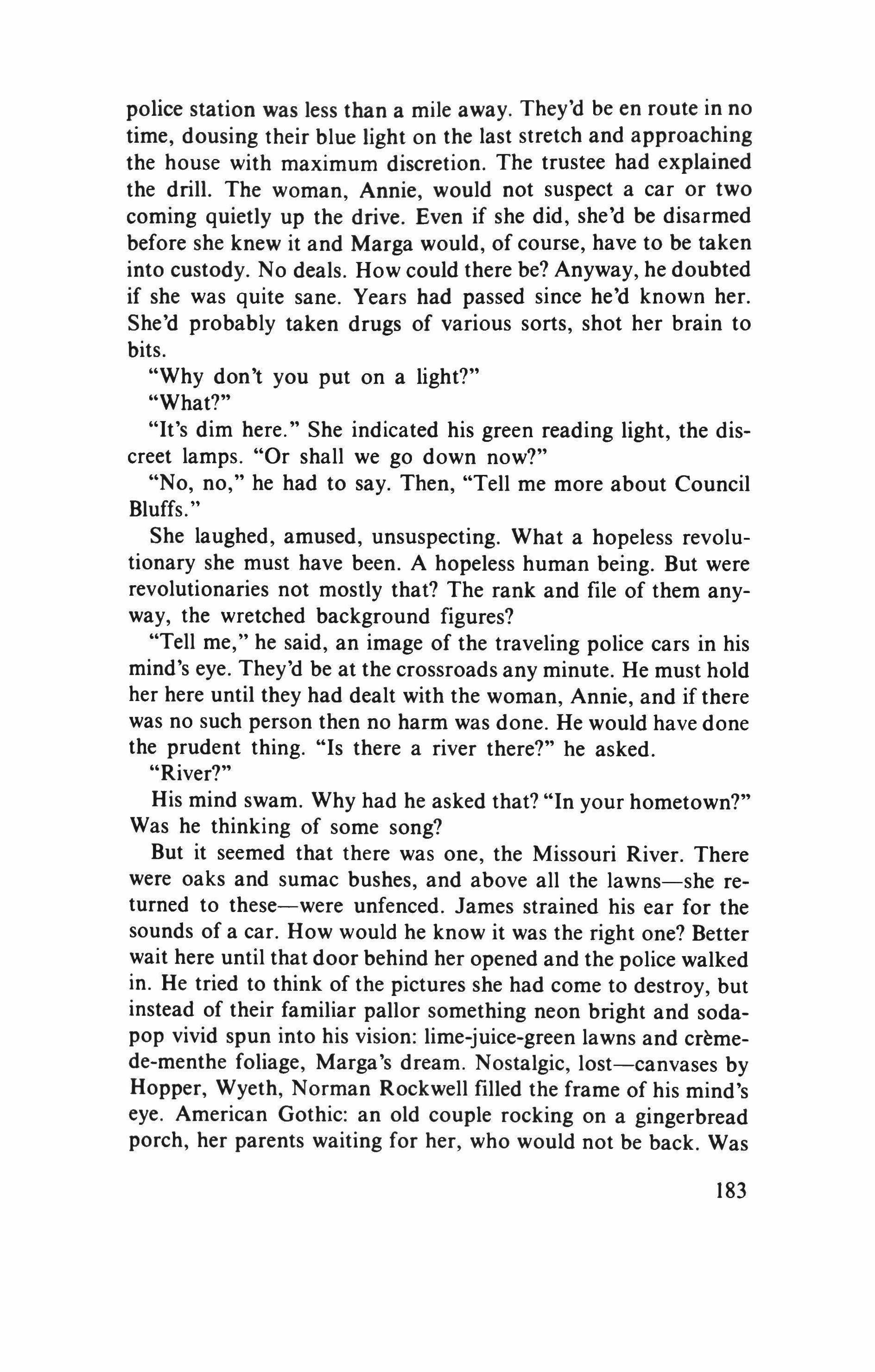
police station was less than a mile away. They'd be en route in no time, dousing their blue light on the last stretch and approaching the house with maximum discretion. The trustee had explained the drill. The woman, Annie, would not suspect a car or two coming quietly up the drive. Even if she did, she'd be disarmed before she knew it and Marga would, of course, have to be taken into custody. No deals. How could there be? Anyway, he doubted if she was quite sane. Years had passed since he'd known her. She'd probably taken drugs of various sorts, shot her brain to bits.
"Why don't you put on a light?"
"What?"
"It's dim here." She indicated his green reading light, the discreet lamps. "Or shall we go down now?"
"No, no," he had to say. Then, "Tell me more about Council Bluffs.
She laughed, amused, unsuspecting. What a hopeless revolutionary she must have been. A hopeless human being. But were revolutionaries not mostly that? The rank and file of them anyway, the wretched background figures?
"Tell me," he said, an image of the traveling police cars in his mind's eye. They'd be at the crossroads any minute. He must hold her here until they had dealt with the woman, Annie, and if there was no such person then no harm was done. He would have done the prudent thing. "Is there a river there?" he asked.
"River?"
His mind swam. Why had he asked that? "In your hometown?" Was he thinking of some song?
But it seemed that there was one, the Missouri River. There were oaks and sumac bushes, and above all the lawns-she returned to these-were unfenced. James strained his ear for the sounds of a car. How would he know it was the right one? Better wait here until that door behind her opened and the police walked in. He tried to think of the pictures she had come to destroy, but instead of their familiar pallor something neon bright and sodapop vivid spun into his vision: lime-juice-green lawns and cremede-menthe foliage, Marga's dream. Nostalgic, lost-canvases by Hopper, Wyeth, Norman Rockwell filled the frame of his mind's eye. American Gothic: an old couple rocking on a gingerbread porch, her parents waiting for her, who would not be back. Was
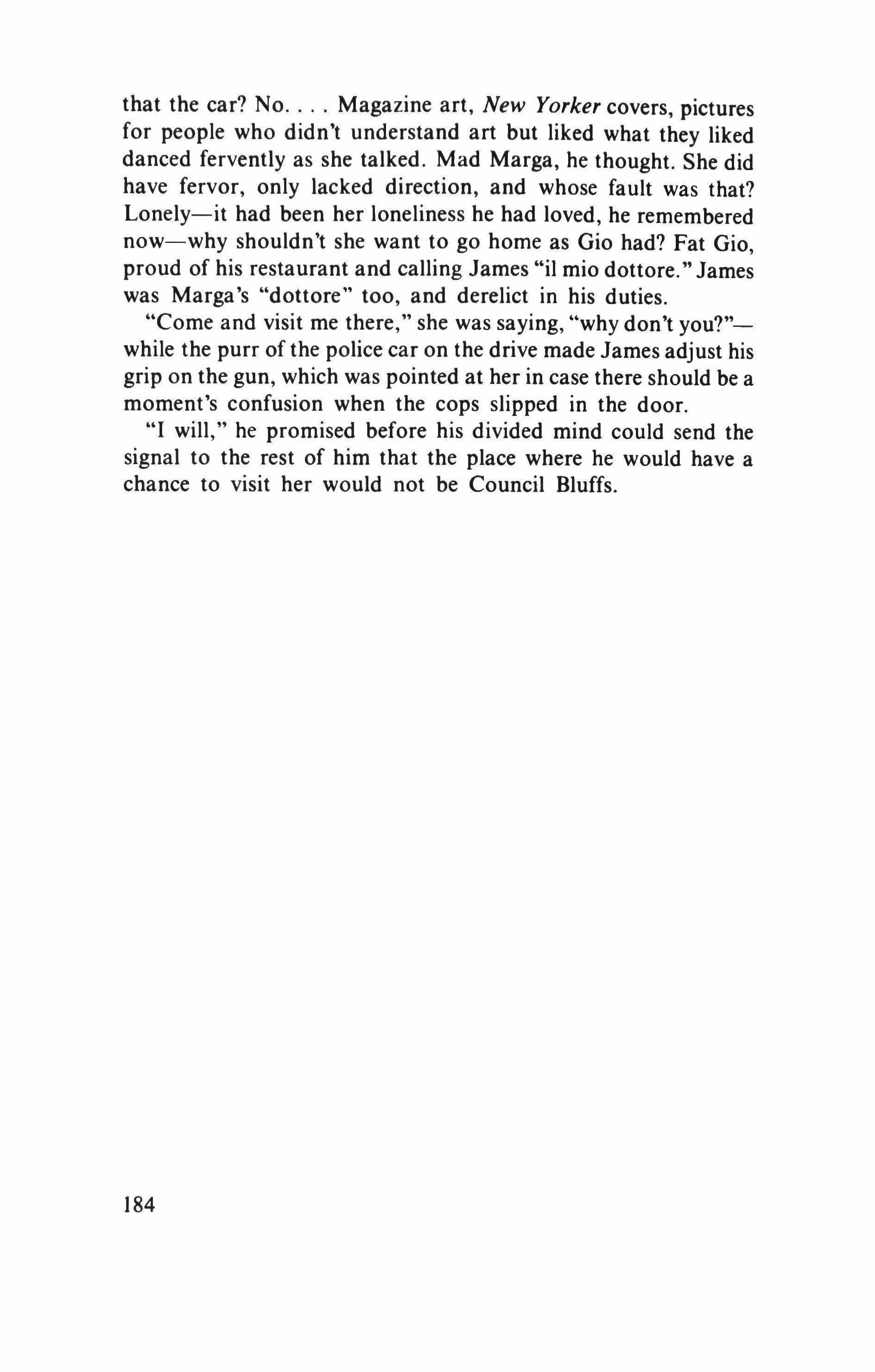
that the car? No Magazine art, New Yorker covers, pictures for people who didn't understand art but liked what they liked danced fervently as she talked. Mad Marga, he thought. She did have fervor, only lacked direction, and whose fault was that? Lonely-it had been her loneliness he had loved, he remembered now-why shouldn't she want to go home as Gio had? Fat Gio, proud of his restaurant and calling James "il mio dottore." James was Marga's "dottore" too, and derelict in his duties.
"Come and visit me there," she was saying, "why don't you?"while the purr of the police car on the drive made James adjust his grip on the gun, which was pointed at her in case there should be a moment's confusion when the cops slipped in the door.
"I will," he promised before his divided mind could send the signal to the rest of him that the place where he would have a chance to visit her would not be Council Bluffs.

He wants to repeat a beautful moment they had two years ago, in a seaside town near where he lives, but the moment won't be repeated. It seems to be tied to the time and the rather ordinary room in which it was cradled. It is as if a note was then struck that depended on novelty for its sharp, pure tone, dooming from the start any attempt to reproduce it. Still, failing to distinguish between love and music, he persists, and whenever he calls her she agrees to see him. She too, evidently, has a vague hope of recapturing that moment of rapture.
They have been together in her New York apartment on a bed in an alcove draped with lace, and on the lonely shore of a lake in the moonlight, a night in which the clouds wore silver hems, the waves pearly ripples. But that blessed moment has eluded them. Each time he sees her he's struck. Her hair is black, her neck bare and playful, her eyes very white, violet-irised, and shadowed, her upper lip long, her mouth pleasingly curved. She is cheerful, proud, self-sufficient-very different from him. He, though strong, seems ever in need of a prop. He often rests his face on his palm, leans against walls, and likes to sit or lie much better than stand. He walks slowly, tends to lag behind her, and, as she won't wait for him, he has to make a real effort to keep up with her. She
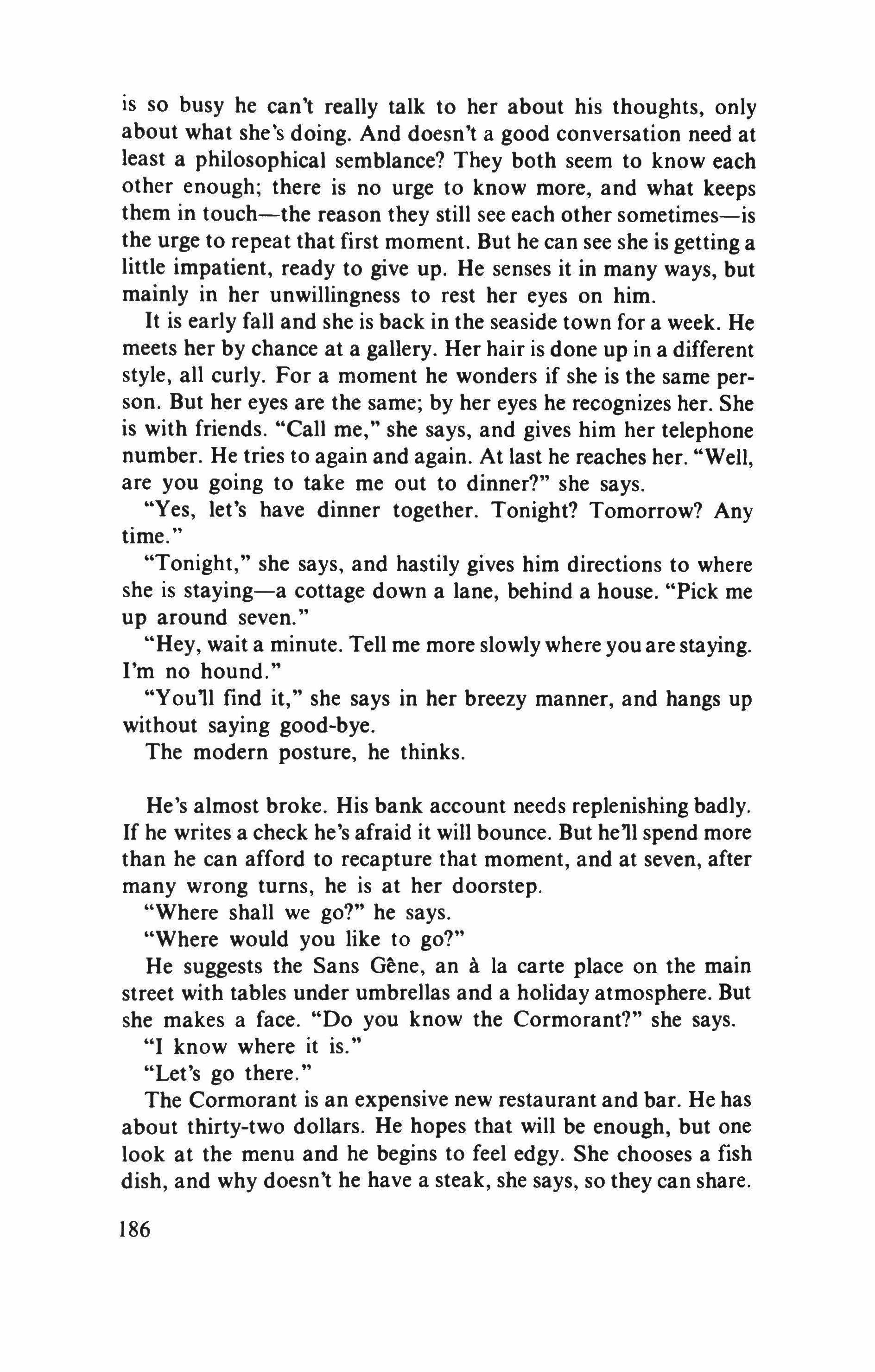
is so busy he can't really talk to her about his thoughts, only about what she's doing. And doesn't a good conversation need at least a philosophical semblance? They both seem to know each other enough; there is no urge to know more, and what keeps them in touch-the reason they still see each other sometimes-is the urge to repeat that first moment. But he can see she is getting a little impatient, ready to give up. He senses it in many ways, but mainly in her unwillingness to rest her eyes on him.
It is early fall and she is back in the seaside town for a week. He meets her by chance at a gallery. Her hair is done up in a different style, all curly. For a moment he wonders if she is the same person. But her eyes are the same; by her eyes he recognizes her. She is with friends. "Call me," she says, and gives him her telephone number. He tries to again and again. At last he reaches her. "Well, are you going to take me out to dinner?" she says.
"Yes, let's have dinner together. Tonight? Tomorrow? Any time."
"Tonight," she says, and hastily gives him directions to where she is staying-a cottage down a lane, behind a house. "Pick me up around seven."
"Hey, wait a minute. Tell me more slowly where you are staying. I'm no hound."
"You'll find it," she says in her breezy manner, and hangs up without saying good-bye.
The modern posture, he thinks.
He's almost broke. His bank account needs replenishing badly. If he writes a check he's afraid it will bounce. But he'll spend more than he can afford to recapture that moment, and at seven, after many wrong turns, he is at her doorstep.
"Where shall we go?" he says.
"Where would you like to go?"
He suggests the Sans Gene, an a la carte place on the main street with tables under umbrellas and a holiday atmosphere. But she makes a face. "Do you know the Cormorant?" she says.
"I know where it is."
"Let's go there."
The Cormorant is an expensive new restaurant and bar. He has about thirty-two dollars. He hopes that will be enough, but one look at the menu and he begins to feel edgy. She chooses a fish dish, and why doesn't he have a steak, she says, so they can share.
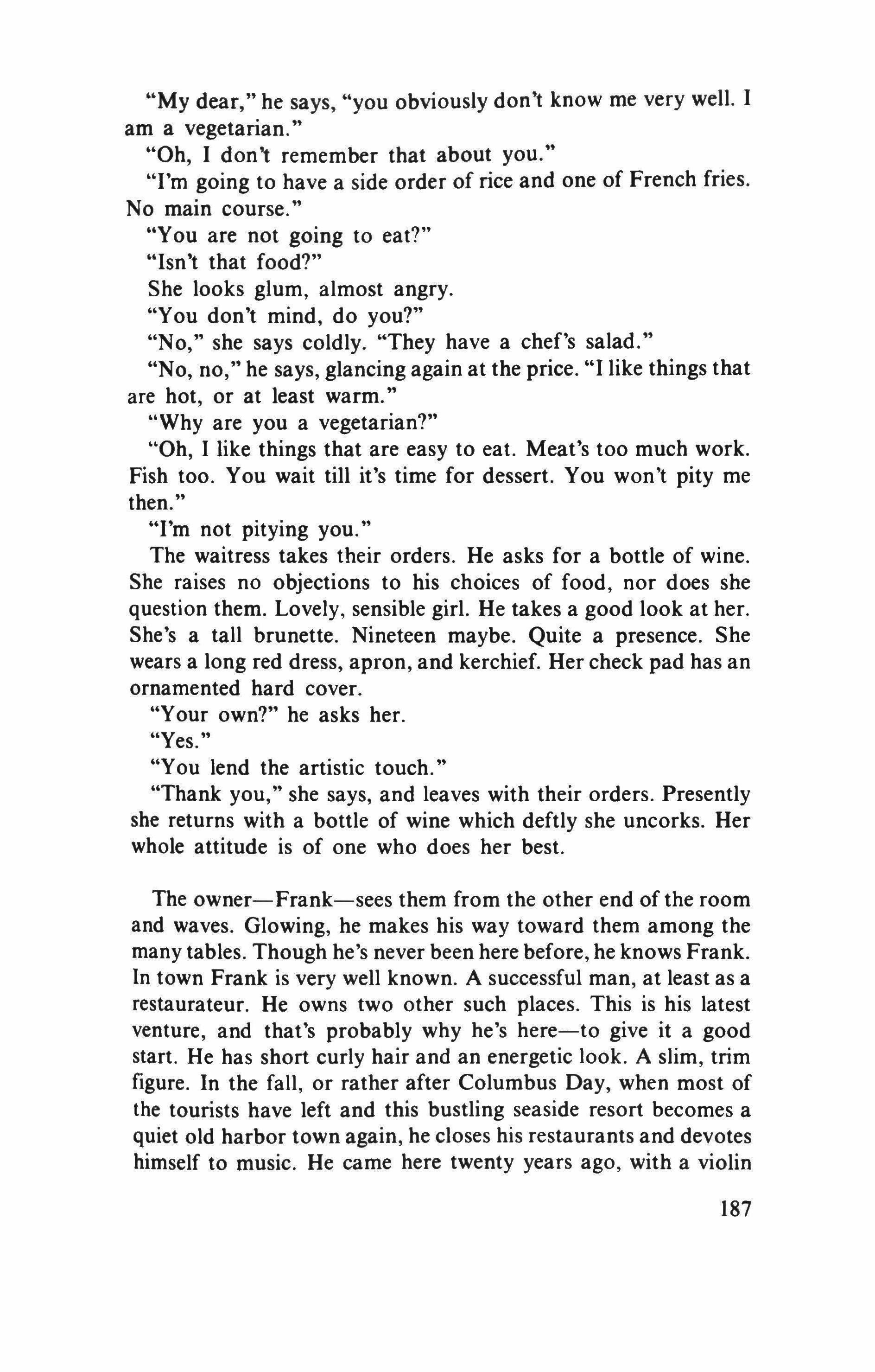
"My dear," he says, "you obviously don't know me very well. I am a vegetarian."
"Oh, I don't remember that about you."
"I'm going to have a side order of rice and one of french fries. No main course."
"You are not going to eat?"
"Isn't that food?"
She looks glum, almost angry.
"You don't mind, do you?"
"No," she says coldly. "They have a chef's salad."
"No, no," he says, glancing again at the price. "I like things that are hot, or at least warm."
"Why are you a vegetarian?"
"Oh, I like things that are easy to eat. Meat's too much work. fish too. You wait till it's time for dessert. You won't pity me then."
"I'm not pitying you."
The waitress takes their orders. He asks for a bottle of wine. She raises no objections to his choices of food, nor does she question them. Lovely, sensible girl. He takes a good look at her. She's a tall brunette. Nineteen maybe. Quite a presence. She wears a long red dress, apron, and kerchief. Her check pad has an ornamented hard cover.
"Your own?" he asks her.
"Yes."
"You lend the artistic touch."
"Thank you," she says, and leaves with their orders. Presently she returns with a bottle of wine which deftly she uncorks. Her whole attitude is of one who does her best.
The owner-frank-sees them from the other end ofthe room and waves. Glowing, he makes his way toward them among the many tables. Though he's never been here before, he knows frank. In town frank is very well known. A successful man, at least as a restaurateur. He owns two other such places. This is his latest venture, and that's probably why he's here-to give it a good start. He has short curly hair and an energetic look. A slim, trim figure. In the fall, or rather after Columbus Day, when most of the tourists have left and this bustling seaside resort becomes a quiet old harbor town again, he closes his restaurants and devotes himself to music. He came here twenty years ago, with a violin

and no idea that he would be wielding spoons and knives a good part of the time. But it's the commonest thing here for people to do what they have to in the summer and what they want to during the rest of the year, and soon Frank got into the swing of it, and prospered. In the winter he becomes a cicada. Everyone in this town is slightly mixed up. With the years and success, the poise of the restaurateur has prevailed over that of the musician.
He is beaming. "Renee!" he says, open armed, and they kiss and they hug. To him he gives a cordial handshake, and cheerily calls him "Emilio." He pulls up a chair and sits beside her. He evidently knows her very well, and from the way the two talk they look as if they will never catch up on what they've been doing.
The waitress refills the glasses with wine. "And a glass for Frank," Emilio says to her. This is brought and filled. Renee and Frank drink to each other and are so absorbed-so genuinely absorbed in doing this-that they leave him out, he's quite sure, without malice. The waitress smiles at him knowingly. He drinks to her. But they don't even notice.
They must have been lovers, he thinks, and, why been?
The food is brought. Frank, clutching her forearm, patting her shoulder, leaves the table.
"You know Frank well."
"Of course I know him. Would I hug him if I didn't? Why shouldn't I know him?"
··N0 reason why you shouldn't. You should."
-or course I should."
"All right, don't get mad."
UI'm not getting mad. Listen, Emilio, sometimes I wonder at you. You say such odd things."
"Oh, don't mind me."
··But I do."
··Don't."
UWhat?"
"The conversation isn't going very well, is it?"
"Really, Emilio, I think you are impossible." She stretches her arms down, then raises them to the level of her plate and begins to eat in silence, looking at the food with concentration.
UIs it good?"
"His food is always good."
uGood."
To the rescue comes Frank again. Complete change of mood 188

on her part. She grabs Frank's wrist as he lights a cigarette for her. She's laughing and can't get her cigarette lit-it bobs up and down. They lean more and more toward each other till their heads meet in an arch. They chat amicably. It's noisy and he can hear only a fraction of what they are saying. Not that he's very interested. His eyes rove. His mind wanders. Part of the time they are whispering anyway, or talking into one another's ears. But this he catches: she's telling Frank that tomorrow she's interviewing one of the better known painters in town.
"Are you going to tape it?" Frank asks.
"Oh, sure."
"Great," Frank says.
"What's so great about that?" he puts in.
They both look at him.
"I mean, with a tape aren't you in danger of giving too literal a rendition, not enough of an impression?"
"No, it isn't like that at all," she says, in the dreariest voice and shaking her head, as at a hopeless case.
"I don't think a photographic memory-total recall-is the best thing for an artist. For a detective maybe, but not for an artist."
As there is no reaction, he adds, "Don't you think?"
"No, I don't think."
"I rely on forgetfulness-to do away with the clutter of details. I'd be lost without forgetfulness."
"You can have it." Having said that, her attention is again focused on Frank and she brightens. At one point Frank gives her a kiss, smack in the center of her cheek. It would have been better on her mouth, but she was eating. Then he leaves them again.
She wants to give him some zucchini-a mushy, half-eaten side order.
"No, thank you."
Does so anyway.
"N0, please."
Nothing will stop her.
"Is he coming back?"
"I hope so."
"It wasn't a good-bye kiss?"
"No."
"Here he comes."
Frank returns and will be with them till the end of their dinner, 189
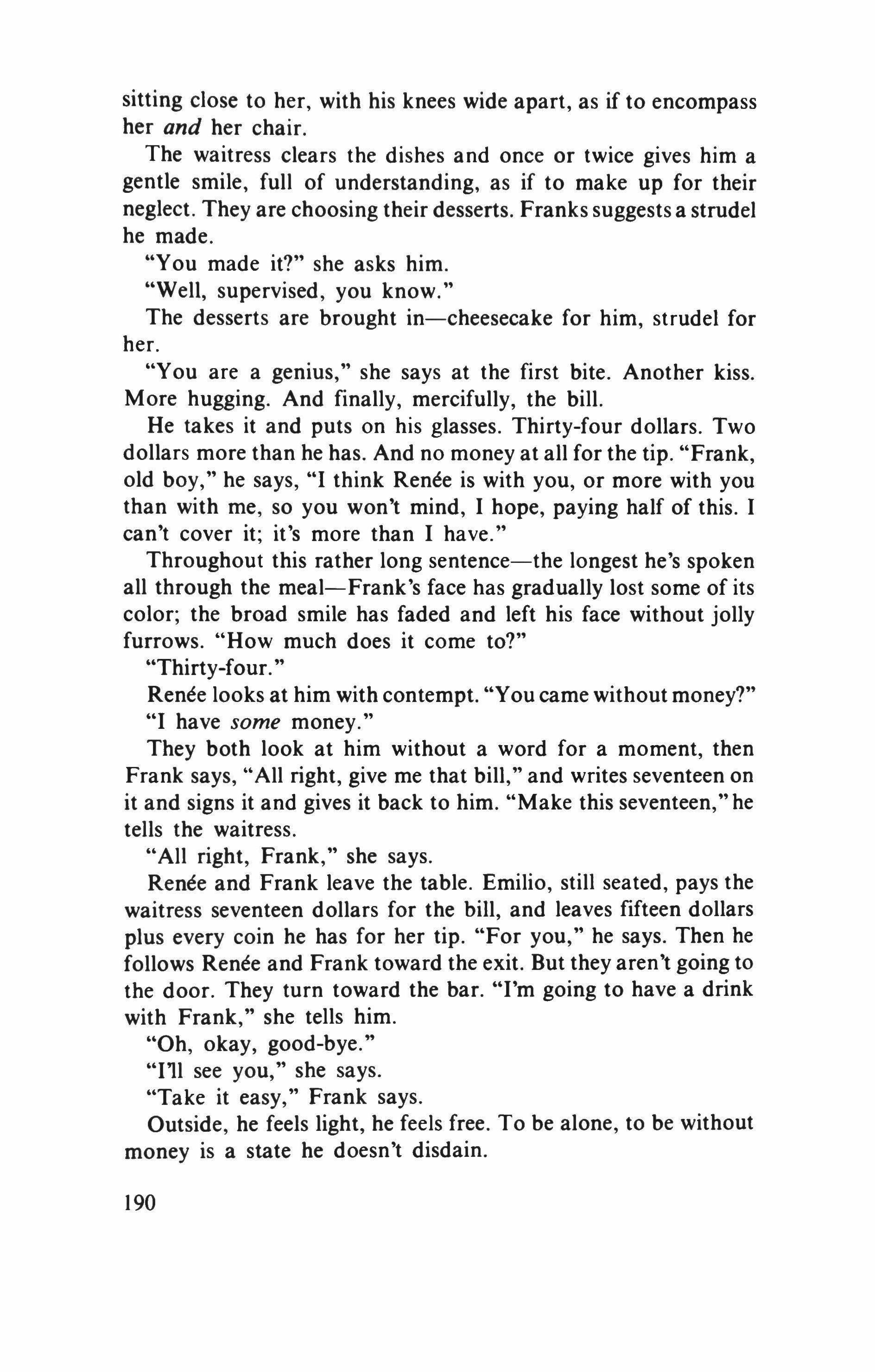
sitting close to her, with his knees wide apart, as if to encompass her and her chair.
The waitress clears the dishes and once or twice gives him a gentle smile, full of understanding, as if to make up for their neglect. They are choosing their desserts. Franks suggests a strudel he made.
"You made it?" she asks him.
"Well, supervised, you know."
The desserts are brought in-cheesecake for him, strudel for her.
"You are a genius," she says at the first bite. Another kiss. More hugging. And finally, mercifully, the bill.
He takes it and puts on his glasses. Thirty-four dollars. Two dollars more than he has. And no money at all for the tip. "Frank, old boy," he says, "I think Renee is with you, or more with you than with me, so you won't mind, 1 hope, paying half of this. 1 can't cover it; it's more than 1 have."
Throughout this rather long sentence-the longest he's spoken all through the meal-Frank's face has gradually lost some of its color; the broad smile has faded and left his face without jolly furrows. "How much does it come to?"
"Thirty-four.
Renee looks at him with contempt. "You came without money?" "I have some money."
They both look at him without a word for a moment, then Frank says, "All right, give me that bill," and writes seventeen on it and signs it and gives it back to him. "Make this seventeen," he tells the waitress.
"All right, Frank," she says.
Renee and Frank leave the table. Emilio, still seated, pays the waitress seventeen dollars for the bill, and leaves fifteen dollars plus every coin he has for her tip. "For you," he says. Then he follows Renee and Frank toward the exit. But they aren't going to the door. They turn toward the bar. "I'm going to have a drink with Frank," she tells him.
"Oh, okay, good-bye."
"111 see you," she says.
"Take it easy," Frank says.
Outside, he feels light, he feels free. To be alone, to be without money is a state he doesn't disdain.
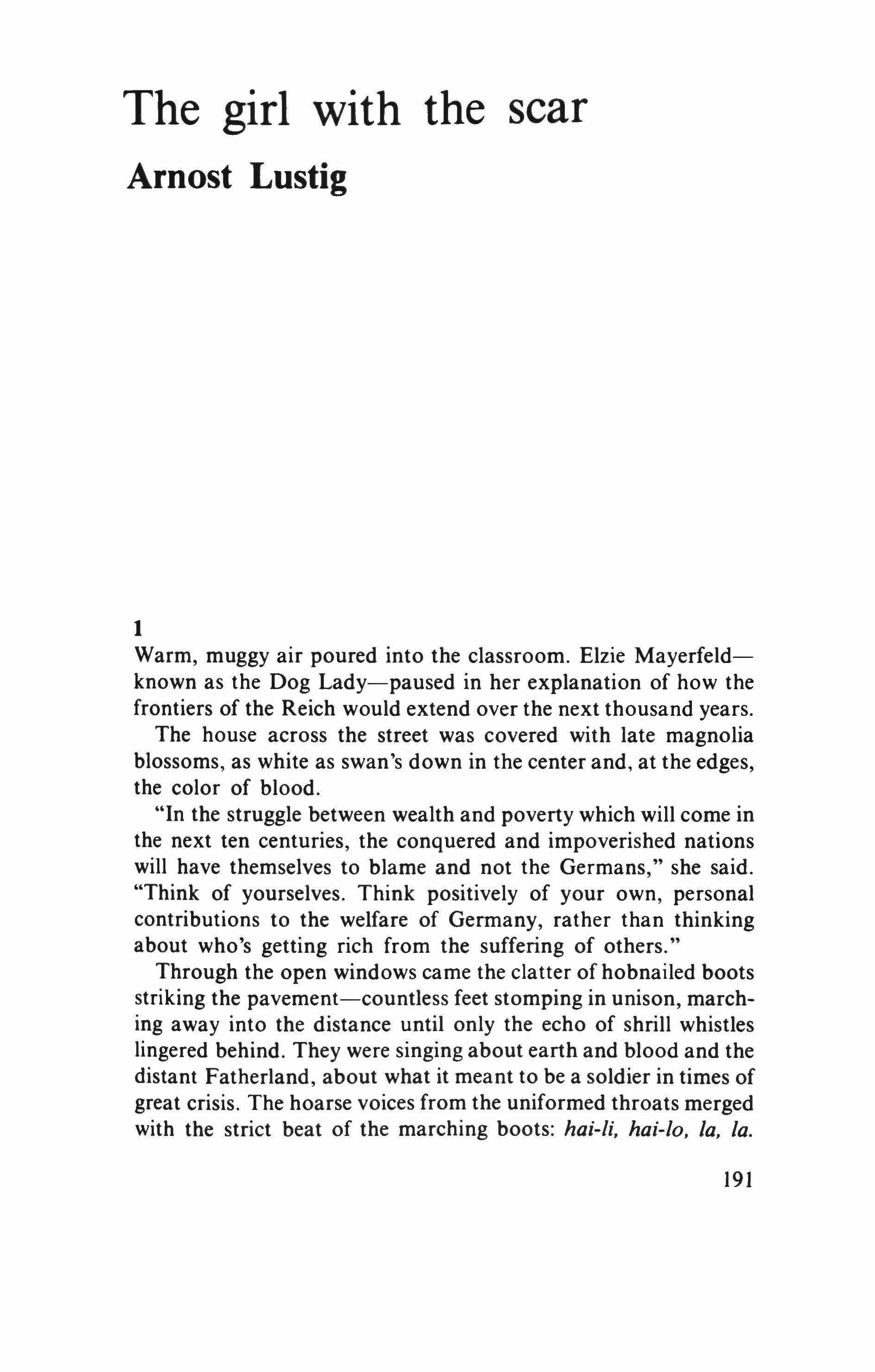
1
Warm, muggy air poured into the classroom. Elzie Mayerfeldknown as the Dog Lady-paused in her explanation of how the frontiers of the Reich would extend over the next thousand years. The house across the street was covered with late magnolia blossoms, as white as swan's down in the center and, at the edges, the color of blood.
"In the struggle between wealth and poverty which will come in the next ten centuries, the conquered and impoverished nations will have themselves to blame and not the Germans," she said. "Think of yourselves. Think positively of your own, personal contributions to the welfare of Germany, rather than thinking about who's getting rich from the suffering of others."
Through the open windows came the clatter of hobnailed boots striking the pavement-countless feet stomping in unison, marching away into the distance until only the echo of shrill whistles lingered behind. They were singing about earth and blood and the distant Fatherland, about what it meant to be a soldier in times of great crisis. The hoarse voices from the uniformed throats merged with the strict beat of the marching boots: hai-li, hai-lo, la, la.
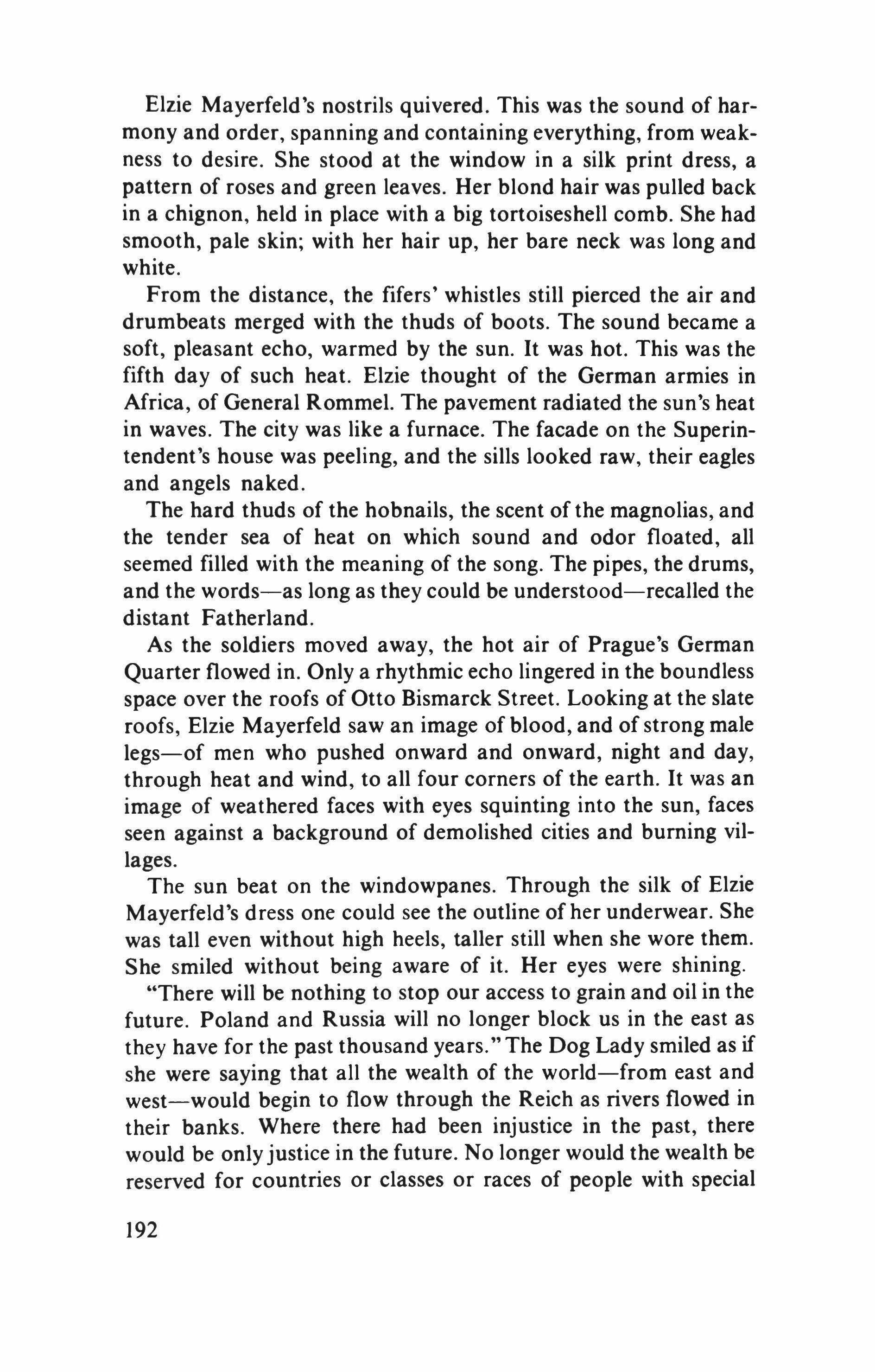
Elzie Mayerfeld's nostrils quivered. This was the sound of harmony and order, spanning and containing everything, from weakness to desire. She stood at the window in a silk print dress, a pattern of roses and green leaves. Her blond hair was pulled back in a chignon, held in place with a big tortoiseshell comb. She had smooth, pale skin; with her hair up, her bare neck was long and white.
From the distance, the fifers' whistles still pierced the air and drumbeats merged with the thuds of boots. The sound became a soft, pleasant echo, warmed by the sun. It was hot. This was the fifth day of such heat. Ellie thought of the German armies in Africa, of General Rommel. The pavement radiated the sun's heat in waves. The city was like a furnace. The facade on the Superintendent's house was peeling, and the sills looked raw, their eagles and angels naked.
The hard thuds of the hobnails, the scent of the magnolias, and the tender sea of heat on which sound and odor floated, all seemed filled with the meaning of the song. The pipes, the drums, and the words-as long as they could be understood-recalled the distant Fatherland.
As the soldiers moved away, the hot air of Prague's German Quarter flowed in. Only a rhythmic echo lingered in the boundless space over the roofs of Otto Bismarck Street. Looking at the slate roofs, Ellie Mayerfeld saw an image of blood, and of strong male legs-of men who pushed onward and onward, night and day, through heat and wind, to all four corners of the earth. It was an image of weathered faces with eyes squinting into the sun, faces seen against a background of demolished cities and burning villages.
The sun beat on the windowpanes. Through the silk of Ellie Mayerfeld's dress one could see the outline of her underwear. She was tall even without high heels, taller still when she wore them. She smiled without being aware of it. Her eyes were shining.
"There will be nothing to stop our access to grain and oil in the future. Poland and Russia will no longer block us in the east as they have for the past thousand years." The Dog Lady smiled as if she were saying that all the wealth of the world-from east and west-would begin to flow through the Reich as rivers flowed in their banks. Where there had been injustice in the past, there would be onlyjustice in the future. No longer would the wealth be reserved for countries or classes or races of people with special
privileges-privileges acquired regardless of their race, or perhaps because of it.
In Elzie Mayerfeld's smile was Germany itself: the Fatherland, surrounded by the islands and the rough rocks of a German sea. In the end it always came down to privilege, and the question of who had the strength and stamina to seize it, to take it roughly the way a man takes hold of a woman, even at the price of German blood.
Finally, there lingered in the scorched air only the fading refrain of a song that Elzie Mayerfeld and the girls remembered: how, in the far-distant lands, a German soldier would know when his time had come.
It was stuffy and still in the classroom.
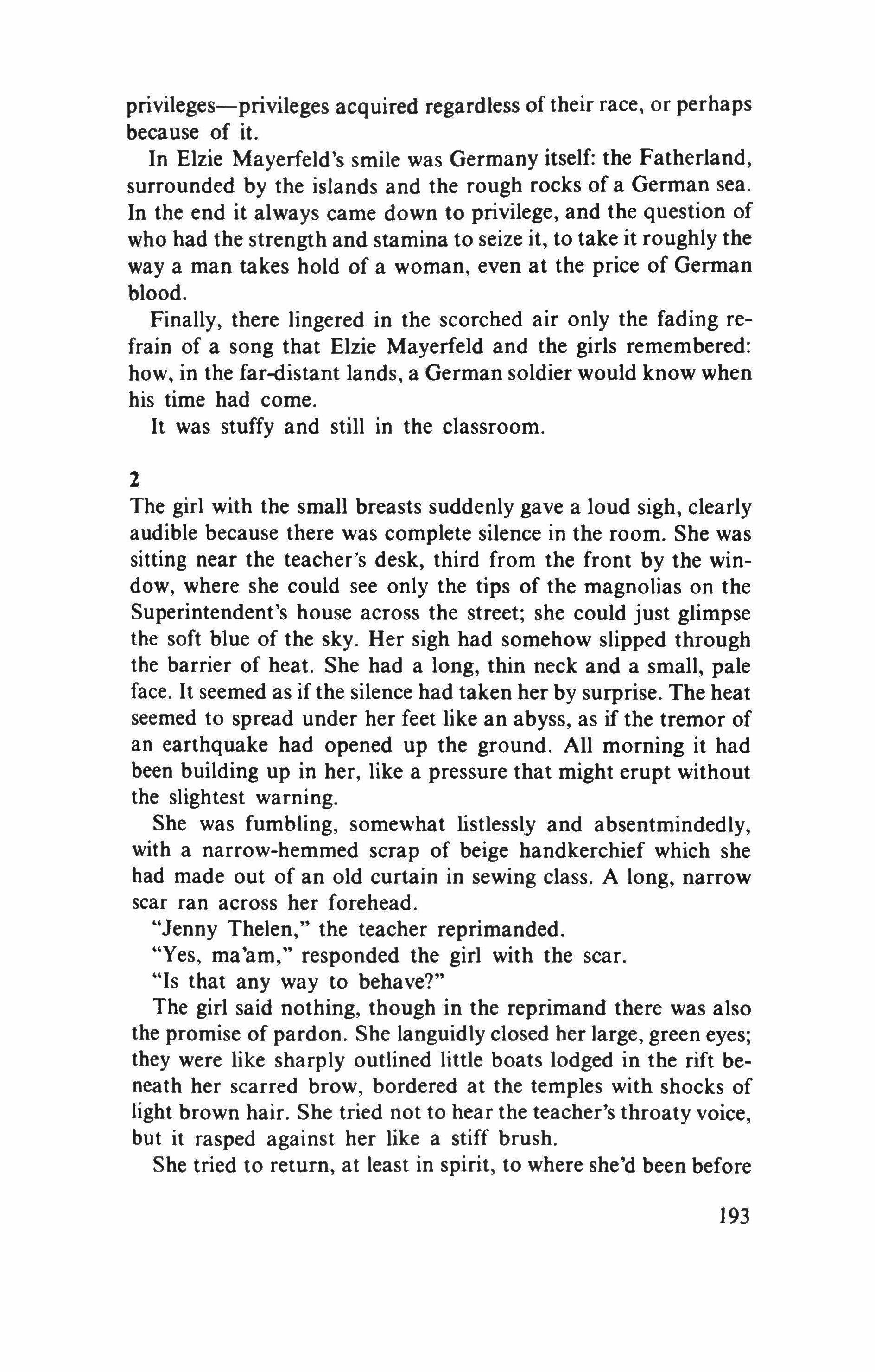
2
The girl with the small breasts suddenly gave a loud sigh, clearly audible because there was complete silence in the room. She was sitting near the teacher's desk, third from the front by the window, where she could see only the tips of the magnolias on the Superintendent's house across the street; she could just glimpse the soft blue of the sky. Her sigh had somehow slipped through the barrier of heat. She had a long, thin neck and a small, pale face. It seemed as if the silence had taken her by surprise. The heat seemed to spread under her feet like an abyss, as if the tremor of an earthquake had opened up the ground. All morning it had been building up in her, like a pressure that might erupt without the slightest warning.
She was fumbling, somewhat listlessly and absentmindedly, with a narrow-hemmed scrap of beige handkerchief which she had made out of an old curtain in sewing class. A long, narrow scar ran across her forehead.
"Jenny Thelen," the teacher reprimanded.
"Yes, ma'am," responded the girl with the scar.
"Is that any way to behave?"
The girl said nothing, though in the reprimand there was also the promise of pardon. She languidly closed her large, green eyes; they were like sharply outlined little boats lodged in the rift beneath her scarred brow, bordered at the temples with shocks of light brown hair. She tried not to hear the teacher's throaty voice, but it rasped against her like a stiff brush.
She tried to return, at least in spirit, to where she'd been before
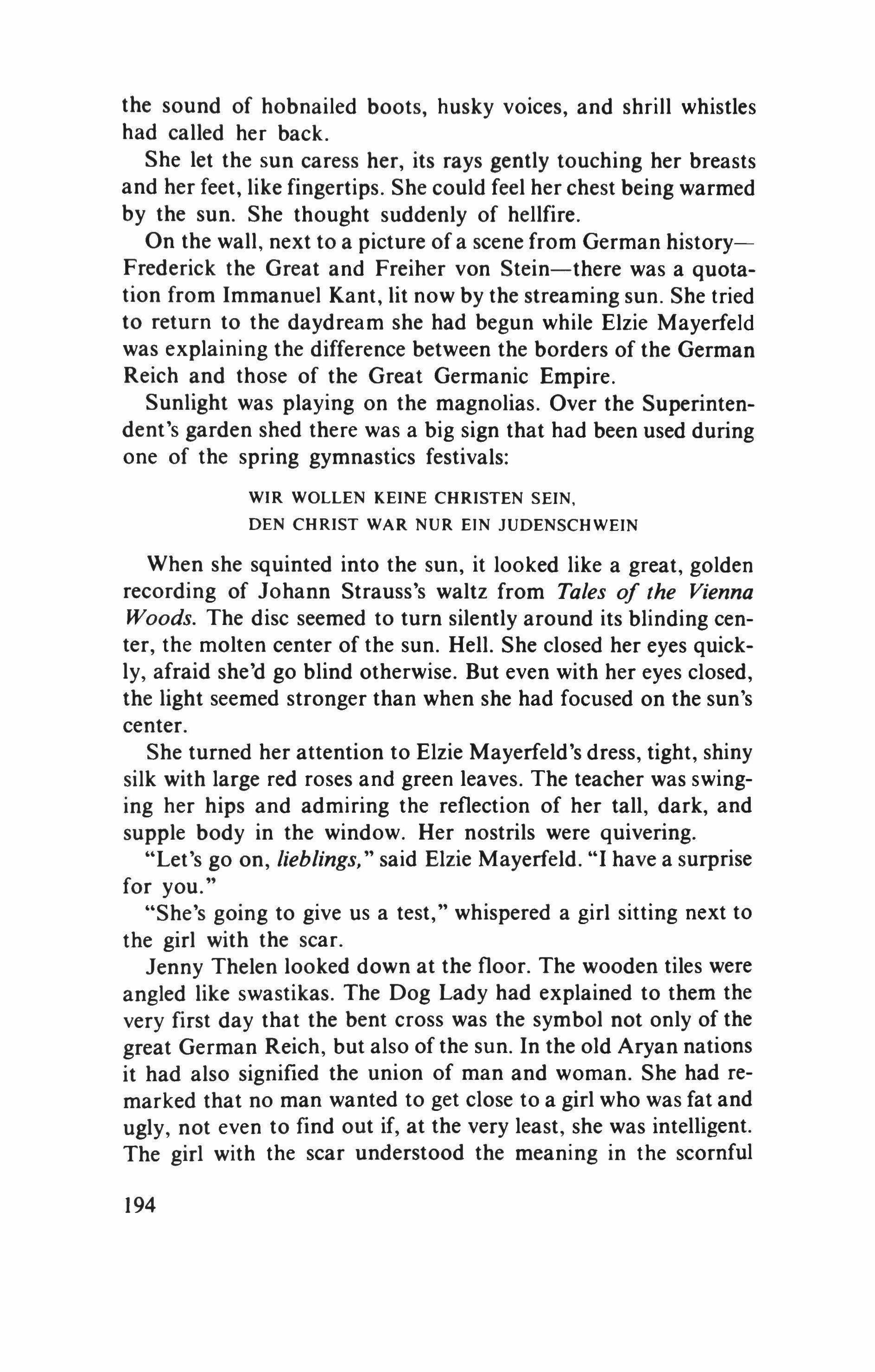
the sound of hobnailed boots, husky voices, and shrill whistles had called her back.
She let the sun caress her, its rays gently touching her breasts and her feet, like fingertips. She could feel her chest being warmed by the sun. She thought suddenly of hellfire.
On the wall, next to a picture of a scene from German historyFrederick the Great and Freiher von Stein-there was a quotation from Immanuel Kant, lit now by the streaming sun. She tried to return to the daydream she had begun while Elzie Mayerfeld was explaining the difference between the borders of the German Reich and those of the Great Germanic Empire.
Sunlight was playing on the magnolias. Over the Superintendent's garden shed there was a big sign that had been used during one of the spring gymnastics festivals:
WIR WOLLEN KEINE CHRISTEN SEIN, DEN CHRIST WAR NUR EIN JUDENSCHWEINWhen she squinted into the sun, it looked like a great, golden recording of Johann Strauss's waltz from Tales of the Vienna Woods. The disc seemed to turn silently around its blinding center, the molten center of the sun. Hell. She closed her eyes quickly, afraid she'd go blind otherwise. But even with her eyes closed, the light seemed stronger than when she had focused on the sun's center.
She turned her attention to Elzie Mayerfeld's dress, tight, shiny silk with large red roses and green leaves. The teacher was swinging her hips and admiring the reflection of her tall, dark, and supple body in the window. Her nostrils were quivering.
"Let's go on, Iieblings," said Elzie Mayerfeld. "I have a surprise for you."
"She's going to give us a test," whispered a girl sitting next to the girl with the scar.
Jenny Thelen looked down at the floor. The wooden tiles were angled like swastikas. The Dog Lady had explained to them the very first day that the bent cross was the symbol not only of the great German Reich, but also of the sun. In the old Aryan nations it had also signified the union of man and woman. She had remarked that no man wanted to get close to a girl who was fat and ugly, not even to find out if, at the very least, she was intelligent. The girl with the scar understood the meaning in the scornful
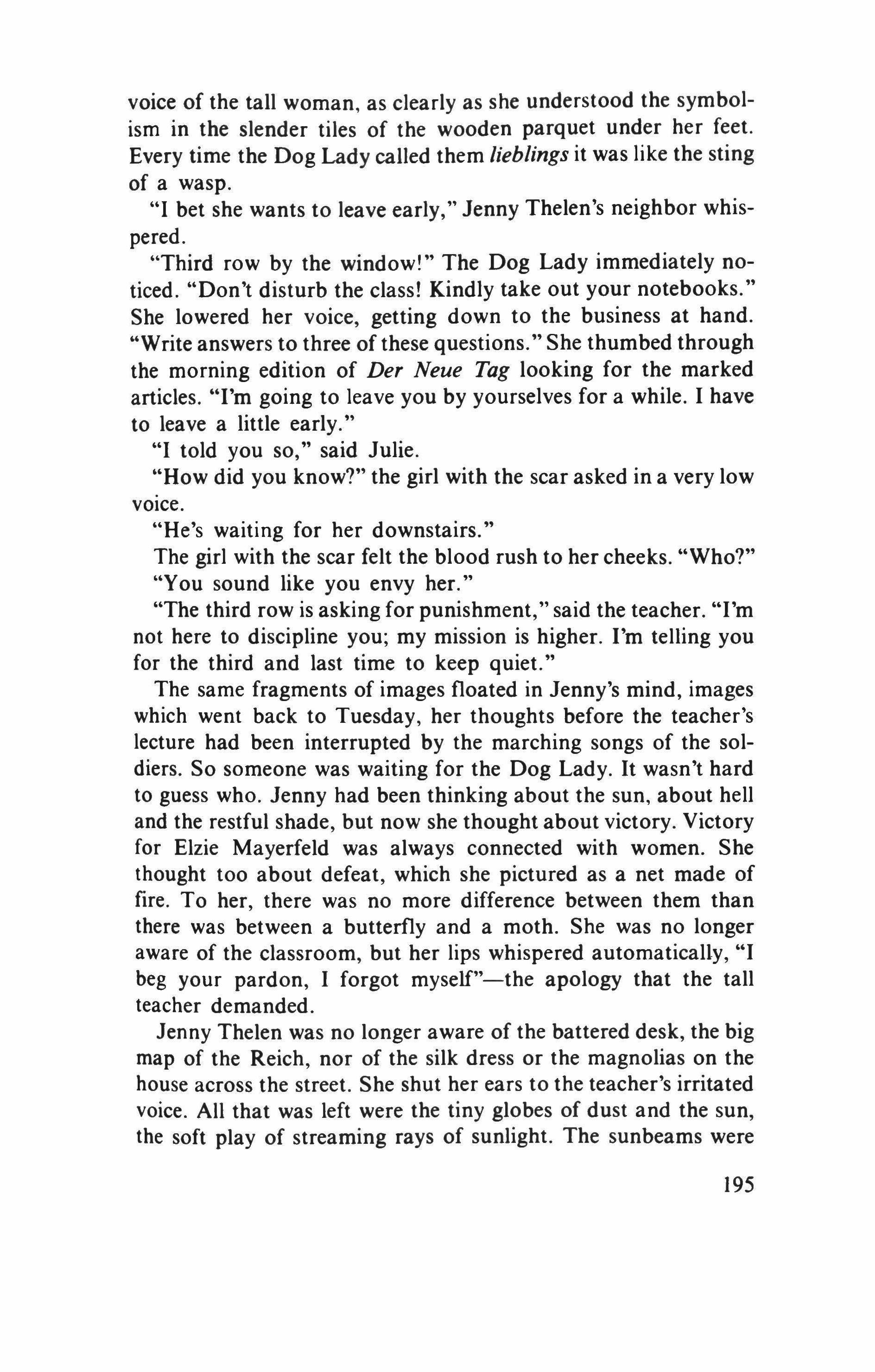
voice of the tall woman, as clearly as she understood the symbolism in the slender tiles of the wooden parquet under her feet. Every time the Dog Lady called them lieblings it was like the sting of a wasp.
"I bet she wants to leave early," Jenny Thelen's neighbor whispered.
"Third row by the window!" The Dog Lady immediately noticed. "Don't disturb the class! Kindly take out your notebooks." She lowered her voice, getting down to the business at hand. "Write answers to three of these questions." She thumbed through the morning edition of Der Neue Tag looking for the marked articles. "I'm going to leave you by yourselves for a while. 1 have to leave a little early."
"I told you so," said Julie.
"How did you know?" the girl with the scar asked in a very low voice.
"He's waiting for her downstairs."
The girl with the scar felt the blood rush to her cheeks. "Who?"
"You sound like you envy her."
"The third row is asking for punishment," said the teacher. "I'm not here to discipline you; my mission is higher. I'm telling you for the third and last time to keep quiet."
The same fragments of images floated in Jenny's mind, images which went back to Tuesday, her thoughts before the teacher's lecture had been interrupted by the marching songs of the soldiers. So someone was waiting for the Dog Lady. It wasn't hard to guess who. Jenny had been thinking about the sun, about hell and the restful shade, but now she thought about victory. Victory for Elzie Mayerfeld was always connected with women. She thought too about defeat, which she pictured as a net made of fire. To her, there was no more difference between them than there was between a butterfly and a moth. She was no longer aware of the classroom, but her lips whispered automatically, "I beg your pardon, I forgot myself"-the apology that the tall teacher demanded.
Jenny Thelen was no longer aware of the battered desk, the big map of the Reich, nor of the silk dress or the magnolias on the house across the street. She shut her ears to the teacher's irritated voice. All that was left were the tiny globes of dust and the sun, the soft play of streaming rays of sunlight. The sunbeams were

like long, thin, golden shadows. She felt herself glide down them, her eyelids half-closed, as if she were drifting off to sleep. Everything surrounding her was real, and yet she was aware of none of it. Nothing remained but the light and all that she was learning to forget here in the Prague Institute for Girls of Pure Race From Non-German Territories: that in the year 1942 she had had a father and a mother. But she had not yet learned to forget what it was they had been executed for.
Something was streaming through her subconscious, like mud drifting at the bottom of a river, something connected with the damp day of March 15, with its snow and the motorcycles ridden by foreign soldiers who wore green cloth tunics under their raincoats, reminding her of uniformed frogs.
Father was wearing the nickel-plated glasses he'd just brought home from the health insurance company (as a worker at the waterworks, he was entitled to a yearly eye checkup and now glasses). He didn't want to see what was going on outside the window, so he took the glasses off. He said it was a wonder that the occupation soldiers hadn't started singing. And at just that moment they had started to sing-songs about distant German lands, about earth and blood-pipes and drums: hai-li, hai-lo, la, 10 Tanks tore up the road. After that, Father had taken her on his knee more often and told her about the times when he had fought on the river Piava in northern Italy, where he had learned to play 0, Maria and other songs from Terst on the mandolin. Drops of perspiration appeared on Jenny's forehead and above her upper lip. For a fraction of a second she felt totally naked in this heat. She was tired. She hadn't slept well the night before. She hadn't slept well since Tuesday. In the morning the Dog Lady had talked about what united children and parents and what divided them. The rays of sunlight bore down on her.
"I know who's waiting for her," whispered Julie. "It's him. 111 bet you anything. They made a date for Saturday."
It's awfully hot," whispered the girl with the scar, as if admitting that it was a possibility. She no longer felt that she could see her mother and father in the rays of the sun.
She dropped her hands into her lap. She could feel herself perspiring all over. She let her head drop. The sun shone on the beads of sweat running down her forehead. Suddenly she had the urge to get up, without permission, and go to the window to see who was waiting for the teacher.
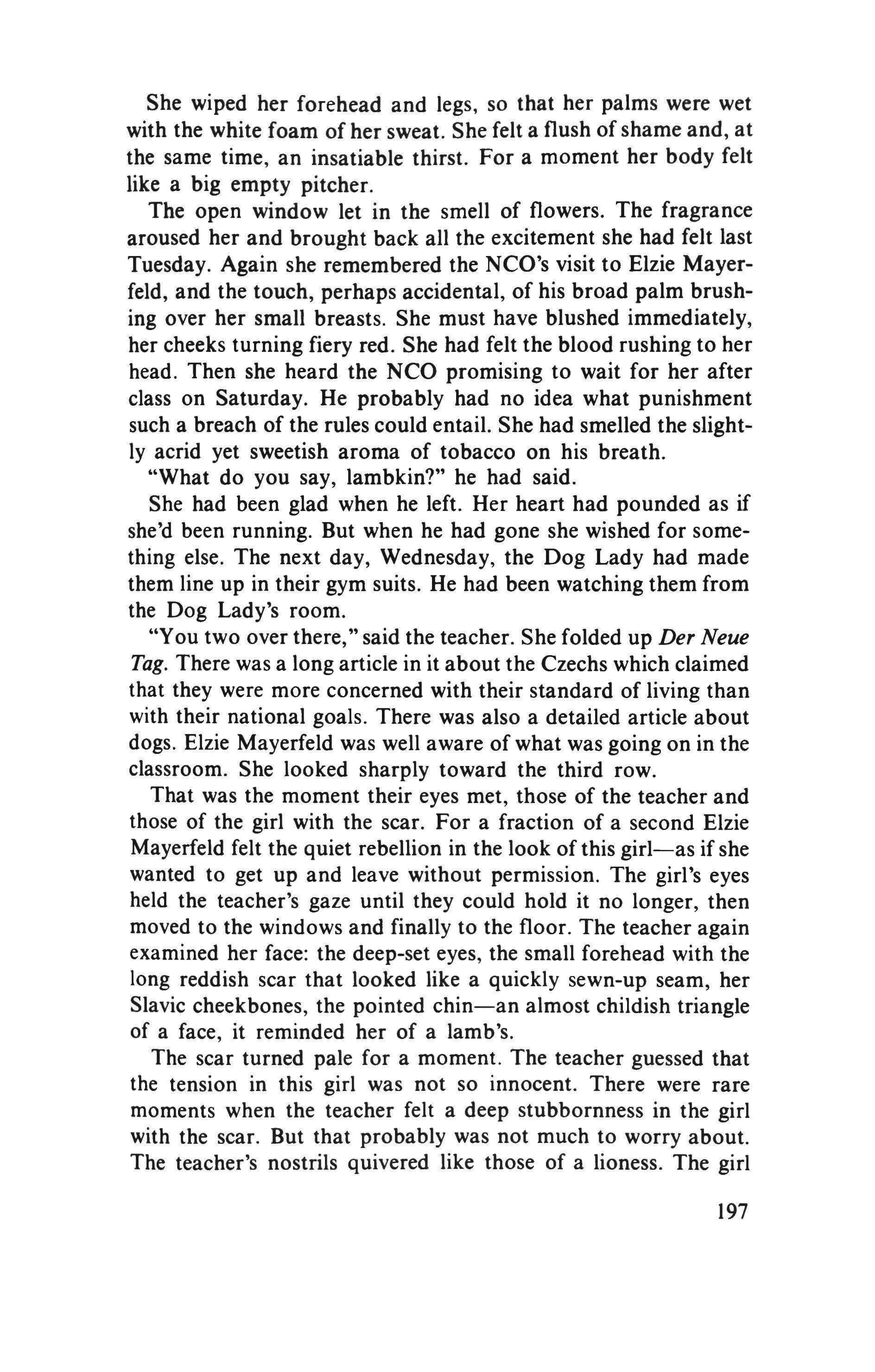
She wiped her forehead and legs, so that her palms were wet with the white foam of her sweat. She felt a flush of shame and, at the same time, an insatiable thirst. For a moment her body felt like a big empty pitcher.
The open window let in the smell of flowers. The fragrance aroused her and brought back all the excitement she had felt last Tuesday. Again she remembered the NCO's visit to Elzie Mayerfeld, and the touch, perhaps accidental, of his broad palm brushing over her small breasts. She must have blushed immediately, her cheeks turning fiery red. She had felt the blood rushing to her head. Then she heard the NCO promising to wait for her after class on Saturday. He probably had no idea what punishment such a breach of the rules could entail. She had smelled the slightly acrid yet sweetish aroma of tobacco on his breath.
"What do you say, lambkin?" he had said.
She had been glad when he left. Her heart had pounded as if she'd been running. But when he had gone she wished for something else. The next day, Wednesday, the Dog Lady had made them line up in their gym suits. He had been watching them from the Dog Lady's room.
"You two over there," said the teacher. She folded up Der Neue Tag. There was a long article in it about the Czechs which claimed that they were more concerned with their standard of living than with their national goals. There was also a detailed article about dogs. Elzie Mayerfeld was well aware of what was going on in the classroom. She looked sharply toward the third row.
That was the moment their eyes met, those of the teacher and those of the girl with the scar. For a fraction of a second Elzie Mayerfeld felt the quiet rebellion in the look of this girl-as if she wanted to get up and leave without permission. The girl's eyes held the teacher's gaze until they could hold it no longer, then moved to the windows and finally to the floor. The teacher again examined her face: the deep-set eyes, the small forehead with the long reddish scar that looked like a quickly sewn-up seam, her Slavic cheekbones, the pointed chin-an almost childish triangle of a face, it reminded her of a lamb's.
The scar turned pale for a moment. The teacher guessed that the tension in this girl was not so innocent. There were rare moments when the teacher felt a deep stubbornness in the girl with the scar. But that probably was not much to worry about. The teacher's nostrils quivered like those of a lioness. The girl
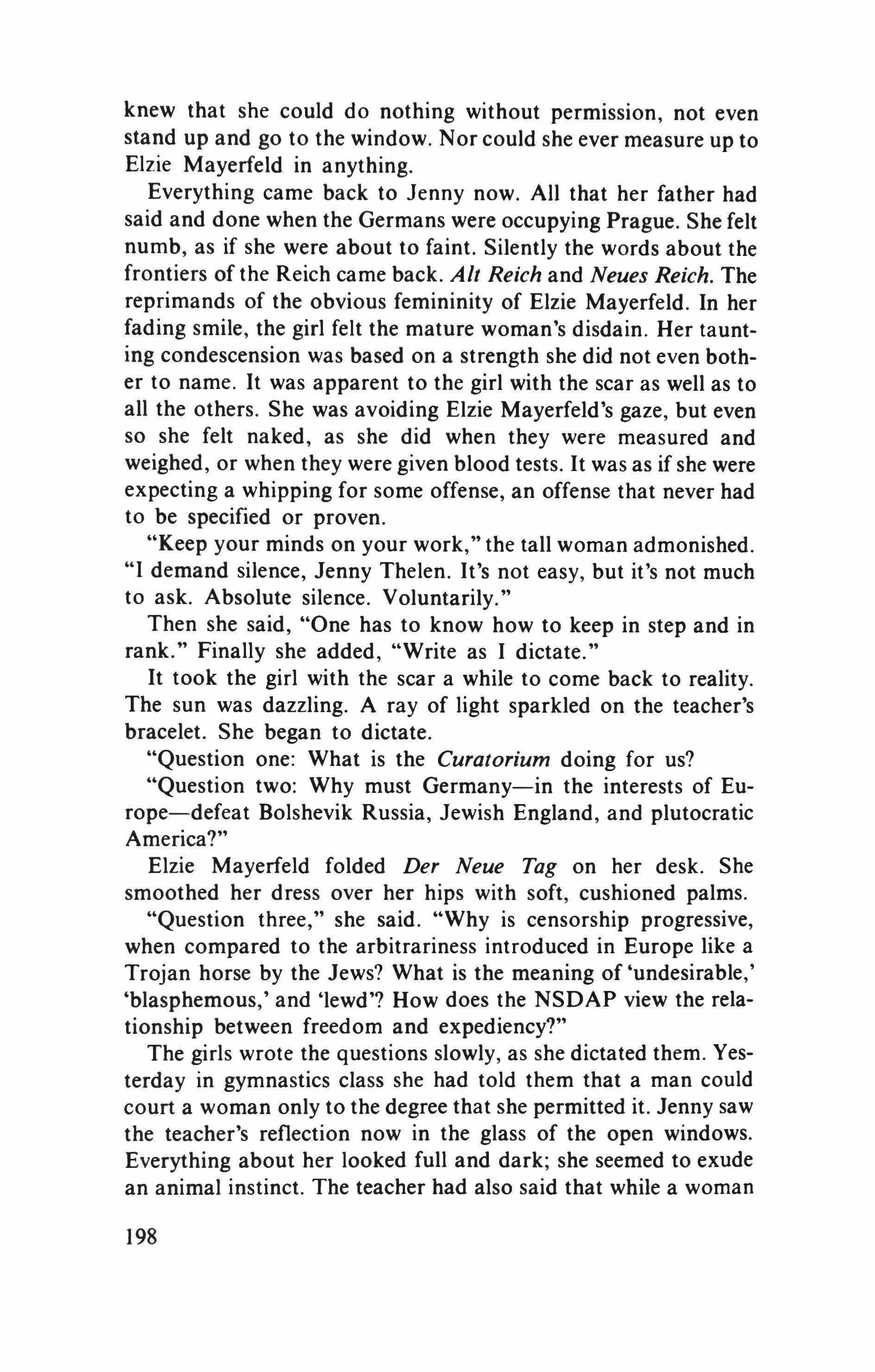
knew that she could do nothing without permission, not even stand up and go to the window. Nor could she ever measure up to Elzie Mayerfeld in anything.
Everything came back to Jenny now. All that her father had said and done when the Germans were occupying Prague. She felt numb, as if she were about to faint. Silently the words about the frontiers of the Reich came back. All Reich and Neues Reich. The reprimands of the obvious femininity of Elzie Mayerfeld. In her fading smile, the girl felt the mature woman's disdain. Her taunting condescension was based on a strength she did not even bother to name. It was apparent to the girl with the scar as well as to all the others. She was avoiding Elzie Mayerfeld's gaze, but even so she felt naked, as she did when they were measured and weighed, or when they were given blood tests. It was as if she were expecting a Whipping for some offense, an offense that never had to be specified or proven.
"Keep your minds on your work," the tall woman admonished. "I demand silence, Jenny Thelen. It's not easy, but it's not much to ask. Absolute silence. Voluntarily."
Then she said, "One has to know how to keep in step and in rank." Finally she added, "Write as I dictate."
It took the girl with the scar a while to come back to reality. The sun was dazzling. A ray of light sparkled on the teacher's bracelet. She began to dictate.
"Question one: What is the Curatorium doing for us?
"Question two: Why must Germany-in the interests of Europe-defeat Bolshevik Russia, Jewish England, and plutocratic America?"
Elzie Mayerfeld folded Der Neue Tag on her desk. She smoothed her dress over her hips with soft, cushioned palms.
"Question three," she said. "Why is censorship progressive, when compared to the arbitrariness introduced in Europe like a Trojan horse by the Jews? What is the meaning of 'undesirable,' 'blasphemous,' and 'lewd'? How does the NSDAP view the relationship between freedom and expediency?"
The girls wrote the questions slowly, as she dictated them. Yesterday in gymnastics class she had told them that a man could court a woman only to the degree that she permitted it. Jenny saw the teacher's reflection now in the glass of the open windows. Everything about her looked full and dark; she seemed to exude an animal instinct. The teacher had also said that while a woman

never sought out a man, when desire came upon her-and this was what differentiated a grown woman from a mere girl-she always met someone who would sense it and who would fulfill her.
"Now you may begin," said Elzie Mayerfeld.
Then, as if snapping closed that chain of mystery without which you cannot know success, she said that she expected silence and order in her absence. That is what obedience meant: it was consent, and the two together led to attainment. "Discipline in the name of freedom," she added.
Elzie Mayerfeld's hips swayed. Her cushioned palms moved up and down the rustling silk, as if shaping her body into curves.
Then she turned and wrote in her notebook: The animal is very patient with the blind and the deaf Then she added: Too patient with the blind and the deaf and the insolent.
She said aloud, "111 make it up to you. You won't miss anything. This evening 111 teach you how to waltz. Our soldiers are fond of waltzes."
She moved a few steps away from the desk. She wore another gold bracelet on her left ankle.
"There are three ways you can do the waltz," said Elzie. "I have a new Lale Anderson record. She has such a wonderfully velvet voice. She's better than Marlene Dietrich used to be. Much better. She's also braver, of course. Lale Anderson is still our best frontline singer. 111 pick up your notebooks in the evening."
The girl with the scar found all this uninteresting and immaterial. She was filled with a thirst that did not burn but that sapped the strength of arms, legs, and brain.
Elzie Mayerfeld dilated the deeply sculpted nostrils of her long, thin nose, drew them in again, and walked slowly out of the room.
The noon heat permeated the classroom. Whispering filled the aisles. Julie said, "Lale Anderson is a slut. And so is Elzie Mayerfeld." The accusation hung in the air for a moment. Then a small girl with a tiny face said that at the German front there were probably a lot of such women, women who combined sex and song. The Little One started writing.
"We've got velvet voices too, only we're not sluts like Lale," added Julie.
The girl with the scar listened to the whispered voices of the
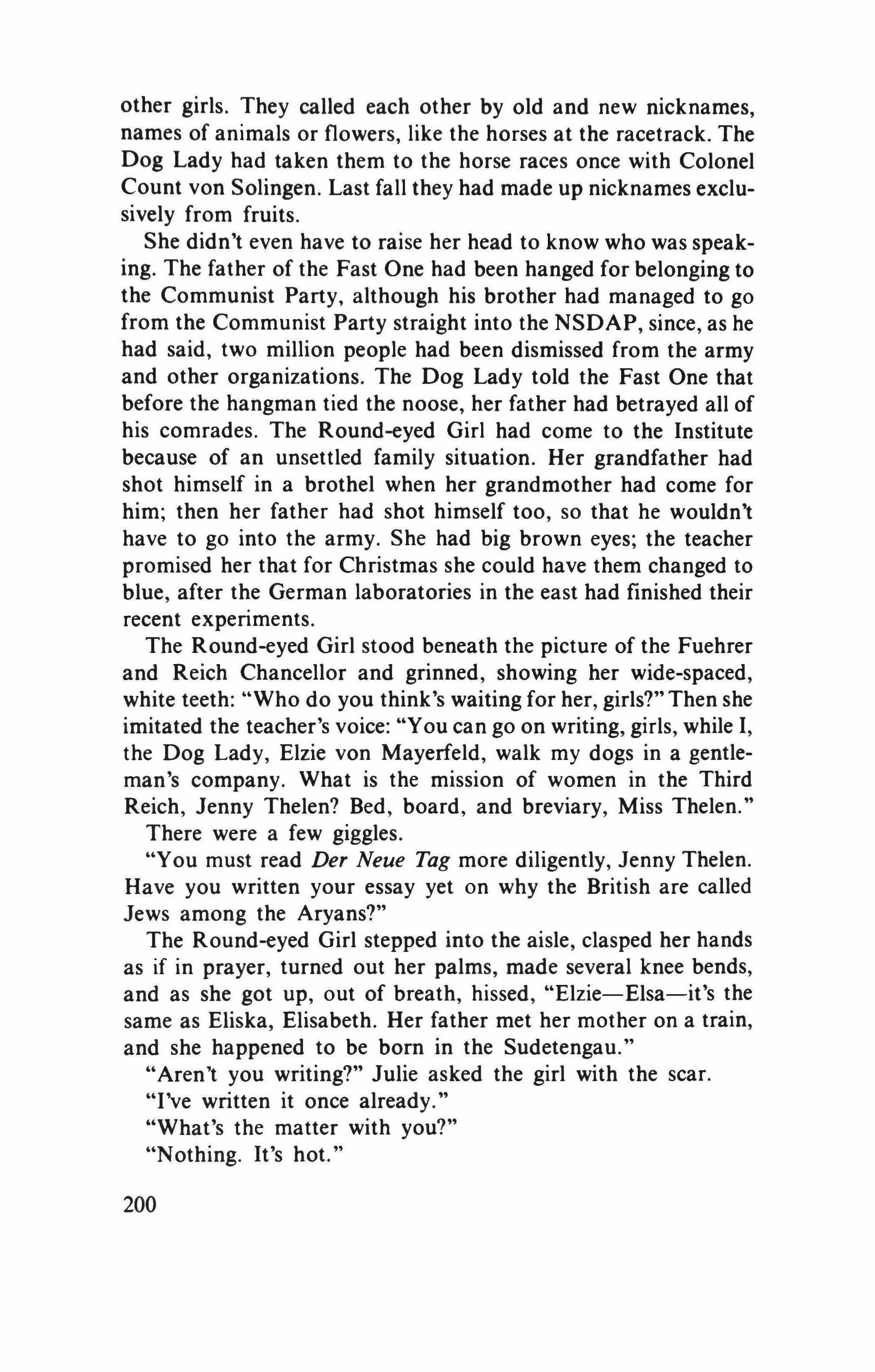
other girls. They called each other by old and new nicknames, names of animals or flowers, like the horses at the racetrack. The Dog Lady had taken them to the horse races once with Colonel Count von Solingen. Last fall they had made up nicknames exclusively from fruits.
She didn't even have to raise her head to know who was speaking. The father of the Fast One had been hanged for belonging to the Communist Party, although his brother had managed to go from the Communist Party straight into the NSDAP, since, as he had said, two million people had been dismissed from the army and other organizations. The Dog Lady told the Fast One that before the hangman tied the noose, her father had betrayed all of his comrades. The Round-eyed Girl had come to the Institute because of an unsettled family situation. Her grandfather had shot himself in a brothel when her grandmother had come for him; then her father had shot himself too, so that he wouldn't have to go into the army. She had big brown eyes; the teacher promised her that for Christmas she could have them changed to blue, after the German laboratories in the east had finished their recent experiments.
The Round-eyed Girl stood beneath the picture of the Fuehrer and Reich Chancellor and grinned, showing her wide-spaced, white teeth: "Who do you think's waiting for her, girls?" Then she imitated the teacher's voice: "You can go on writing, girls, while I, the Dog Lady, Elzie von Mayerfeld, walk my dogs in a gentleman's company. What is the mission of women in the Third Reich, Jenny Thelen? Bed, board, and breviary, Miss Thelen."
There were a few giggles.
"You must read Der Neue Tag more diligently, Jenny Thelen. Have you written your essay yet on why the British are called Jews among the Aryans?"
The Round-eyed Girl stepped into the aisle, clasped her hands as if in prayer, turned out her palms, made several knee bends, and as she got up, out of breath, hissed, "Elzie-Elsa-it's the same as Eliska, Elisabeth. Her father met her mother on a train, and she happened to be born in the Sudetengau."
Aren't you writing?" Julie asked the girl with the scar.
"I've written it once already."
"What's the matter with you?"
"Nothing. It's hot."
200
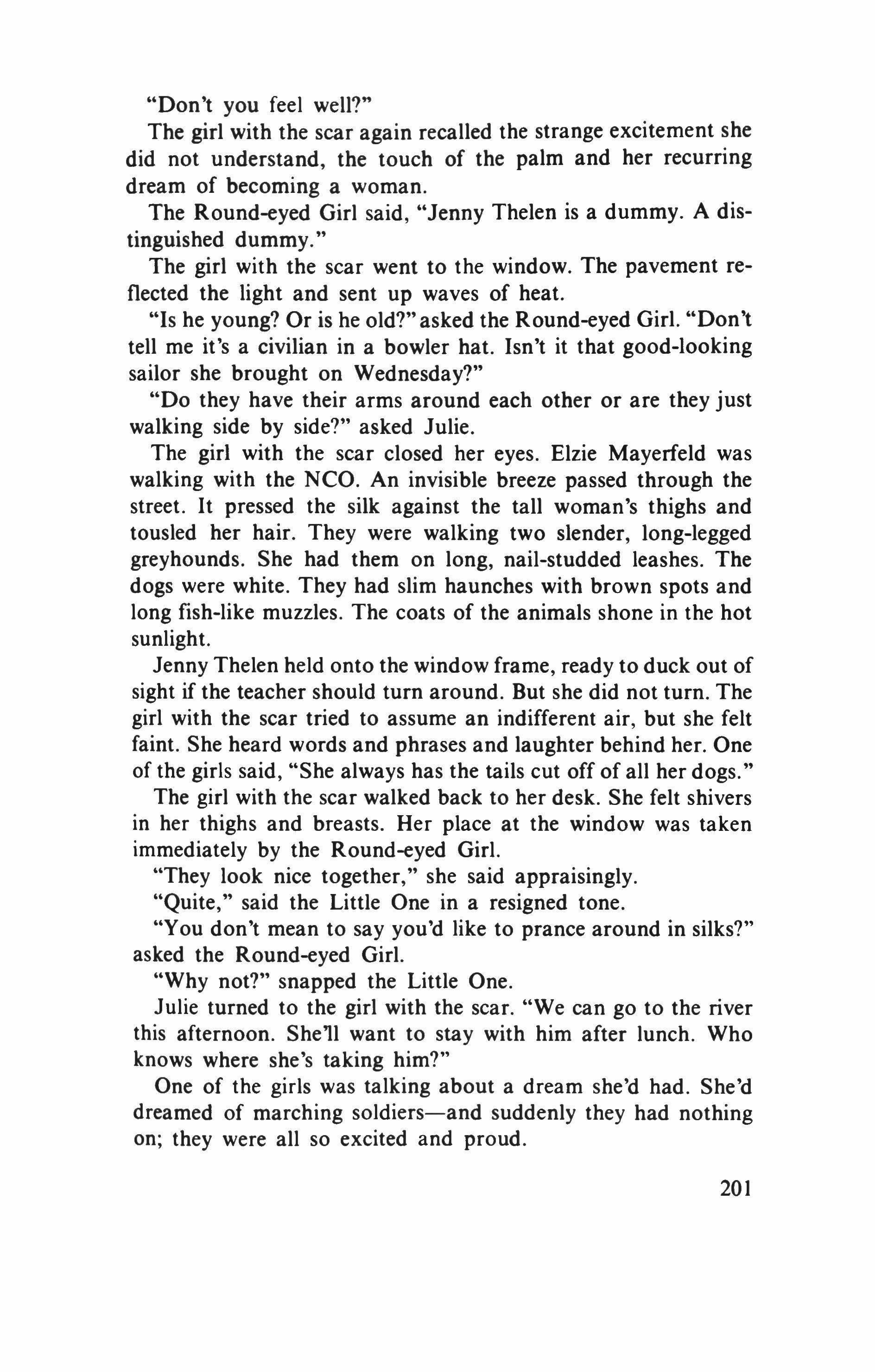
"Don't you feel well?"
The girl with the scar again recalled the strange excitement she did not understand, the touch of the palm and her recurring dream of becoming a woman.
The Round-eyed Girl said, "Jenny Thelen is a dummy. A distinguished dummy."
The girl with the scar went to the window. The pavement reflected the light and sent up waves of heat.
"Is he young? Or is he old?" asked the Round-eyed Girl. "Don't tell me it's a civilian in a bowler hat. Isn't it that good-looking sailor she brought on Wednesday?"
"Do they have their arms around each other or are they just walking side by side?" asked Julie.
The girl with the scar closed her eyes. Elzie Mayerfeld was walking with the NCO. An invisible breeze passed through the street. It pressed the silk against the tall woman's thighs and tousled her hair. They were walking two slender, long-legged greyhounds. She had them on long, nail-studded leashes. The dogs were white. They had slim haunches with brown spots and long fish-like muzzles. The coats of the animals shone in the hot sunlight.
Jenny Thelen held onto the window frame, ready to duck out of sight if the teacher should turn around. But she did not turn. The girl with the scar tried to assume an indifferent air, but she felt faint. She heard words and phrases and laughter behind her. One of the girls said, "She always has the tails cut off of all her dogs."
The girl with the scar walked back to her desk. She felt shivers in her thighs and breasts. Her place at the window was taken immediately by the Round-eyed Girl.
"They look nice together," she said appraisingly.
"Quite," said the Little One in a resigned tone.
"You don't mean to say you'd like to prance around in silks?" asked the Round-eyed Girl.
"Why not?" snapped the Little One.
Julie turned to the girl with the scar. "We can go to the river this afternoon. She'll want to stay with him after lunch. Who knows where she's taking him?"
One of the girls was talking about a dream she'd had. She'd dreamed of marching soldiers-and suddenly they had nothing on; they were all so excited and proud.
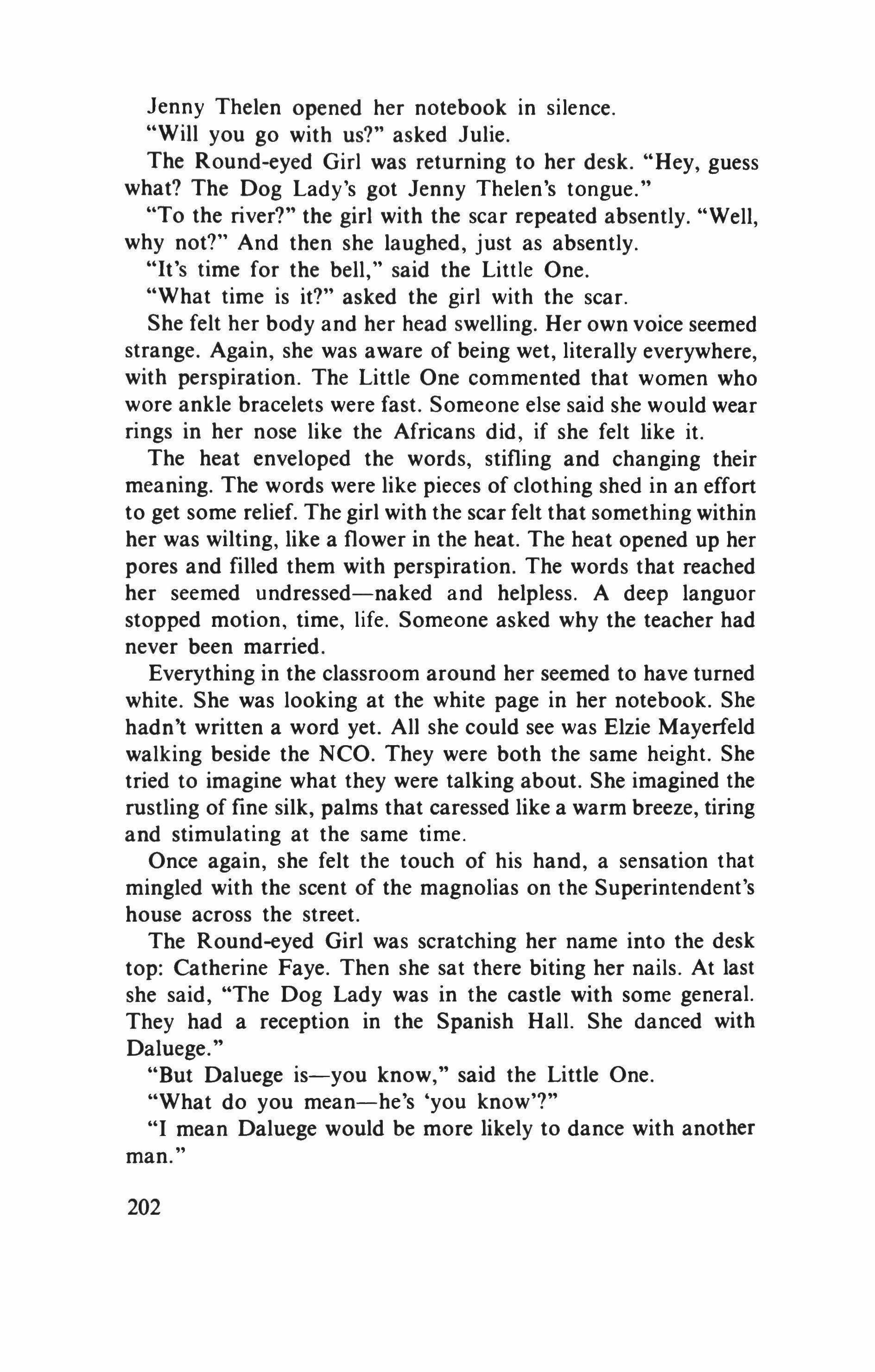
Jenny Thelen opened her notebook in silence.
"Will you go with us?" asked Julie.
The Round-eyed Girl was returning to her desk. "Hey, guess what? The Dog Lady's got Jenny Thelen's tongue."
"To the river?" the girl with the scar repeated absently. "Well, why not?" And then she laughed, just as absently.
"It's time for the bell," said the Little One.
"What time is it?" asked the girl with the scar.
She felt her body and her head swelling. Her own voice seemed strange. Again, she was aware of being wet, literally everywhere, with perspiration. The Little One commented that women who wore ankle bracelets were fast. Someone else said she would wear rings in her nose like the Africans did, if she felt like it.
The heat enveloped the words, stifling and changing their meaning. The words were like pieces of clothing shed in an effort to get some relief. The girl with the scar felt that something within her was wilting, like a flower in the heat. The heat opened up her pores and filled them with perspiration. The words that reached her seemed undressed-naked and helpless. A deep languor stopped motion, time, life. Someone asked why the teacher had never been married.
Everything in the classroom around her seemed to have turned white. She was looking at the white page in her notebook. She hadn't written a word yet. All she could see was Elzie Mayerfeld walking beside the NCO. They were both the same height. She tried to imagine what they were talking about. She imagined the rustling of fine silk, palms that caressed like a warm breeze, tiring and stimulating at the same time.
Once again, she felt the touch of his hand, a sensation that mingled with the scent of the magnolias on the Superintendent's house across the street.
The Round-eyed Girl was scratching her name into the desk top: Catherine Faye. Then she sat there biting her nails. At last she said, "The Dog Lady was in the castle with some general. They had a reception in the Spanish Hall. She danced with Daluege."
"But Daluege is-you know," said the Little One.
"What do you mean-he's 'you know'?"
"I mean Daluege would be more likely to dance with another man."
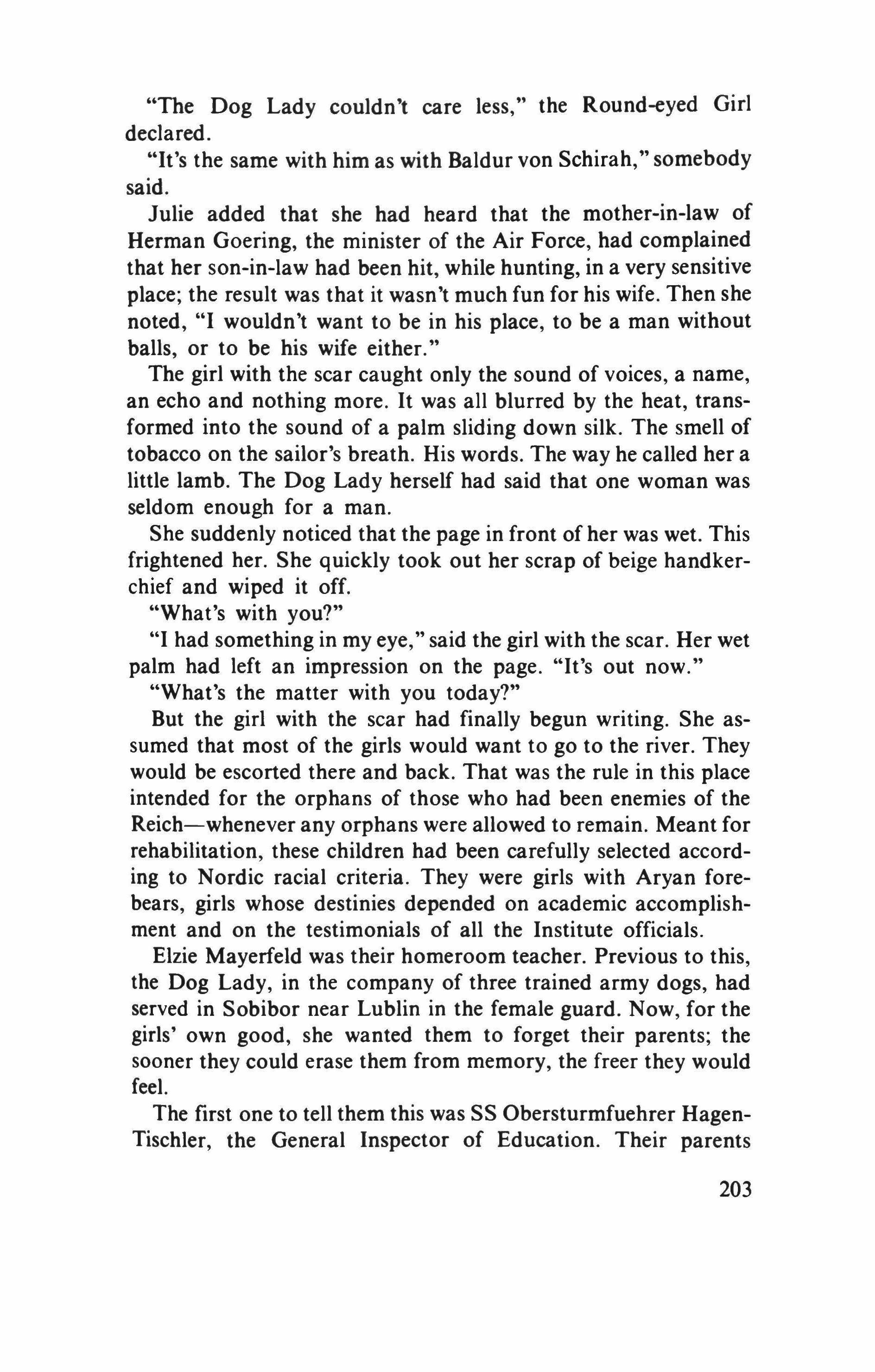
"The Dog Lady couldn't care less," the Round-eyed Girl declared.
"It's the same with him as with Baldur von Schirah," somebody said.
Julie added that she had heard that the mother-in-law of Herman Goering, the minister of the Air Force, had complained that her son-in-law had been hit, while hunting, in a very sensitive place; the result was that it wasn't much fun for his wife. Then she noted, "I wouldn't want to be in his place, to be a man without balls, or to be his wife either."
The girl with the scar caught only the sound of voices, a name, an echo and nothing more. It was all blurred by the heat, transformed into the sound of a palm sliding down silk. The smell of tobacco on the sailor's breath. His words. The way he called her a little lamb. The Dog Lady herself had said that one woman was seldom enough for a man.
She suddenly noticed that the page in front of her was wet. This frightened her. She quickly took out her scrap of beige handkerchief and wiped it off.
"What's with you?"
"I had something in my eye," said the girl with the scar. Her wet palm had left an impression on the page. "It's out now."
"What's the matter with you today?"
But the girl with the scar had finally begun writing. She assumed that most of the girls would want to go to the river. They would be escorted there and back. That was the rule in this place intended for the orphans of those who had been enemies of the Reich-whenever any orphans were allowed to remain. Meant for rehabilitation, these children had been carefully selected according to Nordic racial criteria. They were girls with Aryan forebears, girls whose destinies depended on academic accomplishment and on the testimonials of all the Institute officials.
Elzie Mayerfeld was their homeroom teacher. Previous to this, the Dog Lady, in the company of three trained army dogs, had served in Sobibor near Lublin in the female guard. Now, for the girls' own good, she wanted them to forget their parents; the sooner they could erase them from memory, the freer they would feel.
The first one to tell them this was SS Obersturmfuehrer HagenTischler, the General Inspector of Education. Their parents
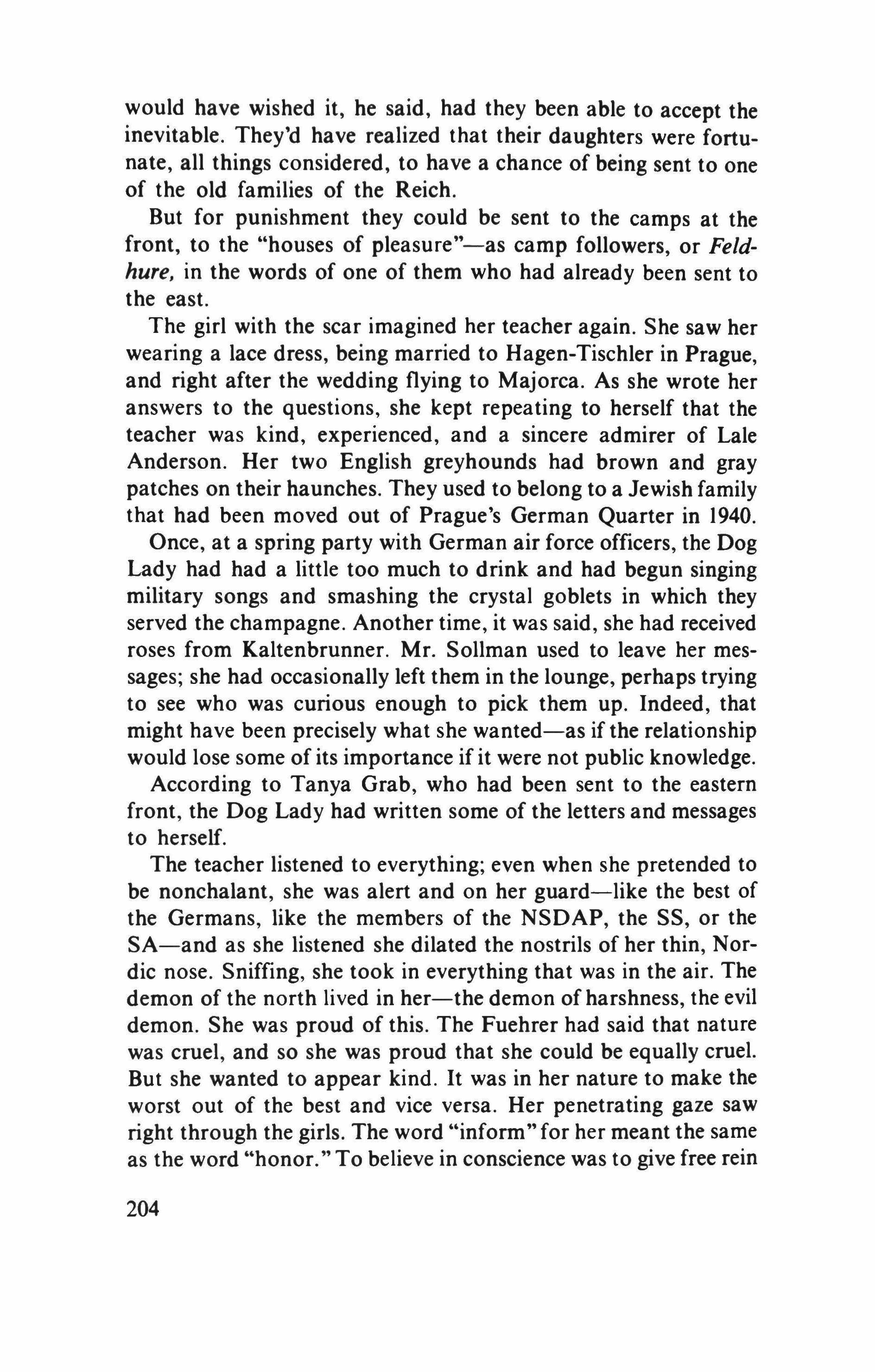
would have wished it, he said, had they been able to accept the inevitable. They'd have realized that their daughters were fortunate, all things considered, to have a chance of being sent to one of the old families of the Reich.
But for punishment they could be sent to the camps at the front, to the "houses of pleasure"-as camp followers, or Feldhure, in the words of one of them who had already been sent to the east.
The girl with the scar imagined her teacher again. She saw her wearing a lace dress, being married to Hagen-Tischler in Prague, and right after the wedding flying to Majorca. As she wrote her answers to the questions, she kept repeating to herself that the teacher was kind, experienced, and a sincere admirer of Lale Anderson. Her two English greyhounds had brown and gray patches on their haunches. They used to belong to a Jewish family that had been moved out of Prague's German Quarter in 1940.
Once, at a spring party with German air force officers, the Dog Lady had had a little too much to drink and had begun singing military songs and smashing the crystal goblets in which they served the champagne. Another time, it was said, she had received roses from Kaltenbrunner. Mr. Sollman used to leave her messages; she had occasionally left them in the lounge, perhaps trying to see who was curious enough to pick them up. Indeed, that might have been precisely what she wanted-as if the relationship would lose some of its importance if it were not public knowledge.
According to Tanya Grab, who had been sent to the eastern front, the Dog Lady had written some of the letters and messages to herself.
The teacher listened to everything; even when she pretended to be nonchalant, she was alert and on her guard-like the best of the Germans, like the members of the NSDAP, the SS, or the SA-and as she listened she dilated the nostrils of her thin, Nordic nose. Sniffing, she took in everything that was in the air. The demon of the north lived in her-the demon of harshness, the evil demon. She was proud of this. The Fuehrer had said that nature was cruel, and so she was proud that she could be equally cruel. But she wanted to appear kind. It was in her nature to make the worst out of the best and vice versa. Her penetrating gaze saw right through the girls. The word "inform" for her meant the same as the word "honor." To believe in conscience was to give free rein

to a Jewish ruse; to follow the Ten Commandments meant to be defeated by a Jewish trick, even though Germany had annexed the territories of the Judenrein.
Being with the Germans simply meant being with the victors. Victors never had to answer to the defeated. In the light of victory, every groan of the defeated was a lie. Only the defeated found it necessary to kill in self-defense. The victor was the first to kill. It was good to forget; the worst thing one could do was remember. In a higher sense, though, one could say that the whole German Reich was fighting a war of self-defense: defending itself against the pollution of its blood. The German Reich would last for a thousand years.
The windows were wide open. Heat poured into the classroom, as if the difference between the inside and the outside of a furnace had been obliterated. The Little One asked the Round-eyed Girl why Tanya Grab hadn't written since she'd gone east. It was doubtful that she had been sent to some German officer's family. For a night, maybe, someone said. To "colonize" some officer's bedroom was more likely. The bell rang, slicing across the consciousness of the girl with the scar, ripping the silence, as if the Dog Lady had taken a knife and split Jenny's body from the dimple in her throat all the way to her groin.
It was easy to imagine Elzie Mayerfeld with a knife in her hand. She would hold it so tightly that, at the victim's slightest motion, it would break off in the wound, leaving the handle in her hand.
The sound of the bell told her what was coming and what had passed; it was like a surreptitious bullet that just barely misses its goal. In it there were tender layers of light and dark, of silence and noise, of words and steps-something that could not be perceived from the outside.
Finally the bell stopped ringing. Everything in her seemed to fester, like a wound which had never healed. What she had had to repeat to Elzie Mayerfeld-"Sorry, I forgot myself"-or the days when the Dog Lady called Jenny to her or when she left to spend the evening and a part of the night with an officer from the HitlerJugend SS or, when his fat wife was visiting in Berlin, with the Superintendent from the magnolia-covered house across the street.
It all reminded her of a man holding a knife who lets someone bend his arm until he's forced to stab himself.
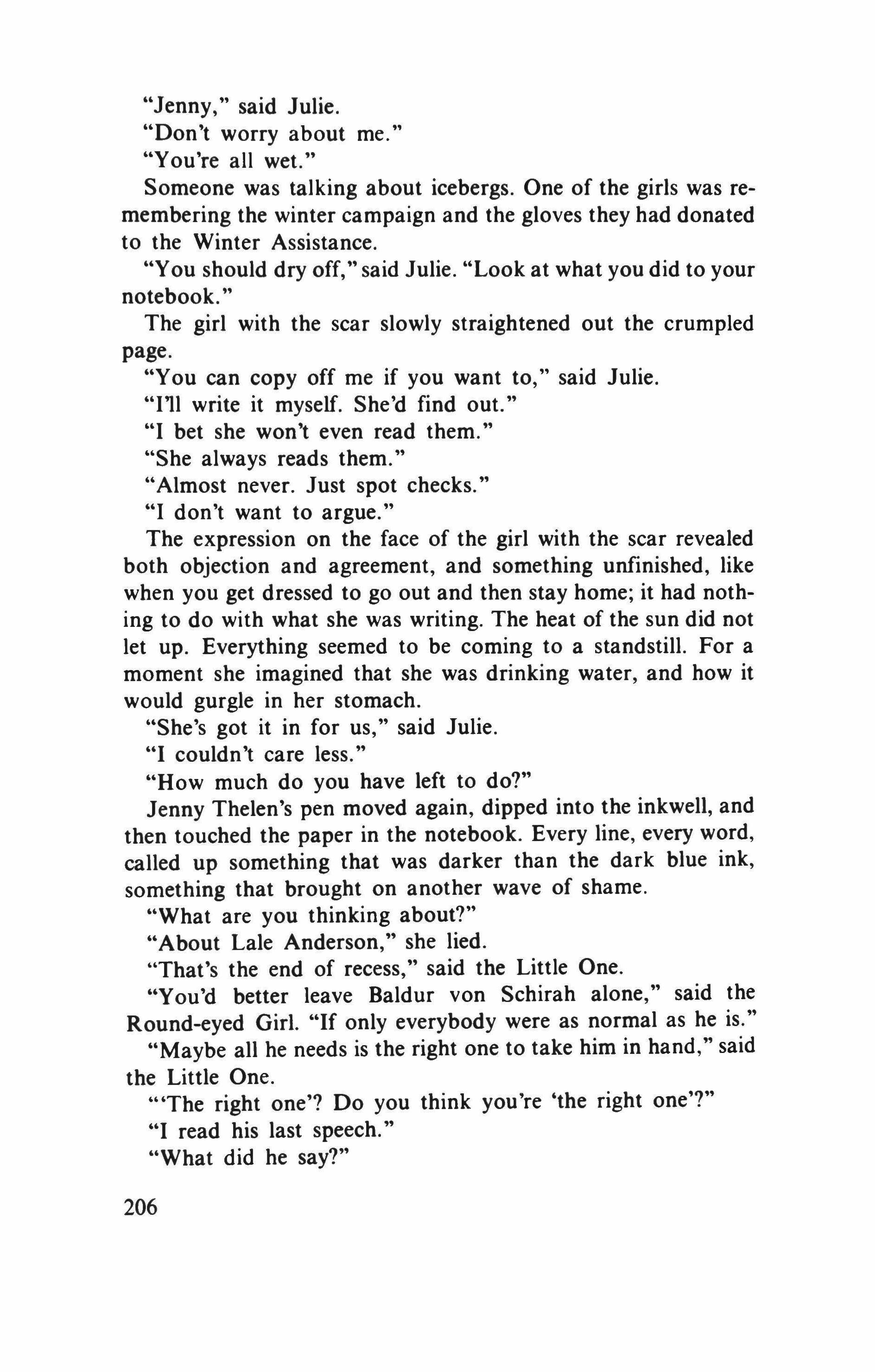
"Jenny," said Julie.
"Don't worry about me."
"You're all wet."
Someone was talking about icebergs. One of the girls was remembering the winter campaign and the gloves they had donated to the Winter Assistance.
"You should dry off," said Julie. "Look at what you did to your notebook. "
The girl with the scar slowly straightened out the crumpled page.
"You can copy off me if you want to," said Julie.
"I'll write it myself. She'd find out."
"I bet she won't even read them."
"She always reads them."
"Almost never. Just spot checks."
"I don't want to argue."
The expression on the face of the girl with the scar revealed both objection and agreement, and something unfinished, like when you get dressed to go out and then stay home; it had nothing to do with what she was writing. The heat of the sun did not let up. Everything seemed to be coming to a standstill. For a moment she imagined that she was drinking water, and how it would gurgle in her stomach.
"She's got it in for us," said Julie.
"I couldn't care less."
"How much do you have left to do?"
Jenny Thelen's pen moved again, dipped into the inkwell, and then touched the paper in the notebook. Every line, every word, called up something that was darker than the dark blue ink, something that brought on another wave of shame.
"What are you thinking about?"
"About Lale Anderson," she lied.
"That's the end of recess," said the Little One.
"You'd better leave Baldur von Schirah alone," said the Round-eyed Girl. "If only everybody were as normal as he is."
"Maybe all he needs is the right one to take him in hand," said the Little One.
"'The right one'? Do you think you're 'the right one'?"
"I read his last speech."
"What did he say?"
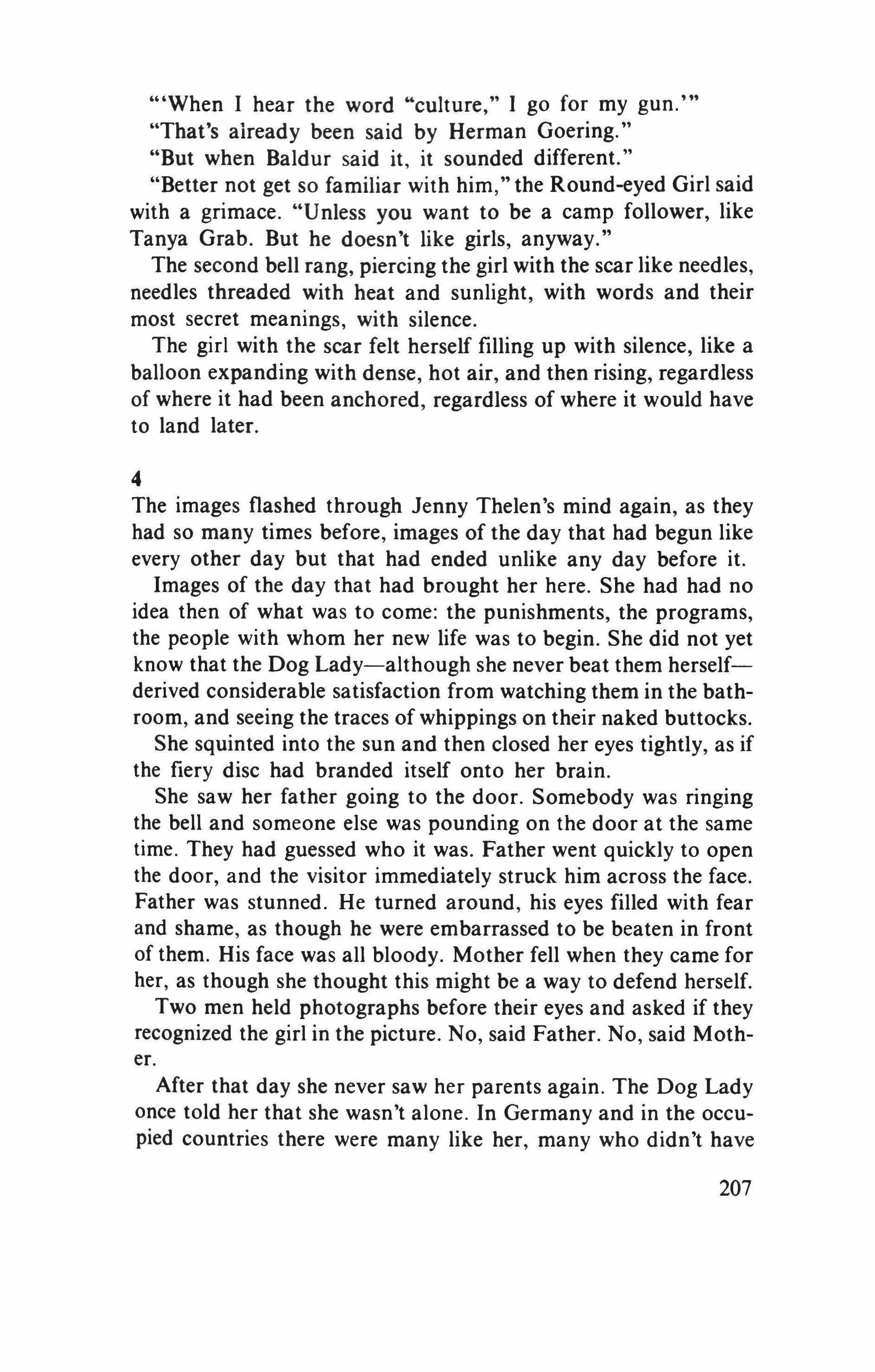
'''When I hear the word "culture," I go for my gun.'"
"That's already been said by Herman Goering."
"But when Baldur said it, it sounded different."
"Better not get so familiar with him," the Round-eyed Girl said with a grimace. "Unless you want to be a camp follower, like Tanya Grab. But he doesn't like girls, anyway."
The second bell rang, piercing the girl with the scar like needles, needles threaded with heat and sunlight, with words and their most secret meanings, with silence.
The girl with the scar felt herself filling up with silence, like a balloon expanding with dense, hot air, and then rising, regardless of where it had been anchored, regardless of where it would have to land later.
4
The images flashed through Jenny Thelen's mind again, as they had so many times before, images of the day that had begun like every other day but that had ended unlike any day before it.
Images of the day that had brought her here. She had had no idea then of what was to come: the punishments, the programs, the people with whom her new life was to begin. She did not yet know that the Dog Lady-although she never beat them herselfderived considerable satisfaction from watching them in the bathroom, and seeing the traces of whippings on their naked buttocks.
She squinted into the sun and then closed her eyes tightly, as if the fiery disc had branded itself onto her brain.
She saw her father going to the door. Somebody was ringing the bell and someone else was pounding on the door at the same time. They had guessed who it was. Father went quickly to open the door, and the visitor immediately struck him across the face. Father was stunned. He turned around, his eyes filled with fear and shame, as though he were embarrassed to be beaten in front of them. His face was all bloody. Mother fell when they came for her, as though she thought this might be a way to defend herself.
Two men held photographs before their eyes and asked if they recognized the girl in the picture. No, said Father. No, said Mother.
After that day she never saw her parents again. The Dog Lady once told her that she wasn't alone. In Germany and in the occupied countries there were many like her, many who didn't have
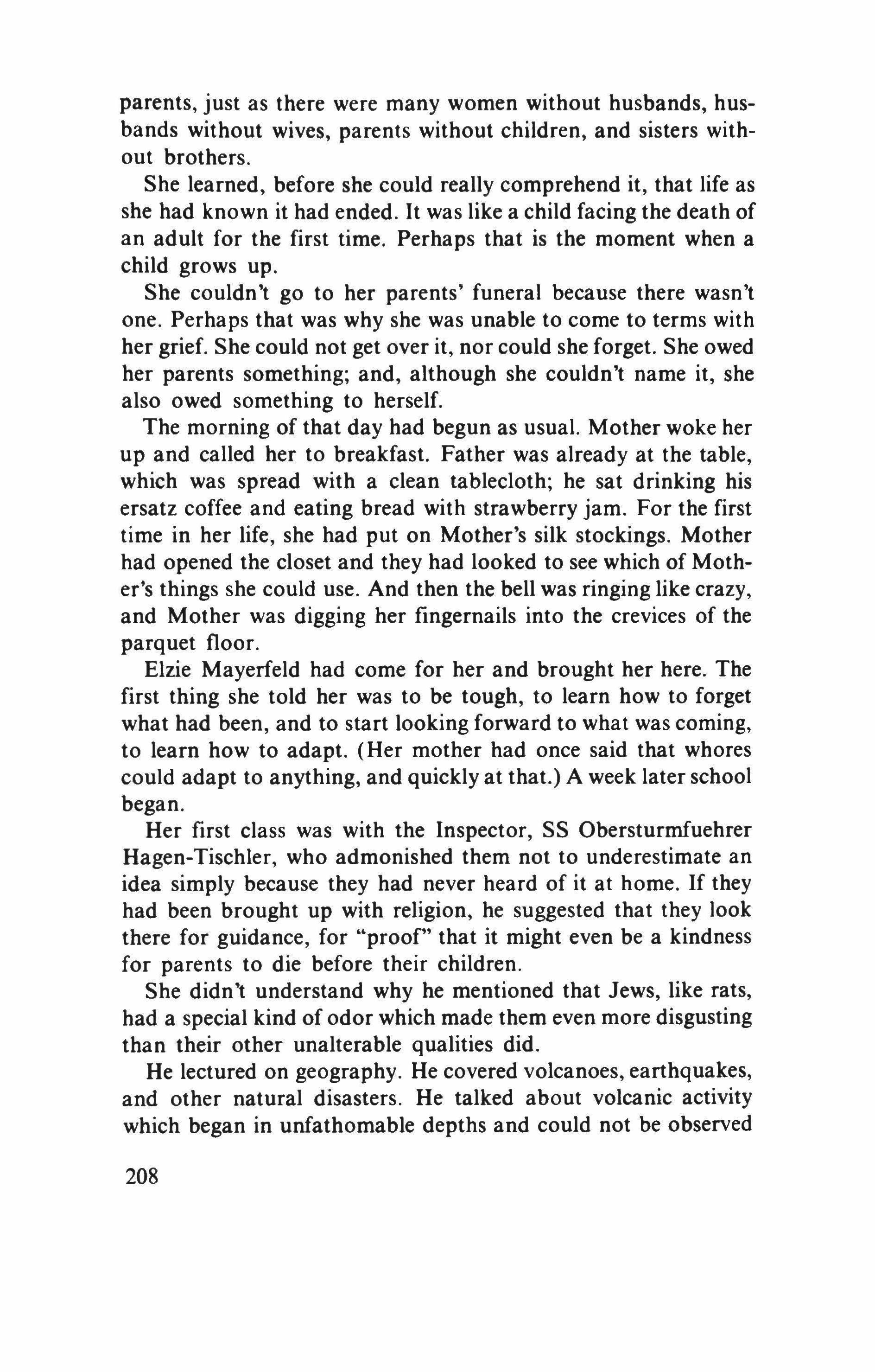
parents, just as there were many women without husbands, husbands without wives, parents without children, and sisters without brothers.
She learned, before she could really comprehend it, that life as she had known it had ended. It was like a child facing the death of an adult for the first time. Perhaps that is the moment when a child grows up.
She couldn't go to her parents' funeral because there wasn't one. Perhaps that was why she was unable to come to terms with her grief. She could not get over it, nor could she forget. She owed her parents something; and, although she couldn't name it, she also owed something to herself.
The morning of that day had begun as usual. Mother woke her up and called her to breakfast. Father was already at the table, which was spread with a clean tablecloth; he sat drinking his ersatz coffee and eating bread with strawberry jam. For the first time in her life, she had put on Mother's silk stockings. Mother had opened the closet and they had looked to see which of Mother's things she could use. And then the bell was ringing like crazy, and Mother was digging her fingernails into the crevices of the parquet floor.
Elzie Mayerfeld had come for her and brought her here. The first thing she told her was to be tough, to learn how to forget what had been, and to start looking forward to what was coming, to learn how to adapt. (Her mother had once said that whores could adapt to anything, and quickly at that.) A week later school began.
Her first class was with the Inspector, SS Obersturmfuehrer Hagen-Tischler, who admonished them not to underestimate an idea simply because they had never heard of it at home. If they had been brought up with religion, he suggested that they look there for guidance, for "proof' that it might even be a kindness for parents to die before their children.
She didn't understand why he mentioned that Jews, like rats, had a special kind of odor which made them even more disgusting than their other unalterable qualities did.
He lectured on geography. He covered volcanoes, earthquakes, and other natural disasters. He talked about volcanic activity which began in unfathomable depths and could not be observed
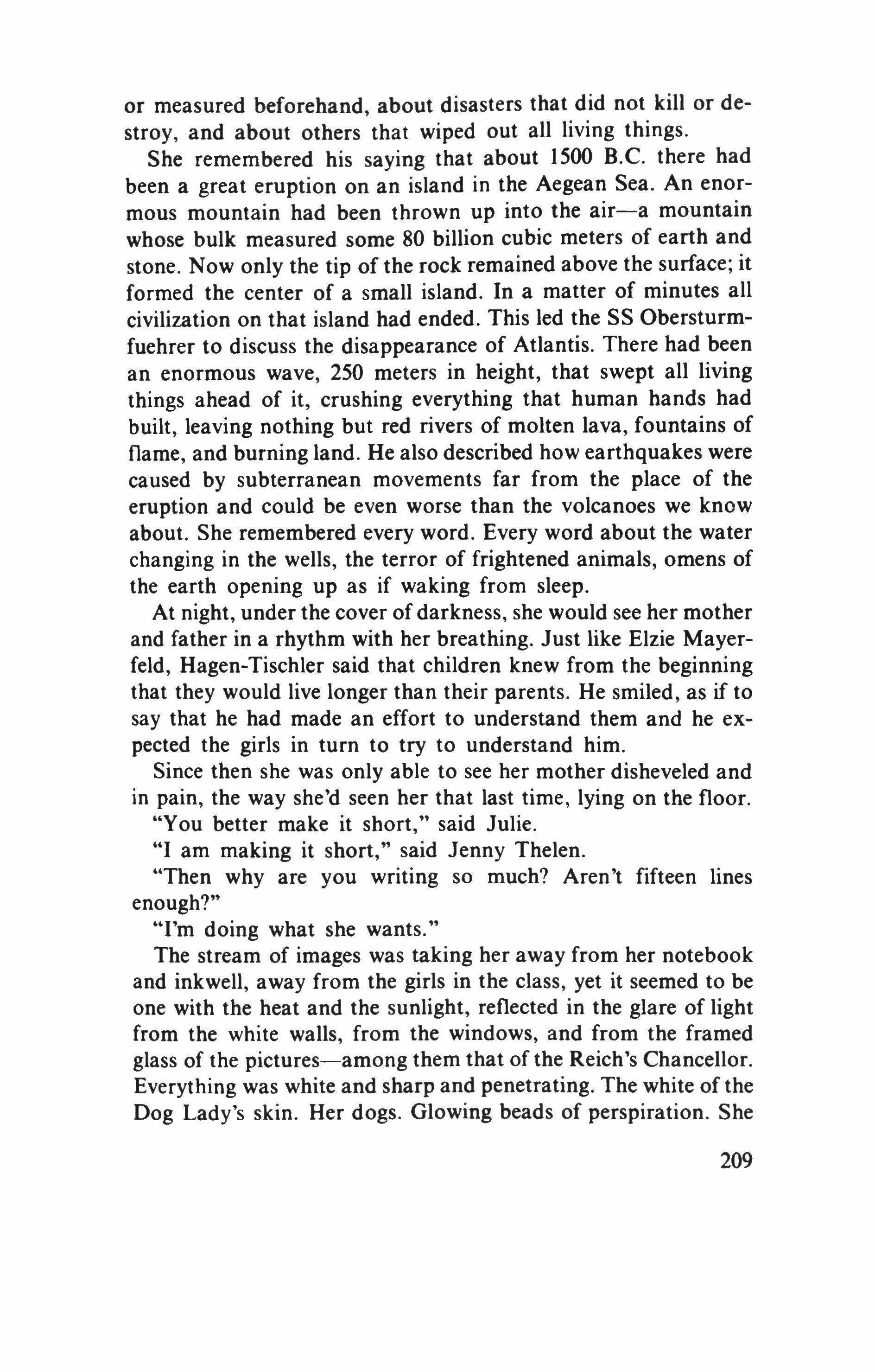
or measured beforehand, about disasters that did not kill or destroy, and about others that wiped out all living things.
She remembered his saying that about 1500 B.C. there had been a great eruption on an island in the Aegean Sea. An enormous mountain had been thrown up into the air-a mountain whose bulk measured some 80 billion cubic meters of earth and stone. Now only the tip of the rock remained above the surface; it formed the center of a small island. In a matter of minutes all civilization on that island had ended. This led the SS Obersturmfuehrer to discuss the disappearance of Atlantis. There had been an enormous wave, 250 meters in height, that swept all living things ahead of it, crushing everything that human hands had built, leaving nothing but red rivers of molten lava, fountains of flame, and burning land. He also described how earthquakes were caused by subterranean movements far from the place of the eruption and could be even worse than the volcanoes we know about. She remembered every word. Every word about the water changing in the wells, the terror of frightened animals, omens of the earth opening up as if waking from sleep.
At night, under the cover of darkness, she would see her mother and father in a rhythm with her breathing. Just like Elzie Mayerfeld, Hagen-Tischler said that children knew from the beginning that they would live longer than their parents. He smiled, as if to say that he had made an effort to understand them and he expected the girls in turn to try to understand him.
Since then she was only able to see her mother disheveled and in pain, the way she'd seen her that last time, lying on the floor.
"You better make it short," said Julie.
"I am making it short," said Jenny Thelen.
"Then why are you writing so much? Aren't fifteen lines enough?"
"I'm doing what she wants."
The stream of images was taking her away from her notebook and inkwell, away from the girls in the class, yet it seemed to be one with the heat and the sunlight, reflected in the glare of light from the white walls, from the windows, and from the framed glass of the pictures-among them that of the Reich's Chancellor. Everything was white and sharp and penetrating. The white of the Dog Lady's skin. Her dogs. Glowing beads of perspiration. She
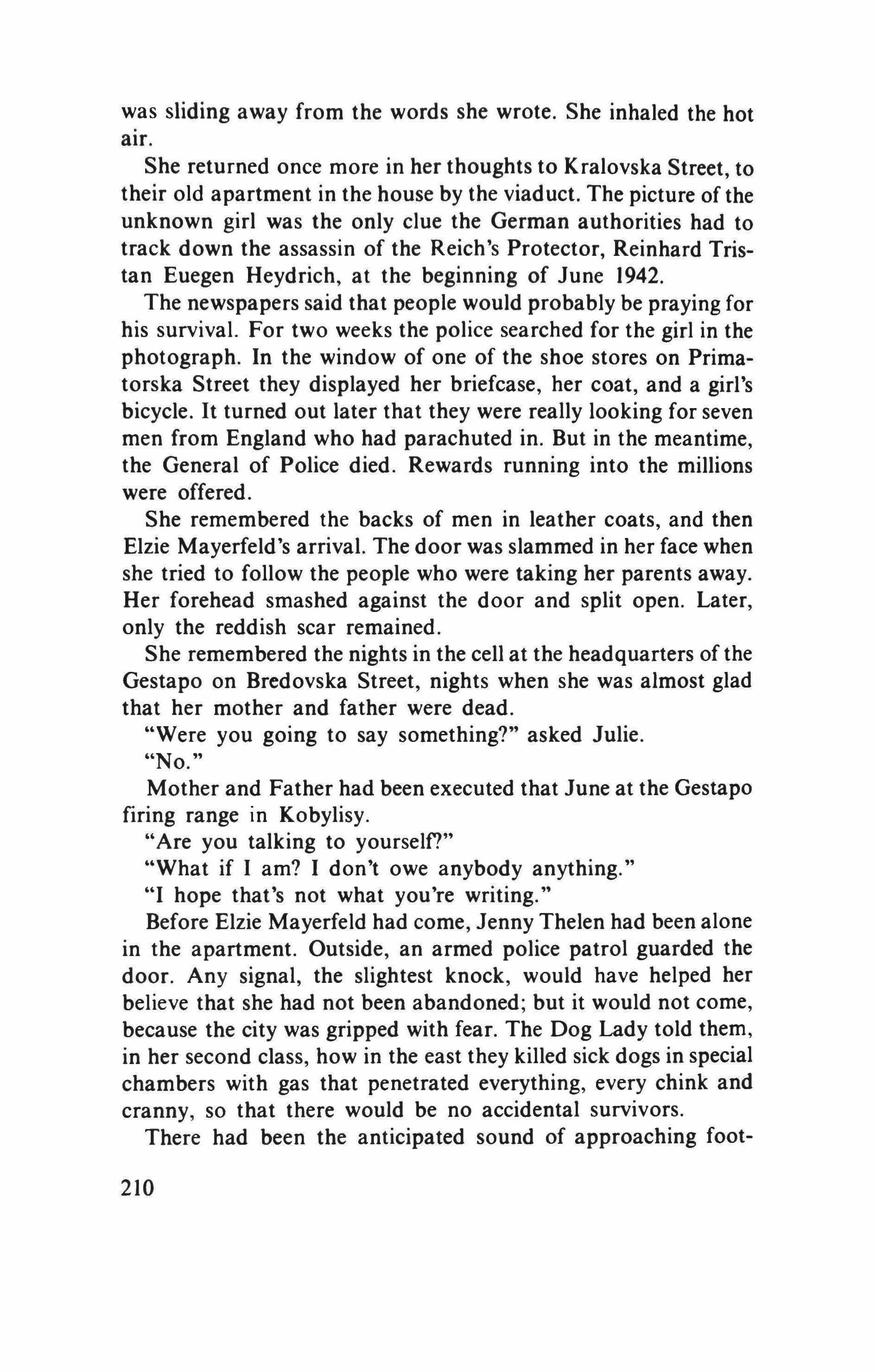
was sliding away from the words she wrote. She inhaled the hot air.
She returned once more in her thoughts to Kralovska Street, to their old apartment in the house by the viaduct. The picture of the unknown girl was the only clue the German authorities had to track down the assassin of the Reich's Protector, Reinhard Tristan Euegen Heydrich, at the beginning of June 1942.
The newspapers said that people would probably be praying for his survival. For two weeks the police searched for the girl in the photograph. In the window of one of the shoe stores on Primatorska Street they displayed her briefcase, her coat, and a girl's bicycle. It turned out later that they were really looking for seven men from England who had parachuted in. But in the meantime, the General of Police died. Rewards running into the millions were offered.
She remembered the backs of men in leather coats, and then Elzie Mayerfeld's arrival. The door was slammed in her face when she tried to follow the people who were taking her parents away. Her forehead smashed against the door and split open. Later, only the reddish scar remained.
She remembered the nights in the cell at the headquarters of the Gestapo on Bredovska Street, nights when she was almost glad that her mother and father were dead.
"Were you going to say something?" asked Julie. "No."
Mother and Father had been executed that June at the Gestapo firing range in Kobylisy.
"Are you talking to yourself?"
"What if 1 am? I don't owe anybody anything."
"I hope that's not what you're writing."
Before Elzie Mayerfeld had come, Jenny Thelen had been alone in the apartment. Outside, an armed police patrol guarded the door. Any signal, the slightest knock, would have helped her believe that she had not been abandoned; but it would not come, because the city was gripped with fear. The Dog Lady told them, in her second class, how in the east they killed sick dogs in special chambers with gas that penetrated everything, every chink and cranny, so that there would be no accidental survivors.
There had been the anticipated sound of approaching foot210
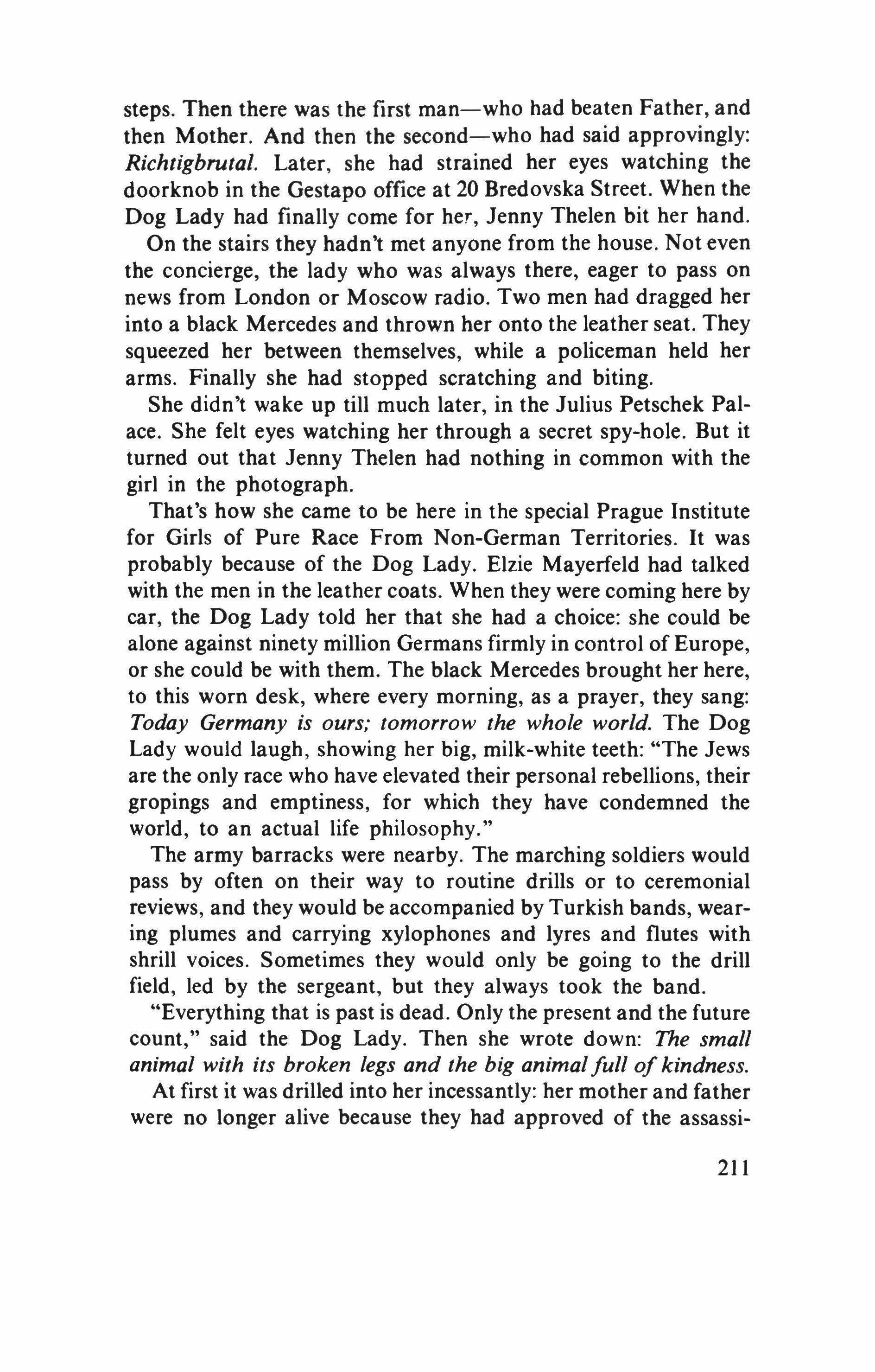
steps. Then there was the first man-who had beaten Father, and then Mother. And then the second-who had said approvingly: Richtigbrutal. Later, she had strained her eyes watching the doorknob in the Gestapo office at 20 Bredovska Street. When the Dog Lady had finally come for her, Jenny Thelen bit her hand.
On the stairs they hadn't met anyone from the house. Not even the concierge, the lady who was always there, eager to pass on news from London or Moscow radio. Two men had dragged her into a black Mercedes and thrown her onto the leather seat. They squeezed her between themselves, while a policeman held her arms. Finally she had stopped scratching and biting.
She didn't wake up till much later, in the Julius Petschek Palace. She felt eyes watching her through a secret spy-hole. But it turned out that Jenny Thelen had nothing in common with the girl in the photograph.
That's how she came to be here in the special Prague Institute for Girls of Pure Race From Non-German Territories. It was probably because of the Dog Lady. Elzie Mayerfeld had talked with the men in the leather coats. When they were coming here by car, the Dog Lady told her that she had a choice: she could be alone against ninety million Germans firmly in control of Europe, or she could be with them. The black Mercedes brought her here, to this worn desk, where every morning, as a prayer, they sang: Today Germany is ours; tomorrow the whole world. The Dog Lady would laugh, showing her big, milk-white teeth: "The Jews are the only race who have elevated their personal rebellions, their gropings and emptiness, for which they have condemned the world, to an actual life philosophy."
The army barracks were nearby. The marching soldiers would pass by often on their way to routine drills or to ceremonial reviews, and they would be accompanied by Turkish bands, wearing plumes and carrying xylophones and lyres and flutes with shrill voices. Sometimes they would only be going to the drill field, led by the sergeant, but they always took the band.
"Everything that is past is dead. Only the present and the future count," said the Dog Lady. Then she wrote down: The small animal with its broken legs and the big animalfull of kindness.
At first it was drilled into her incessantly: her mother and father were no longer alive because they had approved of the assassi211
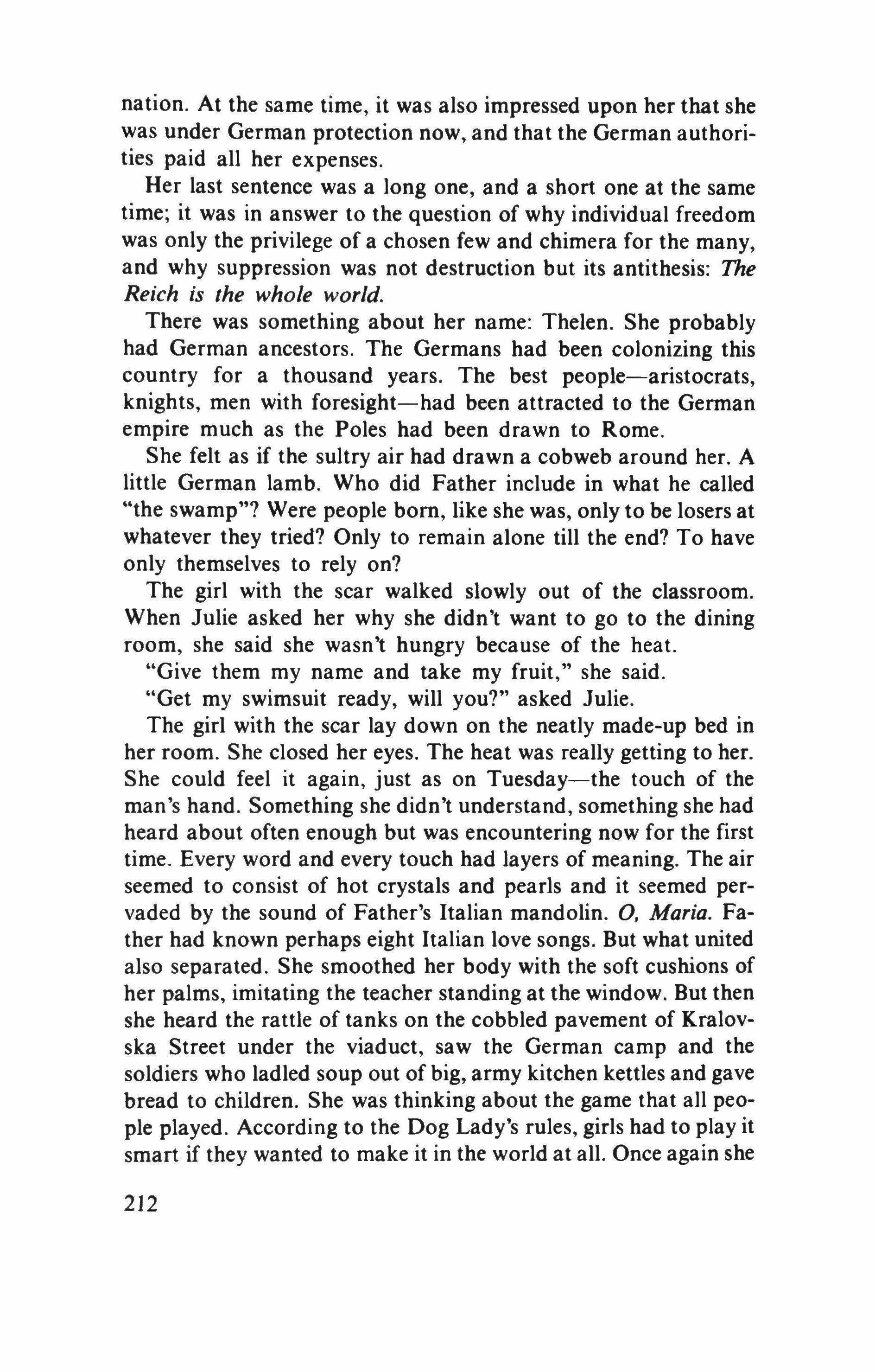
nation. At the same time, it was also impressed upon her that she was under German protection now, and that the German authorities paid all her expenses.
Her last sentence was a long one, and a short one at the same time; it was in answer to the question of why individual freedom was only the privilege of a chosen few and chimera for the many, and why suppression was not destruction but its antithesis: The Reich is the whole world.
There was something about her name: Thelen. She probably had German ancestors. The Germans had been colonizing this country for a thousand years. The best people-aristocrats, knights, men with foresight-had been attracted to the German empire much as the Poles had been drawn to Rome.
She felt as if the sultry air had drawn a cobweb around her. A little German lamb. Who did Father include in what he called "the swamp"? Were people born, like she was, only to be losers at whatever they tried? Only to remain alone till the end? To have only themselves to rely on?
The girl with the scar walked slowly out of the classroom. When Julie asked her why she didn't want to go to the dining room, she said she wasn't hungry because of the heat.
"Give them my name and take my fruit," she said.
"Get my swimsuit ready, will you?" asked Julie.
The girl with the scar lay down on the neatly made-up bed in her room. She closed her eyes. The heat was really getting to her. She could feel it again, just as on Tuesday-the touch of the man's hand. Something she didn't understand, something she had heard about often enough but was encountering now for the first time. Every word and every touch had layers of meaning. The air seemed to consist of hot crystals and pearls and it seemed pervaded by the sound of Father's Italian mandolin. 0, Maria. Father had known perhaps eight Italian love songs. But what united also separated. She smoothed her body with the soft cushions of her palms, imitating the teacher standing at the window. But then she heard the rattle of tanks on the cobbled pavement of Kralovska Street under the viaduct, saw the German camp and the soldiers who ladled soup out of big, army kitchen kettles and gave bread to children. She was thinking about the game that all people played. According to the Dog Lady's rules, girls had to play it smart if they wanted to make it in the world at all. Once again she
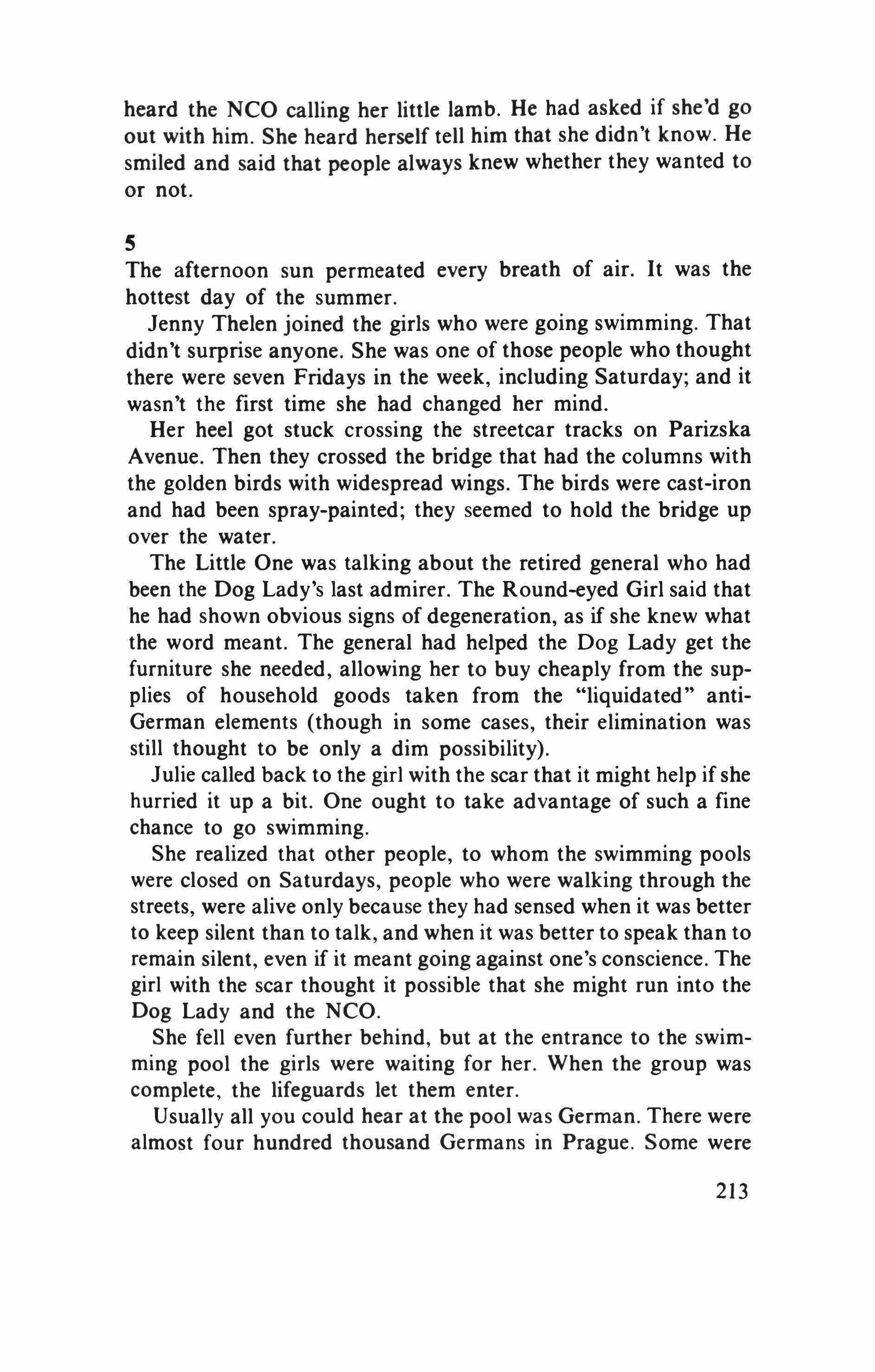
heard the NCO calling her little lamb. He had asked if she'd go out with him. She heard herself tell him that she didn't know. He smiled and said that people always knew whether they wanted to or not.
5
The afternoon sun permeated every breath of air. It was the hottest day of the summer.
Jenny Thelen joined the girls who were going swimming. That didn't surprise anyone. She was one of those people who thought there were seven Fridays in the week, including Saturday; and it wasn't the first time she had changed her mind.
Her heel got stuck crossing the streetcar tracks on Parizska Avenue. Then they crossed the bridge that had the columns with the golden birds with widespread wings. The birds were cast-iron and had been spray-painted; they seemed to hold the bridge up over the water.
The Little One was talking about the retired general who had been the Dog Lady's last admirer. The Round-eyed Girl said that he had shown obvious signs of degeneration, as if she knew what the word meant. The general had helped the Dog Lady get the furniture she needed, allowing her to buy cheaply from the supplies of household goods taken from the "liquidated" antiGerman elements (though in some cases, their elimination was still thought to be only a dim possibility).
Julie called back to the girl with the scar that it might help if she hurried it up a bit. One ought to take advantage of such a fine chance to go swimming.
She realized that other people, to whom the swimming pools were closed on Saturdays, people who were walking through the streets, were alive only because they had sensed when it was better to keep silent than to talk, and when it was better to speak than to remain silent, even if it meant going against one's conscience. The girl with the scar thought it possible that she might run into the Dog Lady and the NCO.
She fell even further behind, but at the entrance to the swimming pool the girls were waiting for her. When the group was complete, the lifeguards let them enter.
Usually all you could hear at the pool was German. There were almost four hundred thousand Germans in Prague. Some were
213
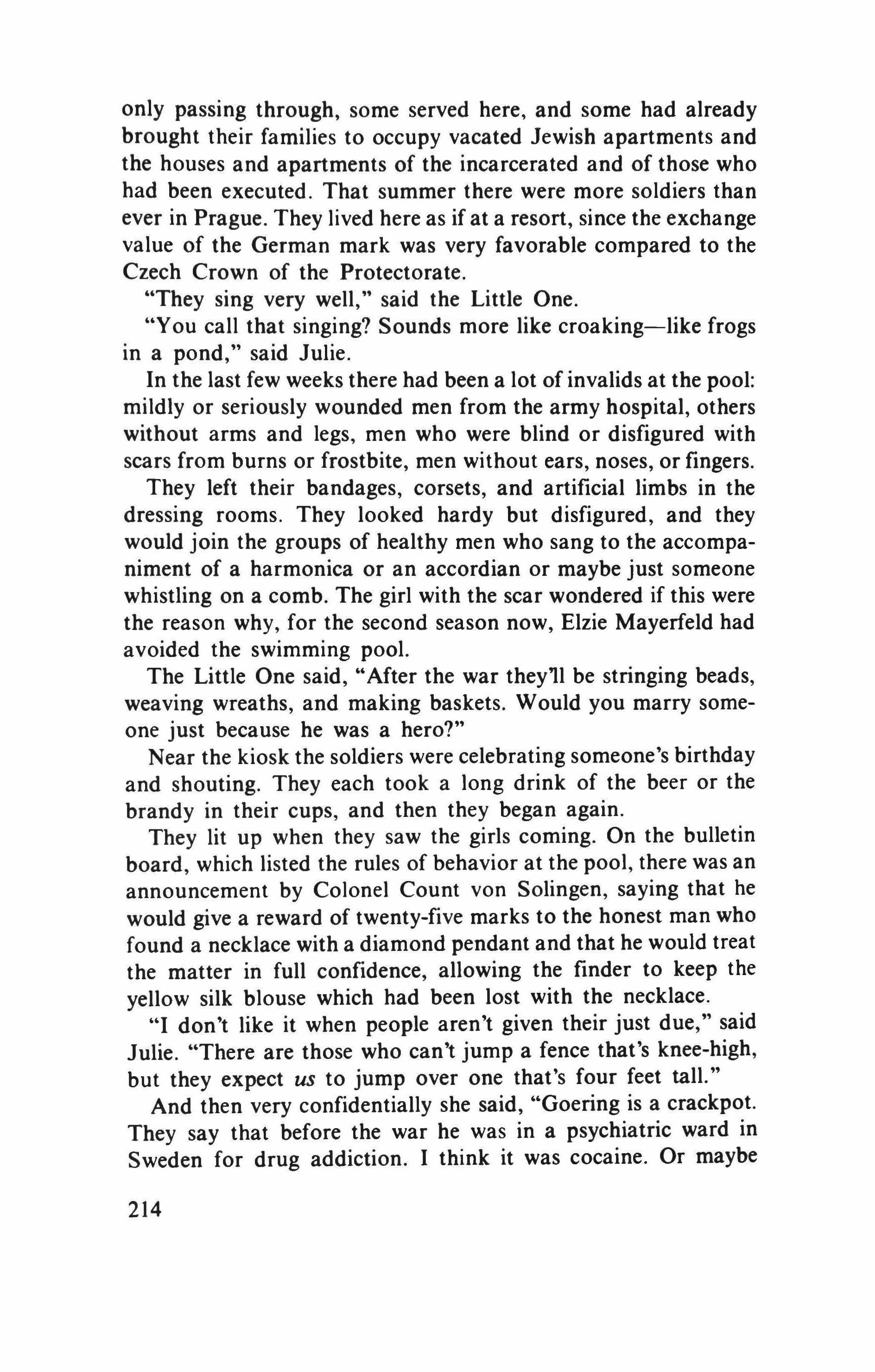
only passing through, some served here, and some had already brought their families to occupy vacated Jewish apartments and the houses and apartments of the incarcerated and of those who had been executed. That summer there were more soldiers than ever in Prague. They lived here as if at a resort, since the exchange value of the German mark was very favorable compared to the Czech Crown of the Protectorate.
"They sing very well," said the Little One.
"You call that singing? Sounds more like croaking-like frogs in a pond," said Julie.
In the last few weeks there had been a lot of invalids at the pool: mildly or seriously wounded men from the army hospital, others without arms and legs, men who were blind or disfigured with scars from burns or frostbite, men without ears, noses, or fingers.
They left their bandages, corsets, and artificial limbs in the dressing rooms. They looked hardy but disfigured, and they would join the groups of healthy men who sang to the accompaniment of a harmonica or an accordian or maybe just someone whistling on a comb. The girl with the scar wondered if this were the reason why, for the second season now, Elzie Mayerfeld had avoided the swimming pool.
The Little One said, "After the war they'll be stringing beads, weaving wreaths, and making baskets. Would you marry someone just because he was a hero?"
Near the kiosk the soldiers were celebrating someone's birthday and shouting. They each took a long drink of the beer or the brandy in their cups, and then they began again.
They lit up when they saw the girls coming. On the bulletin board, which listed the rules of behavior at the pool, there was an announcement by Colonel Count von Solingen, saying that he would give a reward of twenty-five marks to the honest man who found a necklace with a diamond pendant and that he would treat the matter in full confidence, allowing the finder to keep the yellow silk blouse which had been lost with the necklace.
"I don't like it when people aren't given their just due," said Julie. "There are those who can't jump a fence that's knee-high, but they expect us to jump over one that's four feet tall."
And then very confidentially she said, "Goering is a crackpot. They say that before the war he was in a psychiatric ward in Sweden for drug addiction. I think it was cocaine. Or maybe
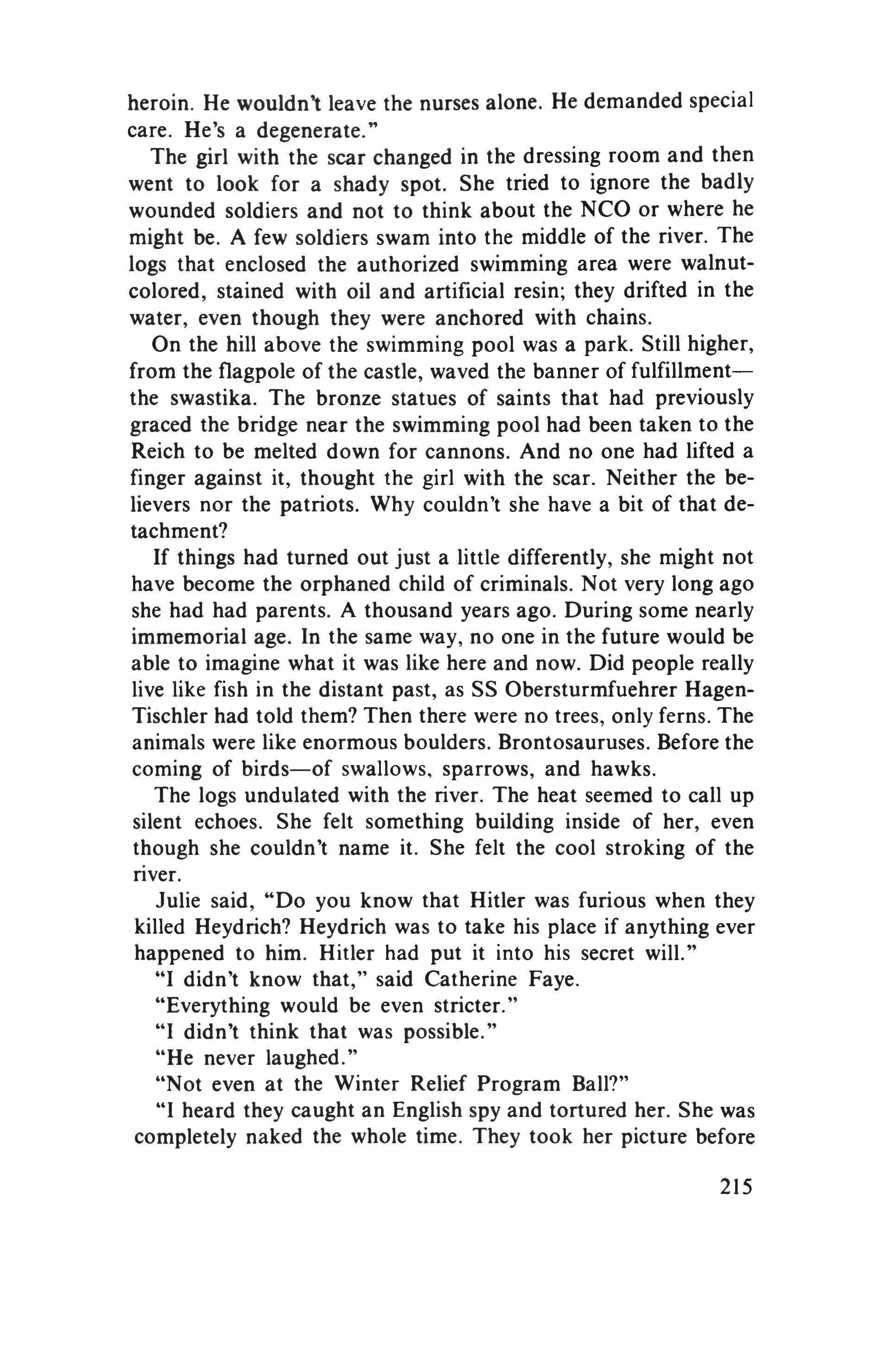
heroin. He wouldn't leave the nurses alone. He demanded special care. He's a degenerate."
The girl with the scar changed in the dressing room and then went to look for a shady spot. She tried to ignore the badly wounded soldiers and not to think about the NCO or where he might be. A few soldiers swam into the middle of the river. The logs that enclosed the authorized swimming area were walnutcolored, stained with oil and artificial resin; they drifted in the water, even though they were anchored with chains.
On the hill above the swimming pool was a park. Still higher, from the flagpole of the castle, waved the banner of fulfillmentthe swastika. The bronze statues of saints that had previously graced the bridge near the swimming pool had been taken to the Reich to be melted down for cannons. And no one had lifted a finger against it, thought the girl with the scar. Neither the believers nor the patriots. Why couldn't she have a bit of that detachment?
If things had turned out just a little differently, she might not have become the orphaned child of criminals. Not very long ago she had had parents. A thousand years ago. During some nearly immemorial age. In the same way, no one in the future would be able to imagine what it was like here and now. Did people really live like fish in the distant past, as SS Obersturmfuehrer HagenTischler had told them? Then there were no trees, only ferns. The animals were like enormous boulders. Brontosauruses. Before the coming of birds-of swallows, sparrows, and hawks.
The logs undulated with the river. The heat seemed to call up silent echoes. She felt something building inside of her, even though she couldn't name it. She felt the cool stroking of the nver.
Julie said, "Do you know that Hitler was furious when they killed Heydrich? Heydrich was to take his place if anything ever happened to him. Hitler had put it into his secret will."
"I didn't know that," said Catherine Faye.
"Everything would be even stricter."
"I didn't think that was possible."
"He never laughed."
"Not even at the Winter Relief Program Ball?"
"I heard they caught an English spy and tortured her. She was completely naked the whole time. They took her picture before
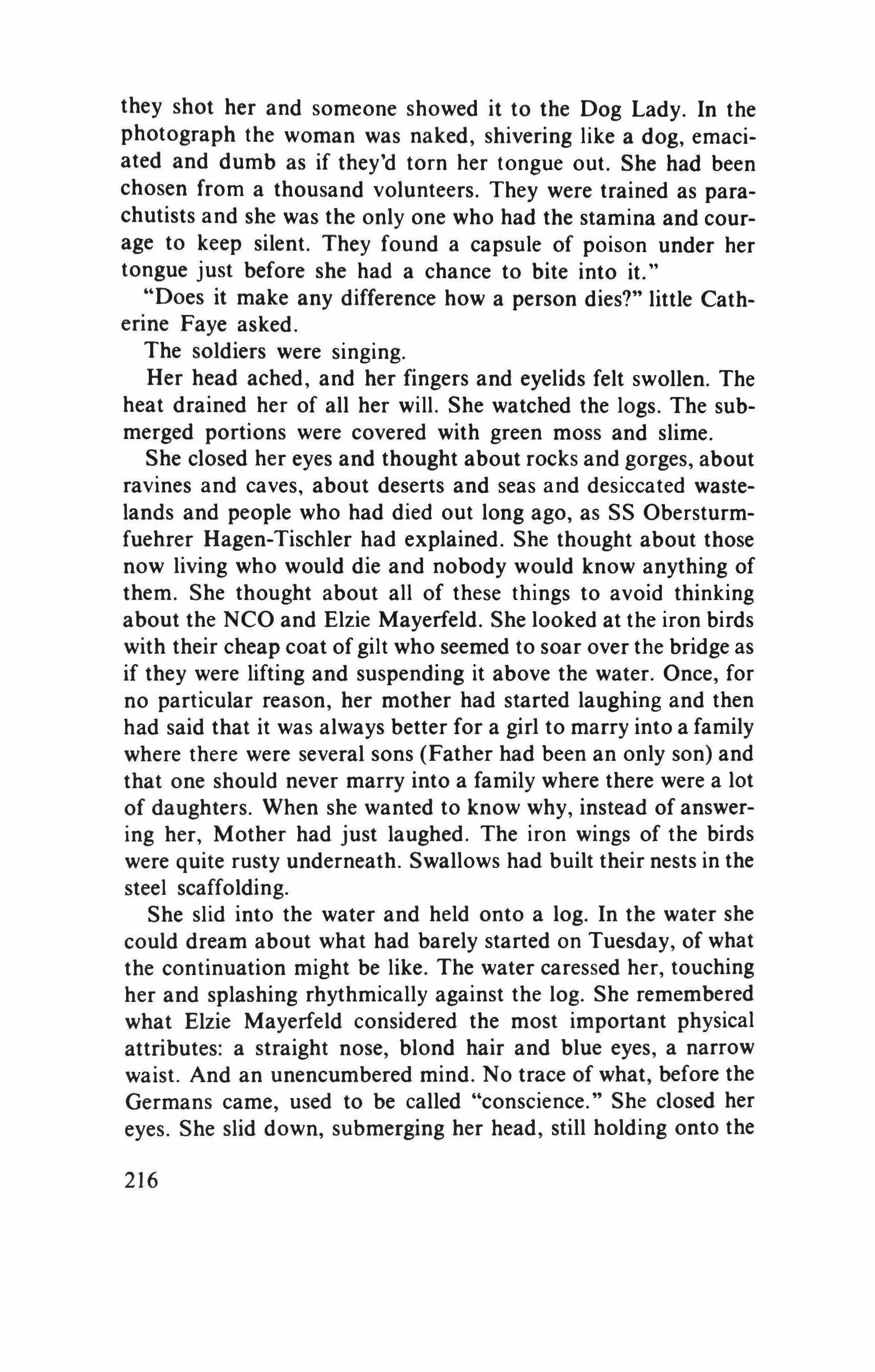
they shot her and someone showed it to the Dog Lady. In the photograph the woman was naked, shivering like a dog, emaciated and dumb as if they'd torn her tongue out. She had been chosen from a thousand volunteers. They were trained as parachutists and she was the only one who had the stamina and courage to keep silent. They found a capsule of poison under her tongue just before she had a chance to bite into it."
"Does it make any difference how a person dies?" little Catherine Faye asked.
The soldiers were singing.
Her head ached, and her fingers and eyelids felt swollen. The heat drained her of all her will. She watched the logs. The submerged portions were covered with green moss and slime.
She closed her eyes and thought about rocks and gorges, about ravines and caves, about deserts and seas and desiccated wastelands and people who had died out long ago, as SS Obersturmfuehrer Hagen-Tischler had explained. She thought about those now living who would die and nobody would know anything of them. She thought about all of these things to avoid thinking about the NCO and Elzie Mayerfeld. She looked at the iron birds with their cheap coat of gilt who seemed to soar over the bridge as if they were lifting and suspending it above the water. Once, for no particular reason, her mother had started laughing and then had said that it was always better for a girl to marry into a family where there were several sons (Father had been an only son) and that one should never marry into a family where there were a lot of daughters. When she wanted to know why, instead of answering her, Mother had just laughed. The iron wings of the birds were quite rusty underneath. Swallows had built their nests in the steel scaffolding.
She slid into the water and held onto a log. In the water she could dream about what had barely started on Tuesday, of what the continuation might be like. The water caressed her, touching her and splashing rhythmically against the log. She remembered what Elzie Mayerfeld considered the most important physical attributes: a straight nose, blond hair and blue eyes, a narrow waist. And an unencumbered mind. No trace of what, before the Germans came, used to be called "conscience." She closed her eyes. She slid down, submerging her head, still holding onto the
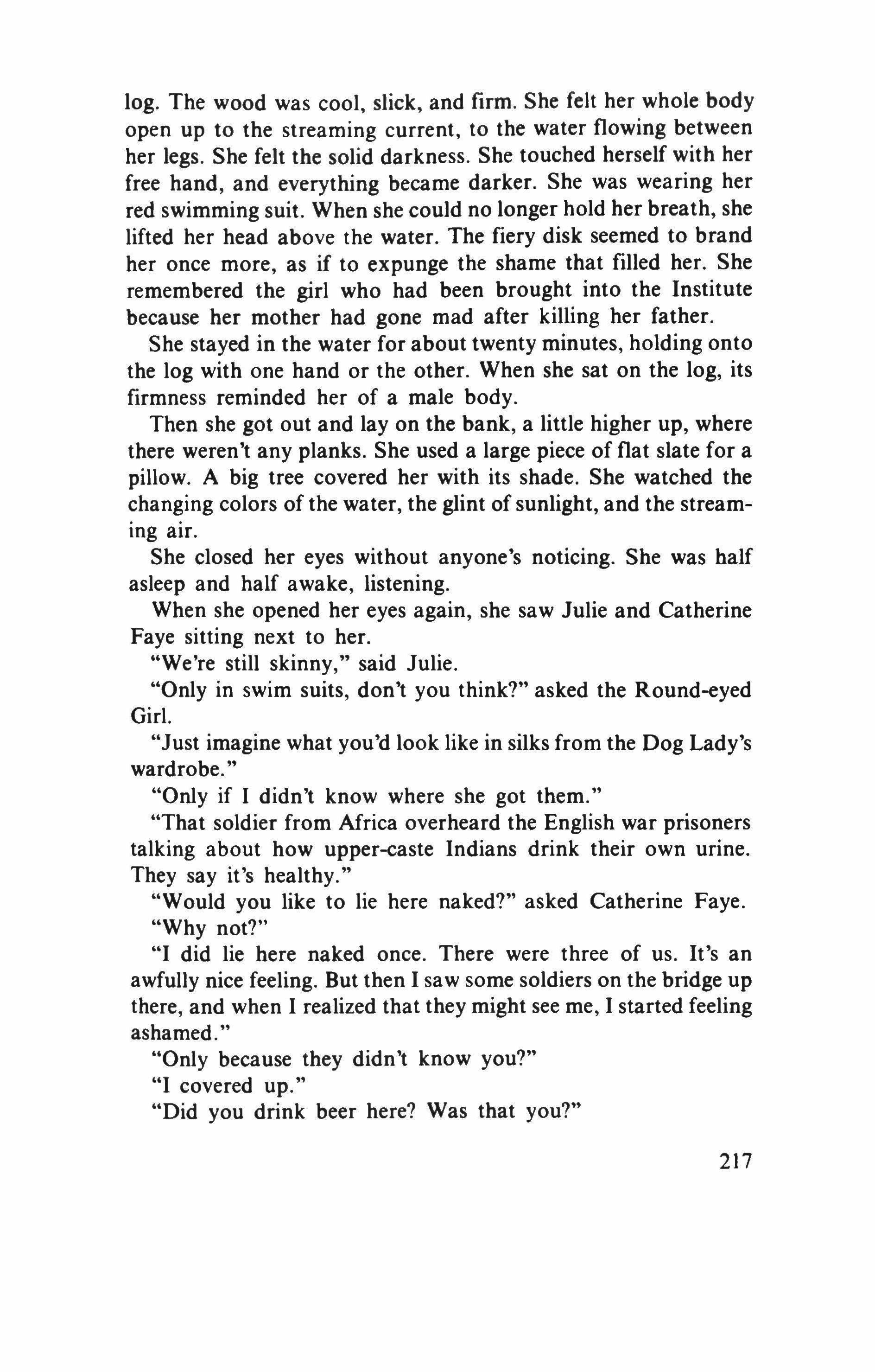
log. The wood was cool, slick, and firm. She felt her whole body open up to the streaming current, to the water flowing between her legs. She felt the solid darkness. She touched herself with her free hand, and everything became darker. She was wearing her red swimming suit. When she could no longer hold her breath, she lifted her head above the water. The fiery disk seemed to brand her once more, as if to expunge the shame that filled her. She remembered the girl who had been brought into the Institute because her mother had gone mad after killing her father.
She stayed in the water for about twenty minutes, holding onto the log with one hand or the other. When she sat on the log, its firmness reminded her of a male body.
Then she got out and lay on the bank, a little higher up, where there weren't any planks. She used a large piece of flat slate for a pillow. A big tree covered her with its shade. She watched the changing colors of the water, the glint of sunlight, and the streaming air.
She closed her eyes without anyone's noticing. She was half asleep and half awake, listening.
When she opened her eyes again, she saw Julie and Catherine Faye sitting next to her.
"We're still skinny," said Julie.
"Only in swim suits, don't you think?" asked the Round-eyed Girl.
"Just imagine what you'd look like in silks from the Dog Lady's wardrobe.
"Only if I didn't know where she got them."
"That soldier from Africa overheard the English war prisoners talking about how upper-caste Indians drink their own urine. They say it's healthy."
"Would you like to lie here naked?" asked Catherine Faye.
"Why not?"
"I did lie here naked once. There were three of us. It's an awfully nice feeling. But then I saw some soldiers on the bridge up there, and when I realized that they might see me, I started feeling ashamed."
"Only because they didn't know you?"
"I covered up."
"Did you drink beer here? Was that you?"
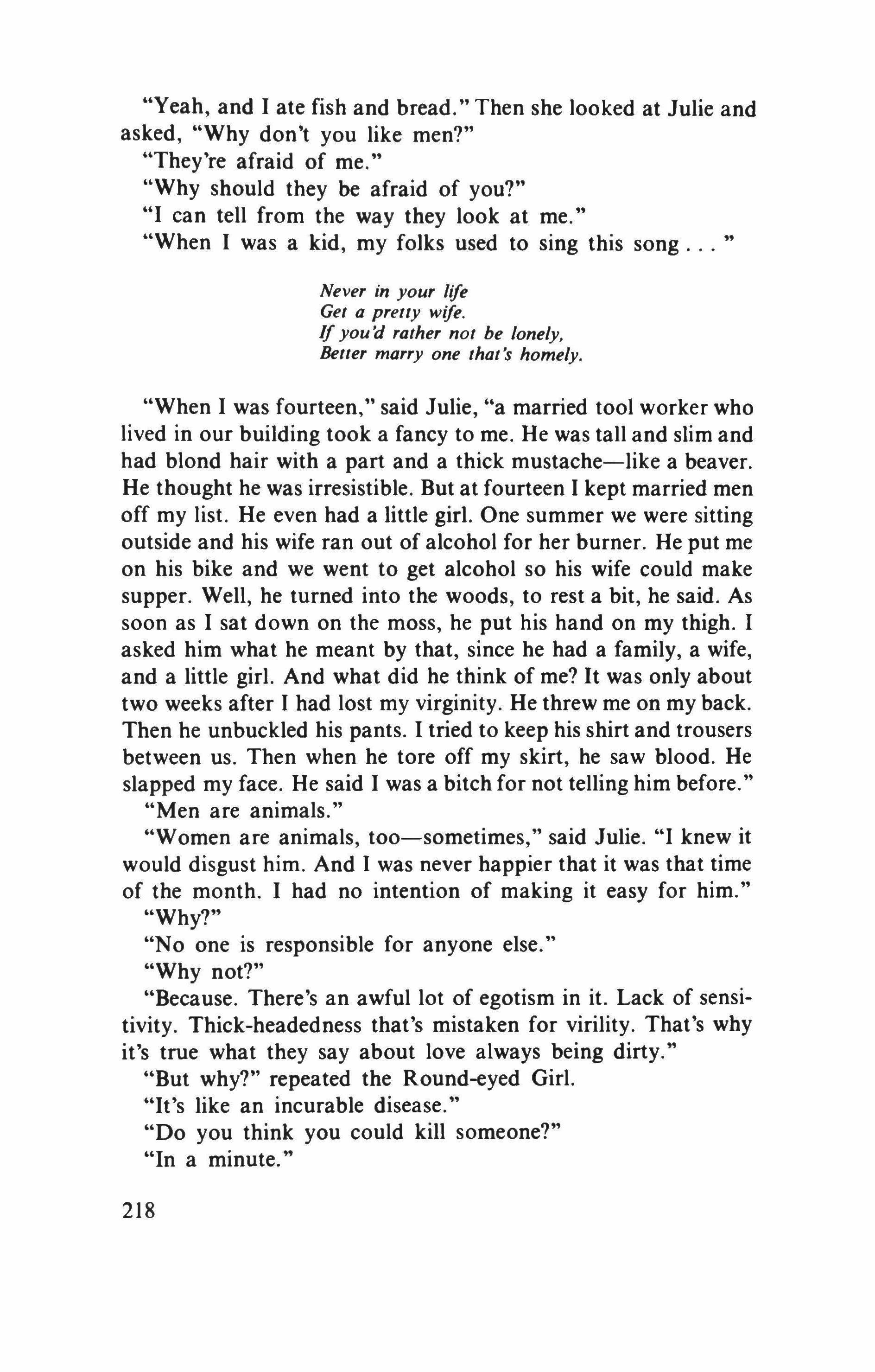
"Yeah, and I ate fish and bread." Then she looked at Julie and asked, "Why don't you like men?"
"They're afraid of me."
"Why should they be afraid of you?"
"I can tell from the way they look at me."
"When I was a kid, my folks used to sing this song
Never in your life
Get a pretty wife. lf you'd rather not be lonely, Better marry one that's homely.
"When I was fourteen," said JUlie, "a married tool worker who lived in our building took a fancy to me. He was tall and slim and had blond hair with a part and a thick mustache-like a beaver. He thought he was irresistible. But at fourteen I kept married men off my list. He even had a little girl. One summer we were sitting outside and his wife ran out of alcohol for her burner. He put me on his bike and we went to get alcohol so his wife could make supper. Well, he turned into the woods, to rest a bit, he said. As soon as I sat down on the moss, he put his hand on my thigh. I asked him what he meant by that, since he had a family, a wife, and a little girl. And what did he think of me? It was only about two weeks after I had lost my virginity. He threw me on my back. Then he unbuckled his pants. I tried to keep his shirt and trousers between us. Then when he tore off my skirt, he saw blood. He slapped my face. He said I was a bitch for not telling him before."
"Men are animals."
"Women are animals, too-sometimes," said Julie. "I knew it would disgust him. And I was never happier that it was that time of the month. I had no intention of making it easy for him."
"Why?"
"N0 one is responsible for anyone else."
"Why not?"
"Because. There's an awful lot of egotism in it. Lack of sensitivity. Thick-headedness that's mistaken for virility. That's why it's true what they say about love always being dirty."
"But why?" repeated the Round-eyed Girl.
"It's like an incurable disease."
"Do you think you could kill someone?"
"In a minute."
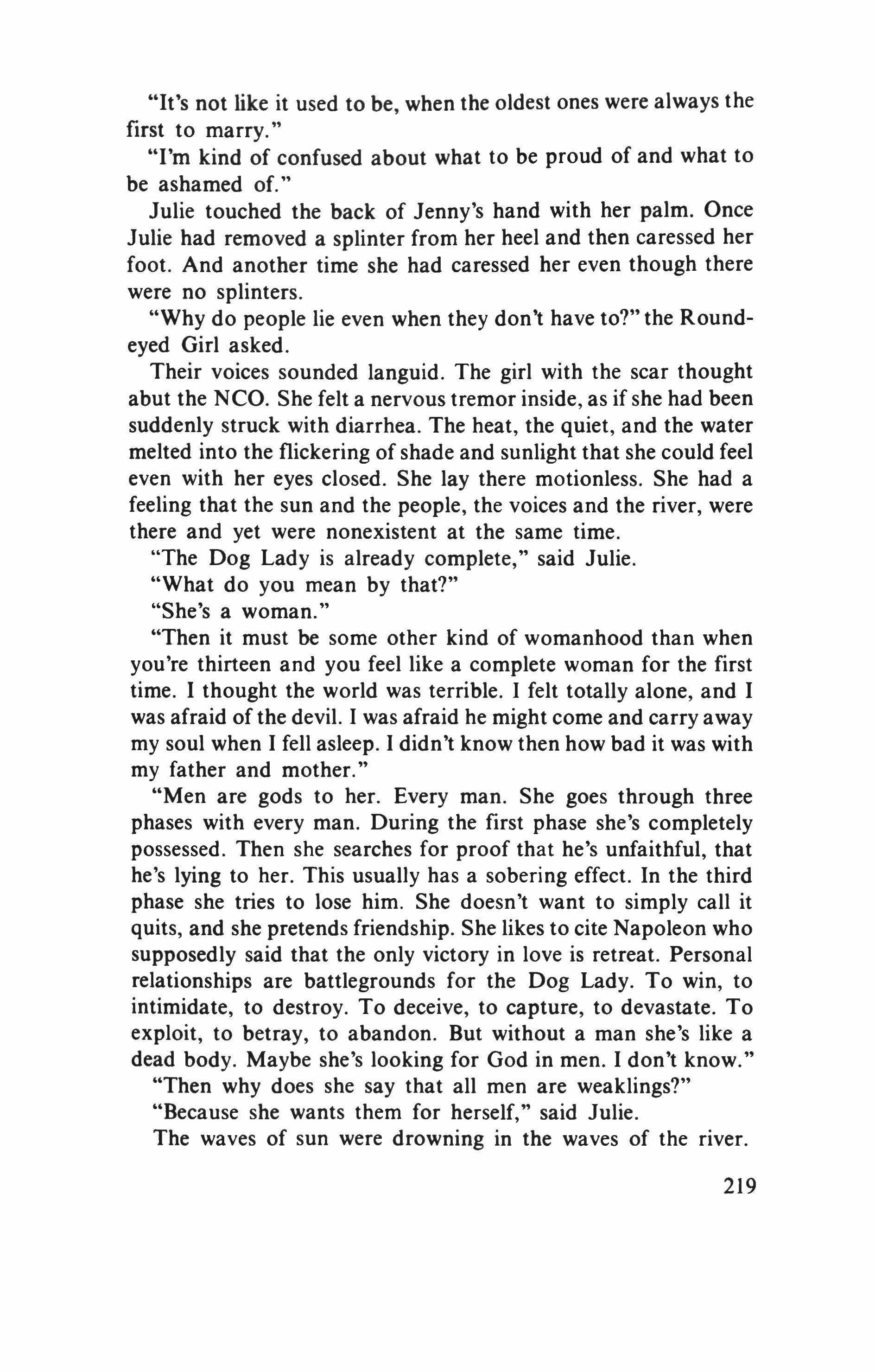
"It's not like it used to be, when the oldest ones were always the first to marry."
"I'm kind of confused about what to be proud of and what to be ashamed of."
Julie touched the back of Jenny's hand with her palm. Once Julie had removed a splinter from her heel and then caressed her foot. And another time she had caressed her even though there were no splinters.
"Why do people lie even when they don't have to?" the Roundeyed Girl asked.
Their voices sounded languid. The girl with the scar thought abut the NCO. She felt a nervous tremor inside, as if she had been suddenly struck with diarrhea. The heat, the quiet, and the water melted into the flickering of shade and sunlight that she could feel even with her eyes closed. She lay there motionless. She had a feeling that the sun and the people, the voices and the river, were there and yet were nonexistent at the same time.
"The Dog Lady is already complete," said Julie.
"What do you mean by that?"
"She's a woman."
"Then it must be some other kind of womanhood than when you're thirteen and you feel like a complete woman for the first time. I thought the world was terrible. I felt totally alone, and I was afraid of the devil. I was afraid he might come and carry away my soul when I fell asleep. I didn't know then how bad it was with my father and mother."
"Men are gods to her. Every man. She goes through three phases with every man. During the first phase she's completely possessed. Then she searches for proof that he's unfaithful, that he's lying to her. This usually has a sobering effect. In the third phase she tries to lose him. She doesn't want to simply call it quits, and she pretends friendship. She likes to cite Napoleon who supposedly said that the only victory in love is retreat. Personal relationships are battlegrounds for the Dog Lady. To win, to intimidate, to destroy. To deceive, to capture, to devastate. To exploit, to betray, to abandon. But without a man she's like a dead body. Maybe she's looking for God in men. I don't know."
"Then why does she say that all men are weaklings?"
"Because she wants them for herself," said Julie.
The waves of sun were drowning in the waves of the river.
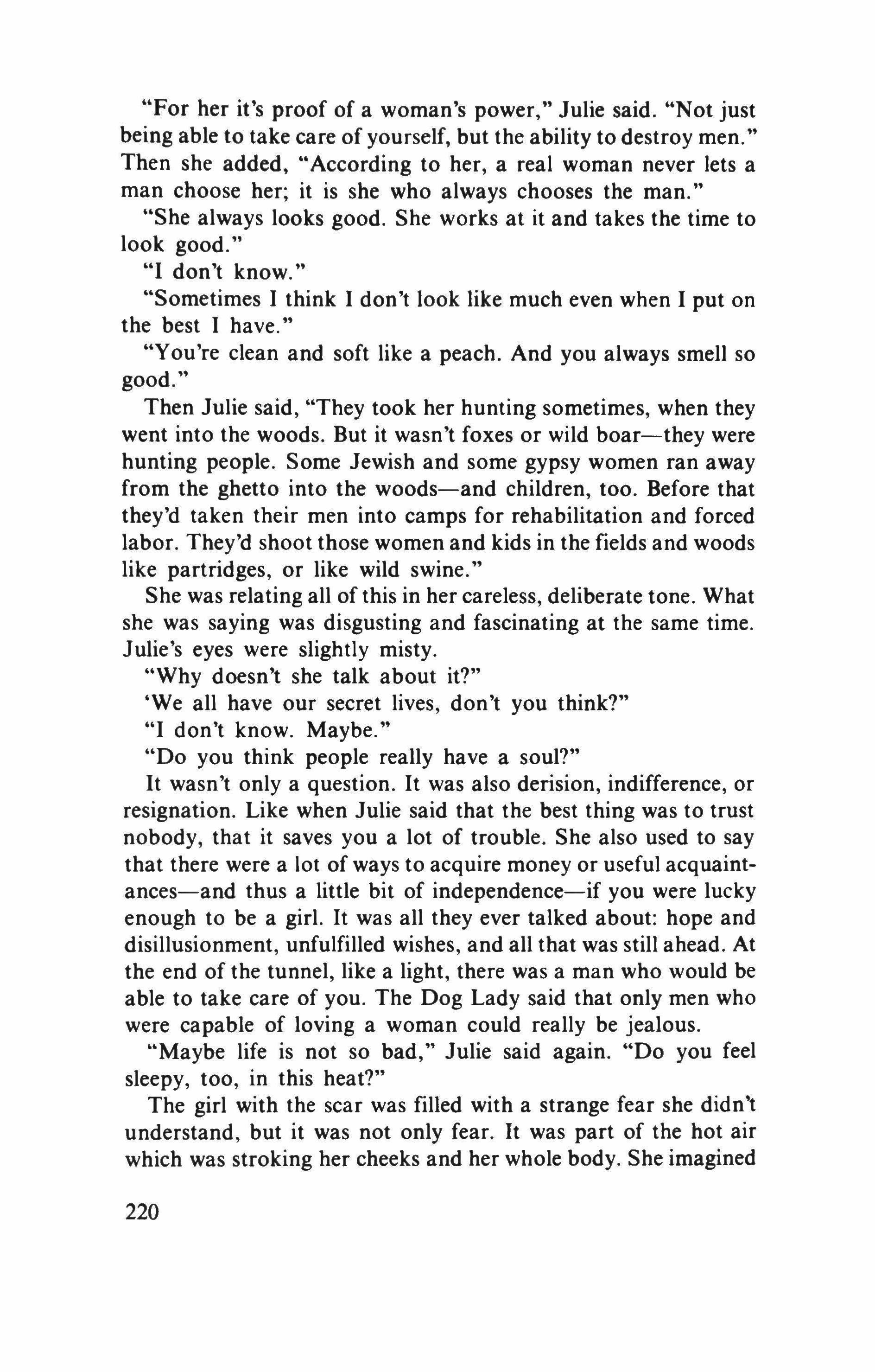
"For her it's proof of a woman's power," Julie said. "Not just being able to take care of yourself, but the ability to destroy men." Then she added, "According to her, a real woman never lets a man choose her; it is she who always chooses the man."
"She always looks good. She works at it and takes the time to look good."
"I don't know."
"Sometimes 1 think 1 don't look like much even when 1 put on the best 1 have."
"You're clean and soft like a peach. And you always smell so good."
Then Julie said, "They took her hunting sometimes, when they went into the woods. But it wasn't foxes or wild boar-they were hunting people. Some Jewish and some gypsy women ran away from the ghetto into the woods-and children, too. Before that they'd taken their men into camps for rehabilitation and forced labor. They'd shoot those women and kids in the fields and woods like partridges, or like wild swine."
She was relating all of this in her careless, deliberate tone. What she was saying was disgusting and fascinating at the same time. Julie's eyes were slightly misty.
"Why doesn't she talk about it?"
'We all have our secret lives, don't you think?"
"I don't know. Maybe."
"Do you think people really have a soul?"
It wasn't only a question. It was also derision, indifference, or resignation. Like when Julie said that the best thing was to trust nobody, that it saves you a lot of trouble. She also used to say that there were a lot of ways to acquire money or useful acquaintances-and thus a little bit of independence-if you were lucky enough to be a girl. It was all they ever talked about: hope and disillusionment, unfulfilled wishes, and all that was still ahead. At the end of the tunnel, like a light, there was a man who would be able to take care of you. The Dog Lady said that only men who were capable of loving a woman could really be jealous.
"Maybe life is not so bad," Julie said again. "Do you feel sleepy, too, in this heat?"
The girl with the scar was filled with a strange fear she didn't understand, but it was not only fear. It was part of the hot air which was stroking her cheeks and her whole body. She imagined
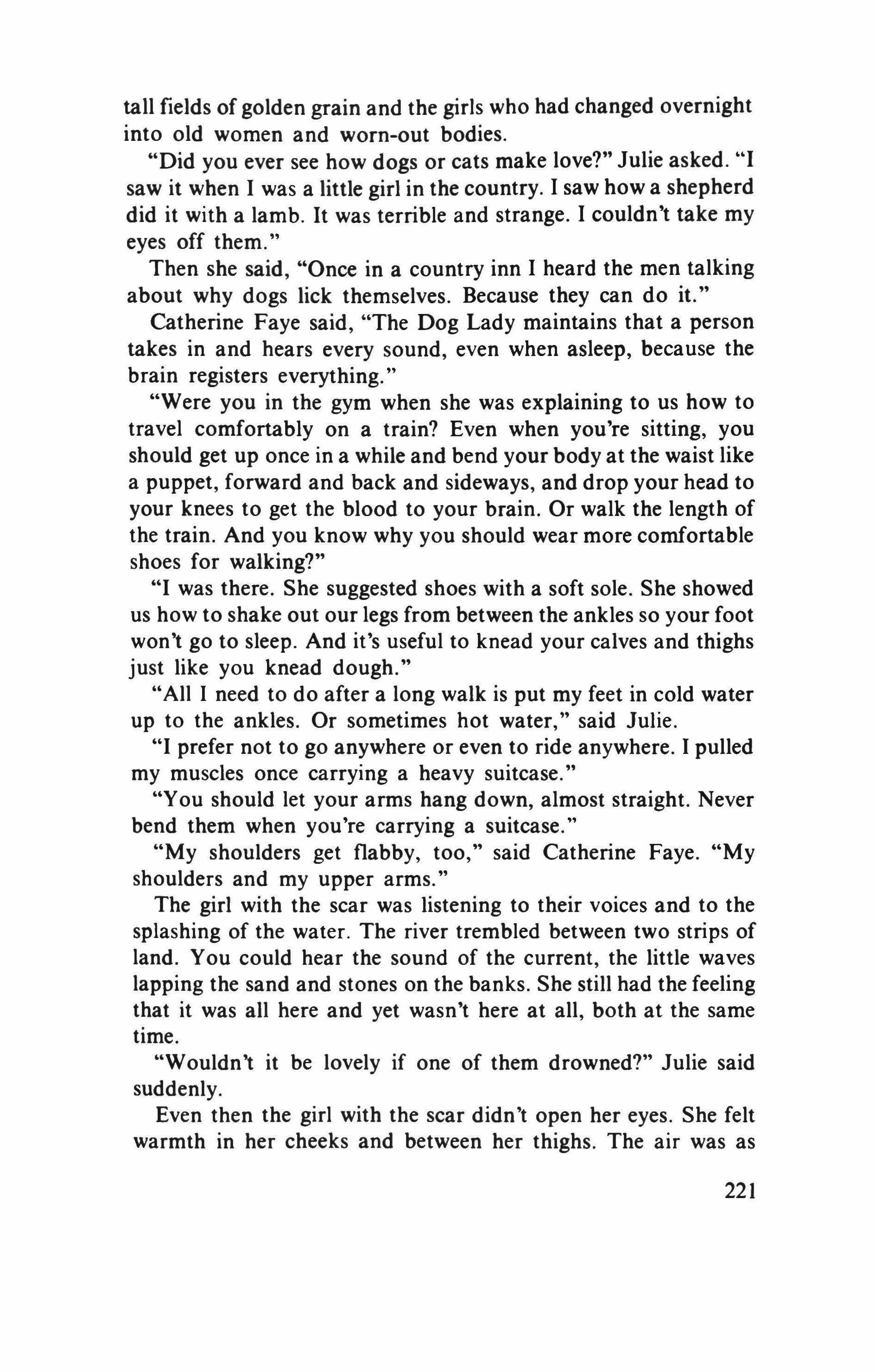
tall fields of golden grain and the girls who had changed overnight into old women and worn-out bodies.
"Did you ever see how dogs or cats make love?" Julie asked. "I saw it when I was a little girl in the country. I saw how a shepherd did it with a lamb. It was terrible and strange. I couldn't take my eyes off them."
Then she said, "Once in a country inn I heard the men talking about why dogs lick themselves. Because they can do it."
Catherine Faye said, "The Dog Lady maintains that a person takes in and hears every sound, even when asleep, because the brain registers everything."
"Were you in the gym when she was explaining to us how to travel comfortably on a train? Even when you're sitting, you should get up once in a while and bend your body at the waist like a puppet, forward and back and sideways, and drop your head to your knees to get the blood to your brain. Or walk the length of the train. And you know why you should wear more comfortable shoes for walking?"
"I was there. She suggested shoes with a soft sole. She showed us how to shake out our legs from between the ankles so your foot won't go to sleep. And it's useful to knead your calves and thighs just like you knead dough."
"All I need to do after a long walk is put my feet in cold water up to the ankles. Or sometimes hot water," said Julie.
"I prefer not to go anywhere or even to ride anywhere. I pulled my muscles once carrying a heavy suitcase."
"You should let your arms hang down, almost straight. Never bend them when you're carrying a suitcase."
"My shoulders get flabby, too," said Catherine Faye. "My shoulders and my upper arms."
The girl with the scar was listening to their voices and to the splashing of the water. The river trembled between two strips of land. You could hear the sound of the current, the little waves lapping the sand and stones on the banks. She still had the feeling that it was all here and yet wasn't here at all, both at the same time.
"Wouldn't it be lovely if one of them drowned?" Julie said suddenly.
Even then the girl with the scar didn't open her eyes. She felt warmth in her cheeks and between her thighs. The air was as

sweet as milk. You could hear laughter in the distance. Birds were chirping. The trees rustled with a dry sound. The sky burned like a fire raging in an abyss.
"Are you really still a virgin?" asked Julie.
"Aren't you?"
"Why?"
"Well, because that's what girls blame it on sometimes."
"Not in my case," said Julie.
"Don't you like men?"
"Some men make a poor catch."
"Because first they want to get you into bed and then they laugh at you? Or because first they pretend they can't live without you and the next day they treat you as if you were as common as air?"
"They're pigs," said Julie. "You shouldn't mind my asking. But I don't want to tell you why just yet. You shouldn't mind."
"Why did they send Tanya Grab to the eastern front as a camp follower?"
"She didn't want to wash with the soap they used to give us before you came. Yellowish bars, like laundry soap, with the initials R.I.F. Pure Jewish soap. It came from factories near Cracow or Lublin and then from Danzig. Tanya Grab would sniff at it, as if it really were made from human beings."
"What was it that made Reichsfuehrer Himmler so sick to his stomach?"
"Seeing the looks of those who were killed in the underground chambers of the General Government."
"You don't mean that he was touched by the wailing and pounding on the doors?"
"No. Something worse. When it was all over, he saw the blood on the thighs of the dead women and he saw the heads of dead babies protruding from between the legs of the pregnant women; they had evidently pushed them out struggling for their last breath."
She added after a little while: "The Kommandofuehrer and the Unterfuehrer had to hold him up so that he wouldn't faint. That's what they got the Iron Cross for, as Tanya Grab used to say. She had gotten involved with a man who had no one else to tell it to and he begged her to listen to him, or he said he'd go mad. He didn't even touch her. All he wanted was for her to listen to him. He would tell her about those pregnant women and how the
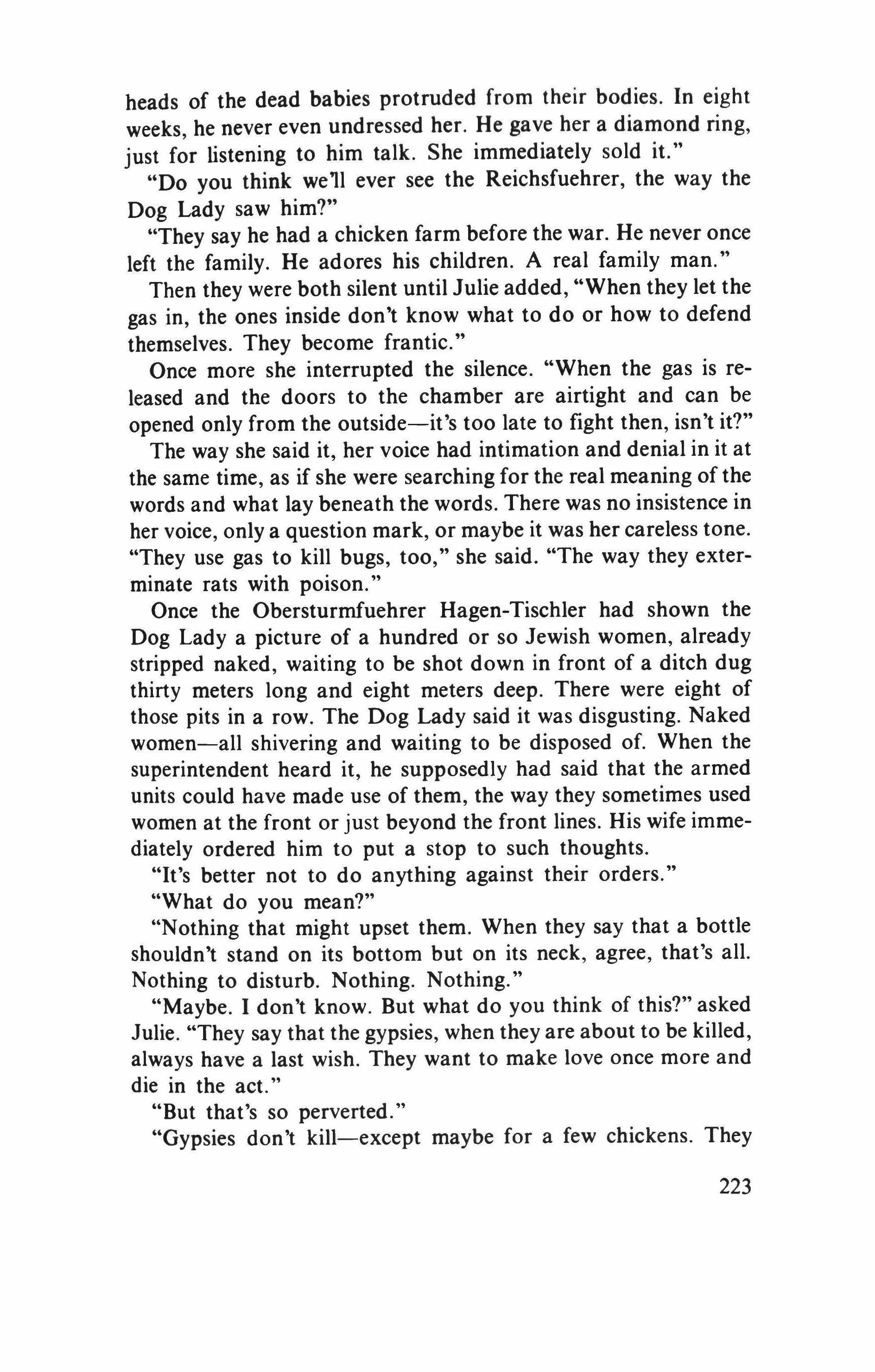
heads of the dead babies protruded from their bodies. In eight weeks, he never even undressed her. He gave her a diamond ring, just for listening to him talk. She immediately sold it."
"Do you think we'll ever see the Reichsfuehrer, the way the Dog Lady saw him?"
"They say he had a chicken farm before the war. He never once left the family. He adores his children. A real family man."
Then they were both silent until Julie added, "When they let the gas in, the ones inside don't know what to do or how to defend themselves. They become frantic."
Once more she interrupted the silence. "When the gas is released and the doors to the chamber are airtight and can be opened only from the outside-it's too late to fight then, isn't it?"
The way she said it, her voice had intimation and denial in it at the same time, as if she were searching for the real meaning of the words and what lay beneath the words. There was no insistence in her voice, only a question mark, or maybe it was her careless tone. "They use gas to kill bugs, too," she said. "The way they exterminate rats with poison."
Once the Obersturrnfuehrer Hagen-Tischler had shown the Dog Lady a picture of a hundred or so Jewish women, already stripped naked, waiting to be shot down in front of a ditch dug thirty meters long and eight meters deep. There were eight of those pits in a row. The Dog Lady said it was disgusting. Naked women-all shivering and waiting to be disposed of. When the superintendent heard it, he supposedly had said that the armed units could have made use of them, the way they sometimes used women at the front or just beyond the front lines. His wife immediately ordered him to put a stop to such thoughts.
"It's better not to do anything against their orders."
"What do you mean?"
"Nothing that might upset them. When they say that a bottle shouldn't stand on its bottom but on its neck, agree, that's all. Nothing to disturb. Nothing. Nothing."
"Maybe. I don't know. But what do you think of this?" asked Julie. "They say that the gypsies, when they are about to be killed, always have a last wish. They want to make love once more and die in the act."
"But that's so perverted."
"Gypsies don't kill-except maybe for a few chickens. They 223

love being alive. 1 can't understand why anybody would want to kill them. But 1 do understand why they want to make love."
The sun, the currents of hot air, the shadows, sharp and flickering, the colors that appeared when you closed your eyes, behind the lids or under them, seemed like an enormous, impalpable, and tender cage. She saw images of quiet volcanic eruptions, muffled under deep, dark waters, but followed, far away, by tremors of the earth and the destruction of unseen people.
"Why?" whispered Catherine Faye. And then she asked, "Do you think Hell exists?"
"Sure it does. But not just fire and torment."
"I think there's a Hell, but it's while you're alive," said Catherine Faye. "It's as if you're walking barefoot over the ashes of all those who were burned in the deep pits."
Then Julie said almost in a whisper: "I could never be true to any man."
"Why?"
"Tanya Grab used to tell us what the soldiers did in the east. They took out their pistols and forced girls to kneel in front of them. Then they unbuttoned their flies. Sometimes they forced children to do it."
"Do you think they really did that to them?"
"No. But probably the other. What men do to women."
"I would bite. Even if it were the last thing 1 ever did."
Then she asked, "Do you think they sterilized her?" And her question also contained an inquiry about how they did it.
"As if you didn't know. You stand in front of the X-ray machine, spread your legs open, and they irradiate you."
"I heard they perform operations."
"That, too."
"I wouldn't even want to have children. Who knows what kind of genes I've got anyway?"
"What kind of genes you've got doesn't really depend on your mother, or your grandmother, or all your great-aunts put together. It really depends on the Obersturmfuehrer. He's the one who decides about your genes."
"I heard he's going to be promoted. They all want to be generals.
"What privilege is there in being able to get pregnant?"
"Privilege?" the little one asked. Then, suddenly, as ifto sum up
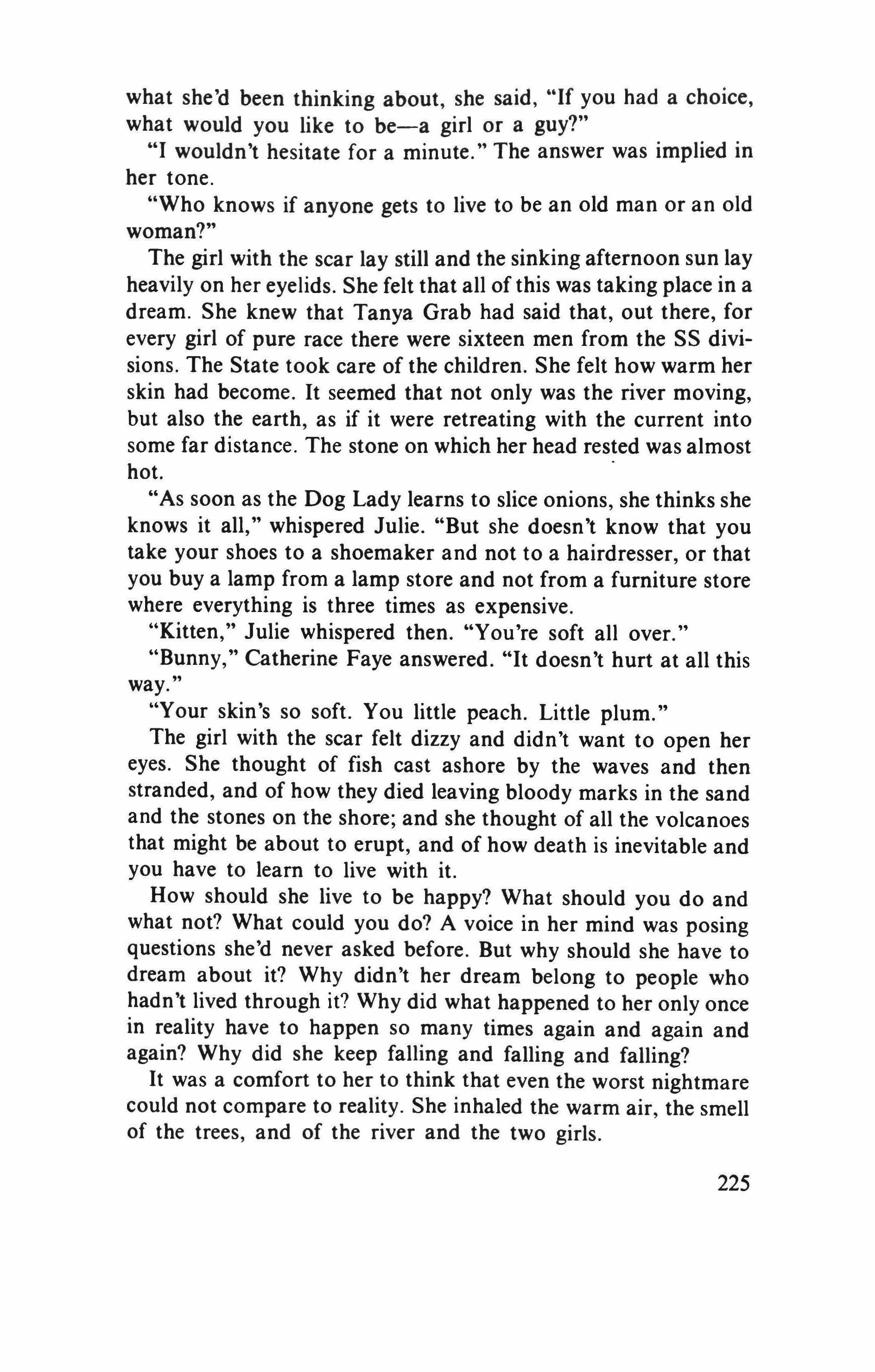
what she'd been thinking about, she said, "If you had a choice, what would you like to be-a girl or a guy?"
"I wouldn't hesitate for a minute." The answer was implied in her tone.
"Who knows if anyone gets to live to be an old man or an old woman?"
The girl with the scar lay still and the sinking afternoon sun lay heavily on her eyelids. She felt that all of this was taking place in a dream. She knew that Tanya Grab had said that, out there, for every girl of pure race there were sixteen men from the SS divisions. The State took care of the children. She felt how warm her skin had become. It seemed that not only was the river moving, but also the earth, as if it were retreating with the current into some far distance. The stone on which her head rested was almost hot.
"As soon as the Dog Lady learns to slice onions, she thinks she knows it all," whispered Julie. "But she doesn't know that you take your shoes to a shoemaker and not to a hairdresser, or that you buy a lamp from a lamp store and not from a furniture store where everything is three times as expensive.
"Kitten," Julie whispered then. "You're soft all over."
"Bunny," Catherine Faye answered. "It doesn't hurt at all this way."
"Your skin's so soft. You little peach. Little plum."
The girl with the scar felt dizzy and didn't want to open her eyes. She thought of fish cast ashore by the waves and then stranded, and of how they died leaving bloody marks in the sand and the stones on the shore; and she thought of all the volcanoes that might be about to erupt, and of how death is inevitable and you have to learn to live with it.
How should she live to be happy? What should you do and what not? What could you do? A voice in her mind was posing questions she'd never asked before. But why should she have to dream about it? Why didn't her dream belong to people who hadn't lived through it? Why did what happened to her only once in reality have to happen so many times again and again and again? Why did she keep falling and falling and falling?
It was a comfort to her to think that even the worst nightmare could not compare to reality. She inhaled the warm air, the smell of the trees, and of the river and the two girls. 225
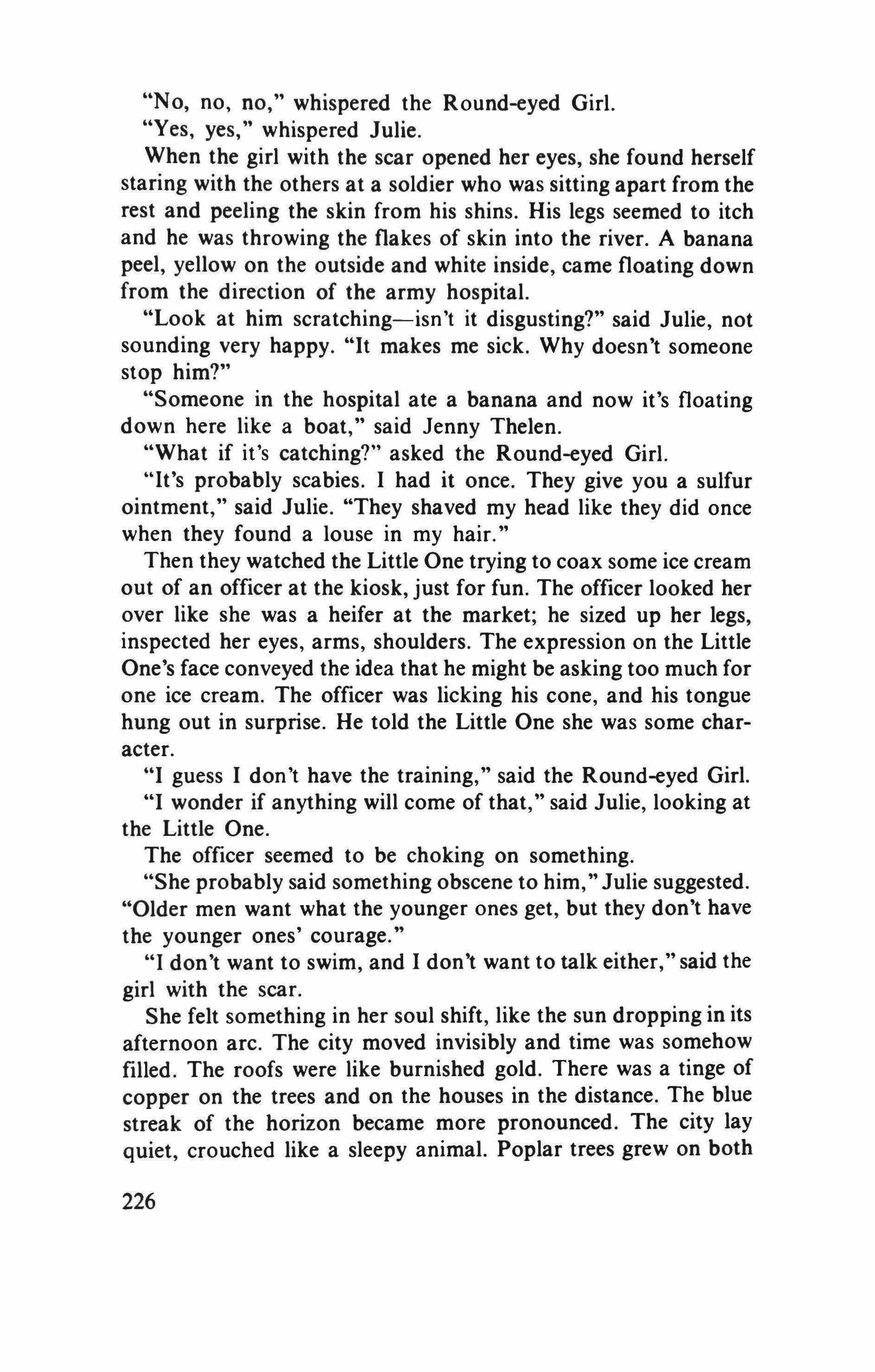
"No, no, no," whispered the Round-eyed Girl.
"Yes, yes," whispered Julie.
When the girl with the scar opened her eyes, she found herself staring with the others at a soldier who was sitting apart from the rest and peeling the skin from his shins. His legs seemed to itch and he was throwing the flakes of skin into the river. A banana peel, yellow on the outside and white inside, came floating down from the direction of the army hospital.
"Look at him scratching-isn't it disgusting?" said Julie, not sounding very happy. "It makes me sick. Why doesn't someone stop him?"
"Someone in the hospital ate a banana and now it's floating down here like a boat," said Jenny Thelen.
"What if it's catching?" asked the Round-eyed Girl.
"It's probably scabies. I had it once. They give you a sulfur ointment," said Julie. "They shaved my head like they did once when they found a louse in my hair."
Then they watched the Little One trying to coax some ice cream out of an officer at the kiosk, just for fun. The officer looked her over like she was a heifer at the market; he sized up her legs, inspected her eyes, arms, shoulders. The expression on the Little One's face conveyed the idea that he might be asking too much for one ice cream. The officer was licking his cone, and his tongue hung out in surprise. He told the Little One she was some character.
"I guess I don't have the training," said the Round-eyed Girl. "I wonder if anything will come of that," said Julie, looking at the Little One.
The officer seemed to be choking on something.
"She probably said something obscene to him," Julie suggested. "Older men want what the younger ones get, but they don't have the younger ones' courage."
"I don't want to swim, and I don't want to talk either," said the girl with the scar.
She felt something in her soul shift, like the sun dropping in its afternoon arc. The city moved invisibly and time was somehow filled. The roofs were like burnished gold. There was a tinge of copper on the trees and on the houses in the distance. The blue streak of the horizon became more pronounced. The city lay quiet, crouched like a sleepy animal. Poplar trees grew on both
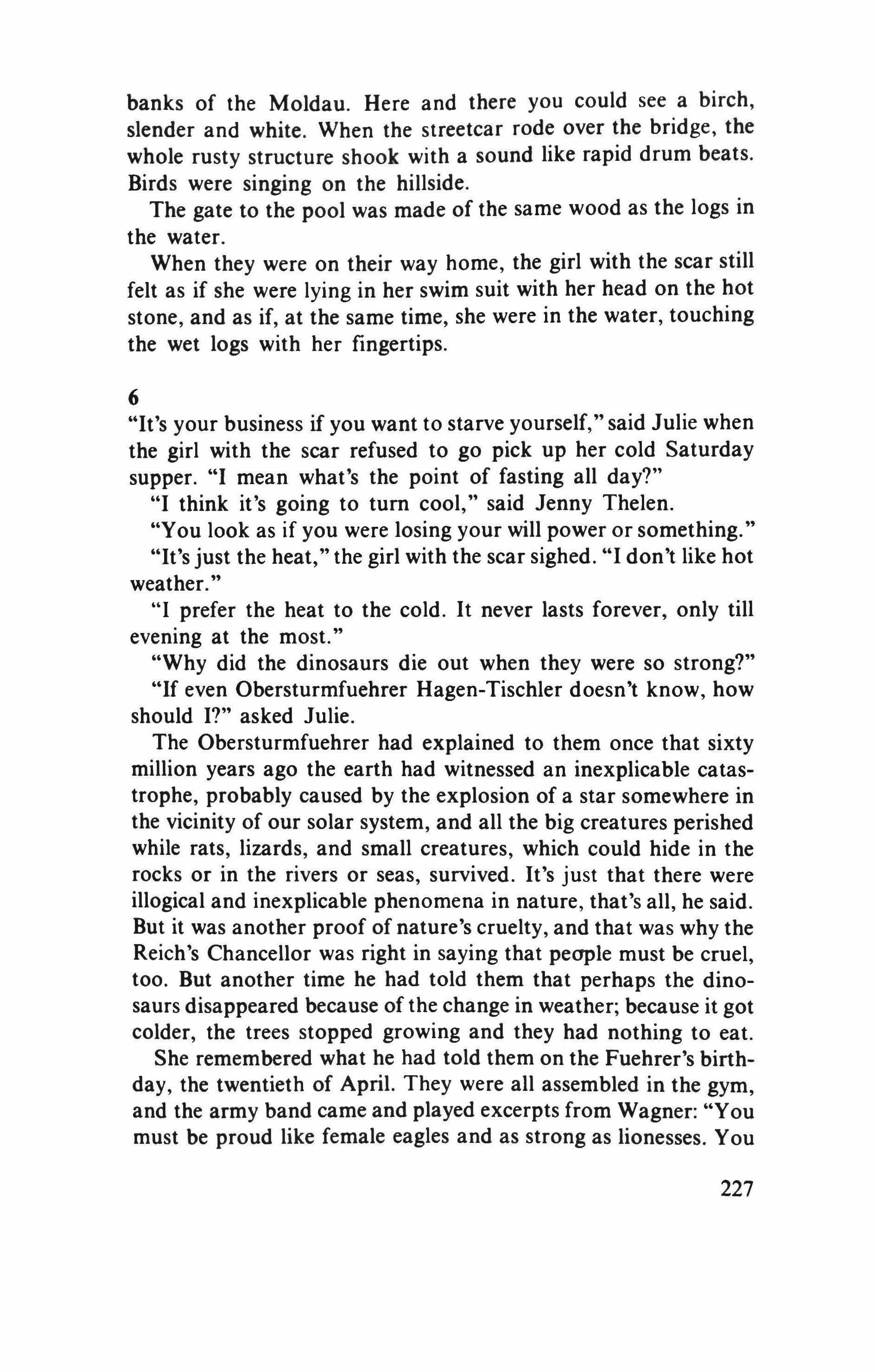
banks of the Moldau. Here and there you could see a birch, slender and white. When the streetcar rode over the bridge, the whole rusty structure shook with a sound like rapid drum beats. Birds were singing on the hillside.
The gate to the pool was made of the same wood as the logs in the water.
When they were on their way home, the girl with the scar still felt as if she were lying in her swim suit with her head on the hot stone, and as if, at the same time, she were in the water, touching the wet logs with her fingertips.
6
"It's your business if you want to starve yourself," said Julie when the girl with the scar refused to go pick up her cold Saturday supper. "I mean what's the point of fasting all day?"
"I think it's going to tum cool," said Jenny Thelen.
"You look as if you were losing your will power or something. "
"It's just the heat," the girl with the scar sighed. "I don't like hot weather."
"I prefer the heat to the cold. It never lasts forever, only till evening at the most."
"Why did the dinosaurs die out when they were so strong?"
"If even Obersturmfuehrer Hagen-Tischler doesn't know, how should I?" asked Julie.
The Obersturmfuehrer had explained to them once that sixty million years ago the earth had witnessed an inexplicable catastrophe, probably caused by the explosion of a star somewhere in the vicinity of our solar system, and all the big creatures perished while rats, lizards, and small creatures, which could hide in the rocks or in the rivers or seas, survived. It's just that there were illogical and inexplicable phenomena in nature, that's all, he said. But it was another proof of nature's cruelty, and that was why the Reich's Chancellor was right in saying that people must be cruel, too. But another time he had told them that perhaps the dinosaurs disappeared because of the change in weather; because it got colder, the trees stopped growing and they had nothing to eat.
She remembered what he had told them on the Fuehrer's birthday, the twentieth of April. They were all assembled in the gym, and the army band came and played excerpts from Wagner: "You must be proud like female eagles and as strong as lionesses. You 227
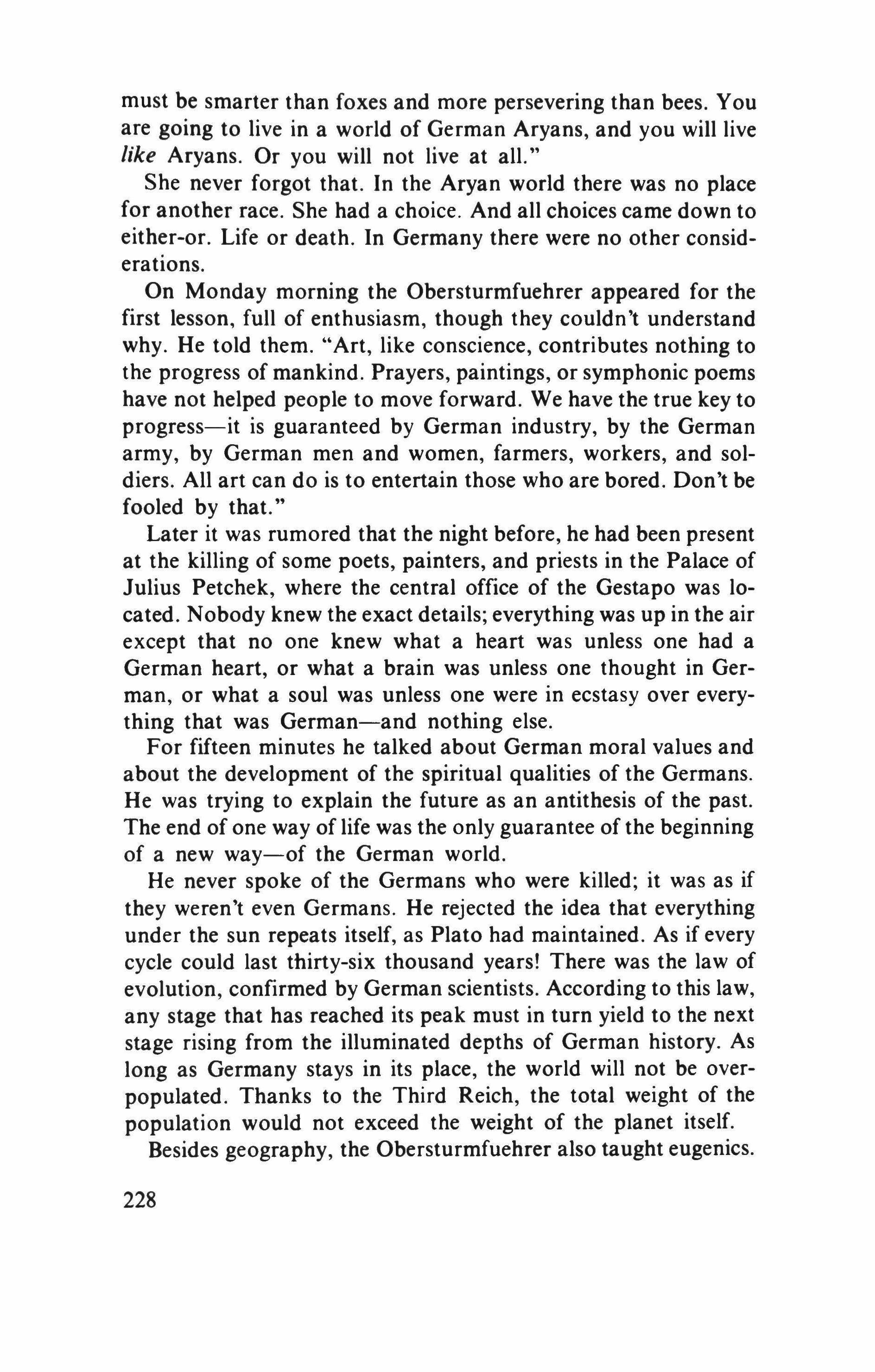
must be smarter than foxes and more persevering than bees. You are going to live in a world of German Aryans, and you will live like Aryans. Or you will not live at all."
She never forgot that. In the Aryan world there was no place for another race. She had a choice. And all choices came down to either-or. Life or death. In Germany there were no other considerations.
On Monday morning the Obersturmfuehrer appeared for the first lesson, full of enthusiasm, though they couldn't understand why. He told them. "Art, like conscience, contributes nothing to the progress of mankind. Prayers, paintings, or symphonic poems have not helped people to move forward. We have the true key to progress-it is guaranteed by German industry, by the German army, by German men and women, farmers, workers, and soldiers. All art can do is to entertain those who are bored. Don't be fooled by that."
Later it was rumored that the night before, he had been present at the killing of some poets, painters, and priests in the Palace of Julius Petchek, where the central office of the Gestapo was located. Nobody knew the exact details; everything was up in the air except that no one knew what a heart was unless one had a German heart, or what a brain was unless one thought in German, or what a soul was unless one were in ecstasy over everything that was German-and nothing else.
For fifteen minutes he talked about German moral values and about the development of the spiritual qualities of the Germans. He was trying to explain the future as an antithesis of the past. The end of one way of life was the only guarantee of the beginning of a new way-of the German world.
He never spoke of the Germans who were killed; it was as if they weren't even Germans. He rejected the idea that everything under the sun repeats itself, as Plato had maintained. As if every cycle could last thirty-six thousand years! There was the law of evolution, confirmed by German scientists. According to this law, any stage that has reached its peak must in turn yield to the next stage rising from the illuminated depths of German history. As long as Germany stays in its place, the world will not be overpopulated. Thanks to the Third Reich, the total weight of the population would not exceed the weight of the planet itself.
Besides geography, the Obersturmfuehrer also taught eugenics.
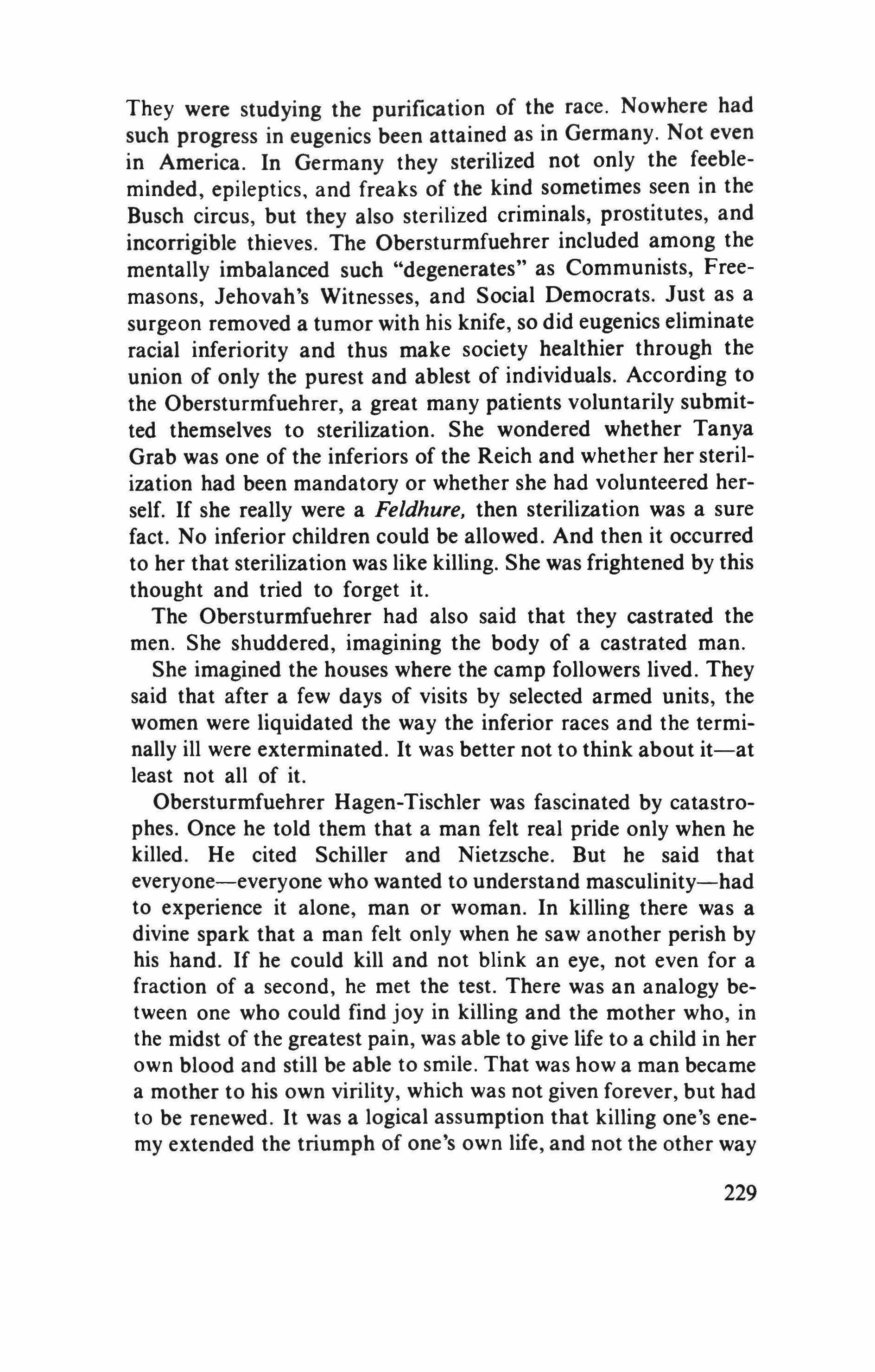
They were studying the purification of the race. Nowhere had such progress in eugenics been attained as in Germany. Not even in America. In Germany they sterilized not only the feebleminded, epileptics, and freaks of the kind sometimes seen in the Busch circus, but they also sterilized criminals, prostitutes, and incorrigible thieves. The Obersturmfuehrer included among the mentally imbalanced such "degenerates" as Communists, Freemasons, Jehovah's Witnesses, and Social Democrats. Just as a surgeon removed a tumor with his knife, so did eugenics eliminate racial inferiority and thus make society healthier through the union of only the purest and ablest of individuals. According to the Obersturmfuehrer, a great many patients voluntarily submitted themselves to sterilization. She wondered whether Tanya Grab was one of the inferiors of the Reich and whether her sterilization had been mandatory or whether she had volunteered herself. If she really were a Feldhure, then sterilization was a sure fact. No inferior children could be allowed. And then it occurred to her that sterilization was like killing. She was frightened by this thought and tried to forget it.
The Obersturmfuehrer had also said that they castrated the men. She shuddered, imagining the body of a castrated man.
She imagined the houses where the camp followers lived. They said that after a few days of visits by selected armed units, the women were liquidated the way the inferior races and the terminally ill were exterminated. It was better not to think about it-at least not all of it.
Obersturmfuehrer Hagen-Tischler was fascinated by catastrophes. Once he told them that a man felt real pride only when he killed. He cited Schiller and Nietzsche. But he said that everyone-everyone who wanted to understand masculinity-had to experience it alone, man or woman. In killing there was a divine spark that a man felt only when he saw another perish by his hand. If he could kill and not blink an eye, not even for a fraction of a second, he met the test. There was an analogy between one who could find joy in killing and the mother who, in the midst of the greatest pain, was able to give life to a child in her own blood and still be able to smile. That was how a man became a mother to his own virility, which was not given forever, but had to be renewed. It was a logical assumption that killing one's enemy extended the triumph of one's own life, and not the other way
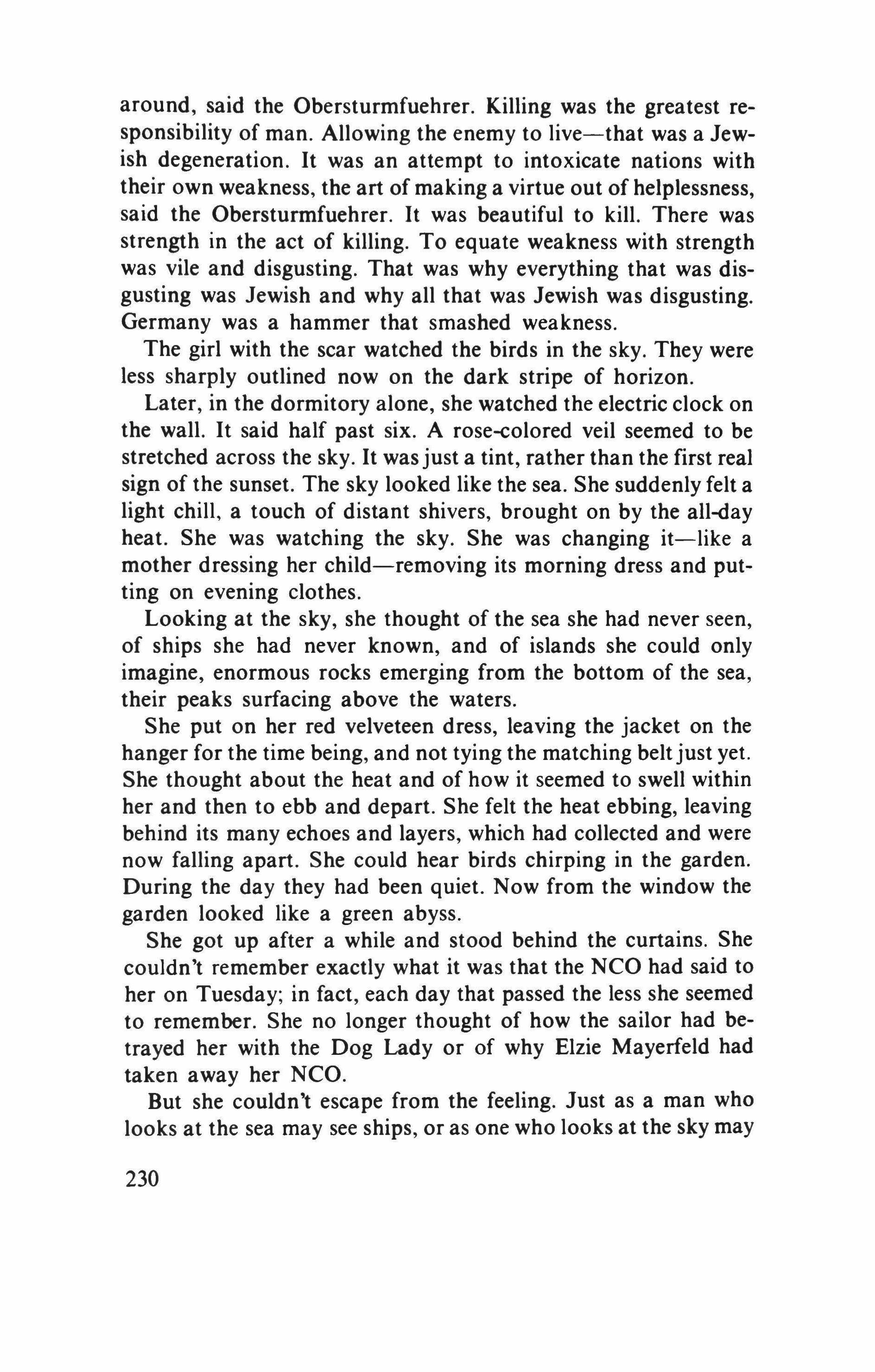
around, said the Obersturmfuehrer. Killing was the greatest responsibility of man. Allowing the enemy to live-that was a Jewish degeneration. It was an attempt to intoxicate nations with their own weakness, the art of making a virtue out of helplessness, said the Obersturmfuehrer. It was beautiful to kill. There was strength in the act of killing. To equate weakness with strength was vile and disgusting. That was why everything that was disgusting was Jewish and why all that was Jewish was disgusting. Germany was a hammer that smashed weakness.
The girl with the scar watched the birds in the sky. They were less sharply outlined now on the dark stripe of horizon.
Later, in the dormitory alone, she watched the electric clock on the wall. It said half past six. A rose-colored veil seemed to be stretched across the sky. It was just a tint, rather than the first real sign of the sunset. The sky looked like the sea. She suddenly felt a light chill, a touch of distant shivers, brought on by the all-day heat. She was watching the sky. She was changing it-like a mother dressing her child-removing its morning dress and putting on evening clothes.
Looking at the sky, she thought of the sea she had never seen, of ships she had never known, and of islands she could only imagine, enormous rocks emerging from the bottom of the sea, their peaks surfacing above the waters.
She put on her red velveteen dress, leaving the jacket on the hanger for the time being, and not tying the matching belt just yet. She thought about the heat and of how it seemed to swell within her and then to ebb and depart. She felt the heat ebbing, leaving behind its many echoes and layers, which had collected and were now falling apart. She could hear birds chirping in the garden. During the day they had been quiet. Now from the window the garden looked like a green abyss.
She got up after a while and stood behind the curtains. She couldn't remember exactly what it was that the NCO had said to her on Tuesday; in fact, each day that passed the less she seemed to remember. She no longer thought of how the sailor had betrayed her with the Dog Lady or of why Elzie Mayerfeld had taken away her NCO.
But she couldn't escape from the feeling. Just as a man who looks at the sea may see ships, or as one who looks at the sky may
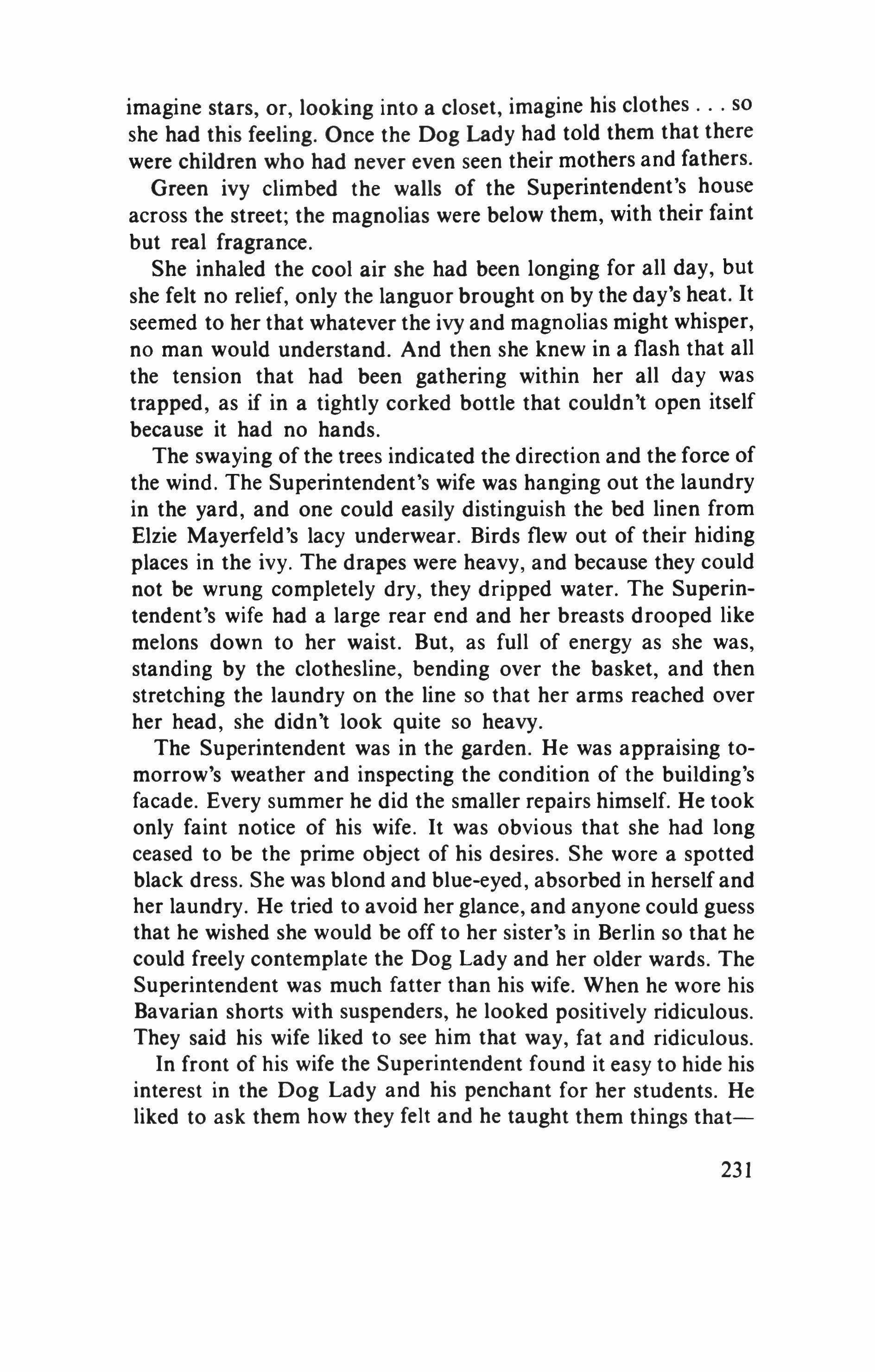
imagine stars, or, looking into a closet, imagine his clothes so she had this feeling. Once the Dog Lady had told them that there were children who had never even seen their mothers and fathers.
Green ivy climbed the walls of the Superintendent's house across the street; the magnolias were below them, with their faint but real fragrance.
She inhaled the cool air she had been longing for all day, but she felt no relief, only the languor brought on by the day's heat. It seemed to her that whatever the ivy and magnolias might Whisper, no man would understand. And then she knew in a flash that all the tension that had been gathering within her all day was trapped, as if in a tightly corked bottle that couldn't open itself because it had no hands.
The swaying of the trees indicated the direction and the force of the wind. The Superintendent's wife was hanging out the laundry in the yard, and one could easily distinguish the bed linen from Elzie Mayerfeld's lacy underwear. Birds flew out of their hiding places in the ivy. The drapes were heavy, and because they could not be wrung completely dry, they dripped water. The Superintendent's wife had a large rear end and her breasts drooped like melons down to her waist. But, as full of energy as she was, standing by the clothesline, bending over the basket, and then stretching the laundry on the line so that her arms reached over her head, she didn't look quite so heavy.
The Superintendent was in the garden. He was appraising tomorrow's weather and inspecting the condition of the building's facade. Every summer he did the smaller repairs himself. He took only faint notice of his wife. It was obvious that she had long ceased to be the prime object of his desires. She wore a spotted black dress. She was blond and blue-eyed, absorbed in herself and her laundry. He tried to avoid her glance, and anyone could guess that he wished she would be off to her sister's in Berlin so that he could freely contemplate the Dog Lady and her older wards. The Superintendent was much fatter than his wife. When he wore his Bavarian shorts with suspenders, he looked positively ridiculous. They said his wife liked to see him that way, fat and ridiculous.
In front of his wife the Superintendent found it easy to hide his interest in the Dog Lady and his penchant for her students. He liked to ask them how they felt and he taught them things that-
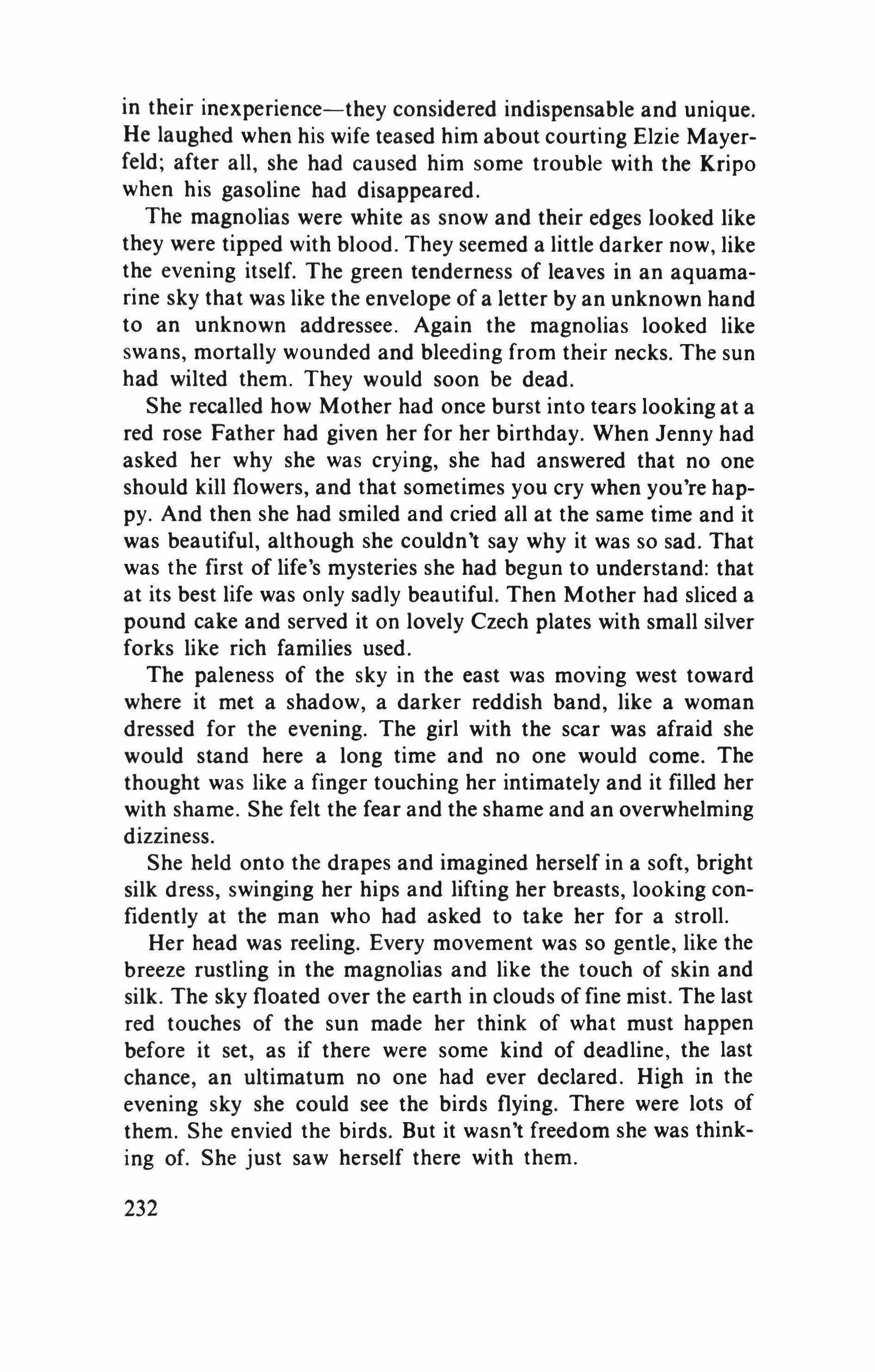
in their inexperience-they considered indispensable and unique. He laughed when his wife teased him about courting Elzie Mayerfeld; after all, she had caused him some trouble with the Kripo when his gasoline had disappeared.
The magnolias were white as snow and their edges looked like they were tipped with blood. They seemed a little darker now, like the evening itself. The green tenderness of leaves in an aquamarine sky that was like the envelope of a letter by an unknown hand to an unknown addressee. Again the magnolias looked like swans, mortally wounded and bleeding from their necks. The sun had wilted them. They would soon be dead.
She recalled how Mother had once burst into tears looking at a red rose Father had given her for her birthday. When Jenny had asked her why she was crying, she had answered that no one should kill flowers, and that sometimes you cry when you're happy. And then she had smiled and cried all at the same time and it was beautiful, although she couldn't say why it was so sad. That was the first of life's mysteries she had begun to understand: that at its best life was only sadly beautiful. Then Mother had sliced a pound cake and served it on lovely Czech plates with small silver forks like rich families used.
The paleness of the sky in the east was moving west toward where it met a shadow, a darker reddish band, like a woman dressed for the evening. The girl with the scar was afraid she would stand here a long time and no one would come. The thought was like a finger touching her intimately and it filled her with shame. She felt the fear and the shame and an overwhelming dizziness.
She held onto the drapes and imagined herself in a soft, bright silk dress, swinging her hips and lifting her breasts, looking confidently at the man who had asked to take her for a stroll.
Her head was reeling. Every movement was so gentle, like the breeze rustling in the magnolias and like the touch of skin and silk. The sky floated over the earth in clouds of fine mist. The last red touches of the sun made her think of what must happen before it set, as if there were some kind of deadline, the last chance, an ultimatum no one had ever declared. High in the evening sky she could see the birds flying. There were lots of them. She envied the birds. But it wasn't freedom she was thinking of. She just saw herself there with them.

She wished the sun would not set so quickly. It was as if she were trying to gain time, extend a deadline that wasn't hers alone. In a moment she saw the first star, even though the sun had not yet set. The whole summer she had watched that star in its duel with the sun. It was always the first and then the brightest, as if it came out of its shell just as the day departed, and then waited for the sun to go before it began shining. An image of the clothes in Mother's closet flashed through her mind. The star was still pale because the waning sun was still bright. But its time would come, as it came every day, the girl with the scar mused. It was alone in the sky and it marked a point, a firm and definite place-a point of reference, although she didn't know precisely to what.
It was Venus. It occurred to her that, like memories, stars resembled those lost islands that SS Obersturmfuehrer HagenTischler talked about, whole lands submerged with the people who had lived there.
Although memory was the only real point of reference and the only thing that was indisputably hers, she couldn't recall clearly any single one of her mother's dresses. Still, she had memories of her mother and father and of their life on Kralovska Street before the General of the Police had been killed, and also memories of Tuesday, when, making way for the NCO in the corridor to the geography room, she had not been fast enough to avoid his touch.
She smoothed her dress, automatically imitating her tall teacher. Hidden by the heavy white curtain, she looked down again at the sidewalk. The sun felt different to her now-not the way it had in the morning. Now it warmed and protected her and offered something she'd never had before. And she thought again of the NCO, as though she had known him a long time and he had just left her. That might be changed, just by willing it, to the possibility that he would come again.
From the living room she could hear the sound of steps and piano music. The Dog Lady was laughing. She was telling someone that prejudice brought suffering. "A man must either work or fight. But when he fights, he stops behaving like a man in bed."
This was the second Saturday that Elzie Mayerfeld had worked at teaching them the waltz. The slow Viennese music engulfed everything. Lale Anderson was singing; it was a record of Tales from the Vienna Woods. She could hear it clearly, even with the living room doors closed. It evoked an image of polished shoes
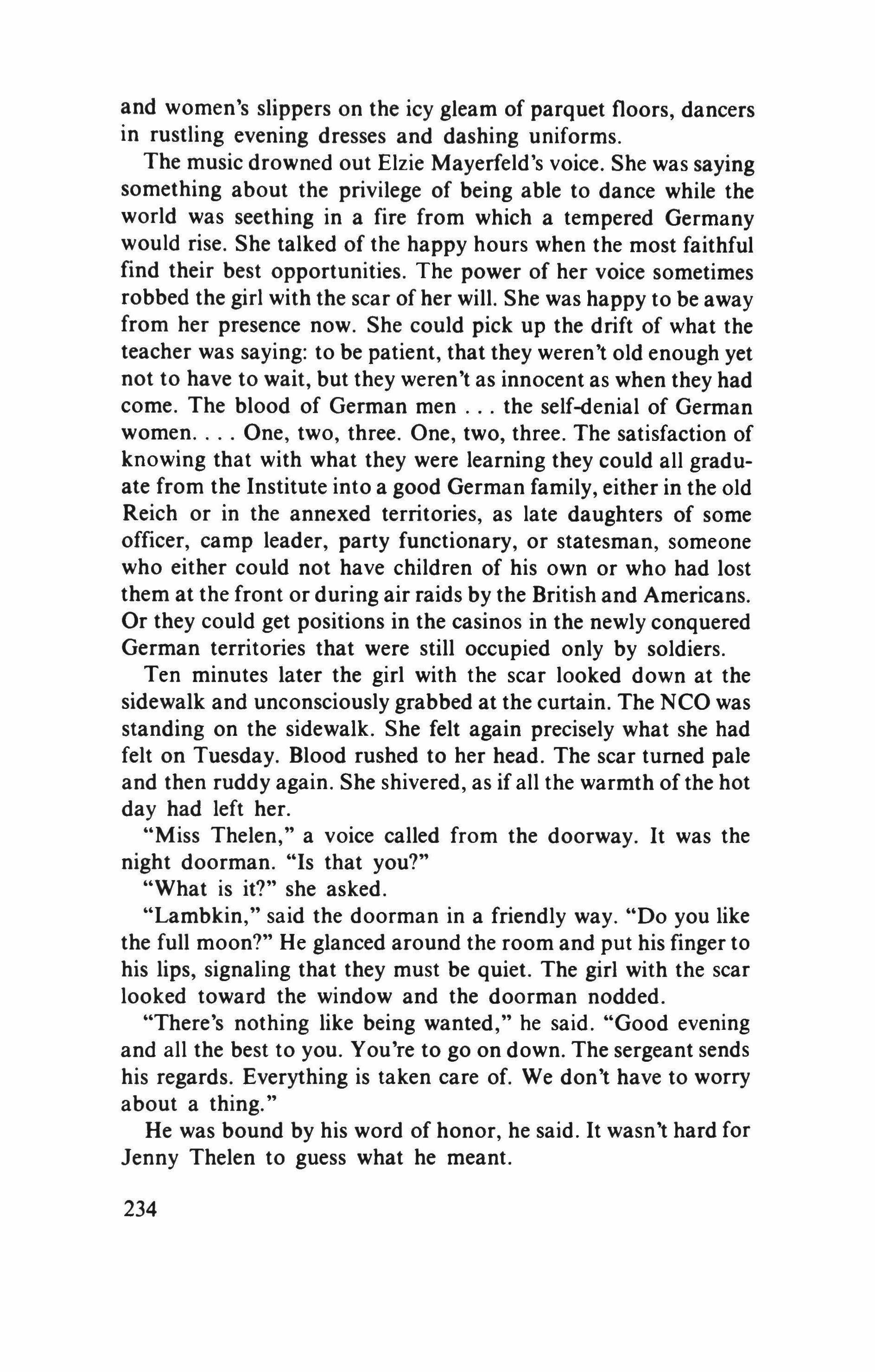
and women's slippers on the icy gleam of parquet floors, dancers in rustling evening dresses and dashing uniforms.
The music drowned out Elzie Mayerfeld's voice. She was saying something about the privilege of being able to dance while the world was seething in a fire from which a tempered Germany would rise. She talked of the happy hours when the most faithful find their best opportunities. The power of her voice sometimes robbed the girl with the scar of her will. She was happy to be away from her presence now. She could pick up the drift of what the teacher was saying: to be patient, that they weren't old enough yet not to have to wait, but they weren't as innocent as when they had come. The blood of German men the self-denial of German women One, two, three. One, two, three. The satisfaction of knowing that with what they were learning they could all graduate from the Institute into a good German family, either in the old Reich or in the annexed territories, as late daughters of some officer, camp leader, party functionary, or statesman, someone who either could not have children of his own or who had lost them at the front or during air raids by the British and Americans. Or they could get positions in the casinos in the newly conquered German territories that were still occupied only by soldiers.
Ten minutes later the girl with the scar looked down at the sidewalk and unconsciously grabbed at the curtain. The NCO was standing on the sidewalk. She felt again precisely what she had felt on Tuesday. Blood rushed to her head. The scar turned pale and then ruddy again. She shivered, as if all the warmth of the hot day had left her.
"Miss Thelen," a voice called from the doorway. It was the night doorman. "Is that you?"
"What is it?" she asked.
"Lambkin," said the doorman in a friendly way. "Do you like the full moon?" He glanced around the room and put his finger to his lips, signaling that they must be quiet. The girl with the scar looked toward the window and the doorman nodded.
"There's nothing like being wanted," he said. "Good evening and all the best to you. You're to go on down. The sergeant sends his regards. Everything is taken care of. We don't have to worry about a thing."
He was bound by his word of honor, he said. It wasn't hard for Jenny Thelen to guess what he meant.
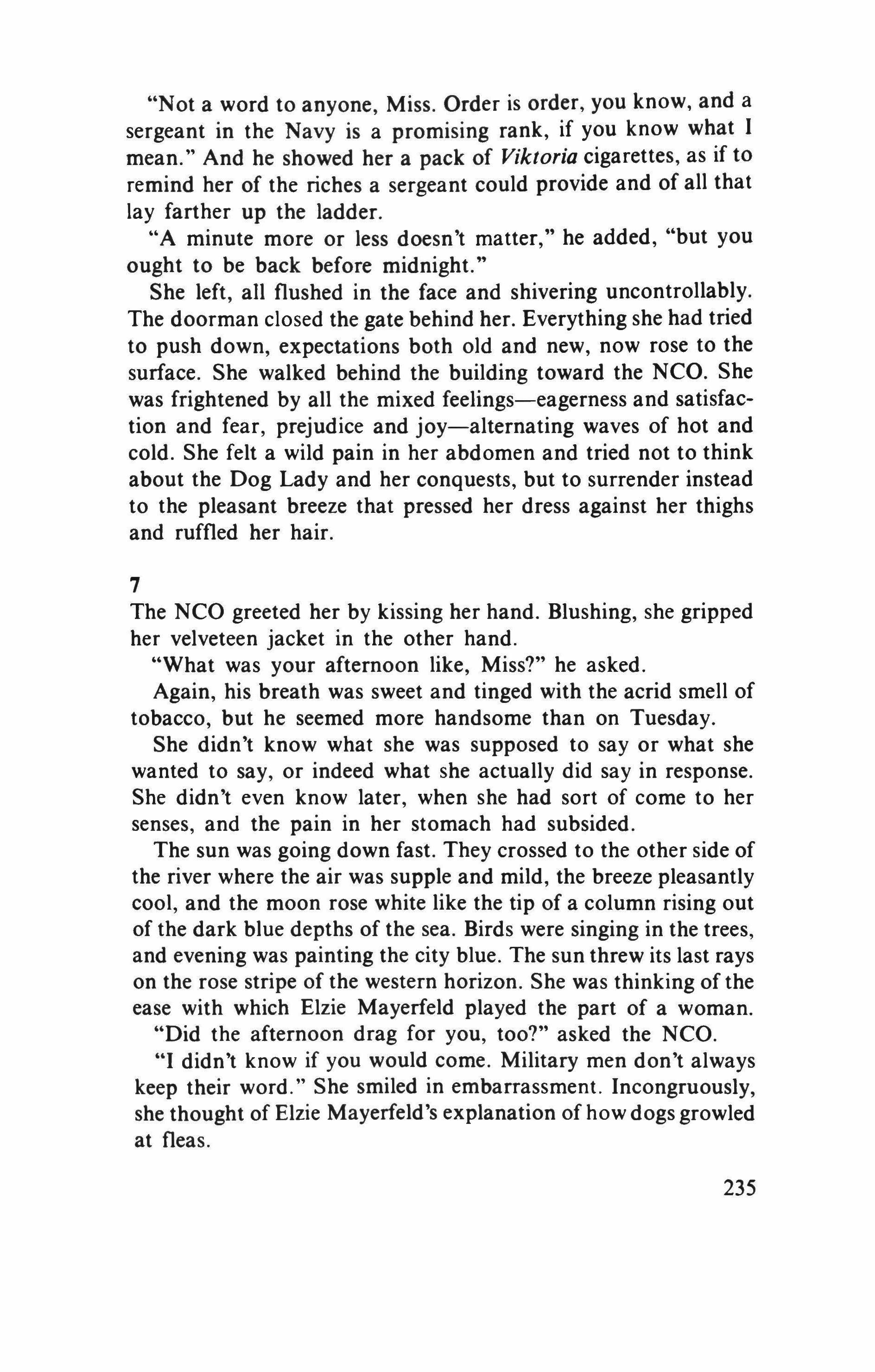
"Not a word to anyone, Miss. Order is order, you know, and a sergeant in the Navy is a promising rank, if you know what I mean." And he showed her a pack of Viktoria cigarettes, as if to remind her of the riches a sergeant could provide and of all that lay farther up the ladder.
"A minute more or less doesn't matter," he added, "but you ought to be back before midnight."
She left, all flushed in the face and shivering uncontrollably. The doorman closed the gate behind her. Everything she had tried to push down, expectations both old and new, now rose to the surface. She walked behind the building toward the NCO. She was frightened by all the mixed feelings-eagerness and satisfaction and fear, prejudice and joy-alternating waves of hot and cold. She felt a wild pain in her abdomen and tried not to think about the Dog Lady and her conquests, but to surrender instead to the pleasant breeze that pressed her dress against her thighs and ruffled her hair.
7
The NCO greeted her by kissing her hand. Blushing, she gripped her velveteen jacket in the other hand.
"What was your afternoon like, Miss?" he asked.
Again, his breath was sweet and tinged with the acrid smell of tobacco, but he seemed more handsome than on Tuesday.
She didn't know what she was supposed to say or what she wanted to say, or indeed what she actually did say in response. She didn't even know later, when she had sort of come to her senses, and the pain in her stomach had subsided.
The sun was going down fast. They crossed to the other side of the river where the air was supple and mild, the breeze pleasantly cool, and the moon rose white like the tip of a column rising out of the dark blue depths of the sea. Birds were singing in the trees, and evening was painting the city blue. The sun threw its last rays on the rose stripe of the western horizon. She was thinking of the ease with which Elzie Mayerfeld played the part of a woman.
"Did the afternoon drag for you, too?" asked the NCO.
"I didn't know if you would come. Military men don't always keep their word." She smiled in embarrassment. Incongruously, she thought of Elzie Mayerfeld's explanation of how dogs growled at fleas.
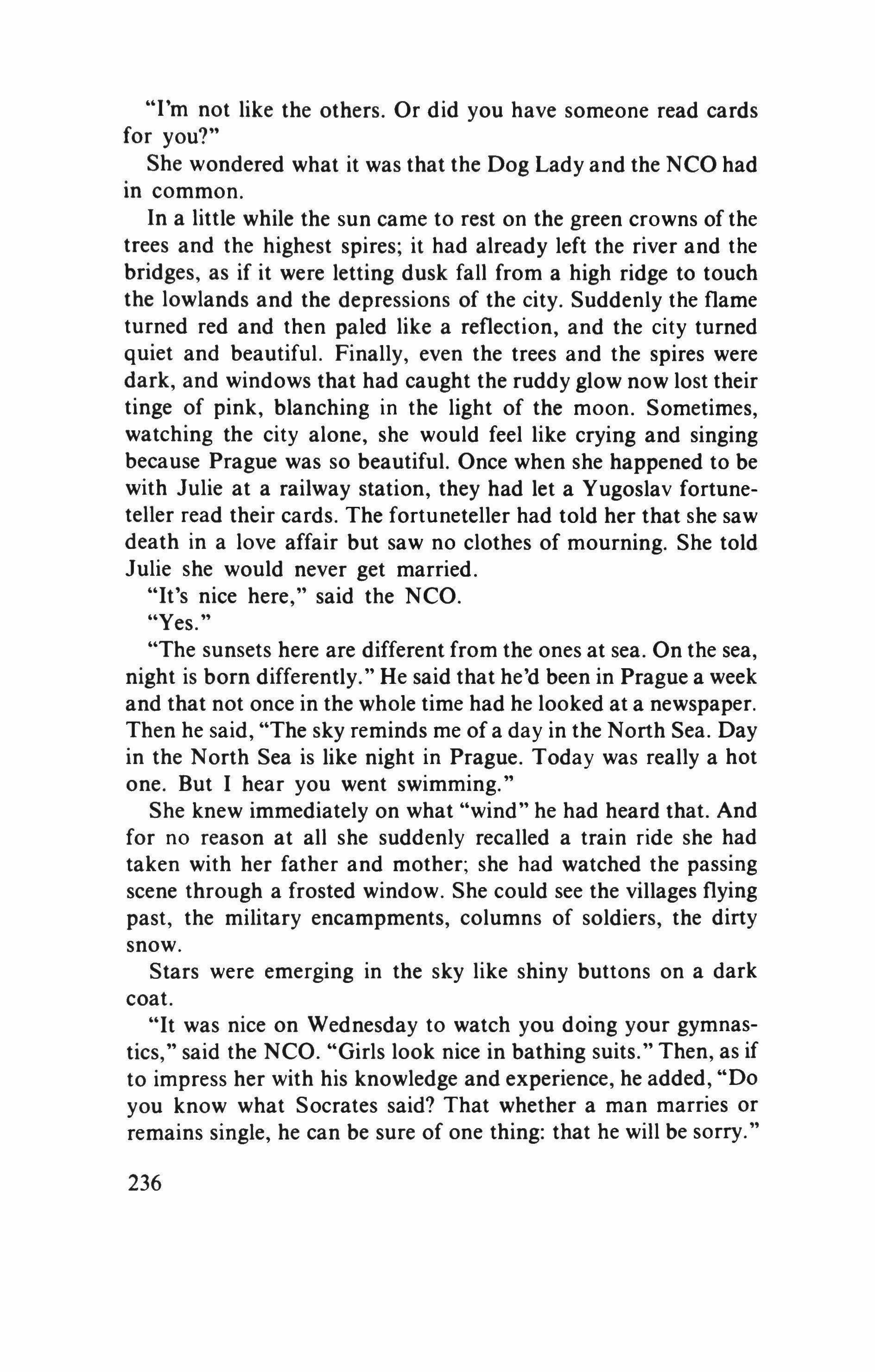
"I'm not like the others. Or did you have someone read cards for you?"
She wondered what it was that the Dog Lady and the NCO had in common.
In a little while the sun came to rest on the green crowns of the trees and the highest spires; it had already left the river and the bridges, as if it were letting dusk fall from a high ridge to touch the lowlands and the depressions of the city. Suddenly the flame turned red and then paled like a reflection, and the city turned quiet and beautiful. Finally, even the trees and the spires were dark, and windows that had caught the ruddy glow now lost their tinge of pink, blanching in the light of the moon. Sometimes, watching the city alone, she would feel like crying and singing because Prague was so beautiful. Once when she happened to be with Julie at a railway station, they had let a Yugoslav fortuneteller read their cards. The fortuneteller had told her that she saw death in a love affair but saw no clothes of mourning. She told Julie she would never get married.
"It's nice here," said the NCO.
"Yes."
"The sunsets here are different from the ones at sea. On the sea, night is born differently." He said that he'd been in Prague a week and that not once in the whole time had he looked at a newspaper. Then he said, "The sky reminds me of a day in the North Sea. Day in the North Sea is like night in Prague. Today was really a hot one. But I hear you went swimming."
She knew immediately on what "wind" he had heard that. And for no reason at all she suddenly recalled a train ride she had taken with her father and mother; she had watched the passing scene through a frosted window. She could see the villages flying past, the military encampments, columns of soldiers, the dirty snow.
Stars were emerging in the sky like shiny buttons on a dark coat.
"It was nice on Wednesday to watch you doing your gymnastics," said the NCO. "Girls look nice in bathing suits." Then, as if to impress her with his knowledge and experience, he added, "Do you know what Socrates said? That whether a man marries or remains single, he can be sure of one thing: that he will be sorry."
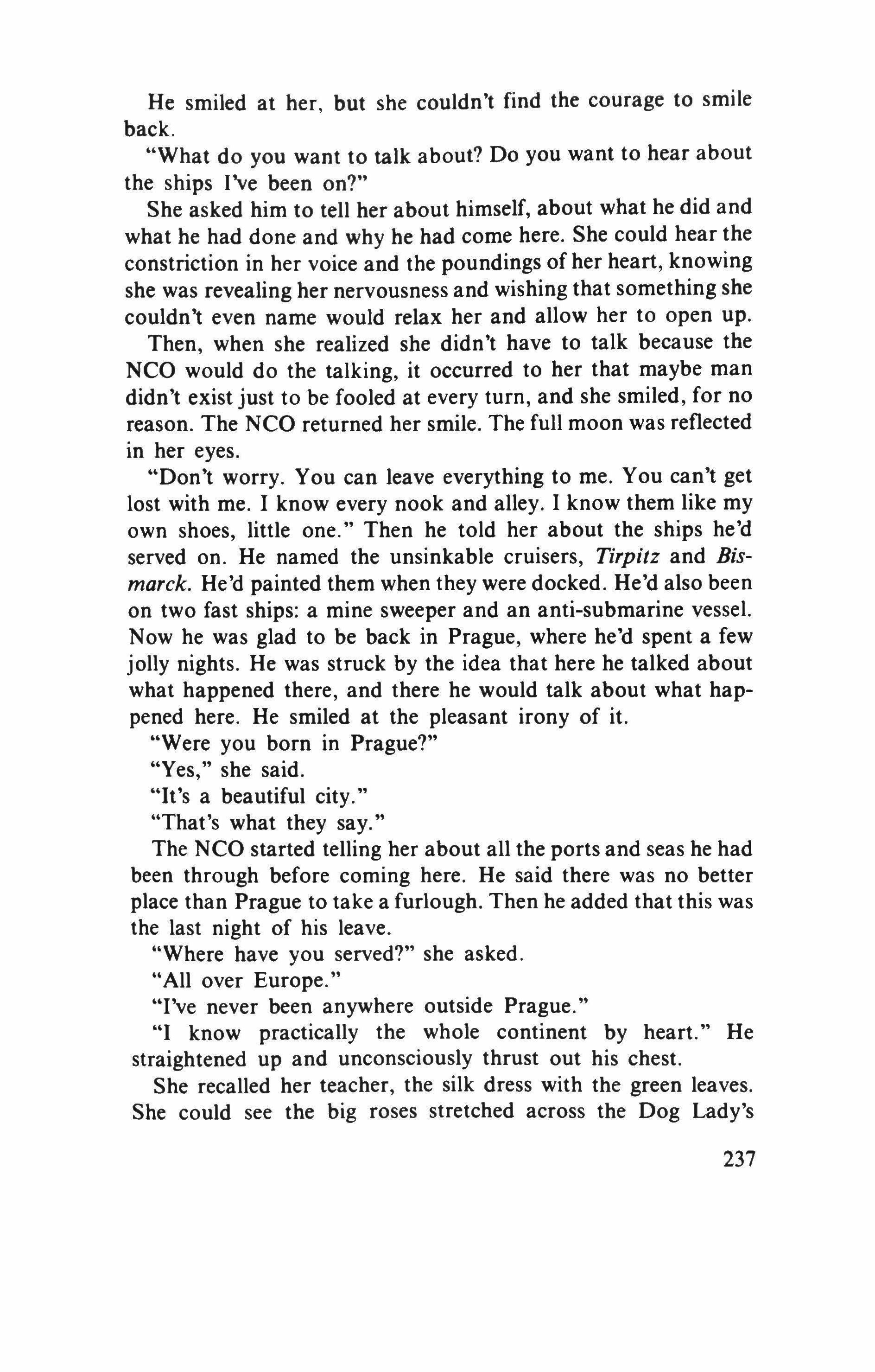
He smiled at her. but she couldn't find the courage to smile back.
"What do you want to talk about? Do you want to hear about the ships I've been on?"
She asked him to tell her about himself, about what he did and what he had done and why he had come here. She could hear the constriction in her voice and the poundings of her heart, knowing she was revealing her nervousness and wishing that something she couldn't even name would relax her and allow her to open up.
Then, when she realized she didn't have to talk because the NCO would do the talking, it occurred to her that maybe man didn't exist just to be fooled at every turn, and she smiled, for no reason. The NCO returned her smile. The full moon was reflected in her eyes.
"Don't worry. You can leave everything to me. You can't get lost with me. I know every nook and alley. I know them like my own shoes, little one." Then he told her about the ships he'd served on. He named the unsinkable cruisers, Tirpitz and Bismarck. He'd painted them when they were docked. He'd also been on two fast ships: a mine sweeper and an anti-submarine vessel. Now he was glad to be back in Prague, where he'd spent a few jolly nights. He was struck by the idea that here he talked about what happened there, and there he would talk about what happened here. He smiled at the pleasant irony of it.
"Were you born in Prague?" "Yes," she said.
"It's a beautiful city."
"That's what they say."
The NCO started telling her about all the ports and seas he had been through before coming here. He said there was no better place than Prague to take a furlough. Then he added that this was the last night of his leave.
"Where have you served?" she asked.
"All over Europe."
"I've never been anywhere outside Prague."
"I know practically the whole continent by heart." He straightened up and unconsciously thrust out his chest.
She recalled her teacher, the silk dress with the green leaves. She could see the big roses stretched across the Dog Lady's
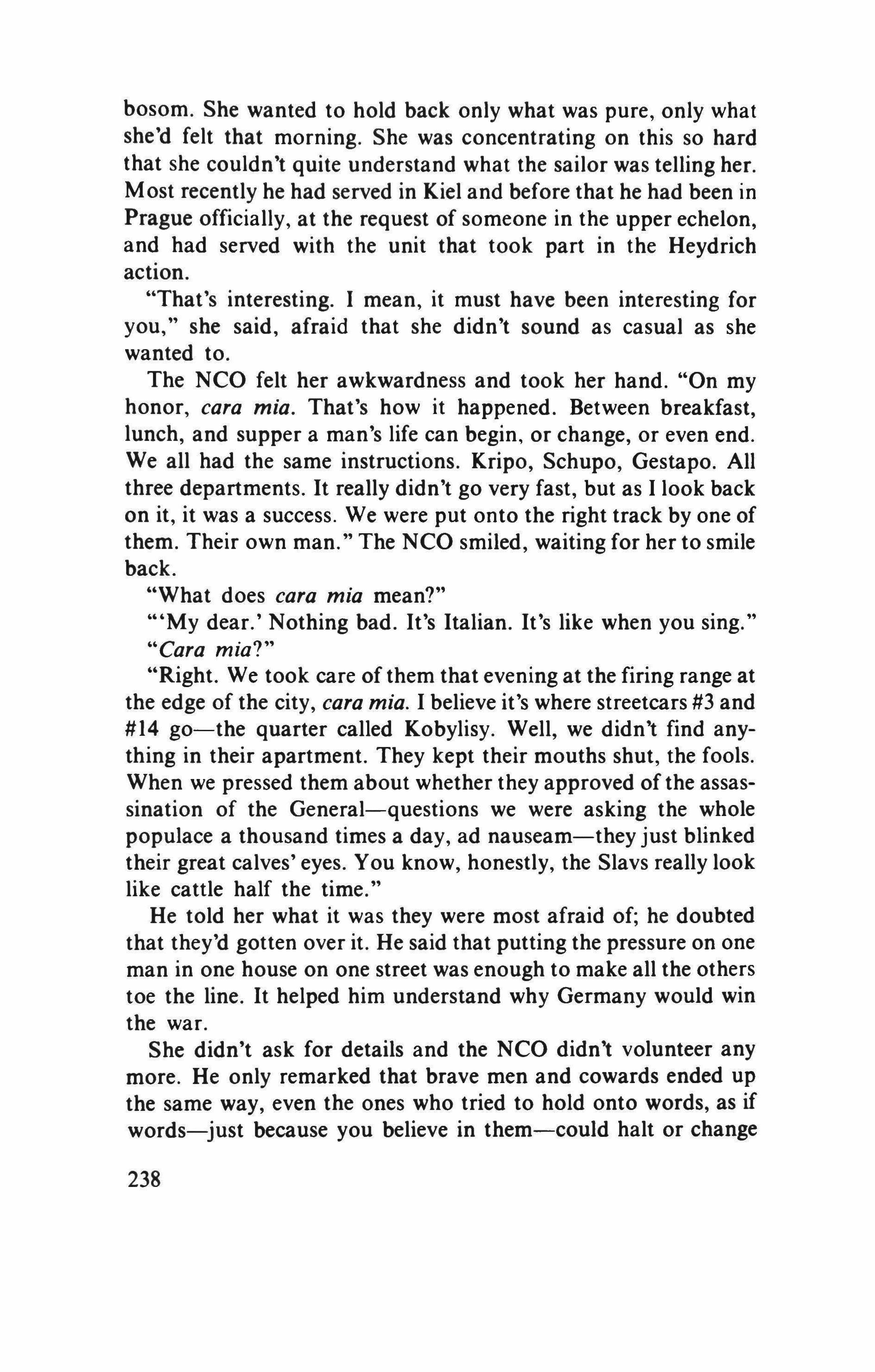
bosom. She wanted to hold back only what was pure, only what she'd felt that morning. She was concentrating on this so hard that she couldn't quite understand what the sailor was telling her. Most recently he had served in Kiel and before that he had been in Prague officially, at the request of someone in the upper echelon, and had served with the unit that took part in the Heydrich action.
"That's interesting. I mean, it must have been interesting for you," she said, afraid that she didn't sound as casual as she wanted to.
The NCO felt her awkwardness and took her hand. "On my honor, cara mia. That's how it happened. Between breakfast, lunch, and supper a man's life can begin, or change, or even end. We all had the same instructions. Kripo, Schupo, Gestapo. All three departments. It really didn't go very fast, but as I look back on it, it was a success. We were put onto the right track by one of them. Their own man." The NCO smiled, waiting for her to smile back.
"What does cara mia mean?"
"'My dear.' Nothing bad. It's Italian. It's like when you sing."
"Cara mia'l"
"Right. We took care of them that evening at the firing range at the edge of the city, cara mia. I believe it's where streetcars #3 and #14 go-the quarter called Kobylisy. Well, we didn't find anything in their apartment. They kept their mouths shut, the fools. When we pressed them about whether they approved of the assassination of the General-questions we were asking the whole populace a thousand times a day, ad nauseam-they just blinked their great calves' eyes. You know, honestly, the Slavs really look like cattle half the time."
He told her what it was they were most afraid of; he doubted that they'd gotten over it. He said that putting the pressure on one man in one house on one street was enough to make all the others toe the line. It helped him understand why Germany would win the war.
She didn't ask for details and the NCO didn't volunteer any more. He only remarked that brave men and cowards ended up the same way, even the ones who tried to hold onto words, as if words-just because you believe in them-could halt or change
238
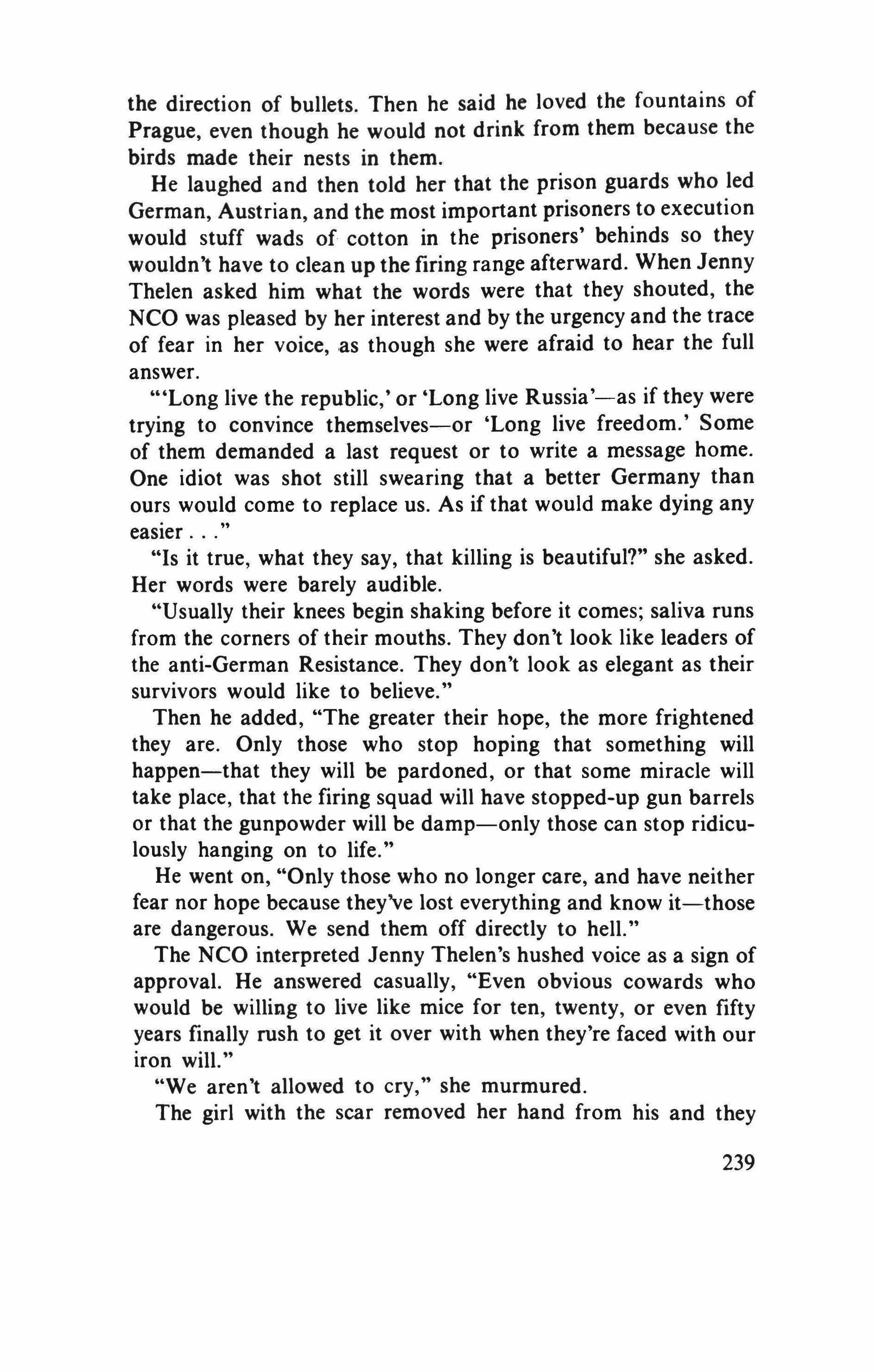
the direction of bullets. Then he said he loved the fountains of Prague, even though he would not drink from them because the birds made their nests in them.
He laughed and then told her that the prison guards who led German, Austrian, and the most important prisoners to execution would stuff wads of cotton in the prisoners' behinds so they wouldn't have to clean up the firing range afterward. When Jenny Thelen asked him what the words were that they shouted, the NCO was pleased by her interest and by the urgency and the trace of fear in her voice, as though she were afraid to hear the full answer.
'''Long live the republic,' or 'Long live Russia'-as if they were trying to convince themselves-or 'Long live freedom.' Some of them demanded a last request or to write a message home. One idiot was shot still swearing that a better Germany than ours would come to replace us. As if that would make dying any easier
"Is it true, what they say, that killing is beautiful?" she asked. Her words were barely audible.
"Usually their knees begin shaking before it comes; saliva runs from the corners of their mouths. They don't look like leaders of the anti-German Resistance. They don't look as elegant as their survivors would like to believe."
Then he added, "The greater their hope, the more frightened they are. Only those who stop hoping that something will happen-that they will be pardoned, or that some miracle will take place, that the firing squad will have stopped-up gun barrels or that the gunpowder will be damp-only those can stop ridiculously hanging on to life."
He went on, "Only those who no longer care, and have neither fear nor hope because they've lost everything and know it-those are dangerous. We send them off directly to hell."
The NCO interpreted Jenny Thelen's hushed voice as a sign of approval. He answered casually, "Even obvious cowards who would be willing to live like mice for ten, twenty, or even fifty years finally rush to get it over with when they're faced with our iron will."
"We aren't allowed to cry," she murmured.
The girl with the scar removed her hand from his and they
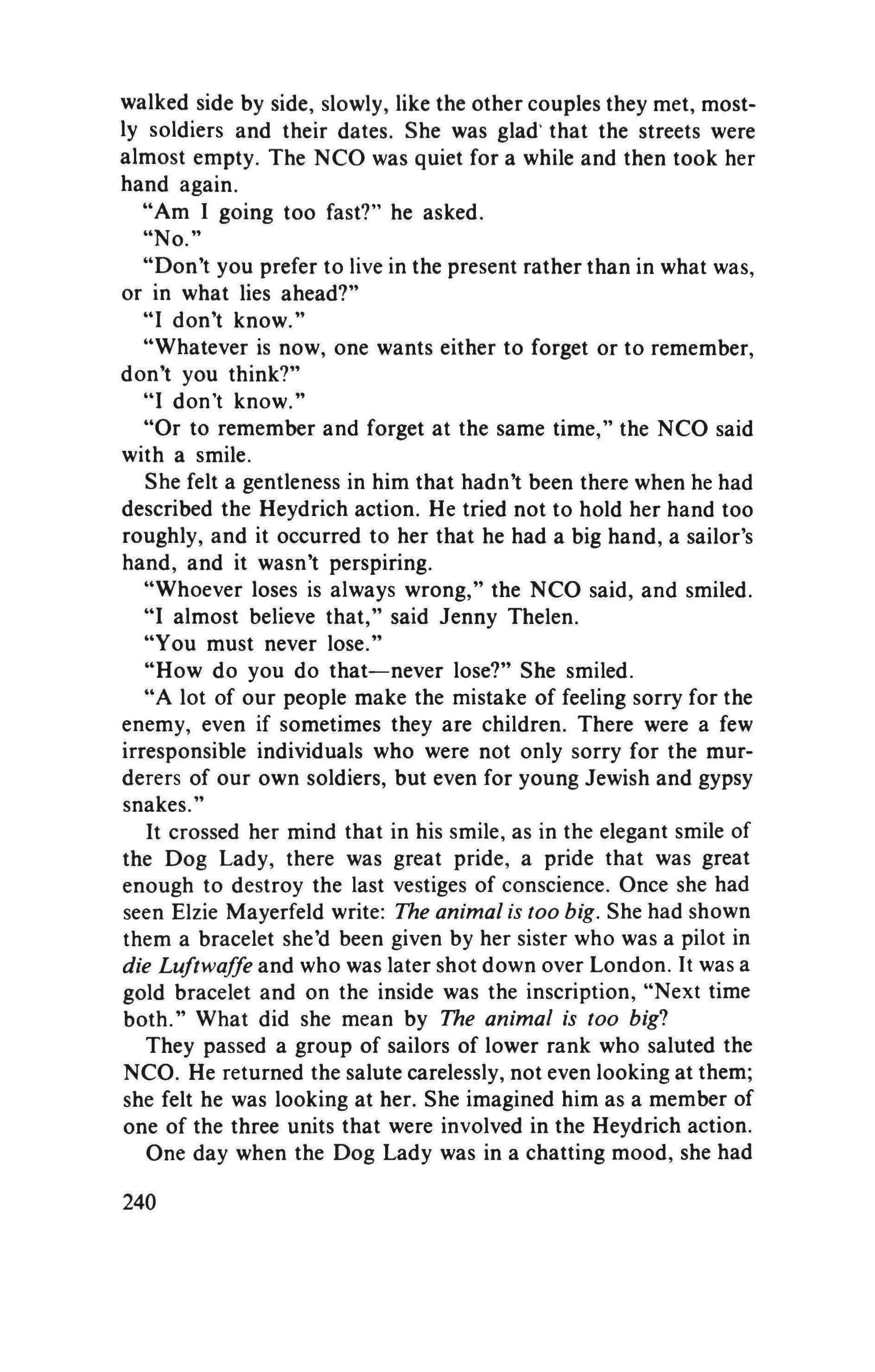
walked side by side, slowly, like the other couples they met, mostly soldiers and their dates. She was glad' that the streets were almost empty. The NCO was quiet for a while and then took her hand again.
"Am 1 going too fast?" he asked.
"No."
"Don't you prefer to live in the present rather than in what was, or in what lies ahead?"
"I don't know."
"Whatever is now, one wants either to forget or to remember, don't you think?"
"I don't know."
"Or to remember and forget at the same time," the NCO said with a smile.
She felt a gentleness in him that hadn't been there when he had described the Heydrich action. He tried not to hold her hand too roughly, and it occurred to her that he had a big hand, a sailor's hand, and it wasn't perspiring.
"Whoever loses is always wrong," the NCO said, and smiled.
"I almost believe that," said Jenny Thelen.
"You must never lose."
"How do you do that-never lose?" She smiled.
"A lot of our people make the mistake of feeling sorry for the enemy, even if sometimes they are children. There were a few irresponsible individuals who were not only sorry for the murderers of our own soldiers, but even for young Jewish and gypsy snakes."
It crossed her mind that in his smile, as in the elegant smile of the Dog Lady, there was great pride, a pride that was great enough to destroy the last vestiges of conscience. Once she had seen Elzie Mayerfeld write: The animal is too big. She had shown them a bracelet she'd been given by her sister who was a pilot in die Luftwaffe and who was later shot down over London. It was a gold bracelet and on the inside was the inscription, "Next time both." What did she mean by The animal is too big?
They passed a group of sailors of lower rank who saluted the NCO. He returned the salute carelessly, not even looking at them; she felt he was looking at her. She imagined him as a member of one of the three units that were involved in the Heydrich action.
One day when the Dog Lady was in a chatting mood, she had 240
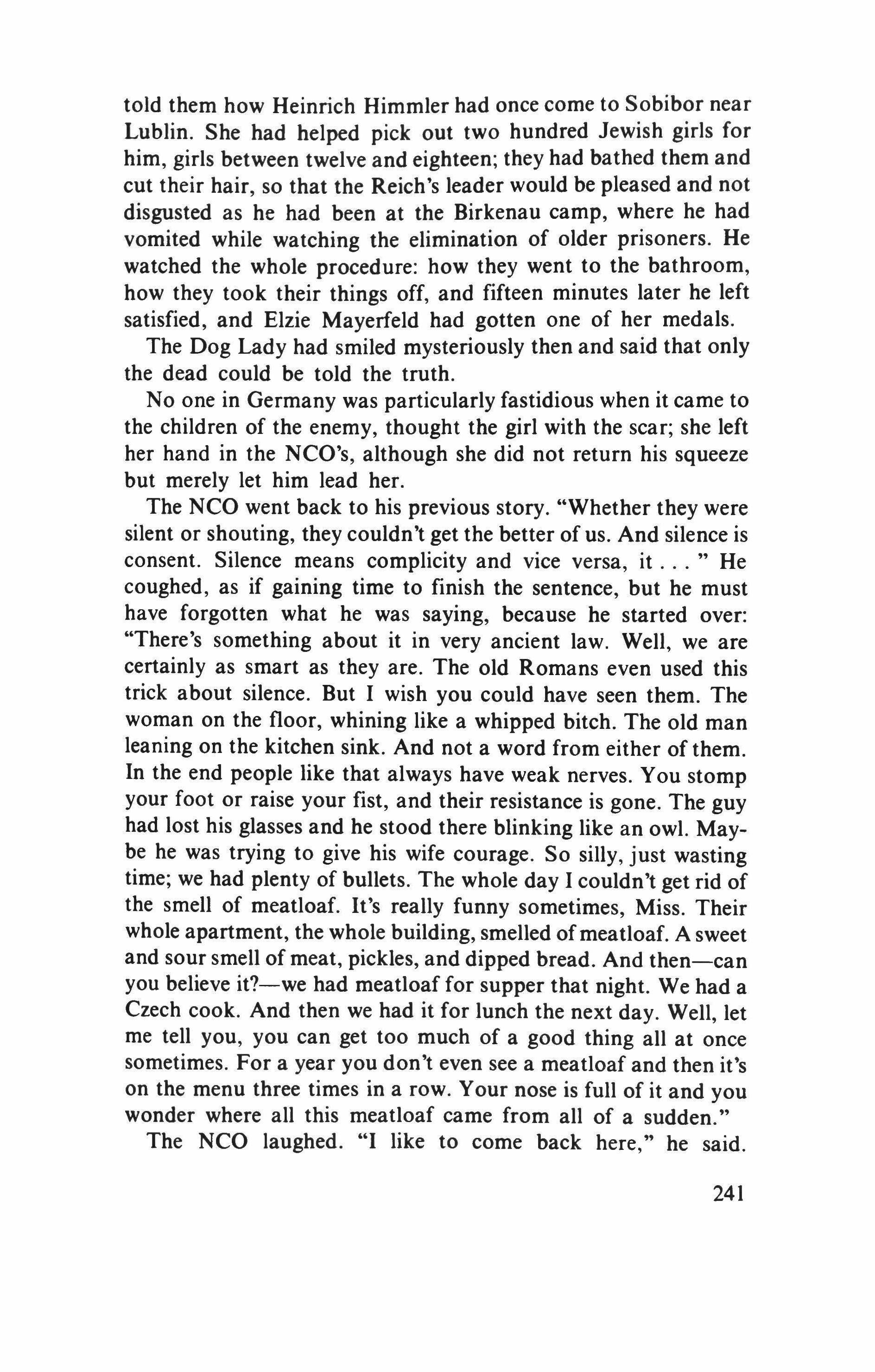
told them how Heinrich Himmler had once come to Sobibor near Lublin. She had helped pick out two hundred Jewish girls for him, girls between twelve and eighteen; they had bathed them and cut their hair, so that the Reich's leader would be pleased and not disgusted as he had been at the Birkenau camp, where he had vomited while watching the elimination of older prisoners. He watched the whole procedure: how they went to the bathroom, how they took their things off, and fifteen minutes later he left satisfied, and Elzie Mayerfeld had gotten one of her medals.
The Dog Lady had smiled mysteriously then and said that only the dead could be told the truth.
No one in Germany was particularly fastidious when it came to the children of the enemy, thought the girl with the scar; she left her hand in the NCO's, although she did not return his squeeze but merely let him lead her.
The NCO went back to his previous story. "Whether they were silent or shouting, they couldn't get the better of us. And silence is consent. Silence means complicity and vice versa, it He coughed, as if gaining time to finish the sentence, but he must have forgotten what he was saying, because he started over: "There's something about it in very ancient law. Well, we are certainly as smart as they are. The old Romans even used this trick about silence. But I wish you could have seen them. The woman on the floor, whining like a whipped bitch. The old man leaning on the kitchen sink. And not a word from either of them. In the end people like that always have weak nerves. You stomp your foot or raise your fist, and their resistance is gone. The guy had lost his glasses and he stood there blinking like an owl. Maybe he was trying to give his wife courage. So silly, just wasting time; we had plenty of bullets. The whole day I couldn't get rid of the smell of meatloaf. It's really funny sometimes, Miss. Their whole apartment, the whole building, smelled ofmeatloaf. A sweet and sour smell of meat, pickles, and dipped bread. And then-can you believe it?-we had meatloaf for supper that night. We had a Czech cook. And then we had it for lunch the next day. Well, let me tell you, you can get too much of a good thing all at once sometimes. For a year you don't even see a meatloaf and then it's on the menu three times in a row. Your nose is full of it and you wonder where all this meatloaf came from all of a sudden."
The NCO laughed. "I like to come back here," he said.

"Prague's never disappointed me. A fellow needs to enjoy himself sometimes. When you're a sailor you don't know what's in store for you next!"
He was looking at the pavement, at the way the pale blue and white stones made a mosaic pattern: diamonds with circles or squares in the middle. The sidewalks of Prague were like stone lace.
"As one of my friends from the Tirpitz used to say, 'You climb Everest only once.'" Then he smiled. "Everyone of our men should have a chance to kill at least one of them. To purify his blood, so to speak, to earn for himself a place among the purest. It's like taking a bath."
His voice was harsh, but it was softening, mellowing in the girl's presence.
"Would you like me to walk slower?" he asked.
Then, thinking that she'd probably like to know more of the details, would probably like him to elaborate-the way he had about the meatloaf-he added: "There was a lot that happened, and if you had time I'm sure I'd remember all the details. We used to give very detailed reports-they're lying around somewherebut 1 can't remember everything now. Sometimes it makes my head reel," he said with a smile, lifting both arms over his head in a boyish gesture. She was happy he had let go of her.
"There were an awful lot of people like that, Miss. We had to put the squeeze on quite a few. But people are like bedbugs. If you allow them to, they'I suck your blood. Particularly if they disgust you or make you afraid; then they'll suck you dry. You've got to have the courage to crush them, and think of meatloaf at the same time.
Then he said, "I don't want to be too serious. That can spoil the pleasure of a walk. 1 hope I'm not boring you."
"Not at all," she answered.
And then he said that sometimes it took a long time before it was all over, and other times only a fraction of a second. "But 1 never envy them, Miss, whether it takes half an hour or just long enough to count to three, like it does when they use electricity to puncture the skulls of cattle in the slaughterhouse."
He knew how to command, he said, because he knew how to obey. He told her that their evening stroll through the city was just as stimulating for him as sailing the high seas, just as exciting

as fighting and feeling death in your bones. Then he thought he might have overdone it; his voice mellowed and he asked her if she knew anything about the stars. When she answered no, he told her about the constellations over the North Sea.
The city was swimming in a cool, fresh breeze. The NCO inhaled deeply and exhaled slowly. He said the air tasted like honeyed wine. Some cities, he said, looked like resorts, as though their buildings were old gems. He was happy that the heat of the day had let up.
Everything he said seemed very familiar to the girl with the scar, as if she had heard it all before.
"Every place in this city has memories for me, cara mia. Aren't you cold?"
"N0," she said.
"Do you like saying no?" the NCO smiled.
"What do you mean?"
"We can playa game: for every three no's, you have to give me one yes. All right?"
"I don't think so."
The NCO smiled again, as if he'd just trapped her, and then he returned to what had seemed to attract her attention from the beginning. "It took three months to paint the keel of the cruiser Tirpitz, Layers and layers of protective paint. Both of them-the Tirpitz and the Bismarck-are as heavy as any ship in the world. They're huge and unsinkable, like enormous, floating ice floes."
The evening dusk was slowly thickening. Scattered clouds appeared in the sky and the moon penetrated them sharply, as if it were looking at them through a torn curtain.
"I'm leaving tonight," said the NCO.
"For where?"
"Kiel.
"Going to sea?"
"I'm a sailor," the NCO smiled.
"The sea must be beautiful," she answered, awestruck like a child.
"Wonderful," he agreed. He knew it was beautiful, even for people who had never actually seen it. You could hear all of this in the way he said wonderful. Her silence seemed to indicate admiration and questions she was afraid to ask. Perhaps it was the helplessness of asking and waiting for a reply that frightened
243
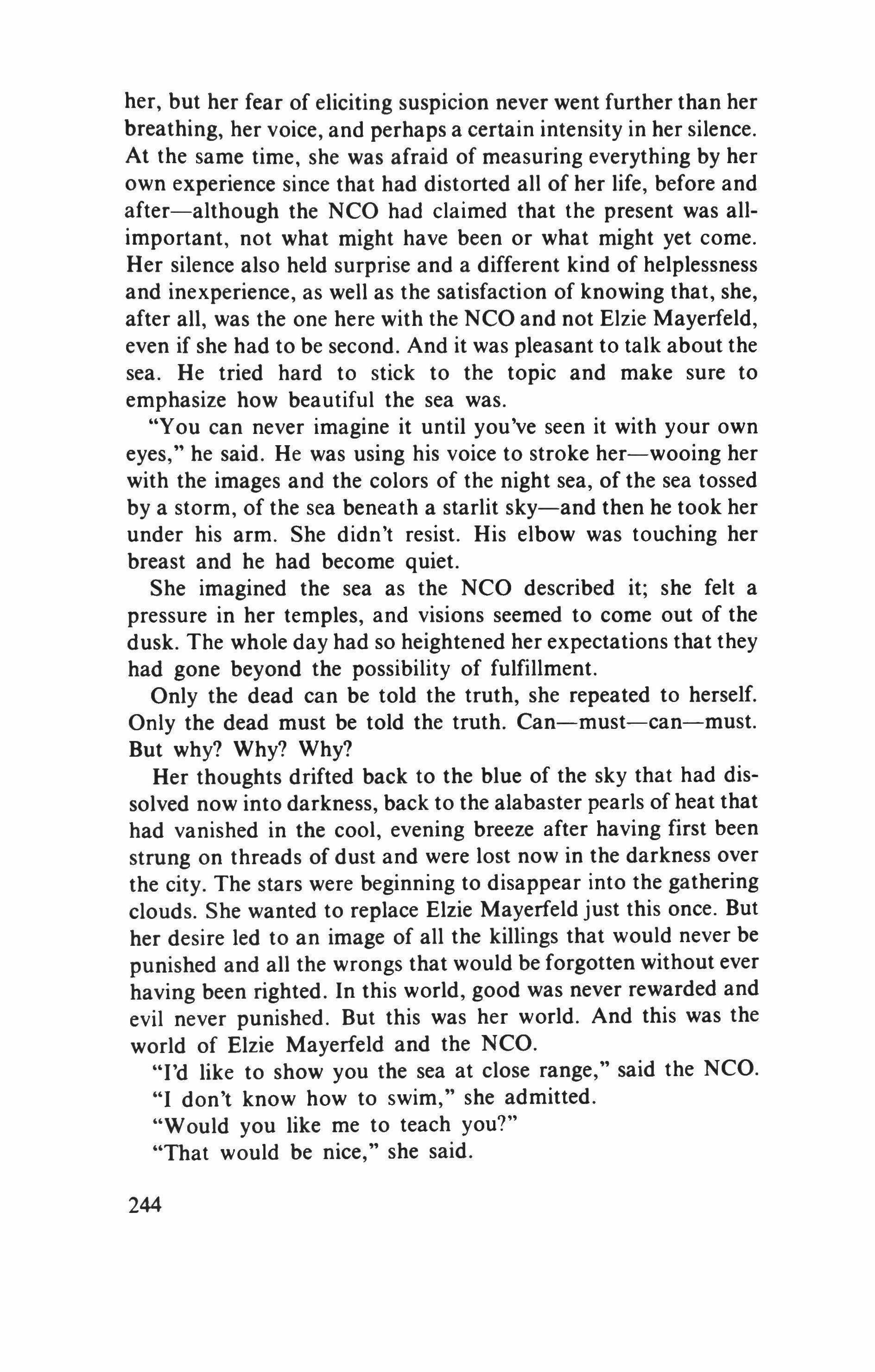
her, but her fear of eliciting suspicion never went further than her breathing, her voice, and perhaps a certain intensity in her silence. At the same time, she was afraid of measuring everything by her own experience since that had distorted all of her life, before and after-although the NCO had claimed that the present was allimportant, not what might have been or what might yet come. Her silence also held surprise and a different kind of helplessness and inexperience, as well as the satisfaction of knowing that, she, after all, was the one here with the NCO and not Elzie Mayerfeld, even if she had to be second. And it was pleasant to talk about the sea. He tried hard to stick to the topic and make sure to emphasize how beautiful the sea was.
"You can never imagine it until you've seen it with your own eyes," he said. He was using his voice to stroke her-wooing her with the images and the colors of the night sea, of the sea tossed by a storm, of the sea beneath a starlit sky-and then he took her under his arm. She didn't resist. His elbow was touching her breast and he had become quiet.
She imagined the sea as the NCO described it; she felt a pressure in her temples, and visions seemed to come out of the dusk. The whole day had so heightened her expectations that they had gone beyond the possibility of fulfillment.
Only the dead can be told the truth, she repeated to herself. Only the dead must be told the truth. Can-must-can-must.
Her thoughts drifted back to the blue of the sky that had dissolved now into darkness, back to the alabaster pearls of heat that had vanished in the cool, evening breeze after having first been strung on threads of dust and were lost now in the darkness over the city. The stars were beginning to disappear into the gathering clouds. She wanted to replace Elzie Mayerfeld just this once. But her desire led to an image of all the killings that would never be punished and all the wrongs that would be forgotten without ever having been righted. In this world, good was never rewarded and evil never punished. But this was her world. And this was the world of Elzie Mayerfeld and the NCO.
"I'd like to show you the sea at close range," said the NCO.
"I don't know how to swim," she admitted.
"Would you like me to teach you?"
"That would be nice," she said.
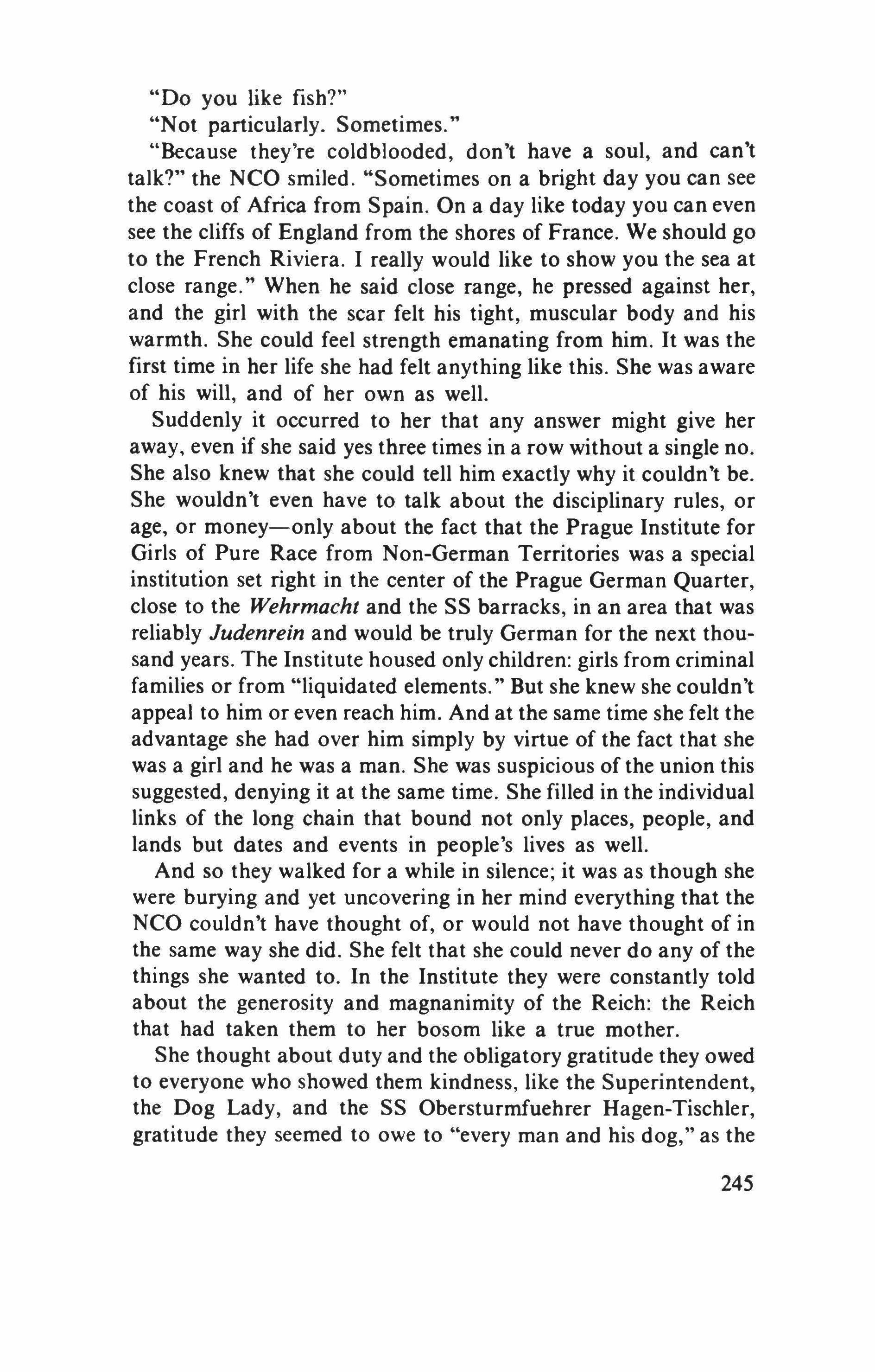
"Do you like fish?"
"Not particularly. Sometimes."
"Because they're coldblooded, don't have a soul, and can't talk?" the NCO smiled. "Sometimes on a bright day you can see the coast of Africa from Spain. On a day like today you can even see the cliffs of England from the shores of France. We should go to the French Riviera. I really would like to show you the sea at close range." When he said close range, he pressed against her, and the girl with the scar felt his tight, muscular body and his warmth. She could feel strength emanating from him. It was the first time in her life she had felt anything like this. She was aware of his will, and of her own as well.
Suddenly it occurred to her that any answer might give her away, even if she said yes three times in a row without a single no. She also knew that she could tell him exactly why it couldn't be. She wouldn't even have to talk about the disciplinary rules, or age, or money-only about the fact that the Prague Institute for Girls of Pure Race from Non-German Territories was a special institution set right in the center of the Prague German Quarter, close to the Wehrmacht and the SS barracks, in an area that was reliably Judenrein and would be truly German for the next thousand years. The Institute housed only children: girls from criminal families or from "liquidated elements." But she knew she couldn't appeal to him or even reach him. And at the same time she felt the advantage she had over him simply by virtue of the fact that she was a girl and he was a man. She was suspicious of the union this suggested, denying it at the same time. She filled in the individual links of the long chain that bound not only places, people, and lands but dates and events in people's lives as well.
And so they walked for a while in silence; it was as though she were burying and yet uncovering in her mind everything that the NCO couldn't have thought of, or would not have thought of in the same way she did. She felt that she could never do any of the things she wanted to. In the Institute they were constantly told about the generosity and magnanimity of the Reich: the Reich that had taken them to her bosom like a true mother.
She thought about duty and the obligatory gratitude they owed to everyone who showed them kindness, like the Superintendent, the Dog Lady, and the SS Obersturmfuehrer Hagen-Tischler, gratitude they seemed to owe to "every man and his dog," as the 245
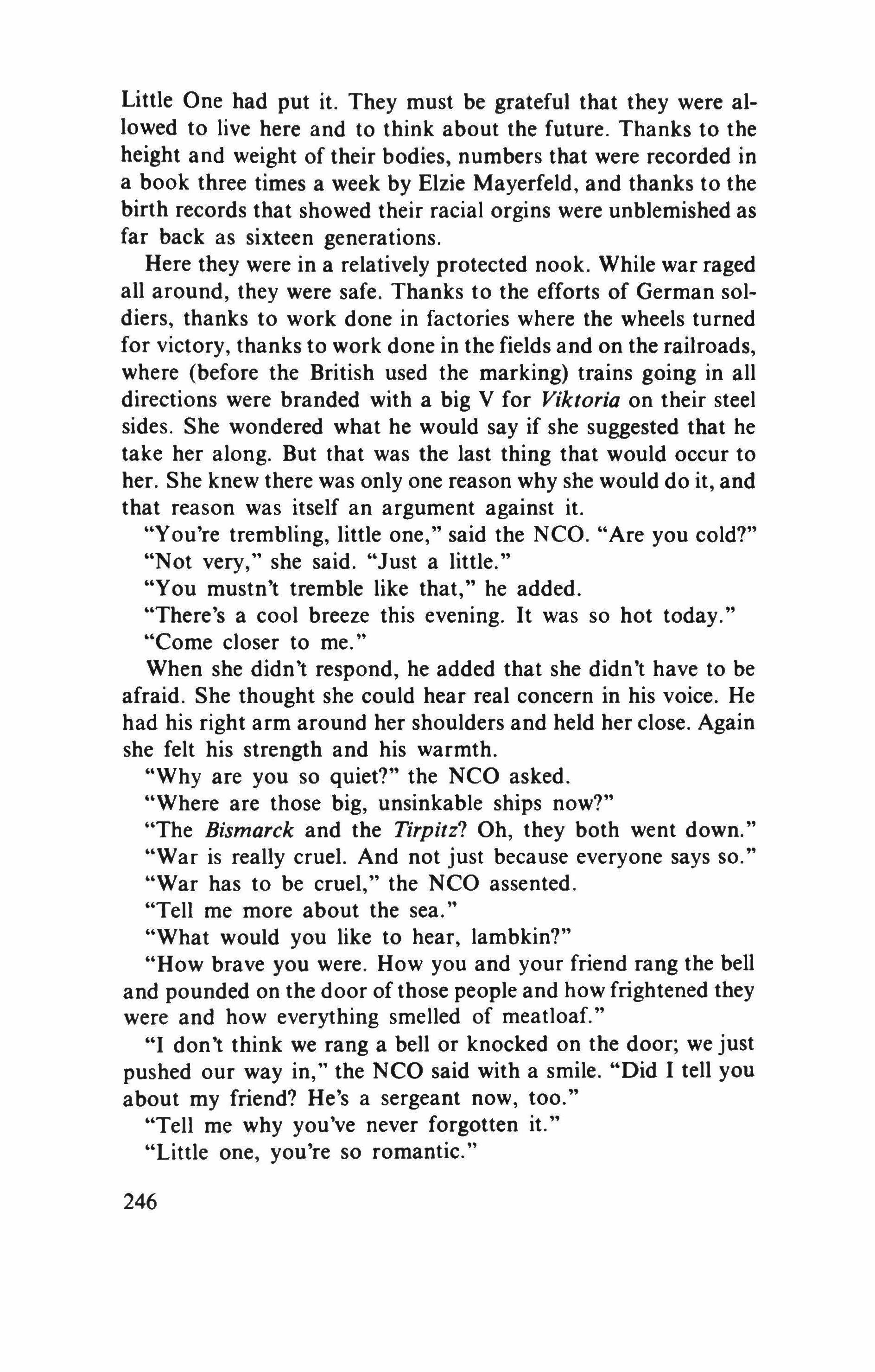
Little One had put it. They must be grateful that they were allowed to live here and to think about the future. Thanks to the height and weight of their bodies, numbers that were recorded in a book three times a week by Elzie Mayerfeld, and thanks to the birth records that showed their racial orgins were unblemished as far back as sixteen generations.
Here they were in a relatively protected nook. While war raged all around, they were safe. Thanks to the efforts of German soldiers, thanks to work done in factories where the wheels turned for victory, thanks to work done in the fields and on the railroads, where (before the British used the marking) trains going in all directions were branded with a big V for Viktoria on their steel sides. She wondered what he would say if she suggested that he take her along. But that was the last thing that would occur to her. She knew there was only one reason why she would do it, and that reason was itself an argument against it.
"You're trembling, little one," said the NCO. "Are you cold?"
"Not very," she said. "Just a little."
"You mustn't tremble like that," he added.
"There's a cool breeze this evening. It was so hot today."
"Come closer to me."
When she didn't respond, he added that she didn't have to be afraid. She thought she could hear real concern in his voice. He had his right arm around her shoulders and held her close. Again she felt his strength and his warmth.
"Why are you so quiet?" the NCO asked.
"Where are those big, unsinkable ships now?"
"The Bismarck and the Tirpitz? Oh, they both went down."
"War is really cruel. And not just because everyone says so."
"War has to be cruel," the NCO assented.
"Tell me more about the sea."
"What would you like to hear, lambkin?"
"How brave you were. How you and your friend rang the bell and pounded on the door of those people and how frightened they were and how everything smelled of meatloaf."
"I don't think we rang a bell or knocked on the door; we just pushed our way in," the NCO said with a smile. "Did I tell you about my friend? He's a sergeant now, too."
"Tell me why you've never forgotten it."
"Little one, you're so romantic."
246
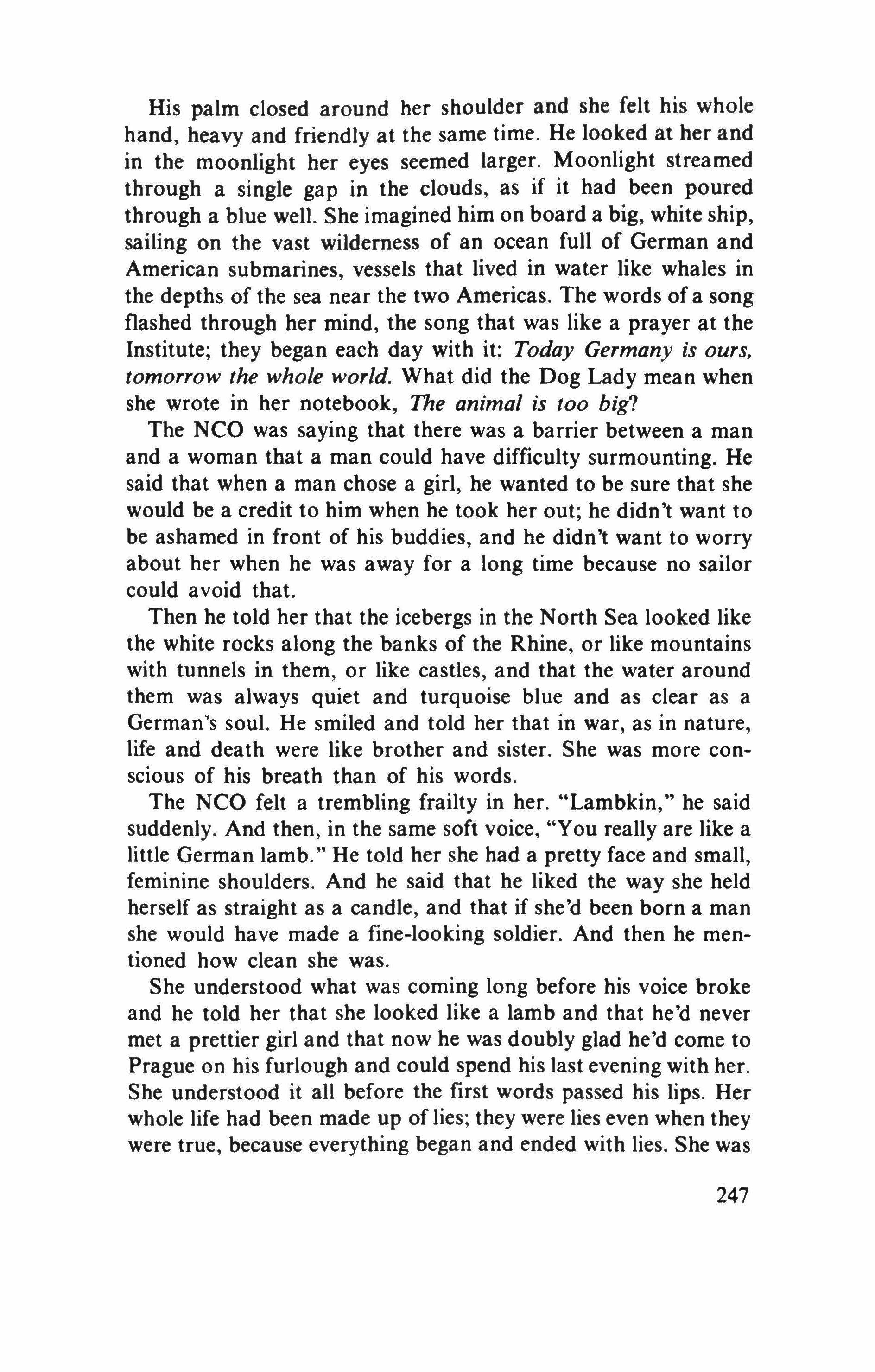
His palm closed around her shoulder and she felt his whole hand, heavy and friendly at the same time. He looked at her and in the moonlight her eyes seemed larger. Moonlight streamed through a single gap in the clouds, as if it had been poured through a blue well. She imagined him on board a big, white ship, sailing on the vast wilderness of an ocean full of German and American submarines, vessels that lived in water like whales in the depths of the sea near the two Americas. The words of a song flashed through her mind, the song that was like a prayer at the Institute; they began each day with it: Today Germany is ours, tomorrow the whole world. What did the Dog Lady mean when she wrote in her notebook, The animal is too big?
The NCO was saying that there was a barrier between a man and a woman that a man could have difficulty surmounting. He said that when a man chose a girl, he wanted to be sure that she would be a credit to him when he took her out; he didn't want to be ashamed in front of his buddies, and he didn't want to worry about her when he was away for a long time because no sailor could avoid that.
Then he told her that the icebergs in the North Sea looked like the white rocks along the banks of the Rhine, or like mountains with tunnels in them, or like castles, and that the water around them was always quiet and turquoise blue and as clear as a German's soul. He smiled and told her that in war, as in nature, life and death were like brother and sister. She was more conscious of his breath than of his words.
The NCO felt a trembling frailty in her. "Lambkin," he said suddenly. And then, in the same soft voice, "You really are like a little German lamb." He told her she had a pretty face and small, feminine shoulders. And he said that he liked the way she held herself as straight as a candle, and that if she'd been born a man she would have made a fine-looking soldier. And then he mentioned how clean she was.
She understood what was coming long before his voice broke and he told her that she looked like a lamb and that he'd never met a prettier girl and that now he was doubly glad he'd come to Prague on his furlough and could spend his last evening with her. She understood it all before the first words passed his lips. Her whole life had been made up of lies; they were lies even when they were true, because everything began and ended with lies. She was
247
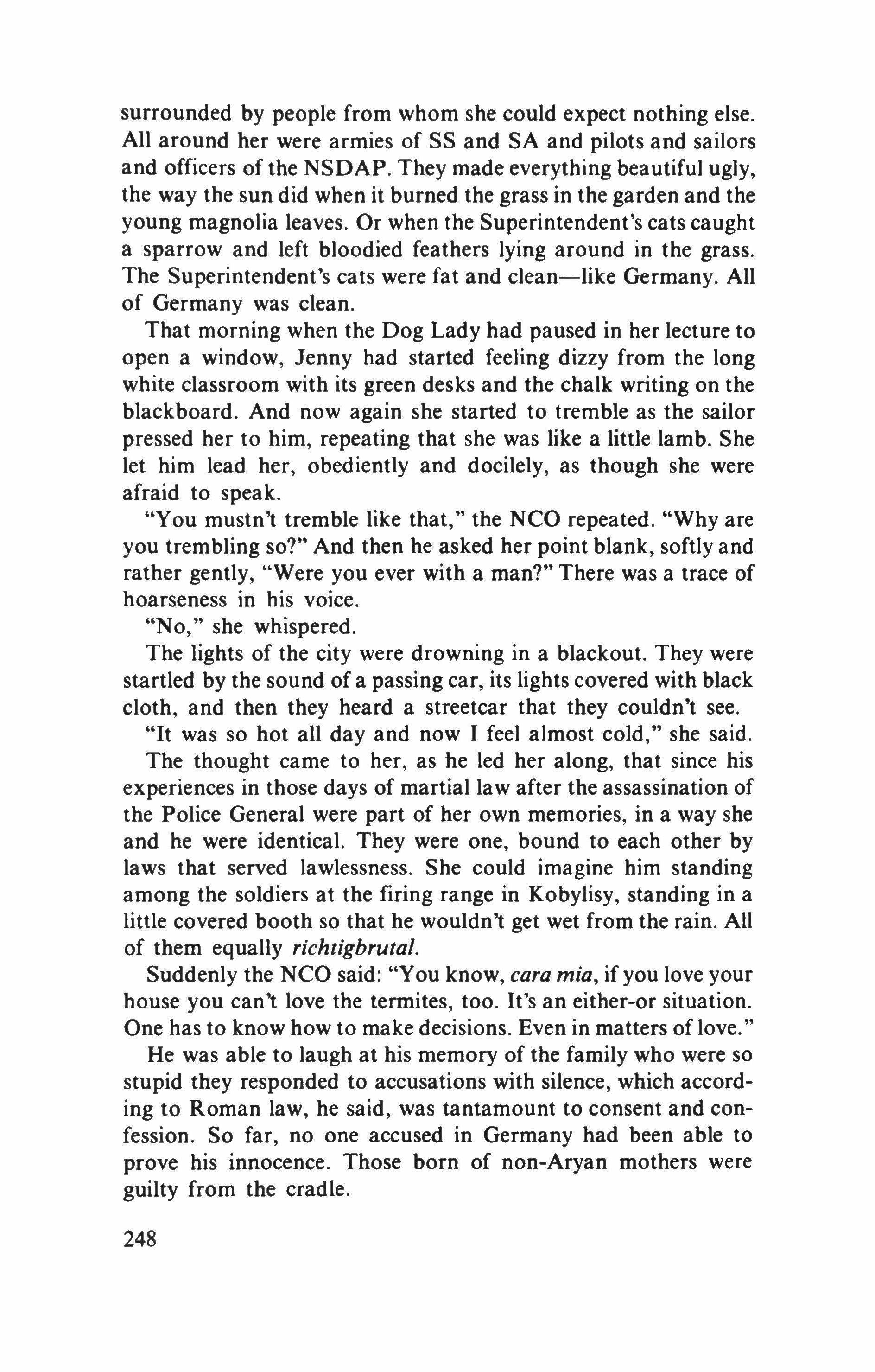
surrounded by people from whom she could expect nothing else. All around her were armies of SS and SA and pilots and sailors and officers of the NSDAP. They made everything beautiful ugly, the way the sun did when it burned the grass in the garden and the young magnolia leaves. Or when the Superintendent's cats caught a sparrow and left bloodied feathers lying around in the grass. The Superintendent's cats were fat and clean-like Germany. All of Germany was clean.
That morning when the Dog Lady had paused in her lecture to open a window, Jenny had started feeling dizzy from the long white classroom with its green desks and the chalk writing on the blackboard. And now again she started to tremble as the sailor pressed her to him, repeating that she was like a little lamb. She let him lead her, obediently and docilely, as though she were afraid to speak.
"You mustn't tremble like that," the NCO repeated. "Why are you trembling so?" And then he asked her point blank, softly and rather gently, "Were you ever with a man?" There was a trace of hoarseness in his voice.
"No," she whispered.
The lights of the city were drowning in a blackout. They were startled by the sound of a passing car, its lights covered with black cloth, and then they heard a streetcar that they couldn't see.
"It was so hot all day and now I feel almost cold," she said.
The thought came to her, as he led her along, that since his experiences in those days of martial law after the assassination of the Police General were part of her own memories, in a way she and he were identical. They were one, bound to each other by laws that served lawlessness. She could imagine him standing among the soldiers at the firing range in Kobylisy, standing in a little covered booth so that he wouldn't get wet from the rain. All of them equally richtigbrutal.
Suddenly the NCO said: "You know, cara mia, if you love your house you can't love the termites, too. It's an either-or situation. One has to know how to make decisions. Even in matters of love. "
He was able to laugh at his memory of the family who were so stupid they responded to accusations with silence, which according to Roman law, he said, was tantamount to consent and confession. So far, no one accused in Germany had been able to prove his innocence. Those born of non-Aryan mothers were guilty from the cradle.

What did he want from her, what did he expect for a few sweet words and a cara mia? And what was she prepared to give him? She had known for a long time that behind every wrong there were a thousand-and-one explanations. Her father at the kitchen sink collapsed in shame, her mother on the floor and the whiz of a dog leash in the air. How could SS Obersturmfuehrer HagenTischler say that for a few steins of beer, for a string of warm knockwurst and a vacation bonus, survivors in the conquered nations would be happy to forget what would be dangerous for them to remember?
Sometimes you wanted to forget so that you wouldn't feel like a walking cemetery. But you couldn't, and the memories stayed inside of you for as long as you moved and felt and thought. In the laboratories in eastern Germany, they had learned how to change brown eyes to blue and how to make curly gypsy hair straight and blond, but so far no one had learned how to replace people's minds. Maybe it was like the constancy of breath, while you were alive. You heard the sound of a mandolin somewhere, or you met a strange face with nickel-rimmed glasses and you saw the likeness and it frightened you; for you recognized something in the chance sight of a tree, a stone, or a star. Or you heard it in someone else's voice. You couldn't get rid of it as long as you lived.
According to Julie, people eventually stopped caring about where the soap they used came from when they couldn't get any other. She felt dizzy and trembled at her own thoughts. She tried again to imagine the enormous ships, the freighters and cruisers; were they like the steamboats with paddle wheels that used to run up and down the Moldau? Once her family took a ride on one of those boats-she, her father and mother and their neighbor and his three daughters.
"The girl of a craftsman will have it pretty good after the war," the NCO added to something she must have missed. "Our Fuehrer is a craftsman, too. 'A trade is a handful of gold,' as they say, Miss. If I had the opportunity, I could be a driver; I know quite a bit about car engines. And I could do quite well as a painter. Lately I've been thinking that the war will be over sometime and that I ought to start looking around."
She didn't know how to respond, and the NCO added, "Of course this isn't exactly the best time for serious commitments or marriage.
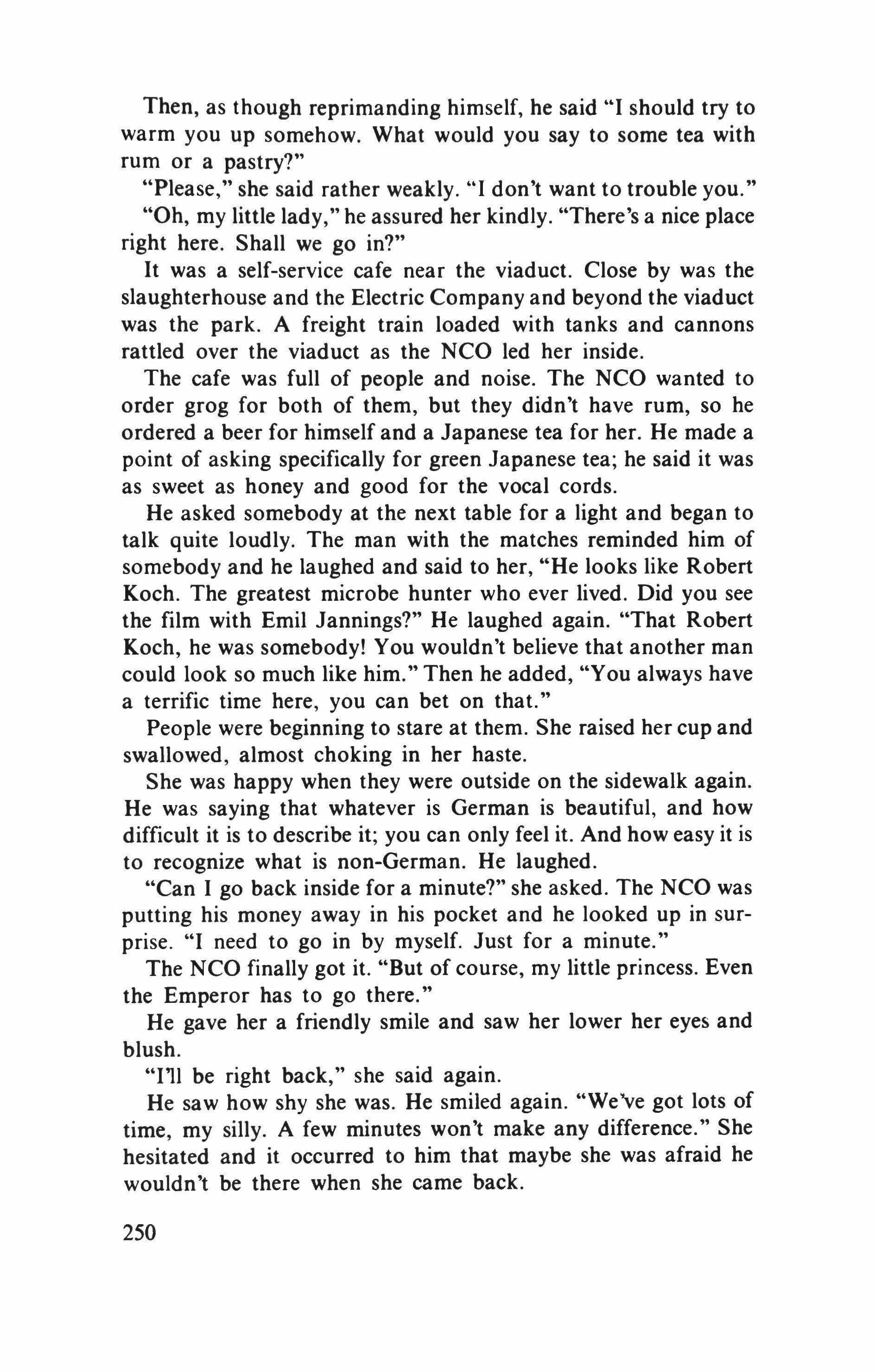
Then, as though reprimanding himself, he said "I should try to warm you up somehow. What would you say to some tea with rum or a pastry?"
"Please," she said rather weakly. "I don't want to trouble you."
"Oh, my little lady," he assured her kindly. "There's a nice place right here. Shall we go in?"
It was a self-service cafe near the viaduct. Close by was the slaughterhouse and the Electric Company and beyond the viaduct was the park. A freight train loaded with tanks and cannons rattled over the viaduct as the NCO led her inside.
The cafe was full of people and noise. The NCO wanted to order grog for both of them, but they didn't have rum, so he ordered a beer for himself and a Japanese tea for her. He made a point of asking specifically for green Japanese tea; he said it was as sweet as honey and good for the vocal cords.
He asked somebody at the next table for a light and began to talk quite loudly. The man with the matches reminded him of somebody and he laughed and said to her, "He looks like Robert Koch. The greatest microbe hunter who ever lived. Did you see the film with Emil Jannings?" He laughed again. "That Robert Koch, he was somebody! You wouldn't believe that another man could look so much like him." Then he added, "You always have a terrific time here, you can bet on that."
People were beginning to stare at them. She raised her cup and swallowed, almost choking in her haste.
She was happy when they were outside on the sidewalk again. He was saying that whatever is German is beautiful, and how difficult it is to describe it; you can only feel it. And how easy it is to recognize what is non-German. He laughed.
"Can I go back inside for a minute?" she asked. The NCO was putting his money away in his pocket and he looked up in surprise. "I need to go in by myself. Just for a minute."
The NCO finally got it. "But of course, my little princess. Even the Emperor has to go there."
He gave her a friendly smile and saw her lower her eyes and blush.
"I'll be right back," she said again.
He saw how shy she was. He smiled again. "We've got lots of time, my silly. A few minutes won't make any difference." She hesitated and it occurred to him that maybe she was afraid he wouldn't be there when she came back.
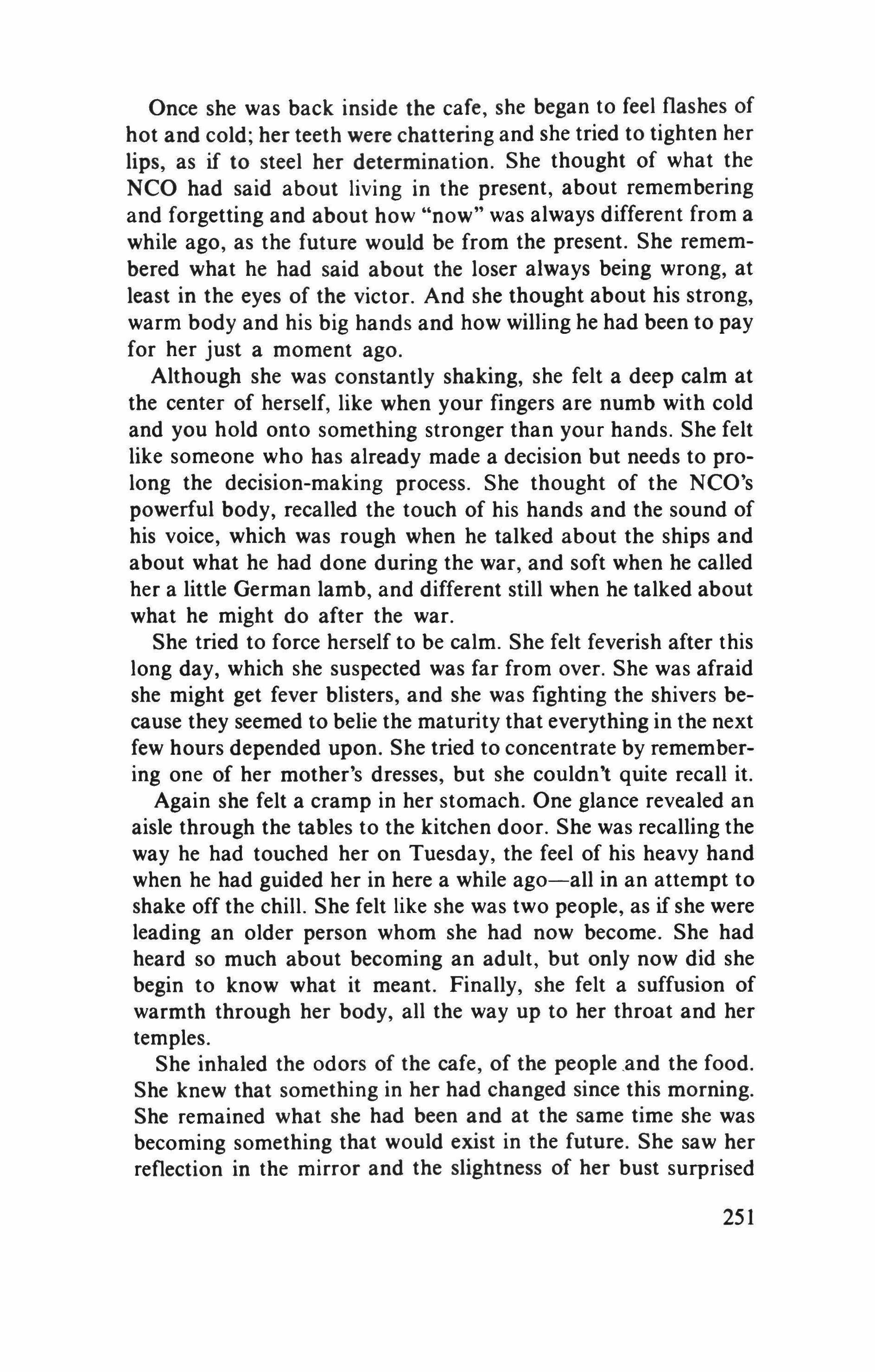
Once she was back inside the cafe, she began to feel flashes of hot and cold; her teeth were chattering and she tried to tighten her lips, as if to steel her determination. She thought of what the NCO had said about living in the present, about remembering and forgetting and about how "now" was always different from a while ago, as the future would be from the present. She remembered what he had said about the loser always being wrong, at least in the eyes of the victor. And she thought about his strong, warm body and his big hands and how willing he had been to pay for her just a moment ago.
Although she was constantly shaking, she felt a deep calm at the center of herself, like when your fingers are numb with cold and you hold onto something stronger than your hands. She felt like someone who has already made a decision but needs to prolong the decision-making process. She thought of the NCO's powerful body, recalled the touch of his hands and the sound of his voice, which was rough when he talked about the ships and about what he had done during the war, and soft when he called her a little German lamb, and different still when he talked about what he might do after the war.
She tried to force herself to be calm. She felt feverish after this long day, which she suspected was far from over. She was afraid she might get fever blisters, and she was fighting the shivers because they seemed to belie the maturity that everything in the next few hours depended upon. She tried to concentrate by remembering one of her mother's dresses, but she couldn't quite recall it.
Again she felt a cramp in her stomach. One glance revealed an aisle through the tables to the kitchen door. She was recalling the way he had touched her on Tuesday, the feel of his heavy hand when he had guided her in here a while ago-all in an attempt to shake off the chill. She felt like she was two people, as if she were leading an older person whom she had now become. She had heard so much about becoming an adult, but only now did she begin to know what it meant. Finally, she felt a suffusion of warmth through her body, all the way up to her throat and her temples.
She inhaled the odors of the cafe, of the people and the food. She knew that something in her had changed since this morning. She remained what she had been and at the same time she was becoming something that would exist in the future. She saw her reflection in the mirror and the slightness of her bust surprised
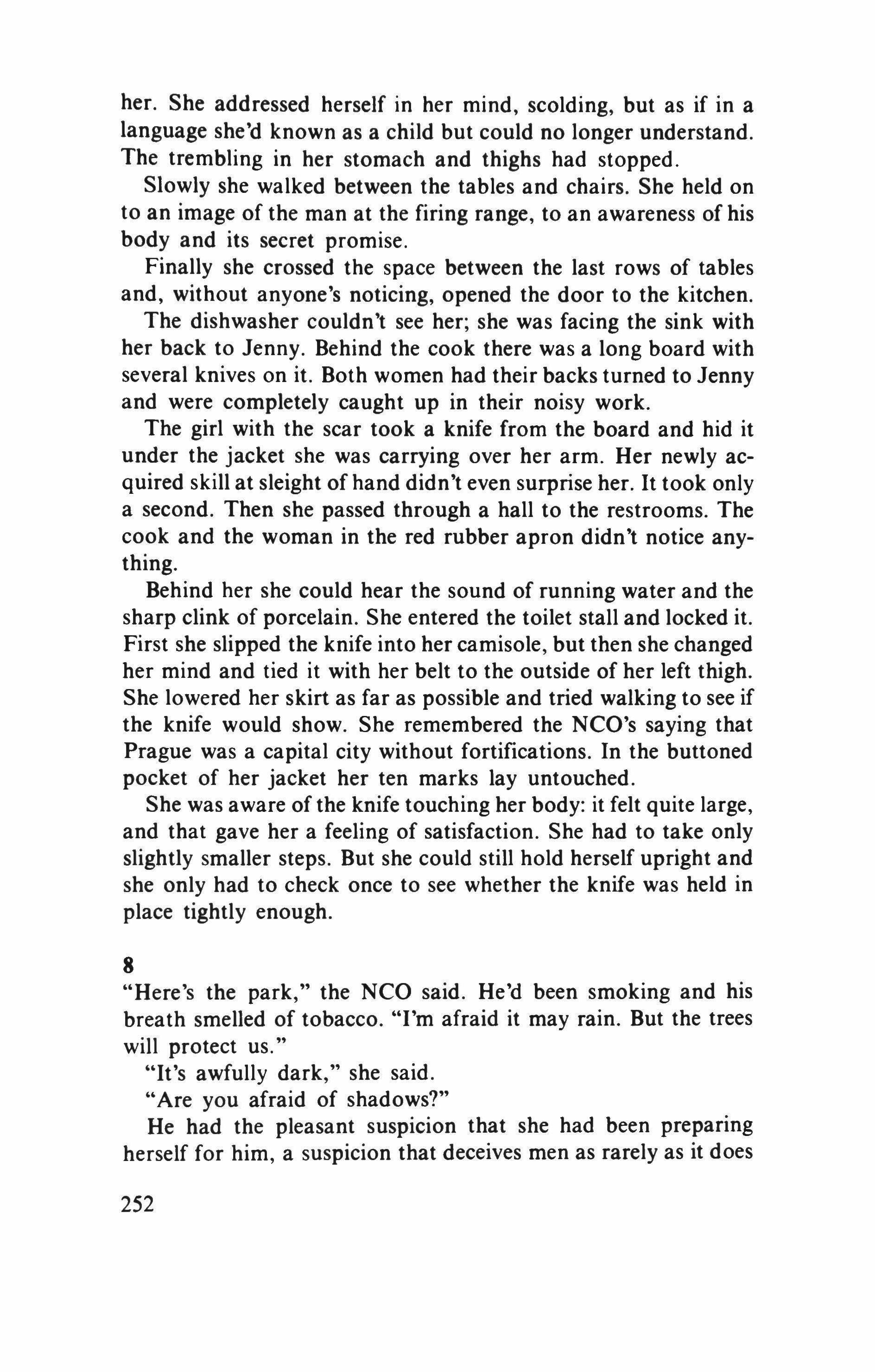
her. She addressed herself in her mind, scolding, but as if in a language she'd known as a child but could no longer understand. The trembling in her stomach and thighs had stopped.
Slowly she walked between the tables and chairs. She held on to an image of the man at the firing range, to an awareness of his body and its secret promise.
Finally she crossed the space between the last rows of tables and, without anyone's noticing, opened the door to the kitchen.
The dishwasher couldn't see her; she was facing the sink with her back to Jenny. Behind the cook there was a long board with several knives on it. Both women had their backs turned to Jenny and were completely caught up in their noisy work.
The girl with the scar took a knife from the board and hid it under the jacket she was carrying over her arm. Her newly acquired skill at sleight of hand didn't even surprise her. It took only a second. Then she passed through a hall to the restrooms. The cook and the woman in the red rubber apron didn't notice anything.
Behind her she could hear the sound of running water and the sharp clink of porcelain. She entered the toilet stall and locked it. First she slipped the knife into her camisole, but then she changed her mind and tied it with her belt to the outside of her left thigh. She lowered her skirt as far as possible and tried walking to see if the knife would show. She remembered the NCO's saying that Prague was a capital city without fortifications. In the buttoned pocket of her jacket her ten marks lay untouched.
She was aware of the knife touching her body: it felt quite large, and that gave her a feeling of satisfaction. She had to take only slightly smaller steps. But she could still hold herself upright and she only had to check once to see whether the knife was held in place tightly enough.
8
"Here's the park," the NCO said. He'd been smoking and his breath smelled of tobacco. "I'm afraid it may rain. But the trees will protect us."
"It's awfully dark," she said.
"Are you afraid of shadows?"
He had the pleasant suspicion that she had been preparing herself for him, a suspicion that deceives men as rarely as it does
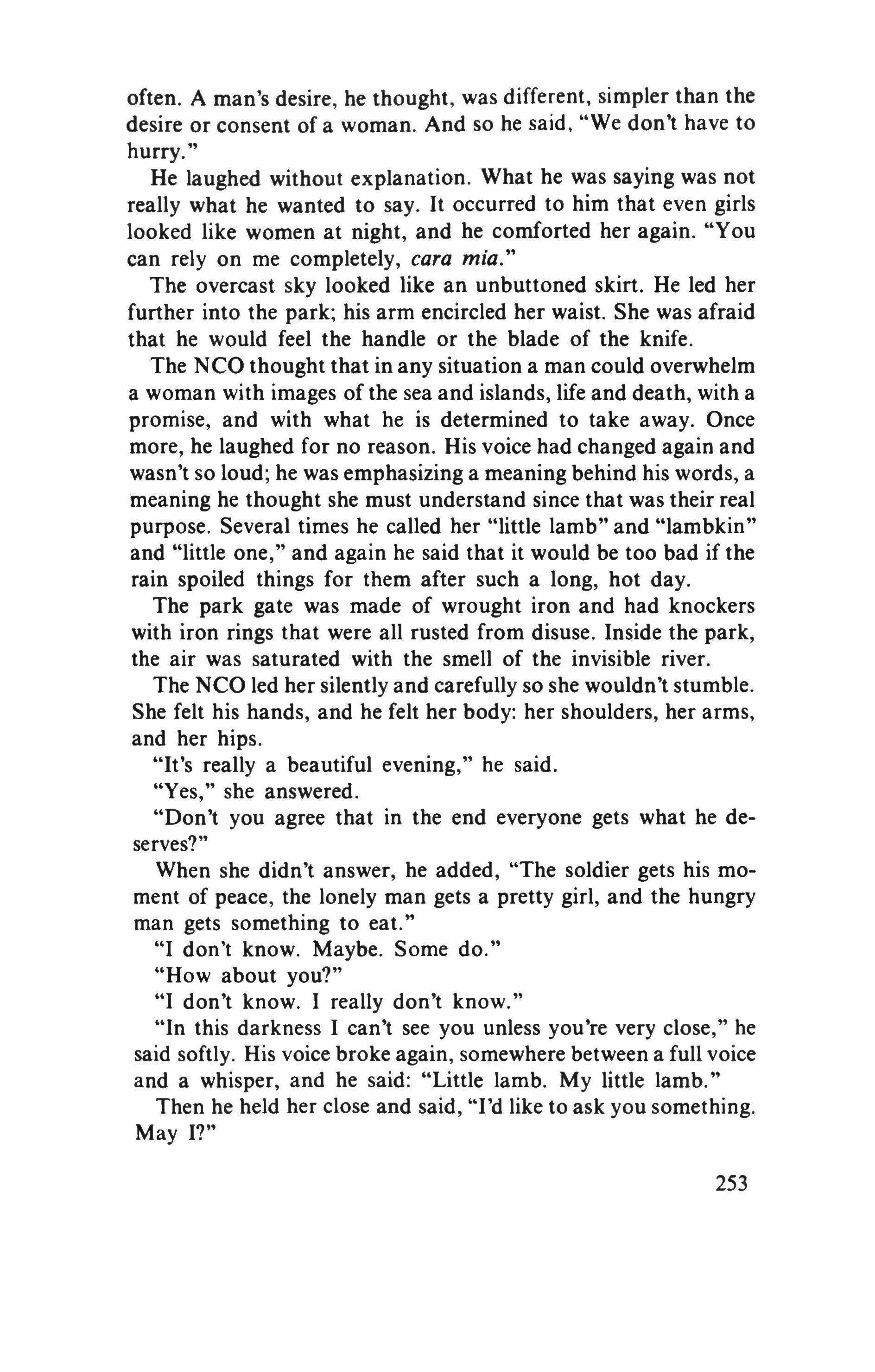
often. A man's desire, he thought, was different, simpler than the desire or consent of a woman. And so he said. "We don't have to hurry."
He laughed without explanation. What he was saying was not really what he wanted to say. It occurred to him that even girls looked like women at night, and he comforted her again. "You can rely on me completely, cara mia,"
The overcast sky looked like an unbuttoned skirt. He led her further into the park; his arm encircled her waist. She was afraid that he would feel the handle or the blade of the knife.
The NCO thought that in any situation a man could overwhelm a woman with images of the sea and islands, life and death, with a promise, and with what he is determined to take away. Once more, he laughed for no reason. His voice had changed again and wasn't so loud; he was emphasizing a meaning behind his words, a meaning he thought she must understand since that was their real purpose. Several times he called her "little lamb" and "lambkin" and "little one," and again he said that it would be too bad if the rain spoiled things for them after such a long, hot day.
The park gate was made of wrought iron and had knockers with iron rings that were all rusted from disuse. Inside the park, the air was saturated with the smell of the invisible river.
The NCO led her silently and carefully so she wouldn't stumble. She felt his hands, and he felt her body: her shoulders, her arms, and her hips.
"It's really a beautiful evening," he said.
"Yes," she answered.
"Don't you agree that in the end everyone gets what he deserves?"
When she didn't answer, he added, "The soldier gets his moment of peace, the lonely man gets a pretty girl, and the hungry man gets something to eat."
"I don't know. Maybe. Some do."
"How about you?"
"I don't know. I really don't know."
"In this darkness I can't see you unless you're very close," he said softly. His voice broke again, somewhere between a full voice and a whisper, and he said: "Little lamb. My little lamb."
Then he held her close and said, "I'd like to ask you something. May I?"
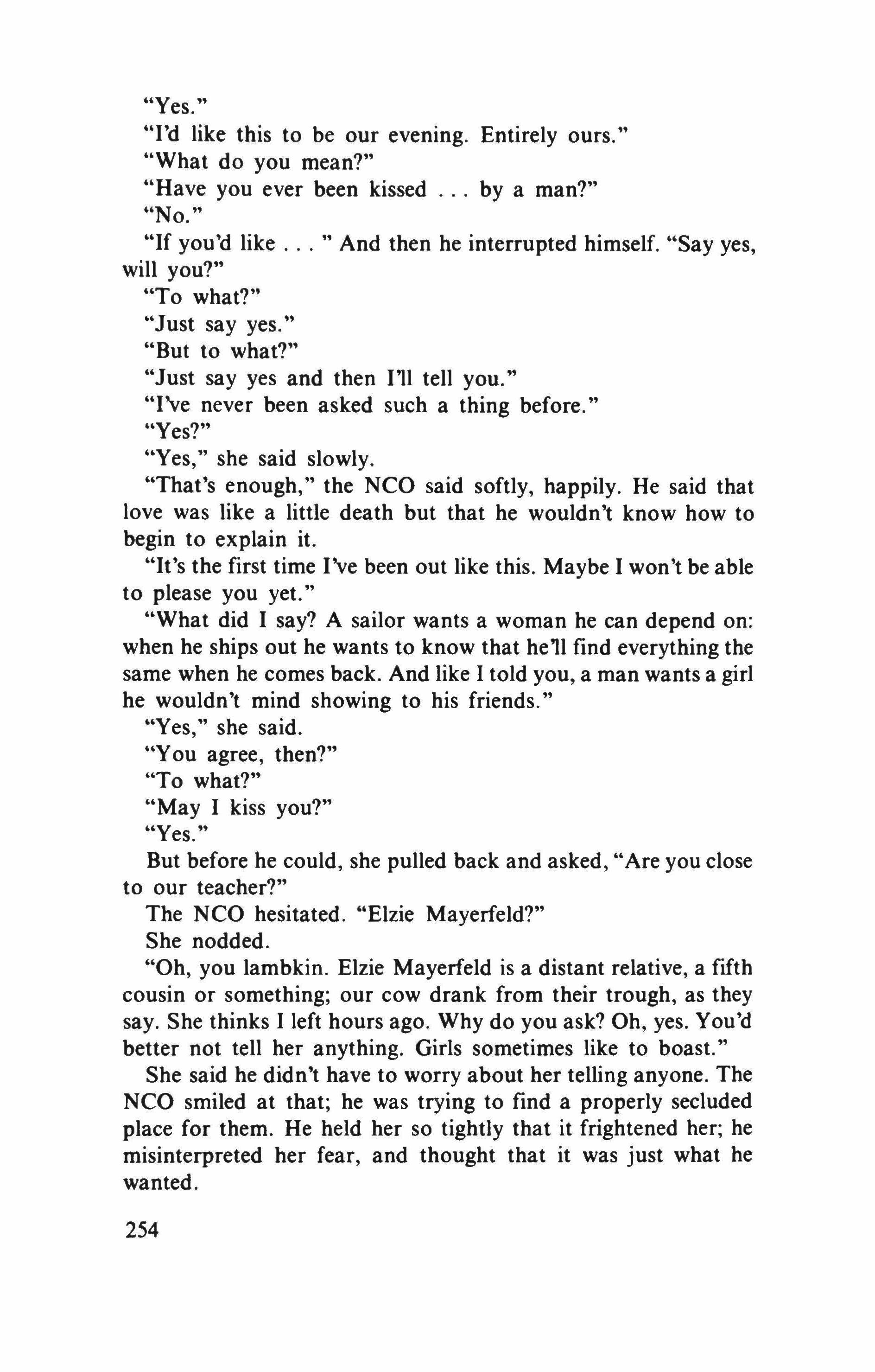
"Yes."
"I'd like this to be our evening. Entirely ours."
"What do you mean?"
"Have you ever been kissed by a man?" "No."
"If you'd like And then he interrupted himself. "Say yes, will you?"
"To what?"
"Just say yes."
"But to what?"
"Just say yes and then 111 tell you."
"I've never been asked such a thing before." "Yes?"
"Yes," she said slowly.
"That's enough," the NCO said softly, happily. He said that love was like a little death but that he wouldn't know how to begin to explain it.
"It's the first time I've been out like this. Maybe I won't be able to please you yet."
"What did I say? A sailor wants a woman he can depend on: when he ships out he wants to know that he'll find everything the same when he comes back. And like I told you, a man wants a girl he wouldn't mind showing to his friends."
"Yes," she said.
"You agree, then?"
"To what?"
"May I kiss you?"
"Yes."
But before he could, she pulled back and asked, "Are you close to our teacher?"
The NCO hesitated. "Elzie Mayerfeld?"
She nodded.
"Oh, you lambkin. Elzie Mayerfeld is a distant relative, a fifth cousin or something; our cow drank from their trough, as they say. She thinks I left hours ago. Why do you ask? Oh, yes. You'd better not tell her anything. Girls sometimes like to boast."
She said he didn't have to worry about her telling anyone. The NCO smiled at that; he was trying to find a properly secluded place for them. He held her so tightly that it frightened her; he misinterpreted her fear, and thought that it was just what he wanted.

She could feel his hot breath and his strong hand. Then he was leaning over her, whispering, "Would you like me to be very, very close to you?" His whisper was more penetrating and insistent than before.
"Yes," she whispered back.
He led her away from the walk, over the grass and into some shrubbery. The ground was damp and crumbly, wet with the evening dew. She seemed to him compliant and soft, excited by the nearness and the increasing intimacy of a man who could no longer be refused. He knew that was why she was trembling. Her lips were pressed tightly together, and even that he saw only as the anxiety of inexperience.
Her heart was pounding. And she could hear another pounding mixed with the sound of her heart. She repeated to herself that every man was guilty of the wrongs he had committed and innocent only in what he had refused or prevented. Suddenly it seemed to her that the whole world was a funnel emptying through its wide, open end into the narrow tube she herself had become.
She watched the NCO while he kissed her, and she saw images of other men in uniforms and leather coats, as if the many had become one, and each individual contained the first and the thousandth. In the dark, she knew, she could keep what she was thinking hidden.
"It will be beautiful," the NCO whispered. "You11 see. It will be just like 1 promised." He caressed her with his palms and his fingertips, touching her cheeks and around her lips and then brushing his fingers over her forehead and stroking her scar.
She let him do it. She felt blood rushing to her cheeks. She was thinking of blood, terrified of what she could see in her imagination.
"Did they hurt you?" he asked. Then added hoarsely: "I won't let anyone hurt you. No one will ever hurt you again."
With both hands he caressed her cheeks, and her shoulders, and finally her breasts. She knew what was coming and she was afraid he might find the knife.
"We are here alone," the NCO whispered. "I don't want anything bad. Only something we can have together, now, right now. Something we can remember or forget or both. Nothing that would hurt you. You're lovely. You're so lovely We should seize life while we're still young a few stolen moments once or
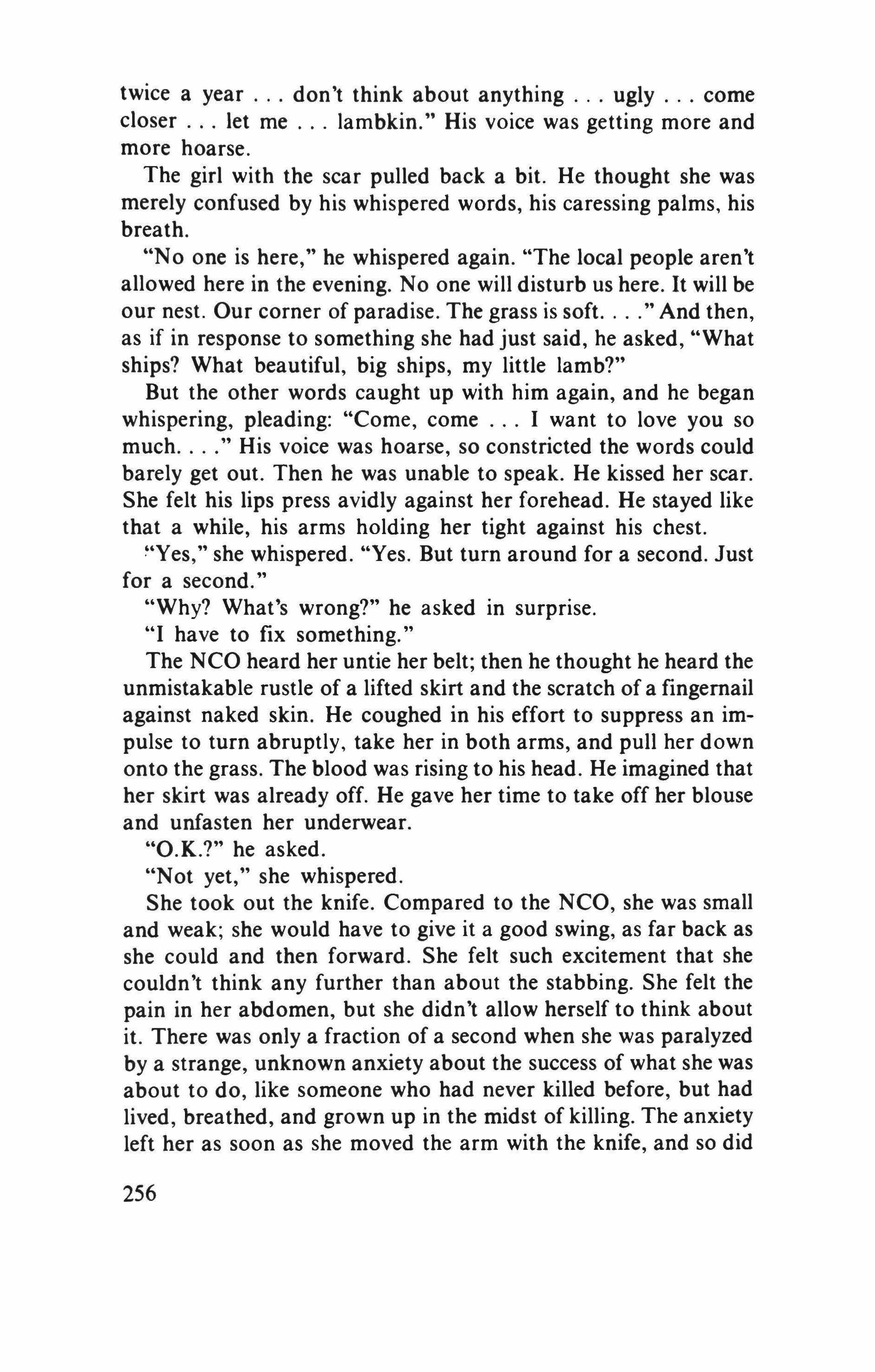
twice a year don't think about anything ugly come closer let me lambkin." His voice was getting more and more hoarse.
The girl with the scar pulled back a bit. He thought she was merely confused by his whispered words, his caressing palms, his breath.
"No one is here," he whispered again. "The local people aren't allowed here in the evening. Noone will disturb us here. It will be our nest. Our corner of paradise. The grass is soft And then, as if in response to something she had just said, he asked, "What ships? What beautiful, big ships, my little lamb?"
But the other words caught up with him again, and he began Whispering, pleading: "Come, come 1 want to love you so much His voice was hoarse, so constricted the words could barely get out. Then he was unable to speak. He kissed her scar. She felt his lips press avidly against her forehead. He stayed like that a while, his arms holding her tight against his chest.
"Yes," she whispered. "Yes. But turn around for a second. Just for a second."
"Why? What's wrong?" he asked in surprise. "I have to fix something."
The NCO heard her untie her belt; then he thought he heard the unmistakable rustle of a lifted skirt and the scratch of a fingernail against naked skin. He coughed in his effort to suppress an impulse to turn abruptly, take her in both arms, and pull her down onto the grass. The blood was rising to his head. He imagined that her skirt was already off. He gave her time to take off her blouse and unfasten her underwear.
"O.K.?" he asked.
"Not yet," she whispered.
She took out the knife. Compared to the NCO, she was small and weak; she would have to give it a good swing, as far back as she could and then forward. She felt such excitement that she couldn't think any further than about the stabbing. She felt the pain in her abdomen, but she didn't allow herself to think about it. There was only a fraction of a second when she was paralyzed by a strange, unknown anxiety about the success of what she was about to do, like someone who had never killed before, but had lived, breathed, and grown up in the midst of killing. The anxiety left her as soon as she moved the arm with the knife, and so did
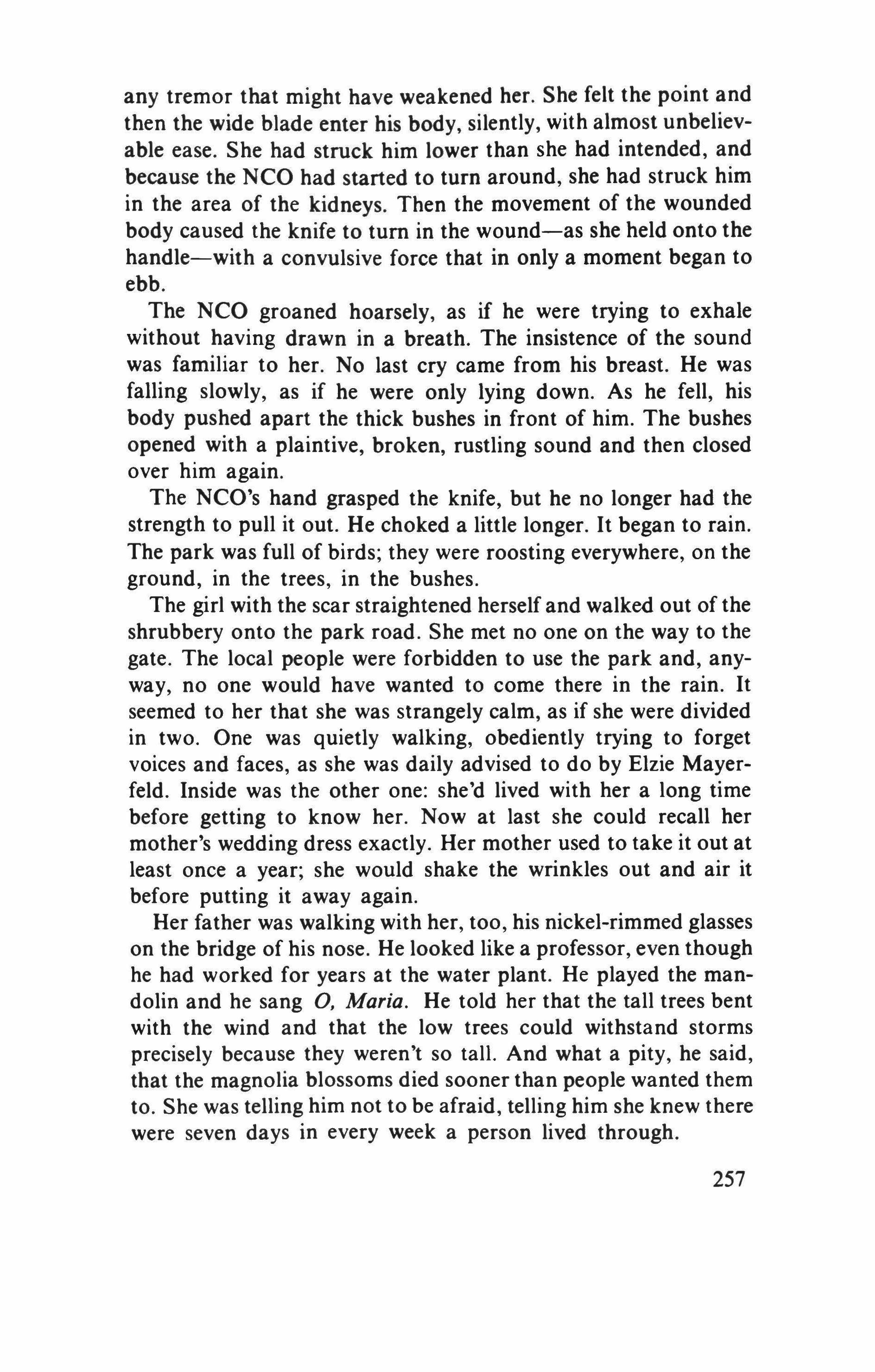
any tremor that might have weakened her. She felt the point and then the wide blade enter his body, silently, with almost unbelievable ease. She had struck him lower than she had intended, and because the NCO had started to turn around, she had struck him in the area of the kidneys. Then the movement of the wounded body caused the knife to turn in the wound-as she held onto the handle-with a convulsive force that in only a moment began to ebb.
The NCO groaned hoarsely, as if he were trying to exhale without having drawn in a breath. The insistence of the sound was familiar to her. No last cry came from his breast. He was falling slowly, as if he were only lying down. As he fell, his body pushed apart the thick bushes in front of him. The bushes opened with a plaintive, broken, rustling sound and then closed over him again.
The NCO's hand grasped the knife, but he no longer had the strength to pull it out. He choked a little longer. It began to rain. The park was full of birds; they were roosting everywhere, on the ground, in the trees, in the bushes.
The girl with the scar straightened herself and walked out of the shrubbery onto the park road. She met no one on the way to the gate. The local people were forbidden to use the park and, anyway, no one would have wanted to come there in the rain. It seemed to her that she was strangely calm, as if she were divided in two. One was quietly walking, obediently trying to forget voices and faces, as she was daily advised to do by Elzie Mayerfeld. Inside was the other one: she'd lived with her a long time before getting to know her. Now at last she could recall her mother's wedding dress exactly. Her mother used to take it out at least once a year; she would shake the wrinkles out and air it before putting it away again.
Her father was walking with her, too, his nickel-rimmed glasses on the bridge of his nose. He looked like a professor, even though he had worked for years at the water plant. He played the mandolin and he sang 0, Maria. He told her that the tall trees bent with the wind and that the low trees could withstand storms precisely because they weren't so tall. And what a pity, he said, that the magnolia blossoms died sooner than people wanted them to. She was telling him not to be afraid, telling him she knew there were seven days in every week a person lived through. 257
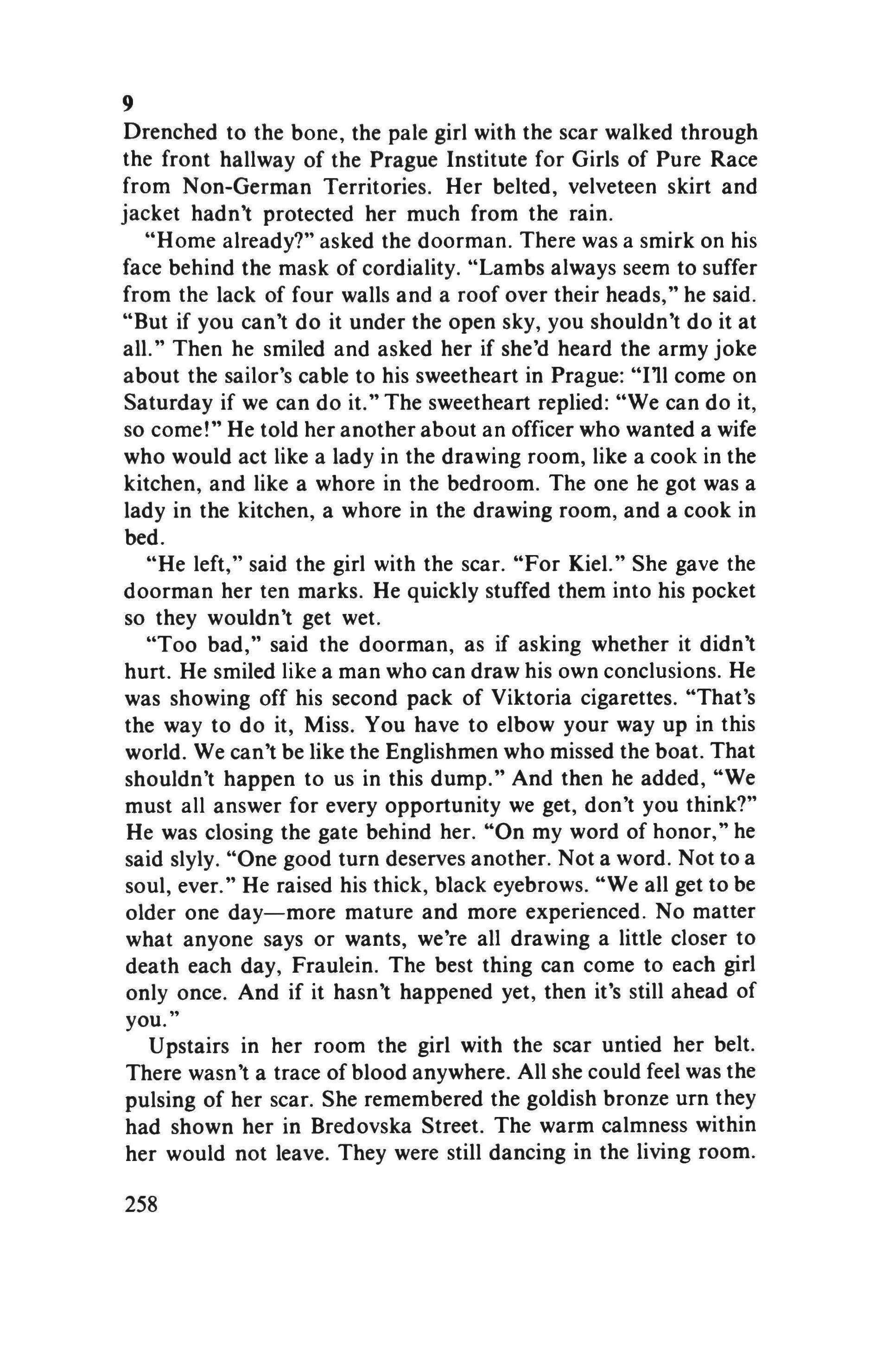
Drenched to the bone, the pale girl with the scar walked through the front hallway of the Prague Institute for Girls of Pure Race from Non-German Territories. Her belted, velveteen skirt and jacket hadn't protected her much from the rain.
"Home already?" asked the doorman. There was a smirk on his face behind the mask of cordiality. "Lambs always seem to suffer from the lack of four walls and a roof over their heads," he said. "But if you can't do it under the open sky, you shouldn't do it at all." Then he smiled and asked her if she'd heard the army joke about the sailor's cable to his sweetheart in Prague: "111 come on Saturday if we can do it." The sweetheart replied: "We can do it, so come!" He told her another about an officer who wanted a wife who would act like a lady in the drawing room, like a cook in the kitchen, and like a whore in the bedroom. The one he got was a lady in the kitchen, a whore in the drawing room, and a cook in bed.
"He left," said the girl with the scar. "For Kiel." She gave the doorman her ten marks. He quickly stuffed them into his pocket so they wouldn't get wet.
"Too bad," said the doorman, as if asking whether it didn't hurt. He smiled like a man who can draw his own conclusions. He was showing off his second pack of Viktoria cigarettes. "That's the way to do it, Miss. You have to elbow your way up in this world. We can't be like the Englishmen who missed the boat. That shouldn't happen to us in this dump." And then he added, "We must all answer for every opportunity we get, don't you think?" He was closing the gate behind her. "On my word of honor," he said slyly. "One good turn deserves another. Not a word. Not to a soul, ever." He raised his thick, black eyebrows. "We all get to be older one day-more mature and more experienced. No matter what anyone says or wants, we're all drawing a little closer to death each day, Fraulein. The best thing can come to each girl only once. And if it hasn't happened yet, then it's still ahead of you.
Upstairs in her room the girl with the scar untied her belt. There wasn't a trace of blood anywhere. All she could feel was the pulsing of her scar. She remembered the goldish bronze urn they had shown her in Bredovska Street. The warm calmness within her would not leave. They were still dancing in the living room.
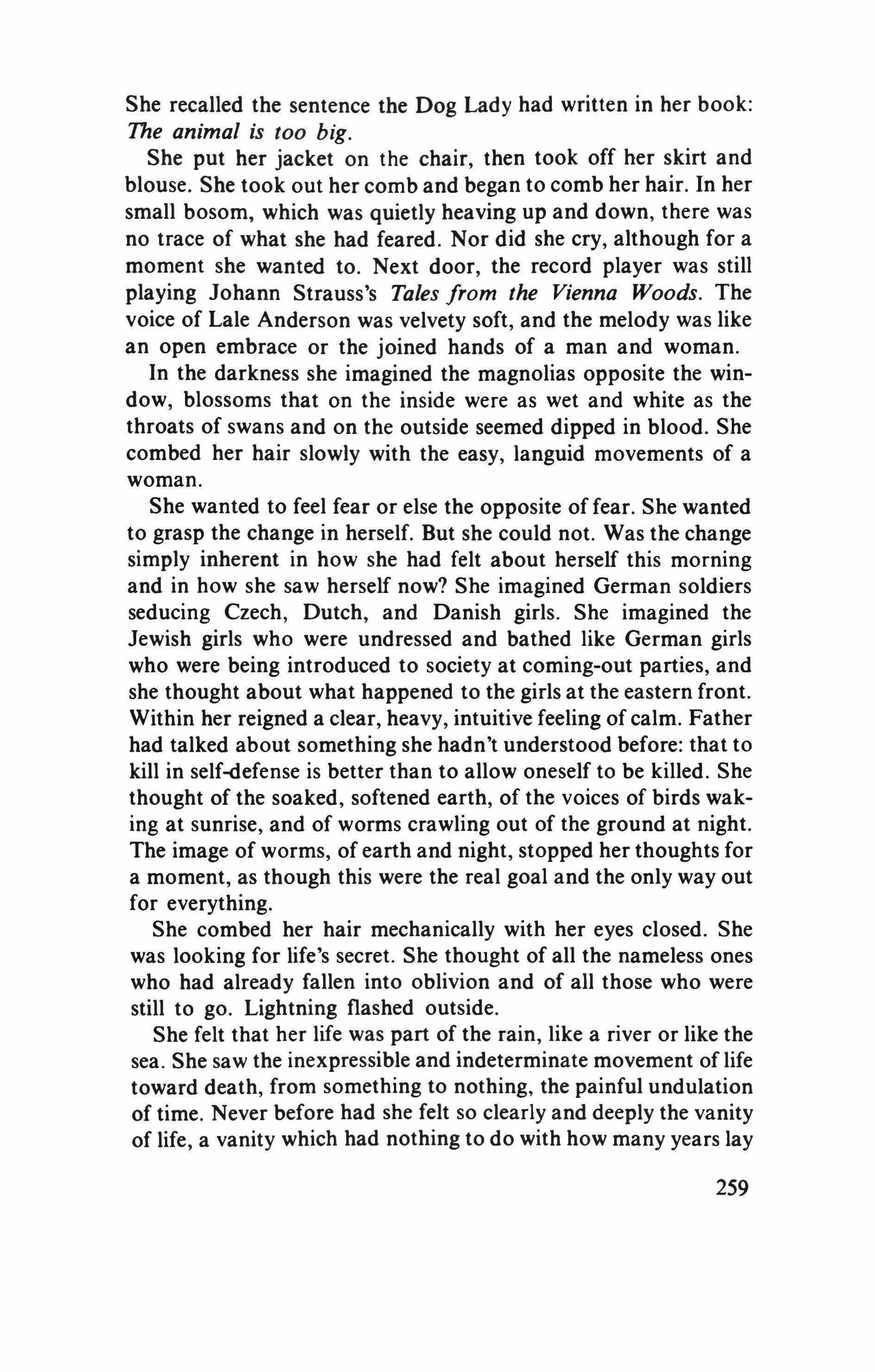
She recalled the sentence the Dog Lady had written in her book: The animal is too big.
She put her jacket on the chair, then took off her skirt and blouse. She took out her comb and began to comb her hair. In her small bosom, which was quietly heaving up and down, there was no trace of what she had feared. Nor did she cry, although for a moment she wanted to. Next door, the record player was still playing Johann Strauss's Tales from the Vienna Woods. The voice of Lale Anderson was velvety soft, and the melody was like an open embrace or the joined hands of a man and woman.
In the darkness she imagined the magnolias opposite the window, blossoms that on the inside were as wet and white as the throats of swans and on the outside seemed dipped in blood. She combed her hair slowly with the easy, languid movements of a woman.
She wanted to feel fear or else the opposite of fear. She wanted to grasp the change in herself. But she could not. Was the change simply inherent in how she had felt about herself this morning and in how she saw herself now? She imagined German soldiers seducing Czech, Dutch, and Danish girls. She imagined the Jewish girls who were undressed and bathed like German girls who were being introduced to society at coming-out parties, and she thought about what happened to the girls at the eastern front. Within her reigned a clear, heavy, intuitive feeling of calm. Father had talked about something she hadn't understood before: that to kill in self-defense is better than to allow oneself to be killed. She thought of the soaked, softened earth, of the voices of birds waking at sunrise, and of worms crawling out of the ground at night. The image of worms, of earth and night, stopped her thoughts for a moment, as though this were the real goal and the only way out for everything.
She combed her hair mechanically with her eyes closed. She was looking for life's secret. She thought of all the nameless ones who had already fallen into oblivion and of all those who were still to go. Lightning flashed outside.
She felt that her life was part of the rain, like a river or like the sea. She saw the inexpressible and indeterminate movement of life toward death, from something to nothing, the painful undulation of time. Never before had she felt so clearly and deeply the vanity of life, a vanity which had nothing to do with how many years lay 259

behind or before one. And yet she was satisfied. She knew she had done what she had to do to fulfill the secret purpose that existed in the life of everyone, whether he was weaker than a blade of grass or more insignificant than a grain of dust.
She opened her eyes. Images of streaming water turned back into the furnishings of her room. The wardrobe, the desk, the bed on which she was sitting. The comb with which she combed her hair. The pillow, the curtains, and the blackout screens on the windows, which she didn't have to lower because she hadn't turned the lights on. She felt she had reached the end of her growing up, as though she had crossed some threshold and in doing so had acquired an experience she could not return from nor leave behind. And she knew that she had passed through the most important phase of her education: the phase one had to pass through oneself, without the assistance of others. The waltz music filled the house, the night, and the garden.
She took out some dry underwear and a clean dress and threw all that she'd taken off into the wastebasket. Inside herself, she was talking with her father and mother; the dead were the only ones she could talk to. Only the dead could be told the truth.
The velveteen belt lay on the floor.
-translated by Vera Borkovec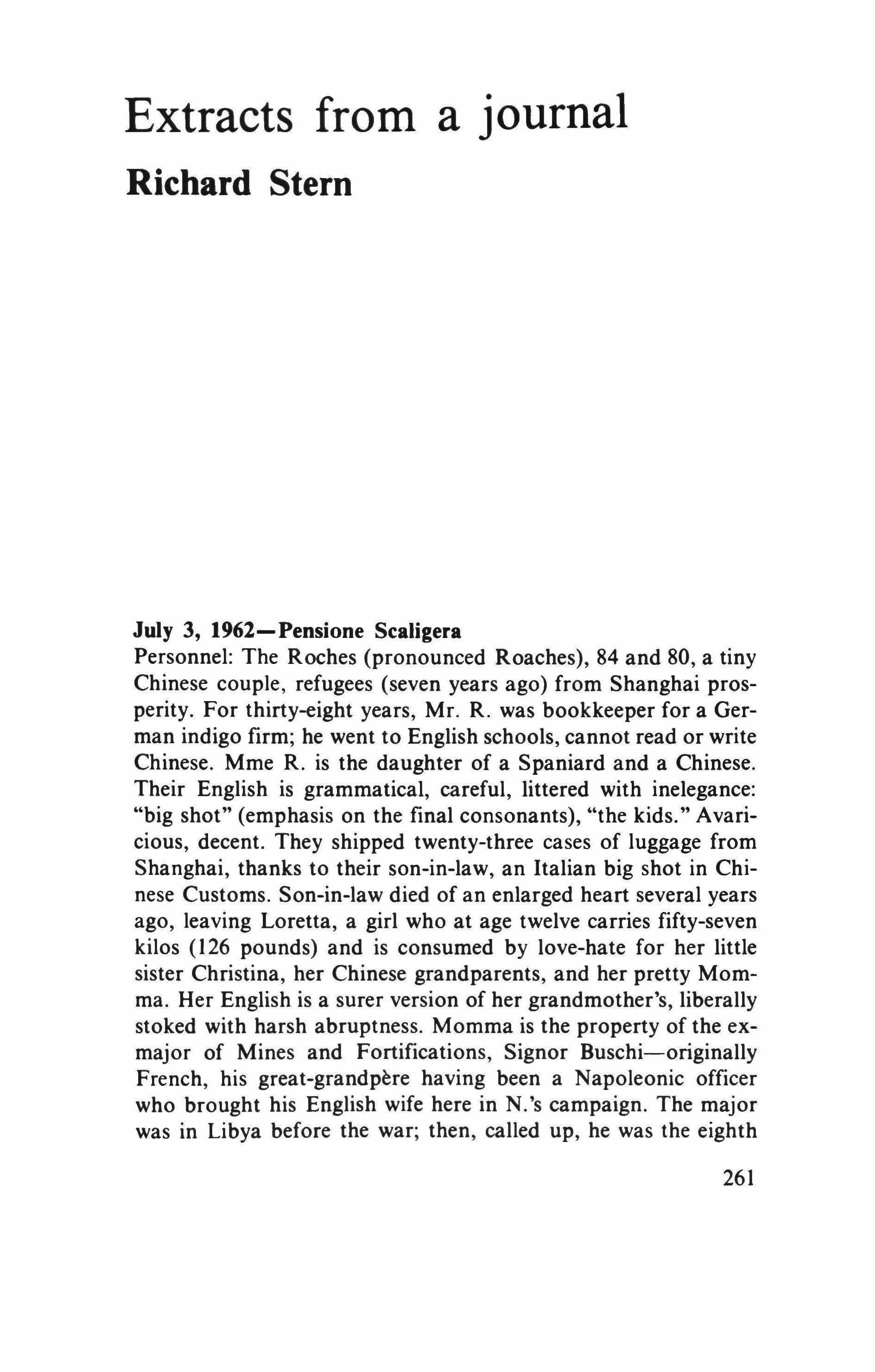
July 3, 1962-Pensione Scaligera
Personnel: The Roches (pronounced Roaches), 84 and 80, a tiny Chinese couple, refugees (seven years ago) from Shanghai prosperity. For thirty-eight years, Mr. R. was bookkeeper for a German indigo firm; he went to English schools, cannot read or write Chinese. Mme R. is the daughter of a Spaniard and a Chinese. Their English is grammatical, careful, littered with inelegance: "big shot" (emphasis on the final consonants), "the kids." Avaricious, decent. They shipped twenty-three cases of luggage from Shanghai, thanks to their son-in-law, an Italian big shot in Chinese Customs. Son-in-law died of an enlarged heart several years ago, leaving Loretta, a girl who at age twelve carries fifty-seven kilos (126 pounds) and is consumed by love-hate for her little sister Christina, her Chinese grandparents, and her pretty Momma. Her English is a surer version of her grandmother's, liberally stoked with harsh abruptness. Momma is the property of the exmajor of Mines and Fortifications, Signor Buschi-originally French, his great-grandpere having been a Napoleonic officer who brought his English wife here in N.'s campaign. The major was in Libya before the war; then, called up, he was the eighth 261
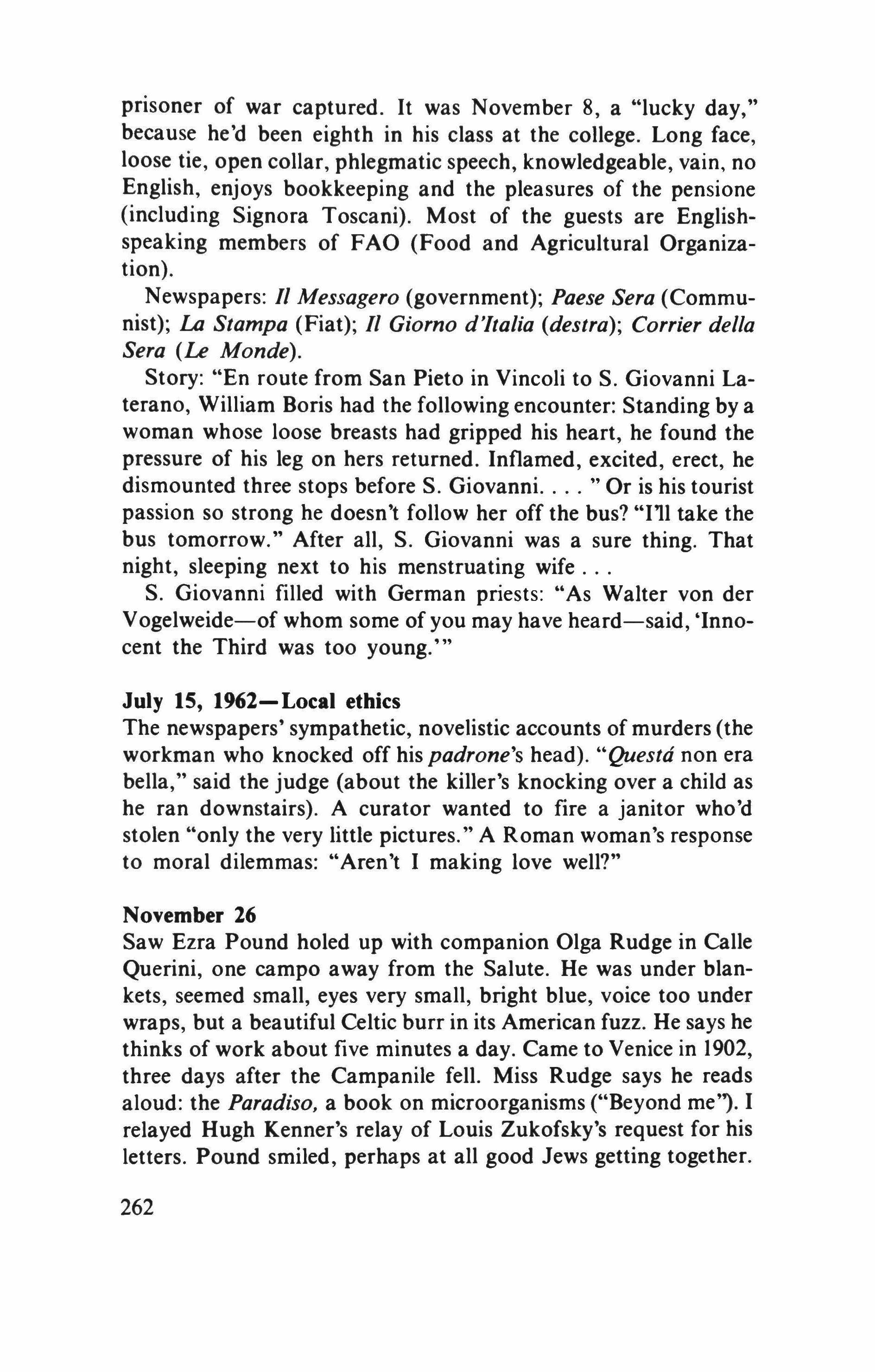
prisoner of war captured. It was November 8, a "lucky day," because he'd been eighth in his class at the college. Long face, loose tie, open collar, phlegmatic speech, knowledgeable, vain, no English, enjoys bookkeeping and the pleasures of the pensione (including Signora Toscani). Most of the guests are Englishspeaking members of FAO (Food and Agricultural Organization).
Newspapers: II Messagero (government); Paese Sera (Communist); La Stampa (Fiat); II Giorno d'Italia (destra); Corrier della Sera iLe Monde).
Story: "En route from San Pieto in Vincoli to S. Giovanni Laterano, William Boris had the following encounter: Standing by a woman whose loose breasts had gripped his heart, he found the pressure of his leg on hers returned. Inflamed, excited, erect, he dismounted three stops before S. Giovanni "Or is his tourist passion so strong he doesn't follow her off the bus? "111 take the bus tomorrow." After all, S. Giovanni was a sure thing. That night, sleeping next to his menstruating wife
S. Giovanni filled with German priests: "As Walter von der Vogelweide-of whom some of you may have heard-said, 'Innocent the Third was too young.'"
July 15, 1962-Local
The newspapers' sympathetic, novelistic accounts of murders (the workman who knocked off his padrone's head). "Questa non era bella," said the judge (about the killer's knocking over a child as he ran downstairs). A curator wanted to fire a janitor who'd stolen "only the very little pictures." A Roman woman's response to moral dilemmas: "Aren't I making love well?"
November 26
Saw Ezra Pound holed up with companion Olga Rudge in Calle Querini, one campo away from the Salute. He was under blankets, seemed small, eyes very small, bright blue, voice too under wraps, but a beautiful Celtic burr in its American fuzz. He says he thinks of work about five minutes a day. Came to Venice in 1902, three days after the Campanile fell. Miss Rudge says he reads aloud: the Paradiso, a book on microorganisms ("Beyond me"). I relayed Hugh Kenner's relay of Louis Zukofsky's request for his letters. Pound smiled, perhaps at all good Jews getting together.
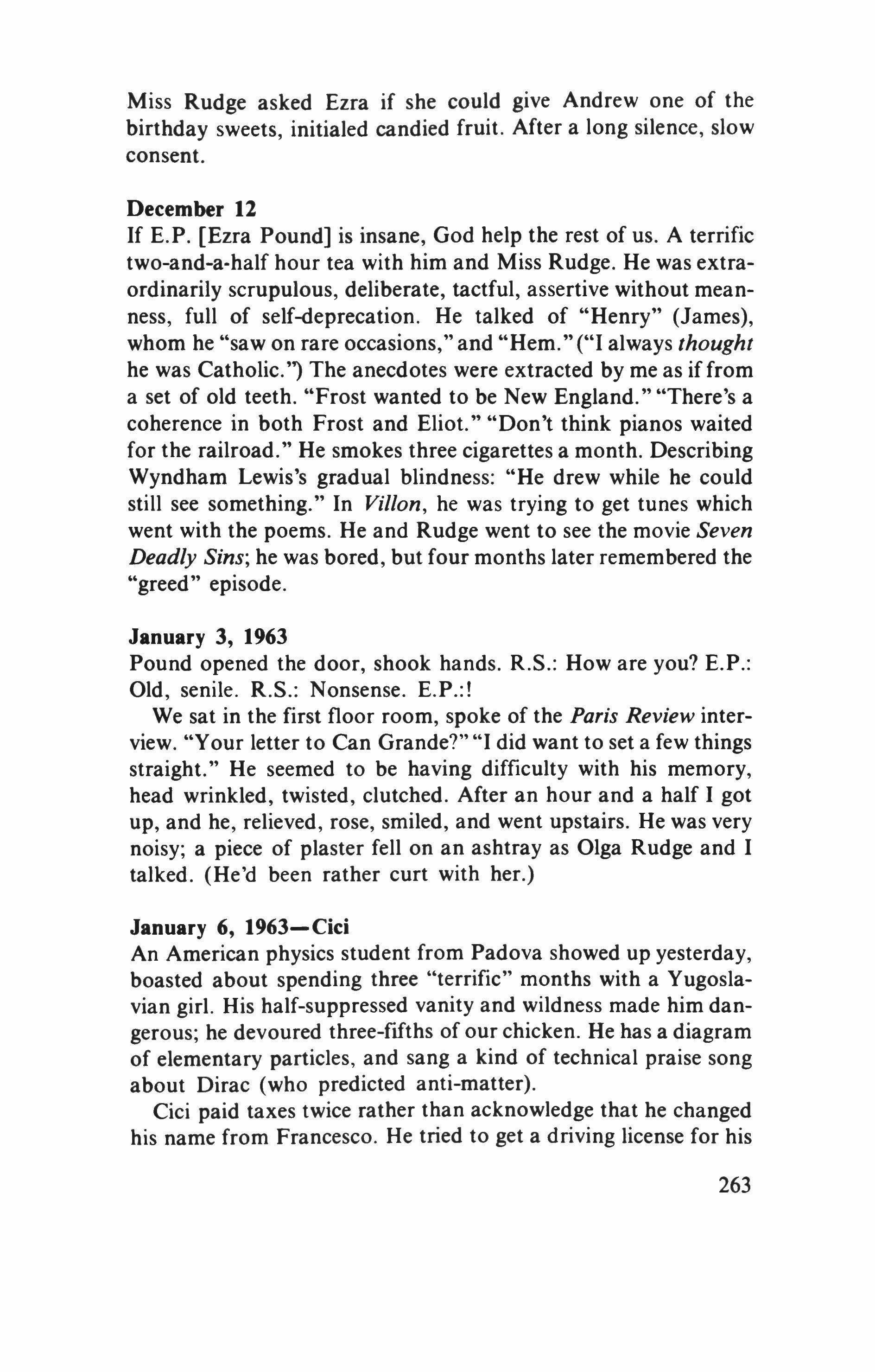
Miss Rudge asked Ezra if she could give Andrew one of the birthday sweets, initialed candied fruit. After a long silence, slow consent.
December 12
If E.P. [Ezra Pound] is insane, God help the rest of us. A terrific two-and-a-half hour tea with him and Miss Rudge. He was extraordinarily scrupulous, deliberate, tactful, assertive without meanness, full of self-deprecation. He talked of "Henry" (James), whom he "saw on rare occasions," and "Hem." ("I always thought he was Catholic.") The anecdotes were extracted by me as if from a set of old teeth. "Frost wanted to be New England." "There's a coherence in both Frost and Eliot." "Don't think pianos waited for the railroad." He smokes three cigarettes a month. Describing Wyndham Lewis's gradual blindness: "He drew while he could still see something." In Vii/on, he was trying to get tunes which went with the poems. He and Rudge went to see the movie Seven Deadly Sins; he was bored, but four months later remembered the "greed" episode.
January 3, 1963
Pound opened the door, shook hands. R.S.: How are you? E.P.: Old, senile. R.S.: Nonsense. E.P.:!
We sat in the first floor room, spoke of the Paris Review interview. "Your letter to Can Grande?" "I did want to set a few things straight." He seemed to be having difficulty with his memory, head wrinkled, twisted, clutched. After an hour and a half I got up, and he, relieved, rose, smiled, and went upstairs. He was very noisy; a piece of plaster fell on an ashtray as Olga Rudge and I talked. (He'd been rather curt with her.)
January 6, 1963-Cici
An American physics student from Padova showed up yesterday, boasted about spending three "terrific" months with a Yugoslavian girl. His half-suppressed vanity and wildness made him dangerous; he devoured three-fifths of our chicken. He has a diagram of elementary particles, and sang a kind of technical praise song about Dirac (who predicted anti-matter).
Cici paid taxes twice rather than acknowledge that he changed his name from Francesco. He tried to get a driving license for his
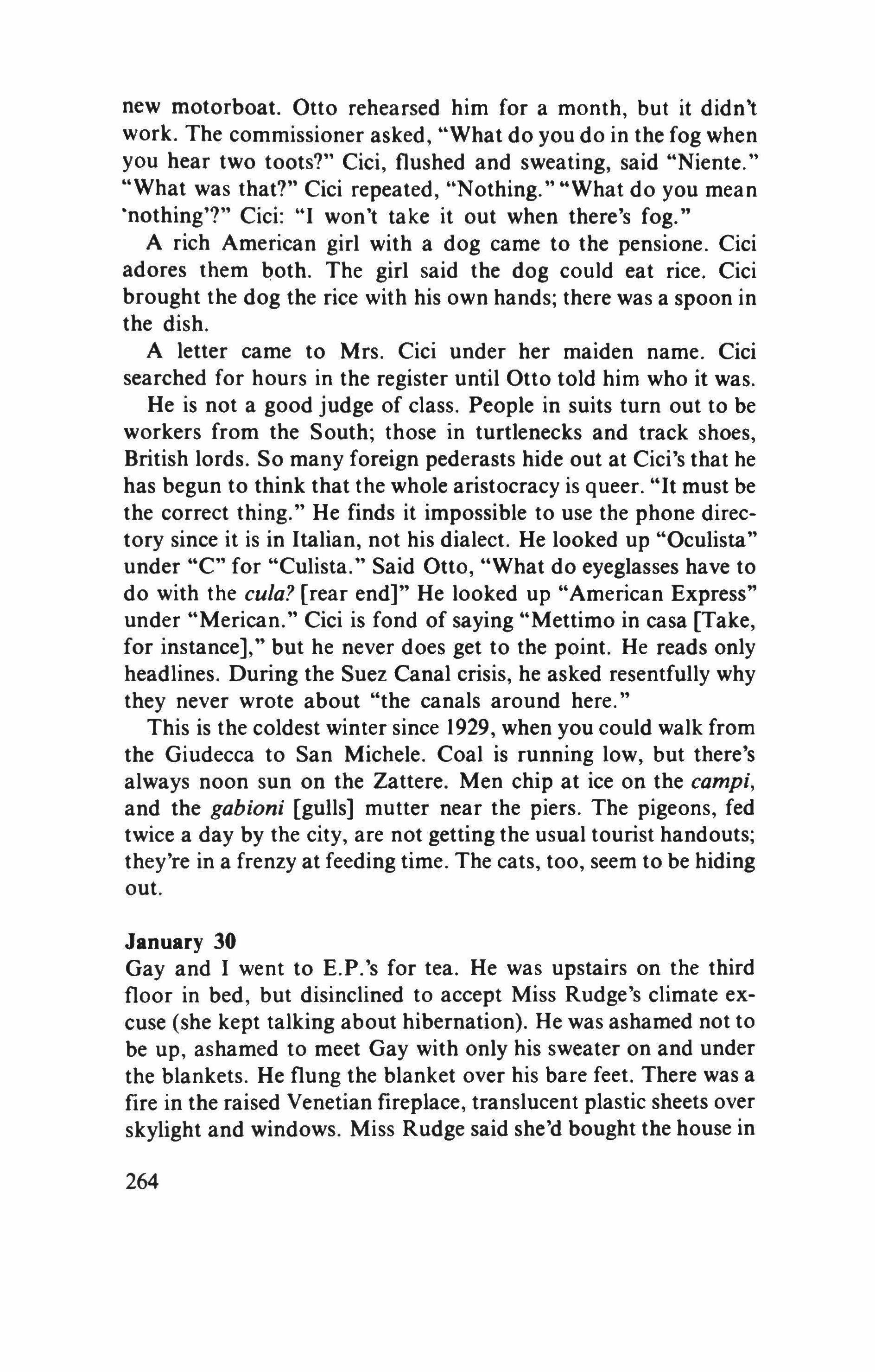
new motorboat. Otto rehearsed him for a month, but it didn't work. The commissioner asked, "What do you do in the fog when you hear two toots?" Cici, flushed and sweating, said "Niente." "What was that?" Cici repeated, "Nothing." "What do you mean 'nothing'?" Cici: "I won't take it out when there's fog."
A rich American girl with a dog came to the pensione. Cici adores them both. The girl said the dog could eat rice. Cici brought the dog the rice with his own hands; there was a spoon in the dish.
A letter came to Mrs. Cici under her maiden name. Cici searched for hours in the register until Otto told him who it was.
He is not a good judge of class. People in suits turn out to be workers from the South; those in turtlenecks and track shoes, British lords. So many foreign pederasts hide out at Cici's that he has begun to think that the whole aristocracy is queer. "It must be the correct thing." He finds it impossible to use the phone directory since it is in Italian, not his dialect. He looked up "Oculista" under "C" for "Culista." Said Otto, "What do eyeglasses have to do with the cula? [rear end]" He looked up "American Express" under "Merican." Cici is fond of saying "Mettimo in casa [Take, for instance]," but he never does get to the point. He reads only headlines. During the Suez Canal crisis, he asked resentfully why they never wrote about "the canals around here."
This is the coldest winter since 1929, when you could walk from the Giudecca to San Michele. Coal is running low, but there's always noon sun on the Zattere. Men chip at ice on the campi, and the gabioni [gulls] mutter near the piers. The pigeons, fed twice a day by the city, are not getting the usual tourist handouts; they're in a frenzy at feeding time. The cats, too, seem to be hiding out.
January 30
Gay and I went to E.P.'s for tea. He was upstairs on the third floor in bed, but disinclined to accept Miss Rudge's climate excuse (she kept talking about hibernation). He was ashamed not to be up, ashamed to meet Gay with only his sweater on and under the blankets. He flung the blanket over his bare feet. There was a fire in the raised Venetian fireplace, translucent plastic sheets over skylight and windows. Miss Rudge said she'd bought the house in
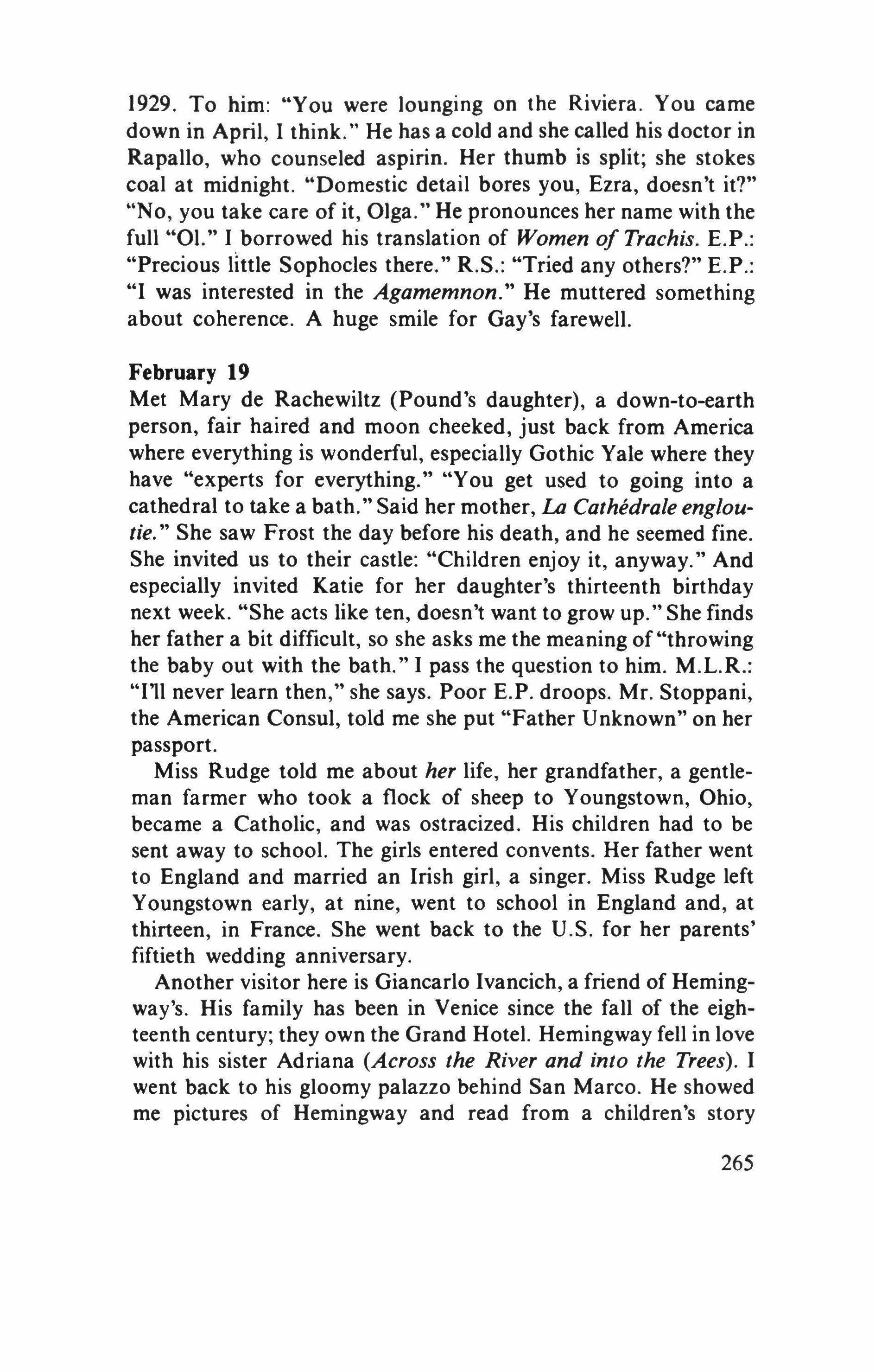
1929. To him: "You were lounging on the Riviera. You came down in April, I think." He has a cold and she called his doctor in Rapallo, who counseled aspirin. Her thumb is split; she stokes coal at midnight. "Domestic detail bores you, Ezra, doesn't it?" "N0, you take care of it, Olga." He pronounces her name with the full "01." I borrowed his translation of Women of Trachis. E.P.: "Precious little Sophocles there." R.S.: "Tried any others?" E.P.: "I was interested in the Agamemnon." He muttered something about coherence. A huge smile for Gay's farewell.
February 19
Met Mary de Rachewiltz (Pound's daughter), a down-to-earth person, fair haired and moon cheeked, just back from America where everything is wonderful, especially Gothic Yale where they have "experts for everything." "You get used to going into a cathedral to take a bath." Said her mother, La Cathedrale engloutie." She saw Frost the day before his death, and he seemed fine. She invited us to their castle: "Children enjoy it, anyway." And especially invited Katie for her daughter's thirteenth birthday next week. "She acts like ten, doesn't want to grow up. She finds her father a bit difficult, so she asks me the meaning of "throwing the baby out with the bath." I pass the question to him. M.L.R.: "I'll never learn then," she says. Poor E.P. droops. Mr. Stoppani, the American Consul, told me she put "Father Unknown" on her passport.
Miss Rudge told me about her life, her grandfather, a gentleman farmer who took a flock of sheep to Youngstown, Ohio, became a Catholic, and was ostracized. His children had to be sent away to school. The girls entered convents. Her father went to England and married an Irish girl, a singer. Miss Rudge left Youngstown early, at nine, went to school in England and, at thirteen, in France. She went back to the U.S. for her parents' fiftieth wedding anniversary.
Another visitor here is Giancarlo Ivancich, a friend of Hemingway's. His family has been in Venice since the fall of the eighteenth century; they own the Grand Hotel. Hemingway fell in love with his sister Adriana (Across the River and into the Trees). I went back to his gloomy palazzo behind San Marco. He showed me pictures of Hemingway and read from a children's story

new motorboat. Otto rehearsed him for a month, but it didn't work. The commissioner asked, "What do you do in the fog when you hear two toots?" Cici, flushed and sweating, said "Niente." "What was that?" Cici repeated, "Nothing." "What do you mean 'nothing'?" Cici: "I won't take it out when there's fog."
A rich American girl with a dog came to the pensione. Cici adores them both, The girl said the dog could eat rice. Cici brought the dog the rice with his own hands; there was a spoon in the dish.
A letter came to Mrs. Cici under her maiden name. Cici searched for hours in the register until Otto told him who it was.
He is not a good judge of class. People in suits turn out to be workers from the South; those in turtlenecks and track shoes, British lords. So many foreign pederasts hide out at Cici's that he has begun to think that the whole aristocracy is queer. "It must be the correct thing." He finds it impossible to use the phone directory since it is in Italian, not his dialect. He looked up "Oculista" under "C" for "Culista." Said Otto, "What do eyeglasses have to do with the cula? [rear end]" He looked up "American Express" under "Merican." Cici is fond of saying "Mettimo in casa [Take, for instance]," but he never does get to the point. He reads only headlines. During the Suez Canal crisis, he asked resentfully why they never wrote about "the canals around here."
This is the coldest winter since 1929, when you could walk from the Giudecca to San Michele. Coal is running low, but there's always noon sun on the Zattere. Men chip at ice on the campi, and the gabioni [gulls] mutter near the piers. The pigeons, fed twice a day by the city, are not getting the usual tourist handouts; they're in a frenzy at feeding time. The cats, too, seem to be hiding out.
January 30
Gay and 1 went to E.P.'s for tea. He was upstairs on the third floor in bed, but disinclined to accept Miss Rudge's climate excuse (she kept talking about hibernation). He was ashamed not to be up, ashamed to meet Gay with only his sweater on and under the blankets. He flung the blanket over his bare feet. There was a fire in the raised Venetian fireplace, translucent plastic sheets over skylight and windows. Miss Rudge said she'd bought the house in
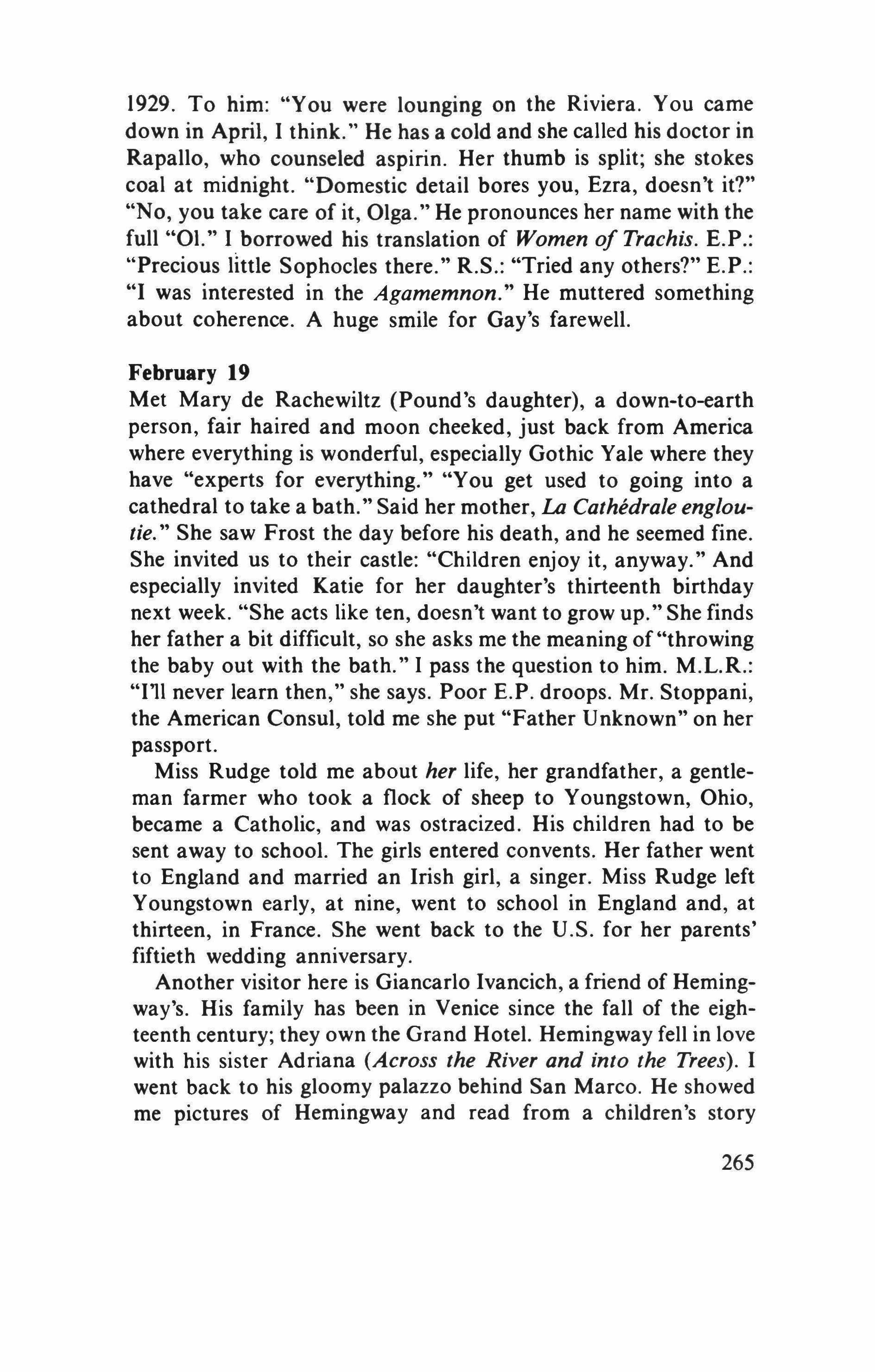
1929. To him: "You were lounging on the Riviera. You came down in April, I think." He has a cold and she called his doctor in Rapallo, who counseled aspirin. Her thumb is split; she stokes coal at midnight. "Domestic detail bores you, Ezra, doesn't it?" "N0, you take care of it, Olga." He pronounces her name with the full "01." I borrowed his translation of Women of Trachis. E.P.: "Precious little Sophocles there." R.S.: "Tried any others?" E.P.: "I was interested in the Agamemnon." He muttered something about coherence. A huge smile for Gay's farewell.
February 19
Met Mary de Rachewiltz (Pound's daughter), a down-to-earth person, fair haired and moon cheeked, just back from America where everything is wonderful, especially Gothic Yale where they have "experts for everything." "You get used to going into a cathedral to take a bath." Said her mother, La Cathedrale engloutie. She saw Frost the day before his death, and he seemed fine. She invited us to their castle: "Children enjoy it, anyway." And especially invited Katie for her daughter's thirteenth birthday next week. "She acts like ten, doesn't want to grow up." She finds her father a bit difficult, so she asks me the meaning of"throwing the baby out with the bath." I pass the question to him. M.L.R.: "I'll never learn then," she says. Poor E.P. droops. Mr. Stoppani, the American Consul, told me she put "Father Unknown" on her passport.
Miss Rudge told me about her life, her grandfather, a gentleman farmer who took a flock of sheep to Youngstown, Ohio, became a Catholic, and was ostracized. His children had to be sent away to school. The girls entered convents. Her father went to England and married an Irish girl, a singer. Miss Rudge left Youngstown early, at nine, went to school in England and, at thirteen, in France. She went back to the U.S. for her parents' fiftieth wedding anniversary.
Another visitor here is Giancarlo Ivancich, a friend of Hemingway's. His family has been in Venice since the fall of the eighteenth century; they own the Grand Hotel. Hemingway fell in love with his sister Adriana (Across the River and into the Trees). I went back to his gloomy palazzo behind San Marco. He showed me pictures of Hemingway and read from a children's story
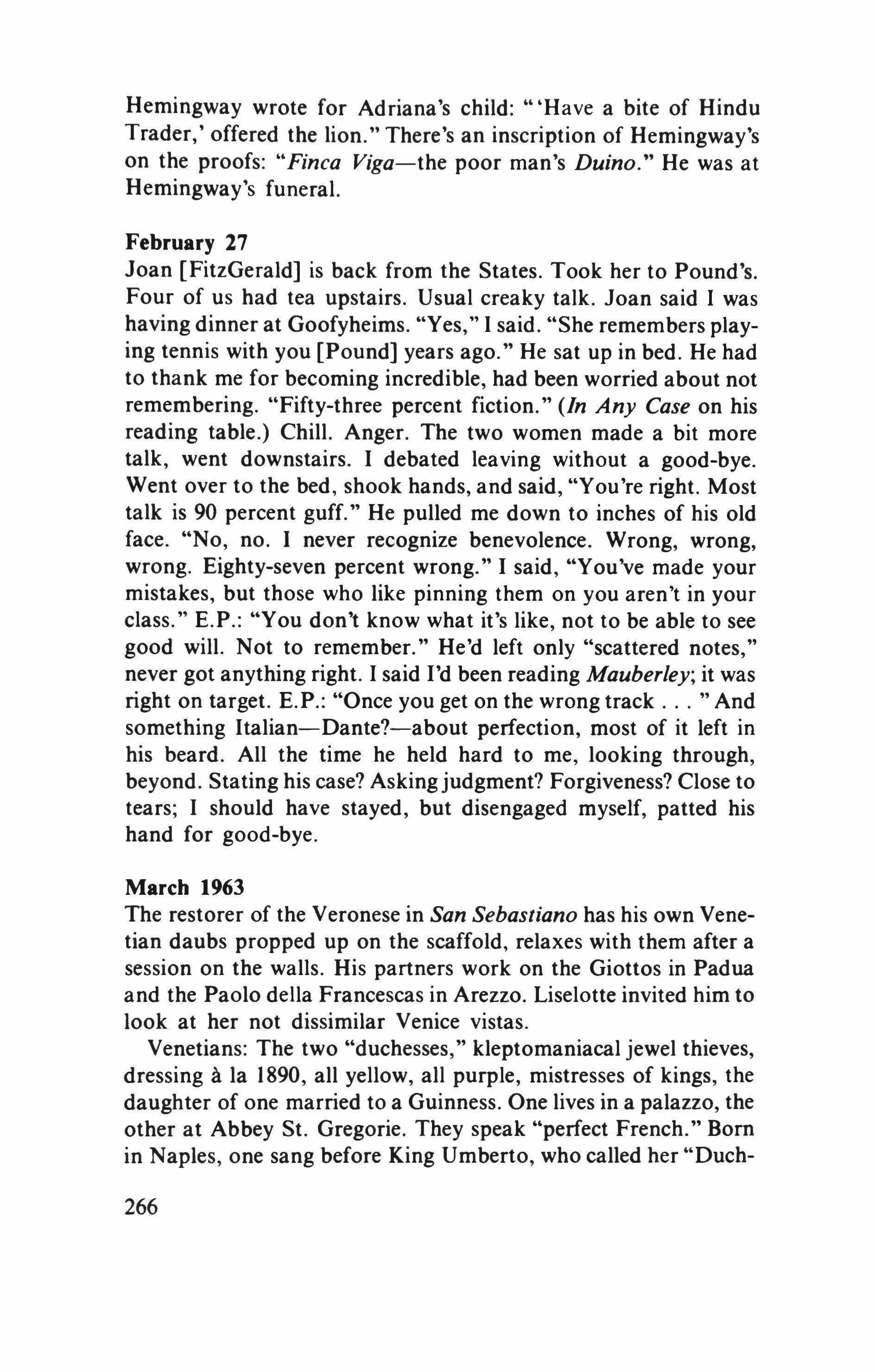
Hemingway wrote for Adriana's child: '''Have a bite of Hindu Trader,' offered the lion." There's an inscription of Hemingway's on the proofs: "Finca Viga-the poor man's Duino:" He was at Hemingway's funeral.
February 27
Joan [FitzGerald] is back from the States. Took her to Pound's. Four of us had tea upstairs. Usual creaky talk. Joan said I was having dinner at Goofyheims. "Yes," I said. "She remembers playing tennis with you [Pound] years ago." He sat up in bed. He had to thank me for becoming incredible, had been worried about not remembering. "Fifty-three percent fiction." (In Any Case on his reading table.) Chill. Anger. The two women made a bit more talk, went downstairs. I debated leaving without a good-bye. Went over to the bed, shook hands, and said, "You're right. Most talk is 90 percent guff." He pulled me down to inches of his old face. "No, no. I never recognize benevolence. Wrong, wrong, wrong. Eighty-seven percent wrong." I said, "You've made your mistakes, but those who like pinning them on you aren't in your class." E.P.: "You don't know what it's like, not to be able to see good will. Not to remember." He'd left only "scattered notes," never got anything right. I said I'd been reading Mauberley; it was right on target. E.P.: "Once you get on the wrong track And something ltalian-Dante?-about perfection, most of it left in his beard. All the time he held hard to me, looking through, beyond. Stating his case? Askingjudgment? Forgiveness? Close to tears; I should have stayed, but disengaged myself, patted his hand for good-bye.
March 1963
The restorer of the Veronese in San Sebastiano has his own Venetian daubs propped up on the scaffold, relaxes with them after a session on the walls. His partners work on the Giottos in Padua and the Paolo della Francescas in Arezzo. Liselotte invited him to look at her not dissimilar Venice vistas.
Venetians: The two "duchesses," kleptomaniacal jewel thieves, dressing a la 1890, all yellow, all purple, mistresses of kings, the daughter of one married to a Guinness. One lives in a palazzo, the other at Abbey St. Gregorie. They speak "perfect French." Born in Naples, one sang before King Umberto, who called her "Duch-
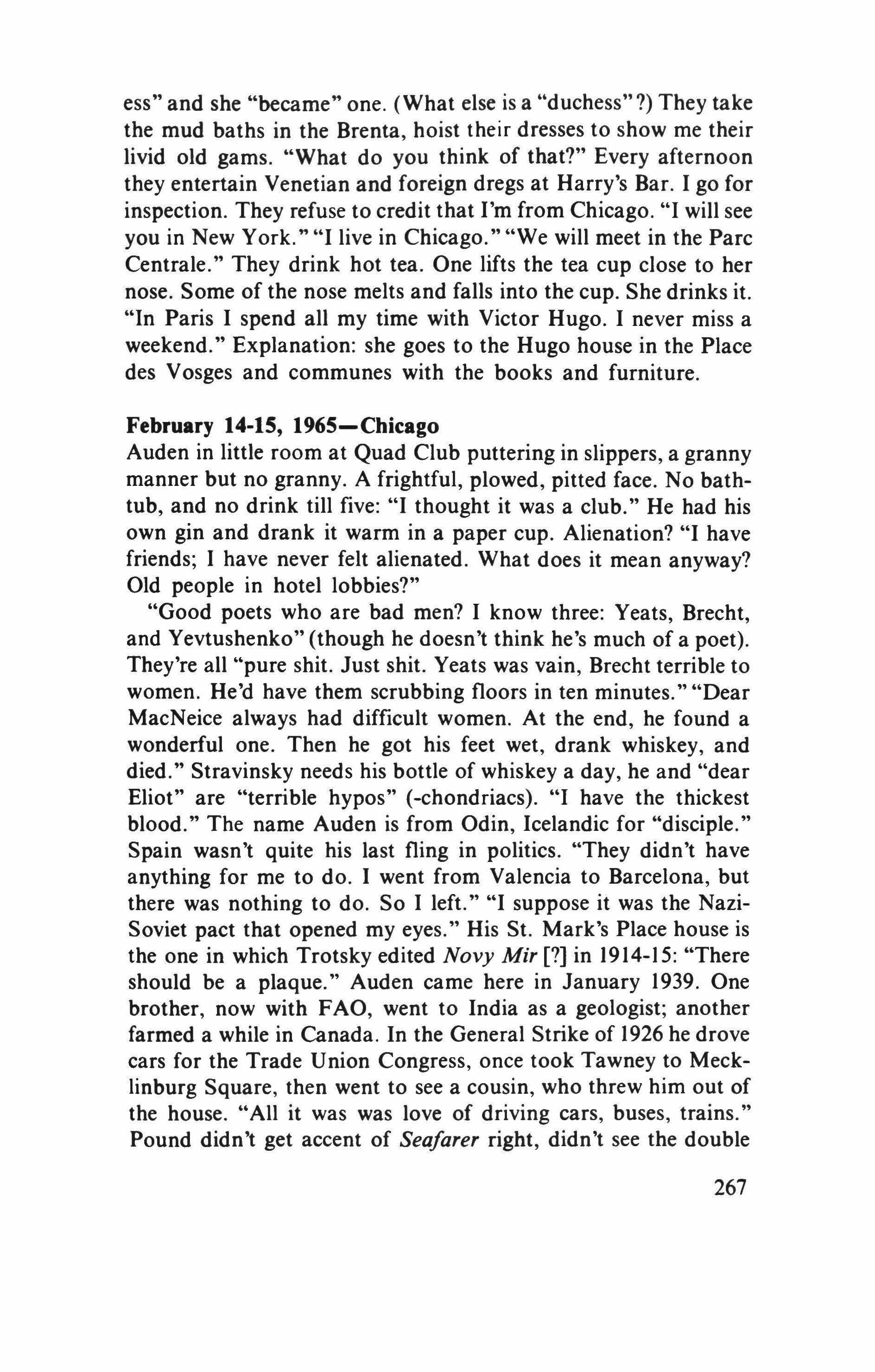
ess" and she "became" one. (What else is a "duchess"?) They take the mud baths in the Brenta, hoist their dresses to show me their livid old gams. "What do you think of that?" Every afternoon they entertain Venetian and foreign dregs at Harry's Bar. I go for inspection. They refuse to credit that I'm from Chicago. "I will see you in New York." "I live in Chicago." "We will meet in the Pare Centrale." They drink hot tea. One lifts the tea cup close to her nose. Some of the nose melts and falls into the cup. She drinks it. "In Paris I spend all my time with Victor Hugo. I never miss a weekend." Explanation: she goes to the Hugo house in the Place des Vosges and communes with the books and furniture.
February 14-15, 1965-Chicago
Auden in little room at Quad Club puttering in slippers, a granny manner but no granny. A frightful, plowed, pitted face. No bathtub, and no drink till five: "I thought it was a club." He had his own gin and drank it warm in a paper cup. Alienation? "I have friends; I have never felt alienated. What does it mean anyway? Old people in hotel lobbies?"
"Good poets who are bad men? I know three: Yeats, Brecht, and Yevtushenko" (though he doesn't think he's much of a poet). They're all "pure shit. Just shit. Yeats was vain, Brecht terrible to women. He'd have them scrubbing floors in ten minutes." "Dear MacNeice always had difficult women. At the end, he found a wonderful one. Then he got his feet wet, drank whiskey, and died." Stravinsky needs his bottle of whiskey a day, he and "dear Eliot" are "terrible hypos" (-chondriacs). "I have the thickest blood." The name Auden is from Odin, Icelandic for "disciple." Spain wasn't quite his last fling in politics. "They didn't have anything for me to do. I went from Valencia to Barcelona, but there was nothing to do. So I left." "I suppose it was the NaziSoviet pact that opened my eyes." His St. Mark's Place house is the one in which Trotsky edited Novy Mir [?] in 1914-15: "There should be a plaque." Auden came here in January 1939. One brother, now with FAO, went to India as a geologist; another farmed a while in Canada. In the General Strike of 1926 he drove cars for the Trade Union Congress, once took Tawney to Meeklinburg Square, then went to see a cousin, who threw him out of the house. "All it was was love of driving cars, buses, trains." Pound didn't get accent of Seafarer right, didn't see the double
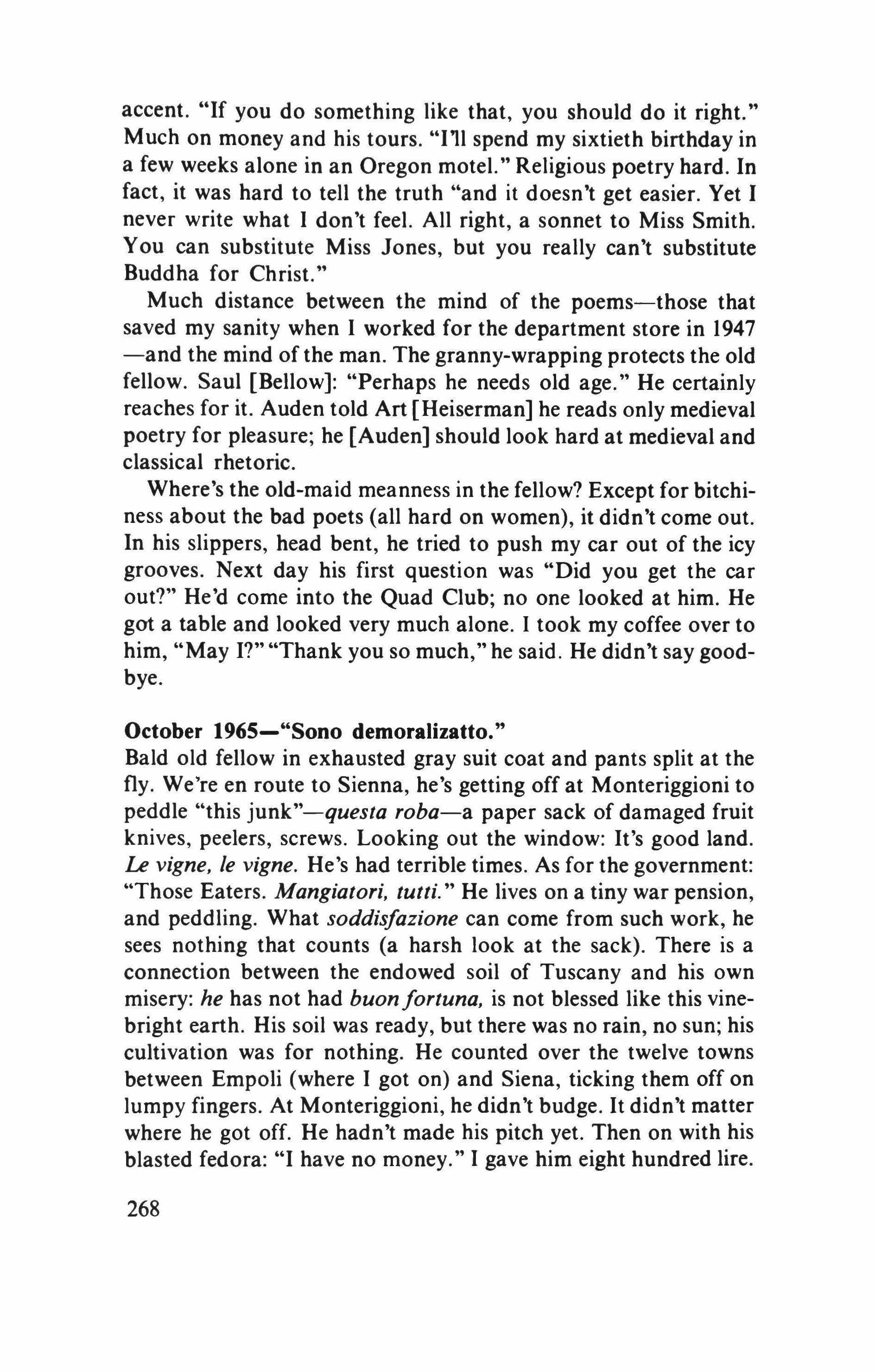
accent. "If you do something like that, you should do it right." Much on money and his tours. "I'll spend my sixtieth birthday in a few weeks alone in an Oregon motel." Religious poetry hard. In fact, it was hard to tell the truth "and it doesn't get easier. Yet I never write what 1 don't feel. All right, a sonnet to Miss Smith. You can substitute Miss Jones, but you really can't substitute Buddha for Christ."
Much distance between the mind of the poems-those that saved my sanity when 1 worked for the department store in 1947 -and the mind of the man. The granny-wrapping protects the old fellow. Saul [Bellow]: "Perhaps he needs old age." He certainly reaches for it. Auden told Art [Heiserman] he reads only medieval poetry for pleasure; he [Auden] should look hard at medieval and classical rhetoric.
Where's the old-maid meanness in the fellow? Except for bitchiness about the bad poets (all hard on women), it didn't come out. In his slippers, head bent, he tried to push my car out of the icy grooves. Next day his first question was "Did you get the car out?" He'd come into the Quad Club; no one looked at him. He got a table and looked very much alone. 1 took my coffee over to him, "May I?" "Thank you so much," he said. He didn't say goodbye.
October 1965-"Sono demoralizatto."
Bald old fellow in exhausted gray suit coat and pants split at the fly. We're en route to Sienna, he's getting off at Monteriggioni to peddle "this junk"-questa roba-a paper sack of damaged fruit knives, peelers, screws. Looking out the window: It's good land. Le vigne, Ie vigne. He's had terrible times. As for the government: "Those Eaters. Mangiatori, tutti." He lives on a tiny war pension, and peddling. What soddisfazione can come from such work, he sees nothing that counts (a harsh look at the sack). There is a connection between the endowed soil of Tuscany and his own misery: he has not had buonfortuna, is not blessed like this vinebright earth. His soil was ready, but there was no rain, no sun; his cultivation was for nothing. He counted over the twelve towns between Empoli (where 1 got on) and Siena, ticking them off on lumpy fingers. At Monteriggioni, he didn't budge. It didn't matter where he got off. He hadn't made his pitch yet. Then on with his blasted fedora: "I have no money." 1 gave him eight hundred lire.
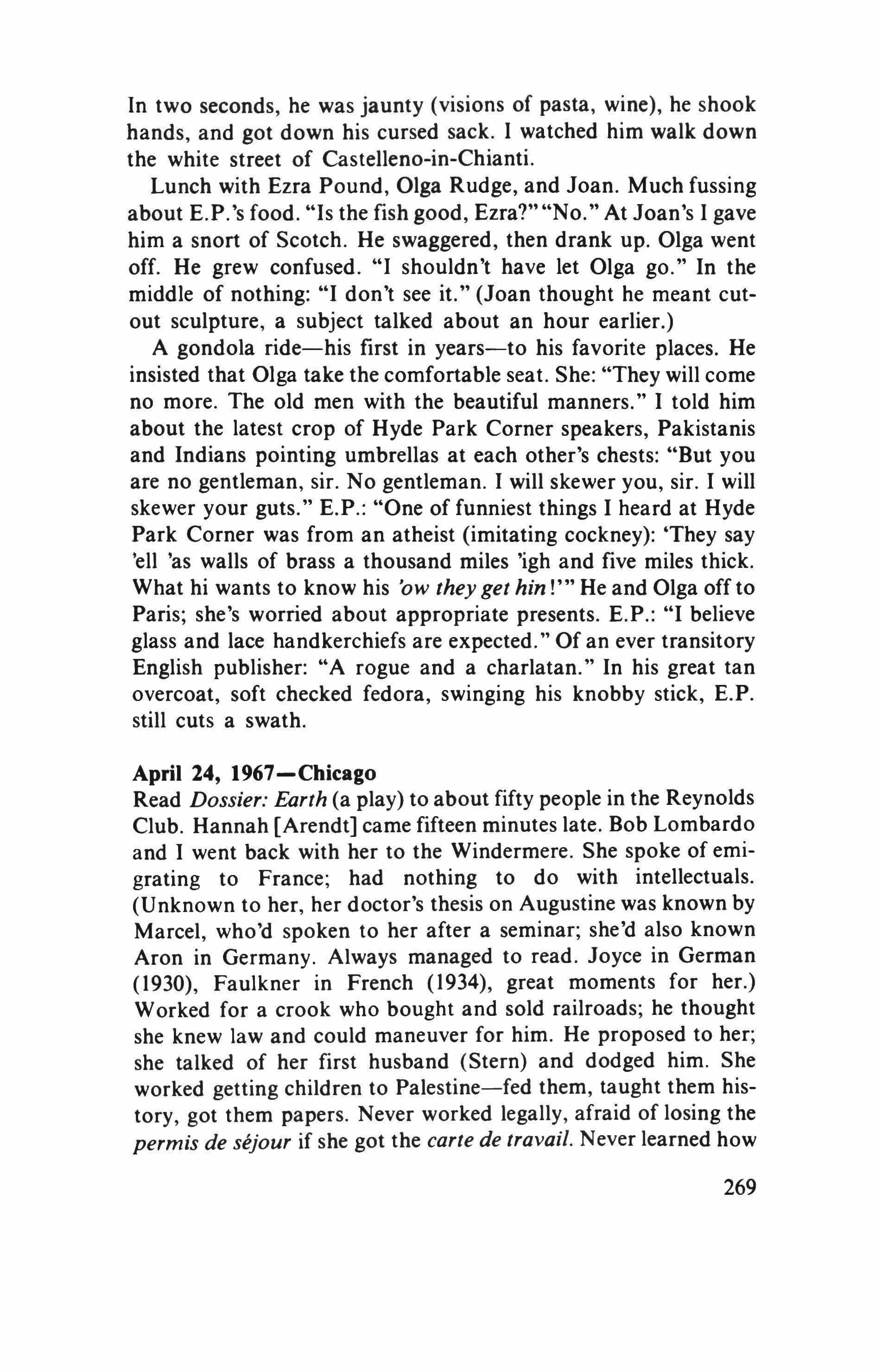
In two seconds, he was jaunty (visions of pasta, wine), he shook hands, and got down his cursed sack. I watched him walk down the white street of Castelleno-in-Chianti.
Lunch with Ezra Pound, Olga Rudge, and Joan. Much fussing about E.P.'s food. "Is the fish good, Ezra?" "No." At Joan's I gave him a snort of Scotch. He swaggered, then drank up. Olga went off. He grew confused. "I shouldn't have let Olga go." In the middle of nothing: "I don't see it." (Joan thought he meant cutout sculpture, a subject talked about an hour earlier.)
A gondola ride-his first in years-to his favorite places. He insisted that Olga take the comfortable seat. She: "They will come no more. The old men with the beautiful manners." I told him about the latest crop of Hyde Park Corner speakers, Pakistanis and Indians pointing umbrellas at each other's chests: "But you are no gentleman, sir. No gentleman. I will skewer you, sir. I will skewer your guts." E.P.: "One of funniest things I heard at Hyde Park Corner was from an atheist (imitating cockney): 'They say 'ell 'as walls of brass a thousand miles 'igh and five miles thick. What hi wants to know his ow they get hin l" He and Olga off to Paris; she's worried about appropriate presents. E.P.: "I believe glass and lace handkerchiefs are expected." Of an ever transitory English publisher: "A rogue and a charlatan." In his great tan overcoat, soft checked fedora, swinging his knobby stick, E.P. still cuts a swath.
Read Dossier: Earth (a play) to about fifty people in the Reynolds Club. Hannah [Arendt] came fifteen minutes late. Bob Lombardo and I went back with her to the Windermere. She spoke of emigrating to France; had nothing to do with intellectuals. (Unknown to her, her doctor's thesis on Augustine was known by Marcel, who'd spoken to her after a seminar; she'd also known Aron in Germany. Always managed to read. Joyce in German (1930), Faulkner in French (1934), great moments for her.)
Worked for a crook who bought and sold railroads; he thought she knew law and could maneuver for him. He proposed to her; she talked of her first husband (Stern) and dodged him. She worked getting children to Palestine-fed them, taught them history, got them papers. Never worked legally, afraid of losing the permis de sejour if she got the carte de travail. Never learned how 269
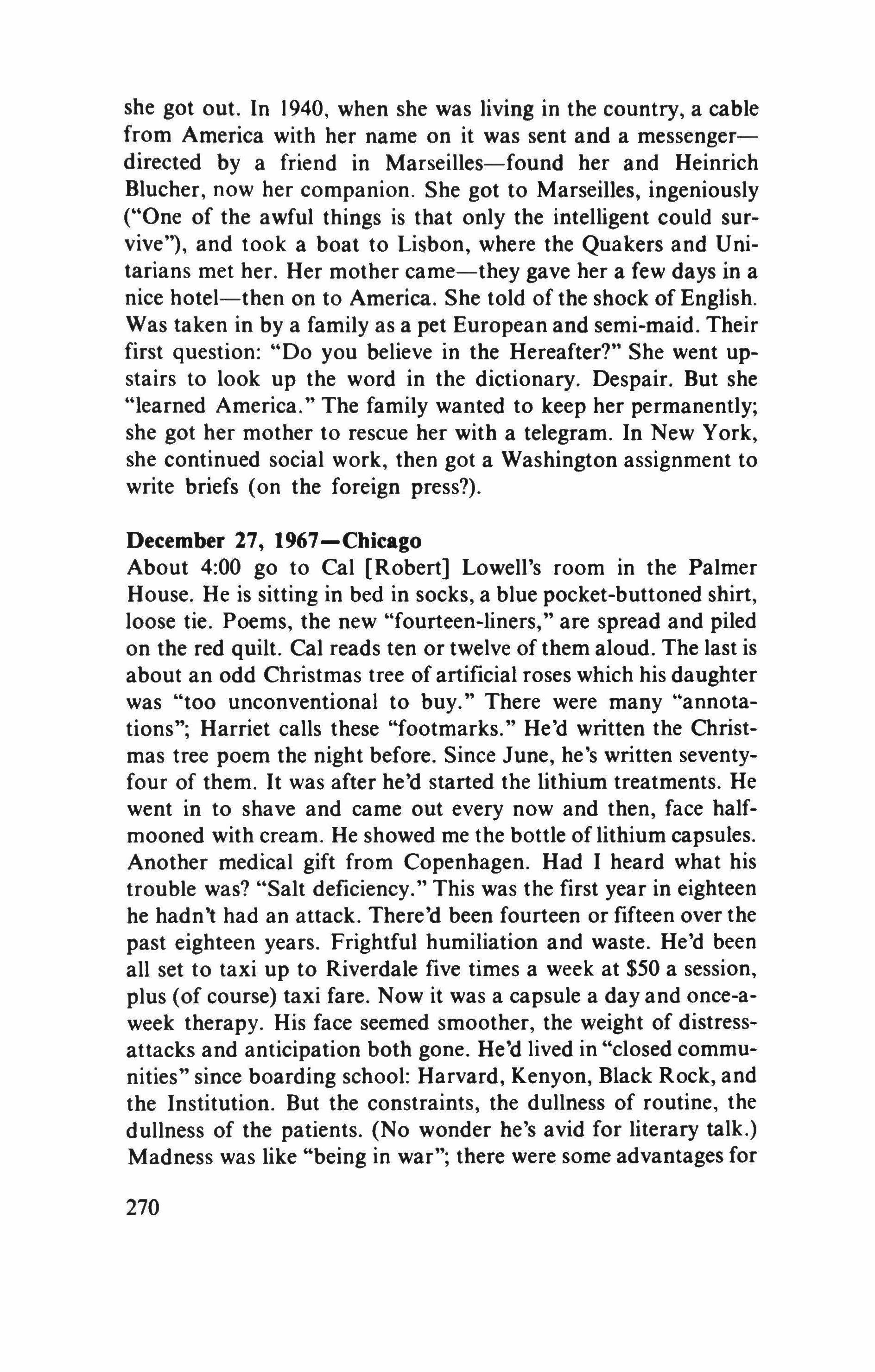
she got out. In 1940, when she was living in the country, a cable from America with her name on it was sent and a messengerdirected by a friend in Marseilles-found her and Heinrich Blucher, now her companion. She got to Marseilles, ingeniously ("One of the awful things is that only the intelligent could survive"), and took a boat to Lisbon, where the Quakers and Unitarians met her. Her mother came-they gave her a few days in a nice hotel-then on to America. She told of the shock of English. Was taken in by a family as a pet European and semi-maid. Their first question: "Do you believe in the Hereafter?" She went upstairs to look up the word in the dictionary. Despair. But she "learned America." The family wanted to keep her permanently; she got her mother to rescue her with a telegram. In New York, she continued social work, then got a Washington assignment to write briefs (on the foreign press").
December 27, 1967-Chicago
About 4:00 go to Cal [Robert] Lowell's room in the Palmer House. He is sitting in bed in socks, a blue pocket-buttoned shirt, loose tie. Poems, the new "fourteen-liners," are spread and piled on the red quilt. Cal reads ten or twelve of them aloud. The last is about an odd Christmas tree of artificial roses which his daughter was "too unconventional to buy." There were many "annotations"; Harriet calls these "footrnarks." He'd written the Christmas tree poem the night before. Since June, he's written seventyfour of them. It was after he'd started the lithium treatments. He went in to shave and came out every now and then, face halfmooned with cream. He showed me the bottle of lithium capsules. Another medical gift from Copenhagen. Had I heard what his trouble was? "Salt deficiency." This was the first year in eighteen he hadn't had an attack. There'd been fourteen or fifteen over the past eighteen years. Frightful humiliation and waste. He'd been all set to taxi up to Riverdale five times a week at $50 a session, plus (of course) taxi fare. Now it was a capsule a day and once-aweek therapy. His face seemed smoother, the weight of distressattacks and anticipation both gone. He'd lived in "closed communities" since boarding school: Harvard, Kenyon, Black Rock, and the Institution. But the constraints, the dullness of routine, the dullness of the patients. (No wonder he's avid for literary talk.) Madness was like "being in war"; there were some advantages for
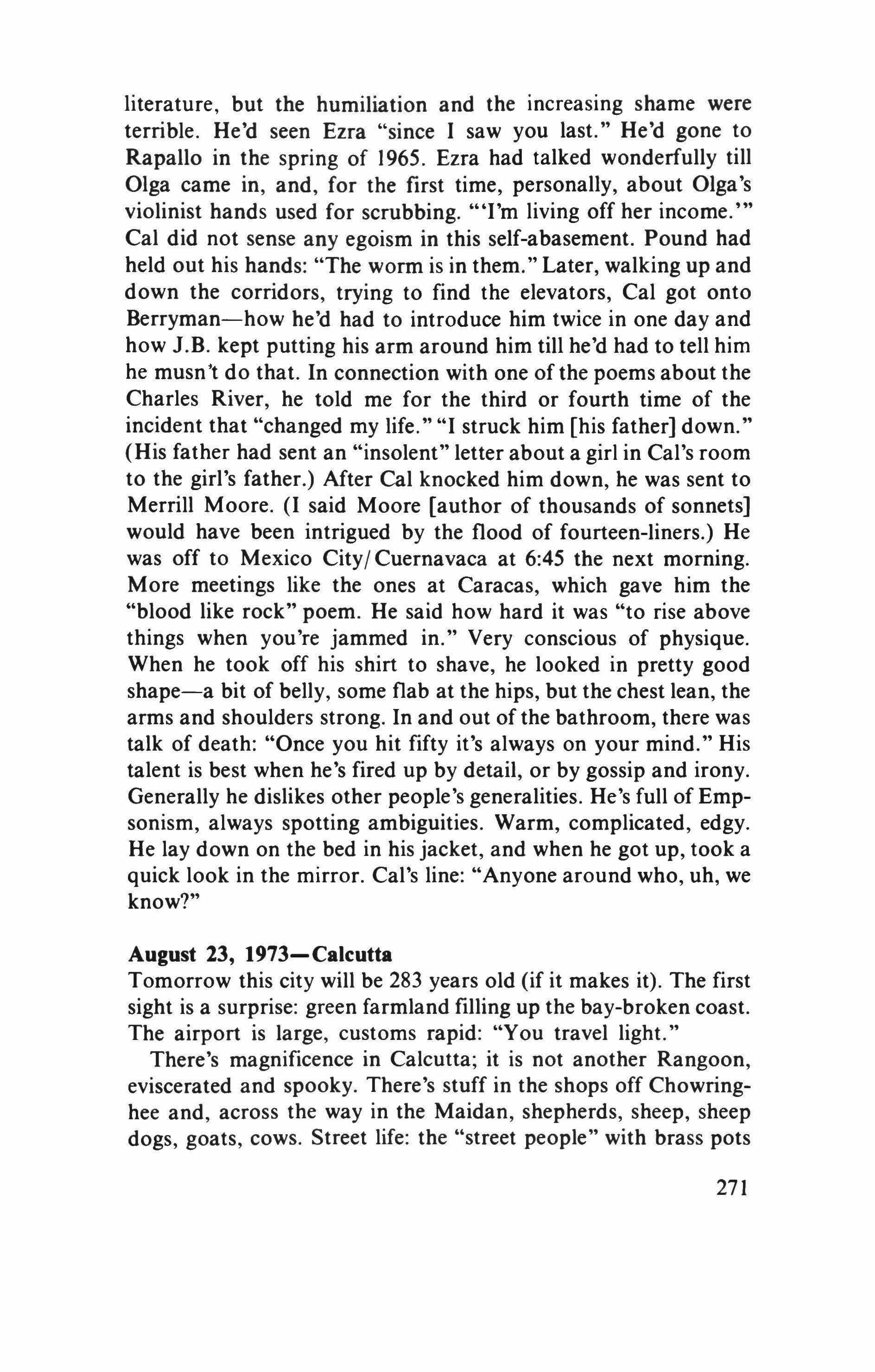
literature, but the humiliation and the increasing shame were terrible. He'd seen Ezra "since I saw you last." He'd gone to Rapallo in the spring of 1965. Ezra had talked wonderfully till Olga came in, and, for the first time, personally, about Olga's violinist hands used for scrubbing. '''I'm living off her income. Cal did not sense any egoism in this self-abasement. Pound had held out his hands: "The worm is in them." Later, walking up and down the corridors, trying to find the elevators, Cal got onto Berryman-how he'd had to introduce him twice in one day and how J.B. kept putting his arm around him till he'd had to tell him he musnt do that. In connection with one of the poems about the Charles River, he told me for the third or fourth time of the incident that "changed my life." "I struck him [his father] down." (His father had sent an "insolent" letter about a girl in Cal's room to the girl's father.) After Cal knocked him down, he was sent to Merrill Moore. (I said Moore [author of thousands of sonnets] would have been intrigued by the flood of fourteen-liners.) He was off to Mexico City/ Cuernavaca at 6:45 the next morning. More meetings like the ones at Caracas, which gave him the "blood like rock" poem. He said how hard it was "to rise above things when you're jammed in." Very conscious of physique. When he took off his shirt to shave, he looked in pretty good shape-a bit of belly, some flab at the hips, but the chest lean, the arms and shoulders strong. In and out of the bathroom, there was talk of death: "Once you hit fifty it's always on your mind." His talent is best when he's fired up by detail, or by gossip and irony. Generally he dislikes other people's generalities. He's full of Empsonism, always spotting ambiguities. Warm, complicated, edgy. He lay down on the bed in his jacket, and when he got up, took a quick look in the mirror. Cal's line: "Anyone around who, uh, we know?"
Tomorrow this city will be 283 years old (if it makes it). The first sight is a surprise: green farmland filling up the bay-broken coast. The airport is large, customs rapid: "You travel light."
There's magnificence in Calcutta; it is not another Rangoon, eviscerated and spooky. There's stuff in the shops off Chowringhee and, across the way in the Maidan, shepherds, sheep, sheep dogs, goats, cows. Street life: the "street people" with brass pots
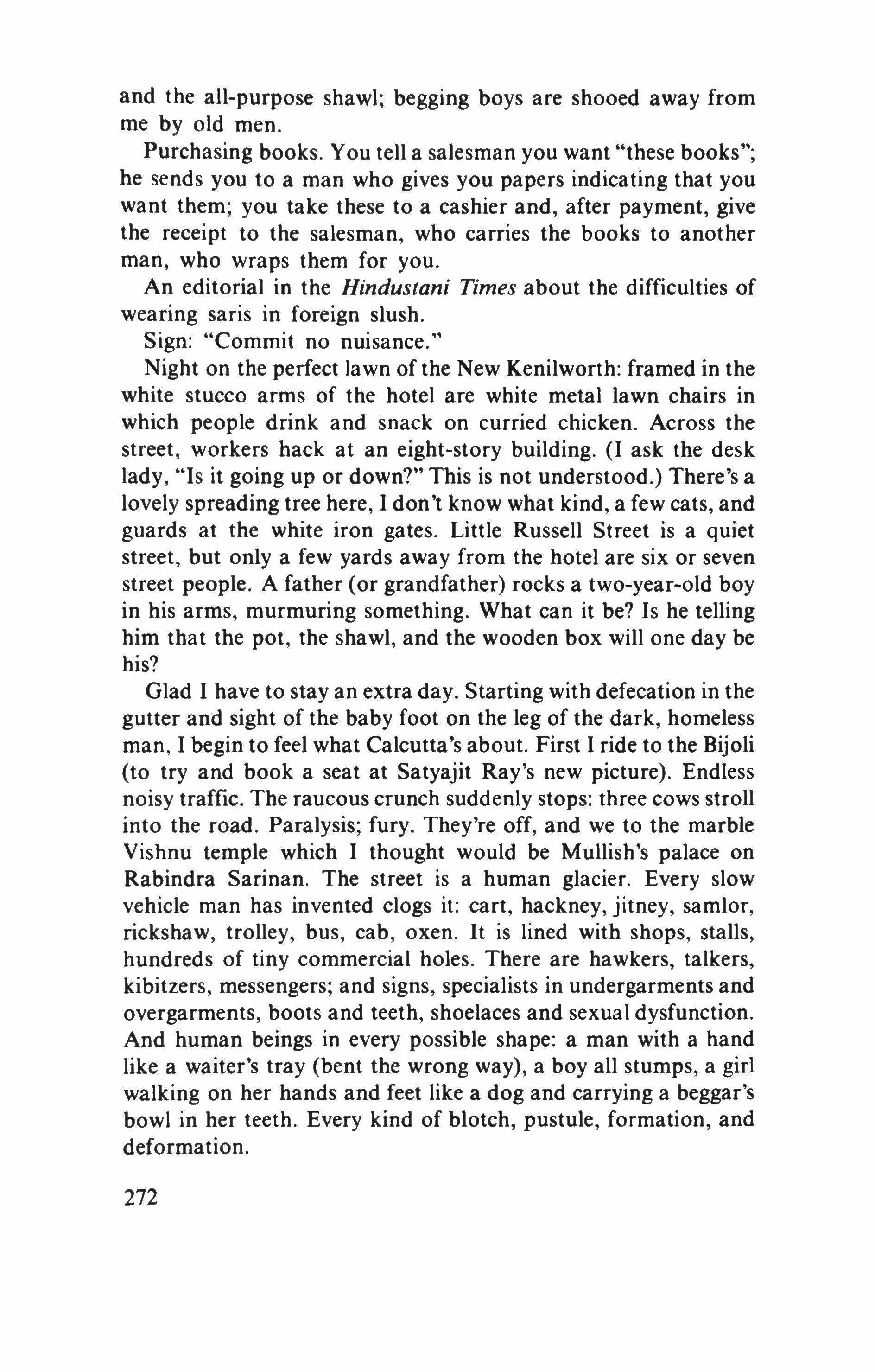
and the all-purpose shawl; begging boys are shooed away from me by old men.
Purchasing books. You tell a salesman you want "these books"; he sends you to a man who gives you papers indicating that you want them; you take these to a cashier and, after payment, give the receipt to the salesman, who carries the books to another man, who wraps them for you.
An editorial in the Hindustani Times about the difficulties of wearing saris in foreign slush.
Sign: "Commit no nuisance."
Night on the perfect lawn of the New Kenilworth: framed in the white stucco arms of the hotel are white metal lawn chairs in which people drink and snack on curried chicken. Across the street, workers hack at an eight-story building. (I ask the desk lady, "Is it going up or down?" This is not understood.) There's a lovely spreading tree here, I don't know what kind, a few cats, and guards at the white iron gates. Little Russell Street is a quiet street, but only a few yards away from the hotel are six or seven street people. A father (or grandfather) rocks a two-year-old boy in his arms, murmuring something. What can it be? Is he telling him that the pot, the shawl, and the wooden box will one day be his?
Glad I have to stay an extra day. Starting with defecation in the gutter and sight of the baby foot on the leg of the dark, homeless man, I begin to feel what Calcutta's about. First I ride to the Bijoli (to try and book a seat at Satyajit Ray's new picture). Endless noisy traffic. The raucous crunch suddenly stops: three cows stroll into the road. Paralysis; fury. They're off, and we to the marble Vishnu temple which I thought would be Mullish's palace on Rabindra Sarinan. The street is a human glacier. Every slow vehicle man has invented clogs it: cart, hackney, jitney, samlor, rickshaw, trolley, bus, cab, oxen. It is lined with shops, stalls, hundreds of tiny commercial holes. There are hawkers, talkers, kibitzers, messengers; and signs, specialists in undergarments and overgarments, boots and teeth, shoelaces and sexual dysfunction. And human beings in every possible shape: a man with a hand like a waiter's tray (bent the wrong way), a boy all stumps, a girl walking on her hands and feet like a dog and carrying a beggar's bowl in her teeth. Every kind of blotch, pustule, formation, and deformation.
272
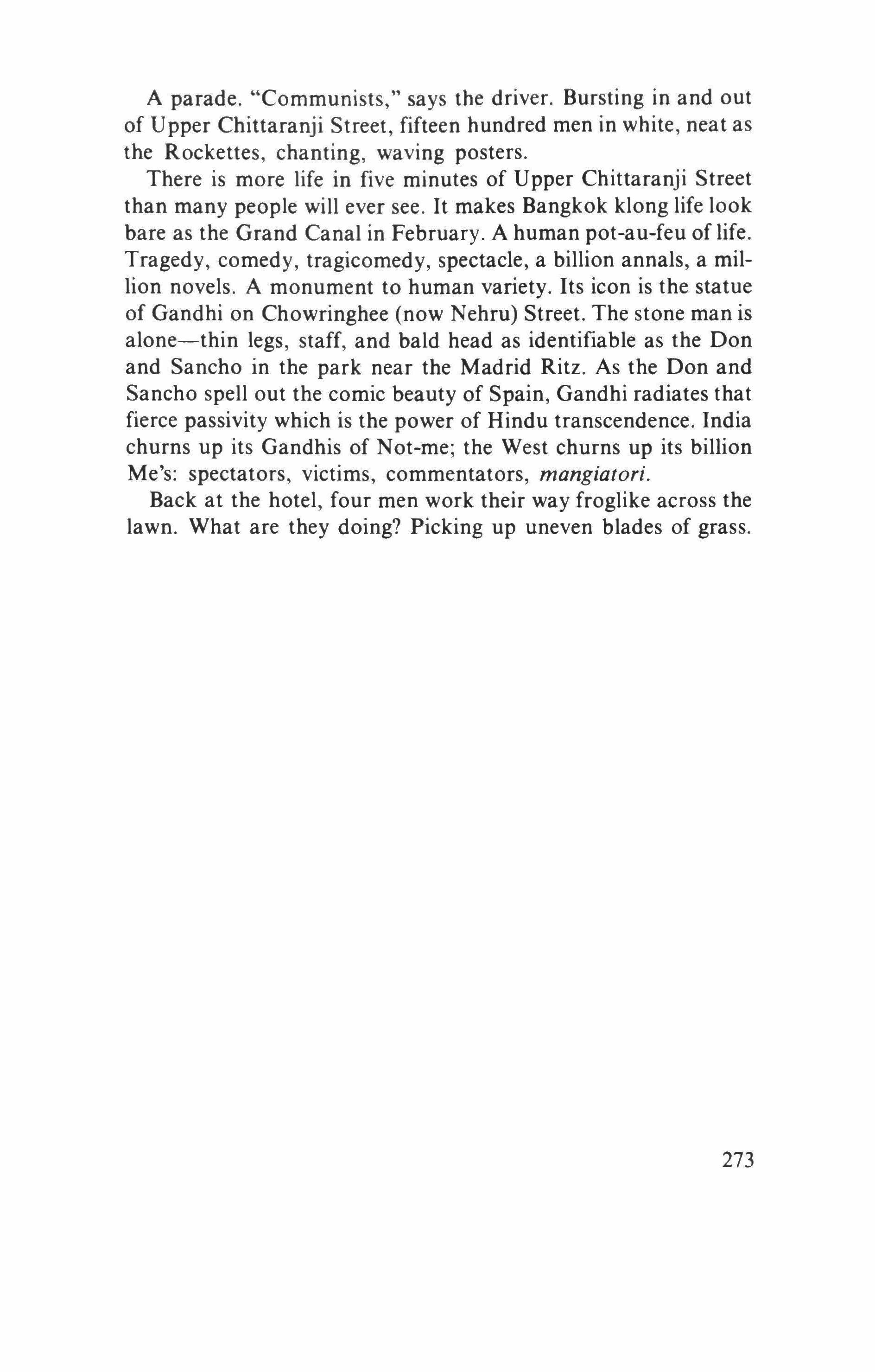
A parade. "Communists," says the driver. Bursting in and out of Upper Chittaranji Street, fifteen hundred men in white, neat as the Rockettes, chanting, waving posters.
There is more life in five minutes of Upper Chittaranji Street than many people will ever see. It makes Bangkok klong life look bare as the Grand Canal in February. A human pot-au-feu of life. Tragedy, comedy, tragicomedy, spectacle, a billion annals, a million novels. A monument to human variety. Its icon is the statue of Gandhi on Chowringhee (now Nehru) Street. The stone man is alone-thin legs, staff, and bald head as identifiable as the Don and Sancho in the park near the Madrid Ritz. As the Don and Sancho spell out the comic beauty of Spain, Gandhi radiates that fierce passivity which is the power of Hindu transcendence. India churns up its Gandhis of Not-me; the West churns up its billion Me's: spectators, victims, commentators, mangiatori.
Back at the hotel, four men work their way froglike across the lawn. What are they doing? Picking up uneven blades of grass.
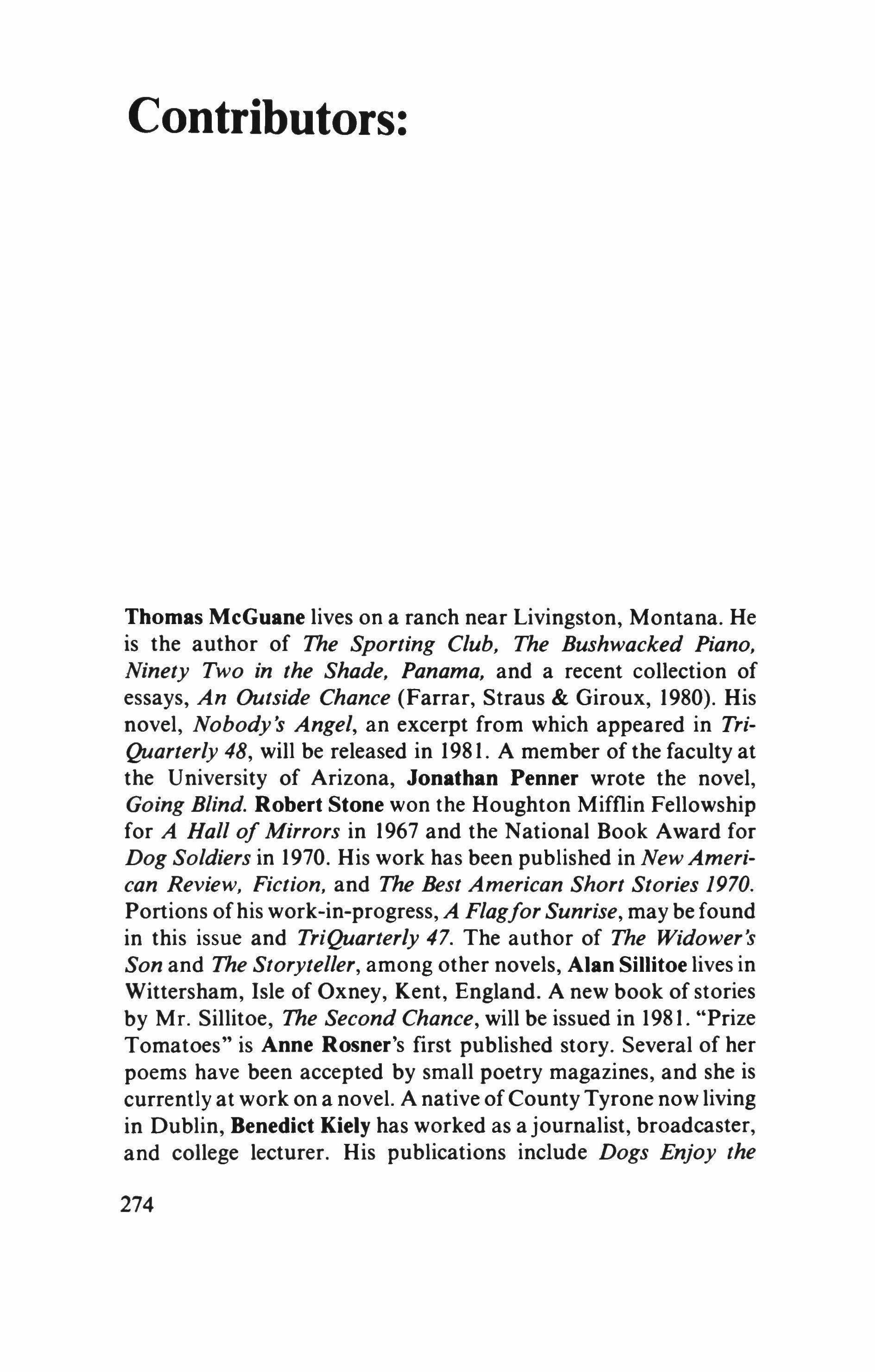
Thomas McGuane lives on a ranch near Livingston, Montana. He is the author of The Sporting Club, The Bushwacked Piano, Ninety Two in the Shade, Panama, and a recent collection of essays, An Outside Chance (Farrar, Straus & Giroux, 1980). His novel, Nobody's Angel, an excerpt from which appeared in TriQuarterly 48, will be released in 1981. A member of the faculty at the University of Arizona, Jonathan Penner wrote the novel, Going Blind. Robert Stone won the Houghton Mifflin Fellowship for A Hall of Mirrors in 1967 and the National Book Award for Dog Soldiers in 1970. His work has been published in New American Review, Fiction, and The Best American Short Stories 1970. Portions ofhis work-in-progress, A Flagfor Sunrise, may be found in this issue and TriQuarterly 47. The author of The Widower's Son and The Storyteller, among other novels, Alan Sillitoe lives in Wittersham, Isle of Oxney, Kent, England. A new book of stories by Mr. Sillitoe, The Second Chance, will be issued in 1981. "Prize Tomatoes" is Anne Rosner's first published story. Several of her poems have been accepted by small poetry magazines, and she is currently at work on a novel. A native ofCountyTyrone now living in Dublin, Benedict Kiely has worked as a journalist, broadcaster, and college lecturer. His publications include Dogs Enjoy the 274
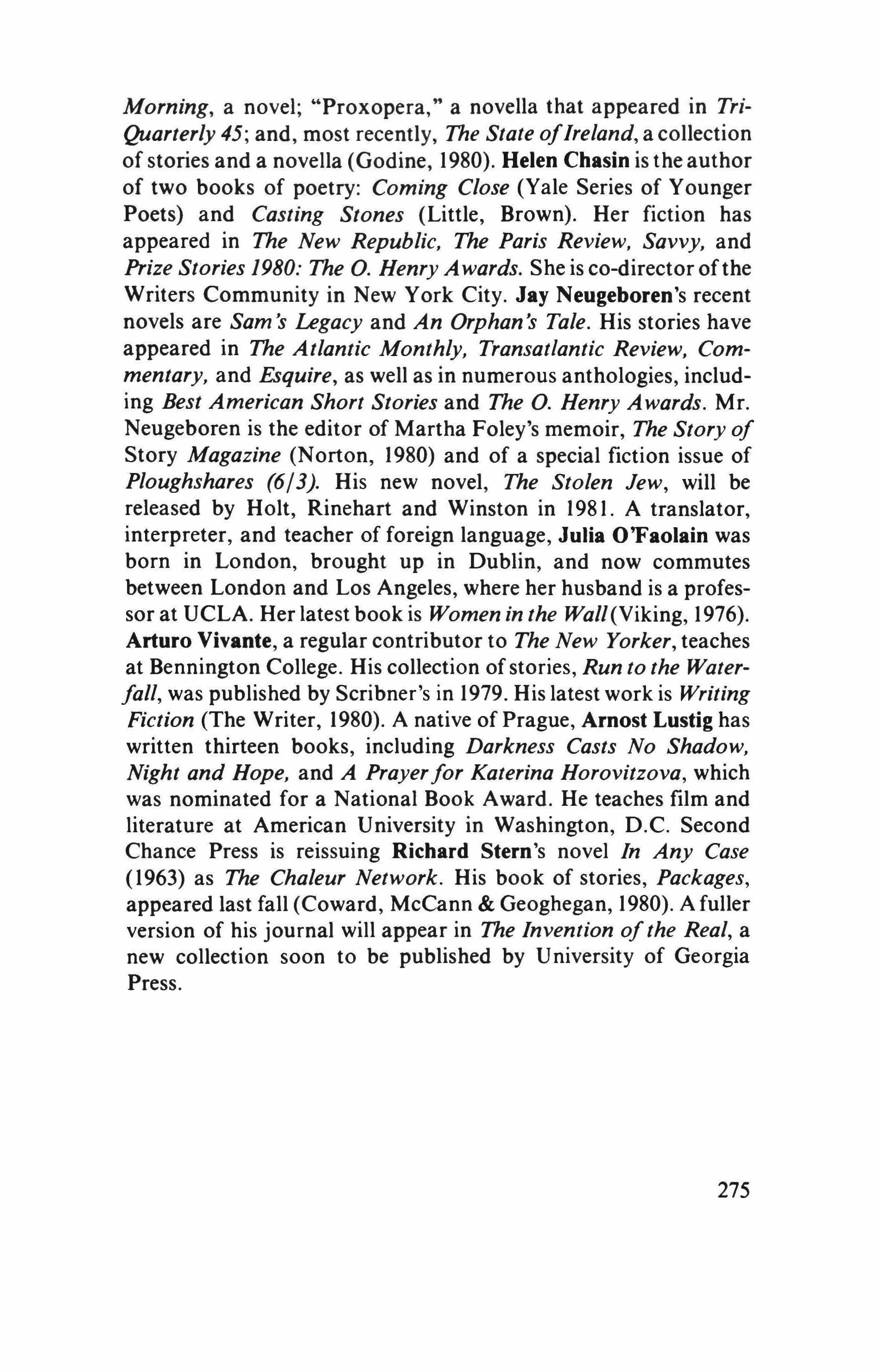
Morning, a novel; "Proxopera," a novella that appeared in TriQuarterly 45; and, most recently, The State ofIreland, a collection of stories and a novella (Godine, 1980). Helen Chasin is the author of two books of poetry: Coming Close (Yale Series of Younger Poets) and Casting Stones (Little, Brown). Her fiction has appeared in The New Republic, The Paris Review, Savvy, and Prize Stories 1980: The O. Henry Awards. She is co-director ofthe Writers Community in New York City. Jay Neugeboren's recent novels are Sam's Legacy and An Orphan's Tale. His stories have appeared in The Atlantic Monthly, Transatlantic Review, Commentary, and Esquire, as well as in numerous anthologies, including Best American Short Stories and The O. Henry Awards. Mr. Neugeboren is the editor of Martha Foley's memoir, The Story of Story Magazine (Norton, 1980) and of a special fiction issue of Ploughshares (6/3). His new novel, The Stolen Jew, will be released by Holt, Rinehart and Winston in 1981. A translator, interpreter, and teacher of foreign language, Julia O'Faolain was born in London, brought up in Dublin, and now commutes between London and Los Angeles, where her husband is a professorat UCLA. Her latest book is Women in the Wall(Viking, 1976). Arturo Vivante, a regular contributor to The New Yorker, teaches at Bennington College. His collection of stories, Run to the Waterfall, was published by Scribner's in 1979. His latest work is Writing Fiction (The Writer, 1980). A native of Prague, Arnost Lustig has written thirteen books, including Darkness Casts No Shadow, Night and Hope, and A Prayerfor Katerina Horovitzova, which was nominated for a National Book Award. He teaches film and literature at American University in Washington, D.C. Second Chance Press is reissuing Richard Stern's novel In Any Case (1963) as The Chaleur Network. His book of stories, Packages, appeared last fall (Coward, McCann & Geoghegan, 1980). A fuller version of his journal will appear in The Invention ofthe Real, a new collection soon to be published by University of Georgia Press.
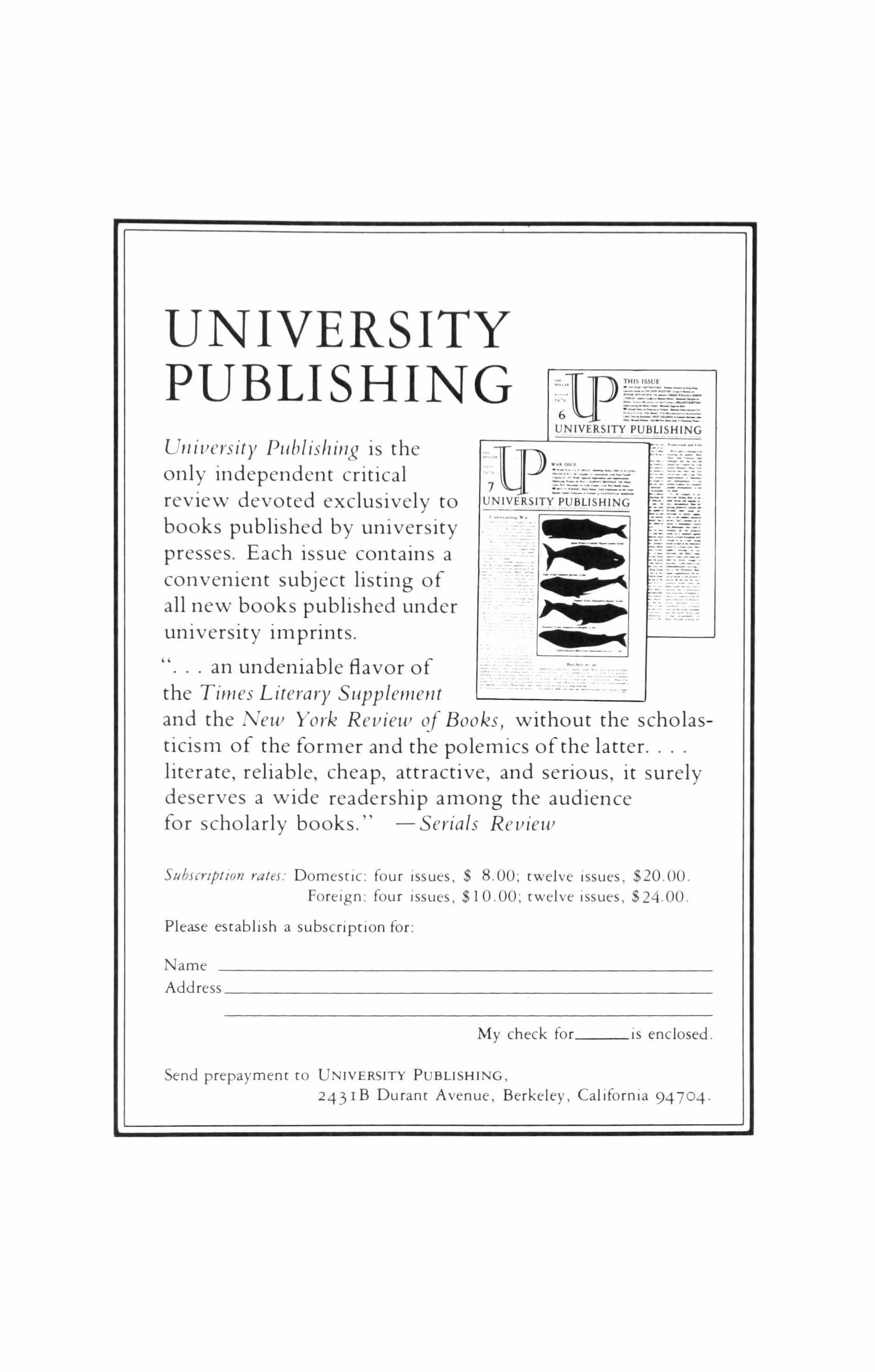
University Pllblishillg IS the only independent critical review devoted exclusively to books published by university presses. Each Issue contains a convenient subject listing of all new books published under university imprints.
an undeniable flavor of
the Til'nes Literary Supplement and the New York Review of Books, without the scholasticism of the former and the polemics of the latter. literate, reliable, cheap, attractive, and senous, it surely deserves a wide readership among the audience for scholarly books." - Serials Review
Subscnption rates, Domesric: four Issues, $ 8.00; twelve Issues, $20.00. Foreign: four Issues, $10.00; twelve issues, $24.00.
Name Address
Please establish a subscriprion for: My check for is enclosed.
Send prepaymenr co UNIVERSITY PUBLISHING, 243IB Durant Avenue, Berkeley, California 94704.
Nine p.pen on the youth of the spirit and the spirit of youth in myths, literature. path. ol"l!}' and an:helypal p8yehol"l!}'. A wide-angled approach 10 Ihe puer aelernuo,lhe elernal boy. that creative f.eeinali� and deva8taling figure who haunle 80 many modern p.ychIc condition•. Ineledeee James Hillman's Senex and Pues-, Puer "oundfll and UIYSSC8' Scar, Noles on Opportuni8m and on the Puee- Psyche m.rri�e; H.A. Murray's maneliouM ease study American learus; Tom Moore on Artemis in puer psychology; Randolph Se"ertlOn on puer .kin di8ea8e8; and the puer figure in Melville (James Baird) and in FinneRanM 'Wake (l'om Cowan). 110.00 256 P"I'ies PP
The fire' interpretation in book fonn of JURIl's famous Seminars interpreting the viRions of an American woman patienL Soul questions and the 8piritual queer are amplified by Jun� a. the prolonged active illUlRination unfolds its imBtles, emotionl�, and reli�iouM themeli. JUDK at his best: humoreus, learned, wise, oUI-spoken:; Ieee the scholarly author than the living teacher in direct conversation with his pupils. Rich in practi(".al insiKhtli. POMo18crip. by Henry A. Murray tellil of .he life of the woman whose visions these are. Two-volume Sf't. Fifteen full color and fifteen black/white illustrations. Valuable index of themes, motif"" inlerpretalions. 125.00 (Ihe sel) 532 pages 55 1 1
Roberts Avens Western Nirvana in Jung, Hillman, Barfield and Cassirer
The liret cOKent attempt to 8how imagination as a Ulay comparable 10 Ealdern paths of liberation. By tracinfC the idea of myth and imagination in four psychological thinker"� the book brings oul the logic and subtlety of archetypal psychology as a startlingly important di8cipline. The book authoritatively covers the literature and presents the material with an easy. pleasant intelligence. Valuable for cla88room use: opens Ihe door to Ihe peetje, religiouB, and philosophical significance of the new im�inal psychology. Excellenl bibliography. Profes80r Avens (Iona College, N.Y.) is long-time student of Jung, Eliade. 'Weslern IhouKht. and Easlem disciplines. 17.50 128 page. 1M
The Charles Boer Translation
The earliest exlanl depiction or Ihe Gods and Godde e. as individual ligures. Boer's authorjtalive translalion, nominated for the Nalional Book Award, i. a readable and delighlrul book orrering immediate access to the archetypal characteristics of the Greek pantheon. S7.00 200 page. DQ
Add $.50 per book shipping costs; paymenIs mu.' accompany all orders. Complele catalogue Mf'nt on request.
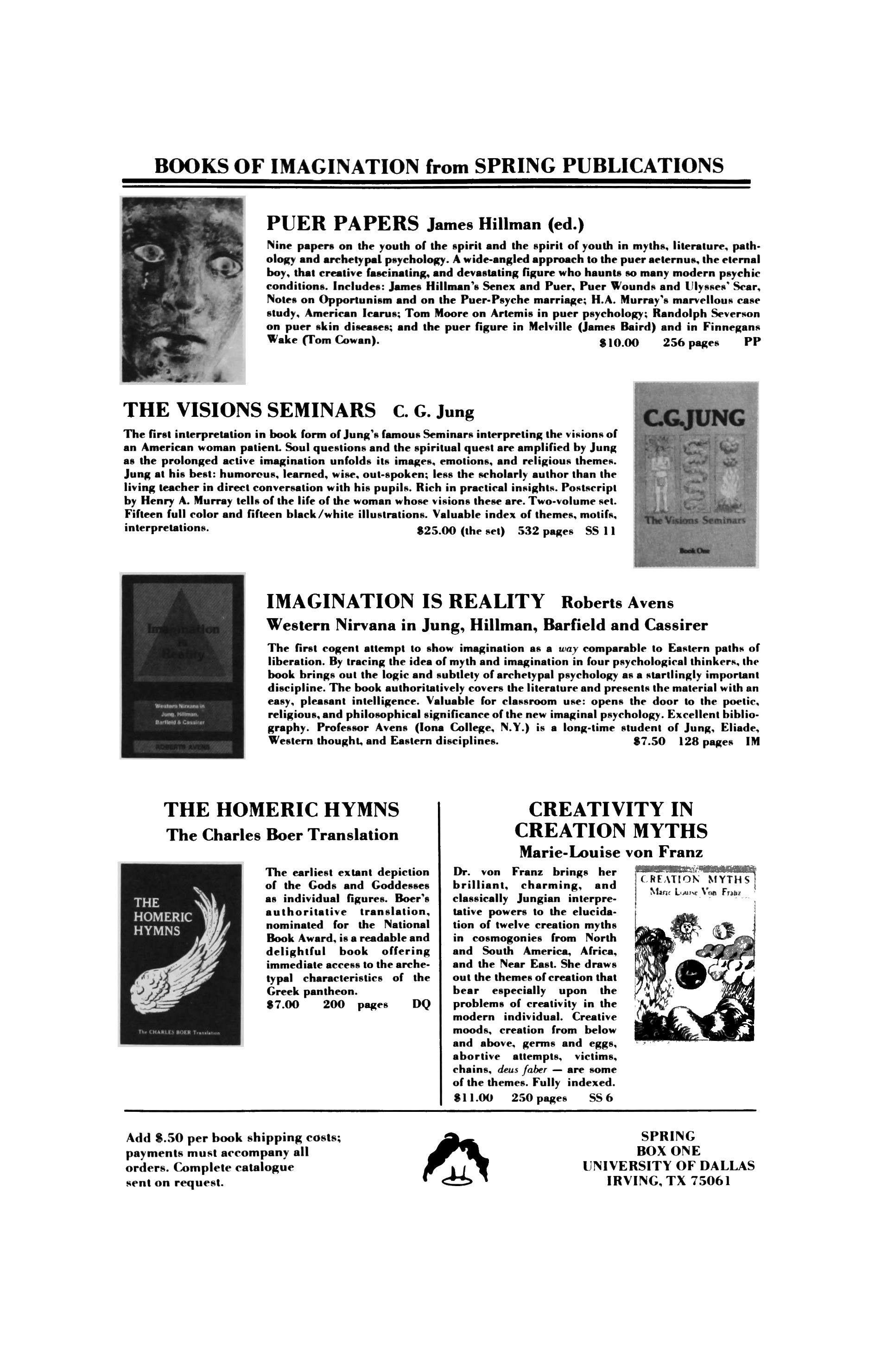
Marie-Louise von Franz
Dr. von Franz brings her brilliant, charming, and classically Jungian interpretative power. to the elucidation of twelve creation myths in cosmogonies from North and South Ameri� Africa. and the Near East. She draws out the themes ofcreation that bear eepeeledly upon the problems of creativity in the modern individual. Creative moods., cu.lion from below and above, genns and eggs. abortive allempt8, victim8� chains. deus faber - are some of the themes. Fully indexed. II 1.00 250 page. SS 6
SPRING BOX ONE
UNIVERSITY OF DALLAS IRVING, TX 75061
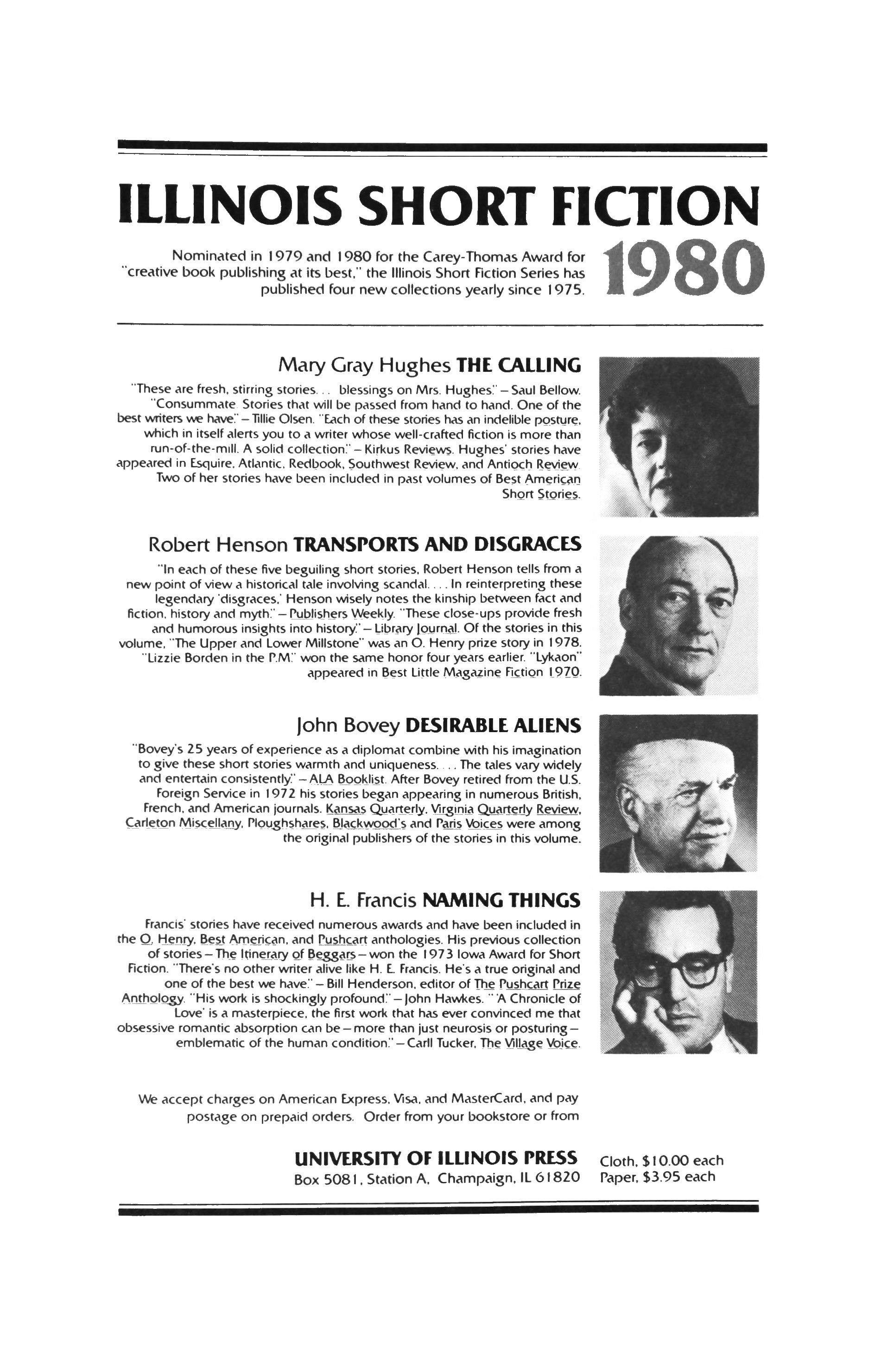
Nominated in 1979 and 1980 for the Carey-Thomas Award for "creative book publishing at its best." the Illinois Short Fiction Series has published four new collections yearly since 1975.
"These are fresh. stirring stones.. blessings on Mrs. Hughes:' - Saul Bellow. "Consummate Stories that will be passed from hand to hand. One of the best writers we have:' - lillie Olsen. "Each of these stories has an indelible posture. which in itself alerts you to a writer whose well-crafted fiction is more than nm-of-the-rruu, A solid collection:' - f(irkus RevieWS. Hughes' stories have appeared in Esquire, Atlantic. Redbook, Southwest Review, and AntiQC:h R�� Two of her stories have been included in past volumes of Best AmeriM'1J Short StQri§.
"In each of these five beguiling short stories. Robert Henson tells from a new point of view a historical tale invoMng scandal. In reinterpreting these legendary 'disgraces: Henson wisely notes the kinship between fact and fiction, history and myth:' - rublish�rs Weekly. "These erose-ups provide fresh and humorous insights into history:' -li!;lr"ry (9J,JrnA). Of the stories in this volume, "The Upper and Lower Millstone" was an O. Henry prize story in 1978, "Lizzie Borden in the P.M:' won the same honor four years earlier. "Lykaon" appeared in 6est little Mag�ine F'!�tiQn t9IQ.
"Bovey's 25 years of experience as a diplomat combine with his imagination to give these short stories warmth and uniqueness. The tales vary widely and entertain consistently" - A.V, I.LOQIiI�t. After Bovey retired from the U.S. Foreign Service in 1972 his stories began appearing in numerous British. French, and American journals. Kansas Ql!<!rteJly, 'Wgtr!!.\ Ql!..l� Review. yrl.eJQn Mi!'>Ce!!iIllY, PI9ughsh��, B.!�Ii\1l'Ood's and Paris �� were among the original publishers of the stories in this volume.
Francis' stories have received numerous awards and have been included in the Q, lieDIY. 6e� 1\n1�t;;�n. and !'�!::C�rt anthologies. His previous collection of stories - Th.e Itiner.<!1Y Qf 6egg�r:; - won the 1973 Iowa Award for Short fiction. "There's no other writer alive like H. E. Francis. He's a true original and one of the best we have:' - Bill Henderson. editor of Th_g r� � AatllQIQSY. "His work is shockingly profound:' -(ohn Hawkes. "'A Chronicle of Love' is a masterpiece, the first work that has ever convinced me that obsessive romantic absorption can be - more than just neurosis or posturingemblematic of the human condition:' - Carll Tucker. The \'i111ge �jce.
We accept charges on American Express. Visa, and MasterCard. and pay postage on prepaid orders, Order from your bookstore or from
UNIVERSITY OF ILUNOIS PRESS Cloth. $10.00 each Box 5081. Station A. Champaign. IL 61820 Paper. $3,95 each
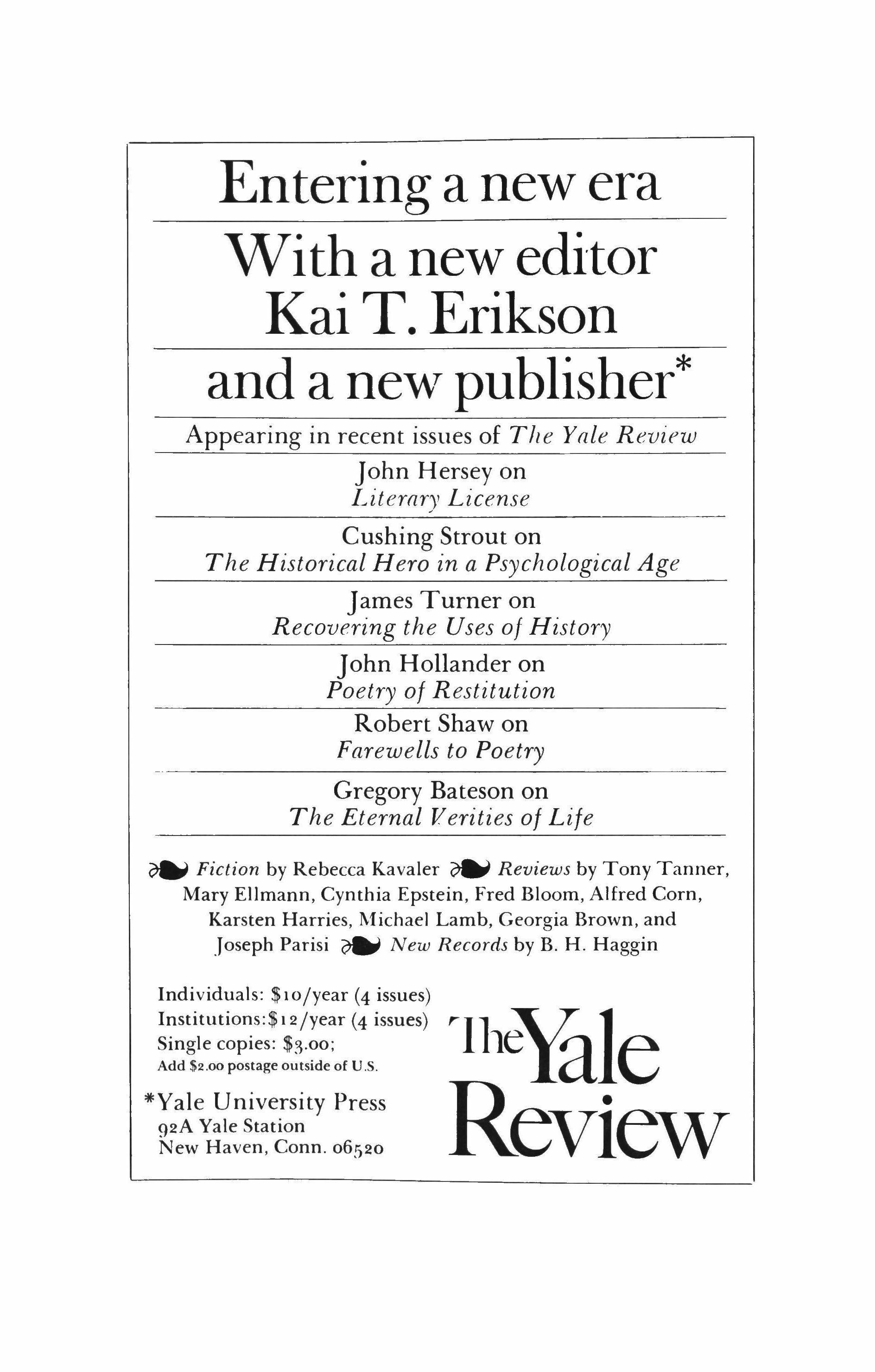
Appearing in recent issues of The Yale Review
John Hersey on Literary License
Cushing Strout on The Historical Hero in a Psychological Age
James Turner on Recovering the Uses of History
John Hollander on Poetry of Restitution
Robert Shaw on Farewells to Poetry
Gregory Bateson on The Eternal Verities of Life
• Fiction by Rebecca Kavaler • Reviews by Tony Tanner, Mary Ellmann, Cynthia Epstein, Fred Bloom, Alfred Corn, Karsten Harries, Michael Lamb, Georgia Brown, and Joseph Parisi. New Records by B. H. Haggin
Individuals: $10/year (4 issues)
Institutions.Sr ayyear (4 issues)
Single copies: $3.00; Add $2.00 postage outside of U.S.
*Yale University Press 92A Yale Station New Haven, Conn. 06520
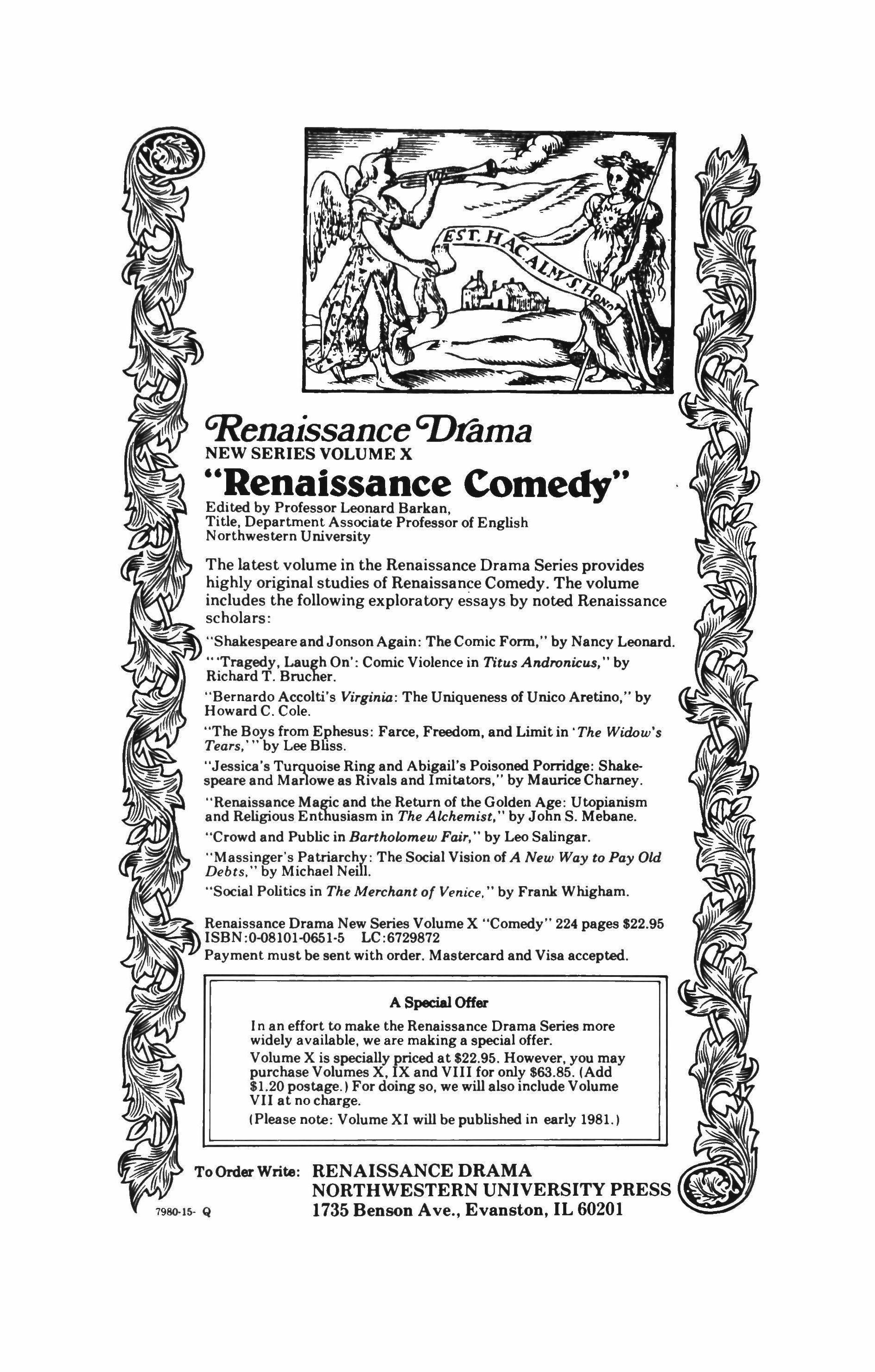
NEW SERIES VOLUME x
by
Professor Leonard Barkan, Title, Department Associate Professor of English NorthwesternUniversity
The latest volume in the Renaissance Drama Series provides highly original studies of Renaissance Comedy. The volume includes the following exploratory essays by noted Renaissance scholars:
'1���� "Shakespeare and Jonson Again: The Comic Form," by Nancy Leonard. "'Tragedy, Laugh On': Comic Violence in Titus Andronicus," by Richard T. Brucher.
"Bernardo Accolti's Virgini4: The Uniqueness of Unico Aretino," by Howard C. Cole.
"The Boys from Ephesus: Farce, Freedom, and Limit in' The Widow's Tears, by Lee Bliss.
"Jessica's Turquoise Ring and Abigail's Poisoned Porridge: Shakespeare and Marlowe as Rivals and Imitators," by Maurice Charney.
"Renaissance Magic and the Return of the Golden Age: Utopianism and Religious Enthusiasm in The Alchemist," by John S. Mebane.
"Crowd and Public in Bartholomew Fair," by Leo Salingar.
"Massinger's Patriarchy: The Social Vision of A New Way to Pay Old Debts," by Michael Neill.
"Social Politics in The Merchant of Venice," by Frank Whigham.
Renaissance Drama New Series Volume X "Comedy" 224 pages $22,95 ISBN:O-08101�1·5 LC:6729872
Payment must be sent with order. Mastercard and Visa accepted,
I n an effort to make the Renaissance Drama Series more widely available, we are making a special offer. Volume X is specially priced at $22,95, However, you may purchase Volumes X, IX and VIII for only $63.85. (Add $1,20 postage.) For doing so, we will also include Volume VII at no charge.
(Please note: Volume XI will be published in early 1981.'
To Order Write: RENAISSANCE DRAMA
NORTHWESTERN UNIVERSITY PRESS 1735 Benson Ave" Evanston, IL 60201

